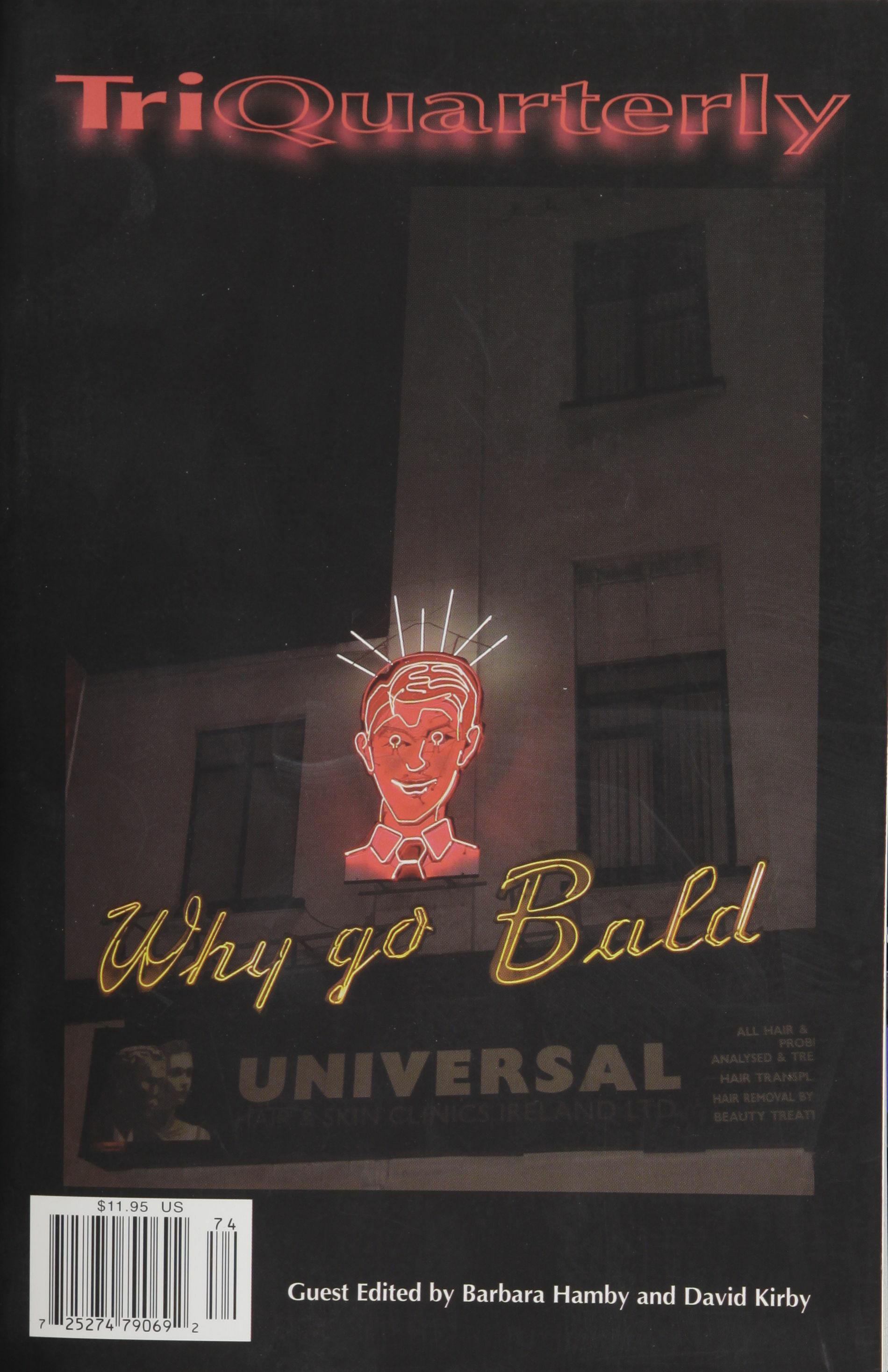


TriQuarterly
TriQuarterly is an international journal of writing, art and cultural inquiry published at Northwestern University
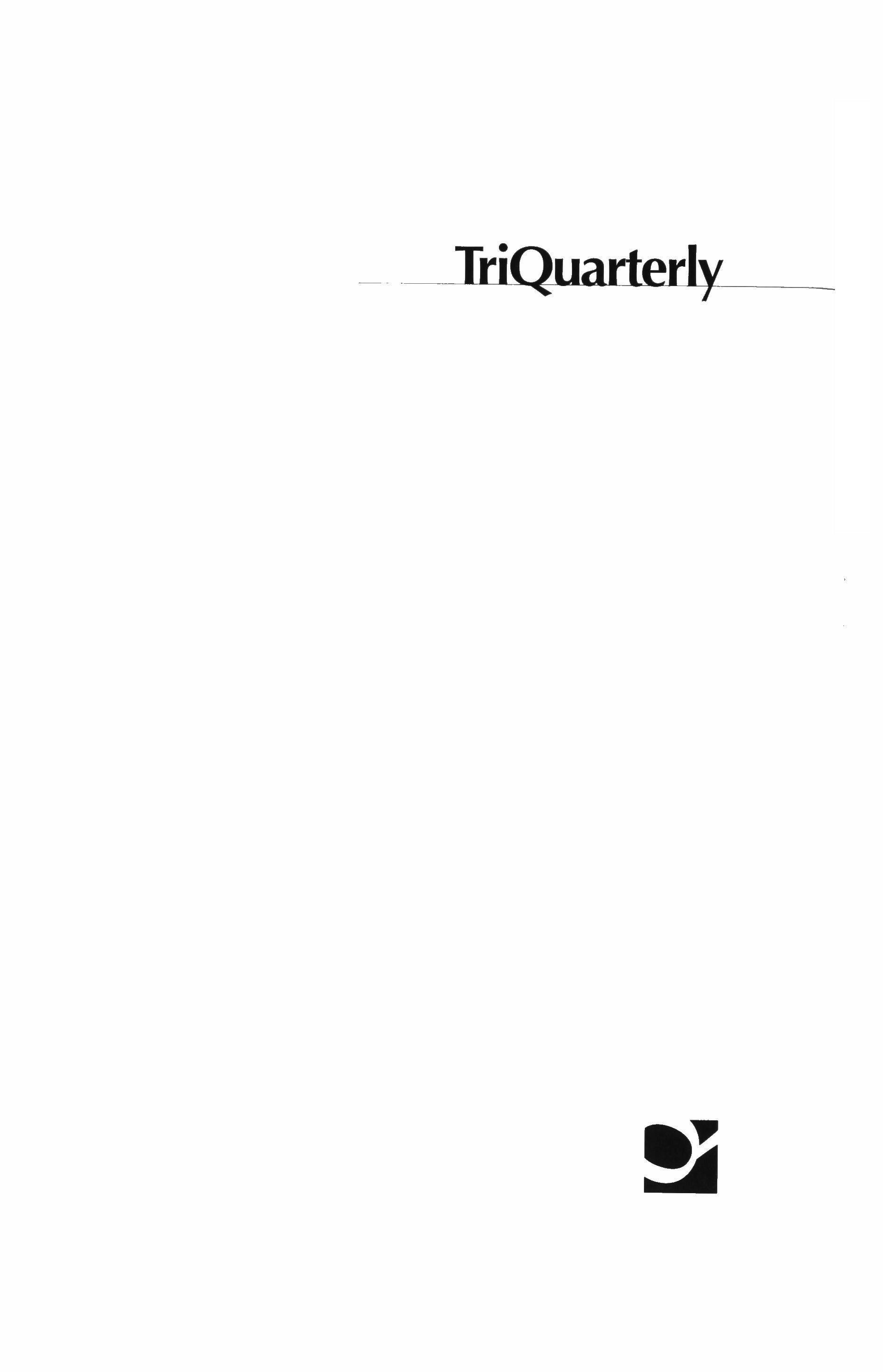
Editor
Susan Firestone Hahn
Associate Editor
Ian Morris
Operations Coordinator
Kirstie Felland
Cover Design
Gini Kondziolka
Editorial Assistant
Amy Levine
Assistant Editor
Joanne Diaz
TriQuarterly Fellow
Brent Mix

Contributing Editors
John Barth
Lydia R. Diamond
Rita Dove
Stuart Dybek
Richard Ford
Sandra M. Gilbert
Robert Hass
Edward Hirsch
Li-Young Lee
Lorrie Moore
Alicia Ostriker
Carl Phillips
Robert Pinsky
Susan Stewart
Mark Strand
Alan Williamson
128
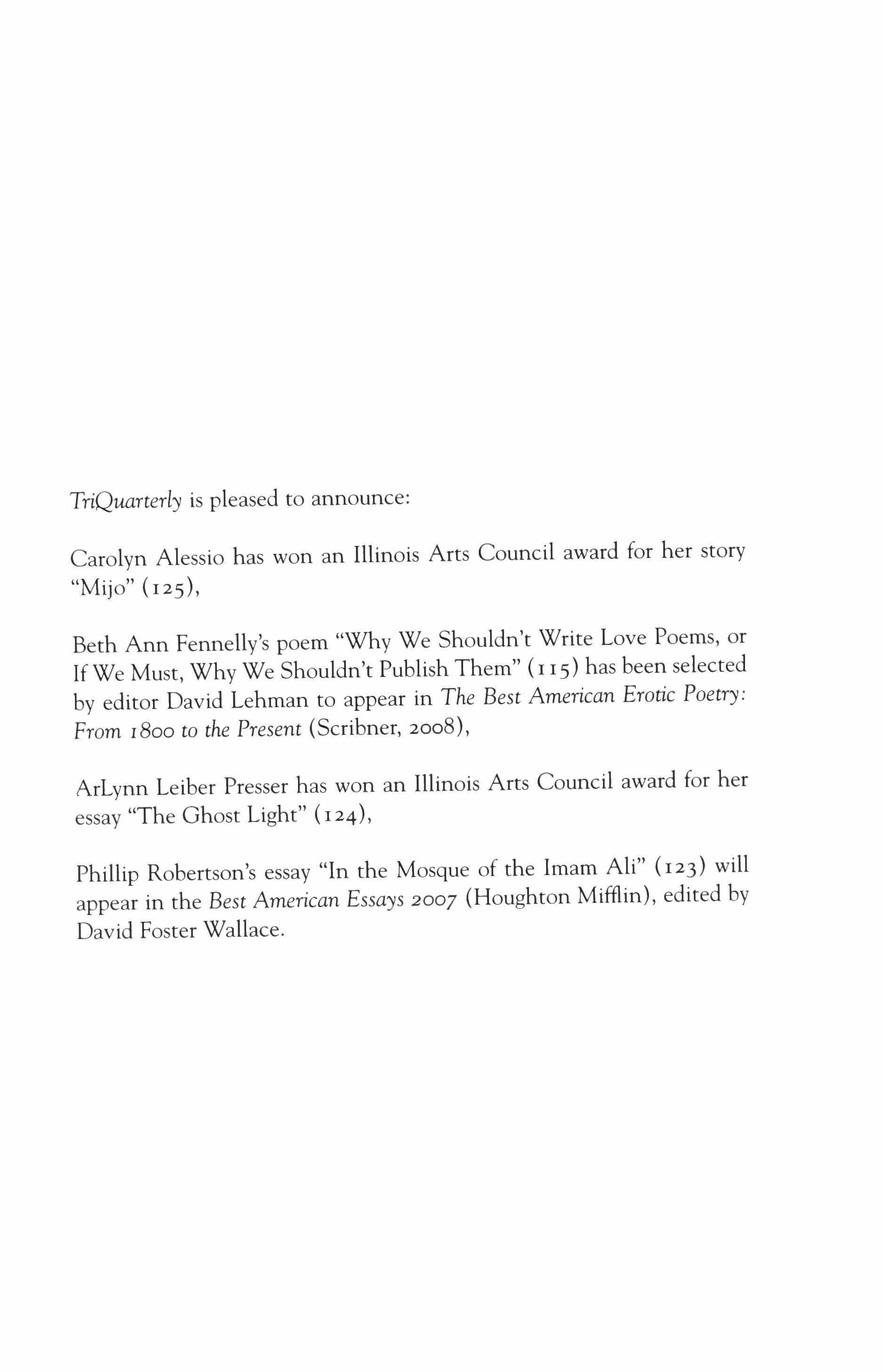
TriQuarterly is pleased to announce:
Carolyn Alessio has won an Illinois Arts Council award for her story "Mijo" (125),
Beth Ann Fennelly's poem "Why We Shouldn't Write Love Poems, or If We Must, Why We Shouldn't Publish Them" (I IS) has been selected by editor David Lehman to appear in The Best American Erotic Poetry: From 1800 to the Present (Scribner, 2008),
ArLynn Leiber Presser has won an Illinois Arts Council award for her essay "The Ghost Light" (124),
Phillip Robertson's essay "In the Mosque of the Imam Ali" (123) will appear in the Best American Essays 2007 (Houghton Mifflin), edited by David Foster Wallace.
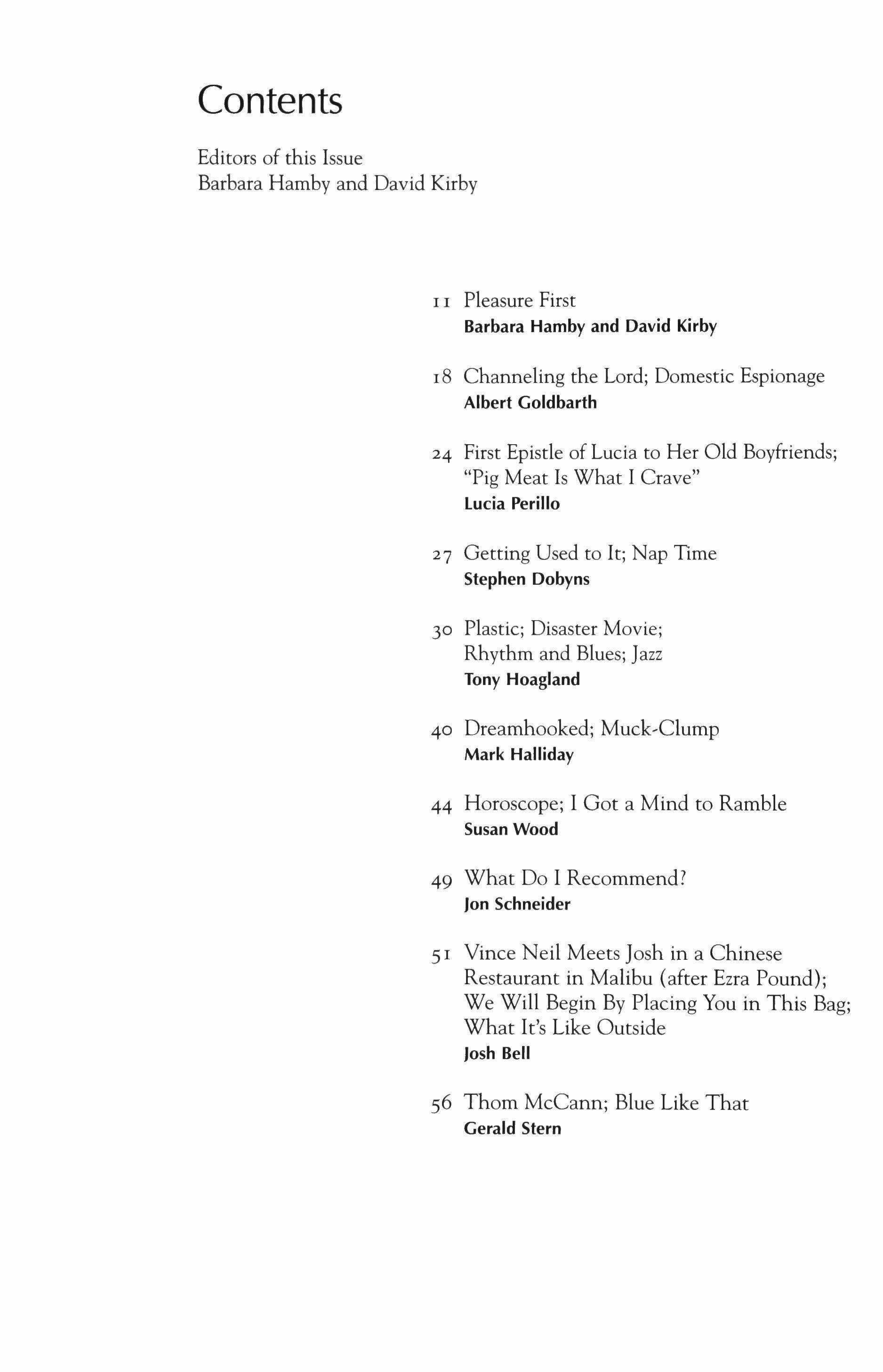 Barbara Hamby and David Kirby
Barbara Hamby and David Kirby
Contents
of this Issue
Editors
I I Pleasure First Barbara Hamby and David Kirby 18 Channeling the Lord; Domestic Espionage Albert Goldbarth 24 First Epistle of Lucia to Her Old Boyfriends; "Pig Meat Is What I Crave" Lucia Perillo 27 Getting Used to It; Nap Time Stephen Dobyns 30 Plastic; Disaster Movie; Rhythm and Blues; Jazz Tony Hoagland 40 Dreamhooked; Muck-Clump Mark Halliday 44 Horoscope; I Got a Mind to Ramble Susan Wood 49 What Do I Recommend? Jon Schneider 5 I Vince Neil Meets Josh in a Chinese Restaurant in Malibu {after Ezra Pound}; We Will Begin By Placing You in This Bag; What It's Like Outside Josh Bell 56 Thorn McCann; Blue Like That Gerald Stern

58 Sylvia Plath's Paper Dolls: Gold Hostess
Frock with Top Hat; Sylvia Plath's Paper Dolls: Three Black Skirts; Sylvia Plath's Paper Dolls: Midnight Blue Gown with Cape
Catherine Bowman
6 I The Man Who Could Read a Book through a Wall; Adage; Waiting
Billy Collins
66 Taken for a Ride
Richard Howard
69 The Church of the New Jerusalem, Pawnee Rock, Kansas; The Gray Man
B. H. Fairchild
73 Apocalypse; The Year of Living Regrettably
Jason Bredle
79 Lucky Me; October 1973
Denise Duhamel
85 Lives of the Vanishing Flying Aces; Articles of Faith; Hey Baby
Dean Young
90 Little Poem That Tries; Poem That Wears Your Scarf
Cate Marvin
94 Why I Hate Martin Frobisher
Phyllis Moore
96 Jackass: The Viewer; Everybody Tries So Hard
Charles Harper Webb
100 Semantic Relations; Sin City; The Theater People
Adrian Blevins
106 The Key To Stephen Dunn
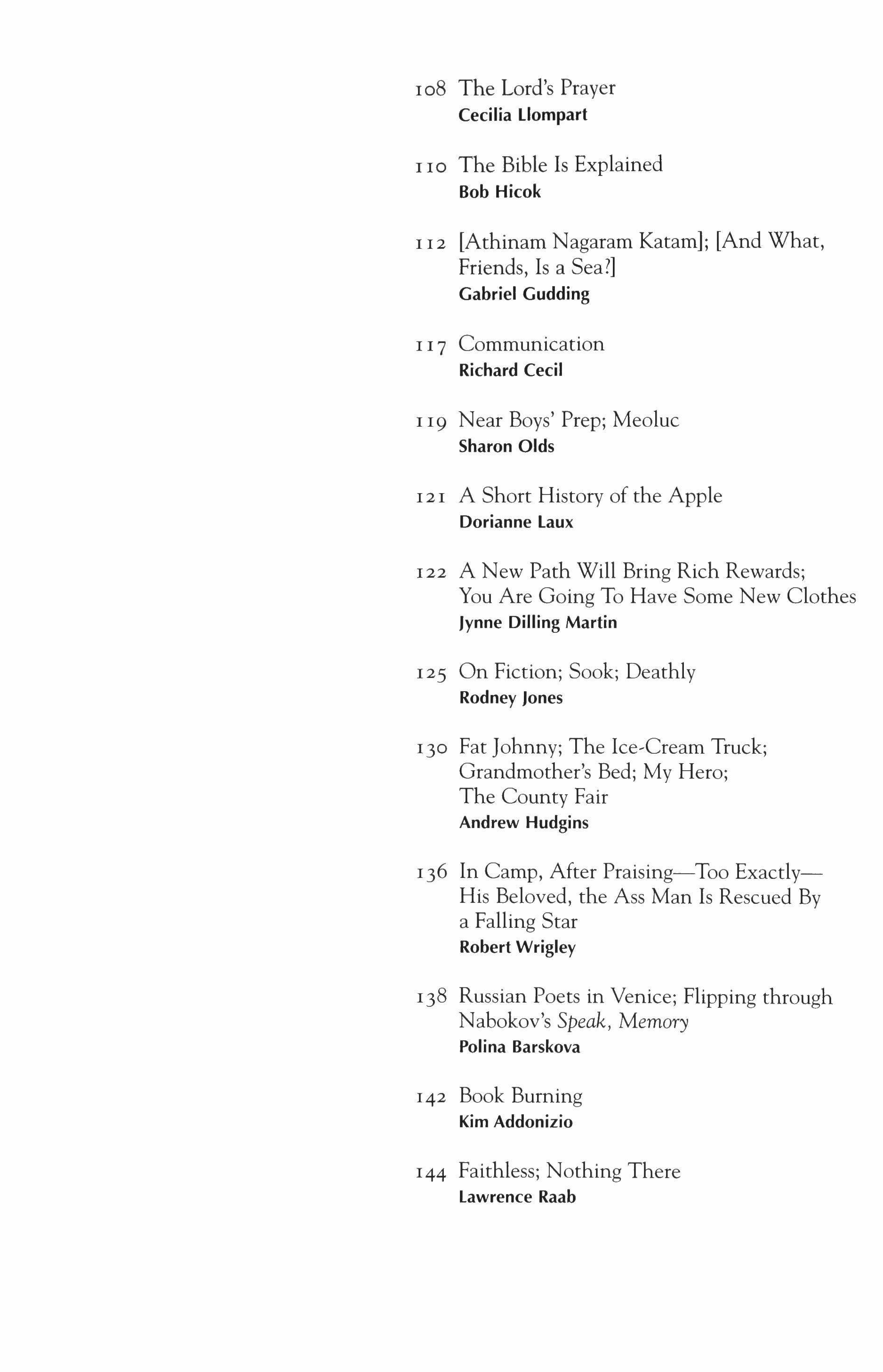
lOS The Lord's Prayer
Cecilia l.lompart
110 The Bible Is Explained
Bob Hicok
112 [Athinam Nagaram Katam]; [And What, Friends, Is a Sea?]
Gabriel Gudding
1 1 7 Communication
Richard Cecil
119 Near Boys' Prep; Meoluc
Sharon aids
121 A Short History of the Apple
Dorianne laux
122 ANew Path Will Bring Rich Rewards; You Are Going To Have Some New Clothes [ynne Dilling Martin
125 On Fiction; Sook: Deathly
Rodney 'ones
130 Fat Johnny; The Ice-Cream Truck; Grandmother's Bed; My Hero; The County Fair
Andrew Hudgins
136 In Camp, After Praising-Too ExactlyHis Beloved, the Ass Man Is Rescued By a Falling Star
Robert Wrigley
138 Russian Poets in Venice; Flipping through Nabokov's Speak, Memory
Polina Barskova
142 Book Burning
Kim Addonizio
144 Faithless; Nothing There
lawrence Raab
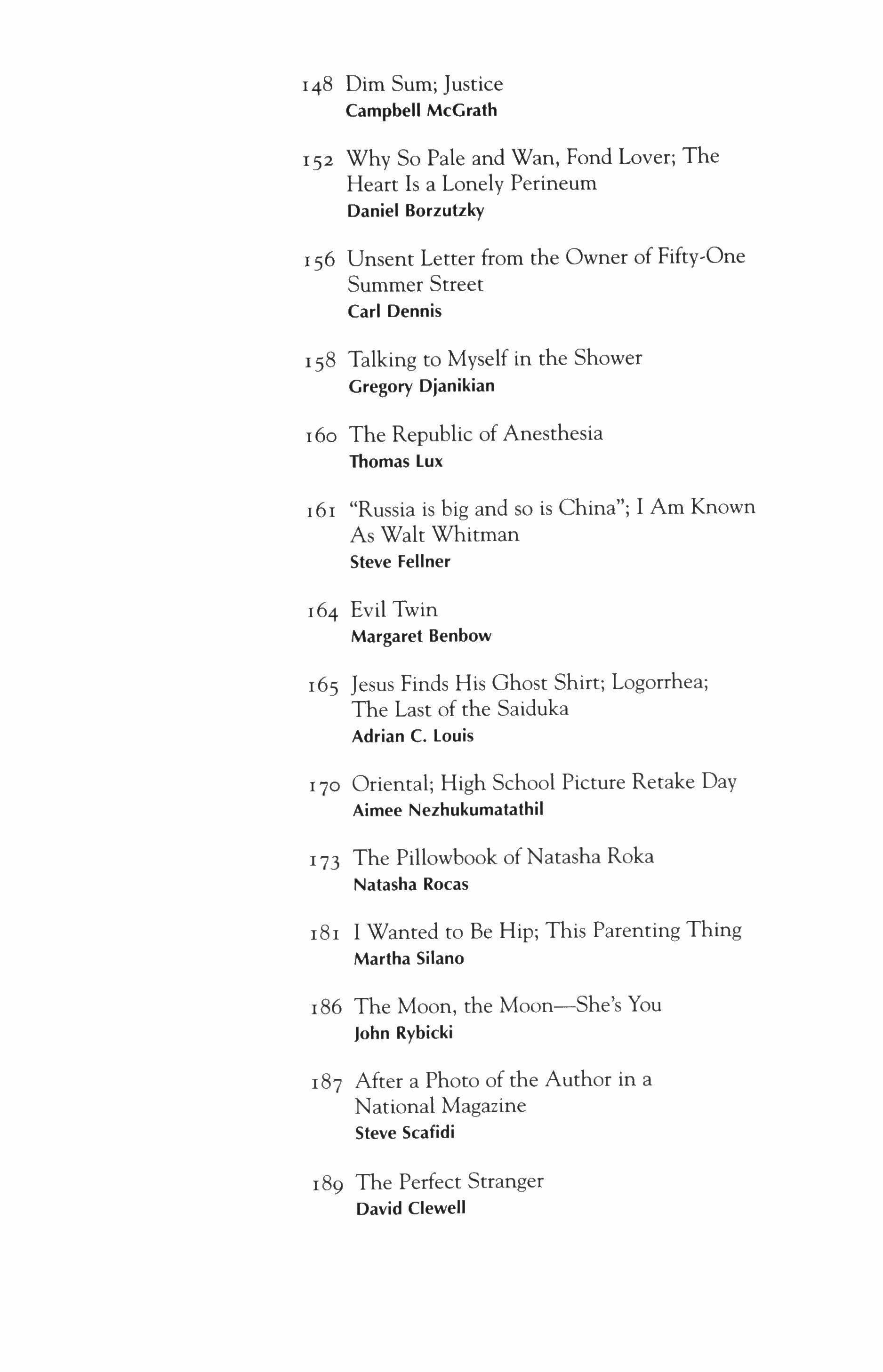
148 Dim Sum; Justice
Campbell McGrath
152 Why So Pale and Wan, Fond Lover; The Heart Is a Lonely Perineum
Daniel Borzutzky
156 Unsent Letter from the Owner of Fifty-One
Summer Street
Carl Dennis
158 Talking to Myself in the Shower
Gregory Djanikian
160 The Republic of Anesthesia
Thomas Lux
r61 "Russia is big and so is China"; I Am Known As Walt Whitman
Steve Fellner
164 Evil Twin
Margaret Benbow
165 Jesus Finds His Ghost Shirt; Logorrhea; The Last of the Saiduka
Adrian C. Louis
170 Oriental; High School Picture Retake Day
Aimee Nezhukumatathil
173 The Pillowbook of Natasha Roka
Natasha Rocas
181 I Wanted to Be Hip; This Parenting Thing
Martha Silano
186 The Moon, the Moon-She's You
John Rybicki
187 After a Photo of the Author in a National Magazine
Steve Scafidi
189 The Perfect Stranger
David Clewell

Cathleen Calbert
195 Text Panel
Caroline Knox
196 Nibbles; The Unknown Albeit, or While Reading a Friend's Prize-Winning Book on Love's Vicissitudes He Writes about Words
Roy Jacobstein
201 Depression; Dear Professor
Nin Andrews
203 Who Chose Marie Antoinette; Who Chose Golda Meir
Danielle Pafunda 205 Harriet Matthias Wickersham
Joseph Millar 208 The Waterfall Collector
Dick Allen 211 Mid-Life Lullaby
Amy Gerstler 212 Unspoiled
Wanda Coleman 214 The Violet Bends to the Stubble Skirting It
Khaled Mattawa
My Frigidaire
Cynie Cory
Joyelle McSweeney
224 Portrait of My Lover Singing in Traffic; A Fact Which Occurred in America
James Hall
Musives and a Silent Crump
Tom C. Hunley
192
Pirating
219
221 Septina
228

230 Ode to My Pantry
Jill Drumm
233 Between Classes; Opening Credits; Recycled Air
David
Graham
Cover: Photo by Barbara Hamby
Barbara Hamby and David Kirby

Pleasure First
Grown-up readers apply the same test to literature that kindergartners do, says Auden; the only question worth asking of a poem or story or play is, do I like it? As adults, often we take up a book because someone tells us to or we think we should or we believe it might benefit us in some way. Originally, though, we all came to poetry though pleasure. This issue of TriQuarterly consists of poems that give its editors a heightened pleasure, one that can be accounted for at least partially in this introduction.
The phrase "ultra-talk" first appeared in a 2002 essay called "Gabfest" by Mark Halliday about David Kirby's collection The House of Blue Light. There Halliday defines the ultra-talk poem as one in which detailed anecdotes, bits of pop culture past and present, and references to books read, are woven together, as though the poet is saying, "'These seven or eleven things are swirling in my head and I feel an emotional circuit among them and this poem is trying to light up the whole circuit.'" To Halliday, this type of poetry is hyperjunctive rather than disjunctive (like Ashbery's, say); he calls Kirby's "an anti-leap aesthetic" but says "if he does hop occasionally, he announces it loudly and makes sure you hop alongside him without spilling your drink."
A few years after "Gabfest" appeared, David Graham published an essay called "The Ultra-Talk Poem and Mark Halliday," where he extends the phrase to the work of Denise Duhamel, David Clewell, Albert Goldbarth, Barbara Hamby, and, mainly, that of Halliday himself. Graham also gives his own definition of ultra-talk poetry, calling it
II
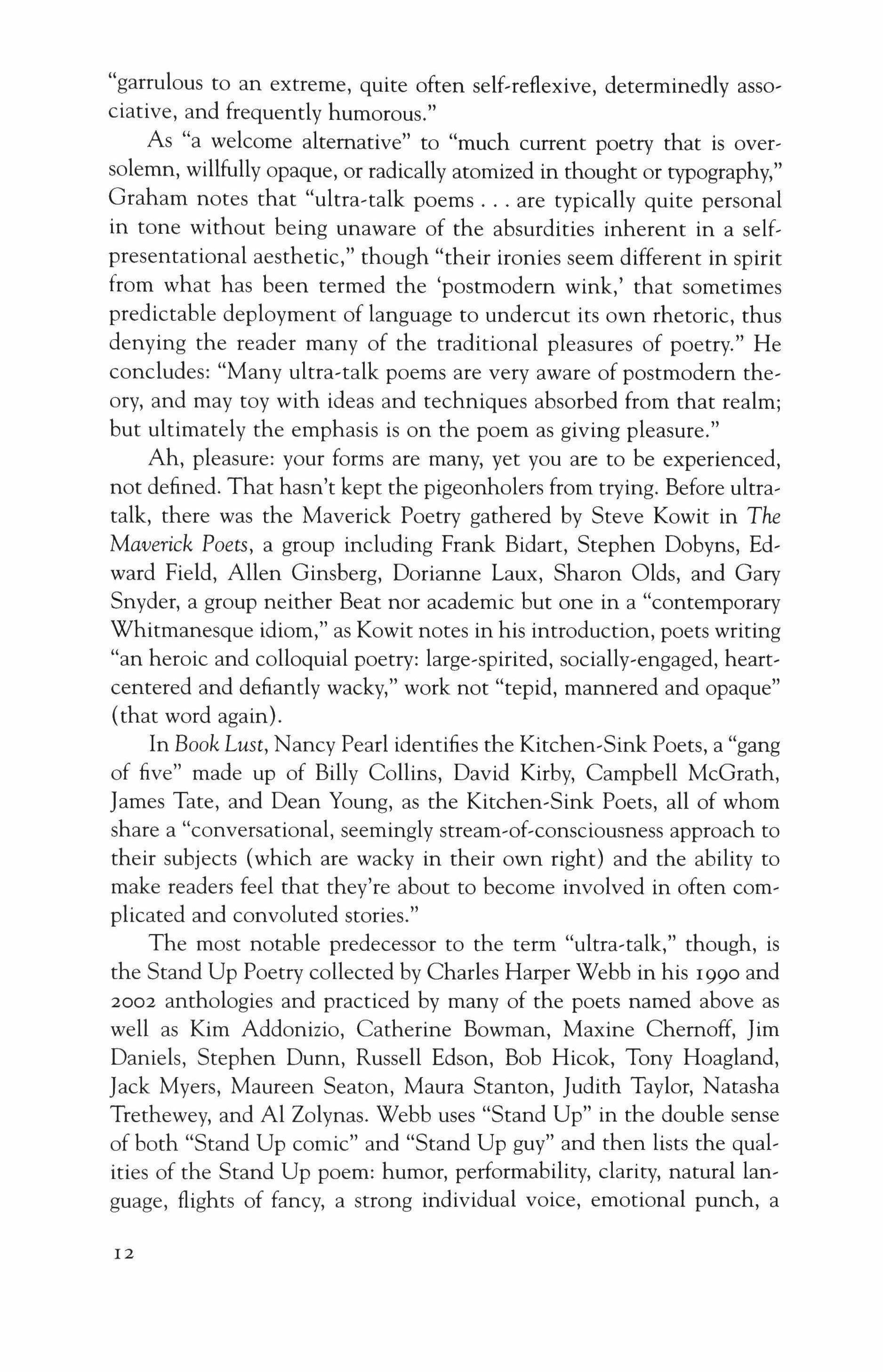
"garrulous to an extreme, quite often self-reflexive, determinedly associative, and frequently humorous."
As "a welcome alternative" to "much current poetry that is oversolemn, willfully opaque, or radically atomized in thought or typography," Graham notes that "ultra-talk poems are typically quite personal in tone without being unaware of the absurdities inherent in a selfpresentational aesthetic," though "their ironies seem different in spirit from what has been termed the 'postmodern wink,' that sometimes predictable deployment of language to undercut its own rhetoric, thus denying the reader many of the traditional pleasures of poetry." He concludes: "Many ultra-talk poems are very aware of postmodern theory, and may toy with ideas and techniques absorbed from that realm; but ultimately the emphasis is on the poem as giving pleasure."
Ah, pleasure: your forms are many, yet you are to be experienced, not defined. That hasn't kept the pigeonholers from trying. Before ultratalk, there was the Maverick Poetry gathered by Steve Kowit in The Maverick Poets, a group including Frank Bidart, Stephen Dobyns, Edward Field, Allen Ginsberg, Dorianne Laux, Sharon Olds, and Gary Snyder, a group neither Beat nor academic but one in a "contemporary Whitmanesque idiom," as Kowit notes in his introduction, poets writing "an heroic and colloquial poetry: large-spirited, socially-engaged, heartcentered and defiantly wacky," work not "tepid, mannered and opaque" (that word again).
In Book Lust, Nancy Pearl identifies the Kitchen-Sink Poets, a "gang of five" made up of Billy Collins, David Kirby, Campbell McGrath, James Tate, and Dean Young, as the Kitchen-Sink Poets, all of whom share a "conversational, seemingly stream-of-consciousness approach to their subjects (which are wacky in their own right) and the ability to make readers feel that they're about to become involved in often complicated and convoluted stories."
The most notable predecessor to the term "ultra-talk," though, is the Stand Up Poetry collected by Charles Harper Webb in his 1990 and 2002 anthologies and practiced by many of the poets named above as well as Kim Addonizio, Catherine Bowman, Maxine Chernoff, Jim Daniels, Stephen Dunn, Russell Edson, Bob Hicok, Tony Hoagland, Jack Myers, Maureen Seaton, Maura Stanton, Judith Taylor, Natasha Trethewey, and Al Zolynas. Webb uses "Stand Up" in the double sense of both "Stand Up comic" and "Stand Up guy" and then lists the qualities of the Stand Up poem: humor, performability, clarity, natural language, flights of fancy, a strong individual voice, emotional punch, a
12

close relationship to fiction, use of urban and popular culture, and wideopen subject matter.
And whether they acknowledge it or not, all of these essayists and anthologists, including the co-editors of this issue of TriQuarterly, owe much to the idea of"leaping poetry" discussed by Robert Bly in his I 975 book in which he describes the wild association and surrealism of such poets as Neruda, Lorca, and Vallejo.
"A Wild Irregular Strain"
By now, the reader with a sense of history will be saying, "What's so new about all of this? Poets have been writing this way for years!" Both Mark Halliday and David Graham would agree with this hypothetical reader. Halliday says that ultra-talk goes back through the poetry of Kenneth Koch and Frank O'Hara to that of Swift and Byron; Graham lists Kenneth Fearing, Paul Blackburn, and A. R. Ammons as recent practitioners and includes Coleridge among ultra-talk's Neoclassical and Romantic forefathers.
Indeed, isn't ultra-talk as old as poetry itself-hasn't some form of it been written, not for years, but for millennia? Before there was Maverick or Kitchen-Sink or Stand Up Poetry or Leaping Poetry, there was dithyrambic poetry; the word "dithyramb," which originally meant "a frenzied, impassioned choric hymn and dance of ancient Greece in honor of Dionysus," has come to mean "a wildly enthusiastic speech or piece of writing" or "poem written in a wild irregular strain." Neither lyric nor narrative, the dithyramb embraces both the emotionalism of the former and the sprawl of the latter.
The greatest poetry in the dithyrambic tradition may be found in Euripides' Bacchae, and the six poetical books of the Old Testament (Job, Psalms, Proverbs, Ecclesiastes, Song of Solomon, and Lamentations) stand as a fine example from the [udeo-Christian tradition. It may be no accident that religion and dithyrambs seem closely tied, since dialogue is at the heart of confrontations between mortals and their maker. All journeys to the underworld are dithyrambic in one way or another, as seen in the relevant parts of The EPic of Gilgamesh, The Iliad, The Odyssey, The Aeneid, and The Vision ofTundal, a twelfth-century account of an Irish knight's trip through Hell.
The master traveler to dark realms is, of course, Dante. Down to hell he goes, not alone but accompanied by his master, the Virgil who guided
I3

him as Dante guides us, and there he sees every manner of creature: bad popes, virtuous pagans, heroes from legend like Odysseus, three-headed dogs, harpies, centaurs, imps and demons and Satan himself, his beloved Beatrice, angel-headed hipsters, saintly motorcyclists. Yes, it is Ginsberg's Howl that is paraphrased at the end of this list, but that is because these two poets would have much to say to each other: they would disagree violently on many matters, and Dante would not have hesitated to put Ginsberg in Circle Seven of his Inferno with the other sodomites, but they would have conversed brilliantly because each had a large mind and loved learning.
"A Foxy and Relentlessly Slippery Flexibility'!
Between Dante Alighieri and Allen Ginsberg there are many "wildly enthusiastic speeches or pieces of writing," notably those that occur in the plays of Shakespeare, a master at mixing levels of rhetoric, speaking to both courtiers and groundlings alike when he uses a polysyllabic Latinate word and then "translates" it with a crisp Anglo-Saxon synonym, as in Act II, Scene ii of Twelfth Night, when Sir Andrew Aguecheek listens to a song sung by Feste and pronounces his voice "mellifluous" and then, in his next line, "sweet."
Shakespeare was derided for his lack of education by such jealous contemporaries as Robert Greene, who sneered that he was "Maister of Artes in Neither University" (this enmity didn't bother Shakespeare, who cheerfully filched the plot of The Winter's Tale from Greene's Fzmdosto: The Triumph of Time). But he possessed a tool greater by far than any a university could give him; he had at his command what Simon Winchester, in his history of the Oxford English Dictionary, calls the "foxy and relentlessly slippery flexibility" of the English language.
Camille Paglia writes of growing up in an Italian-speaking cornrnunity in upstate New York and then falling hard for English, for "what fascinated me about English was what I later recognized as its hybrid etymology: blunt Anglo-Saxon concreteness, sleek Norman French urbanity, and polysyllabic Greco-Roman abstraction. The clash of these elements, as competitive as Italian dialects, is invigorating, richly entertaining, and often funny, as it is to Shakespeare, who gets tremendous effects out of their interplay. The dazzling multiplicity of sounds and word choices in English makes it brilliantly suited to be a language of
14

poetry The words jostle and provoke one another and mischievously shift their meanings over time."
As with much else in contemporary culture, a huge debt is owed to Shakespeare for using so many now-familiar words for the first time, as when, for example, he added the Norman French -able to Old English laugh to allow Salanio in The Merchant of Venice to declare a jest laughable. And the rich stew of English that is compounded largely of the three linguistic traditions that Paglia mentions has been further thickened by words from dozens of other languages, including Malay (bamboo, ketchup), Turkish (kiosk, sofa), Algonquian (raccoon, wampum), and Dutch (cruise, knapsack).
Not every ayatollah (Persian) or mullah (Urdu) is likely to endorse Simon Winchester's chest-thumping description of English as "so vast, so sprawling, so wonderfully unwieldy, so subtle, and now in its neverending fullness so undeniably magnificent." Yet no one can deny the language's utility to such word-drunk poets as William Blake, whose "Marriage of Heaven and Hell" blends the chatter of devils and angels with the screeches of copulating, cannibalistic monkeys as well as the speaker's mid-journey refutations of Aristotle and Swedenborg.
After Blake, the greatest dithyrambic poets of modem times are Whitman and Ginsberg; H.D. and Anne Waldman are their children, as are, in many ways, such performance artist as Tracie Morris and the poets of the Nuyorican Cafe. And while this is not the place to explore broader applications, surely Nietzsche and Melville wrote dithyrambic prose, work rich in Bakhtinian heteroglossia; there is much in their work of the "carnivalesque" and "polyvocal," to use terms borrowed from European criticism (or the "riotous" and "many-voiced," as we Anglophones might say). In fact, as evidenced by the work of Mikhail Bakhtin and Camille Paglia themselves, there is even a dithyrambic criticism-indeed, much, perhaps most, of poststructuralist theory might be called dithyrambic.
Throughout the long history of the kind of writing that is described here, one consistent note is that of laughter, a sound heard too seldom in contemporary poetry. That, according to Billy Collins, is "the fault of the Romantics, who eliminated humor from poetry. Shakespeare's hilarious, Chaucer's hilarious. [Then] the Romantics killed off humor, and they also eliminated sex, things which were replaced by landscape. I thought that was a pretty bad trade-off, so I'm trying to write about humor and landscape, and occasionally sex."

A Philosophy of Composition
To add to what Mark Halliday and David Graham have offered by way of definition, this essay will conclude with the co-editors' own list of ultra,talk poetry's most eye-catching features.
Not that every {or, for that matter, any} poet here wrote with these features in mind, at least as they are defined below. But John Maynard Keynes said famously that a person who thinks himself free from intellectual influence is usually "the slave of some defunct economist." {Keynes also said "words ought to be a little wild, for they are the as, saults of thoughts on the unthinking."} And from the time of Aristotle and Horace to the present day, every poet has had a poetics, consciously or not. In "The Philosophy of Composition," Poe provides a checklist for everything a good poem needs, and if Poe's formula leaves out such innate qualities as excellence, that doesn't detract from the fact that "The Raven" is a great and talky poem.
Not every ultra,talk poem is going to have the same characteristics. But a philosophy of composition for ultra,talk poets and their readers would include these traits:
I. A poem features the voice of a speaker but other voices as well, at least by implication: the speech of an actor standing alone in a pen, cil spotlight is made richer by the eloquence of the players who are only temporarily silent.
2. A poem will focus on the present moment but also convey an aware, ness of a larger world of time and space: a moment is most resonant when it appears to have a past and a future as well as dimensions on every side.
3. A poem that deals in comedy will acknowledge tragedy. And the other way around: the funniest poem will have a dark heart, just as a good sad poem will seem to have been written by a poet capable of laughter.
4. A poem that works on stage will work on the page as well: the best poems are a delight to hear aloud but will also grow richer during a silent rereading.
It's no accident that these characteristics of ultra-talk poetry are ex, pressed as paired opposites, for the ultra-talk poem is willing to include or at least consider everything.
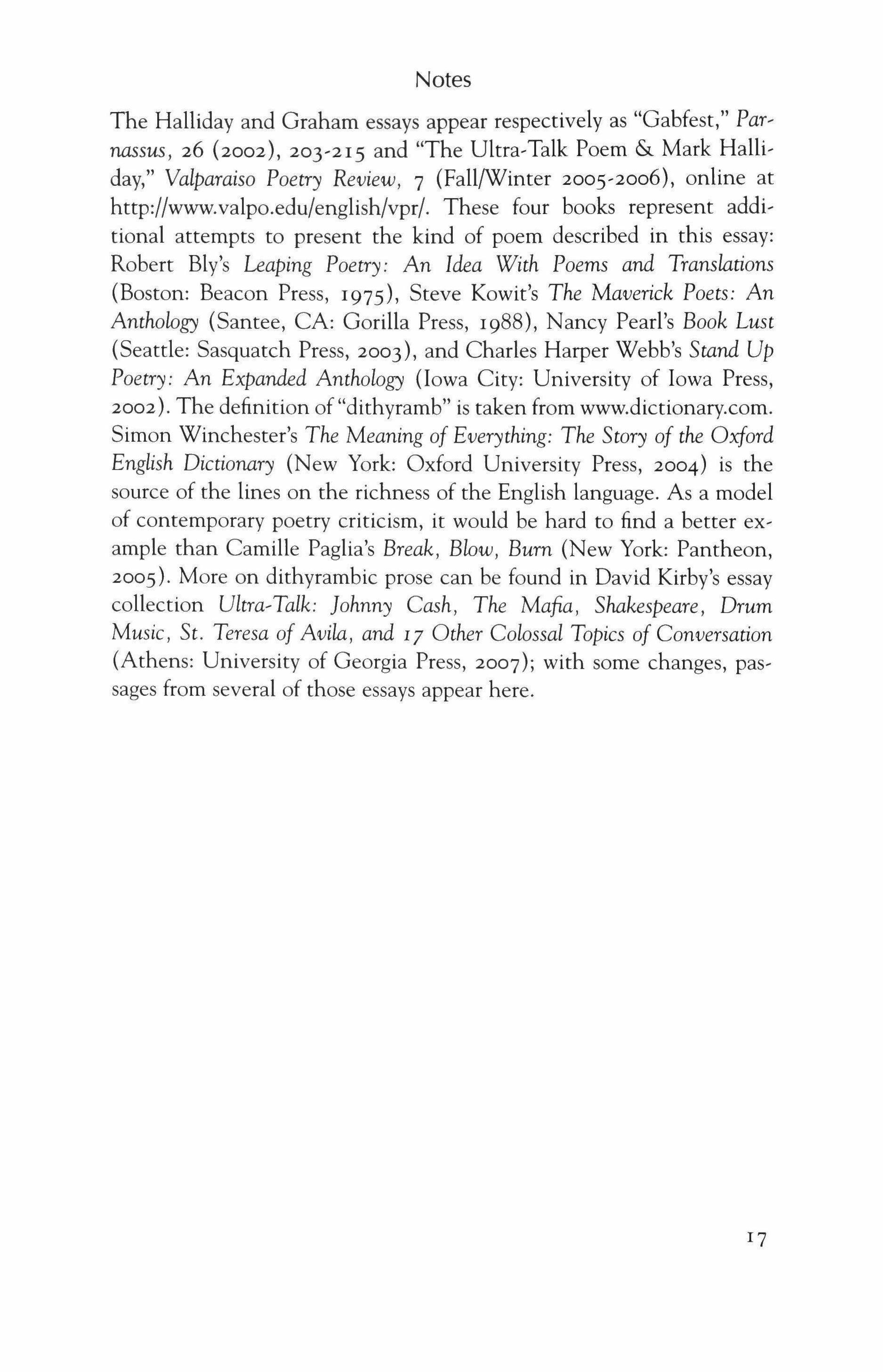
Notes
The Halliday and Graham essays appear respectively as "Gabfest," Par� nassus, 26 (2002), 203�215 and "The Ultra-Talk Poem & Mark Halliday," Valparaiso Poetry Review, 7 (Fall/Winter 2005-2006), online at http://www.valpo.edu/english/vpr/. These four books represent additional attempts to present the kind of poem described in this essay: Robert Bly's Leaping Poetry: An Idea With Poems and Translations (Boston: Beacon Press, 1975), Steve Kowit's The Maverick Poets: An Anthology (Santee, CA: Gorilla Press, 1988), Nancy Pearl's Book Lust (Seattle: Sasquatch Press, 2003), and Charles Harper Webb's Stand Up Poetry: An Expanded Anthology (Iowa City: University of Iowa Press, 2002). The definition of "dithyramb" is taken from www.dictionary.com. Simon Winchester's The Meaning of Everything: The Story of the Oxford English Dictionary (New York: Oxford University Press, 2004) is the source of the lines on the richness of the English language. As a model of contemporary poetry criticism, it would be hard to find a better example than Camille Paglia's Break, Blow, Burn (New York: Pantheon, 2005). More on dithyrambic prose can be found in David Kirby's essay collection Ultra�Talk: Johnny Cash, The Mafia, Shakespeare, Drum Music, St. Teresa of Avila, and 17 Other Colossal Topics of Conversation (Athens: University of Georgia Press, 2007); with some changes, passages from several of those essays appear here.
Albert Goldbarth

Channeling the Lord
She says God talks to her through her TV.
National Enquirer
Not surprising-not if the Book and the books are right about immanence and ubiquity. Then, he would speak to us through everything. The heart, and the artichoke heart; the bleeding orange of the sunset as it dawdles on the laketop, and the mortuary version of that color in the potted meat as it's tinned in its tum on the can line. Once there's everything, there is no "bathos." Presupposing an everything, then "discrepancy" disappears from the dictionary. The voice in the thickening steam as it issues from a vent in the dim of the oracle's cave; the voice in the vent, the bubbling ocean-bottom vent, where ten-foot tube worms extend and retract and extend in a primal frolic of water so impossibly hot it would melt a sunken car to dribble. And we needn't be ordained or on our knees or in a vision-state of shamanic tiZZY, not if "omnipresent" is our key word: then, the voice of imprecation and measured shipwright details Noah heard, the voice that gently blew on its waiting materials to kindle a flame in the brain ofJoan of Arc, would speak with authority through the stately, circumjubilant rings of Saturn; and no less so through the nipple rings on sale this week only at the Dundjinn. Fraught. Consoling. Oblique. Instructional. Through the bush that revealed the journey's way to Moses, and still it was not consumed; as well as through the rubbish fire I smote out of existence just last night in the darkened parking lot
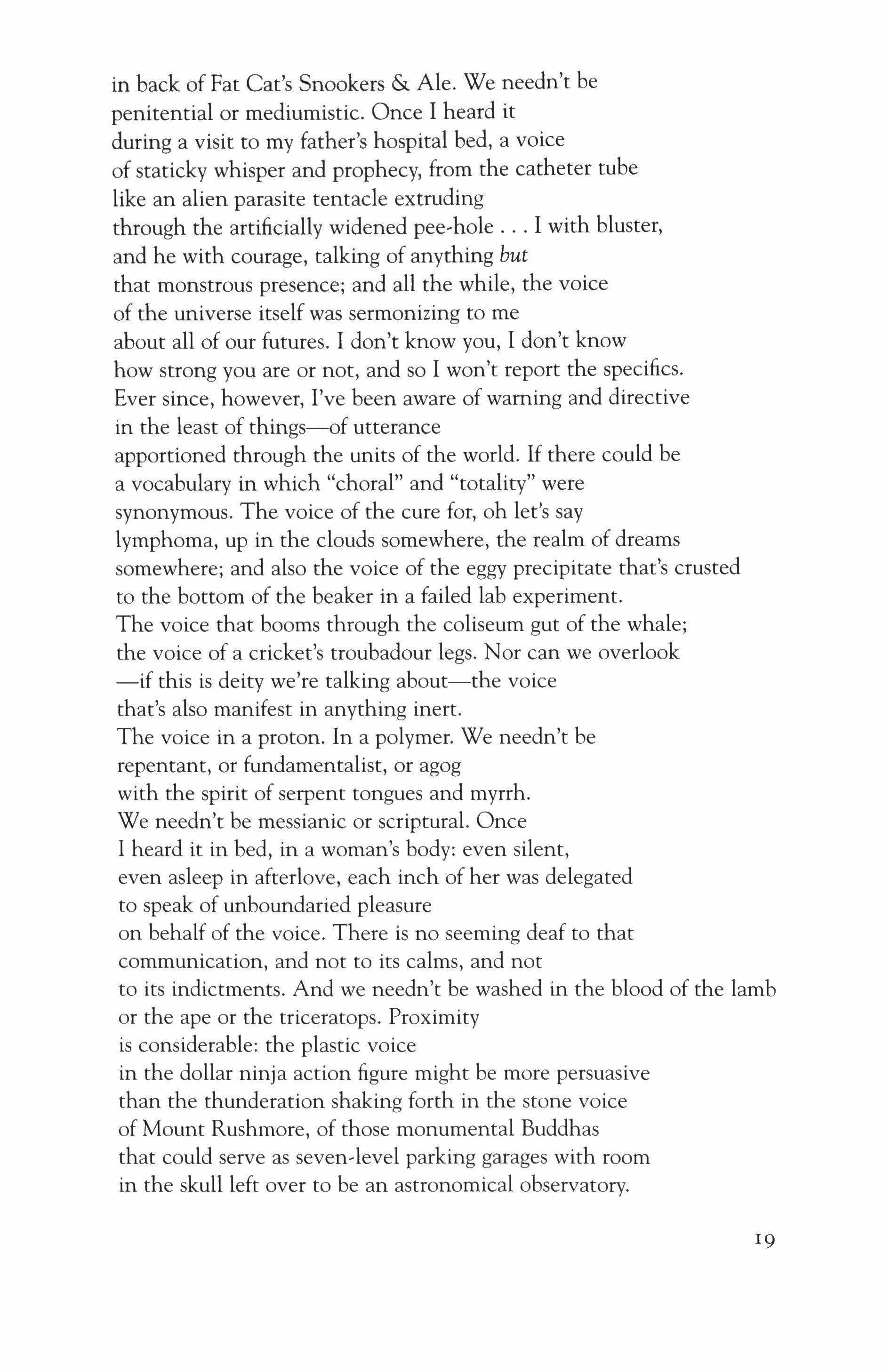
in back of Fat Cat's Snookers & Ale. We needn't be penitential or mediumistic. Once I heard it during a visit to my father's hospital bed, a voice of staticky whisper and prophecy, from the catheter tube like an alien parasite tentacle extruding through the artificially widened pee-hole I with bluster, and he with courage, talking of anything but that monstrous presence; and all the while, the voice of the universe itself was sermonizing to me about all of our futures. I don't know you, I don't know how strong you are or not, and so I won't report the specifics. Ever since, however, I've been aware of warning and directive in the least of things-of utterance apportioned through the units of the world. If there could be a vocabulary in which "choral" and "totality" were synonymous. The voice of the cure for, oh let's say lymphoma, up in the clouds somewhere, the realm of dreams somewhere; and also the voice of the eggy precipitate that's crusted to the bottom of the beaker in a failed lab experiment. The voice that booms through the coliseum gut of the whale; the voice of a cricket's troubadour legs. Nor can we overlook -if this is deity we're talking about-the voice that's also manifest in anything inert. The voice in a proton. In a polymer. We needn't be repentant, or fundamentalist, or agog with the spirit of serpent tongues and myrrh. We needn't be messianic or scriptural. Once I heard it in bed, in a woman's body: even silent, even asleep in afterlove, each inch of her was delegated to speak of unboundaried pleasure on behalf of the voice. There is no seeming deaf to that communication, and not to its calms, and not to its indictments. And we needn't be washed in the blood of the lamb or the ape or the triceratops. Proximity is considerable: the plastic voice in the dollar ninja action figure might be more persuasive than the thunderation shaking forth in the stone voice of Mount Rushmore, of those monumental Buddhas that could serve as seven-level parking garages with room in the skull left over to be an astronomical observatory.
19
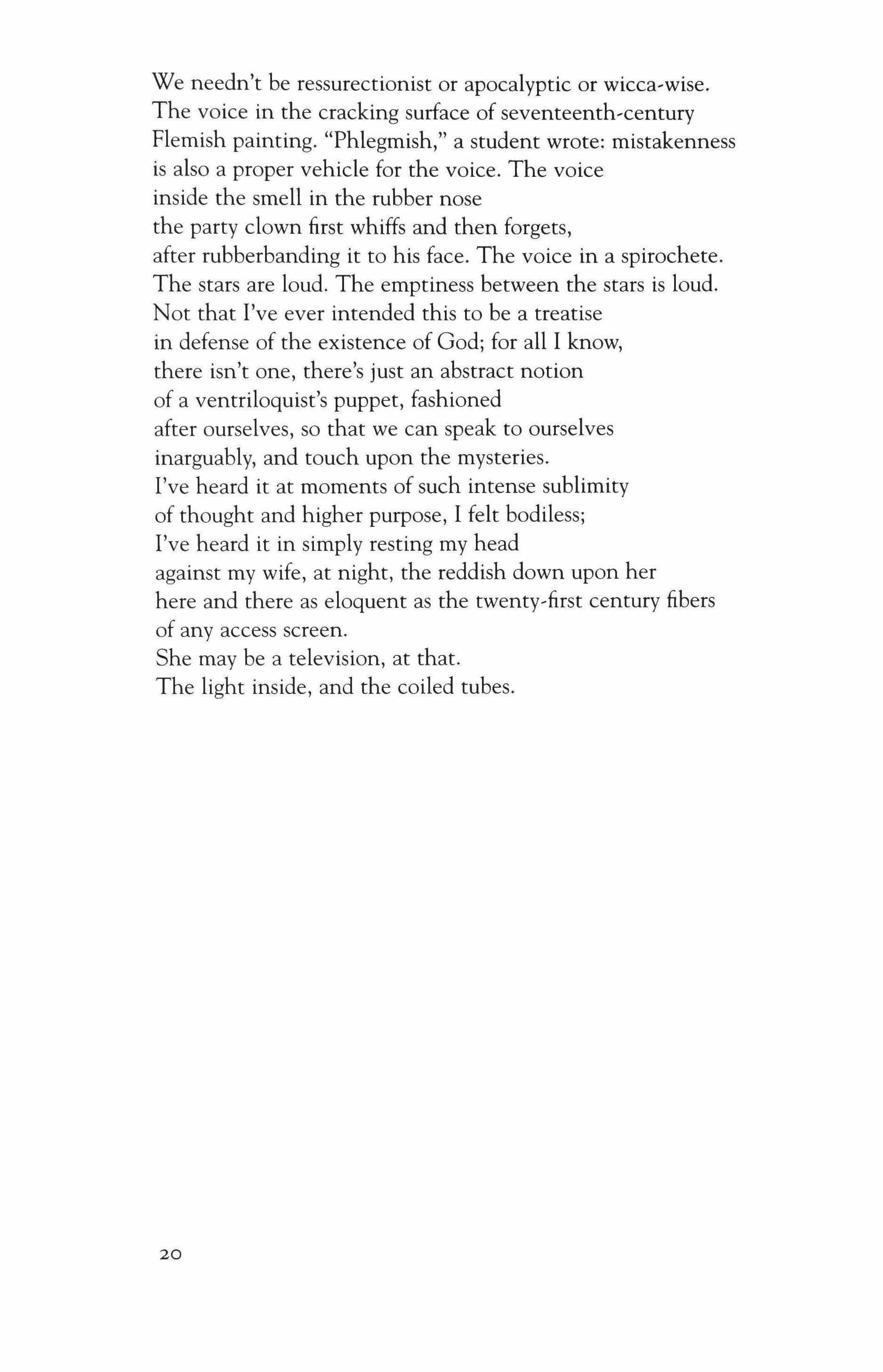
We needn't be ressurectionist or apocalyptic or wicca-wise. The voice in the cracking surface of seventeenth-century Flemish painting. "Phlegmish," a student wrote: mistakenness is also a proper vehicle for the voice. The voice inside the smell in the rubber nose the party clown first whiffs and then forgets, after rubberbanding it to his face. The voice in a spirochete. The stars are loud. The emptiness between the stars is loud. Not that I've ever intended this to be a treatise in defense of the existence of God; for all I know, there isn't one, there's just an abstract notion of a ventriloquist's puppet, fashioned after ourselves, so that we can speak to ourselves inarguably, and touch upon the mysteries. I've heard it at moments of such intense sublimity of thought and higher purpose, I felt bodiless; I've heard it in simply resting my head against my wife, at night, the reddish down upon her here and there as eloquent as the twenty-first century fibers of any access screen. She may be a television, at that. The light inside, and the coiled tubes.
20

I.
On the inner side of the door: a couple in bed; out here, a man is kneeled, squinting through the keyhole. In a similar scene, a man is kneeling in front of a flap of the world, and on its other side: another world, the starry gears, the planets and the moons, that tum the music of the universe. There's also the engraving of a woman (could she even be a nun? an errant nun? it's hard to see beneath the crumpled cloak-and-hood) who's crouched conspicuously (at least to our gaze), her ear against the side of a confessional booth. And so there's vast iconographic lineage behind this scene I remember -my sister and I are now supposed to be asleep, but we've positioned ourselves as silent as dust by the door at the top of the stairs, to strain to listen for the magic (or terror) (or prestidigitorial power) (or simple, blushing foolishness) on naked display when our parents entertained the Kirschners and Appelbaums. In the standard interpretation of this, we're little thieves: we want to leave with a gleaming strand or two of conversation that's not properly ours. And yet it was the opposite, too: we longed to donate, to join it. We wanted whatever small cork chips of childish majesty or depredation that bobbed in us, to enter that swirl -to enter the greater current.
Domestic Espionage
21
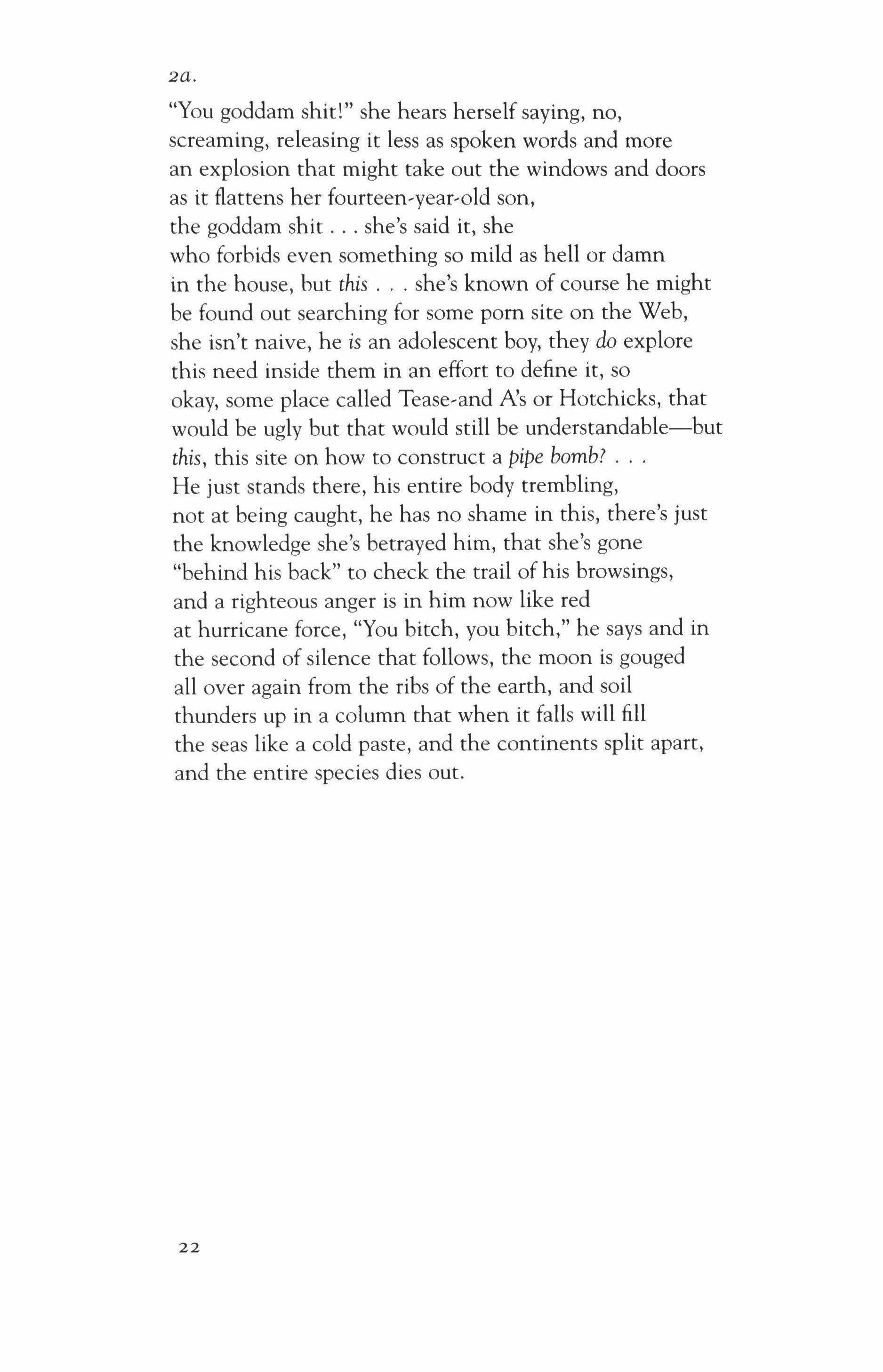
"You goddam shit!" she hears herself saying, no, screaming, releasing it less as spoken words and more an explosion that might take out the windows and doors as it flattens her fourteen-year-old son, the goddam shit she's said it, she who forbids even something so mild as hell or damn in the house, but this she's known of course he might be found out searching for some porn site on the Web, she isn't naive, he is an adolescent boy, they do explore this need inside them in an effort to define it, so okay, some place called Tease-and �s or Hotchicks, that would be ugly but that would still be understandable-but this, this site on how to construct a pipe bomb?
He just stands there, his entire body trembling, not at being caught, he has no shame in this, there's just the knowledge she's betrayed him, that she's gone "behind his back" to check the trail of his browsings, and a righteous anger is in him now like red at hurricane force, "You bitch, you bitch," he says and in the second of silence that follows, the moon is gouged all over again from the ribs of the earth, and soil thunders up in a column that when it falls will fill the seas like a cold paste, and the continents split apart, and the entire species dies out.
2a.
22

In the gardens off the nursing home this afternoon, the sun could calm a caffeine freak to drowsiness. The flowers are attended by bees as round as tugboats. Sheets of a sleepy perfume are covering everything. I'm lingering here while my friend M. is inside with her eighty-vear-old mother. I could almost think these gardens generate a secret herbal wonder that prohibits aging, everything is so still then "0 Jesus LOOK! Will you LOOK at this!"-and when I hustle into the hallway, "Albert, LOOK"-in her opened palm are ten gel capsules, scarlet-red, that puddle there as if she's revealing stigmata. "I was searching in her dresser drawer " she's breathless from only that little speech, she's rapidly matching the vibrant red in her hand, like some example of protective coloration at work, " and LOOK!" By now a forming crowd is at the door. "She SAVED these UP, she was going to KILL herself -WEREN'T YOU!" So this is love, mutated under pressure into something unrecognizable as love. "0 Jesus GOD! You bitch!" And as she says it -she tells me this later-her son, who's dead for five years now, is in the room, is staring at her with that same accusatory word corrupting the air between them. "I'm WARNING you if you kill yourself each syllable receives the measured emphasis of her finger dabbing its permanence into the fabric of this sad unraveling day I SWEAR to GOD I'm going to hurt you."
2b.
23
First Epistle of Lucia to Her Old Boyfriends
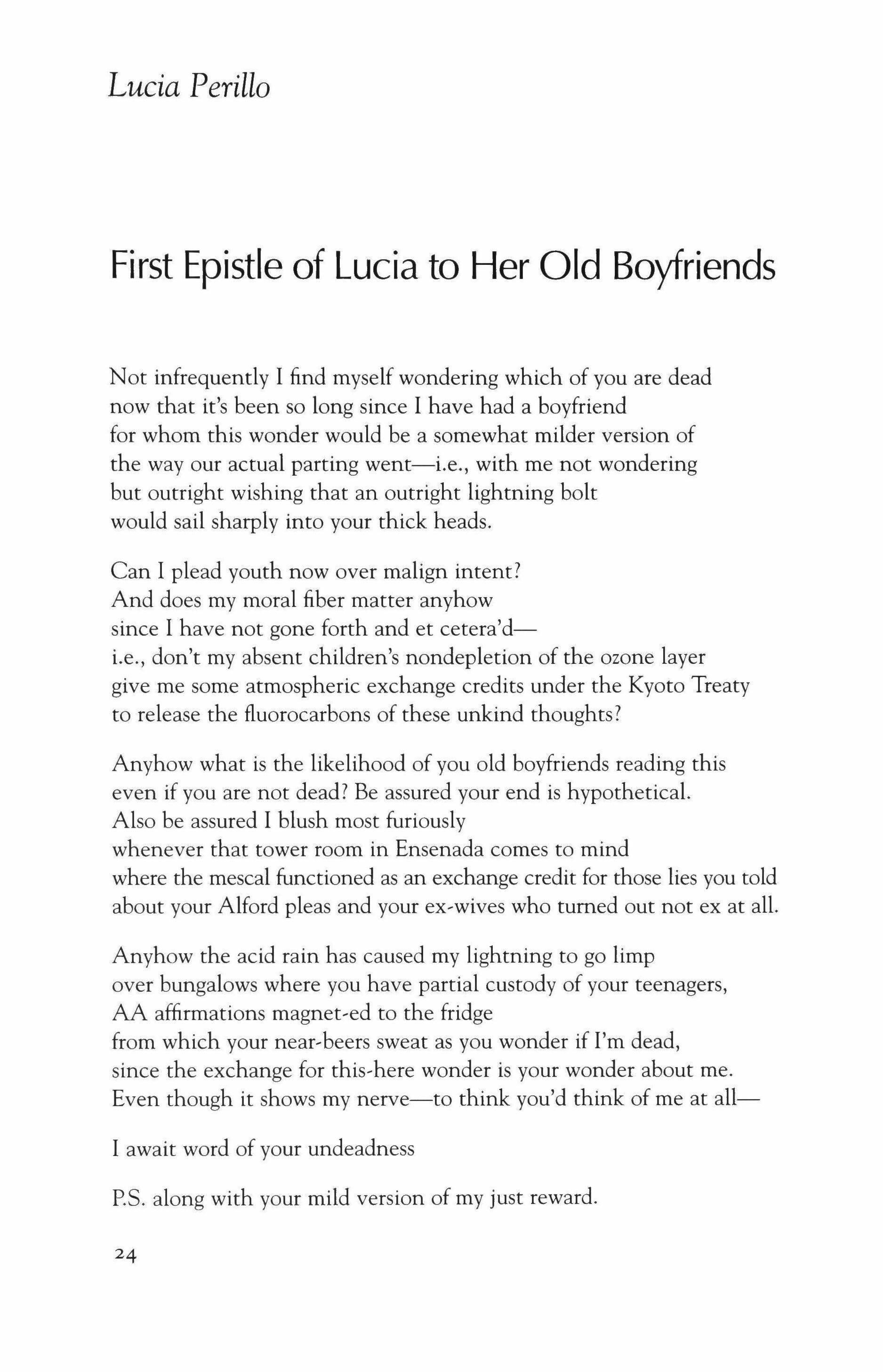
Not infrequently I find myself wondering which of you are dead now that it's been so long since I have had a boyfriend for whom this wonder would be a somewhat milder version of the way our actual parting went-i.e., with me not wondering but outright wishing that an outright lightning bolt would sail sharply into your thick heads.
Can I plead youth now over malign intent? And does my moral fiber matter anyhow since I have not gone forth and et cetera'di.e., don't my absent children's nondepletion of the ozone layer give me some atmospheric exchange credits under the Kyoto Treaty to release the fluorocarbons of these unkind thoughts?
Anyhow what is the likelihood of you old boyfriends reading this even if you are not dead? Be assured your end is hypothetical. Also be assured I blush most furiously whenever that tower room in Ensenada comes to mind where the mescal functioned as an exchange credit for those lies you told about your Alford pleas and your ex-wives who turned out not ex at all.
Anyhow the acid rain has caused my lightning to go limp over bungalows where you have partial custody of your teenagers, AA affirmations magnet-ed to the fridge from which your near-beers sweat as you wonder if I'm dead, since the exchange for this-here wonder is your wonder about me. Even though it shows my nerve-to think you'd think of me at all-
I await word of your undeadness
P.s. along with your mild version of my just reward.
Lucia Perillo
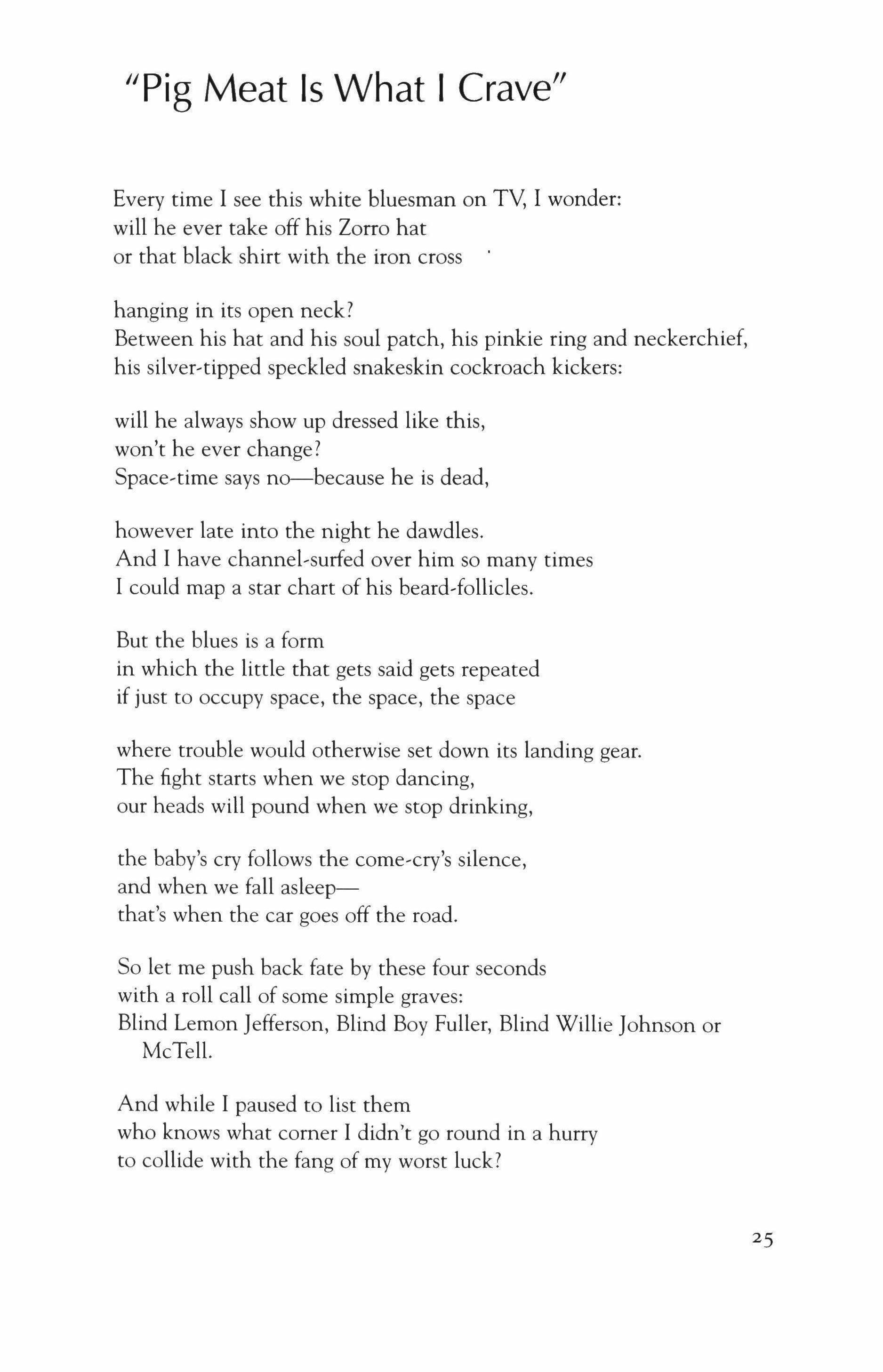
"Pig Meat Is What I Crave"
Every time I see this white bluesman on TV, I wonder: will he ever take off his Zorro hat or that black shirt with the iron cross hanging in its open neck?
Between his hat and his soul patch, his pinkie ring and neckerchief, his silver-tipped speckled snakeskin cockroach kickers: will he always show up dressed like this, won't he ever change?
Space-time says no-because he is dead, however late into the night he dawdles. And I have channel-surfed over him so many times I could map a star chart of his beard-follicles.
But the blues is a form in which the little that gets said gets repeated if just to occupy space, the space, the space where trouble would otherwise set down its landing gear. The fight starts when we stop dancing, our heads will pound when we stop drinking, the baby's cry follows the come-cry's silence, and when we fall asleepthat's when the car goes off the road.
So let me push back fate by these four seconds with a roll call of some simple graves: Blind Lemon Jefferson, Blind Boy Fuller, Blind Willie Johnson or McTeli.
And while I paused to list them who knows what comer I didn't go round in a hurry to collide with the fang of my worst luck?
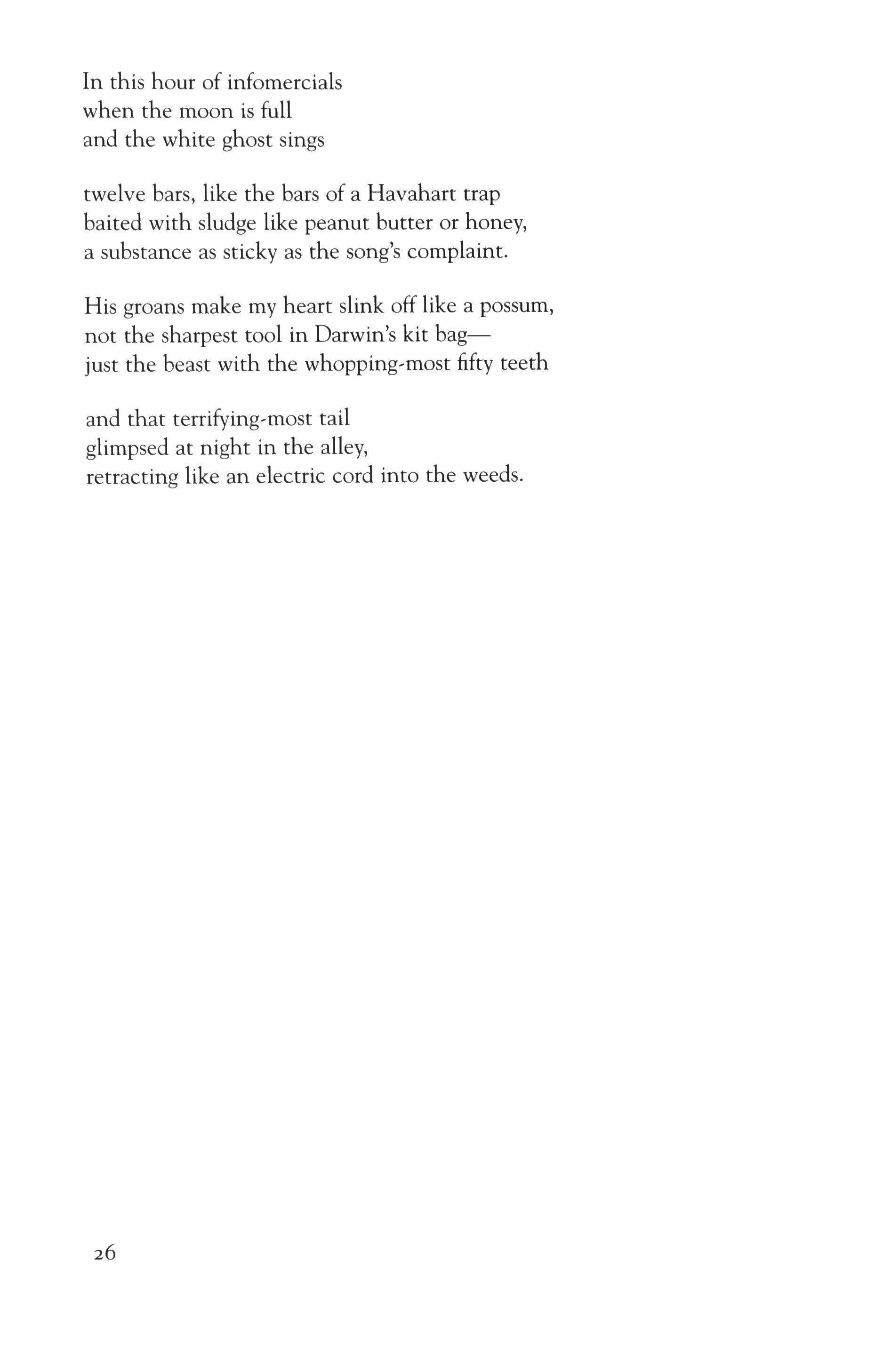
In this hour of infomercials when the moon is full and the white ghost sings
twelve bars, like the bars of a Havahart trap baited with sludge like peanut butter or honey, a substance as sticky as the song's complaint.
His groans make my heart slink off like a possum, not the sharpest tool in Darwin's kit bagjust the beast with the whopping-most fifty teeth and that terrifying-most tail glimpsed at night in the alley, retracting like an electric cord into the weeds.
Stephen Dobyns
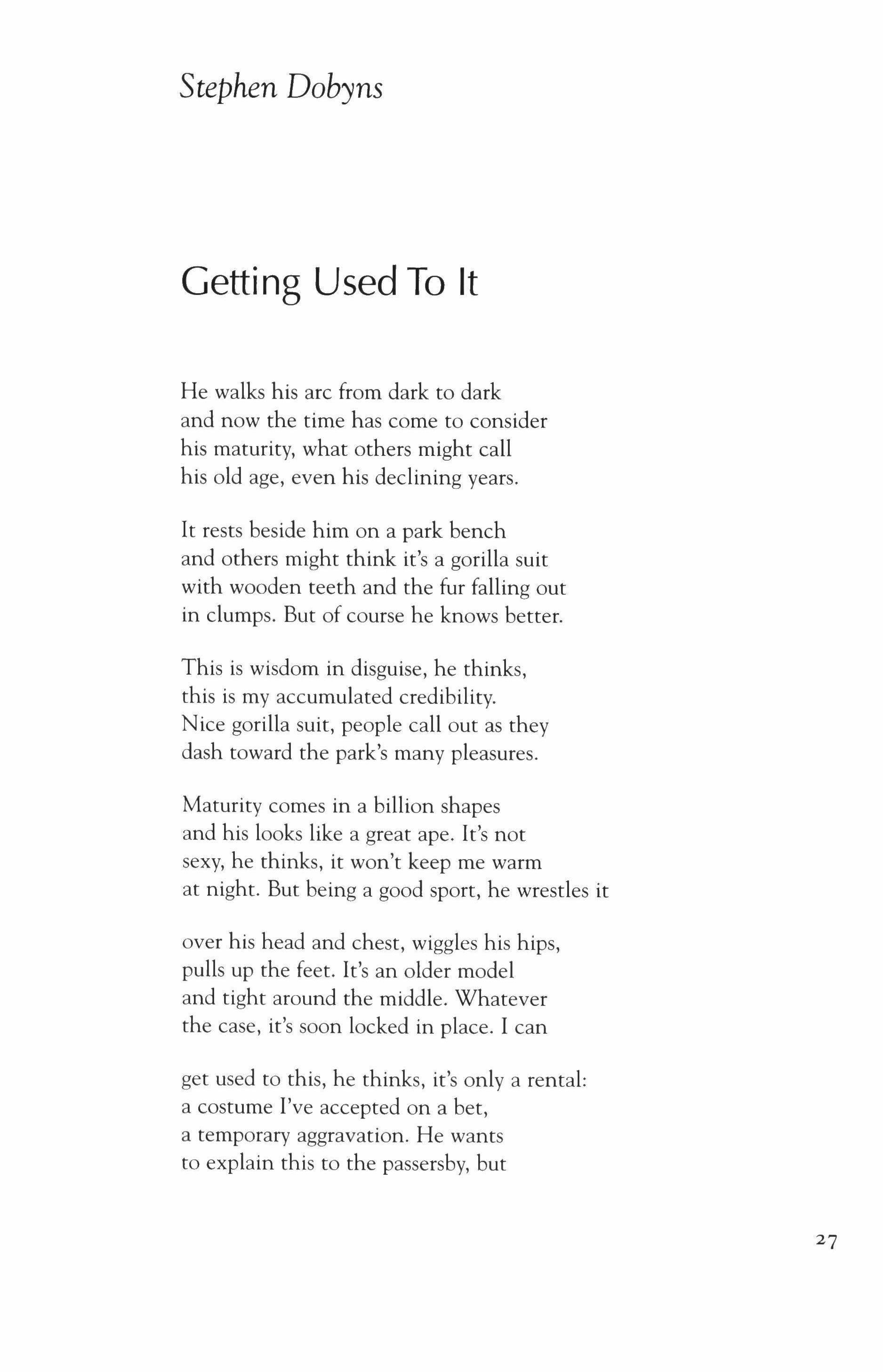
Getting Used To It
He walks his arc from dark to dark and now the time has come to consider his maturity, what others might call his old age, even his declining years.
It rests beside him on a park bench and others might think it's a gorilla suit with wooden teeth and the fur falling out in clumps. But of course he knows better.
This is wisdom in disguise, he thinks, this is my accumulated credibility. Nice gorilla suit, people call out as they dash toward the park's many pleasures.
Maturity comes in a billion shapes and his looks like a great ape. It's not sexy, he thinks, it won't keep me warm at night. But being a good sport, he wrestles it over his head and chest, wiggles his hips, pulls up the feet. It's an older model and tight around the middle. Whatever the case, it's soon locked in place. I can get used to this, he thinks, it's only a rental: a costume I've accepted on a bet, a temporary aggravation. He wants to explain this to the passersby, but
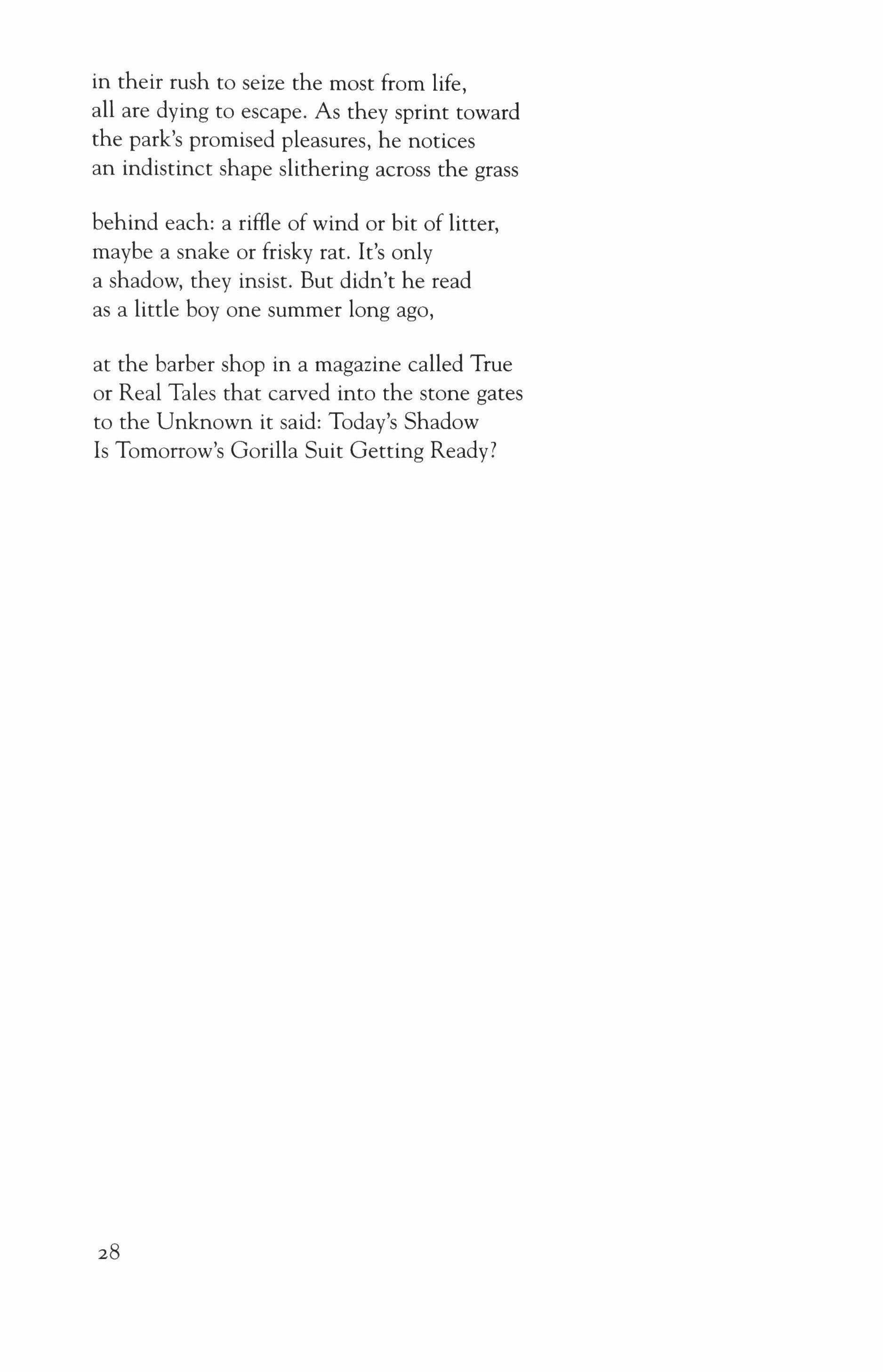
in their rush to seize the most from life, all are dying to escape. As they sprint toward the park's promised pleasures, he notices an indistinct shape slithering across the grass
behind each: a riffle of wind or bit of litter, maybe a snake or frisky rat. It's only a shadow, they insist. But didn't he read as a little boy one summer long ago,
at the barber shop in a magazine called True or Real Tales that carved into the stone gates to the Unknown it said: Today's Shadow Is Tomorrow's Gorilla Suit Getting Ready?
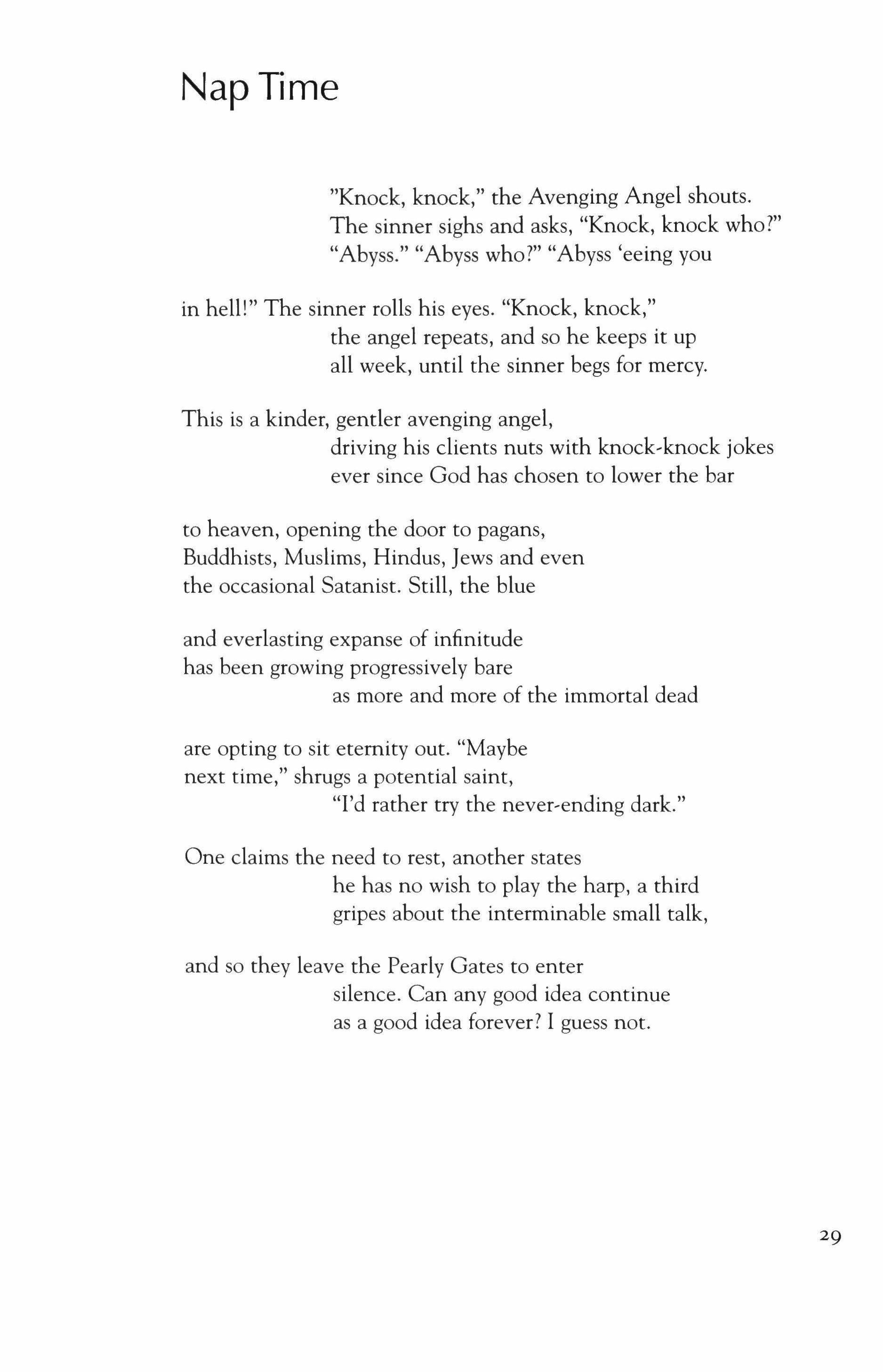
"Knock, knock," the Avenging Angel shouts. The sinner sighs and asks, "Knock, knock who?" "Abyss." "Abyss who?" "Abyss 'eeing you in hell!" The sinner rolls his eyes. "Knock, knock," the angel repeats, and so he keeps it up all week, until the sinner begs for mercy.
This is a kinder, gentler avenging angel, driving his clients nuts with knock-knock jokes ever since God has chosen to lower the bar
to heaven, opening the door to pagans, Buddhists, Muslims, Hindus, Jews and even the occasional Satanist. Still, the blue and everlasting expanse of infinitude has been growing progressively bare as more and more of the immortal dead
are opting to sit eternity out. "Maybe next time," shrugs a potential saint, "I'd rather try the never-ending dark."
One claims the need to rest, another states he has no wish to play the harp, a third gripes about the interminable small talk, and so they leave the Pearly Gates to enter silence. Can any good idea continue as a good idea forever? I guess not.
Nap Time
Tony Hoagland

Plastic
One could probably explain the whole world in terms of the plastic used now for almost everything-the little ivory forks at picnics and green toy dinosaurs in playrooms everywhere;
the rooks and pawns of cheap 4.95 chess sets made in the People's Republic of China
and those Tupperware containers which open with a perfect quiet pop to yield the tuna fish sandwich about to enter the mouth of the secretary on his lunchbreak.
You could talk about how the big molecules were bound in chains by chemical reactions, then liquefied and poured like soup
into intricate factory molds for toy soldiers and backscratchers, airsick bags and high-tech Teflon roofracks;
you could mull over the ethics of enslaving matter even while feeling admiration for the genius it takes to persuade a molecule to become part of a casserole container.
And what about plastic that has become dear to you? Personal plastic?
-the toothbrush and the flip-flops, the hollow plastic Easter egg which held jellybeans inside, the twelve-inch vinyl disk that in 1976 brought you Jezebel Brown and the Attorneys of Cool?
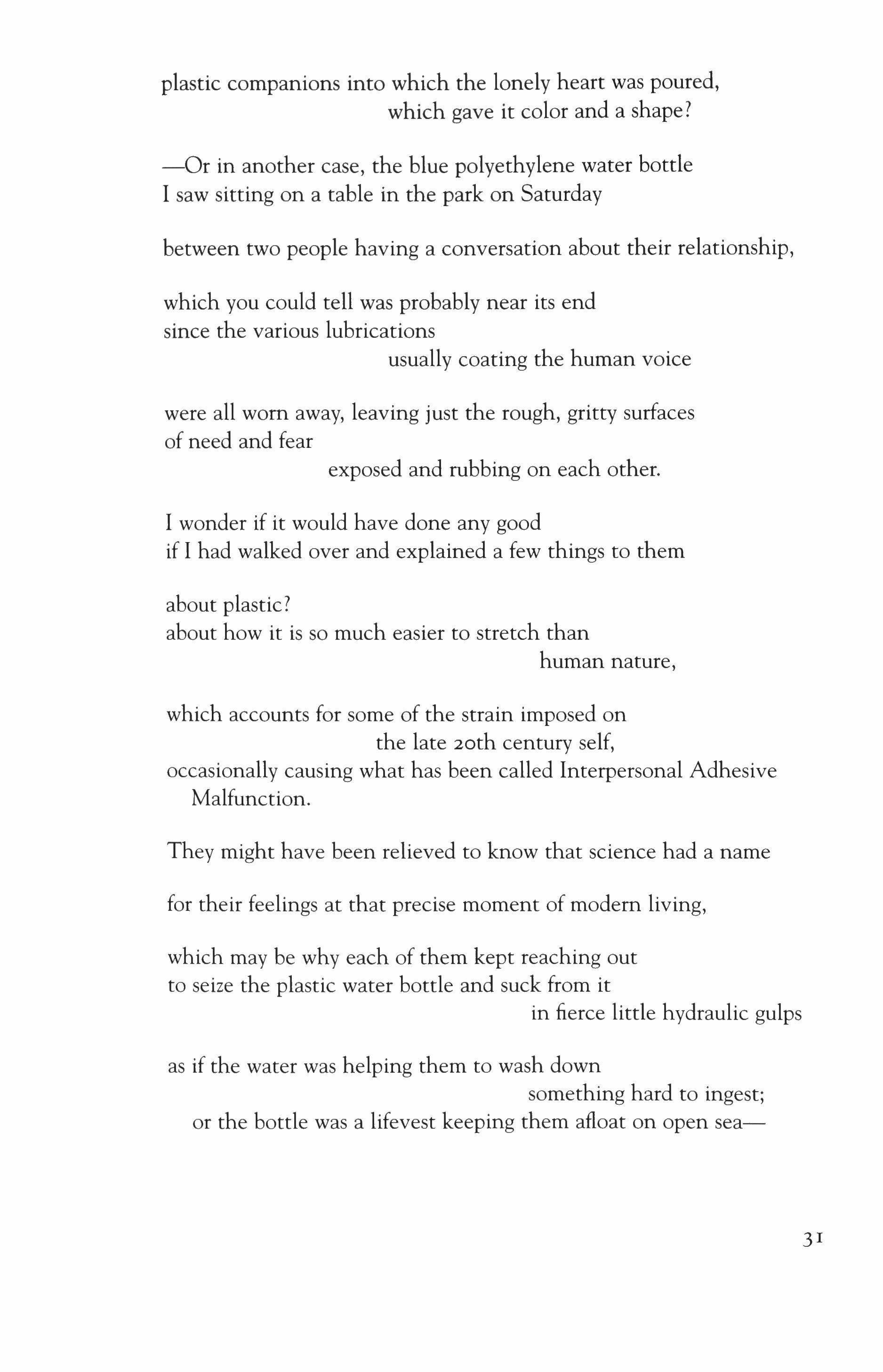
plastic companions into which the lonely heart was poured, which gave it color and a shape?
-Or in another case, the blue polyethylene water bottle I saw sitting on a table in the park on Saturday between two people having a conversation about their relationship, which you could tell was probably near its end since the various lubrications usually coating the human voice were all worn away, leaving just the rough, gritty surfaces of need and fear exposed and rubbing on each other.
I wonder if it would have done any good if! had walked over and explained a few things to them about plastic? about how it is so much easier to stretch than human nature, which accounts for some of the strain imposed on the late zoth century self, occasionally causing what has been called Interpersonal Adhesive Malfunction.
They might have been relieved to know that science had a name for their feelings at that precise moment of modem living, which may be why each of them kept reaching out to seize the plastic water bottle and suck from it in fierce little hydraulic gulps as if the water was helping them to wash down something hard to ingest; or the bottle was a lifevest keeping them afloat on open sea-
31
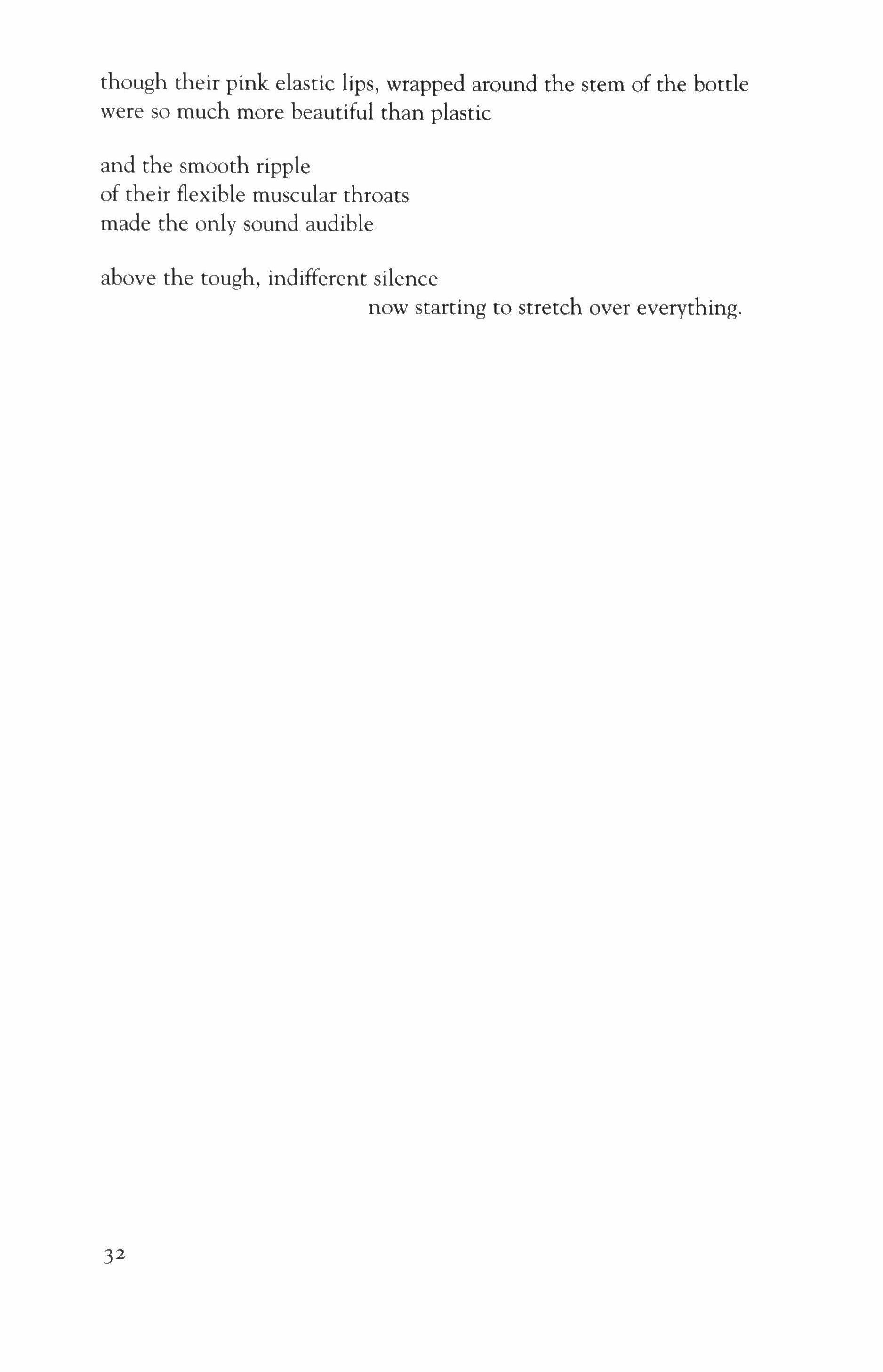
though their pink elastic lips, wrapped around the stem of the bottle were so much more beautiful than plastic and the smooth ripple of their flexible muscular throats made the only sound audible
above the tough, indifferent silence now starting to stretch over everything.
32
Disaster Movie

You were a jumbo jet, America, gone down in the jungle in my dream.
It must have been Borneo, or someplace tropical like that, because vines had strangled the propellers into stillness, rust was already licking the battered silver wings.
Monkeys had commandeered the cockpit and were getting drunk on the miniature bottles of vodka and Jack Daniels, wearing the orange safety vests backwards and spinning in the empty swivel chairs.
In the first class cabin, the first class passengers had finished the last of the Chicken Kiev and were barricaded in, while outside the economy fliers had gathered by the defunct fuselage to take a vote on whether to wait for rescue or to try to rescue themselves.
I couldn't believe that my twisted subconscious would crashtest a whole nation to make a point; that my disgust with cell phones and beauty pageants would drive me to ram it headfirst into the side of a hill,-its wings snapped off, its captain decapitated, its dependence on foreign oil brought to a sudden conclusion.
And sure, I knew that this apocalypse was a thin disguise for my pitiful fear of being no good at ordinary life.
But what was sweet in the dream was the quiet courage of those little people:
33
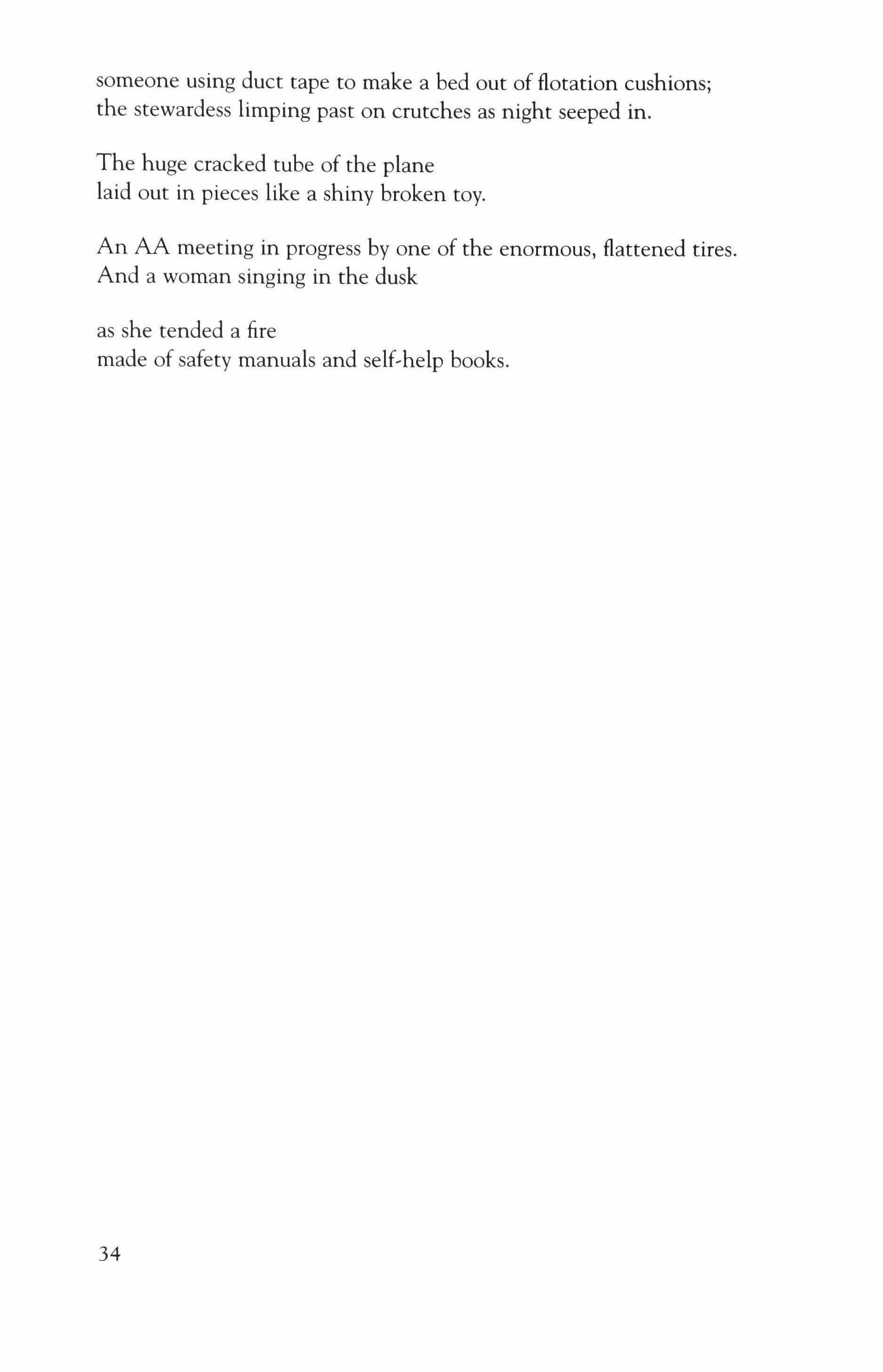
someone using duct tape to make a bed out of flotation cushions; the stewardess limping past on crutches as night seeped in.
The huge cracked tube of the plane laid out in pieces like a shiny broken toy.
An AA meeting in progress by one of the enormous, flattened tires. And a woman singing in the dusk as she tended a fire made of safety manuals and self-help books.
34
Rhythm and Blues
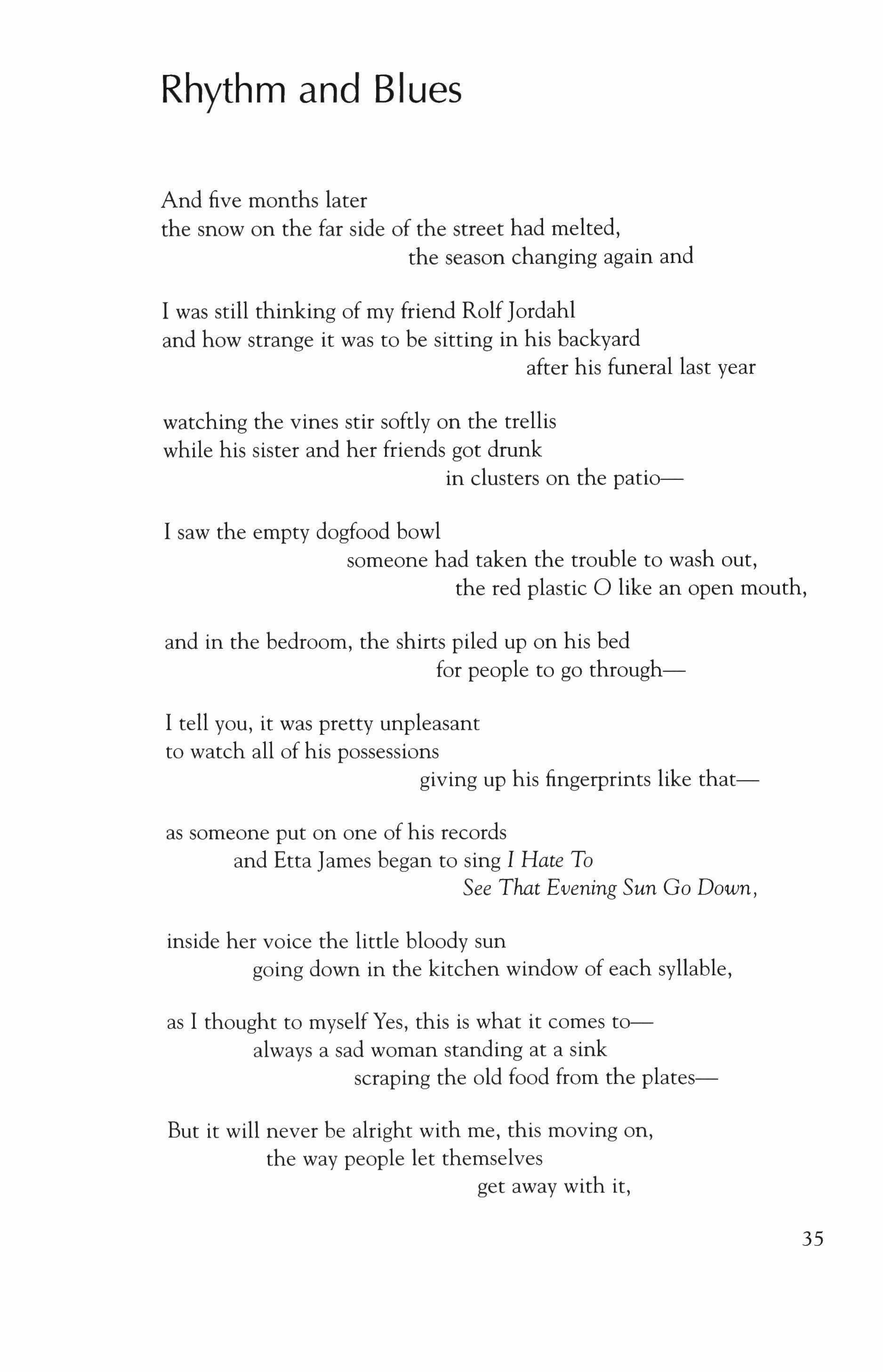
And five months later the snow on the far side of the street had melted, the season changing again and
I was still thinking of my friend Rolf Jordahl and how strange it was to be sitting in his backyard after his funeral last year
watching the vines stir softly on the trellis while his sister and her friends got drunk in clusters on the patio-
I saw the empty dogfood bowl someone had taken the trouble to wash out, the red plastic 0 like an open mouth, and in the bedroom, the shirts piled up on his bed for people to go through-
I tell you, it was pretty unpleasant to watch all of his possessions giving up his fingerprints like that-
as someone put on one of his records and Etta J ames began to sing I Hate To See That Evening Sun Go Down, inside her voice the little bloody sun going down in the kitchen window of each syllable, as I thought to myself Yes, this is what it comes toalways a sad woman standing at a sink scraping the old food from the plates-
But it will never be alright with me, this moving on, the way people let themselves get away with it,
35
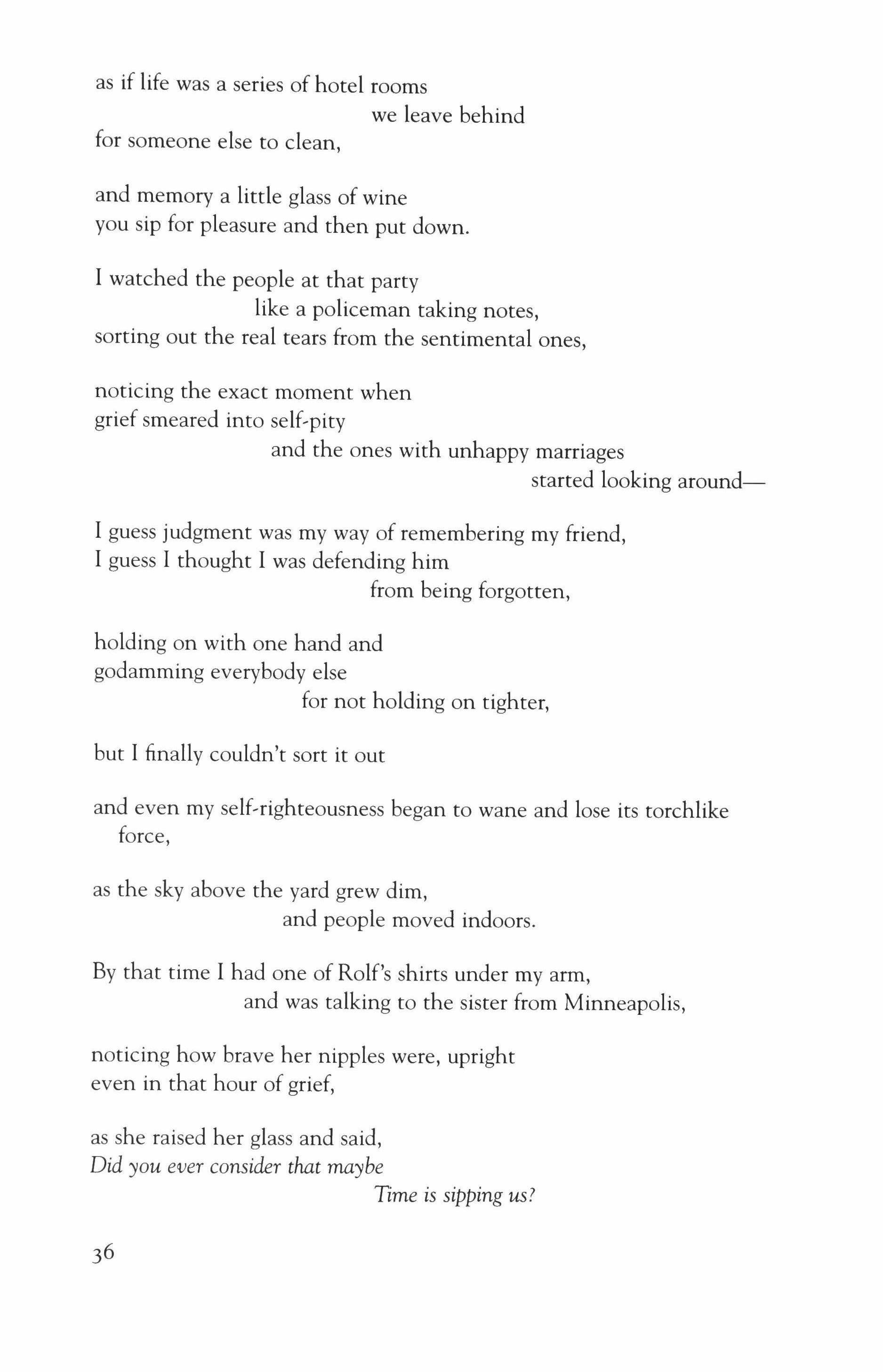
as if life was a series of hotel rooms we leave behind for someone else to clean, and memory a little glass of wine you sip for pleasure and then put down.
I watched the people at that party like a policeman taking notes, sorting out the real tears from the sentimental ones,
noticing the exact moment when grief smeared into self-pity and the ones with unhappy marriages started looking around-
I guess judgment was my way of remembering my friend, I guess I thought I was defending him from being forgotten, holding on with one hand and godamming everybody else for not holding on tighter, but I finally couldn't sort it out and even my self-righteousness began to wane and lose its torchlike force,
as the sky above the yard grew dim, and people moved indoors.
By that time I had one of Rolf's shirts under my arm, and was talking to the sister from Minneapolis, noticing how brave her nipples were, upright even in that hour of grief, as she raised her glass and said, Did you ever consider that maybe TIme is sipping us?
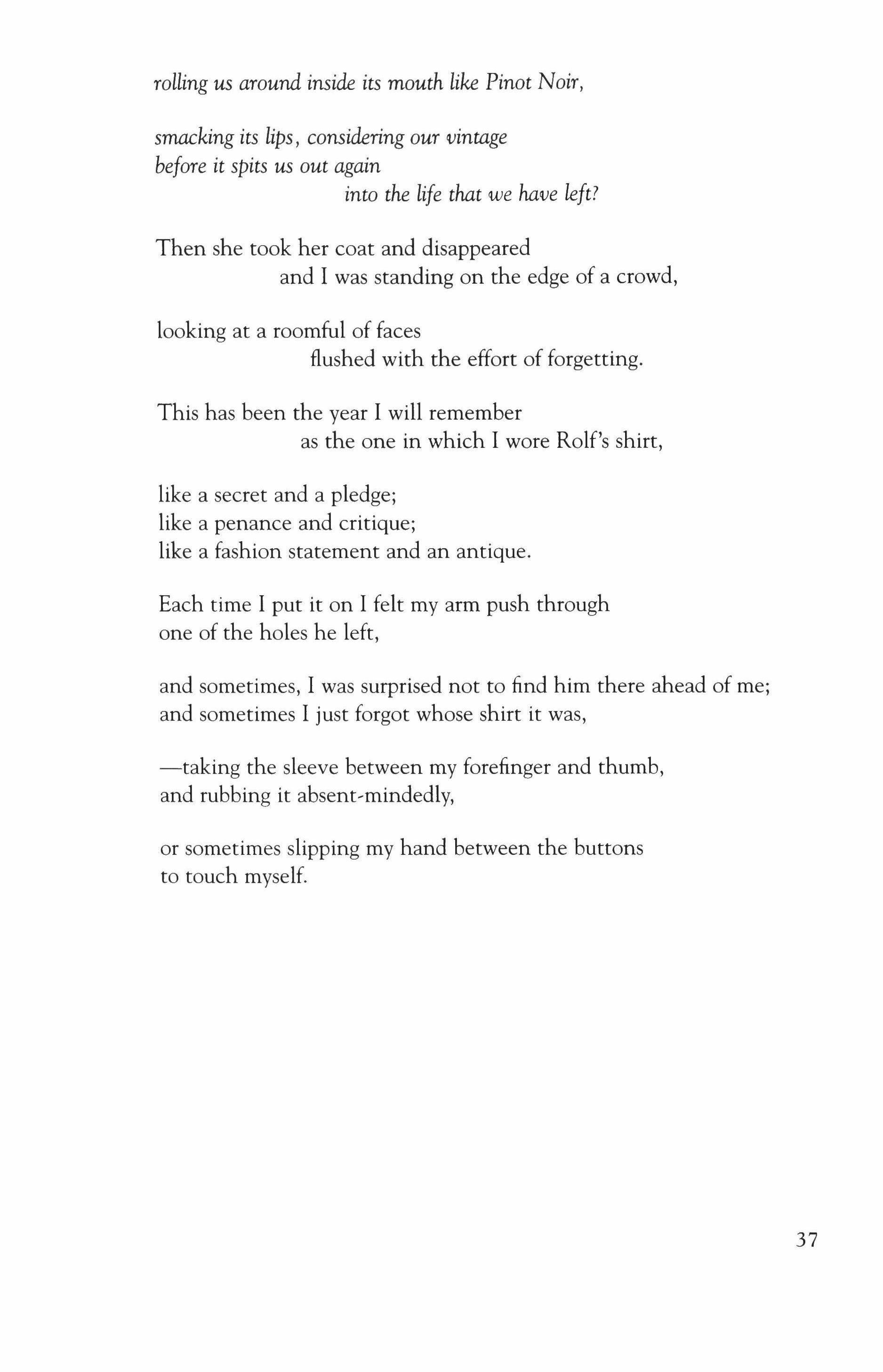
rolling us around inside its mouth like Pinot Nair,
smacking its lips, considering our vintage before it spits us out again into the life that we have left?
Then she took her coat and disappeared and I was standing on the edge of a crowd, looking at a roomful of faces flushed with the effort of forgetting.
This has been the year I will remember as the one in which I wore Rolf's shirt, like a secret and a pledge; like a penance and critique; like a fashion statement and an antique.
Each time I put it on I felt my arm push through one of the holes he left, and sometimes, I was surprised not to find him there ahead of me; and sometimes I just forgot whose shirt it was,
-taking the sleeve between my forefinger and thumb, and rubbing it absent-mindedly, or sometimes slipping my hand between the buttons to touch myself.
37
Jazz
 For Barry Rackner
For Barry Rackner
I was driving home that afternoon in some dilated condition of sensitivity of the kind known only to certain heroic poets and more or less almost everybody else:
the sun of six PM glaring orangely through the trees as through the bars of some kind of cage and the poor citizens of Pecore Street waiting for the bus with their sorrowful posture and bad feet-
I admit when I'm in one of these moods I find it a little too easy to believe the trees are suffering; to see the twisted branches as outstretched arthritic hands, and the Spanish moss dripping from their scabby limbs as parasitic bunting.
Someone had given me a jazz CD he had thought I would enjoy, but the song unfurling on the stereo that day, it seemed a kind of torture-music,
played by wildly unhappy musicians on instruments that had been bent in shipping, then harnessed by some masochist composer for an experiment on the nature of obstruction.
But of all the shrieking horns and drums it was the passionate effort of a certain defective trumpet to escape from its predetermined plot that seemed to be telling a story that I knew:
veering back and forth, banging off of walls, dripping a trail of blood until finally it shattered through a window and disappeared.
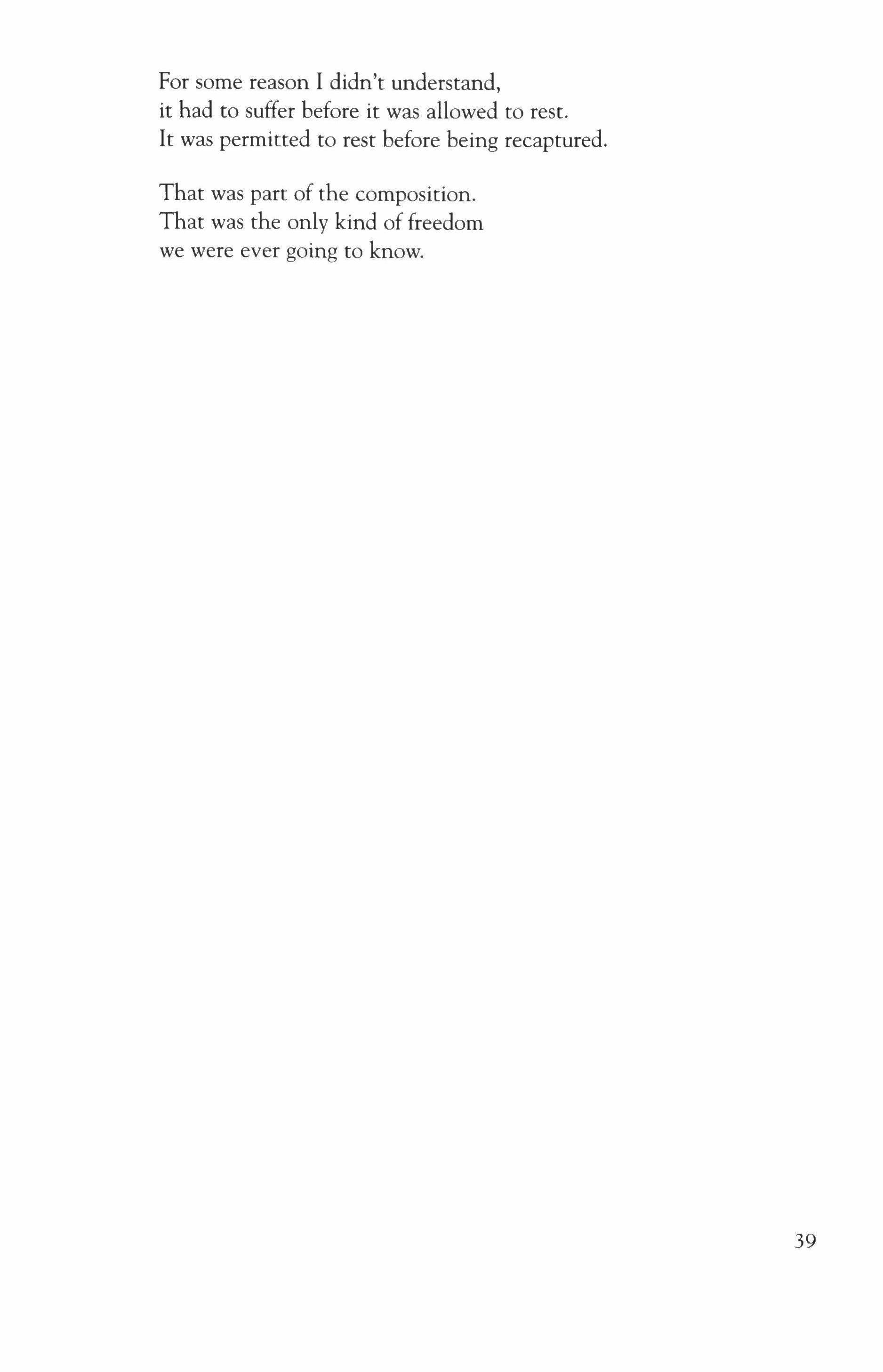
For some reason I didn't understand, it had to suffer before it was allowed to rest. It was permitted to rest before being recaptured.
That was part of the composition. That was the only kind of freedom we were ever going to know.
39
Mark Halliday
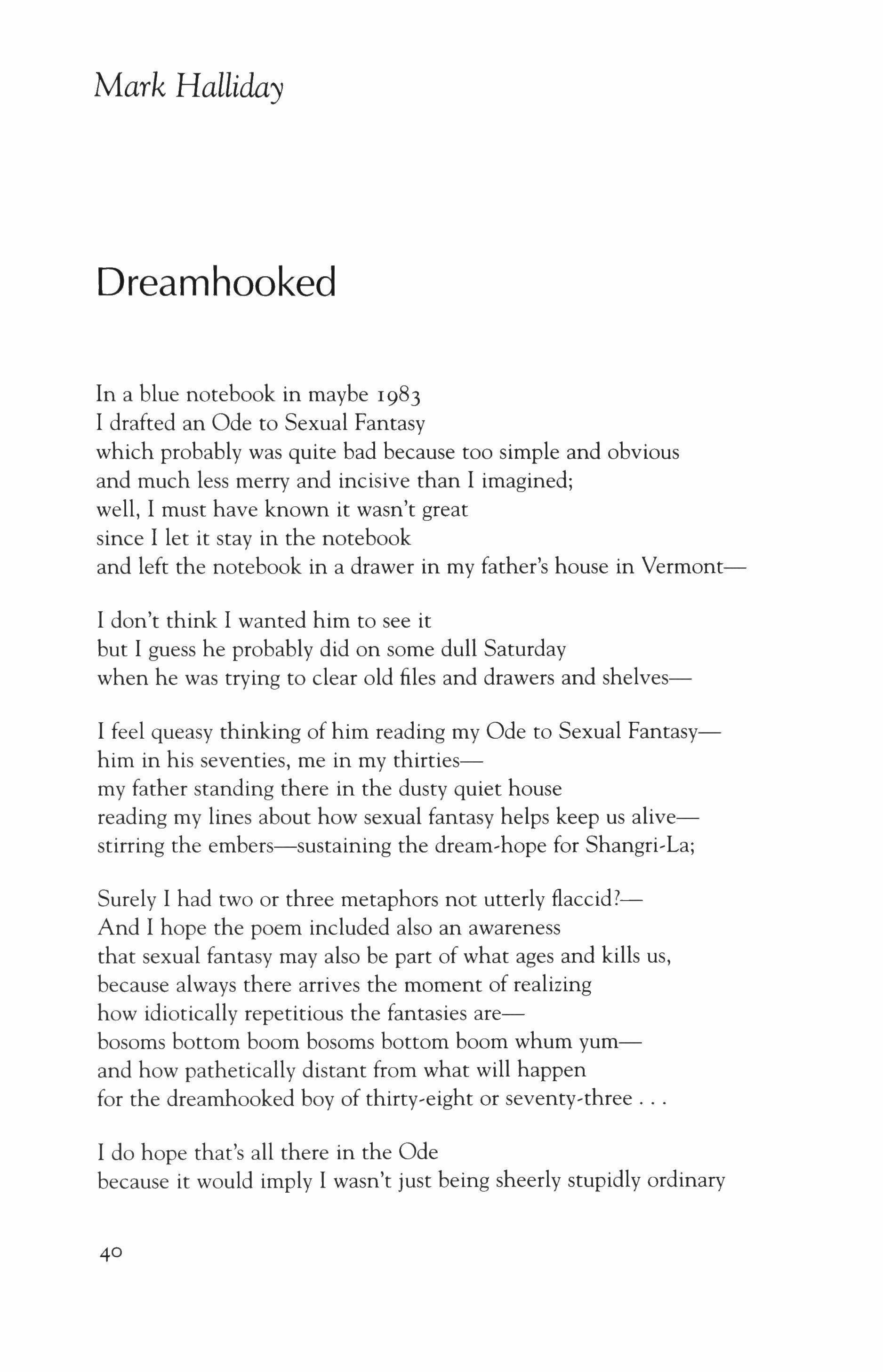
Dreamhooked
In a blue notebook in maybe 1983
I drafted an Ode to Sexual Fantasy which probably was quite bad because too simple and obvious and much less merry and incisive than I imagined; well, I must have known it wasn't great since I let it stay in the notebook and left the notebook in a drawer in my father's house in Vermont-
I don't think I wanted him to see it but I guess he probably did on some dull Saturday when he was trying to clear old files and drawers and shelves-
I feel queasy thinking of him reading my Ode to Sexual Fantasyhim in his seventies, me in my thirtiesmy father standing there in the dusty quiet house reading my lines about how sexual fantasy helps keep us alivestirring the embers-sustaining the dream-hope for Shangri-La:
Surely I had two or three metaphors not utterly flaccid?And I hope the poem included also an awareness that sexual fantasy may also be part of what ages and kills us, because always there arrives the moment of realizing how idiotically repetitious the fantasies arebosoms bottom boom bosoms bottom boom whum yumand how pathetically distant from what will happen for the dreamhooked boy of thirty-eight or seventy-three
I do hope that's all there in the Ode because it would imply I wasn't just being sheerly stupidly ordinary

when I wrote it-so my father reading it alone in the dusty Vermont house would see that his son was not just stupidly ordinary-
But then also he would feel sad, sad to be at the mercy of the imagesJane Russell, Marilyn Monroe, Raquel Welch, a certain secretary in 1974, the fabulous warm unreachable weighty passionating shapessad to be reminded that he still had not escaped; and sad to see how garishly and helplessly his son had inherited the dreamhook;
So I'm afraid my failed poem may have added one more shade to the layered sadness of being seventy-three or seventy-eight one long Saturday alone in Vermont in a jumbled house.
He kept himself alive, though, not without some gladness till he was eighty-nine, nourished as well as ravaged by irresistible wishing.
And if at the age of fifty-six I find that blue notebook in an old file or box there will be the shadow of a tremor of embarrassment and a distant low pulsing of sadness as if a low note were softly played several times on a piano downstairs;
nourished but also ravaged we are by irresistible failures of representing -representing because the actual breathing talking perceptive woman is much too complicated;
And I'll keep the notebook in a pile of old things that represent me-the acorn, Daddy, not too far from the tree-
And just for a minute, that night, a ghost of Maggie or Liz or Patty or Tracy will visit me, radiant-
41
Muck-Clump
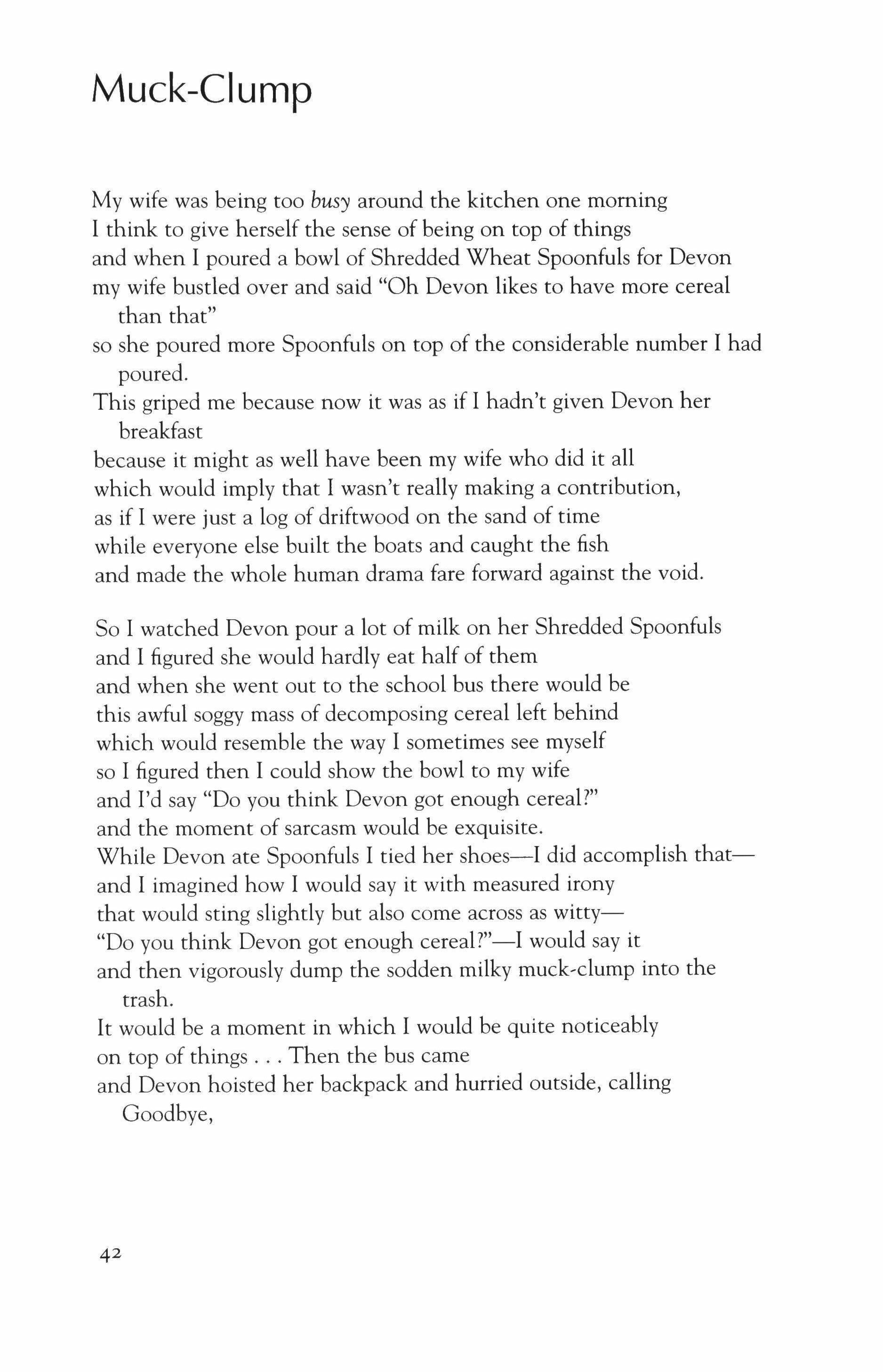
My wife was being too busy around the kitchen one morning I think to give herself the sense of being on top of things and when I poured a bowl of Shredded Wheat Spoonfuls for Devon my wife bustled over and said "Oh Devon likes to have more cereal than that"
so she poured more Spoonfuls on top of the considerable number I had poured.
This griped me because now it was as if I hadn't given Devon her breakfast because it might as well have been my wife who did it all which would imply that I wasn't really making a contribution, as if I were just a log of driftwood on the sand of time while everyone else built the boats and caught the fish and made the whole human drama fare forward against the void.
So I watched Devon pour a lot of milk on her Shredded Spoonfuls and I figured she would hardly eat half of them and when she went out to the school bus there would be this awful soggy mass of decomposing cereal left behind which would resemble the way I sometimes see myself so I figured then I could show the bowl to my wife and I'd say "Do you think Devon got enough cereal?" and the moment of sarcasm would be exquisite.
While Devon ate Spoonfuls I tied her shoes-I did accomplish thatand I imagined how I would say it with measured irony that would sting slightly but also come across as witty"Do you think Devon got enough cereal?"-I would say it and then vigorously dump the sodden milky muck-clump into the trash.
It would be a moment in which I would be quite noticeably on top of things Then the bus came and Devon hoisted her backpack and hurried outside, calling Goodbye,
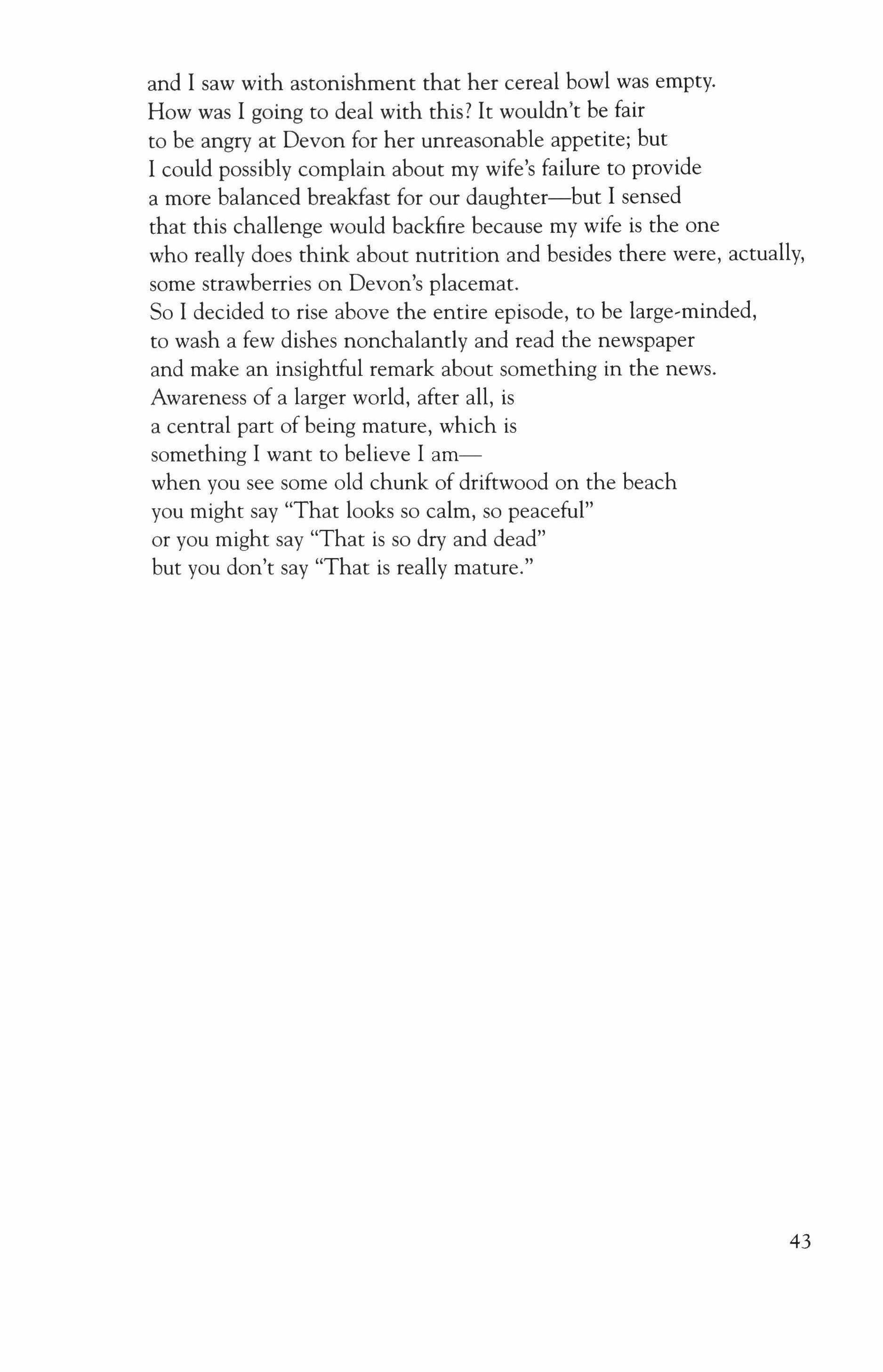
and I saw with astonishment that her cereal bowl was empty. How was I going to deal with this? It wouldn't be fair to be angry at Devon for her unreasonable appetite; but I could possibly complain about my wife's failure to provide a more balanced breakfast for our daughter-but I sensed that this challenge would backfire because my wife is the one who really does think about nutrition and besides there were, actually, some strawberries on Devon's placemat. So I decided to rise above the entire episode, to be large-minded, to wash a few dishes nonchalantly and read the newspaper and make an insightful remark about something in the news.
Awareness of a larger world, after all, is a central part of being mature, which is something I want to believe I amwhen you see some old chunk of driftwood on the beach you might say "That looks so calm, so peaceful" or you might say "That is so dry and dead" but you don't say "That is really mature."
43
Susan Wood

Horoscope
It's almost my birthday, but not quite, thank God, because who'd want a horoscope like this on her birthday?
Take precautions today. Evil may come your way. Because evil is such an over-the-top word, such a nightmare-on-elm-street word. I mean, it could've said, "Trouble may come your way," but evil? Not that I don't believe in it, of course. Who wouldn't these days? Decades of it, centuries. Hitler, Pol Pot, Idi Amin, the usual suspects, not to mention countless other lackeys and minor functionaries, the father who scalded the baby, put out his cigarettes on her tender backside, the loser boyfriend who shot the aspiring actress right in front of her mother on a sidewalk in Chinatown. Or the serial killer everyone describes as "polite" and "charming," whose face is all over the TV today, the one who haunted south Louisiana through which I have so often traveled alone, driving over the spooky swamp between Lafayette and Baton Rouge, where there is no way off the interstate for miles except the exit at Whiskey Bay, where one of the bodies was found, haunted even Breaux Bridge, where the Sunday after Christmas I ate crawfish etoufee at Mulate's Cajun Restaurant,
44
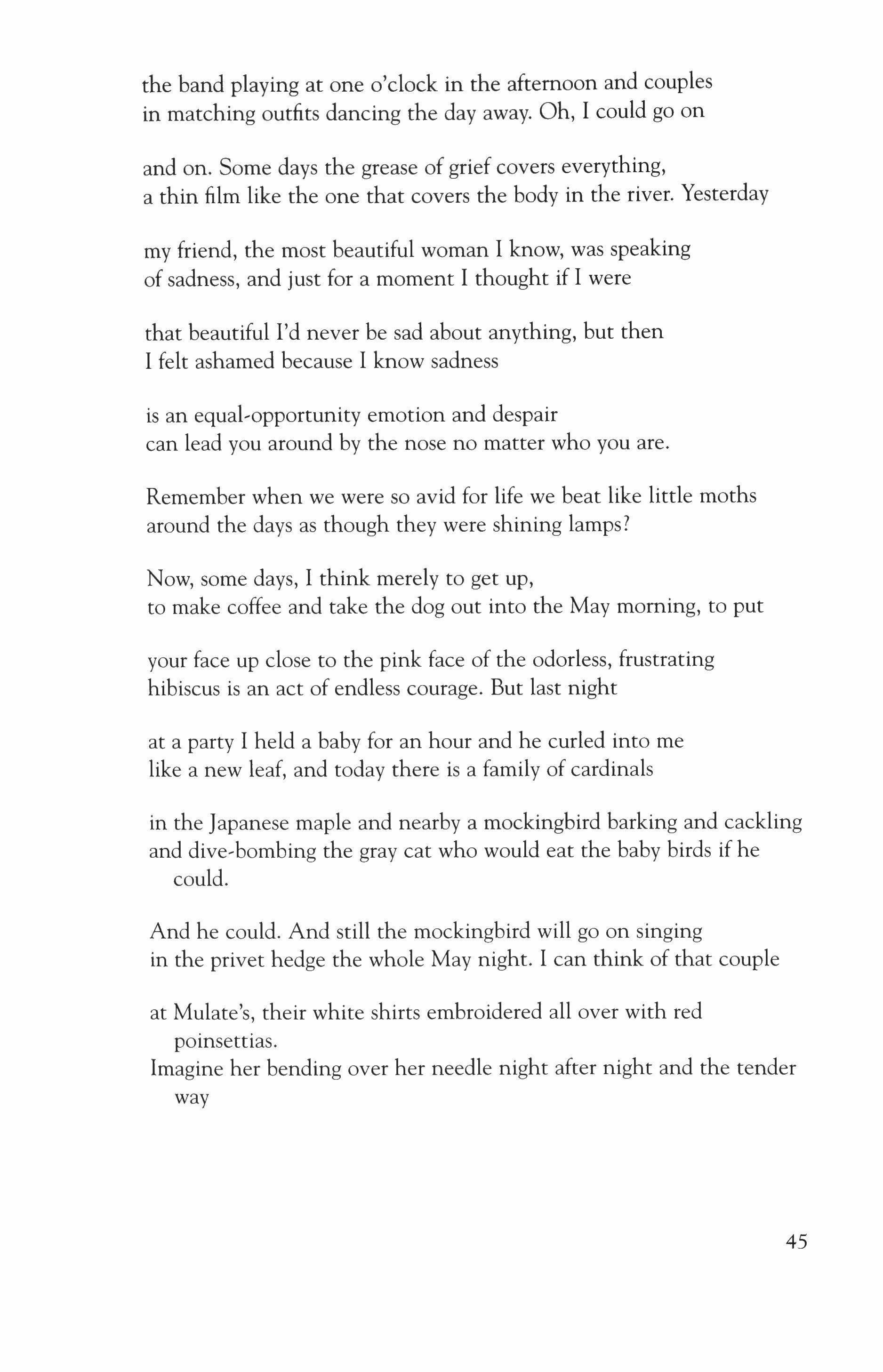
the band playing at one o'clock in the afternoon and couples in matching outfits dancing the day away. Oh, I could go on and on. Some days the grease of grief covers everything, a thin film like the one that covers the body in the river. Yesterday my friend, the most beautiful woman I know, was speaking of sadness, and just for a moment I thought if I were that beautiful I'd never be sad about anything, but then I felt ashamed because I know sadness is an equal-opportunity emotion and despair can lead you around by the nose no matter who you are.
Remember when we were so avid for life we beat like little moths around the days as though they were shining lamps?
Now, some days, I think merely to get up, to make coffee and take the dog out into the May morning, to put your face up close to the pink face of the odorless, frustrating hibiscus is an act of endless courage. But last night at a party I held a baby for an hour and he curled into me like a new leaf, and today there is a family of cardinals in the Japanese maple and nearby a mockingbird barking and cackling and dive-bombing the gray cat who would eat the baby birds if he could.
And he could. And still the mockingbird will go on singing in the privet hedge the whole May night. I can think of that couple at Mulate's, their white shirts embroidered all over with red poinsettias.
Imagine her bending over her needle night after night and the tender way
45
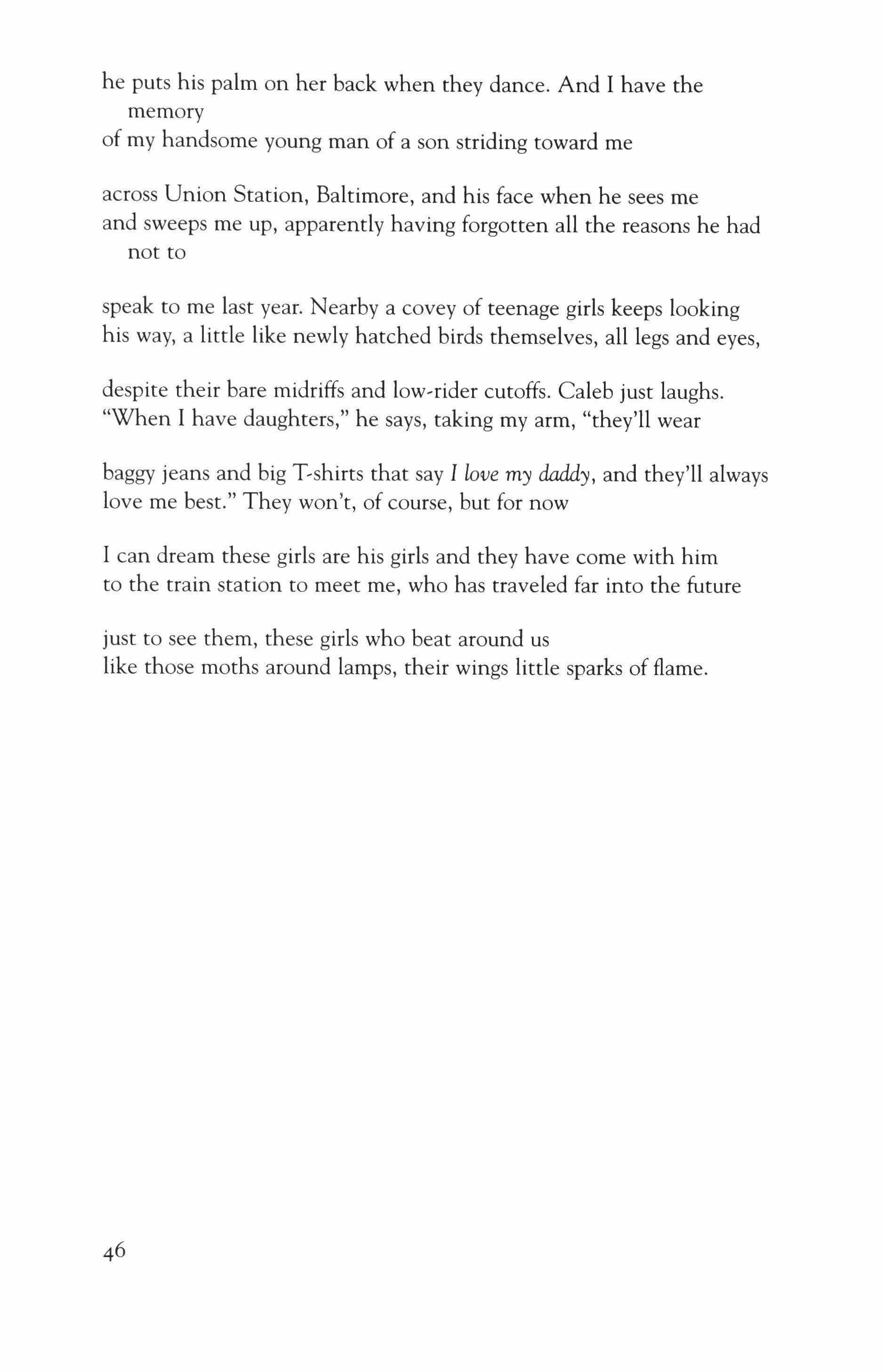
he puts his palm on her back when they dance. And I have the memory of my handsome young man of a son striding toward me
across Union Station, Baltimore, and his face when he sees me and sweeps me up, apparently having forgotten all the reasons he had not to
speak to me last year. Nearby a covey of teenage girls keeps looking his way, a little like newly hatched birds themselves, all legs and eyes,
despite their bare midriffs and low-rider cutoffs. Caleb just laughs. "When I have daughters," he says, taking my arm, "they'll wear
baggy jeans and big 'Tshirts that say I love my daiidy, and they'll always love me best." They won't, of course, but for now
I can dream these girls are his girls and they have come with him to the train station to meet me, who has traveled far into the future
just to see them, these girls who beat around us like those moths around lamps, their wings little sparks of flame.
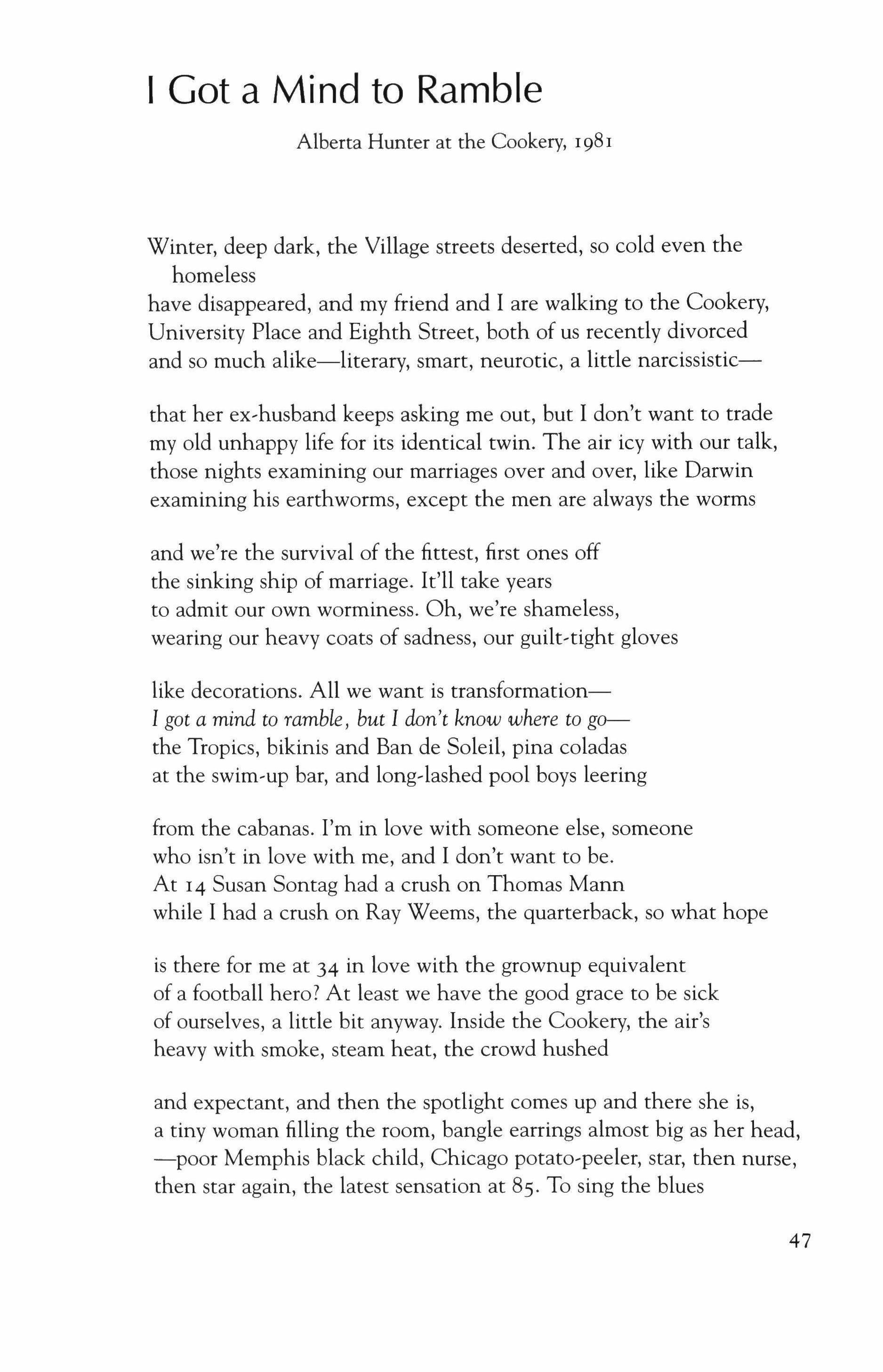
I Got a Mind to Ramble
Alberta Hunter at the Cookery, 198 I Winter, deep dark, the Village streets deserted, so cold even the homeless have disappeared, and my friend and I are walking to the Cookery, University Place and Eighth Street, both of us recently divorced and so much alike-literary, smart, neurotic, a little narcissisticthat her ex-husband keeps asking me out, but I don't want to trade my old unhappy life for its identical twin. The air icy with our talk, those nights examining our marriages over and over, like Darwin examining his earthworms, except the men are always the worms and we're the survival of the fittest, first ones off the sinking ship of marriage. It'll take years to admit our own worminess. Oh, we're shameless, wearing our heavy coats of sadness, our guilt,tight gloves like decorations. All we want is transformationI got a mind to ramble, but I don't know where to gothe Tropics, bikinis and Ban de Soleil, pina coladas at the swim-up bar, and long'lashed pool boys leering from the cabanas. I'm in love with someone else, someone who isn't in love with me, and I don't want to be. At 14 Susan Sontag had a crush on Thomas Mann while I had a crush on Ray Weems, the quarterback, so what hope is there for me at 34 in love with the grownup equivalent of a football hero? At least we have the good grace to be sick of ourselves, a little bit anyway. Inside the Cookery, the air's heavy with smoke, steam heat, the crowd hushed and expectant, and then the spotlight comes up and there she is, a tiny woman filling the room, bangle earrings almost big as her head, -poor Memphis black child, Chicago potato-peeler, star, then nurse, then star again, the latest sensation at 85. To sing the blues
47
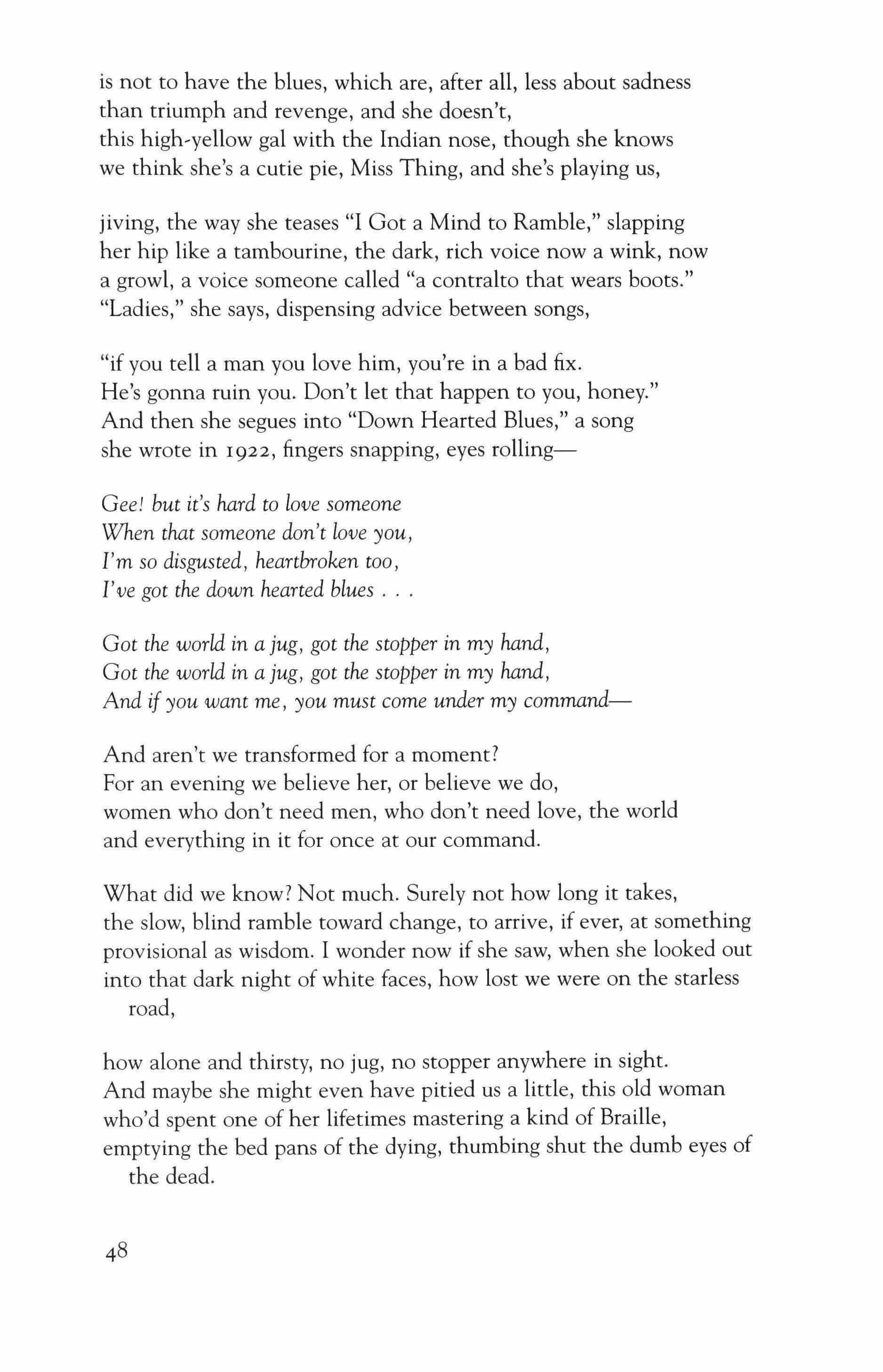
is not to have the blues, which are, after all, less about sadness than triumph and revenge, and she doesn't, this high-yellow gal with the Indian nose, though she knows we think she's a cutie pie, Miss Thing, and she's playing us,
jiving, the way she teases "I Got a Mind to Ramble," slapping her hip like a tambourine, the dark, rich voice now a wink, now a growl, a voice someone called "a contralto that wears boots." "Ladies," she says, dispensing advice between songs,
"if you tell a man you love him, you're in a bad fix. He's gonna ruin you. Don't let that happen to you, honey." And then she segues into "Down Hearted Blues," a song she wrote in I922, fingers snapping, eyes rolling-
Gee! but it's hard to love someone When that someone don't love you, I'm so disgusted, heartbroken too, I've got the down hearted blues
Got the world in a jug, got the stopper in my hand, Got the world in a jug, got the stopper in my hand, And if you want me, you must come under my command-
And aren't we transformed for a moment?
For an evening we believe her, or believe we do, women who don't need men, who don't need love, the world and everything in it for once at our command.
What did we know? Not much. Surely not how long it takes, the slow, blind ramble toward change, to arrive, if ever, at something provisional as wisdom. I wonder now if she saw, when she looked out into that dark night of white faces, how lost we were on the starless road,
how alone and thirsty, no jug, no stopper anywhere in sight. And maybe she might even have pitied us a little, this old woman who'd spent one of her lifetimes mastering a kind of Braille, emptying the bed pans of the dying, thumbing shut the dumb eyes of the dead.
What Do I Recommend?

It's not on the menu, but we've got a waffle iron, and when it's hot, boy, you can smell it a bike ride away, and the sinners come running with forked tongues and knives in their back pockets, because, Baby, it's like you're cheating on somebody when I set down that inch-thick dimpled sugar cookie, peanut-buttered over, with a Chiquita
dance floor and thin slices of sweet peaches, crunched pecans and shredded coconut climbing up a Cool Whip mountain, all liquored up and laced with wavy lines of chocolate sauce and honey dripping off the edges of your plate, and you can spank
yourself later or fudge some numbers on your calorie chart because this is that sweet girl who never says no,
sugar-lipped and messy with Hershey colored hair, this is what you count your quarters for, and listen, I've had my hand
on Schneider
]
49

stabbed twice for trying to take an empty plate, so I won't even touch it until you leave because it's something people eat
slow on purpose, bite after bite, biting their lips, and swirling the underside of sticky forks across gooey plates
with tiny crumbs of just about everything leftover, and if a woman were a waffle or a waffle were a woman this is how I'd order mine.
50
Vince Neil Meets Josh in a Chinese Restaurant in Malibu (after Ezra Pound)
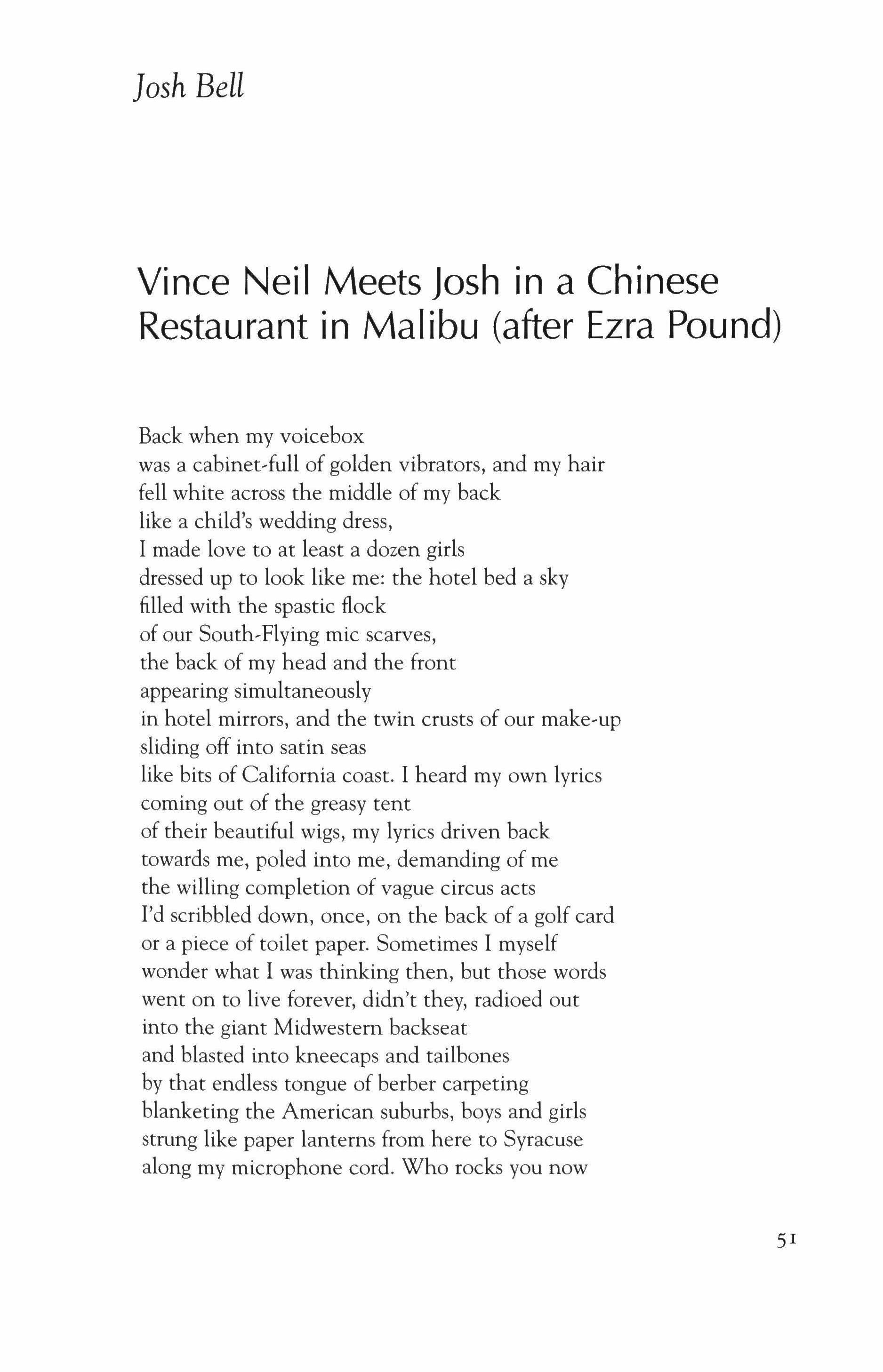
Back when my voicebox was a cabinet-full of golden vibrators, and my hair fell white across the middle of my back like a child's wedding dress, I made love to at least a dozen girls dressed up to look like me: the hotel bed a sky filled with the spastic flock of our South-Flying mic scarves, the back of my head and the front appearing simultaneously in hotel mirrors, and the twin crusts of our make-up sliding off into satin seas like bits of California coast. I heard my own lyrics coming out of the greasy tent of their beautiful wigs, my lyrics driven back towards me, poled into me, demanding of me the willing completion of vague circus acts I'd scribbled down, once, on the back of a golf card or a piece of toilet paper. Sometimes I myself wonder what I was thinking then, but those words went on to live forever, didn't they, radioed out into the giant Midwestern backseat and blasted into kneecaps and tailbones by that endless tongue of berber carpeting blanketing the American suburbs, boys and girls strung like paper lanterns from here to Syracuse along my microphone cord. Who rocks you now
Bell
Josh
5I

rocks you always, I told them all, and all of them somehow wearing a homemade version of the same leather pants I'd chosen to wear on stage that night; all of them hoping to enter me-to enter anyonethe way they thought I entered them, and the way I entered them was wishing I was somewhere else, or wishing I was the someone else who'd come along to enter me, which was the same thing. I am no fag, my new friend. Love in battle conditions requires a broad taxonomy, queerness has its ever-more-visible degrees. Josh, I know you know what I'm talking about, you have the build of a stevedore. Which reminds me-more shrimp fried rice?-as a child in Nanjing, I sculled the junks for my bread and I slept in a hovel along the Chiang Jiang River. In a cage there, I bred mice who built their nests from the frayed rope I'd taken from the decks, and one Spring, when the babies did not emerge, I lifted up the rock that hid them, and I found they'd grown together, fused with each other and the tendrils of the nest. I held them up, eleven blind tomatoes wriggling on a blackened vine. My friends and I performed many surgeries. And now you come to me in this Chinese restaurant in Malibu, asking if you can help me. Please tell Circus Magazine I love them forever, and please pass Pamela this message: If you get back to Malibu by springtime, drop by the boathouse, and I'll rock your ass as far as Cho-Fu-Sa.
We Will Begin By Placing You
In This Bag

There's friend A, the totally sexy one. And there's friend C, he made the sculpture of the ice cube for A, the totally sexy one. We don't know where B has gotten to, B who is married to C, B probably out breaking windows, writing a poem about how beauty is the knife. D is not our friend, D the towheaded one, she knows us through B, but we are being nice to D for now so maybe we can kiss her, D or B the poetess, whichever, so .you can help us keep our cover at least until E shows up, with her unfinished spy novel and her can of olives for G and us. G and us we like to sleep when it's raining and eat olives, to hell with girls, and you be G for awhile, we like you a lot, G, whoever you are, so unlike F, forget about F, with his silly complaints and his too-finished movie script, beginning with the phrase, "we open on the void," that F, strange F, we're starting to like F a little better now, yes F is really starting to grow on us, but we're telling you flat out we're in love with H, she wants to lick Its slender calves, we always love such lesbians as are unavailable to us, and H is also thinking about changing her name to I, but we already have a friend named I, which I hates because it's a girl's name, and I have come for the body ofJ says K to J in the hallway. I have come for the body of K booms M to K, looming up behind her, and L, who is standing behind him, slaps him on the back of the head, she is so jealous
53
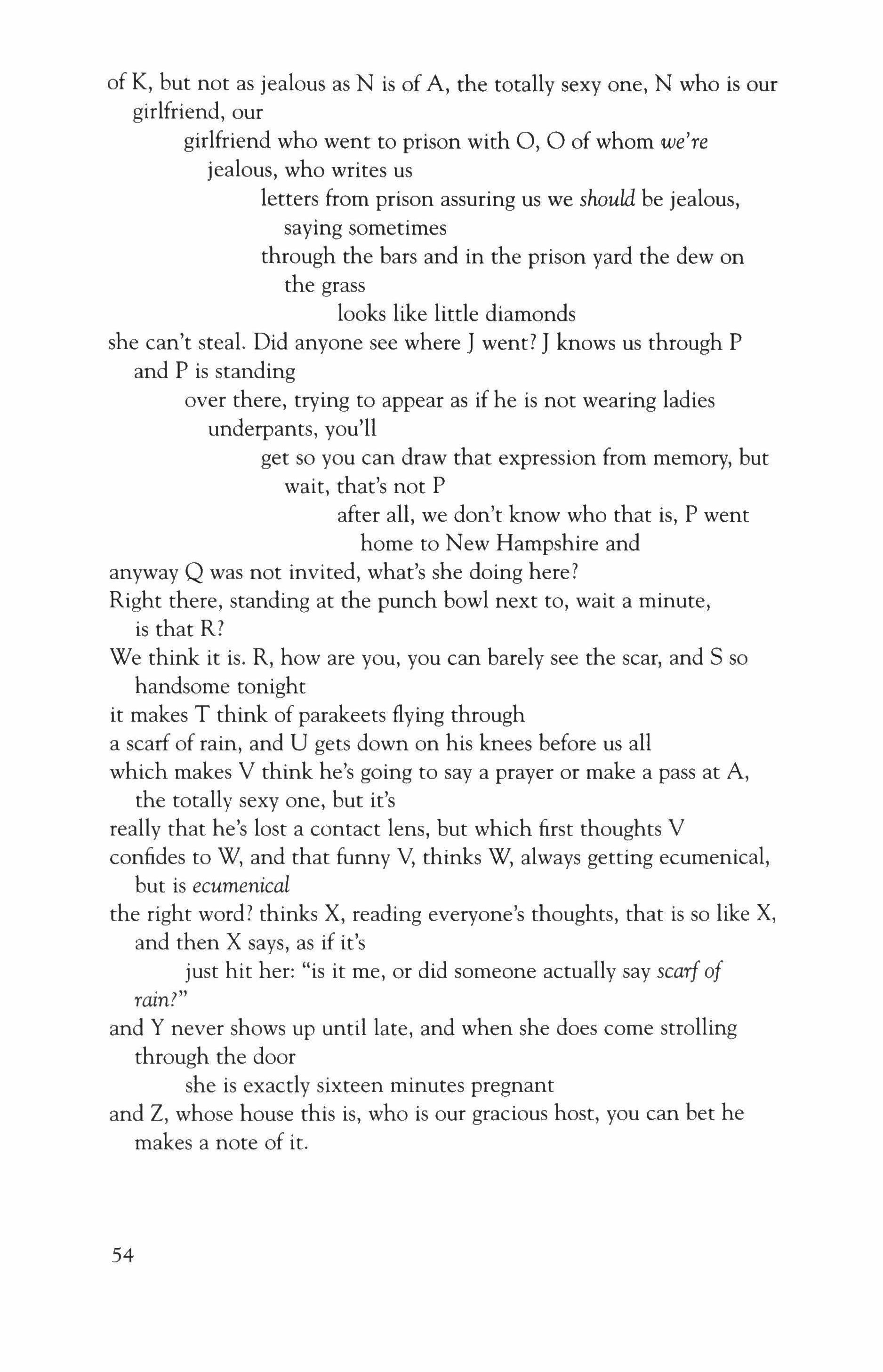
of K, but not as jealous as N is of A, the totally sexy one, N who is our girlfriend, our girlfriend who went to prison with 0,0 of whom we're jealous, who writes us letters from prison assuring us we should be jealous, saying sometimes through the bars and in the prison yard the dew on the grass
looks like little diamonds she can't steal. Did anyone see where J went? J knows us through P and P is standing over there, trying to appear as if he is not wearing ladies underpants, you'll get so you can draw that expression from memory, but wait, that's not P
after all, we don't know who that is, P went home to New Hampshire and
anyway Q was not invited, what's she doing here?
Right there, standing at the punch bowl next to, wait a minute, is that R?
We think it is. R, how are you, you can barely see the scar, and S so handsome tonight it makes T think of parakeets flying through a scarf of rain, and U gets down on his knees before us all which makes Y think he's going to say a prayer or make a pass at A, the totally sexy one, but it's really that he's lost a contact lens, but which first thoughts Y confides to W, and that funny Y, thinks W, always getting ecumenical, but is ecumenical the right word? thinks X, reading everyone's thoughts, that is so like X, and then X says, as if it's just hit her: "is it me, or did someone actually say scarfof rain?"
and Y never shows up until late, and when she does come strolling through the door she is exactly sixteen minutes pregnant and Z, whose house this is, who is our gracious host, you can bet he makes a note of it.
54
What It's Like Outside
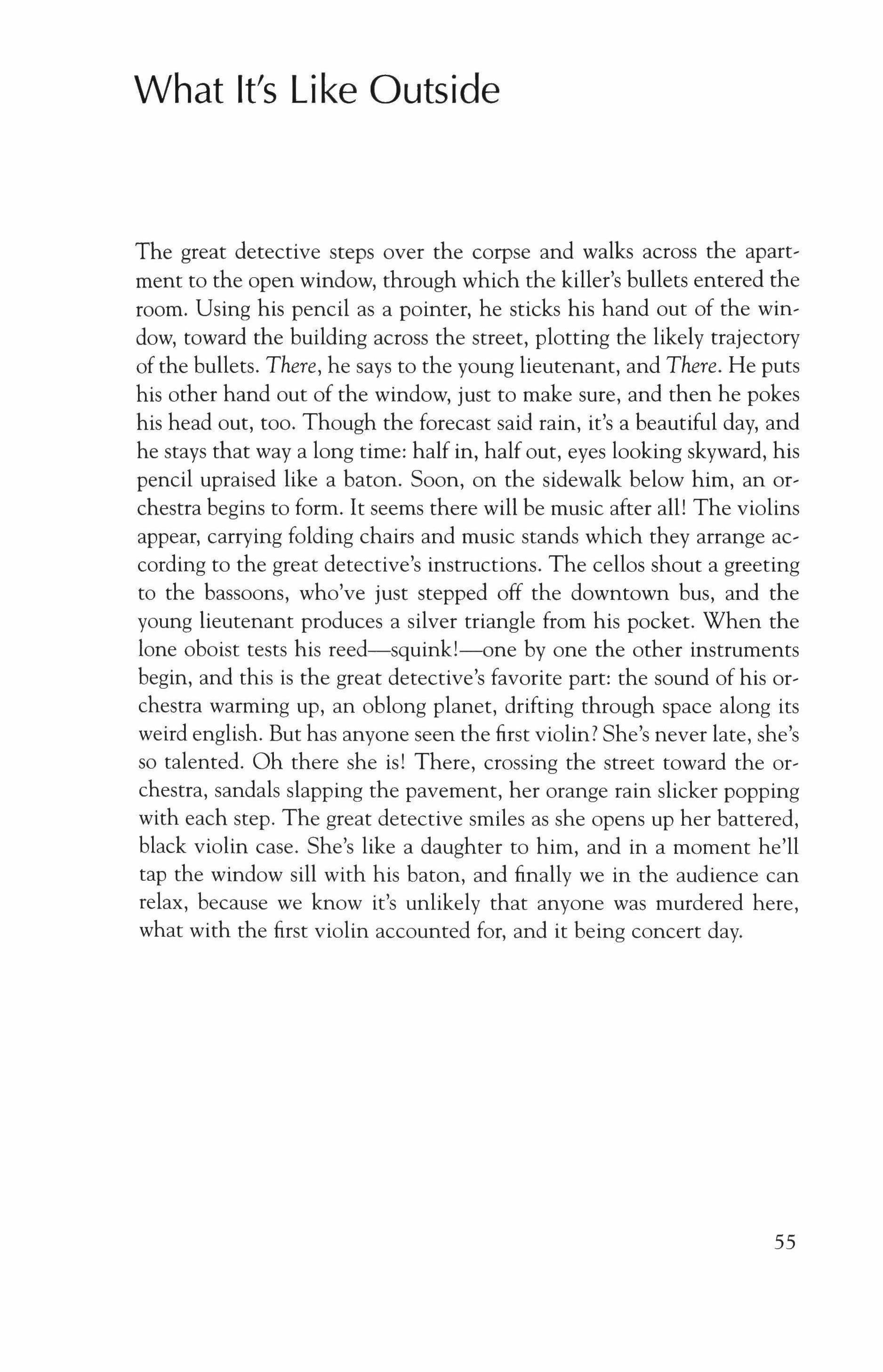
The great detective steps over the corpse and walks across the apartment to the open window, through which the killer's bullets entered the room. Using his pencil as a pointer, he sticks his hand out of the window, toward the building across the street, plotting the likely trajectory of the bullets. There, he says to the young lieutenant, and There. He puts his other hand out of the window, just to make sure, and then he pokes his head out, too. Though the forecast said rain, it's a beautiful day, and he stays that way a long time: half in, half out, eyes looking skyward, his pencil upraised like a baton. Soon, on the sidewalk below him, an orchestra begins to form. It seems there will be music after all! The violins appear, carrying folding chairs and music stands which they arrange according to the great detective's instructions. The cellos shout a greeting to the bassoons, who've just stepped off the downtown bus, and the young lieutenant produces a silver triangle from his pocket. When the lone oboist tests his reed-squink!-one by one the other instruments begin, and this is the great detective's favorite part: the sound of his orchestra warming up, an oblong planet, drifting through space along its weird english. But has anyone seen the first violin? She's never late, she's so talented. Oh there she is! There, crossing the street toward the orchestra, sandals slapping the pavement, her orange rain slicker popping with each step. The great detective smiles as she opens up her battered, black violin case. She's like a daughter to him, and in a moment he'll tap the window sill with his baton, and finally we in the audience can relax, because we know it's unlikely that anyone was murdered here, what with the first violin accounted for, and it being concert day.
55
Gerald Stern
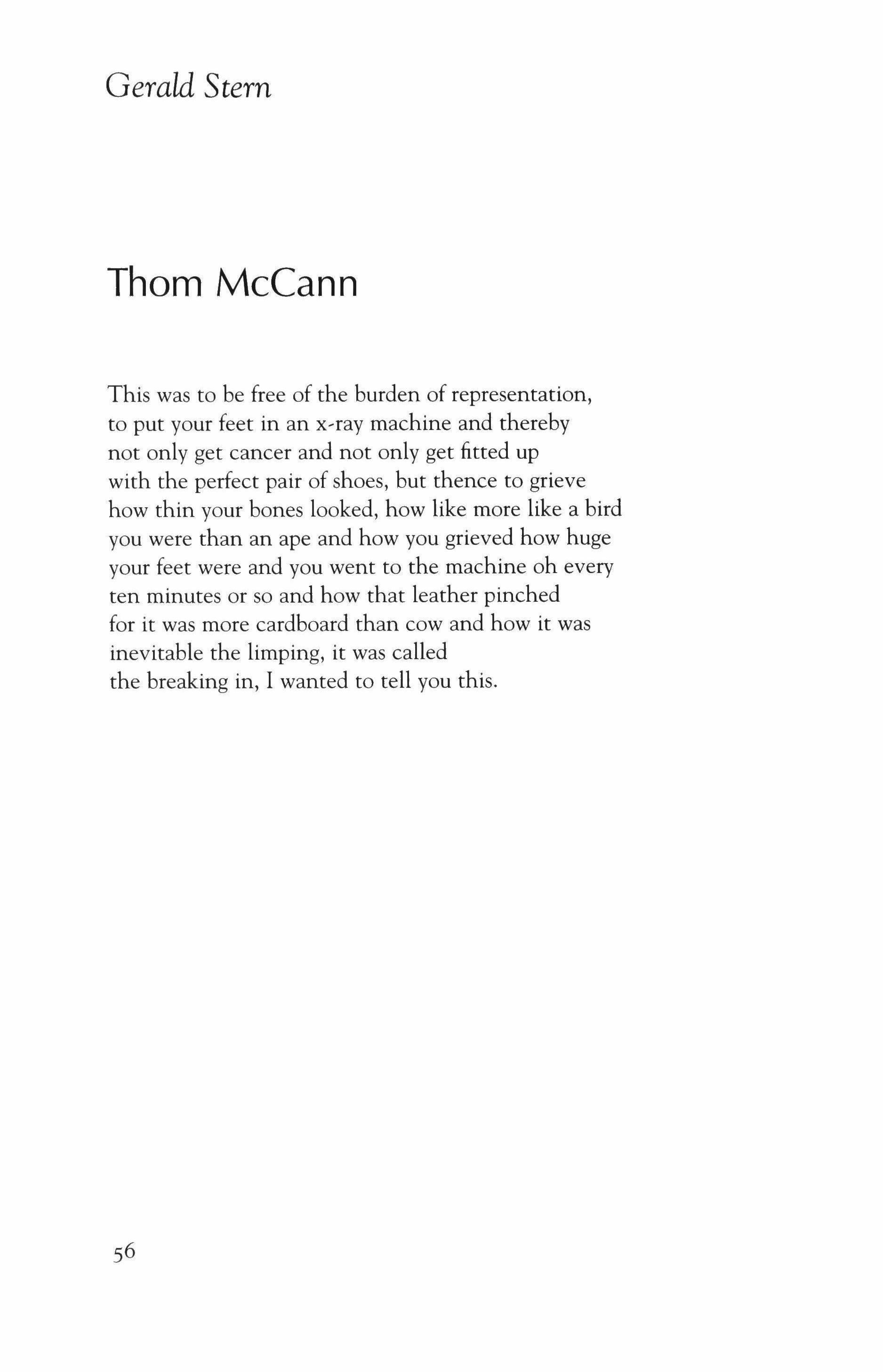
Thorn
McCann
This was to be free of the burden of representation, to put your feet in an x-ray machine and thereby not only get cancer and not only get fitted up with the perfect pair of shoes, but thence to grieve how thin your bones looked, how like more like a bird you were than an ape and how you grieved how huge your feet were and you went to the machine oh every ten minutes or so and how that leather pinched for it was more cardboard than cow and how it was inevitable the limping, it was called the breaking in, I wanted to tell you this.
56
Blue Like That
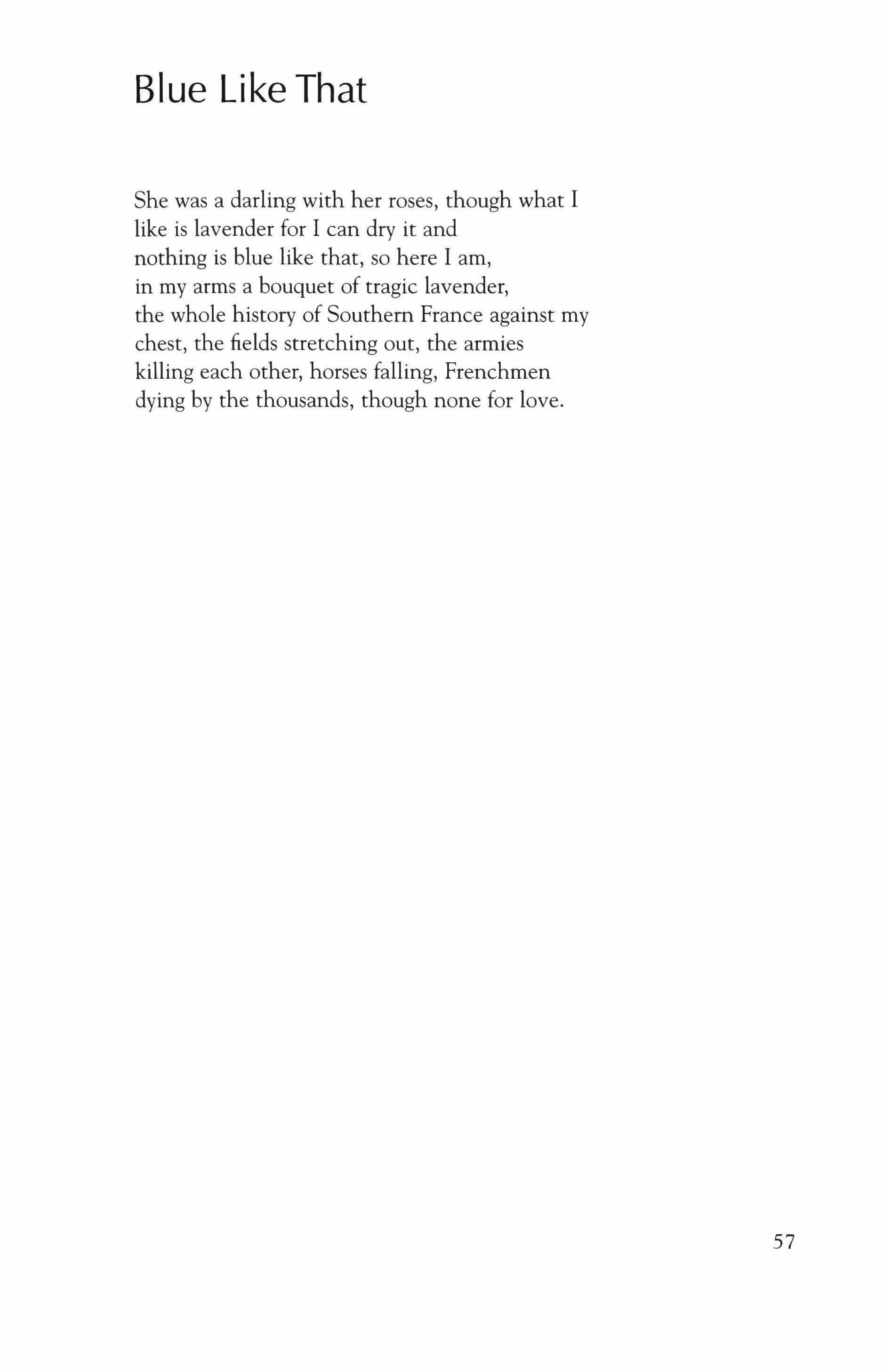
She was a darling with her roses, though what I like is lavender for I can dry it and nothing is blue like that, so here I am, in my arms a bouquet of tragic lavender, the whole history of Southern France against my chest, the fields stretching out, the armies killing each other, horses falling, Frenchmen dying by the thousands, though none for love.
57
Catherine Bowman
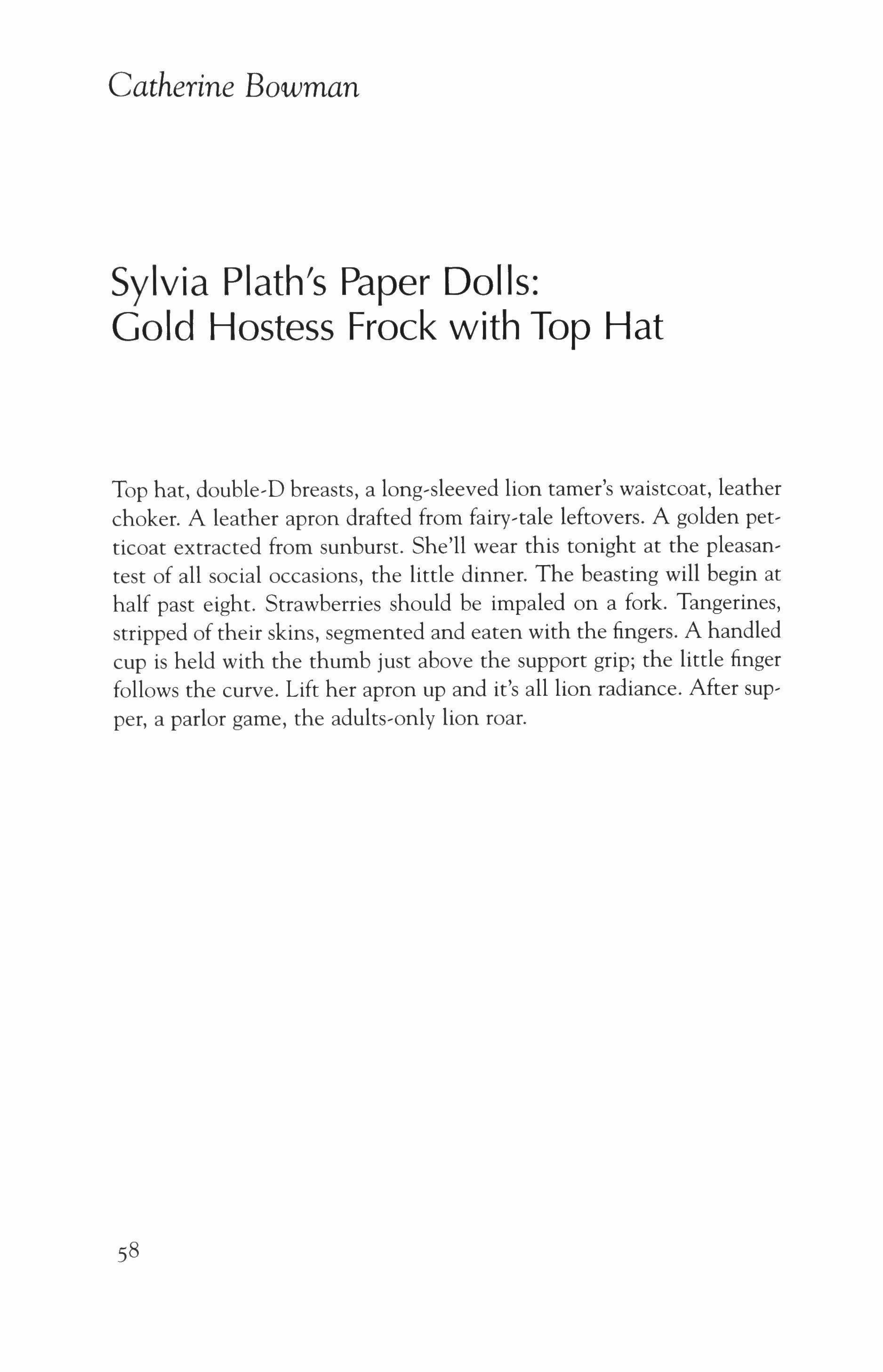
Sylvia Plath's Paper Dolls: Gold
Hostess Frock with Top Hat
Top hat, double-D breasts, a long-sleeved lion tamer's waistcoat, leather choker. A leather apron drafted from fairy-tale leftovers. A golden petticoat extracted from sunburst. She'll wear this tonight at the pleasantest of all social occasions, the little dinner. The beasting will begin at half past eight. Strawberries should be impaled on a fork. Tangerines, stripped of their skins, segmented and eaten with the fingers. A handled cup is held with the thumb just above the support grip; the little finger follows the curve. Lift her apron up and it's all lion radiance. After supper, a parlor game, the adults-only lion roar.
58
Sylvia Plath's Paper Dolls: Three Black Skirts

Three black skirts. Three black rooks. Three black tulips. The pupils widen and widen until all is raw ink. Now it is nighttime-zero brilliance-the dark half-world, the lower world, the other hemisphere. Three black glass blown lamps for the casino. Place your bets for the blackjack's ace. Three black skirts in eight black shades: grotto lung, torch god, urge, uh, French noon, egg foo, yuletide, and her brother's masculine typewriter. Mathematical skirts. They are clocks. Little obsidian mountains, tick-rock, there's no one on top. Three black skirts! Full and tight as a train whistle. Dilation distilled, only train tunnels here. Black dove annunciation. Three glass black bells. Good luck comes in threes. Three times the black dog swims in a circle. Conversational volcano jars. Three black skirts! Flared heaviness just right for a belt. Lady of the house, she must invent only black flowers, tend her black hens and their precious black eggs. She keeps the floors polished and the hearts fattened in the state room. The sea spilling throughpell-mell blue-black. Pick a skirt, any skirt: number one, number two, or number three. And in the evening him-pink paws-a lick of milk along a royal highway. Now, let's paint mouths.
59
Sylvia Plath's Paper Dolls: Midnight Blue Gown with Cape

Gown sculpted from night sky, stitched with Eve's tears. Stars spin around the skin-tight blue tent. She is ready for anything blue now. Midnight blue cape. Midnight ocean. A bodice-wrapped full-moon reflection, moonskin across a low tide. A gown lined with two magenta waves: wave and inner wave solidified for a viola lesson or an evening of rabbiting. Hunting fish-glass in a gown of cave-glow. Curvy, up against blue French doors. French doors always just barely ajar. She strokes a slutty blue kitten, gazes out at a man in black on the magenta breakwater. Venus, anti-Venus, Venus, anti-Venus she counts on the petals of an upside-down flower. Curvy blue, she plucks a pair of children's scissors hanging from a tree and cuts five yellow stars out of the sky. She places one star on her hip, one between her breasts, one on each slipper, and one on her matching midnight blue mask. The great Connemara sky cows' butter, the sugar-and-butter stars.
60
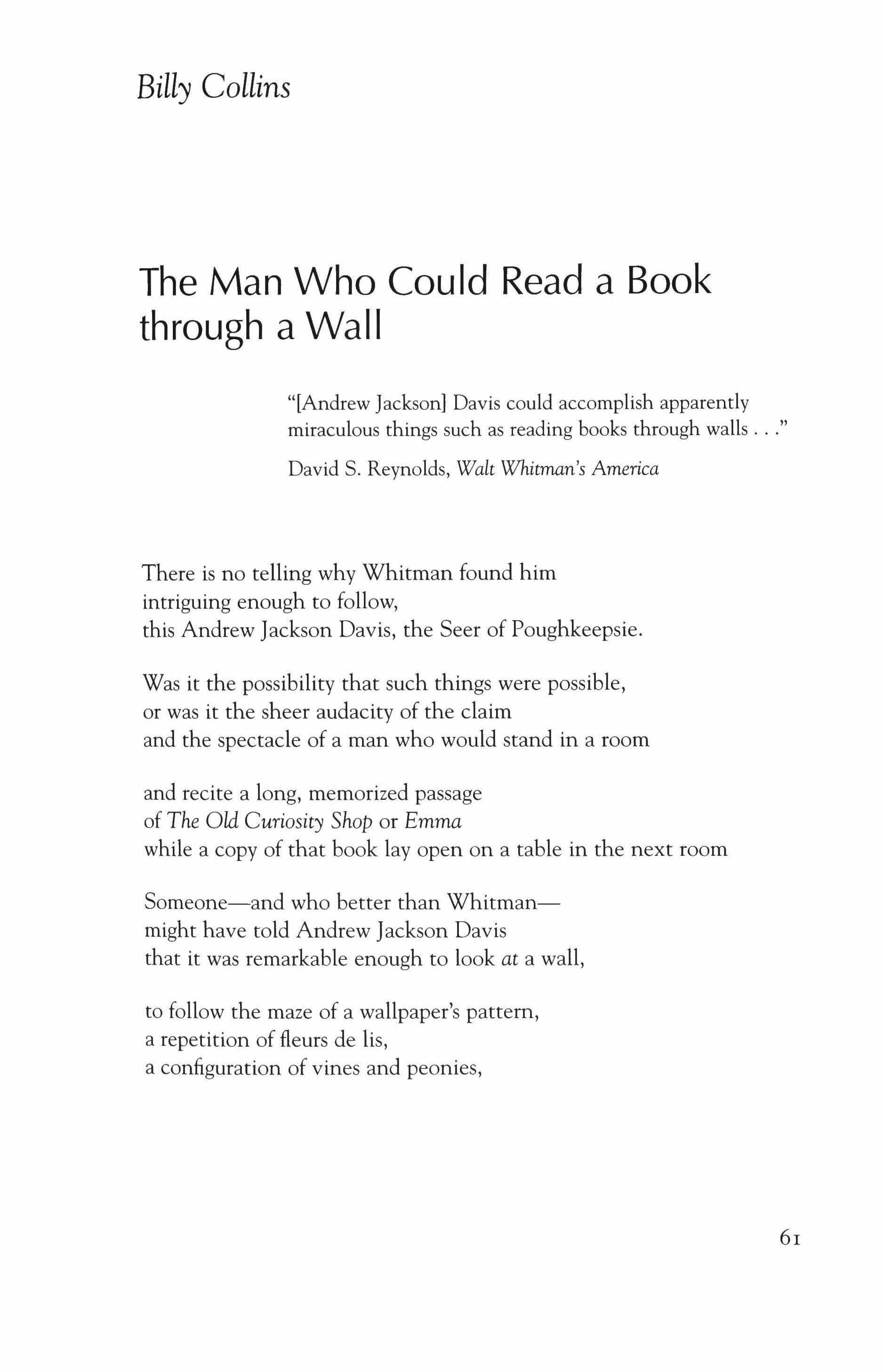
The Man Who Could Read a Book through a Wall
"[Andrew Jackson] Davis could accomplish apparently miraculous things such as reading books through walls
David S. Reynolds, Walt Whitman's America
There is no telling why Whitman found him intriguing enough to follow, this Andrew Jackson Davis, the Seer of Poughkeepsie.
Was it the possibility that such things were possible, or was it the sheer audacity of the claim and the spectacle of a man who would stand in a room and recite a long, memorized passage of The Old Curiosity Shop or Emma while a copy of that book lay open on a table in the next room
Someone-and who better than Whitmanmight have told Andrew Jackson Davis that it was remarkable enough to look at a wall, to follow the maze of a wallpaper's pattern, a repetition of fleurs de lis, a configuration of vines and peonies,
Billy
Collins
61

to walk closer and examine the oil painting hanging there in a wooden frame, the one of a sailing ship foundering in a storm at sea,
to wonder about the painter, now long dead, then to notice for the first time three tiny men clinging to the rigging.
I want to imagine Whitman taking Andrew Jackson Davis by the coat sleeve over to a window and showing him the crows on the lawn, the shade trees of the cemetery beyond. And if the two of them had gone out walking in the streets of Manhattan
then along the grassy banks of the Harlem River, perhaps that evening Andrew Jackson Davis would have read a book sitting alone in a chair at home, his wife sewing on a button in the next room, content within the four walls of a room, returned at last to his remarkable normality.
Adage

When it's late at night and branches are banging against the windows, you might think that love is just a matter of leaping out of the frying pan of yourself into the fire of someone else, but it's a little more complicated than that.
It's more like trading the two birds who might be hiding in that bush for the one you are not holding in your hand.
A wise man once said that love was like forcing a horse to drink but then everyone stopped thinking of him as wise.
Let us be clear about something. Love is not as simple as getting up on the wrong side of the bed wearing the emperor's clothes.
No, it's more like the way the pen feels after it has defeated the sword. It's a little like the penny saved or the nine dropped stitches.
You look at me through the halo of the last candle and tell me love is an ill wind that has no turning, a road that blows no good, but I am here to remind you, as our shadows tremble on the walls, that love is the early bird who is better late than never.
Waiting
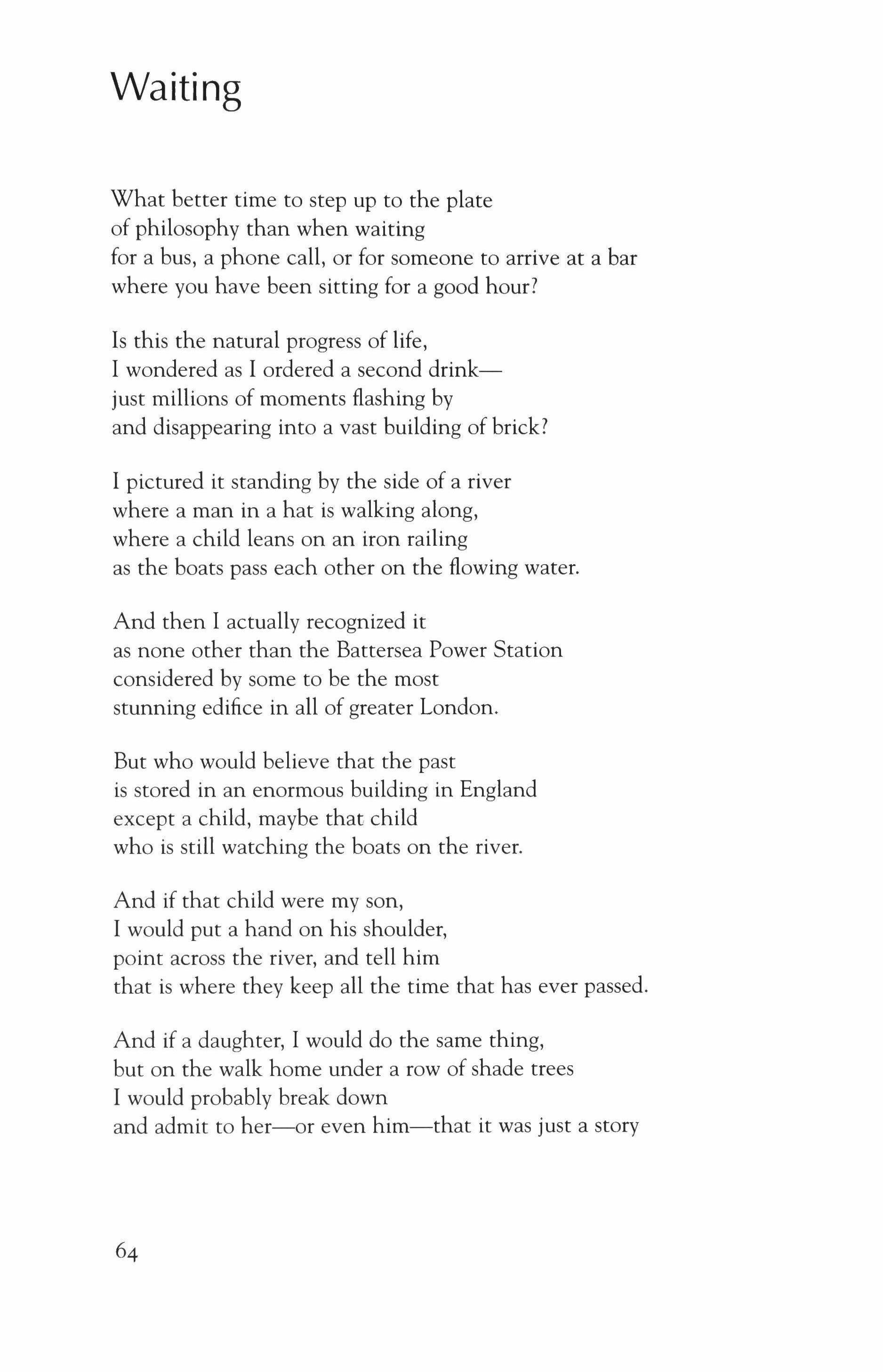
What better time to step up to the plate of philosophy than when waiting for a bus, a phone call, or for someone to arrive at a bar where you have been sitting for a good hour?
Is this the natural progress of life, I wondered as I ordered a second drinkjust millions of moments flashing by and disappearing into a vast building of brick?
I pictured it standing by the side of a river where a man in a hat is walking along, where a child leans on an iron railing as the boats pass each other on the flowing water.
And then I actually recognized it as none other than the Battersea Power Station considered by some to be the most stunning edifice in all of greater London.
But who would believe that the past is stored in an enormous building in England except a child, maybe that child who is still watching the boats on the river.
And if that child were my son, I would put a hand on his shoulder, point across the river, and tell him that is where they keep all the time that has ever passed.
And if a daughter, I would do the same thing, but on the walk home under a row of shade trees I would probably break down and admit to her-or even him-that it was just a story

I made up while waiting for someone in a bar in New York, and because she was so late she had to sit and listen to the longer version of how the past is not mere concept
or a realm we have never occupied any more than we will ever occupy the future, but rather a thing of extraordinary size salted away in a massive power station.
Where are the snows of yesteryear? Where have all the flowers gone? And the lightfoot lads and the rose-lipped maidens? Across the flowing river in that big building made of brick.
65
Richard Howard
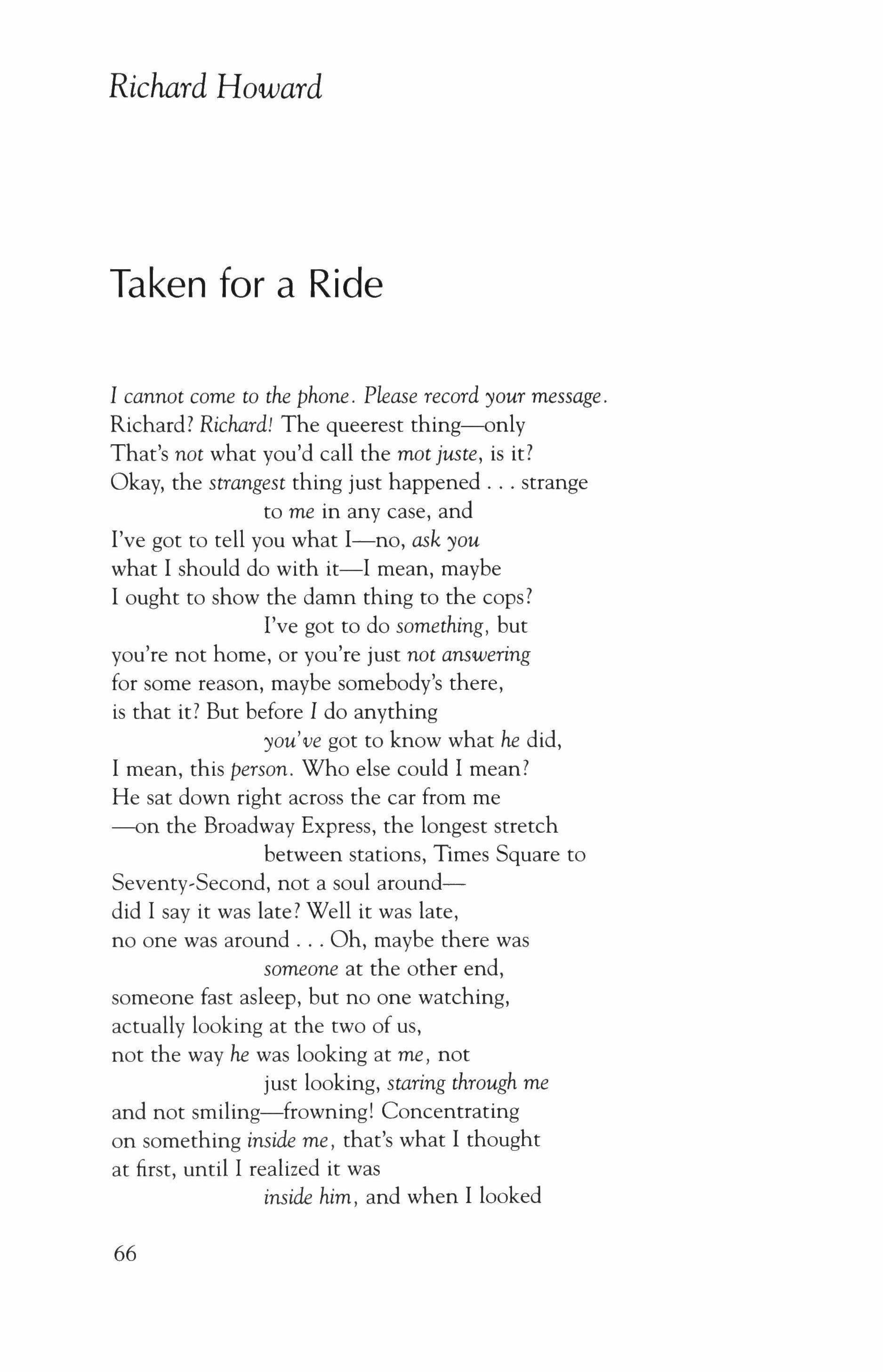
Taken for a Ride
I cannot come to the phone. Please record your message. Richard? Richard! The queerest thing-only That's not what you'd call the mot juste, is it? Okay, the strangest thing just happened strange to me in any case, and I've got to tell you what I-no, ask you what I should do with it-I mean, maybe I ought to show the damn thing to the cops? I've got to do something, but you're not home, or you're just not answering for some reason, maybe somebody's there, is that it? But before I do anything you've got to know what he did, I mean, this person. Who else could I mean? He sat down right across the car from me -on the Broadway Express, the longest stretch between stations, Times Square to Seventy-Second, not a soul arounddid I say it was late? Well it was late, no one was around Oh, maybe there was someone at the other end, someone fast asleep, but no one watching, actually looking at the two of us, not the way he was looking at me, not just looking, staring through me and not smiling-frowning! Concentrating on something inside me, that's what I thought at first, until I realized it was inside him, and when I looked
66
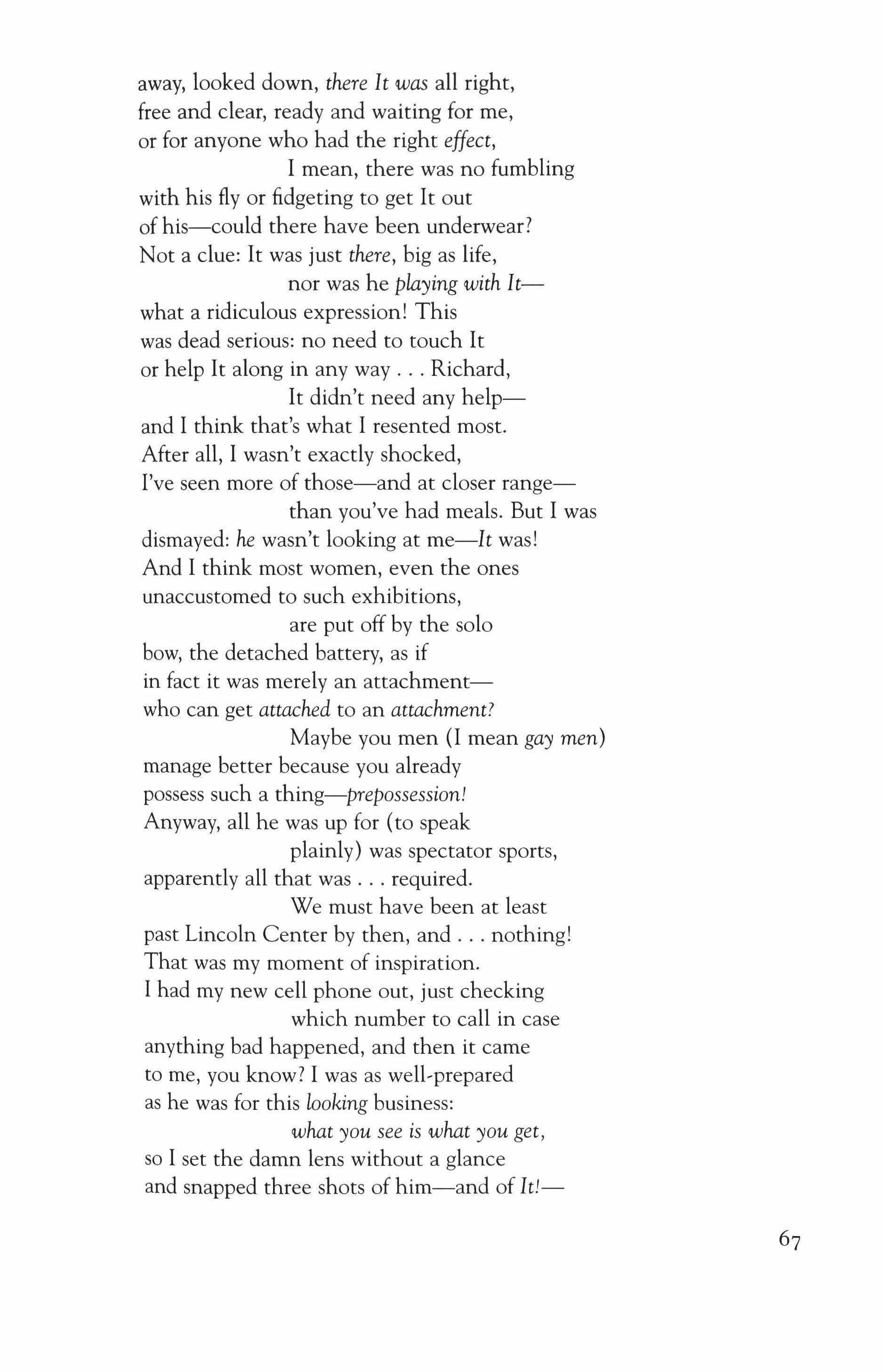
away, looked down, there It was all right, free and clear, ready and waiting for me, or for anyone who had the right effect, I mean, there was no fumbling with his fly or fidgeting to get It out of his-could there have been underwear? Not a clue: It was just there, big as life, nor was he playing with Itwhat a ridiculous expression! This was dead serious: no need to touch It or help It along in any way Richard, It didn't need any helpand I think that's what I resented most.
After all, I wasn't exactly shocked, I've seen more of those-and at closer rangethan you've had meals. But I was dismayed: he wasn't looking at me-It was! And I think most women, even the ones unaccustomed to such exhibitions, are put off by the solo bow, the detached battery, as if in fact it was merely an attachmentwho can get attached to an attachment?
Maybe you men (I mean gay men) manage better because you already possess such a thing-prepossession! Anyway, all he was up for (to speak plainly) was spectator sports, apparently all that was required. We must have been at least past Lincoln Center by then, and nothing! That was my moment of inspiration. I had my new cell phone out, just checking which number to call in case anything bad happened, and then it came to me, you know? I was as well-prepared as he was for this looking business: what you see is what you get, so I set the damn lens without a glance and snapped three shots of him-and of It!-
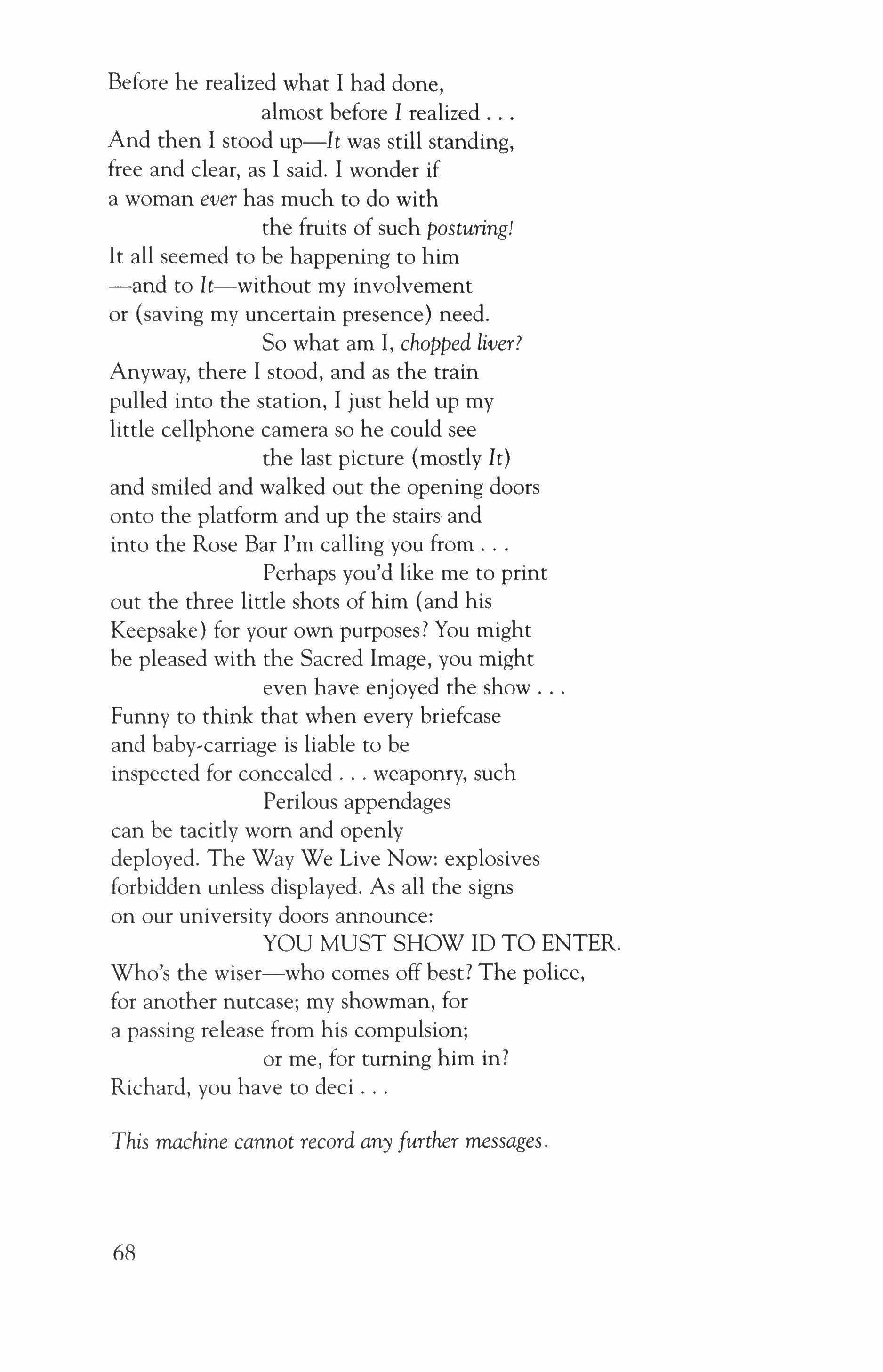
Before he realized what I had done, almost before I realized And then I stood up-It was still standing, free and clear, as I said. I wonder if a woman ever has much to do with the fruits of such posturing! It all seemed to be happening to him -and to It-without my involvement or (saving my uncertain presence) need. So what am I, chopped liver? Anyway, there I stood, and as the train pulled into the station, I just held up my little cellphone camera so he could see the last picture (mostly It) and smiled and walked out the opening doors onto the platform and up the stairs and into the Rose Bar I'm calling you from
Perhaps you'd like me to print out the three little shots of him (and his Keepsake) for your own purposes? You might be pleased with the Sacred Image, you might even have enjoyed the show Funny to think that when every briefcase and baby-carriage is liable to be inspected for concealed weaponry, such Perilous appendages can be tacitly worn and openly deployed. The Way We Live Now: explosives forbidden unless displayed. As all the signs on our university doors announce: YOU MUST SHOW 10 TO ENTER. Who's the wiser-who comes off best? The police, for another nutcase; my showman, for a passing release from his compulsion; or me, for turning him in? Richard, you have to deci
This machine cannot record any further messages.
68
The Church of the New Jerusalem, Pawnee Rock, Kansas
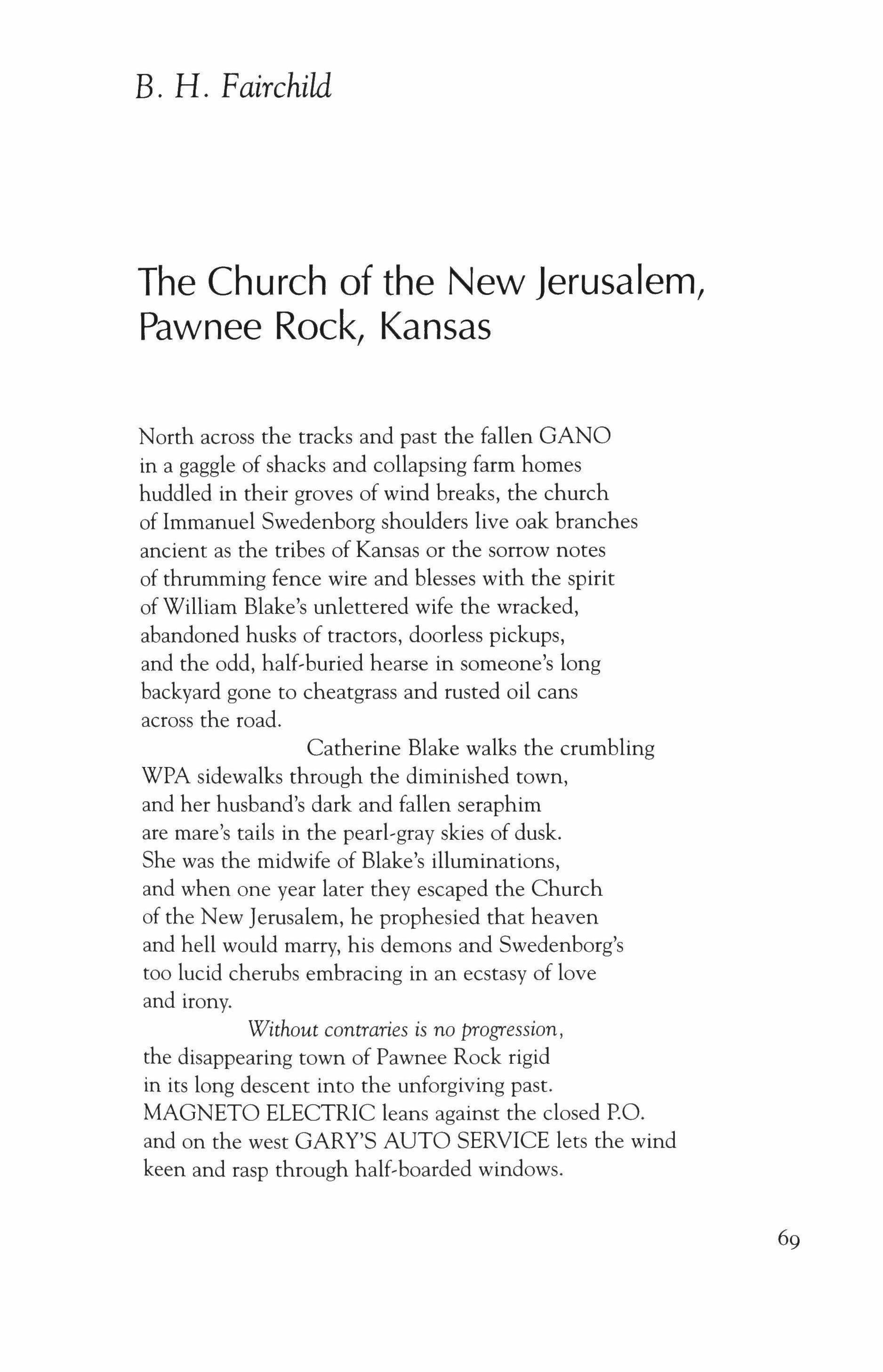
North across the tracks and past the fallen GANO in a gaggle of shacks and collapsing farm homes huddled in their groves of wind breaks, the church of Immanuel Swedenborg shoulders live oak branches ancient as the tribes of Kansas or the sorrow notes of thrumming fence wire and blesses with the spirit of William Blake's unlettered wife the wracked, abandoned husks of tractors, doorless pickups, and the odd, half-buried hearse in someone's long backyard gone to cheatgrass and rusted oil cans across the road.
Catherine Blake walks the crumbling WPA sidewalks through the diminished town, and her husband's dark and fallen seraphim are mare's tails in the pearl-gray skies of dusk. She was the midwife of Blake's illuminations, and when one year later they escaped the Church of the New Jerusalem, he prophesied that heaven and hell would marry, his demons and Swedenborg's too lucid cherubs embracing in an ecstasy of love and irony.
Without contraries is no progression, the disappearing town of Pawnee Rock rigid in its long descent into the unforgiving past.
MAGNETO ELECTRIC leans against the closed P.O. and on the west GARY'S AUTO SERVICE lets the wind keen and rasp through half-boarded windows.
B. H. Fairchild
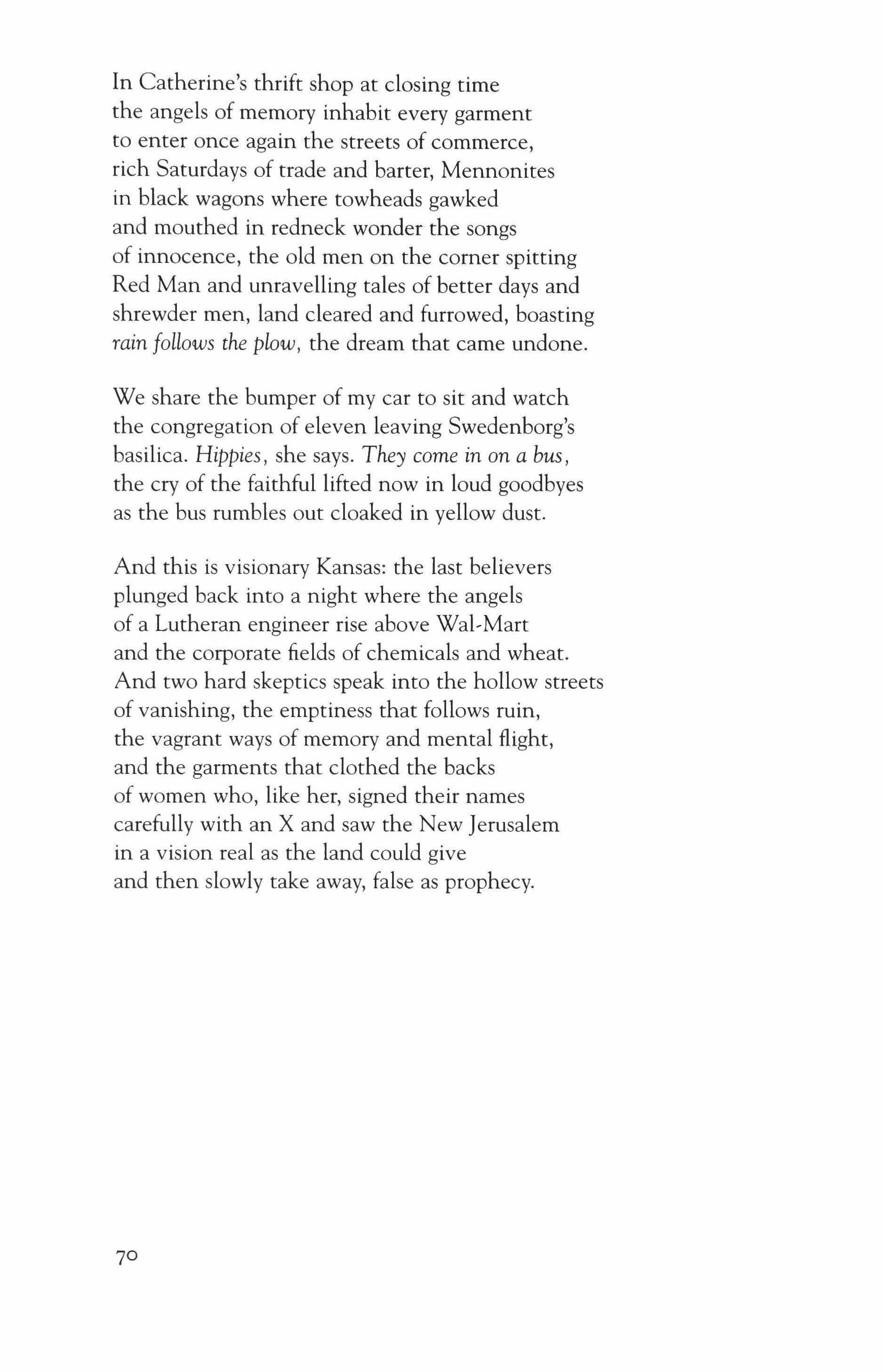
In Catherine's thrift shop at closing time the angels of memory inhabit every garment to enter once again the streets of commerce, rich Saturdays of trade and barter, Mennonites in black wagons where towheads gawked and mouthed in redneck wonder the songs of innocence, the old men on the corner spitting Red Man and unravelling tales of better days and shrewder men, land cleared and furrowed, boasting rain follows the plow, the dream that came undone.
We share the bumper of my car to sit and watch the congregation of eleven leaving Swedenborg's basilica. Hippies, she says. They come in on a bus, the cry of the faithful lifted now in loud goodbyes as the bus rumbles out cloaked in yellow dust.
And this is visionary Kansas: the last believers plunged back into a night where the angels of a Lutheran engineer rise above Wal-Mart and the corporate fields of chemicals and wheat. And two hard skeptics speak into the hollow streets of vanishing, the emptiness that follows ruin, the vagrant ways of memory and mental flight, and the garments that clothed the backs of women who, like her, signed their names carefully with an X and saw the New Jerusalem in a vision real as the land could give and then slowly take away, false as prophecy.
The Gray Man
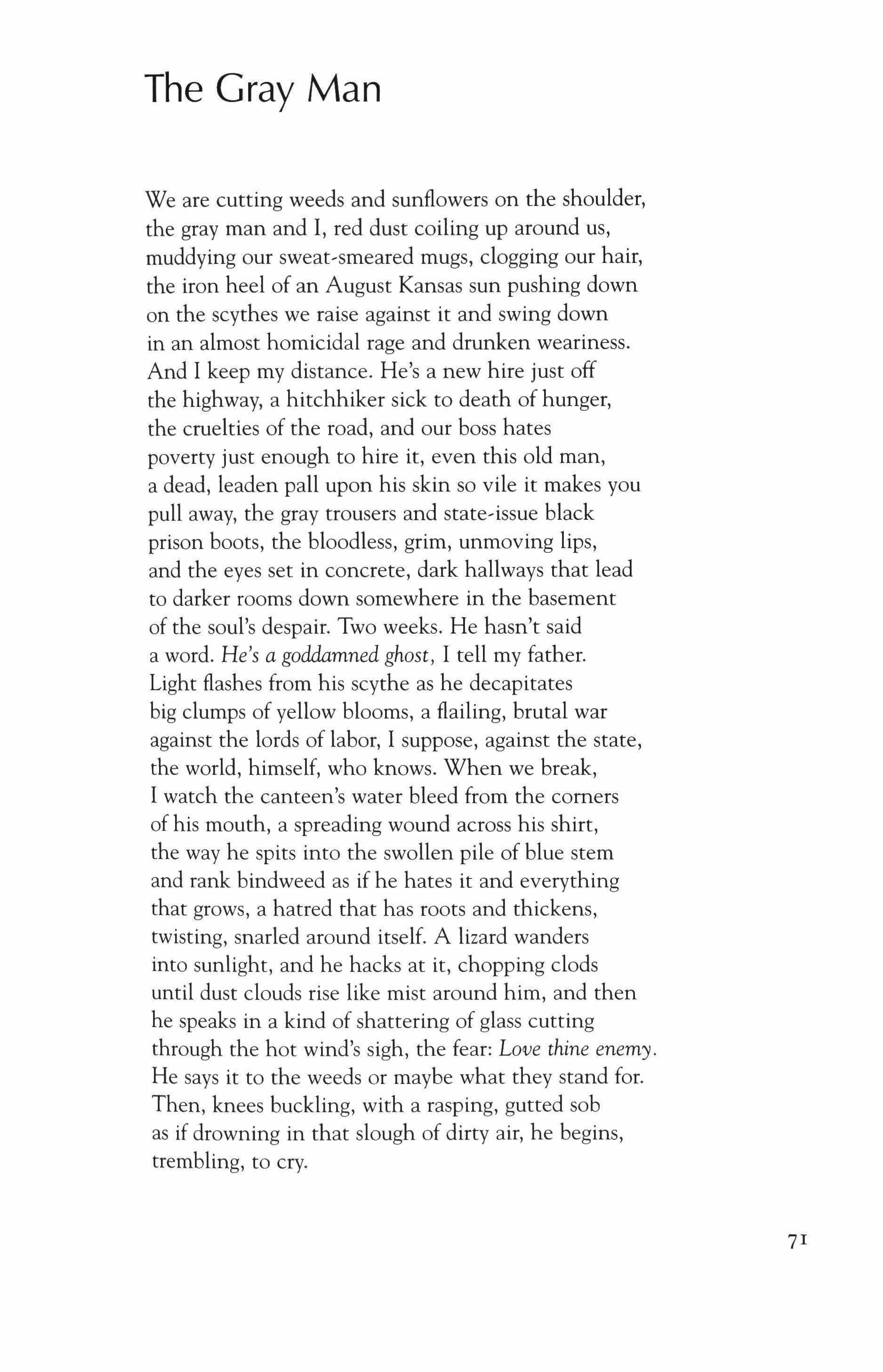
We are cutting weeds and sunflowers on the shoulder, the gray man and I, red dust coiling up around us, muddying our sweat-smeared mugs, clogging our hair, the iron heel of an August Kansas sun pushing down on the scythes we raise against it and swing down in an almost homicidal rage and drunken weariness. And I keep my distance. He's a new hire just off the highway, a hitchhiker sick to death of hunger, the cruelties of the road, and our boss hates poverty just enough to hire it, even this old man, a dead, leaden pall upon his skin so vile it makes you pull away, the gray trousers and state-issue black prison boots, the bloodless, grim, unmoving lips, and the eyes set in concrete, dark hallways that lead to darker rooms down somewhere in the basement of the soul's despair. Two weeks. He hasn't said a word. He's a goddamned ghost, I tell my father. Light flashes from his scythe as he decapitates big clumps of yellow blooms, a flailing, brutal war against the lords of labor, I suppose, against the state, the world, himself, who knows. When we break, I watch the canteen's water bleed from the comers of his mouth, a spreading wound across his shirt, the way he spits into the swollen pile of blue stem and rank bindweed as if he hates it and everything that grows, a hatred that has roots and thickens, twisting, snarled around itself. A lizard wanders into sunlight, and he hacks at it, chopping clods until dust clouds rise like mist around him, and then he speaks in a kind of shattering of glass cutting through the hot wind's sigh, the fear: Love thine enemy. He says it to the weeds or maybe what they stand for. Then, knees buckling, with a rasping, gutted sob as if drowning in that slough of dirty air, he begins, trembling, to cry.
71
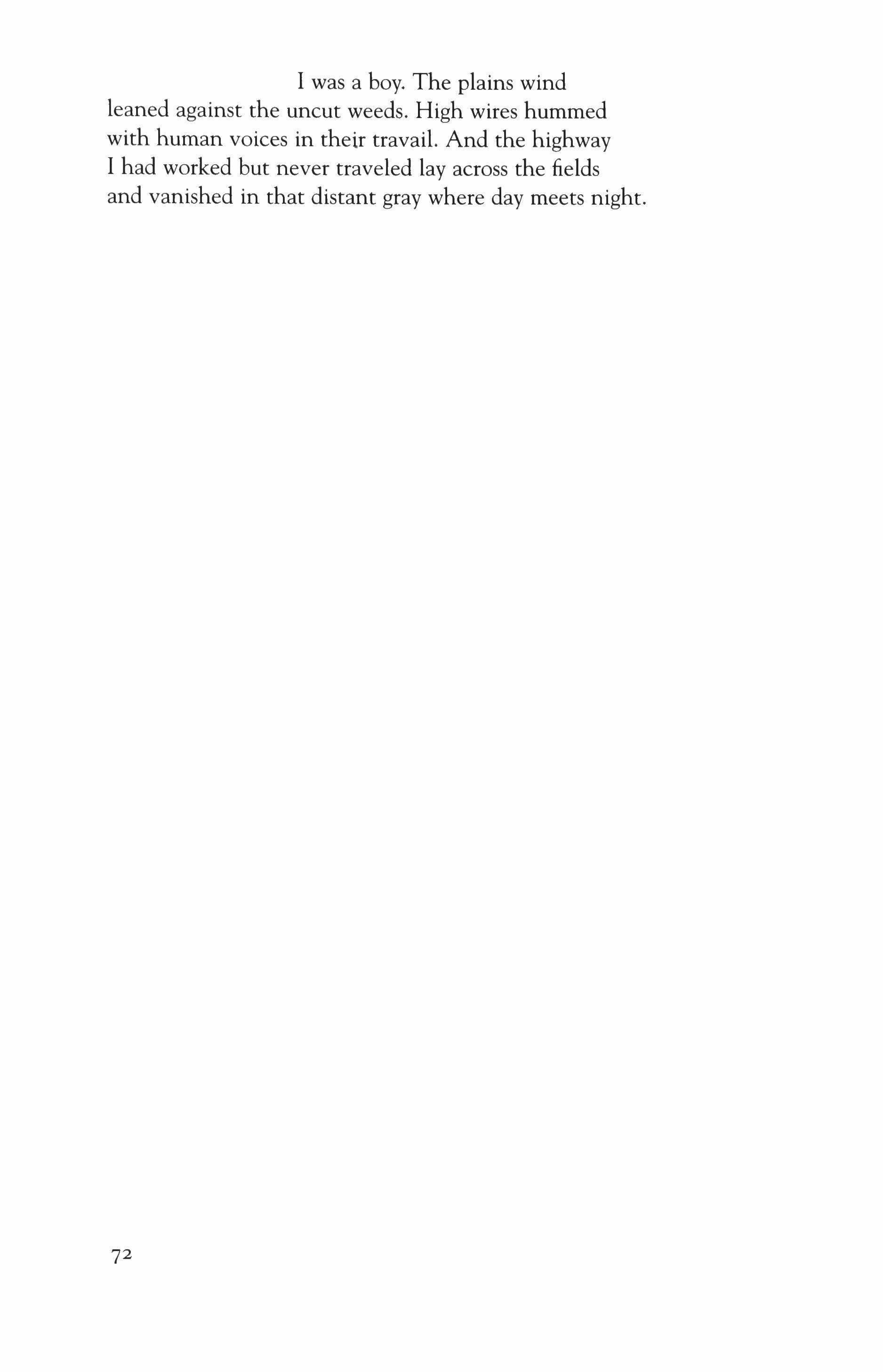
I was a boy. The plains wind leaned against the uncut weeds. High wires hummed with human voices in their travail. And the highway I had worked but never traveled lay across the fields and vanished in that distant gray where day meets night.
Jason Bredle
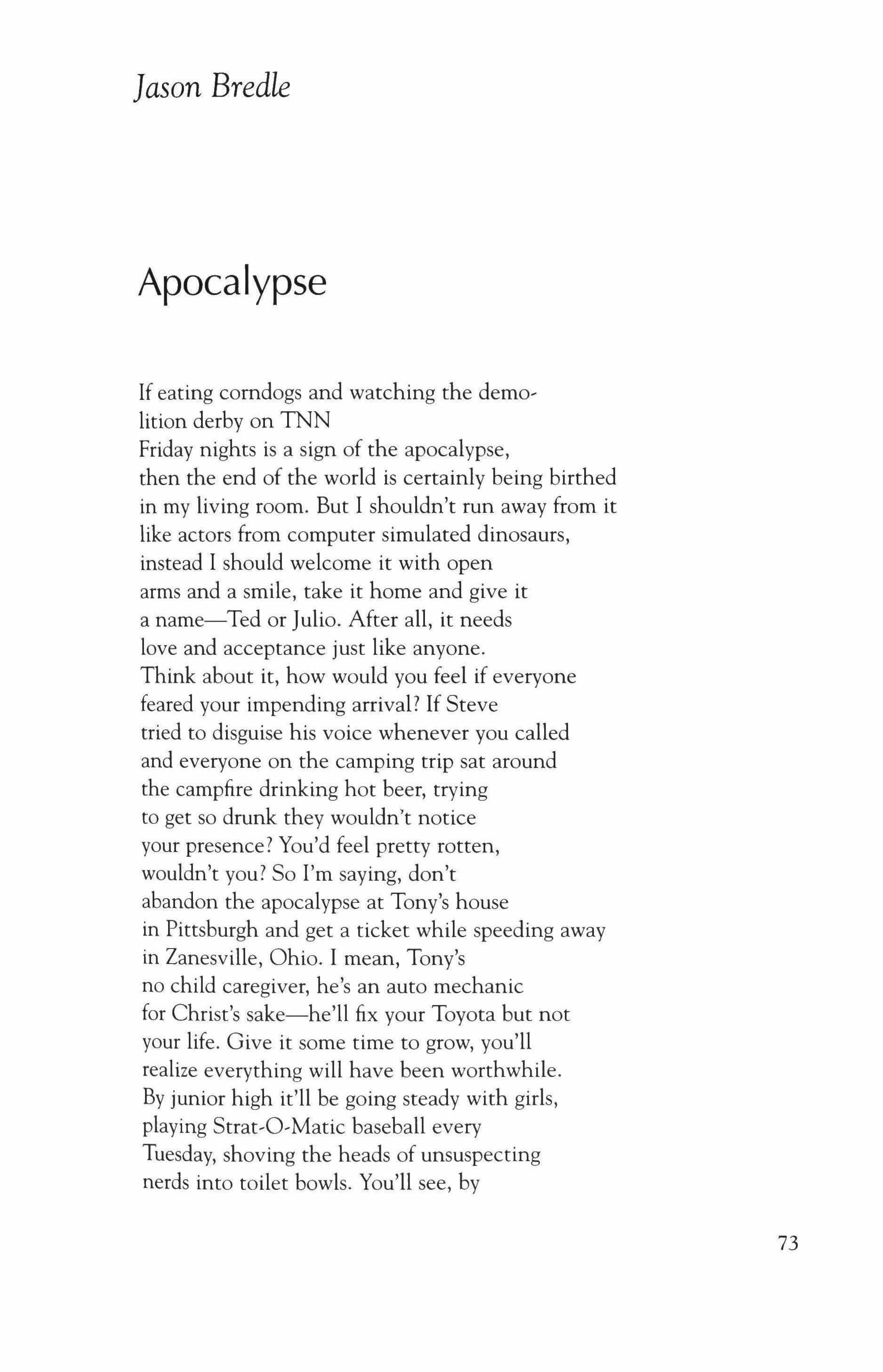
Apocalypse
If eating comdogs and watching the demolition derby on TNN Friday nights is a sign of the apocalypse, then the end of the world is certainly being birthed in my living room. But I shouldn't run away from it like actors from computer simulated dinosaurs, instead I should welcome it with open arms and a smile, take it home and give it a name-Ted or Julio. After all, it needs love and acceptance just like anyone. Think about it, how would you feel if everyone feared your impending arrival? If Steve tried to disguise his voice whenever you called and everyone on the camping trip sat around the campfire drinking hot beer, trying to get so drunk they wouldn't notice your presence? You'd feel pretty rotten, wouldn't you? So I'm saying, don't abandon the apocalypse at Tony's house in Pittsburgh and get a ticket while speeding away in Zanesville, Ohio. I mean, Tony's no child caregiver, he's an auto mechanic for Christ's sake-he'll fix your Toyota but not your life. Give it some time to grow, you'll realize everything will have been worthwhile. By junior high it'll be going steady with girls, playing Strat�O�Matic baseball every Tuesday, shoving the heads of unsuspecting nerds into toilet bowls. You'll see, by
73

high school it'll be dating a cheerleader named Crystal and be captain of the football team. It'll finally get that metallic blue Firebird working. It'll graduate, go to business college, flunk out, get a job at the alignment place west of town, spray paint Crystal Hudson's name on an overpass just before she leaves it for a guy who repairs small engines at Rick's Small Engine Repair. It'll spend its nights on the back porch drinking Wild Turkey and Old Milwaukee, pining for the good old days. Pretty soon everything will begin to fall apartit'll be buying more and more shotguns and stashing them in the closet, talking about our right to bear arms. It'll start saying backwoods militia groups make a lot of sense. That's when everything will go down. You'll be sitting around one afternoon watching Mama's Family because it's on Channel 2 and Channel 2 is the only channel you get, and everything prophesied will erupt. Most will die. And you'll be one of the last remaining, driving down I�64 in a white Toronado, turning the radio to AM 1610 for some information-weather, tourism, fishing, you won't care. You'll be searching for an off track wagering facility to put 500 dollars down on inescapable death and end up at a British Petroleum in Burnt Prairie, Illinois, refueling and cleaning your windshield in silence, a Ford Aerostar on either side of you filled with men staring at you, mumbling to one another in Spanish.
74
The Year of Living Regrettably
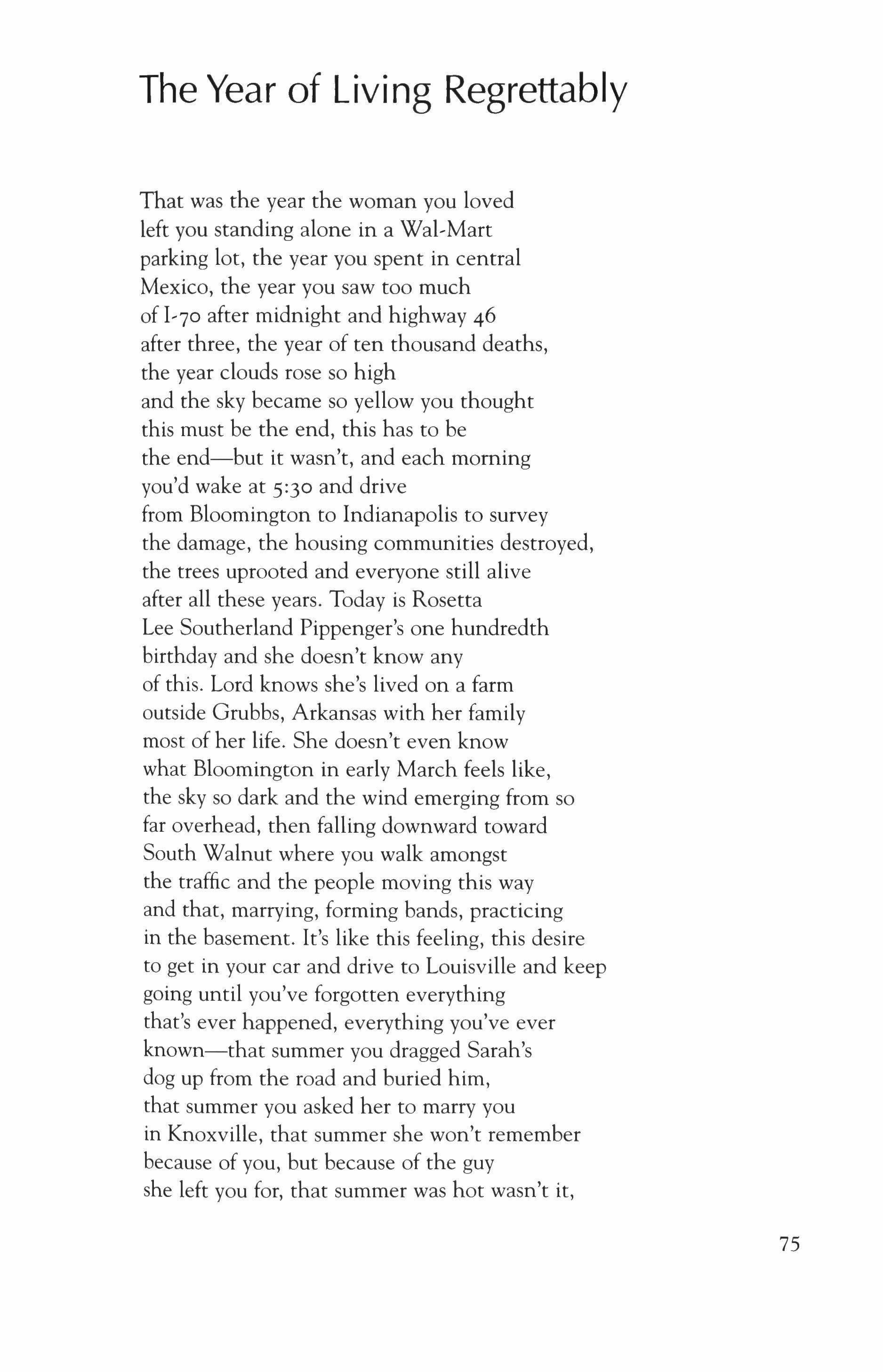
That was the year the woman you loved left you standing alone in a Wal�Mart parking lot, the year you spent in central Mexico, the year you saw too much of 1-70 after midnight and highway 46 after three, the year of ten thousand deaths, the year clouds rose so high and the sky became so yellow you thought this must be the end, this has to be the end-but it wasn't, and each morning you'd wake at 5:30 and drive from Bloomington to Indianapolis to survey the damage, the housing communities destroyed, the trees uprooted and everyone still alive after all these years. Today is Rosetta Lee Southerland Pippenger's one hundredth birthday and she doesn't know any of this. Lord knows she's lived on a farm outside Grubbs, Arkansas with her family most of her life. She doesn't even know what Bloomington in early March feels like, the sky so dark and the wind emerging from so far overhead, then falling downward toward South Walnut where you walk amongst the traffic and the people moving this way and that, marrying, forming bands, practicing in the basement. It's like this feeling, this desire to get in your car and drive to Louisville and keep going until you've forgotten everything that's ever happened, everything you've ever known-that summer you dragged Sarah's dog up from the road and buried him, that summer you asked her to marry you in Knoxville, that summer she won't remember because of you, but because of the guy she left you for, that summer was hot wasn't it,
75
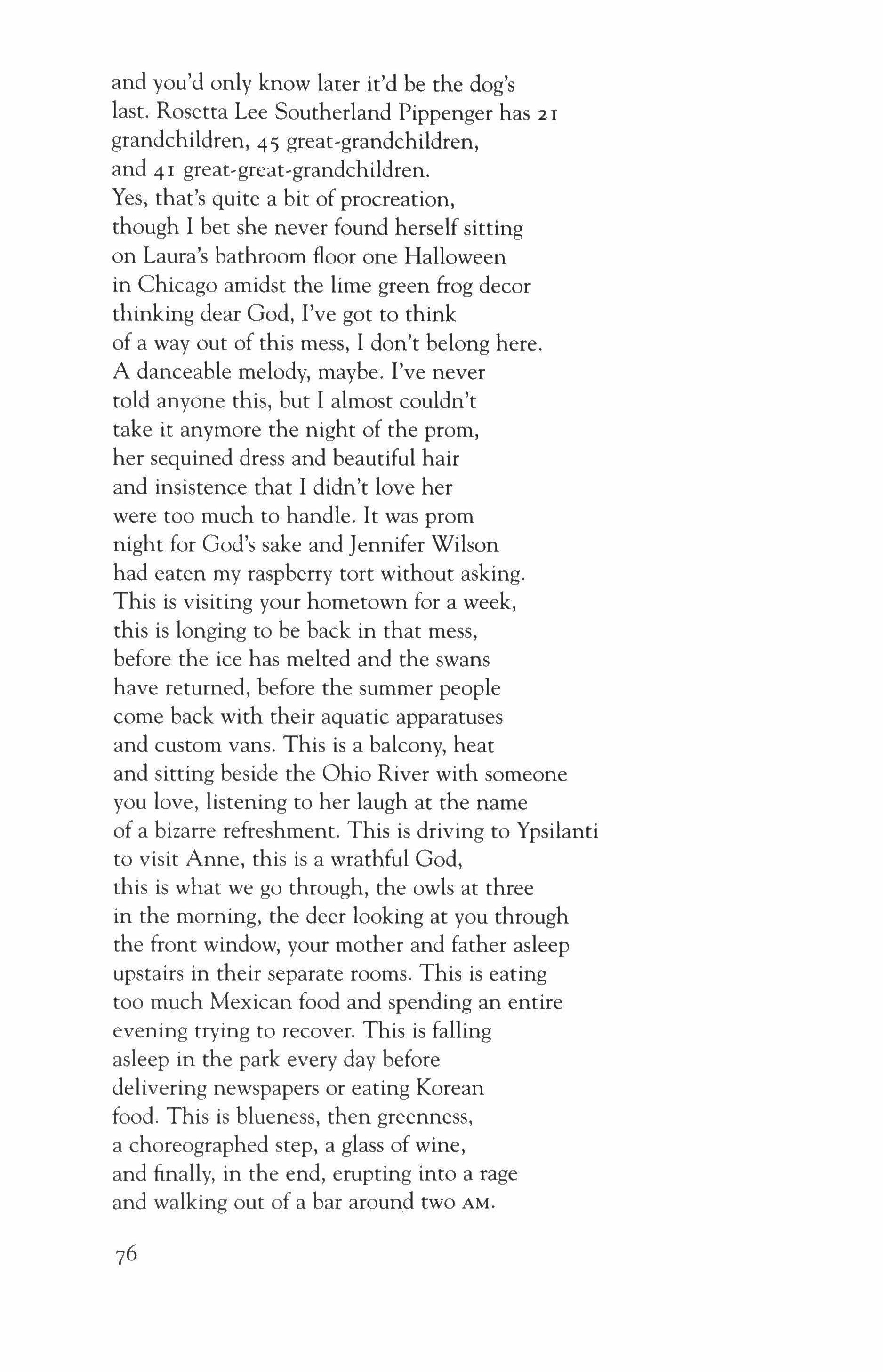
and you'd only know later it'd be the dog's last. Rosetta Lee Southerland Pippenger has 21 grandchildren, 45 great-grandchildren, and 41 great-great-grandchildren. Yes, that's quite a bit of procreation, though I bet she never found herself sitting on Laura's bathroom floor one Halloween in Chicago amidst the lime green frog decor thinking dear God, I've got to think of a way out of this mess, I don't belong here. A danceable melody, maybe. I've never told anyone this, but I almost couldn't take it anymore the night of the prom, her sequined dress and beautiful hair and insistence that I didn't love her were too much to handle. It was prom night for God's sake and Jennifer Wilson had eaten my raspberry tort without asking. This is visiting your hometown for a week, this is longing to be back in that mess, before the ice has melted and the swans have returned, before the summer people come back with their aquatic apparatuses and custom vans. This is a balcony, heat and sitting beside the Ohio River with someone you love, listening to her laugh at the name of a bizarre refreshment. This is driving to Ypsilanti to visit Anne, this is a wrathful God, this is what we go through, the owls at three in the morning, the deer looking at you through the front window, your mother and father asleep upstairs in their separate rooms. This is eating too much Mexican food and spending an entire evening trying to recover. This is falling asleep in the park every day before delivering newspapers or eating Korean food. This is blueness, then greenness, a choreographed step, a glass of wine, and finally, in the end, erupting into a rage and walking out of a bar around two AM.
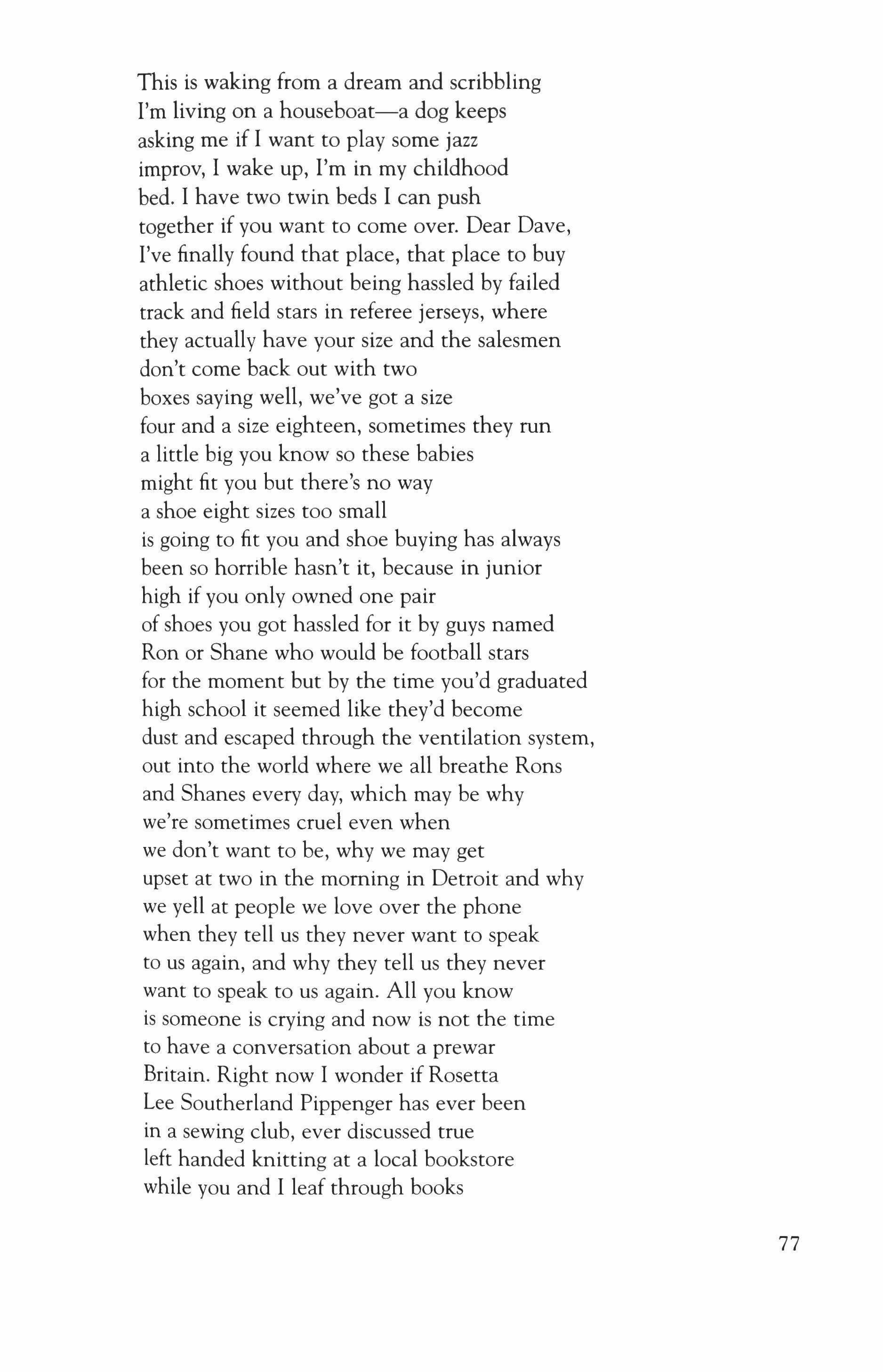
This is waking from a dream and scribbling I'm living on a houseboat-a dog keeps asking me if I want to play some jazz improv, I wake up, I'm in my childhood bed. I have two twin beds I can push together if you want to come over. Dear Dave, I've finally found that place, that place to buy athletic shoes without being hassled by failed track and field stars in referee jerseys, where they actually have your size and the salesmen don't come back out with two boxes saying well, we've got a size four and a size eighteen, sometimes they run a little big you know so these babies might fit you but there's no way a shoe eight sizes too small is going to fit you and shoe buying has always been so horrible hasn't it, because in junior high if you only owned one pair of shoes you got hassled for it by guys named Ron or Shane who would be football stars for the moment but by the time you'd graduated high school it seemed like they'd become dust and escaped through the ventilation system, out into the world where we all breathe Rons and Shanes every day, which may be why we're sometimes cruel even when we don't want to be, why we may get upset at two in the morning in Detroit and why we yell at people we love over the phone when they tell us they never want to speak to us again, and why they tell us they never want to speak to us again. All you know is someone is crying and now is not the time to have a conversation about a prewar Britain. Right now I wonder if Rosetta Lee Southerland Pippenger has ever been in a sewing club, ever discussed true left handed knitting at a local bookstore while you and I leaf through books
77
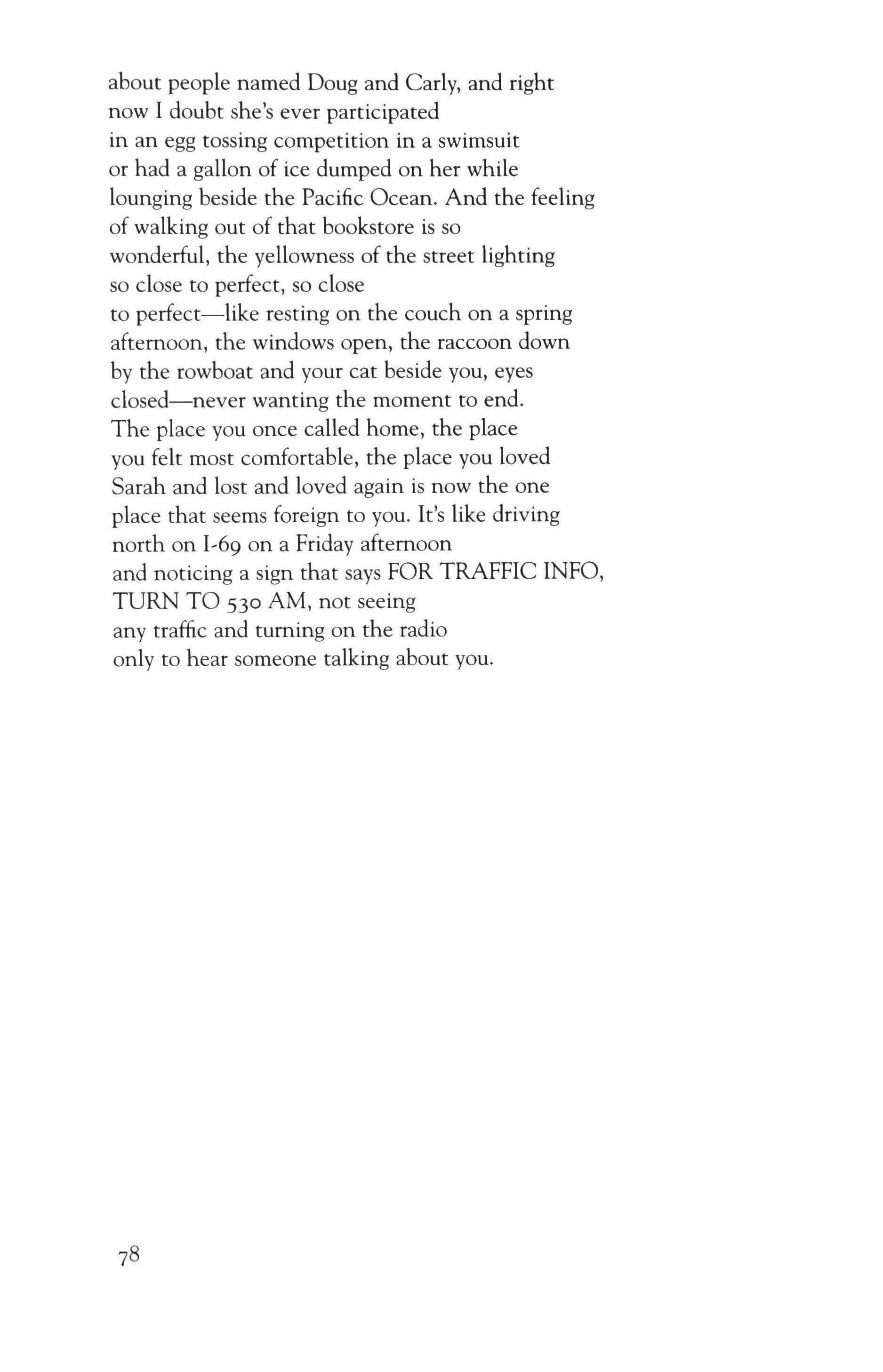
about people named Doug and Carly, and right now I doubt she's ever participated in an egg tossing competition in a swimsuit or had a gallon of ice dumped on her while lounging beside the Pacific Ocean. And the feeling of walking out of that bookstore is so wonderful, the yellowness of the street lighting so close to perfect, so close to perfect-like resting on the couch on a spring afternoon, the windows open, the raccoon down by the rowboat and your cat beside you, eyes closed-never wanting the moment to end. The place you once called home, the place you felt most comfortable, the place you loved Sarah and lost and loved again is now the one place that seems foreign to you. It's like driving north on 1�69 on a Friday afternoon and noticing a sign that says FOR TRAFFIC INFO, TURN TO 530 AM, not seeing any traffic and turning on the radio only to hear someone talking about you.
Denise Duhamel

Lucky Me
I've written two novels for adults and one for teens, none of which were published with covers, artwork on the front and blurbs on the back. They never were put on bookshelves in libraries or in stores, never assigned a price or a barcode, never marked down or remaindered. I never signed a copy or had someone come up to me to say, "Hey, I'm in the middle of your novel-not bad." The titles were Precious Blood, That Song You Know the One about Love, and It was Long Ago and Far Away. Wait, there is also a third adult novel in there somewhere, the second one I wrote-I can't even remember the title. Each took me over a year to finish. And there was a screenplay called Headlines, a comedy about a weather girl in New York and her crazy brother who wants to become famous, but he has no real talent and is not a murderer or a winning pie-eating contestant so he's pretty much screwed. I wrote that screenplay with Jim Fall who was more a director than a writer, though he was extremely funny with dialogue and had a great collection of movie posters and soundtrackswhen we got stuck in our plot, we'd get up and dance. Jim is gay and his music was mostly disco even though we wrote our screenplay in the late 80S. He later worked for Dolly Parton's production company and let me Xerox copies of Precious Blood in Dolly's office, on Dolly's dime. (I'm sorry, Dolly! I really thought the book would sell and then there'd be a screenplay that Jim and I would write and you'd have a big part and compose a song called "Precious Blood" for the soundtrack and that was how I was going to pay you back.) Jim went on to direct Trick-a great movie-and he's directing now for TV. I went on to write Pickles, another screenplay, this one
79
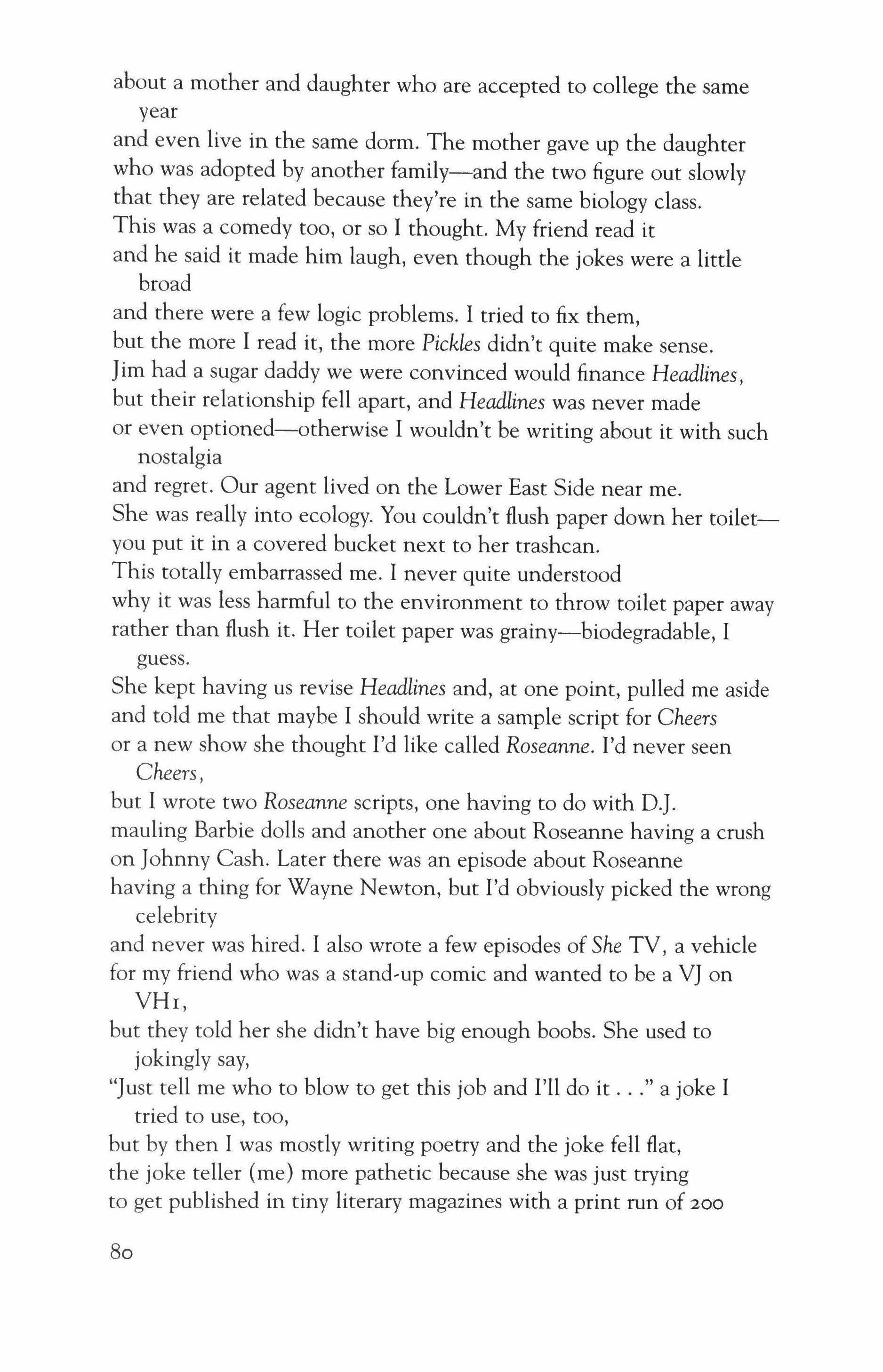
about a mother and daughter who are accepted to college the same year and even live in the same dorm. The mother gave up the daughter who was adopted by another family-and the two figure out slowly that they are related because they're in the same biology class. This was a comedy too, or so I thought. My friend read it and he said it made him laugh, even though the jokes were a little broad and there were a few logic problems. I tried to fix them, but the more I read it, the more Pickles didn't quite make sense. Jim had a sugar daddy we were convinced would finance Headlines, but their relationship fell apart, and Headlines was never made or even optioned-otherwise I wouldn't be writing about it with such nostalgia and regret. Our agent lived on the Lower East Side near me. She was really into ecology. You couldn't flush paper down her toiletyou put it in a covered bucket next to her trashcan. This totally embarrassed me. I never quite understood why it was less harmful to the environment to throw toilet paper away rather than flush it. Her toilet paper was grainy-biodegradable, I guess.
She kept having us revise Headlines and, at one point, pulled me aside and told me that maybe I should write a sample script for Cheers or a new show she thought I'd like called Roseanne. I'd never seen Cheers, but I wrote two Roseanne scripts, one having to do with D.J. mauling Barbie dolls and another one about Roseanne having a crush on Johnny Cash. Later there was an episode about Roseanne having a thing for Wayne Newton, but I'd obviously picked the wrong celebrity and never was hired. I also wrote a few episodes of She TV, a vehicle for my friend who was a stand-up comic and wanted to be a VJ on VHI, but they told her she didn't have big enough boobs. She used to jokingly say, "Just tell me who to blow to get this job and I'll do it a joke I tried to use, too, but by then I was mostly writing poetry and the joke fell flat, the joke teller (me) more pathetic because she was just trying to get published in tiny literary magazines with a print run of 200
80
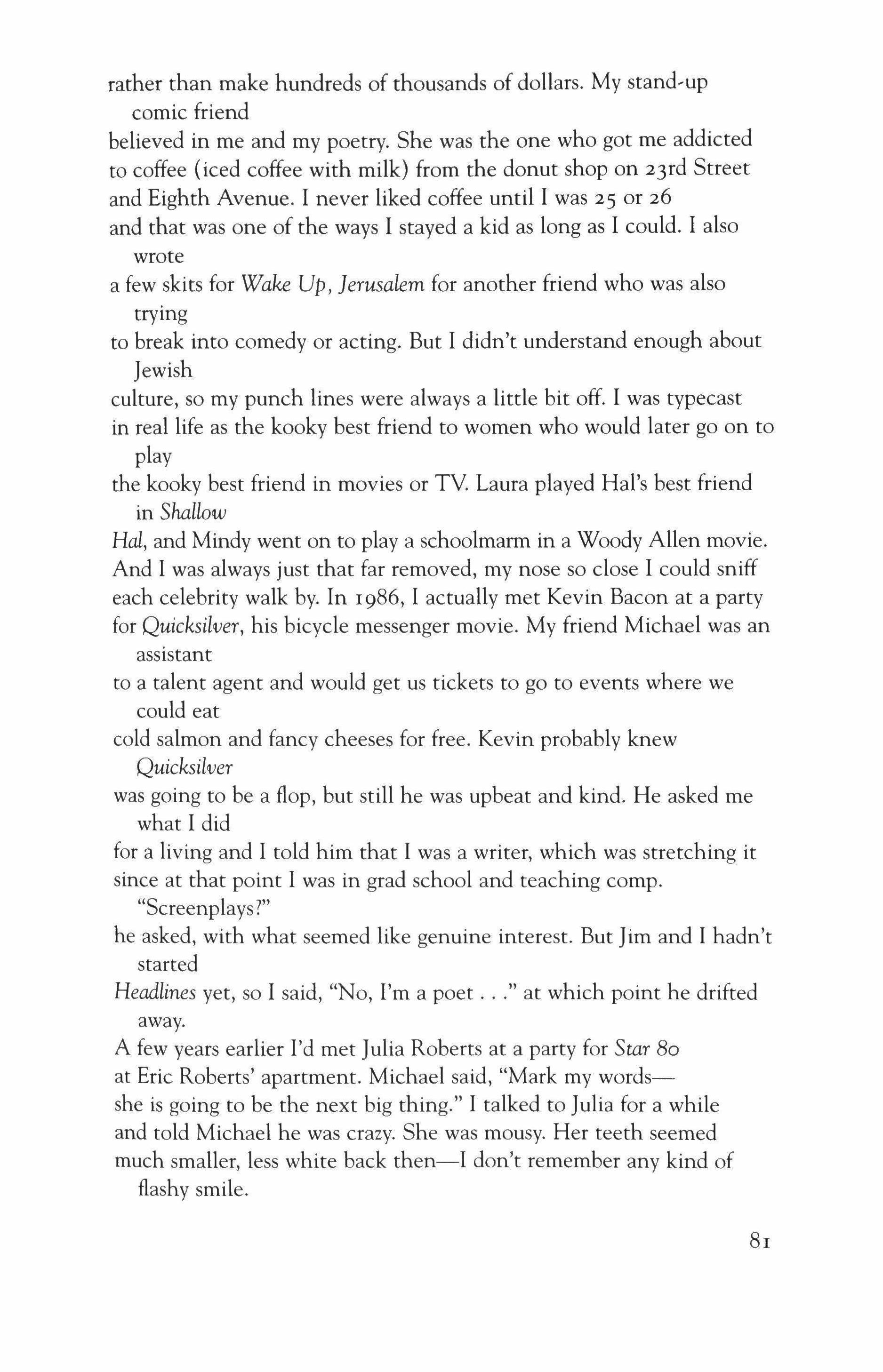
rather than make hundreds of thousands of dollars. My stand-up comic friend believed in me and my poetry. She was the one who got me addicted to coffee (iced coffee with milk) from the donut shop on 23rd Street and Eighth Avenue. I never liked coffee until I was 25 or 26 and that was one of the ways I stayed a kid as long as I could. I also wrote a few skits for Wake Up, Jerusalem for another friend who was also trying to break into comedy or acting. But I didn't understand enough about Jewish culture, so my punch lines were always a little bit off. I was typecast in real life as the kooky best friend to women who would later go on to play the kooky best friend in movies or TV. Laura played Hal's best friend in Shallow Hal, and Mindy went on to playa schoolmarm in a Woody Allen movie. And I was always just that far removed, my nose so close I could sniff each celebrity walk by. In 1986, I actually met Kevin Bacon at a party for Quicksilver, his bicycle messenger movie. My friend Michael was an assistant to a talent agent and would get us tickets to go to events where we could eat cold salmon and fancy cheeses for free. Kevin probably knew Quicksilver was going to be a flop, but still he was upbeat and kind. He asked me what I did for a living and I told him that I was a writer, which was stretching it since at that point I was in grad school and teaching cornp. "Screenplays?" he asked, with what seemed like genuine interest. But Jim and I hadn't started Headlines yet, so I said, "No, I'm a poet at which point he drifted away. A few years earlier I'd met Julia Roberts at a party for Star 80 at Eric Roberts' apartment. Michael said, "Mark my wordsshe is going to be the next big thing." I talked to Julia for a while and told Michael he was crazy. She was mousy. Her teeth seemed much smaller, less white back then-I don't remember any kind of flashy smile.

Her hair was that color that wasn't blond or brown and she seemed, well, dull. I predicted Madonna was a flash in the pan-
Cyndi Lauper was the real singer, a star with staying power. I was proven wrong over and over again. And although now I say, "Wow! Lucky me, I get to live and breathe poetry for a while I hated myself for not making it in prose-with movie rights
and screen credits and meetings with stars and walk on parts. Maybe, Michael says, I simply wasn't hungry enough. But I know I was famished. I remember eating one particularly delicious lunch at my Bank of America temp desksoda crackers and seedless grapes
I'd lifted at a party for Liza Minnelli nestled in paper napkins at the bottom of my Goodwill purse.
October 1973
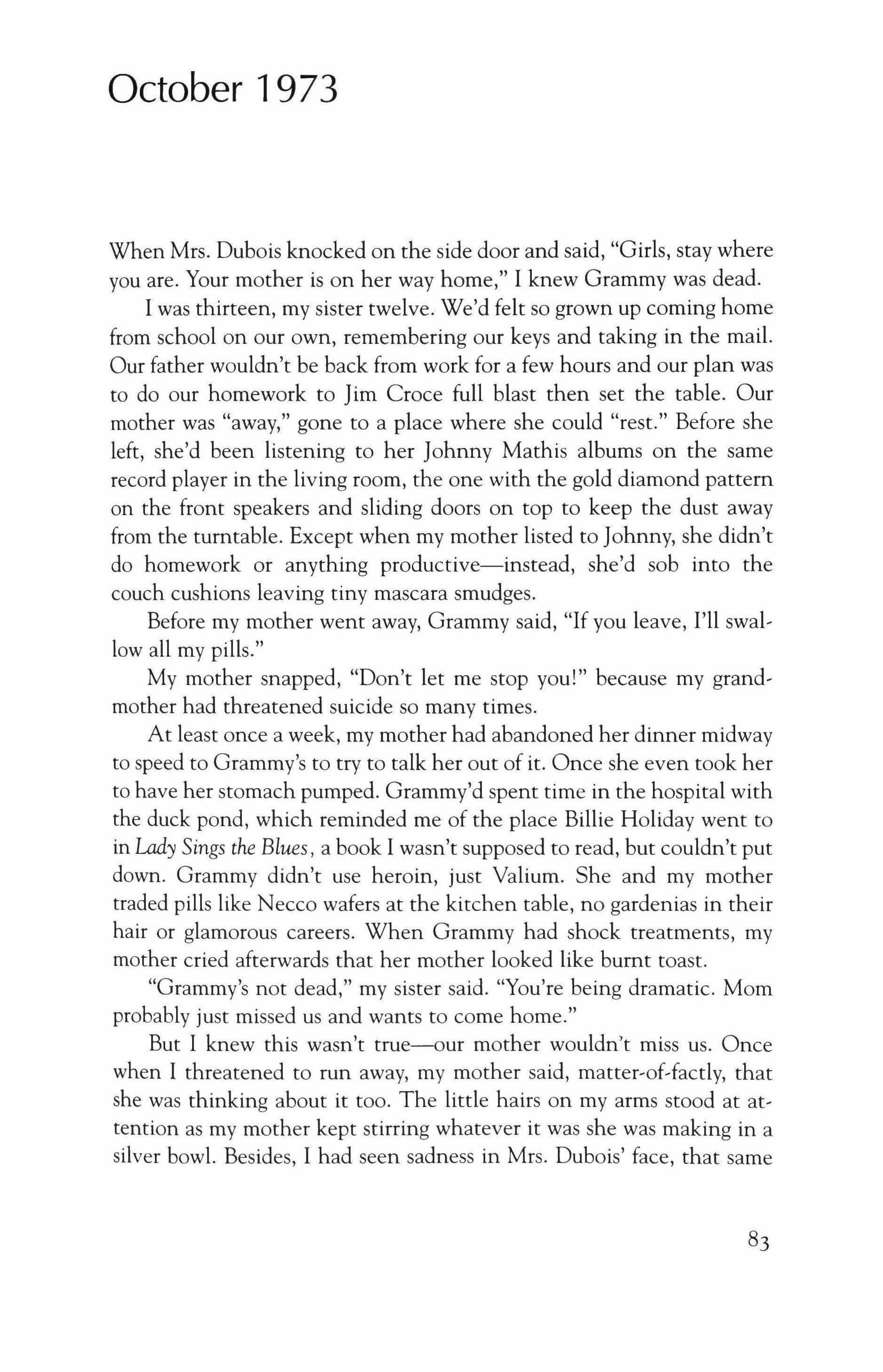
When Mrs. Dubois knocked on the side door and said, "Girls, stay where you are. Your mother is on her way home," I knew Grammy was dead.
I was thirteen, my sister twelve. We'd felt so grown up coming home from school on our own, remembering our keys and taking in the mail. Our father wouldn't be back from work for a few hours and our plan was to do our homework to Jim Croce full blast then set the table. Our mother was "away," gone to a place where she could "rest." Before she left, she'd been listening to her Johnny Mathis albums on the same record player in the living room, the one with the gold diamond pattern on the front speakers and sliding doors on top to keep the dust away from the turntable. Except when my mother listed to Johnny, she didn't do homework or anything productive-instead, she'd sob into the couch cushions leaving tiny mascara smudges.
Before my mother went away, Grammy said, "If you leave, I'll swallow all my pills."
My mother snapped, "Don't let me stop you!" because my grandmother had threatened suicide so many times.
At least once a week, my mother had abandoned her dinner midway to speed to Grammy's to try to talk her out of it. Once she even took her to have her stomach pumped. Grammy'd spent time in the hospital with the duck pond, which reminded me of the place Billie Holiday went to in Lady Sings the Blues, a book I wasn't supposed to read, but couldn't put down. Grammy didn't use heroin, just Valium. She and my mother traded pills like Necco wafers at the kitchen table, no gardenias in their hair or glamorous careers. When Grammy had shock treatments, my mother cried afterwards that her mother looked like burnt toast.
"Grammy's not dead," my sister said. "You're being dramatic. Mom probably just missed us and wants to come home."
But I knew this wasn't true-our mother wouldn't miss us. Once when I threatened to run away, my mother said, matter-of-factly, that she was thinking about it too. The little hairs on my arms stood at attention as my mother kept stirring whatever it was she was making in a silver bowl. Besides, I had seen sadness in Mrs. Dubois' face, that same

sadness she had when the hearse came up her steep driveway to take away her son. 1 knew Grammy was gone.
My sister and 1 straightened up. We made sure the kitchen counter wasn't sticky-the offense my mother hated most of all.
When my mother came through the door, she stood clutching her light blue suitcase, unable to put it down, unable perhaps to admit that she was home and that her mother was dead and here were two daughters who needed her. My sister clung to her waist and started to cry. 1 pried her fingers from the handle-it wasn't easy. 1 pulled at the sleeves of her cardigan until it was off.
1 made her a highball with the vodka she kept on the highest shelf and a can of ginger ale I'd just opened for myself.
1 think 1 said, "It's not your fault."
My mother asked, "How did you know where my vodka was?"
Dean Young
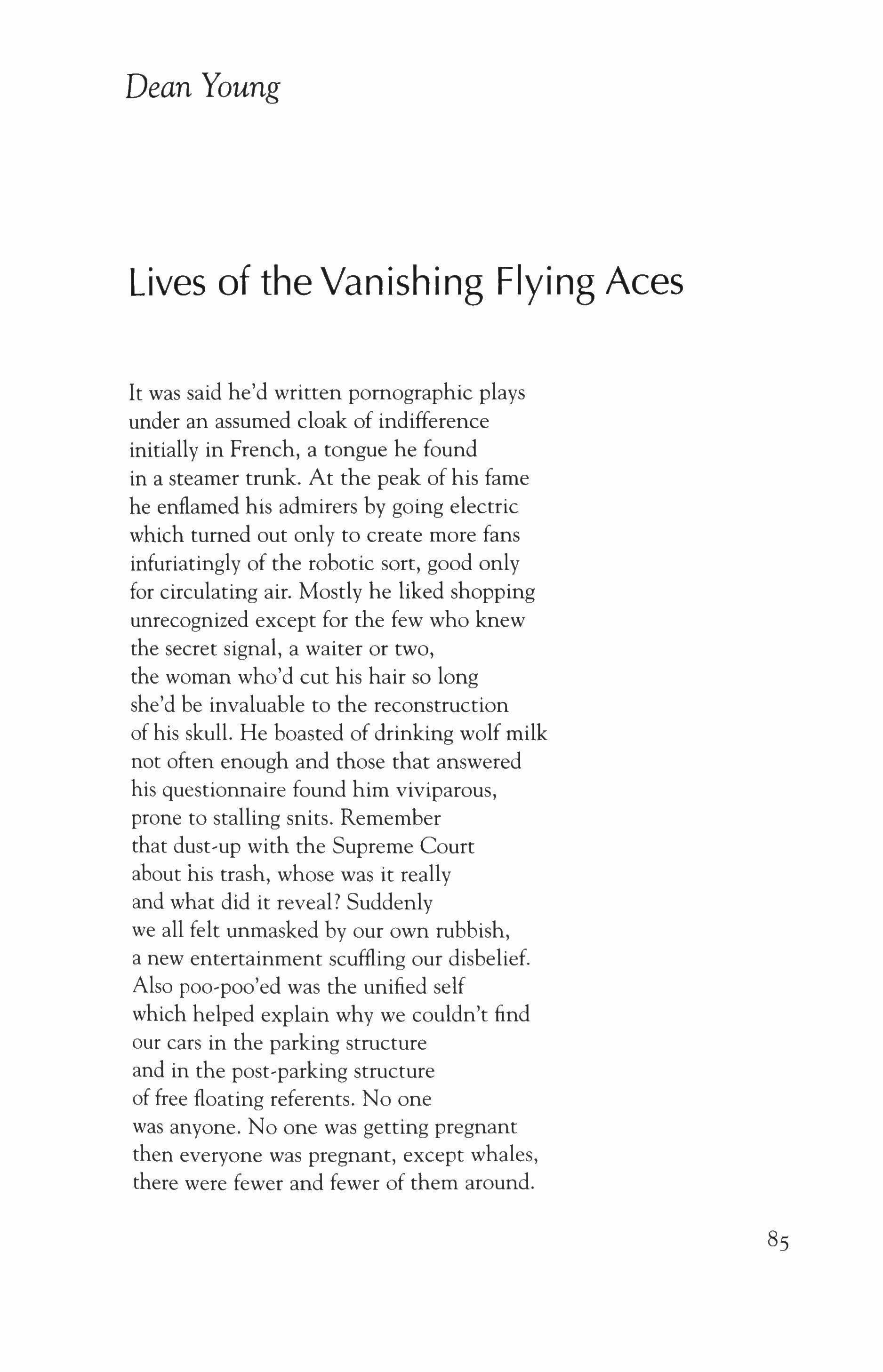
Lives of the Vanishing Flying Aces
It was said he'd written pornographic plays under an assumed cloak of indifference initially in French, a tongue he found in a steamer trunk. At the peak of his fame he enflamed his admirers by going electric which turned out only to create more fans infuriatingly of the robotic sort, good only for circulating air. Mostly he liked shopping unrecognized except for the few who knew the secret signal, a waiter or two, the woman who'd cut his hair so long she'd be invaluable to the reconstruction of his skull. He boasted of drinking wolf milk not often enough and those that answered his questionnaire found him viviparous, prone to stalling snits. Remember that dust-up with the Supreme Court about his trash, whose was it really and what did it reveal? Suddenly we all felt unmasked by our own rubbish, a new entertainment scuffling our disbelief. Also poo-poo'ed was the unified self which helped explain why we couldn't find our cars in the parking structure and in the post-parking structure of free floating referents. No one was anyone. No one was getting pregnant then everyone was pregnant, except whales, there were fewer and fewer of them around.
85

Rex hung new storms on the summer cottage but Meg wished the sum had been spent on her horse who died without a monument. Earl proved an inadequate liar and that compounded his surgical failures. More and more, we missed Jimmy Carter. 50 was the new pink, 40 the new gray, hello the new goodbye, Vancouver the new Paris, meat the new bread. That homeless guy who convinced us he could read Greek and looked too much like your old man one day was gone, just his rug left then that too vanished after a couple rains. Then the great obliterating snows came, first a speedy doodle then a Victorian novel. Edith and Edwin were finally hitched. A new satellite was launched, privately. Some things came out in the hiring process that couldn't be put back like a joke snake out of a fake can of nuts magically made real enough to bite the birthday boy but nothing a sprinkled cupcake couldn't cure. The search for a replacement was stifled by the original's refusal to shuffle off and no one wanted that, too much like a second date with your ex-wife. You tried to keep up with her dad though, the widowed flyboy retiree who preserved a spectral hum in his dim afternoons, a hobby of diorama bombing raids. He was the last of his squadron and the only person he ever loved had become a cloud, some days nimbus, others serious but always what he'd gladly vanish in if only it'd come down now that he was grounded.
86
Articles of Faith
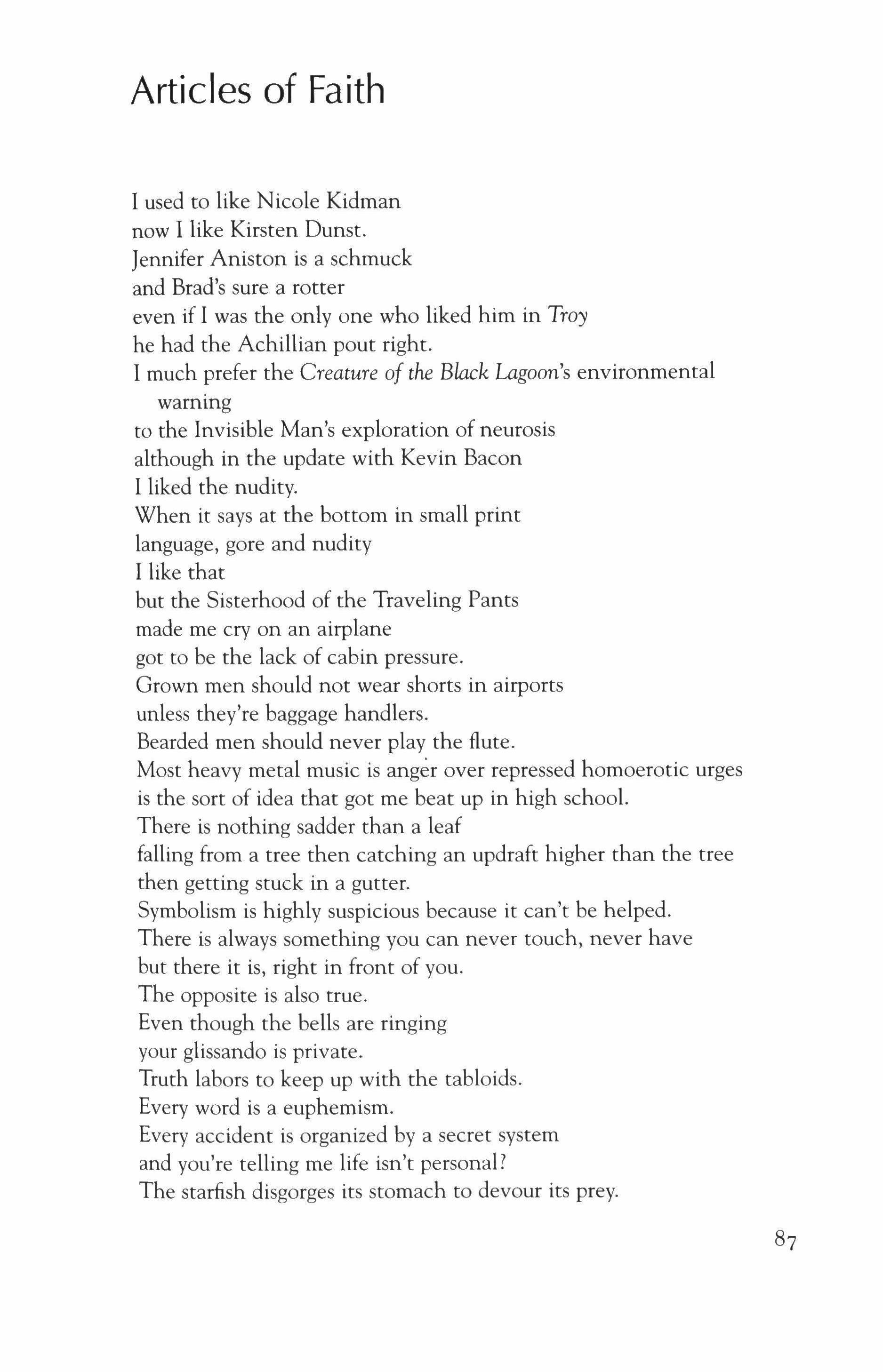
I used to like Nicole Kidman now I like Kirsten Dunst.
Jennifer Aniston is a schmuck and Brad's sure a rotter
even if I was the only one who liked him in Troy he had the Achillian pout right. I much prefer the Creature of the Black Lagoon's environmental warning to the Invisible Man's exploration of neurosis although in the update with Kevin Bacon I liked the nudity. When it says at the bottom in small print language, gore and nudity I like that
but the Sisterhood of the Traveling Pants made me cry on an airplane got to be the lack of cabin pressure.
Grown men should not wear shorts in airports unless they're baggage handlers. Bearded men should never play the flute.
Most heavy metal music is anger over repressed homoerotic urges is the sort of idea that got me beat up in high school. There is nothing sadder than a leaf falling from a tree then catching an updraft higher than the tree then getting stuck in a gutter.
Symbolism is highly suspicious because it can't be helped. There is always something you can never touch, never have but there it is, right in front of you. The opposite is also true. Even though the bells are ringing your glissando is private.
Truth labors to keep up with the tabloids. Every word is a euphemism. Every accident is organized by a secret system and you're telling me life isn't personal? The starfish disgorges its stomach to devour its prey.
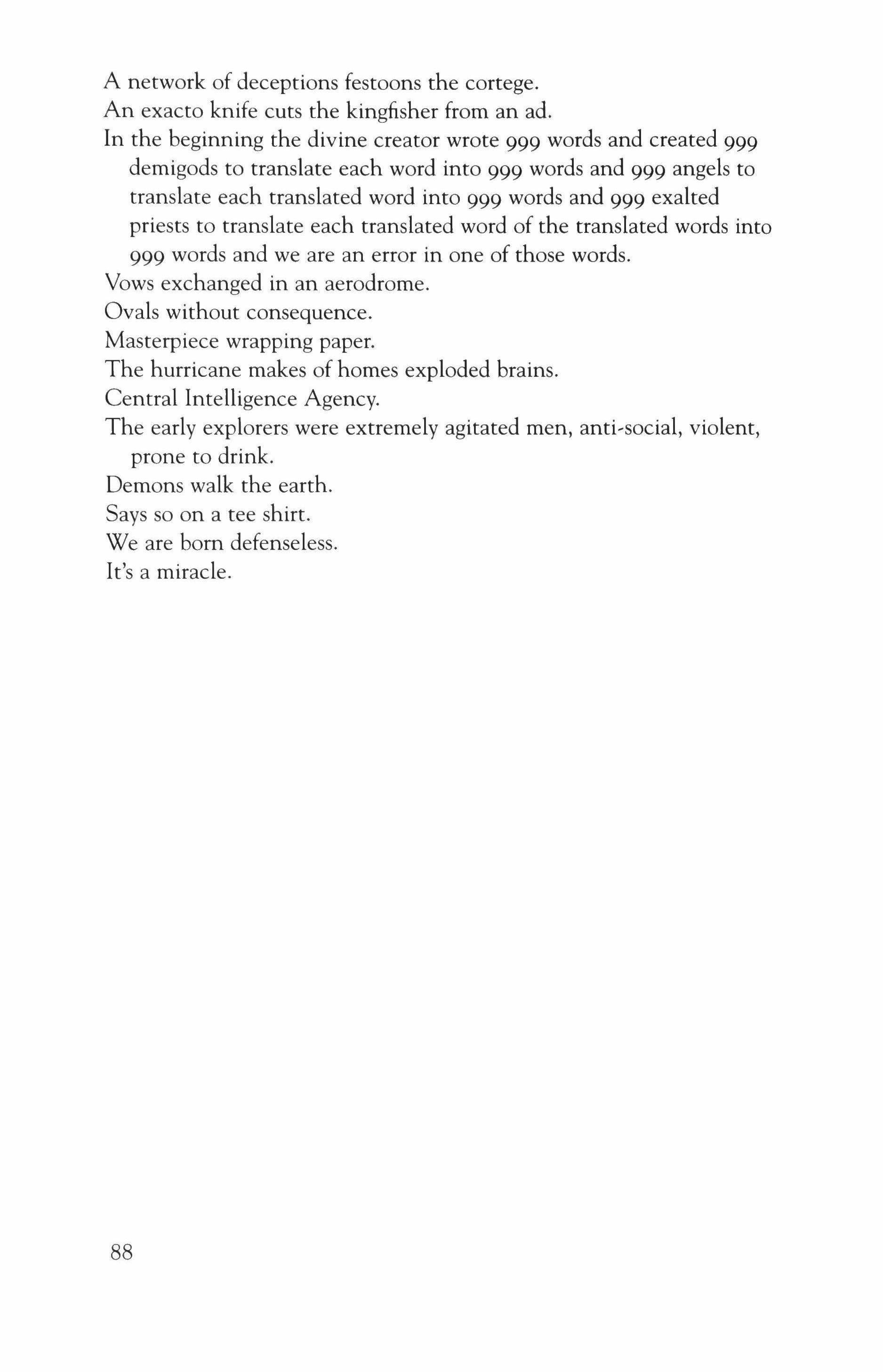
A network of deceptions festoons the cortege.
An exacto knife cuts the kingfisher from an ad.
In the beginning the divine creator wrote 999 words and created 999 demigods to translate each word into 999 words and 999 angels to translate each translated word into 999 words and 999 exalted priests to translate each translated word of the translated words into 999 words and we are an error in one of those words.
Vows exchanged in an aerodrome.
Ovals without consequence.
Masterpiece wrapping paper.
The hurricane makes of homes exploded brains.
Central Intelligence Agency.
The early explorers were extremely agitated men, anti-social, violent, prone to drink.
Demons walk the earth.
Says so on a tee shirt.
We are born defenseless.
It's a miracle.
88
Hey Baby

You had reached into the dark hole but the theogony was gone. Then there was a shout and the movie broke. Only the robot monkeys could move and they had only a couple hours left in their batteries, the same current event had been running for years, exchequers prowling in assault vehicles looking for just the sort of person to beat the shit out of I was but no way was I doing their job for them, least not so you could tell from my permanent record. I controlled myself on remote. I had a free sub coming. I wasn't interested in the movie but the dark was proving exceptional except for the cliched screaming. I longed for my garage. The rag that had its face pushed in many accidents, the bicycle hung upside down like an attempt to rehabilitate an instrument of torture, the interior decorated by bats. When I'm dead I'll reach up and pull some hot chick down by her legs into my pupa and make a baby. Baby will build me a monument and not just some pile of junk either. Small, expensive replicas will be available in the battlefield gift shop.
Little Poem That Tries
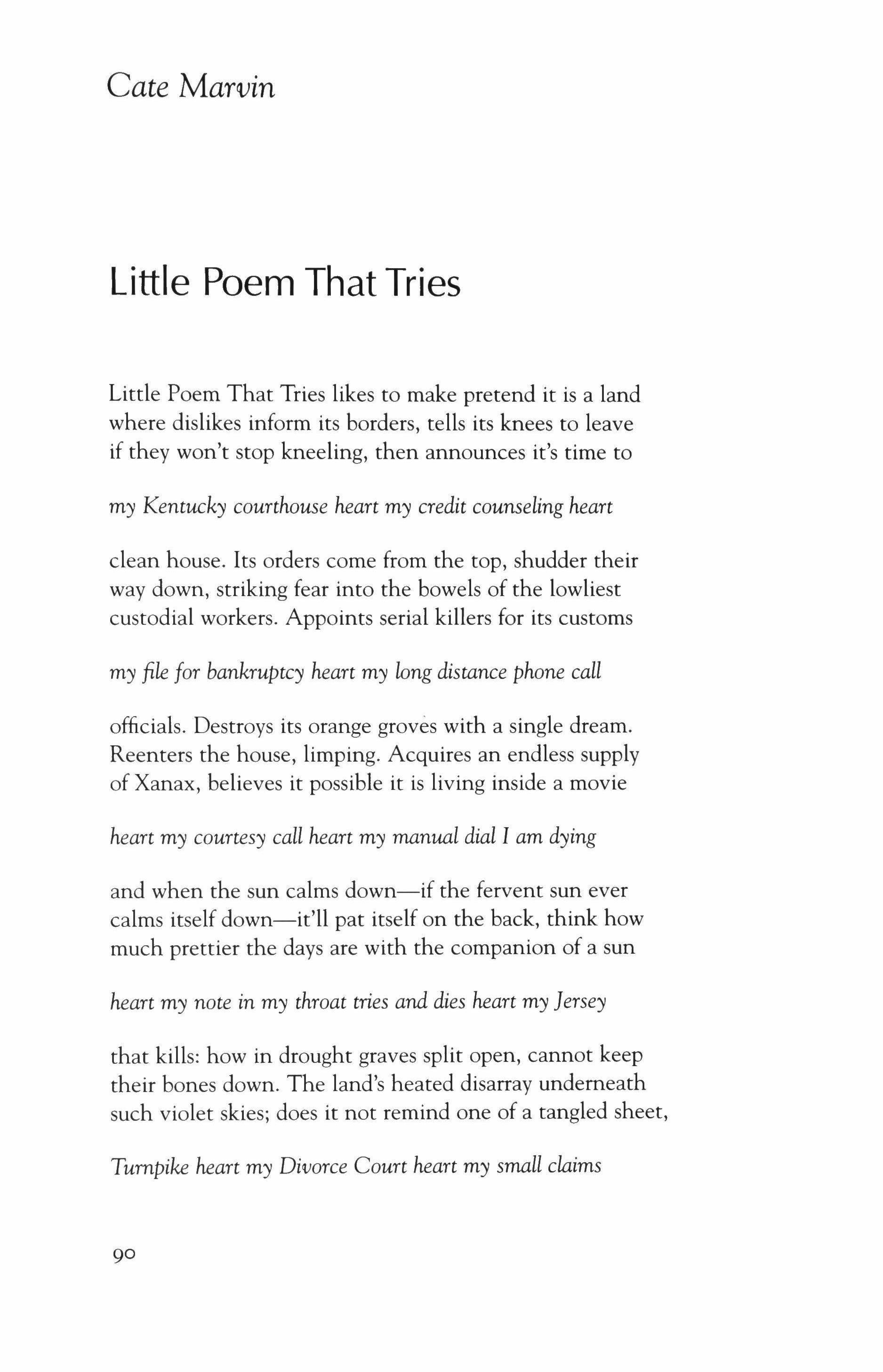
Little Poem That Tries likes to make pretend it is a land where dislikes inform its borders, tells its knees to leave if they won't stop kneeling, then announces it's time to my Kentucky courthouse heart my credit counseling heart clean house. Its orders come from the top, shudder their way down, striking fear into the bowels of the lowliest custodial workers. Appoints serial killers for its customs my file for bankruptcy heart my long distance phone call officials. Destroys its orange groves with a single dream. Reenters the house, limping. Acquires an endless supply of Xanax, believes it possible it is living inside a movie
heart my courtesy call heart my manual dial I am dying and when the sun calms down-if the fervent sun ever calms itself down-it'll pat itself on the back, think how much prettier the days are with the companion of a sun
heart my note in my throat tries and dies heart my Jersey that kills: how in drought graves split open, cannot keep their bones down. The land's heated disarray underneath such violet skies; does it not remind one of a tangled sheet,
Turnpike heart my Divorce Court heart my small claims
Cate Marvin
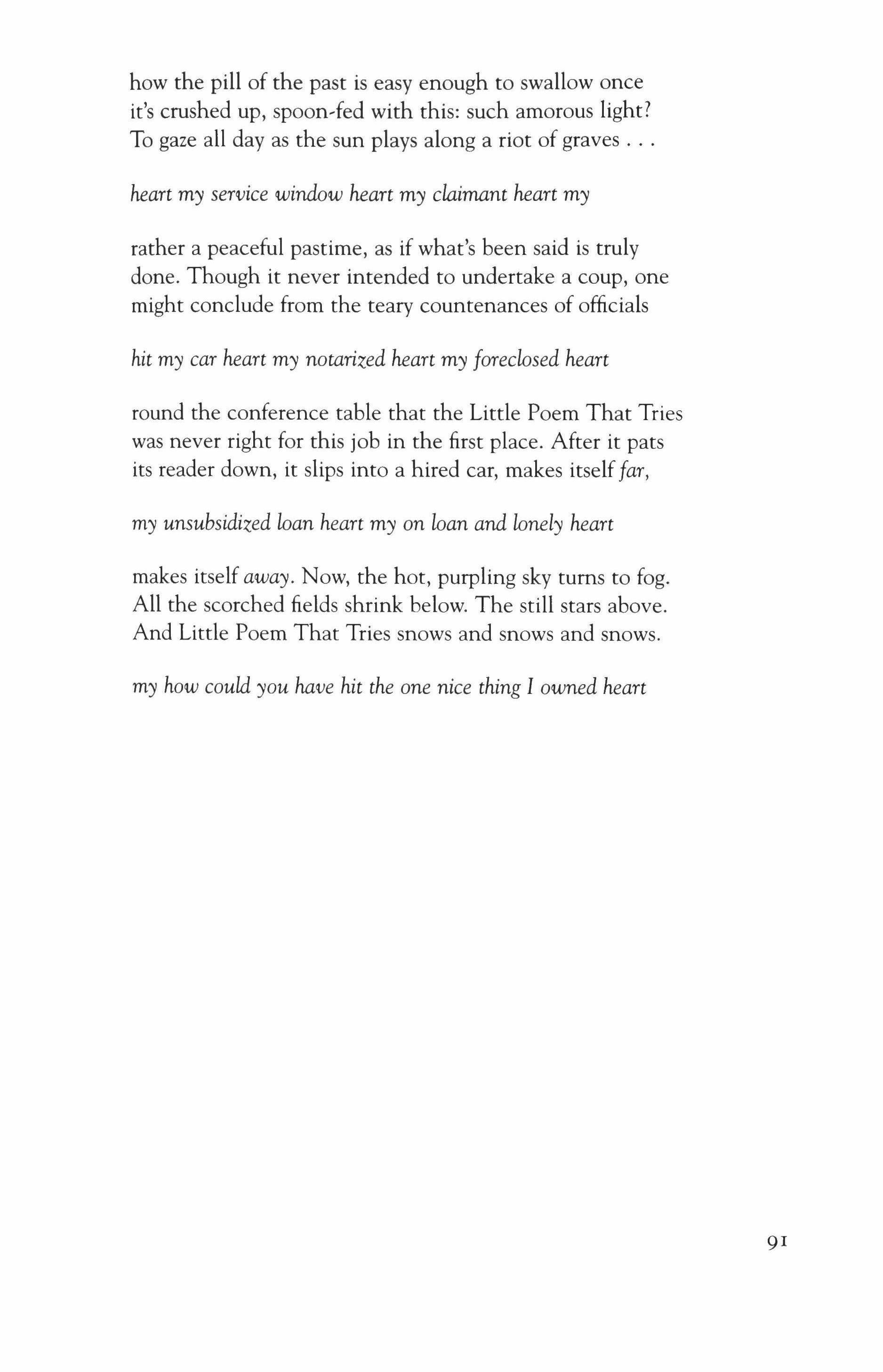
how the pill of the past is easy enough to swallow once it's crushed up, spoon-fed with this: such amorous light?
To gaze all day as the sun plays along a riot of graves
heart my service window heart my claimant heart my
rather a peaceful pastime, as if what's been said is truly done. Though it never intended to undertake a coup, one might conclude from the teary countenances of officials
hit my car heart my notarized heart my foreclosed heart
round the conference table that the Little Poem That Tries was never right for this job in the first place. After it pats its reader down, it slips into a hired car, makes itselffar,
my unsubsidized loan heart my on loan and lonely heart makes itself away. Now, the hot, purpling sky turns to fog. All the scorched fields shrink below. The still stars above. And Little Poem That Tries snows and snows and snows.
my how could you have hit the one nice thing I owned heart
91
Poem That Wears Your Scarf
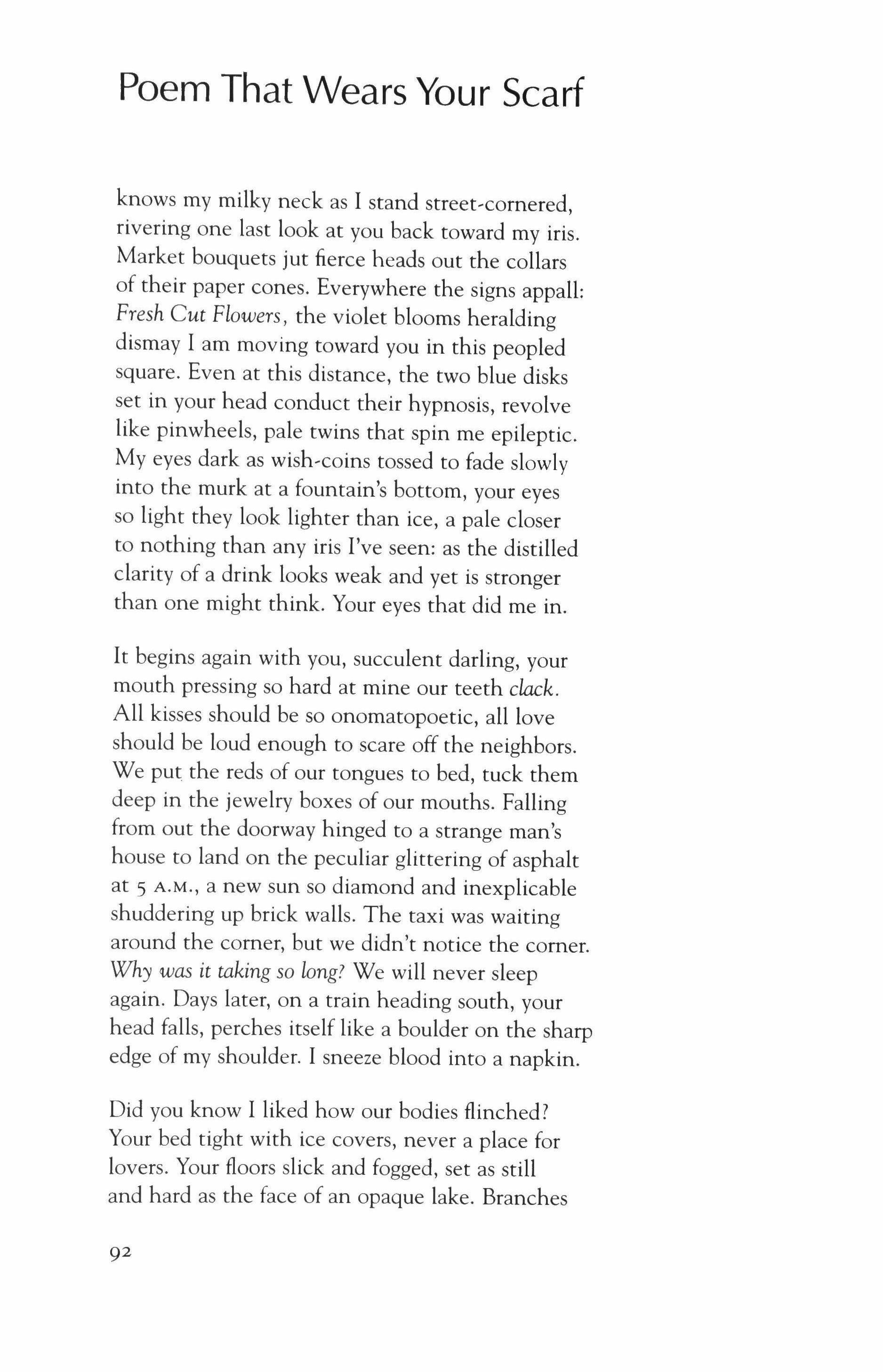
knows my milky neck as I stand street-cornered, rivering one last look at you back toward my iris. Market bouquets jut fierce heads out the collars of their paper cones. Everywhere the signs appall: Fresh Cut Flowers, the violet blooms heralding dismay I am moving toward you in this peopled square. Even at this distance, the two blue disks set in your head conduct their hypnosis, revolve like pinwheels, pale twins that spin me epileptic. My eyes dark as wish-coins tossed to fade slowly into the murk at a fountain's bottom, your eyes so light they look lighter than ice, a pale closer to nothing than any iris I've seen: as the distilled clarity of a drink looks weak and yet is stronger than one might think. Your eyes that did me in.
It begins again with you, succulent darling, your mouth pressing so hard at mine our teeth clack. All kisses should be so onomatopoetic, all love should be loud enough to scare off the neighbors. We put the reds of our tongues to bed, tuck them deep in the jewelry boxes of our mouths. Falling from out the doorway hinged to a strange man's house to land on the peculiar glittering of asphalt at 5 A.M., a new sun so diamond and inexplicable shuddering up brick walls. The taxi was waiting around the corner, but we didn't notice the corner. Why was it taking so long? We will never sleep again. Days later, on a train heading south, your head falls, perches itself like a boulder on the sharp edge of my shoulder. I sneeze blood into a napkin.
Did you know I liked how our bodies flinched? Your bed tight with ice covers, never a place for lovers. Your floors slick and fogged, set as still and hard as the face of an opaque lake. Branches
92
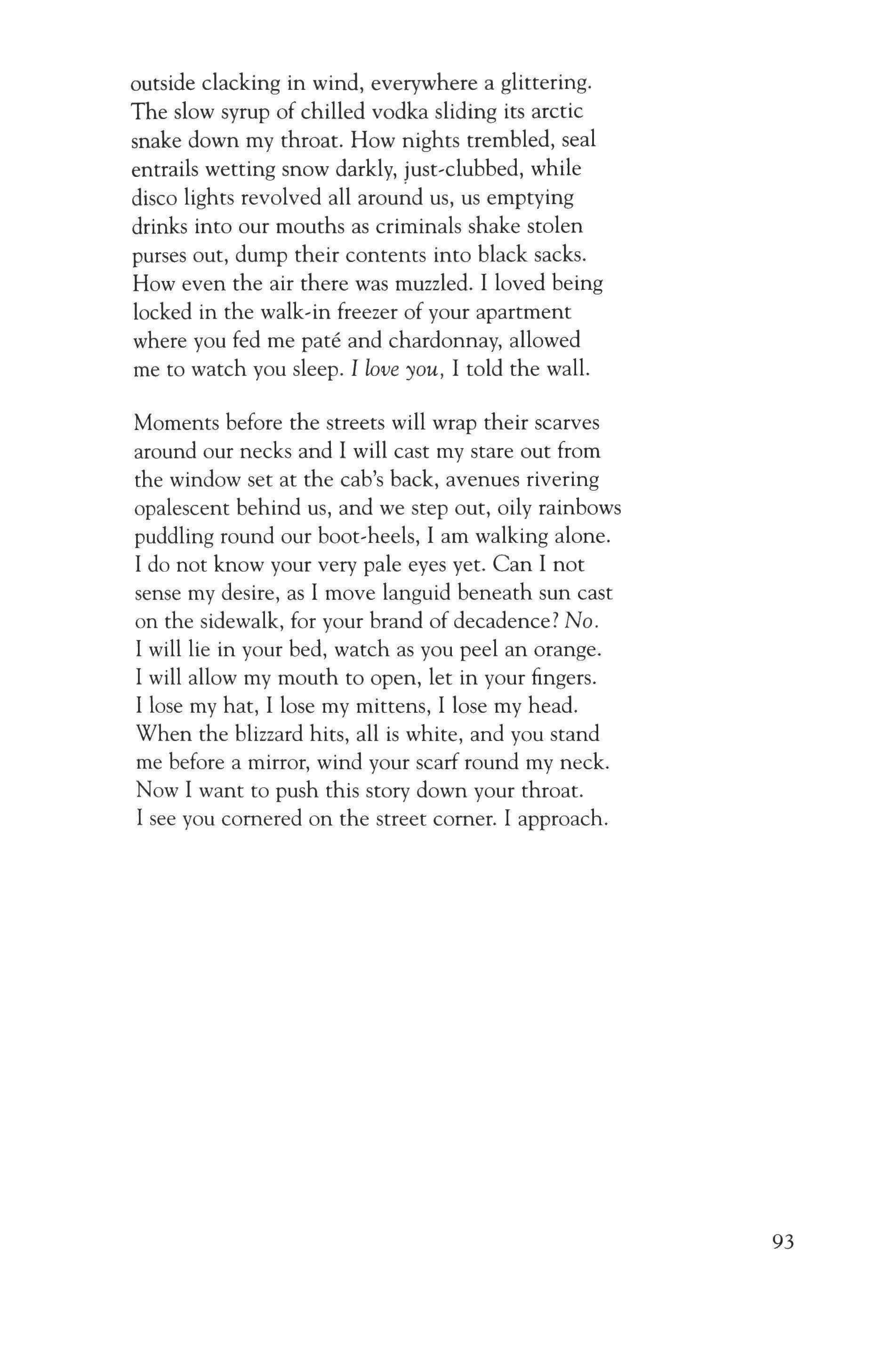
outside clacking in wind, everywhere a glittering. The slow syrup of chilled vodka sliding its arctic snake down my throat. How nights trembled, seal entrails wetting snow darkly, just-clubbed, while disco lights revolved all arou�d us, us emptying drinks into our mouths as criminals shake stolen purses out, dump their contents into black sacks. How even the air there was muzzled. I loved being locked in the walk-in freezer of your apartment where you fed me pate and chardonnay, allowed me to watch you sleep. I love you, I told the wall.
Moments before the streets will wrap their scarves around our necks and I will cast my stare out from the window set at the cab's back, avenues rivering opalescent behind us, and we step out, oily rainbows puddling round our boot-heels, I am walking alone. I do not know your very pale eyes yet. Can I not sense my desire, as I move languid beneath sun cast on the sidewalk, for your brand of decadence? No. I will lie in your bed, watch as you peel an orange. I will allow my mouth to open, let in your fingers. I lose my hat, I lose my mittens, I lose my head. When the blizzard hits, all is white, and you stand me before a mirror, wind your scarf round my neck. Now I want to push this story down your throat. I see you cornered on the street comer. I approach.
93
Phyllis Moore
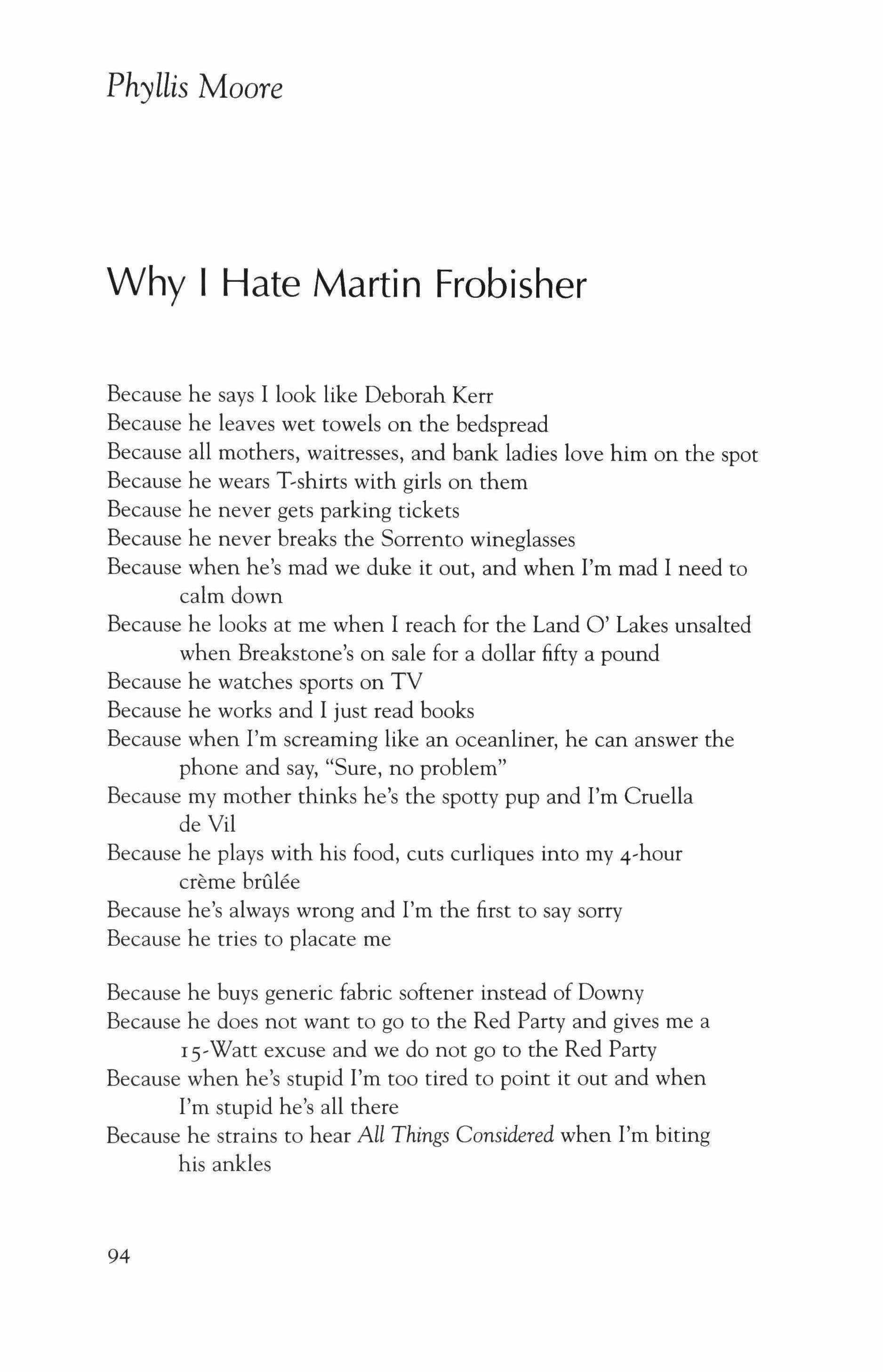
Why I Hate Martin Frobisher
Because he says I look like Deborah Kerr
Because he leaves wet towels on the bedspread
Because all mothers, waitresses, and bank ladies love him on the spot
Because he wears T,shirts with girls on them
Because he never gets parking tickets
Because he never breaks the Sorrento wineglasses
Because when he's mad we duke it out, and when I'm mad I need to calm down
Because he looks at me when I reach for the Land 0' Lakes unsalted when Breakstone's on sale for a dollar fifty a pound
Because he watches sports on TV
Because he works and I just read books
Because when I'm screaming like an oceanliner, he can answer the phone and say, "Sure, no problem"
Because my mother thinks he's the spotty pup and I'm Cruella de Vil
Because he plays with his food, cuts curliques into my 4,hour creme brulee
Because he's always wrong and I'm the first to say sorry
Because he tries to placate me
Because he buys generic fabric softener instead of Downy
Because he does not want to go to the Red Party and gives me a 15,Watt excuse and we do not go to the Red Party
Because when he's stupid I'm too tired to point it out and when I'm stupid he's all there
Because he strains to hear All Things Considered when I'm biting his ankles
94
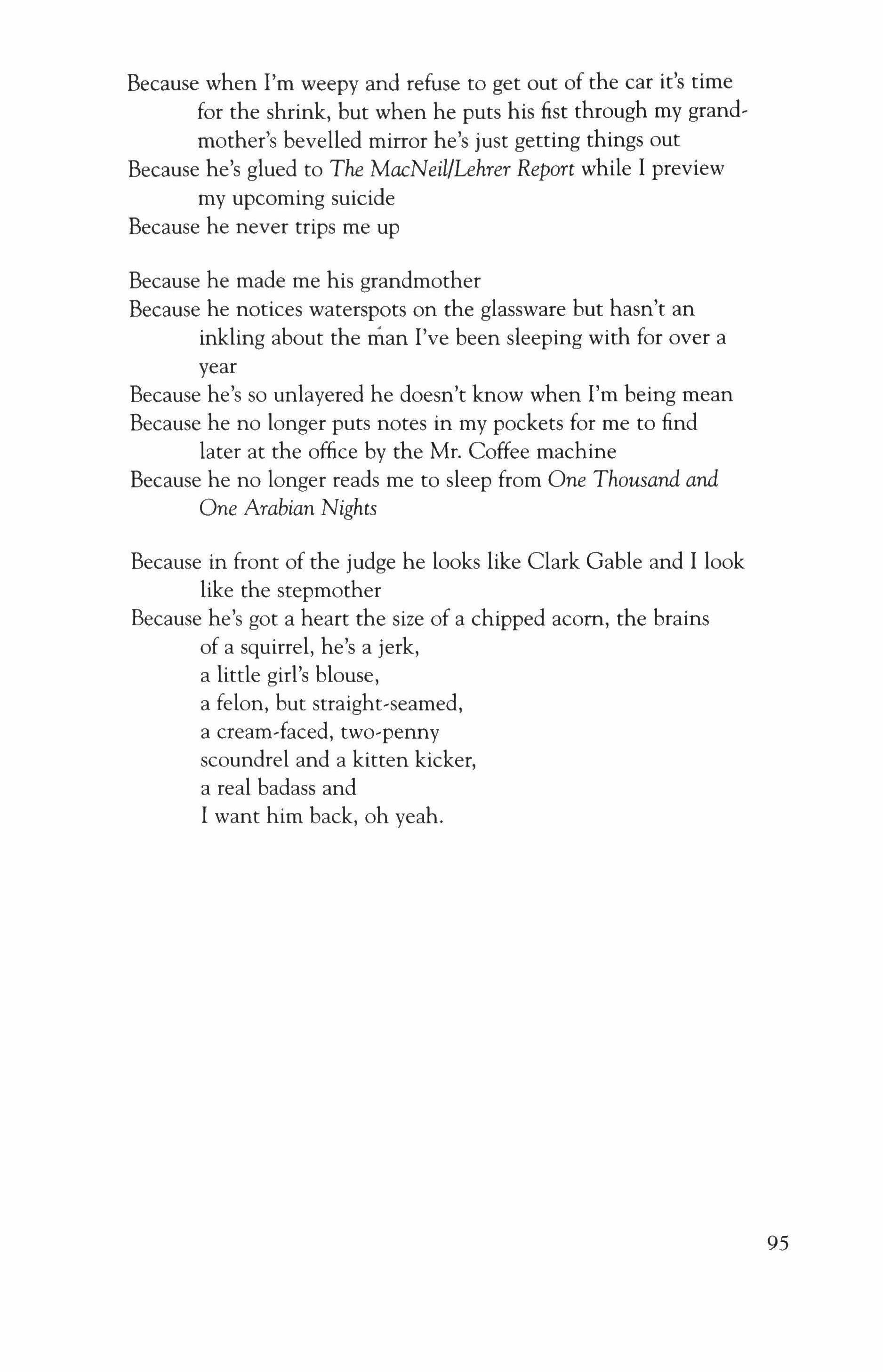
Because when I'm weepy and refuse to get out of the car it's time for the shrink, but when he puts his fist through my grand, mother's bevelled mirror he's just getting things out
Because he's glued to The MacNeil/Lehrer Report while I preview my upcoming suicide
Because he never trips me up
Because he made me his grandmother
Because he notices waterspots on the glassware but hasn't an inkling about the man I've been sleeping with for over a year
Because he's so unlayered he doesn't know when I'm being mean
Because he no longer puts notes in my pockets for me to find later at the office by the Mr. Coffee machine
Because he no longer reads me to sleep from One Thousand and One Arabian Nights
Because in front of the judge he looks like Clark Gable and I look like the stepmother
Because he's got a heart the size of a chipped acorn, the brains of a squirrel, he's a jerk, a little girl's blouse, a felon, but straight-seamed, a cream-faced, two-penny scoundrel and a kitten kicker, a real badass and I want him back, oh yeah.
95
Charles Harper Webb
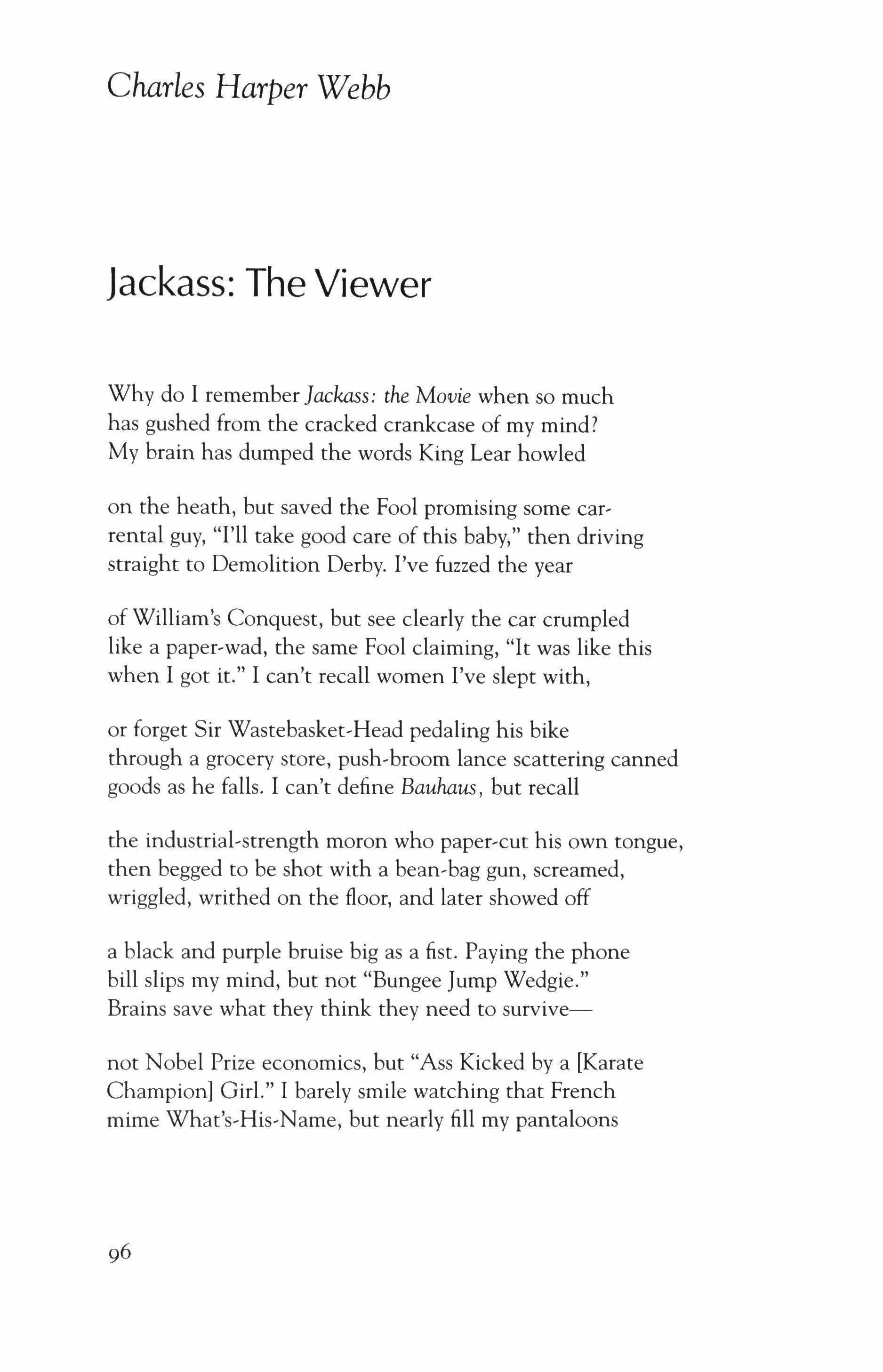
Jackass: The Viewer
Why do I remember Jackass: the Movie when so much has gushed from the cracked crankcase of my mind? My brain has dumped the words King Lear howled on the heath, but saved the Fool promising some carrental guy, "I'll take good care of this baby," then driving straight to Demolition Derby. I've fuzzed the year of William's Conquest, but see clearly the car crumpled like a paper-wad, the same Fool claiming, "It was like this when I got it." I can't recall women I've slept with,
or forget Sir Wastebasket-Head pedaling his bike through a grocery store, push-broom lance scattering canned goods as he falls. I can't define Bauhaus, but recall the industrial-strength moron who paper-cut his own tongue, then begged to be shot with a bean-bag gun, screamed, wriggled, writhed on the floor, and later showed off a black and purple bruise big as a fist. Paying the phone bill slips my mind, but not "Bungee Jump Wedgie." Brains save what they think they need to survive-
not Nobel Prize economics, but "Ass Kicked by a [Karate Champion] Girl." I barely smile watching that French mime What's-His-Name, but nearly fill my pantaloons
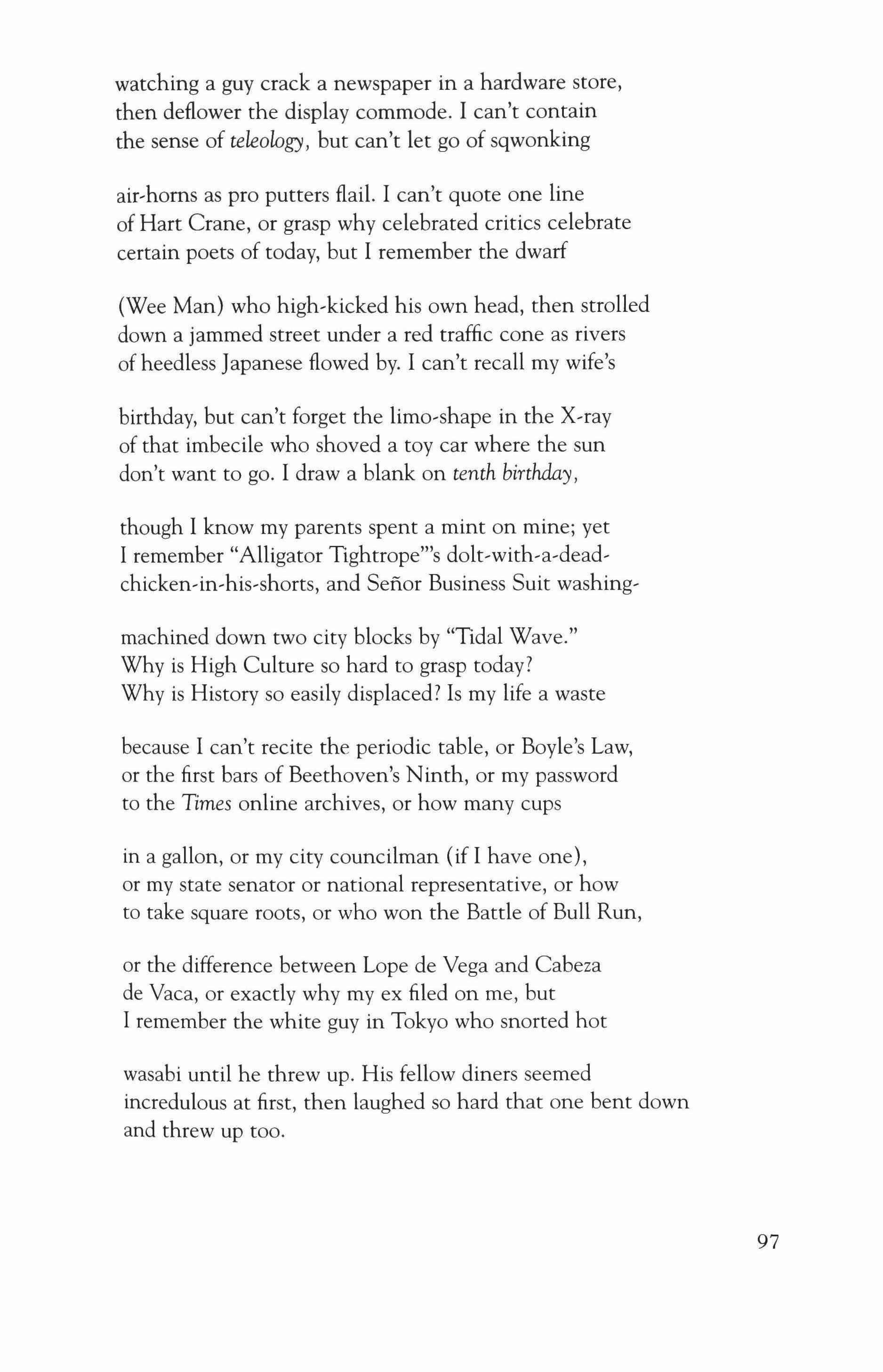
watching a guy crack a newspaper in a hardware store, then deflower the display commode. I can't contain the sense of teleology, but can't let go of sqwonking
air-horns as pro putters flail. I can't quote one line of Hart Crane, or grasp why celebrated critics celebrate certain poets of today, but I remember the dwarf (Wee Man) who high-kicked his own head, then strolled down a jammed street under a red traffic cone as rivers of heedless Japanese flowed by. I can't recall my wife's birthday, but can't forget the limo-shape in the X-ray of that imbecile who shoved a toy car where the sun don't want to go. I draw a blank on tenth birthday,
though I know my parents spent a mint on mine; yet I remember "Alligator Tightrope"'s dolt-with-a-deadchicken-in-his-shorts, and Senor Business Suit washingmachined down two city blocks by "Tidal Wave." Why is High Culture so hard to grasp today? Why is History so easily displaced? Is my life a waste
because I can't recite the periodic table, or Boyle's Law, or the first bars of Beethoven's Ninth, or my password to the Times online archives, or how many cups
in a gallon, or my city councilman (if I have one), or my state senator or national representative, or how to take square roots, or who won the Battle of Bull Run,
or the difference between Lope de Vega and Cabeza de Vaca, or exactly why my ex filed on me, but I remember the white guy in Tokyo who snorted hot
wasabi until he threw up. His fellow diners seemed incredulous at first, then laughed so hard that one bent down and threw up too.
97

Everybody Tries So Hard
Even slackers and no-accounts, bobbing and weaving away from work. Even bums, perfecting looks of misery, hands like goose-heads snapping up cash by the freeway overpass. The bald man mounting his wife tries so hard, sweat on his pate, his buttocks pumping, the tense, serious little pud swollen with purpose, puffing, "I think I can," his partner straining to get through this, eyes squinched
shut in what (good worker!) she hopes is ecstasy, trying so hard to focus on one glowing spot, the little man-in-a-boat rowing so hard to finish and go home. Everyone tries; and every thingthe squirrels that have plenty of nuts, but keep on packing their fat cheeks, saving, saving-the pigeons that flap so hard to get their com-fed bodies off the ground when Timmy runs up with his dog, trying
for a mouth-full of feathers, a hand-full of flightthe steel propellers in Johnny Rocket's silver cans spinning like mad to mix ice cream, chocolate, and milk into a malt human livers bust their trusses to digest, consumers straining to believe they're still wasp-waisted, seventeen, life opening like a field of golden poppies just ahead. It's touching, sexy; it infarcts my heart how hard they try. The convict who broke his back
to duck responsibility (his dad's favorite word) as if it were a smart bomb homing on his headnow, in jail, he slaves to steal fruit he can mix with Jello, sugar packets, syrup, Lord knows what, and store it all in plastic bags he risks his life to swipe, and brew in them the putrid Pruno fellow cons struggle to like, trying to rouse a decent drunk, trying so hard, like thousands of breast-feeding

women who march on the capitol, panting, sweating, lugging babies furrow-faced with concentration, baby-mouths frantic to feed brains that will spend their lives fighting to get ahead like those Kentucky farmers who gave their all to grow tobacco until the klieg light of the public's eye, the furnace of the courts' indignation turned on them, millions of lawyers-sweaty, rubbed raw by law school-
trying so hard to make their hard trying payoff. As writs, statutes, subpoenas fell like stogie-chomping locusts on the fields of Marlboro and Pall Mall, the farmers tried to keep their farms afloat, blowing for all they were worth into Tradition's leaky water-wings before clambering aboard the lifeboat of B & B Worm Farms, whose salesmen promised easy money raising worms for agriculture, worms
for industry-worms by the billions boring through compost, leaving "castings" to make bumper crops a cinch-worms that would do all the hard work, breeding, eating, casting off fortunes in feces while the farmers could finally buy a new truck, fly to Aruba, get some peace, some R & R, never dreaming B & B would be the biggest pyramid scam in Kentucky history, its owner
dying, leaving these farmers who tried so hard with barns stuffed full of worthless worms-millions of dollars blown on worms who tried their best to find enough food in the earth they ate to keep hearts beating, bodies wriggling when the farmers, gone bust, abandoned them, the compost drying with all the worms still fighting to digest the dust that wouldn't feed them, however hard they tried.
99
Adrian Blevins
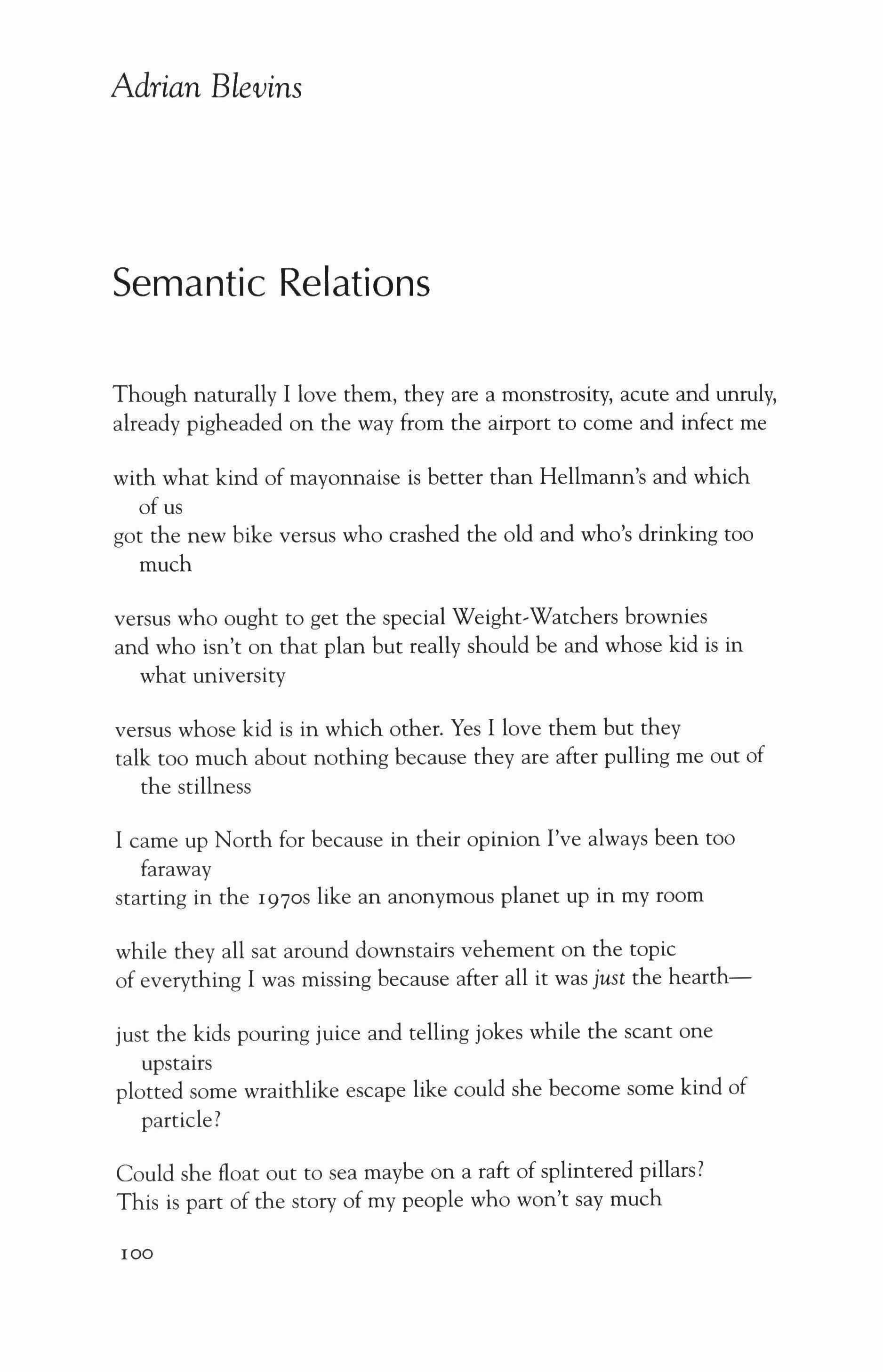
Semantic Relations
Though naturally I love them, they are a monstrosity, acute and unruly, already pigheaded on the way from the airport to come and infect me
with what kind of mayonnaise is better than Hellmann's and which of us got the new bike versus who crashed the old and who's drinking too much
versus who ought to get the special Weight-Watchers brownies and who isn't on that plan but really should be and whose kid is in what university
versus whose kid is in which other. Yes I love them but they talk too much about nothing because they are after pulling me out of the stillness
I came up North for because in their opinion I've always been too faraway starting in the 1970S like an anonymous planet up in my room
while they all sat around downstairs vehement on the topic of everything I was missing because after all it was just the hearthjust the kids pouring juice and telling jokes while the scant one upstairs plotted some wraithlike escape like could she become some kind of particle?
Could she float out to sea maybe on a raft of splintered pillars? This is part of the story of my people who won't say much
100
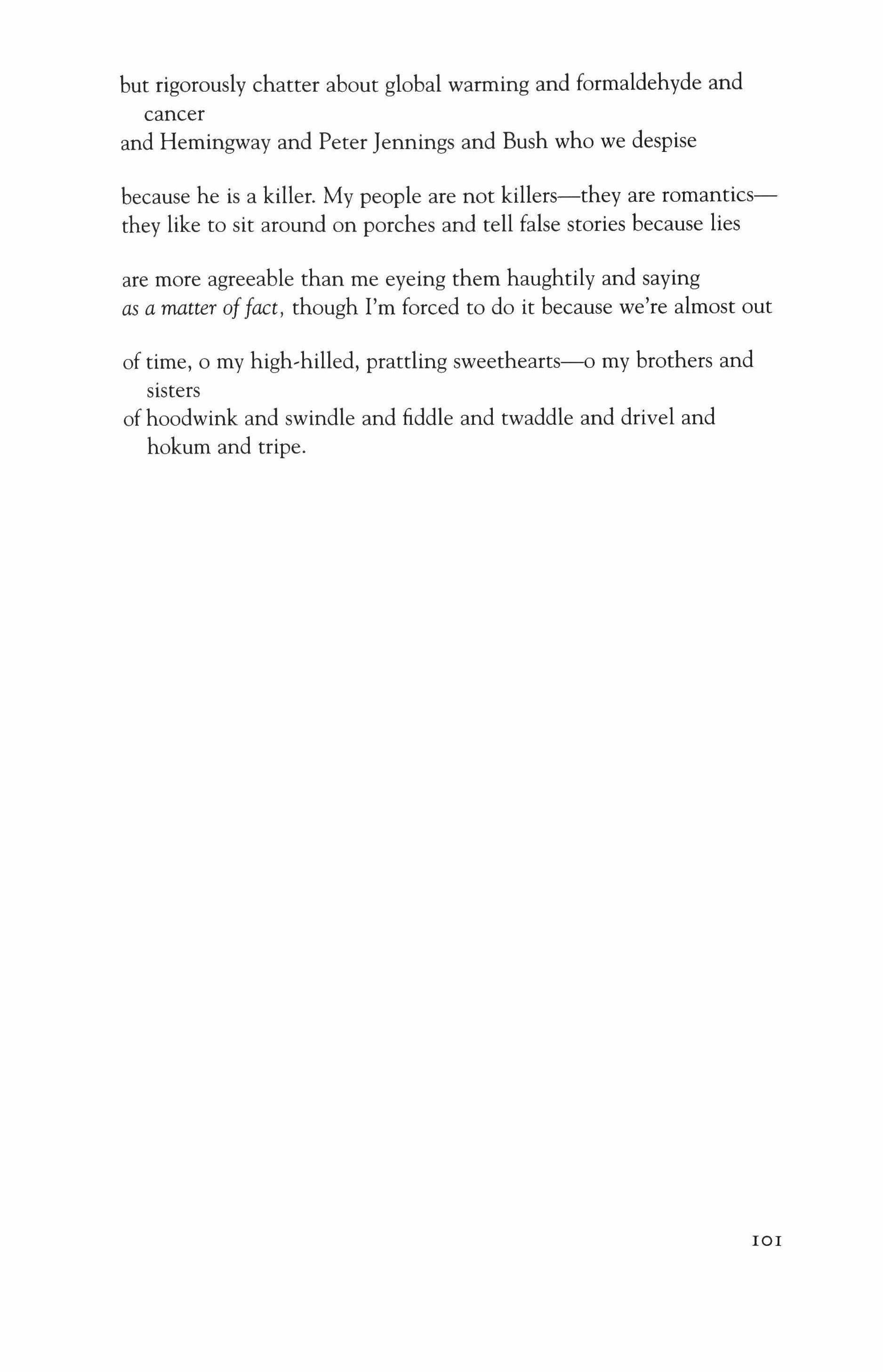
but rigorously chatter about global warming and formaldehyde and cancer and Hemingway and Peter Jennings and Bush who we despise because he is a killer. My people are not killers-they are romanticsthey like to sit around on porches and tell false stories because lies are more agreeable than me eyeing them haughtily and saying as a matter offact, though I'm forced to do it because we're almost out of time, 0 my high-hilled, prattling sweethearts--o my brothers and sisters of hoodwink and swindle and fiddle and twaddle and drivel and hokum and tripe.
101
Sin City

I've got to know everything or I'll fail as a person, so of course I watched the Triple X DVD with my husband, who's jumbo-electric-freneticferal
even when he's trying to stop me from wasting money on the telephone's Star-eo feature
because I am altogether lethargy and he's up at dawn even on the weekends because he is the reincarnation of the founding fathers and I won't even mop the kitchen floor during the weeks he's flying all over the country
making a ton of money I admit I merrily use for murky purposes like Ritz dye, which is good for changing an off-blue jacket into a burgundy one, which is good for whiling the time away while he's gone making all that money
I'd make myself if someone would just hire me, though in addition to being lazy
I'm so crazy I take out my heart and measure it with a plastic green ruler, and, while he's grilling kabobs and installing dimmer switches and tasting the garden soil
to gauge how much pH must be added, announce suddenly in the garage, where in addition to grilling he's designing a workbench and an opera for Martin guitars, that I am megawatts in The Benevolence Category
102

because if there's one thing I won't do it's make the same mistake twice, referring to the divorce, and for this reason I'll watch Sin City with him, though he's got to promise the kids won't catch us and answer any question I posit regarding the erections of the cameramen and the pain of the putting in of the clit rings. But now I can't stop worrying about Delray of the ceramic bowl breasts that could not move to accommodate Brick's tongue, which I'm guessing from the look of that sugar-white scar must have been slashed all-butin-half by the inmate who must've taught him that pitiless thump-thumpthumping trick I fear will infect Delray's insides with a malignancy that will cause her eggs to rupture and her poor Mama to die forlorn in a nursing home from the lack of baby slaver and baby cluck that is the only viable hereafter if you are a sinner like she is a sinner and I am a sinner, though God knows this time I'm giving virtue a shot.
103
The Theater People

As I remember, they were enormous, like countless cymbals striking, each one in sickly separation the whole show itself coming through the door
with me as nothing but epidermis in the tub back when I'm nine or ten
bathing during my parents' parties while eyeing the pink robe on the iron hook
since the actors, playwrights, poets, painters, & windfall ass-biters would always have to pee or vomit or put the lid down & smoke a joint & take a breather, I remember they'd say, while I'd fill up my two palms & drink the tap water as hot as it would come since I guess that was my medicine
against how much they loathed the war & Phyllis Schlafly & Richard Nixon & each other if they were breaking up or themselves if they were drunk,
which they were, for I remember tumblers & I remember stumbling: I remember jingling at the wrists & stretched-out black eyelashes & somehowhectic Capri pants because even if that wasn't really Anne Sexton in my bathroom swallowing pate so she could throw it all up so the pants would fit the next day, it always was
Anne Sexton & Dylan Thomas & their vaporous faces in there calling me little girl & weeping & mumbling & shivering & shaking
104
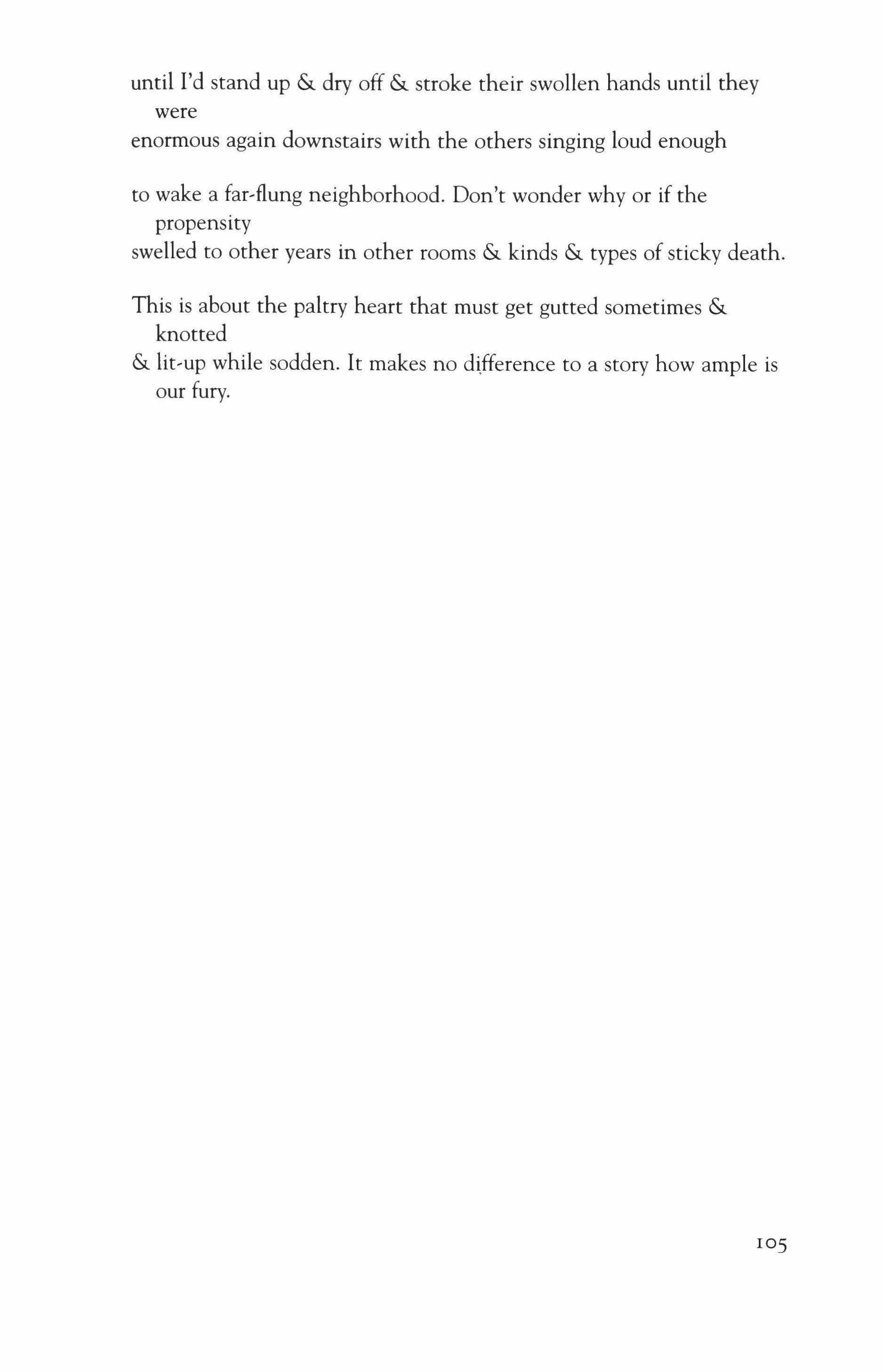
until I'd stand up & dry off & stroke their swollen hands until they were
enormous again downstairs with the others singing loud enough
to wake a far-flung neighborhood. Don't wonder why or if the propensity swelled to other years in other rooms & kinds & types of sticky death.
This is about the paltry heart that must get gutted sometimes & knotted & lit-up while sodden. It makes no difference to a story how ample is our fury.
105
Stephen Dunn
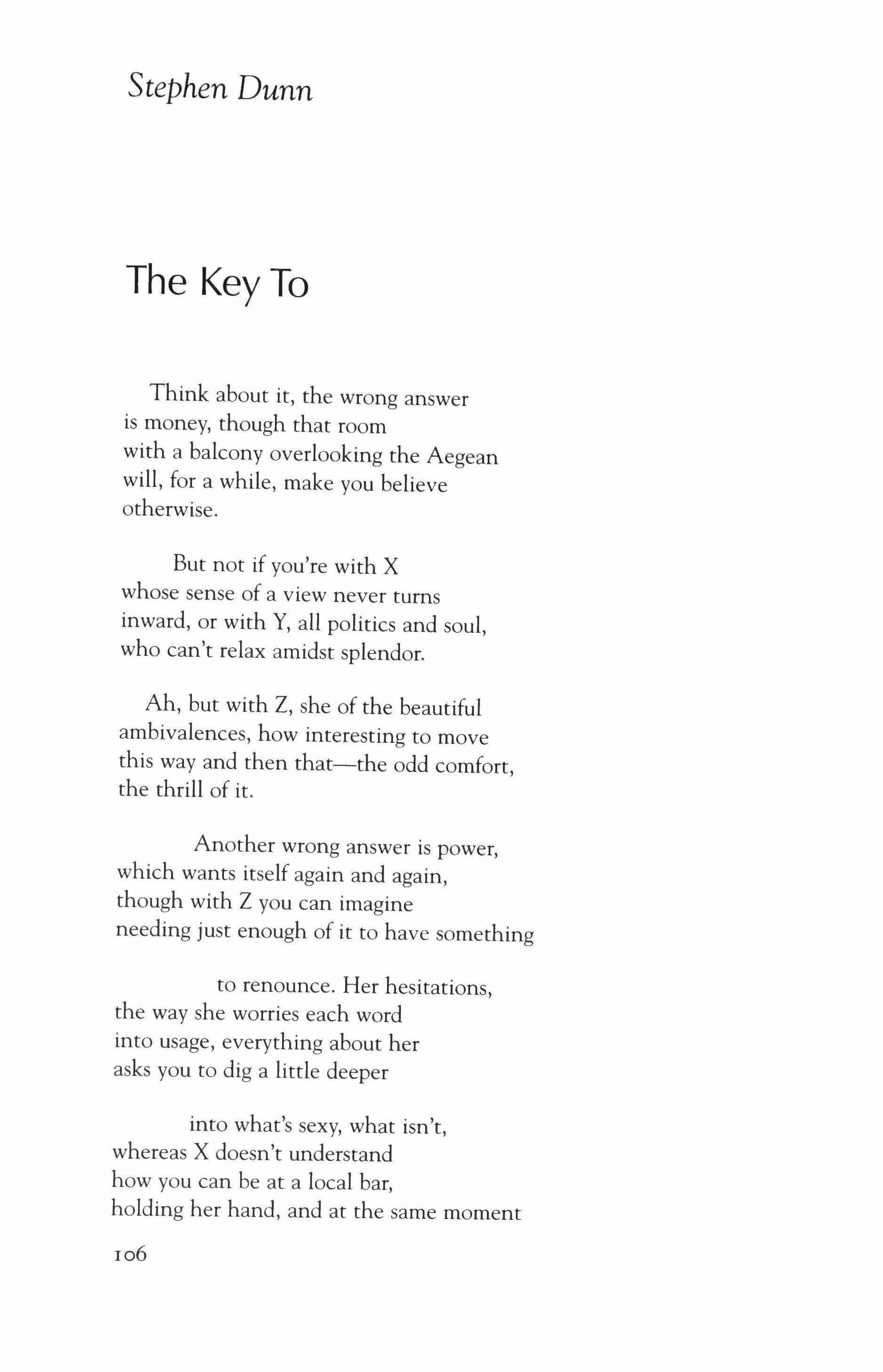
The Key To
Think about it, the wrong answer is money, though that room with a balcony overlooking the Aegean will, for a while, make you believe otherwise.
But not if you're with X whose sense of a view never turns inward, or with Y, all politics and soul, who can't relax amidst splendor.
Ah, but with Z, she of the beautiful ambivalences, how interesting to move this way and then that-the odd comfort, the thrill of it.
Another wrong answer is power, which wants itself again and again, though with Z you can imagine needing just enough of it to have something to renounce. Her hesitations, the way she worries each word into usage, everything about her asks you to dig a little deeper into what's sexy, what isn't, whereas X doesn't understand how you can be at a local bar, holding her hand, and at the same moment
106

elsewhere, say Morocco, in a cave with gypsies. Y understands, but lets her feelings about the Third World interfere with her lovemaking.
Half in, half out, that's for Z one reasonable way of being here. You could spend a lifetime looking for a woman like that. One of you, for once, shouldn't think twice.
Cecilia Llompart
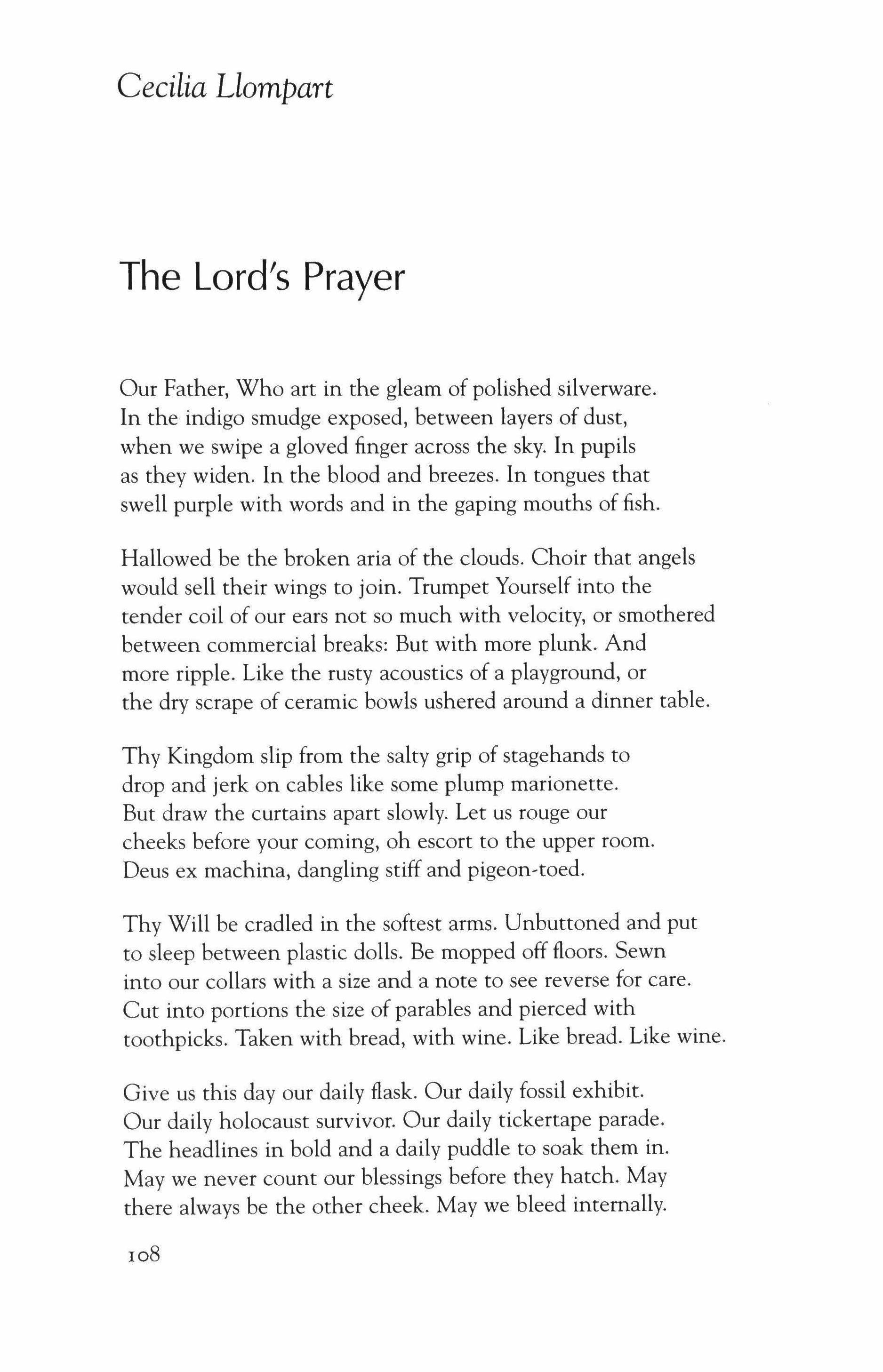
The Lord's Prayer
Our Father, Who art in the gleam of polished silverware. In the indigo smudge exposed, between layers of dust, when we swipe a gloved finger across the sky. In pupils as they widen. In the blood and breezes. In tongues that swell purple with words and in the gaping mouths of fish.
Hallowed be the broken aria of the clouds. Choir that angels would sell their wings to join. Trumpet Yourself into the tender coil of our ears not so much with velocity, or smothered between commercial breaks: But with more plunk. And more ripple. Like the rusty acoustics of a playground, or the dry scrape of ceramic bowls ushered around a dinner table.
Thy Kingdom slip from the salty grip of stagehands to drop and jerk on cables like some plump marionette. But draw the curtains apart slowly. Let us rouge our cheeks before your coming, oh escort to the upper room. Deus ex machina, dangling stiff and pigeon-toed.
Thy Will be cradled in the softest arms. Unbuttoned and put to sleep between plastic dolls. Be mopped off floors. Sewn into our collars with a size and a note to see reverse for care. Cut into portions the size of parables and pierced with toothpicks. Taken with bread, with wine. Like bread. Like wine.
Give us this day our daily flask. Our daily fossil exhibit. Our daily holocaust survivor. Our daily tickertape parade. The headlines in bold and a daily puddle to soak them in. May we never count our blessings before they hatch. May there always be the other cheek. May we bleed internally.
108
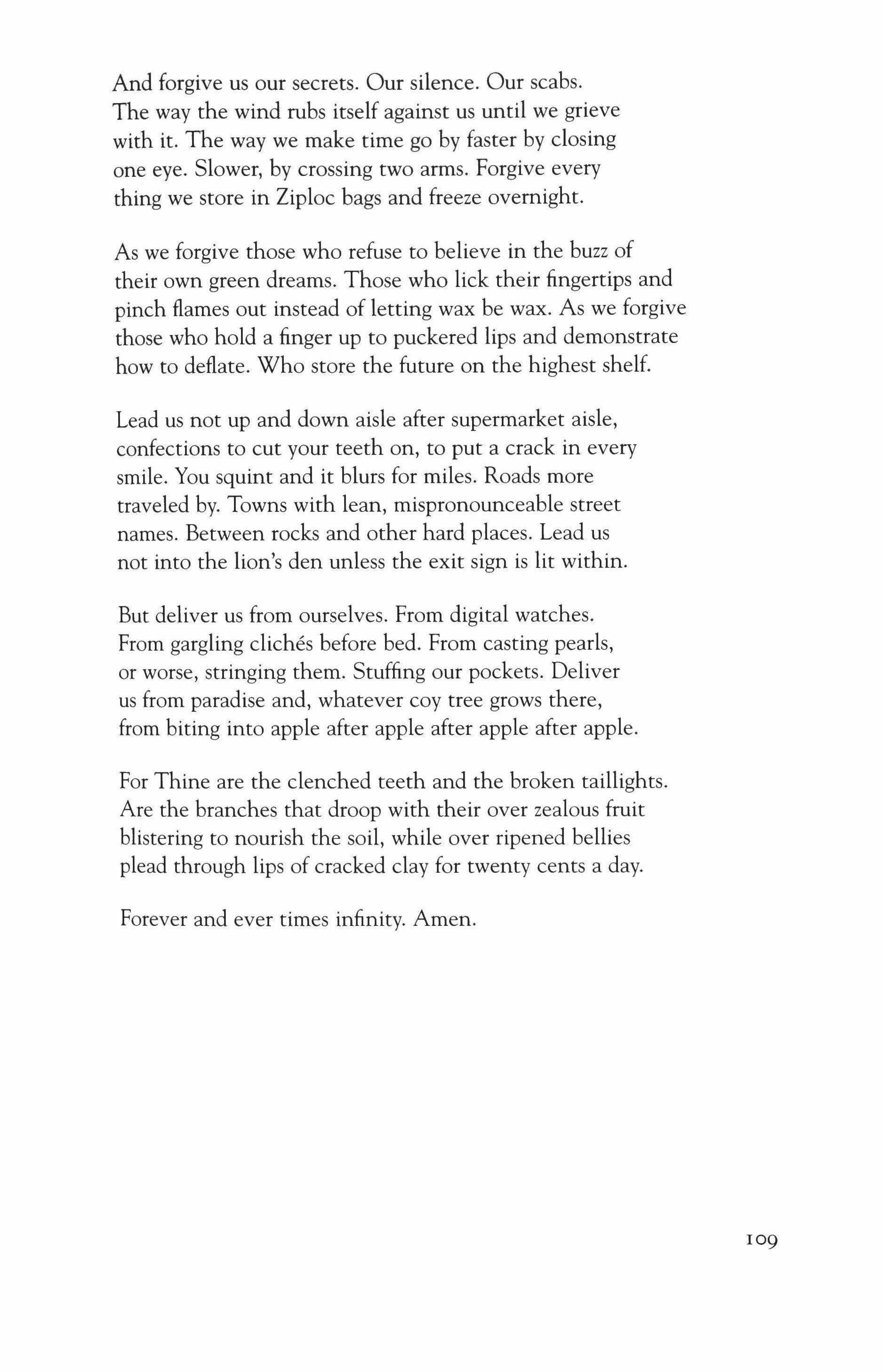
And forgive us our secrets. Our silence. Our scabs. The way the wind rubs itself against us until we grieve with it. The way we make time go by faster by closing one eye. Slower, by crossing two arms. Forgive every thing we store in Ziploc bags and freeze overnight.
As we forgive those who refuse to believe in the buzz of their own green dreams. Those who lick their fingertips and pinch flames out instead of letting wax be wax. As we forgive those who hold a finger up to puckered lips and demonstrate how to deflate. Who store the future on the highest shelf.
Lead us not up and down aisle after supermarket aisle, confections to cut your teeth on, to put a crack in every smile. You squint and it blurs for miles. Roads more traveled by. Towns with lean, mispronounceable street names. Between rocks and other hard places. Lead us not into the lion's den unless the exit sign is lit within.
But deliver us from ourselves. From digital watches. From gargling cliches before bed. From casting pearls, or worse, stringing them. Stuffing our pockets. Deliver us from paradise and, whatever coy tree grows there, from biting into apple after apple after apple after apple.
For Thine are the clenched teeth and the broken taillights. Are the branches that droop with their over zealous fruit blistering to nourish the soil, while over ripened bellies plead through lips of cracked clay for twenty cents a day.
Forever and ever times infinity. Amen.
109
Bob Hicok
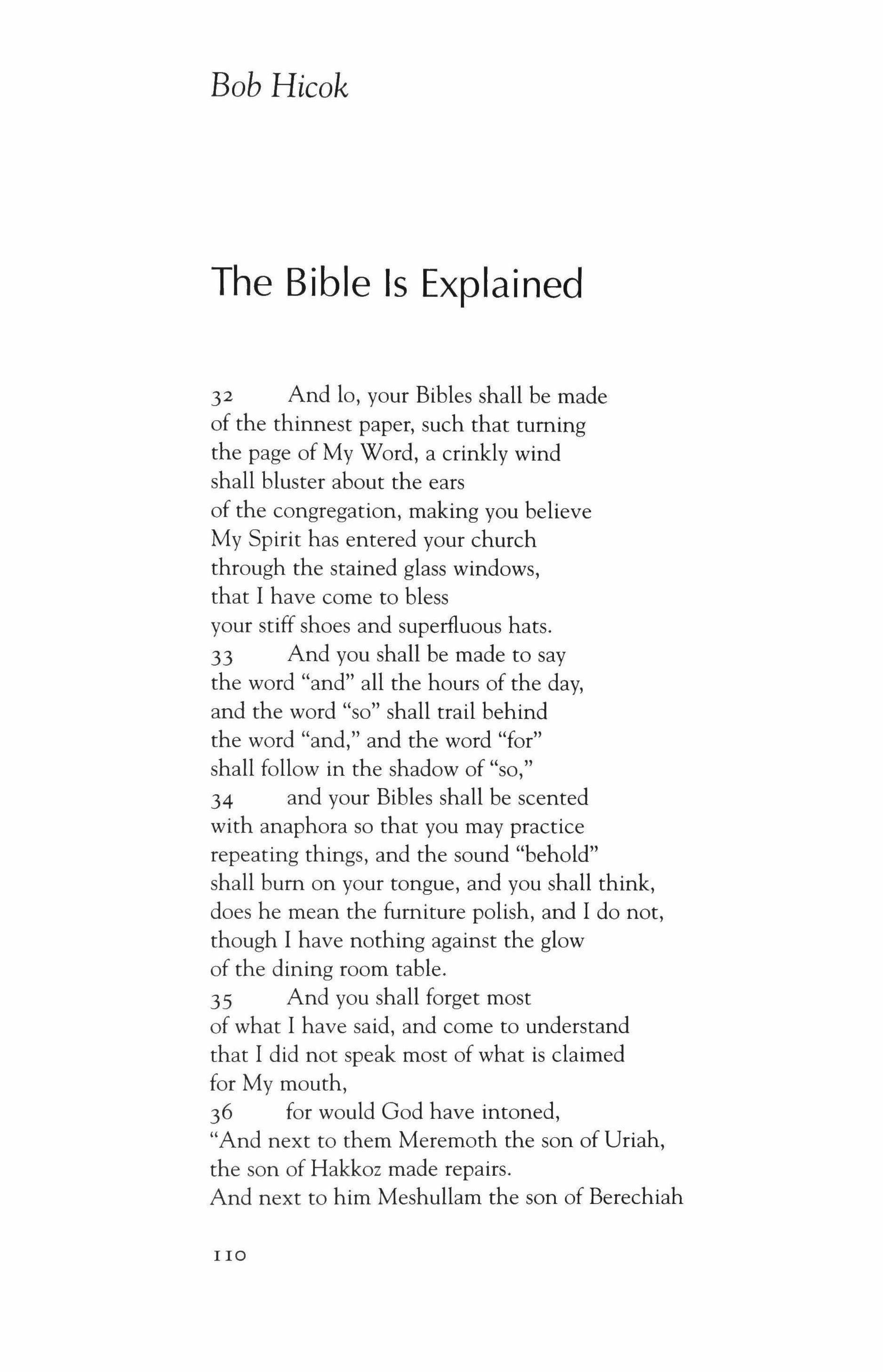
The Bible Is Explained
32 And lo, your Bibles shall be made of the thinnest paper, such that turning the page of My Word, a crinkly wind shall bluster about the ears of the congregation, making you believe My Spirit has entered your church through the stained glass windows, that I have come to bless your stiff shoes and superfluous hats.
33 And you shall be made to say the word "and" all the hours of the day, and the word "so" shall trail behind the word "and," and the word "for" shall follow in the shadow of "so,"
34 and your Bibles shall be scented with anaphora so that you may practice repeating things, and the sound "behold" shall bum on your tongue, and you shall think, does he mean the furniture polish, and I do not, though I have nothing against the glow of the dining room table.
35 And you shall forget most of what I have said, and come to understand that I did not speak most of what is claimed for My mouth,
36 for would God have intoned, "And next to them Meremoth the son of Uriah, the son of Hakkoz made repairs. And next to him Meshullam the son of Berechiah
110
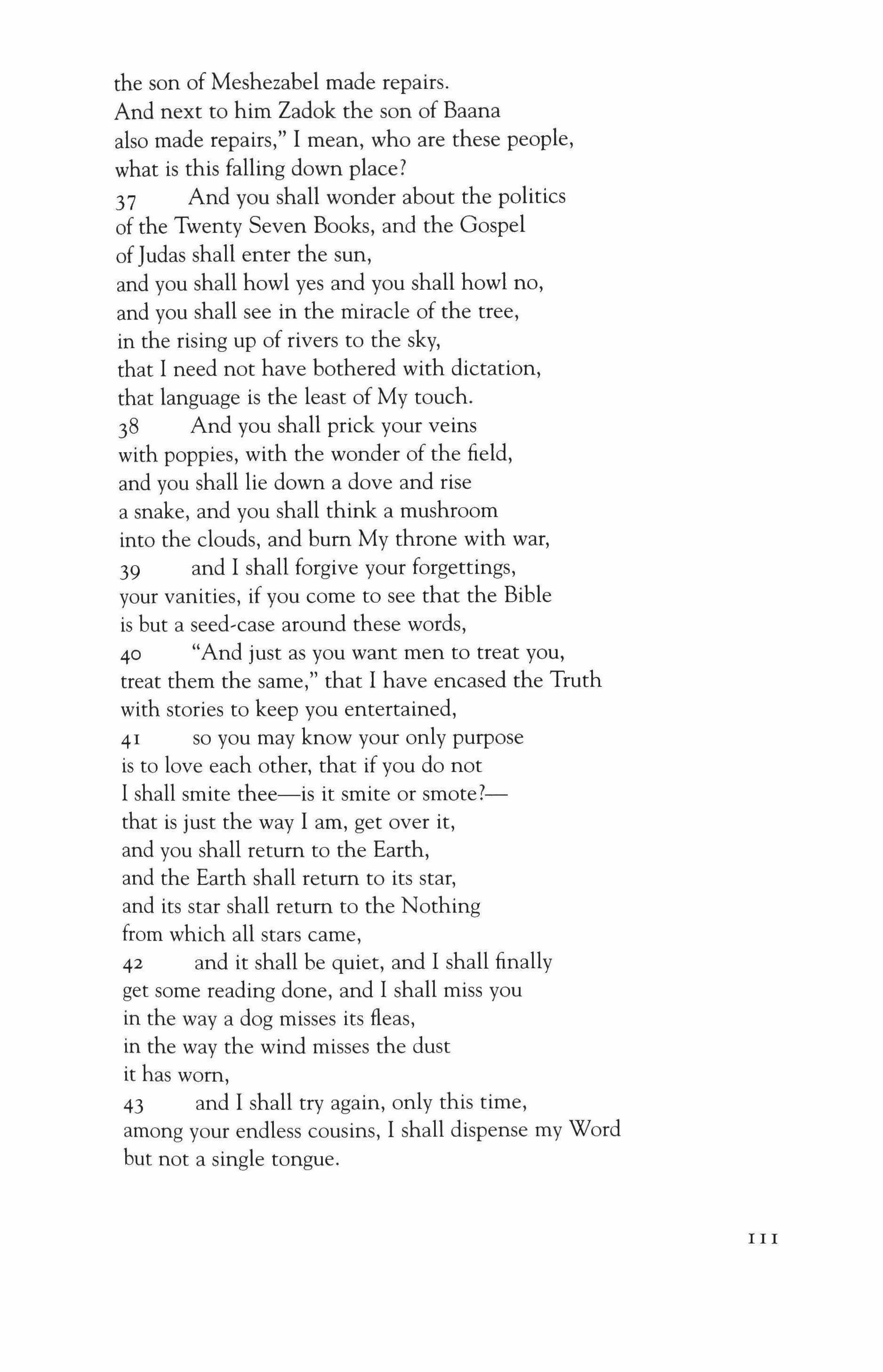
the son of Meshezabel made repairs. And next to him Zadok the son of Baana also made repairs," I mean, who are these people, what is this falling down place?
37 And you shall wonder about the politics of the Twenty Seven Books, and the Gospel of Judas shall enter the sun, and you shall howl yes and you shall howl no, and you shall see in the miracle of the tree, in the rising up of rivers to the sky, that 1 need not have bothered with dictation, that language is the least of My touch.
38 And you shall prick your veins with poppies, with the wonder of the field, and you shall lie down a dove and rise a snake, and you shall think a mushroom into the clouds, and bum My throne with war,
39 and I shall forgive your forgettings, your vanities, if you come to see that the Bible is but a seed-case around these words,
40 "And just as you want men to treat you, treat them the same," that I have encased the Truth with stories to keep you entertained,
41 so you may know your only purpose is to love each other, that if you do not 1 shall smite thee-is it smite or smote?that is just the way I am, get over it, and you shall return to the Earth, and the Earth shall return to its star, and its star shall return to the Nothing from which all stars came,
42 and it shall be quiet, and I shall finally get some reading done, and I shall miss you in the way a dog misses its fleas, in the way the wind misses the dust it has worn,
43 and I shall try again, only this time, among your endless cousins, I shall dispense my Word but not a single tongue.
III
Gabriel Gudding
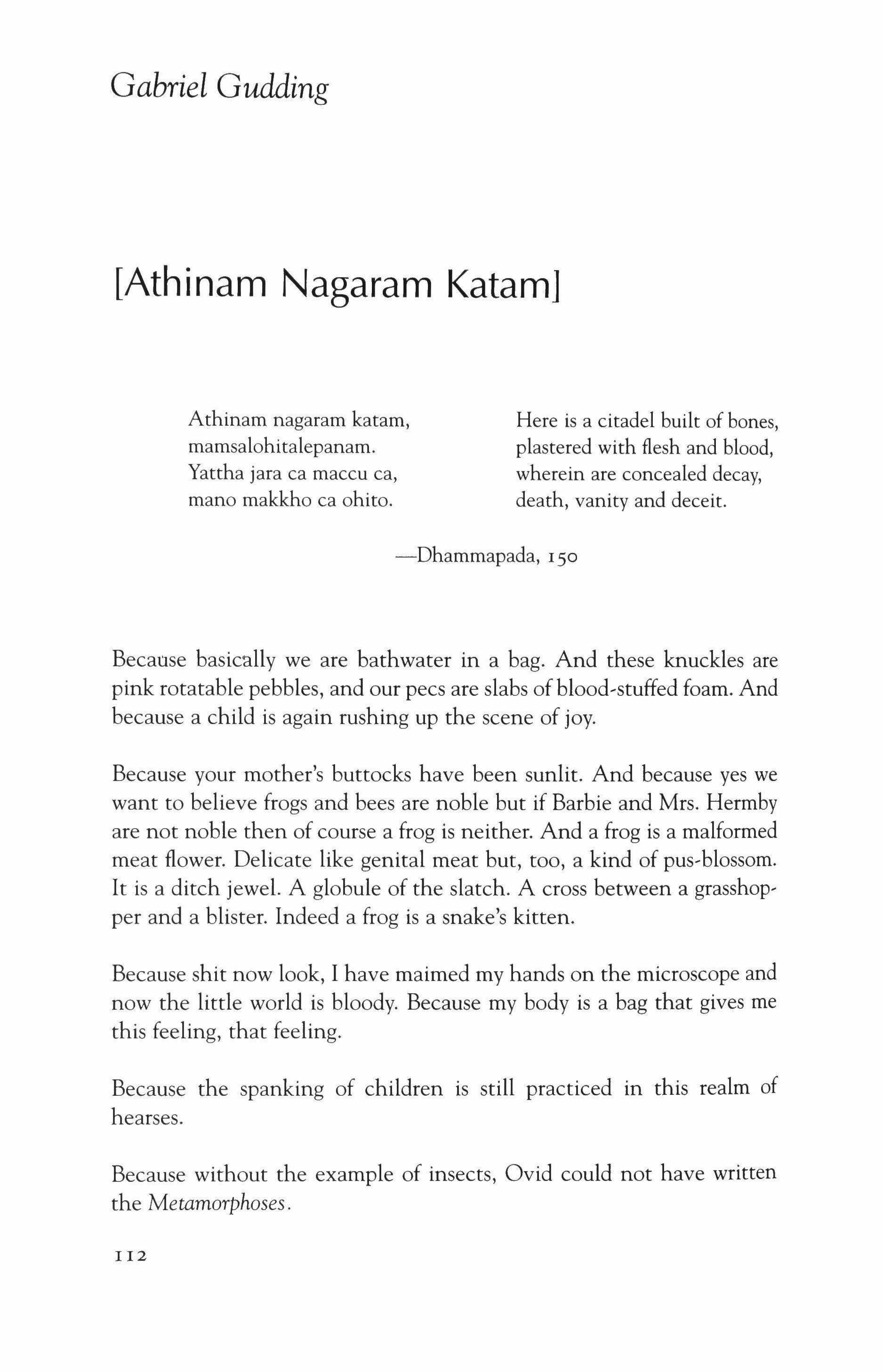
[Athinam
Nagaram Katam]
Athinam nagaram katam, mamsalohitalepanam.
Yattha jara ca maccu ca, mano makkho ca ohito.
Here is a citadel built of bones, plastered with flesh and blood, wherein are concealed decay, death, vanity and deceit.
-Dhammapada, ISO
Because basically we are bathwater in a bag. And these knuckles are pink rotatable pebbles, and our pees are slabs ofblood-stuffed foam. And because a child is again rushing up the scene of joy.
Because your mother's buttocks have been sunlit. And because yes we want to believe frogs and bees are noble but if Barbie and Mrs. Hermby are not noble then of course a frog is neither. And a frog is a malformed meat flower. Delicate like genital meat but, too, a kind of pus,blossom. It is a ditch jewel. A globule of the slatch. A cross between a grasshopper and a blister. Indeed a frog is a snake's kitten.
Because shit now look, I have maimed my hands on the microscope and now the little world is bloody. Because my body is a bag that gives me this feeling, that feeling.
Because the spanking of children is still practiced in this realm of hearses.
Because without the example of insects, Ovid could not have written the Metamorphoses.
112
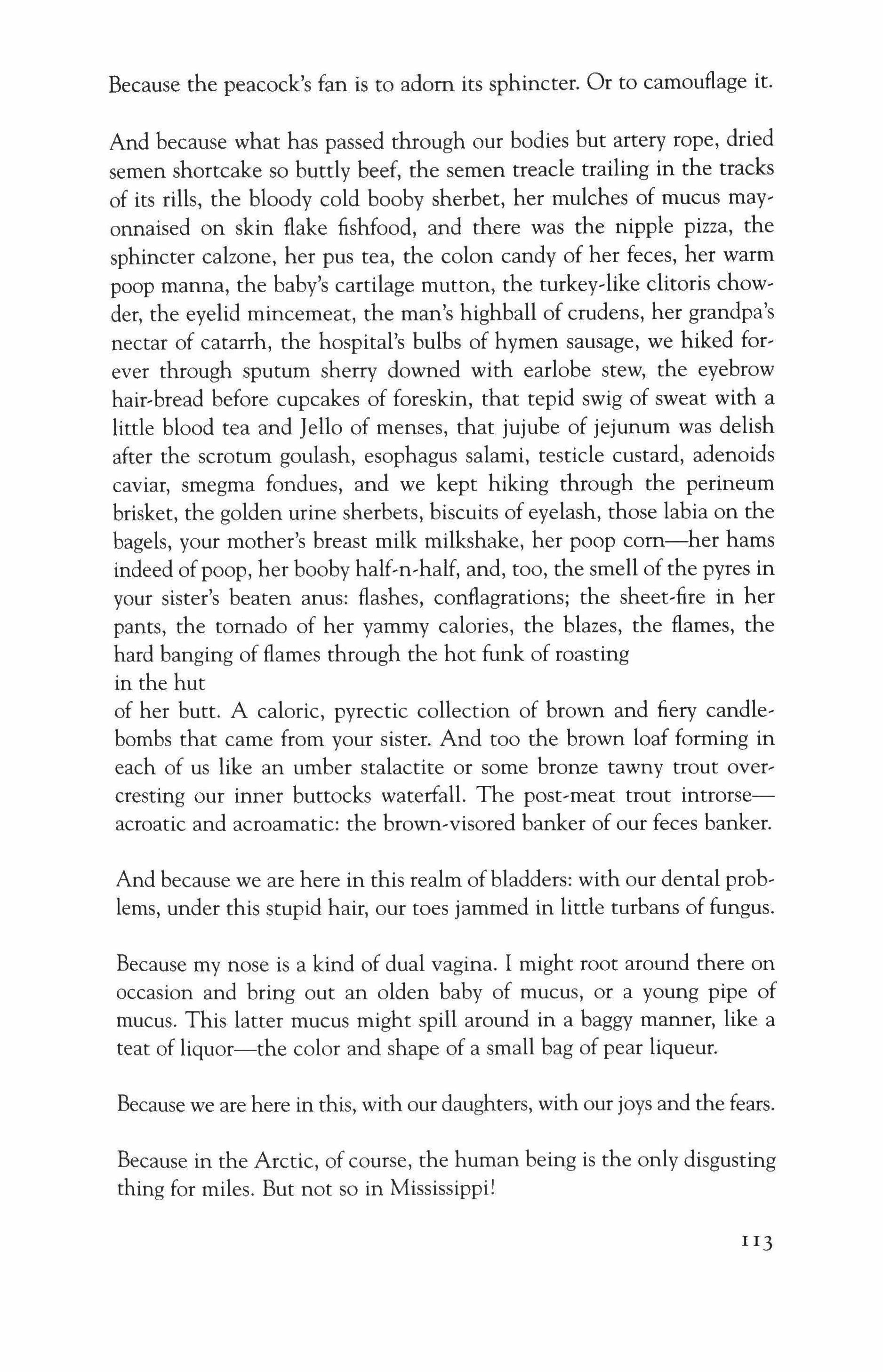
Because the peacock's fan is to adorn its sphincter. Or to camouflage it.
And because what has passed through our bodies but artery rope, dried semen shortcake so buttly beef, the semen treacle trailing in the tracks of its rills, the bloody cold booby sherbet, her mulches of mucus mayonnaised on skin flake fishfood, and there was the nipple pizza, the sphincter calzone, her pus tea, the colon candy of her feces, her warm poop manna, the baby's cartilage mutton, the turkey-like clitoris chowder, the eyelid mincemeat, the man's highball of crudens, her grandpa's nectar of catarrh, the hospital's bulbs of hymen sausage, we hiked forever through sputum sherry downed with earlobe stew, the eyebrow hair-bread before cupcakes of foreskin, that tepid swig of sweat with a little blood tea and Jello of menses, that jujube of jejunum was delish after the scrotum goulash, esophagus salami, testicle custard, adenoids caviar, smegma fondues, and we kept hiking through the perineum brisket, the golden urine sherbets, biscuits of eyelash, those labia on the bagels, your mother's breast milk milkshake, her poop corn-her hams indeed of poop, her booby half-n-half, and, too, the smell of the pyres in your sister's beaten anus: flashes, conflagrations; the sheet-fire in her pants, the tornado of her yammy calories, the blazes, the flames, the hard banging of flames through the hot funk of roasting in the hut of her butt. A caloric, pyrectic collection of brown and fiery candlebombs that came from your sister. And too the brown loaf forming in each of us like an umber stalactite or some bronze tawny trout overcresting our inner buttocks waterfall. The post-meat trout introrseacroatic and acroamatic: the brown-visored banker of our feces banker.
And because we are here in this realm of bladders: with our dental problems, under this stupid hair, our toes jammed in little turbans of fungus.
Because my nose is a kind of dual vagina. I might root around there on occasion and bring out an olden baby of mucus, or a young pipe of mucus. This latter mucus might spill around in a baggy manner, like a teat of liquor-the color and shape of a small bag of pear liqueur.
Because we are here in this, with our daughters, with our joys and the fears.
Because in the Arctic, of course, the human being is the only disgusting thing for miles. But not so in Mississippi!
113
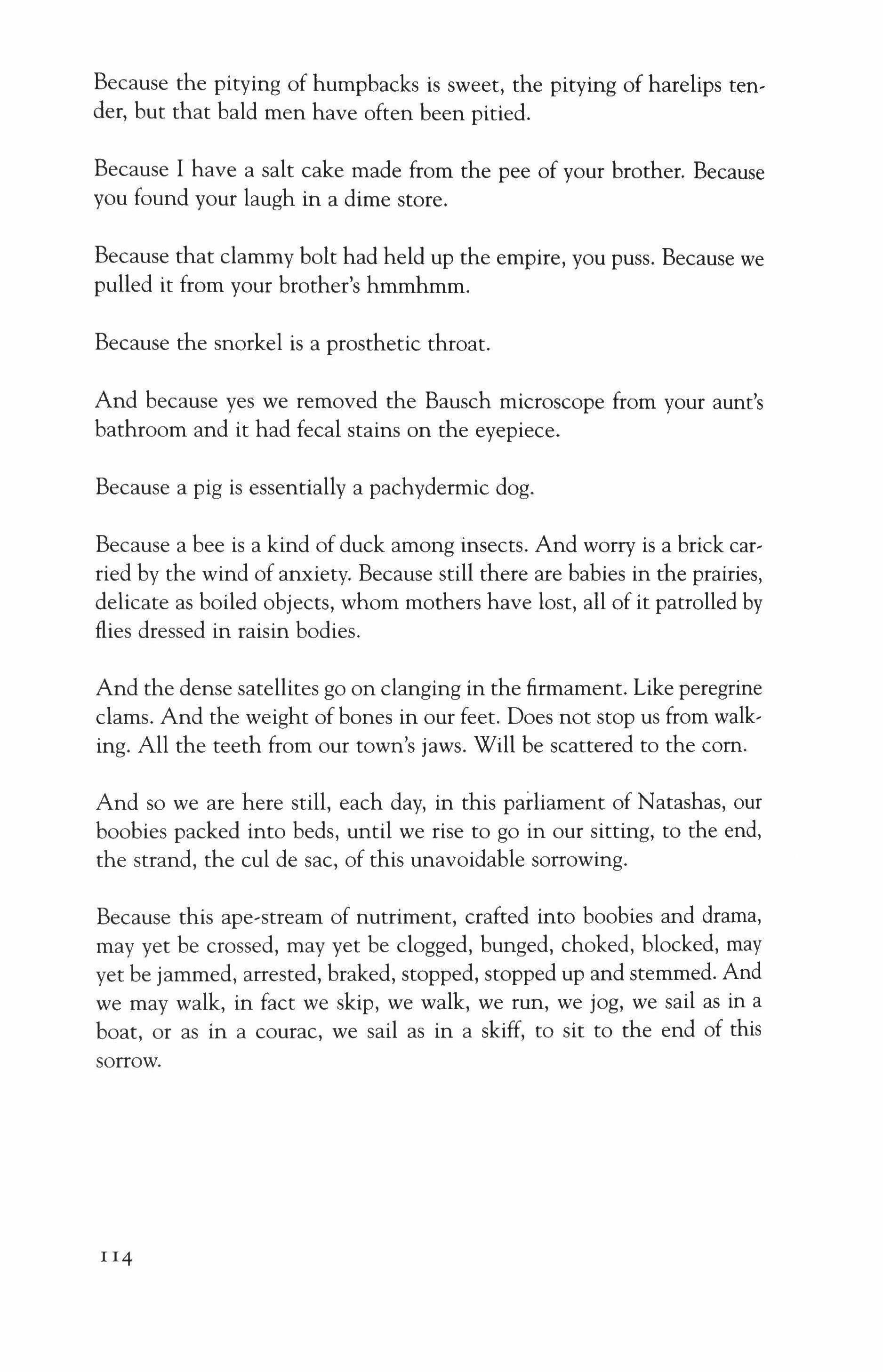
Because the pitying of humpbacks is sweet, the pitying of harelips tender, but that bald men have often been pitied.
Because I have a salt cake made from the pee of your brother. Because you found your laugh in a dime store.
Because that clammy bolt had held up the empire, you puss. Because we pulled it from your brother's hmmhmm.
Because the snorkel is a prosthetic throat.
And because yes we removed the Bausch microscope from your aunt's bathroom and it had fecal stains on the eyepiece.
Because a pig is essentially a pachydermic dog.
Because a bee is a kind of duck among insects. And worry is a brick carried by the wind of anxiety. Because still there are babies in the prairies, delicate as boiled objects, whom mothers have lost, all of it patrolled by flies dressed in raisin bodies.
And the dense satellites go on clanging in the firmament. Like peregrine clams. And the weight of bones in our feet. Does not stop us from walking. All the teeth from our town's jaws. Will be scattered to the com.
And so we are here still, each day, in this parliament of Natashas, our boobies packed into beds, until we rise to go in our sitting, to the end, the strand, the cul de sac, of this unavoidable sorrowing.
Because this ape-stream of nutriment, crafted into boobies and drama, may yet be crossed, may yet be clogged, bunged, choked, blocked, may yet be jammed, arrested, braked, stopped, stopped up and stemmed. And we may walk, in fact we skip, we walk, we run, we jog, we sail as in a boat, or as in a courac, we sail as in a skiff, to sit to the end of this sorrow.
114
[And What, Friends, Is a Sea]
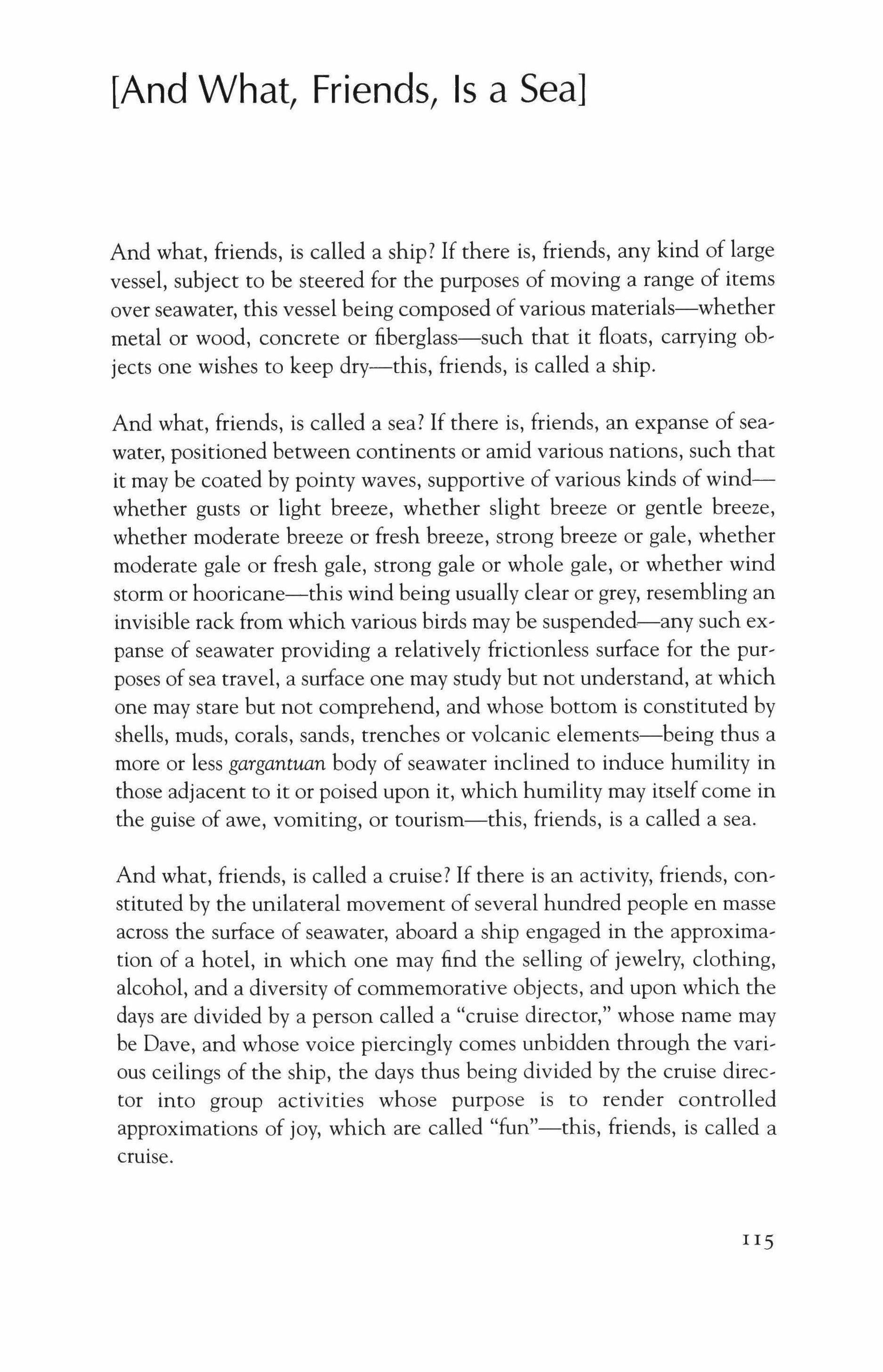
And what, friends, is called a ship? If there is, friends, any kind of large vessel, subject to be steered for the purposes of moving a range of items over seawater, this vessel being composed of various materials-whether metal or wood, concrete or fiberglass-such that it floats, carrying objects one wishes to keep dry-this, friends, is called a ship.
And what, friends, is called a sea? If there is, friends, an expanse of seawater, positioned between continents or amid various nations, such that it may be coated by pointy waves, supportive of various kinds of windwhether gusts or light breeze, whether slight breeze or gentle breeze, whether moderate breeze or fresh breeze, strong breeze or gale, whether moderate gale or fresh gale, strong gale or whole gale, or whether wind storm or hooricane-this wind being usually clear or grey, resembling an invisible rack from which various birds may be suspended-any such expanse of seawater providing a relatively frictionless surface for the purposes of sea travel, a surface one may study but not understand, at which one may stare but not comprehend, and whose bottom is constituted by shells, muds, corals, sands, trenches or volcanic elements-being thus a more or less gargantuan body of seawater inclined to induce humility in those adjacent to it or poised upon it, which humility may itself come in the guise of awe, vomiting, or tourism-this, friends, is a called a sea.
And what, friends, is called a cruise? If there is an activity, friends, constituted by the unilateral movement of several hundred people en masse across the surface of seawater, aboard a ship engaged in the approximation of a hotel, in which one may find the selling of jewelry, clothing, alcohol, and a diversity of commemorative objects, and upon which the days are divided by a person called a "cruise director," whose name may be Dave, and whose voice piercingly comes unbidden through the various ceilings of the ship, the days thus being divided by the cruise director into group activities whose purpose is to render controlled approximations of joy, which are called "fun"-this, friends, is called a cruise.
115
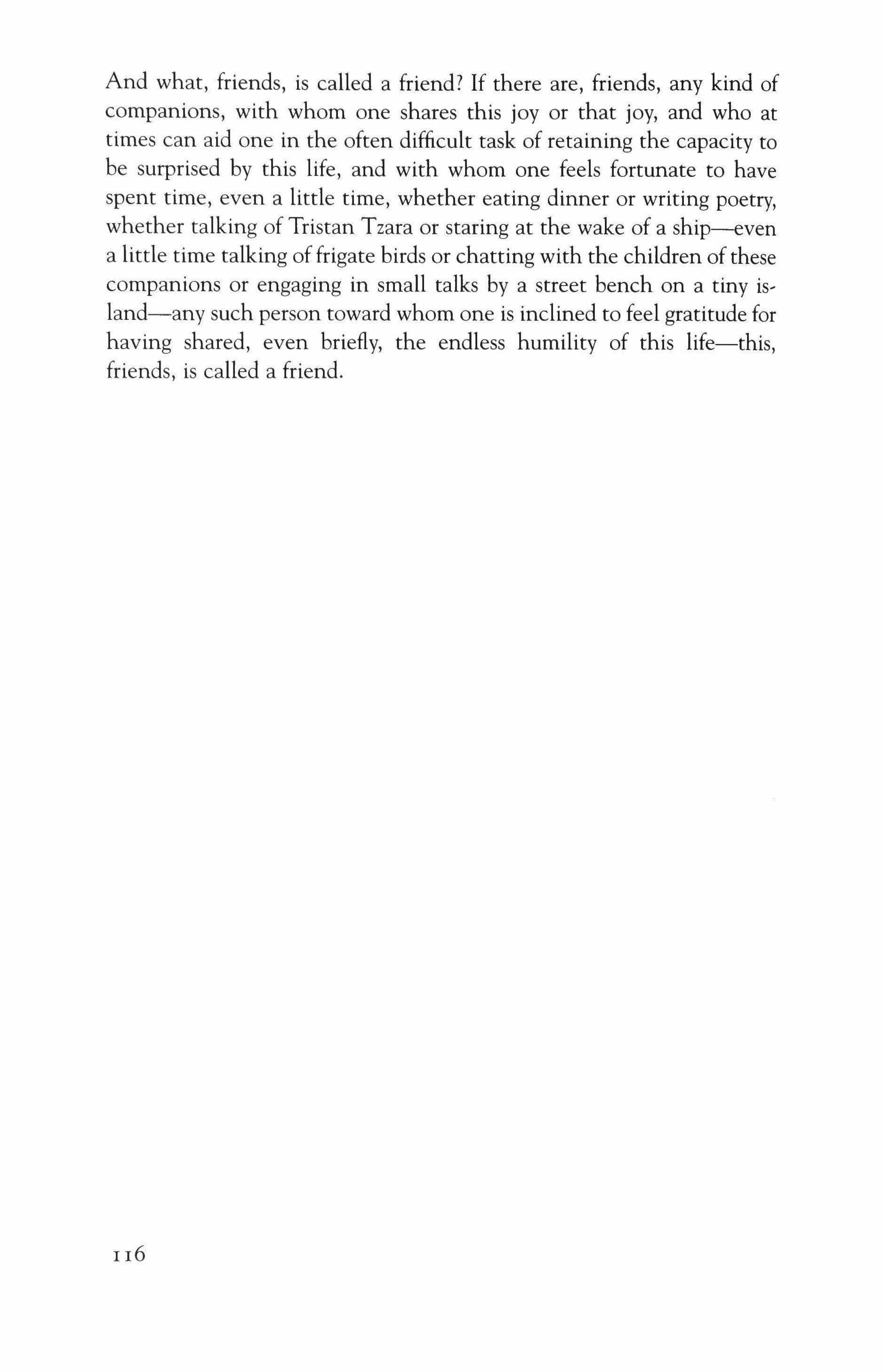
And what, friends, is called a friend? If there are, friends, any kind of companions, with whom one shares this joy or that joy, and who at times can aid one in the often difficult task of retaining the capacity to be surprised by this life, and with whom one feels fortunate to have spent time, even a little time, whether eating dinner or writing poetry, whether talking of Tristan Tzara or staring at the wake of a ship-even a little time talking offrigate birds or chatting with the children of these companions or engaging in small talks by a street bench on a tiny island-any such person toward whom one is inclined to feel gratitude for having shared, even briefly, the endless humility of this life-this, friends, is called a friend.
II6
Richard Cecil Communication
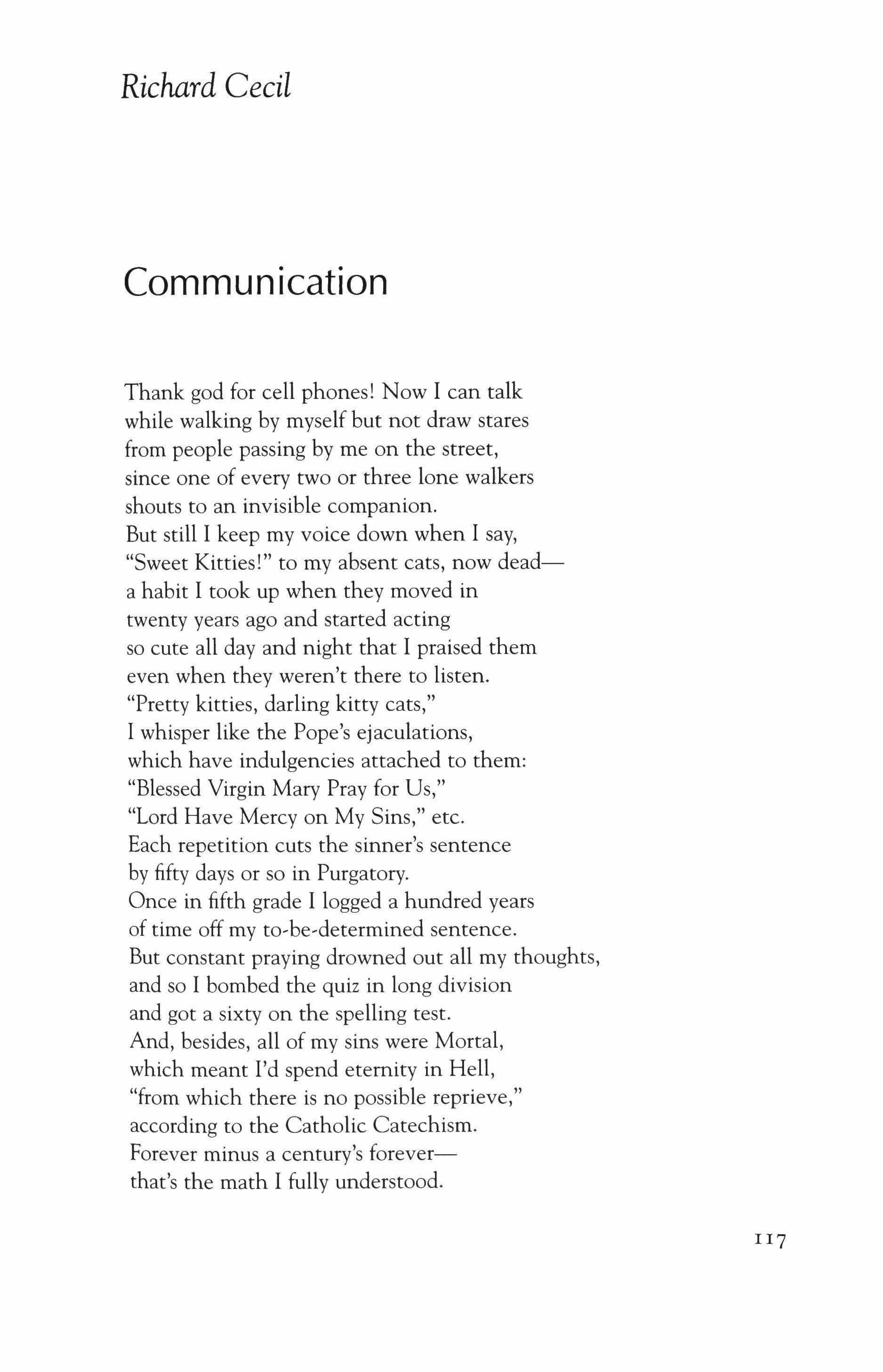
Thank god for cell phones! Now I can talk while walking by myself but not draw stares from people passing by me on the street, since one of every two or three lone walkers shouts to an invisible companion. But stilll keep my voice down when I say, "Sweet Kitties!" to my absent cats, now deada habit I took up when they moved in twenty years ago and started acting so cute all day and night that I praised them even when they weren't there to listen.
"Pretty kitties, darling kitty cats," I whisper like the Pope's ejaculations, which have indulgencies attached to them: "Blessed Virgin Mary Pray for Us," "Lord Have Mercy on My Sins," etc.
Each repetition cuts the sinner's sentence by fifty days or so in Purgatory. Once in fifth grade I logged a hundred years of time off my to-be-determined sentence. But constant praying drowned out all my thoughts, and so I bombed the quiz in long division and got a sixty on the spelling test. And, besides, all of my sins were Mortal, which meant I'd spend eternity in Hell, "from which there is no possible reprieve," according to the Catholic Catechism.
Forever minus a century's foreverthat's the math I fully understood.
II?

What I needed was a Plenary Indulgence, the kind that popes sold in the middle ages, where the buyer's soul is cleansed of all its sins and its sentence to be roasted is commuted. But since the Reformation you can't buy those; in modem times the only way to earn a Plenary Indulgence is martyrdom. So I stopped muttering ejaculations except for cheers and curses-"Holy Shit!" But still I couldn't seem to keep my mouth shut. I had to talk, if only to myself, which got me into trouble in the classroom until I got promoted to professor, where doing all the talking is encouraged by students who refuse to raise their handsthough they're the ones who, filing out of class, instantly dial up their friends to chat on their way to the dining hall or dorm. I let them get two steps ahead, then call out to my absent cats-"Oh, you darlings"the way I used to when they waited for me, listening for my footsteps on the porch. Now they're somewhere I can only reach by talking to myself. "Sweet kitty cats" re-conjures them for me just for a second: hungry and meowing by the door, knowing that I'm coming home to feed them. "What would you kitties like to eat for supper?" I whisper as I pass a girl who's weeping into her cell phone. The kitties say, "thin air."
II8
Sharon Olds

Near Boys' Prep
There's something that I do, every night, the boy in the bus seat next to me said, quite loud, to his friend. I jack off, and I do it the good way. He was maybe twelve, and his friend, eleven, said, 1'm happy for you, though I thought, like me, he would have liked to know what the good way was. How many hairs do you have, at a certain point? twelve asked, and eleven replied, At a certain point-on my head-I have uncountable hairs. On my other side, a young man of about sixteen sat down, and his handsome friend leaned over us and asked him, If she would, would you, with Rebecca? No, said the seated one, Would you? No It's like"Jean, can I touch your breasts?" then a falsetto squeak, "No!" "Sorry; Mary, can I touch your breasts?" "No!" "Sorry; Naomi, can I touch your breasts?" "No!" "Sorry; Betsy, can I touch your breasts?" "No!" He rained this down on us, baritone and squeal-it was, in its way, funny, though I felt near tears, as if sitting beneath contempt. And I remembered times I had rhapsodized about my children with someone who did not have children, times I had tried to describe my love for my husband to someone alone. How daunting the human is, how we use our hour of radiance.
119
Meoluc
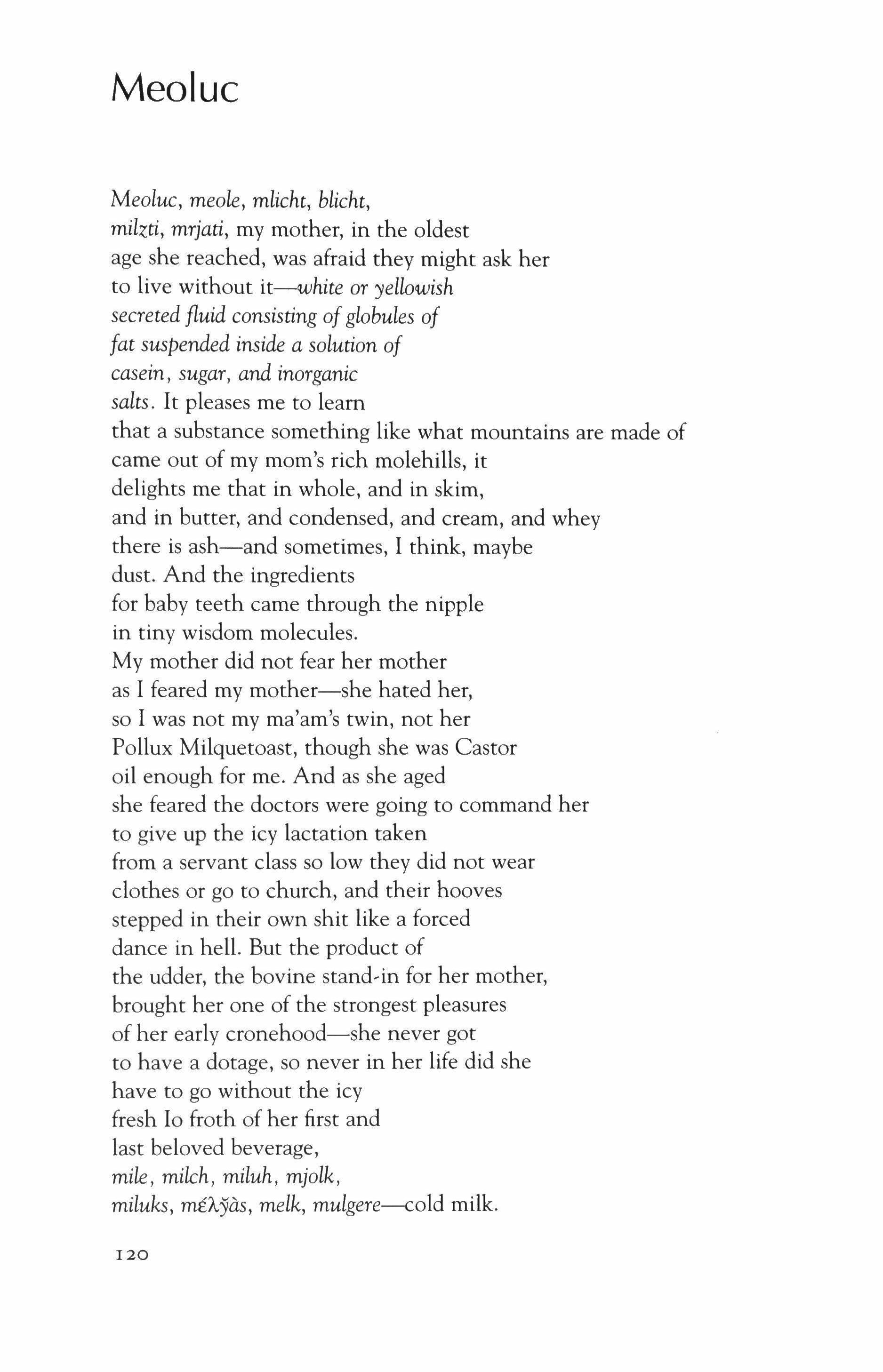
Meoluc, meole, mlicht, blicht, milzti, mrjati, my mother, in the oldest age she reached, was afraid they might ask her to live without it-white or yellowish secreted fluid consisting ofglobules of fat suspended inside a solution of casein, sugar, and inorganic salts. It pleases me to learn that a substance something like what mountains are made of came out of my mom's rich molehills, it delights me that in whole, and in skim, and in butter, and condensed, and cream, and whey there is ash-and sometimes, I think, maybe dust. And the ingredients for baby teeth came through the nipple in tiny wisdom molecules. My mother did not fear her mother as I feared my mother-she hated her, so I was not my ma'am's twin, not her Pollux Milquetoast, though she was Castor oil enough for me. And as she aged she feared the doctors were going to command her to give up the icy lactation taken from a servant class so low they did not wear clothes or go to church, and their hooves stepped in their own shit like a forced dance in hell. But the product of the udder, the bovine stand-in for her mother, brought her one of the strongest pleasures of her early cronehood-she never got to have a dotage, so never in her life did she have to go without the icy fresh 10 froth of her first and last beloved beverage, mile, milch, miluh, mjolk, miluks, meAYas, melk, mulgere-cold milk.
120

A Short History of the Apple
The crunch is the thing, a certain joy in crashing through living tissue, a memory of Neanderthal days.
Edward Bunyard, The Anatomy ofDessert, 1929
Teeth at the skin. Anticipation. Then flesh. Grain on the tongue. Eve's knees ground in the dirt
Of paradise. Newton watching Gravity happen. The history Of apples in every starry core, Each papery chamber's bright Bitter seed. Woody stem stump An infant tree. William Tell And his lucky arrow. Orchards Of the Fertile Crescent. Bushels. Fire blight. Scab and powdery mildew. Cedar apple rust. The apple endures. Born of the wild rose, of crab ancestors. The first pip raised in Kazakhstan. Snow White with poison on her lips. The buried blades of Halloween. Budding and grafting. John Chapman In his tin pot hat. Oh Westward Expansion. Apple pie. American As. Hard cider. Winter banana. Melt-in-the-mouth made sweet By hives of Britain's honeybees: White man's flies. 0 eat. 0 eat.
Dorianne Laux
121

A New Path Will Bring Rich Rewards
Make no mistake about it, slime molds are the most interesting organisms on Earth.
Chop one's body into little orange pieces and strew it throughout a labyrinth: the chunks actually find one another, slither back together, reclump and glop their way out!
Why not take a page from their book, folks? Our homogeneity is becoming alarming: a dutiful child with shined shoes arrives every thirty minutes for a pianoforte lesson, the awkward herd in the women's room take a simultaneous piss at intermission, we all seem to sit on our asses, look up at bright things exploding in the sky,
give no thought to sleeping upside-down, to shooting ourselves in both shoulders, or to living full-time under the sea! Christ tried to set a creative example: he was like hey, here's a bunch of crazy things to try, you can even put nails through your hands
]ynne
Dilling Martin
122

and end up totally cool in just three days. But two millennia later, no one even lives on the moon. He must be disappointed. Without eyes, wheels, hammers, or phone lines slime molds have transcended vastly more challenging circumstances; if they had brains
as well as a sense of humor we'd be the punchline of every lame-ass slime mold joke. How many humans does it take to figure out regeneration? Dunno Bob, shall we sprout fingers to count?
123
You Are Going to Have Some New Clothes

Do you moan about in a slipshod robe and curl-papers all day, or click open your pencil case and scratch at pointless arithmetic? Are you the sort who lies on voluntarily taken personality quizzes, or do you insist that the deli man slice off thin, nearly invisible, ham, and do you place said ham in a labeled Meat Drawer of your refrigerator?
Thought so. I confess I cannot remember why or when we learned to live in this manner but I wonder each morning how to start over. One champion poker player stares continuously into bright lights, thereby contracting his pupils so his anxiety becomes inscrutable
but I'd like to take that one step further. Amnesia seems delightful doesn't it? But how to clonk one's self sufficiently, without risking coma, not to mention whether health insurance covers such things-
surely a sympathetic local Allstate agent would process such a claim, in neat blue cursive write client hoping to forget normative socialization, fear of crowds & entire wasted past, baseball bat to head.
Then when you emerge from her tidy vacuumed office onto the street what surprising light and color and noise. You will recognize no one, and each time a word gets shouted, you can choose: run or laugh away.
124
On Fiction
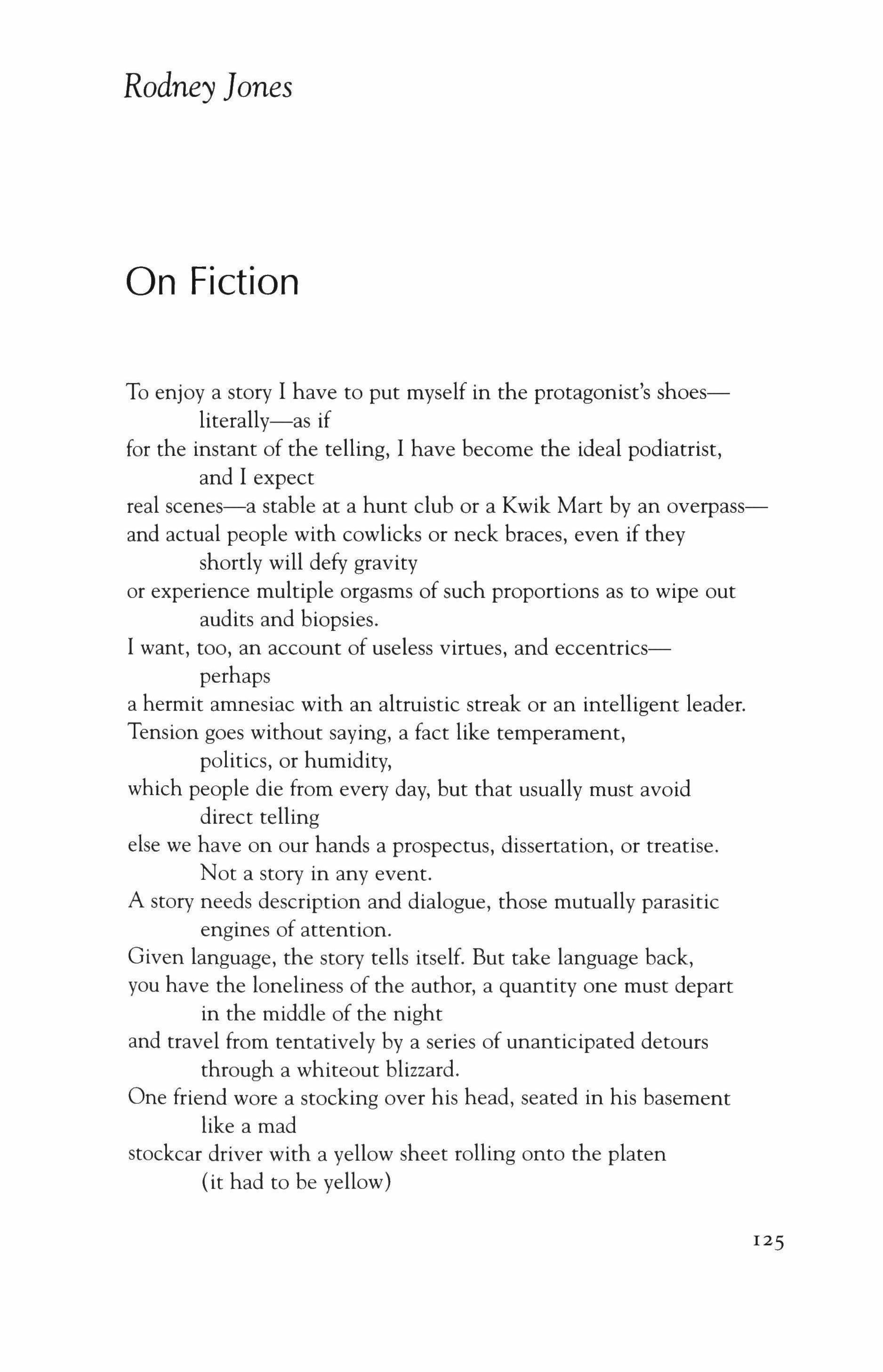
To enjoy a story I have to put myself in the protagonist's shoesliterally-as if for the instant of the telling, I have become the ideal podiatrist, and I expect real scenes-a stable at a hunt club or a Kwik Mart by an overpassand actual people with cowlicks or neck braces, even if they shortly will defy gravity or experience multiple orgasms of such proportions as to wipe out audits and biopsies. I want, too, an account of useless virtues, and eccentricsperhaps a hermit amnesiac with an altruistic streak or an intelligent leader. Tension goes without saying, a fact like temperament, politics, or humidity, which people die from every day, but that usually must avoid direct telling else we have on our hands a prospectus, dissertation, or treatise. Not a story in any event. A story needs description and dialogue, those mutually parasitic engines of attention. Given language, the story tells itself. But take language back, you have the loneliness of the author, a quantity one must depart in the middle of the night and travel from tentatively by a series of unanticipated detours through a whiteout blizzard. One friend wore a stocking over his head, seated in his basement like a mad stockcar driver with a yellow sheet rolling onto the platen (it had to be yellow)
Rodney]ones
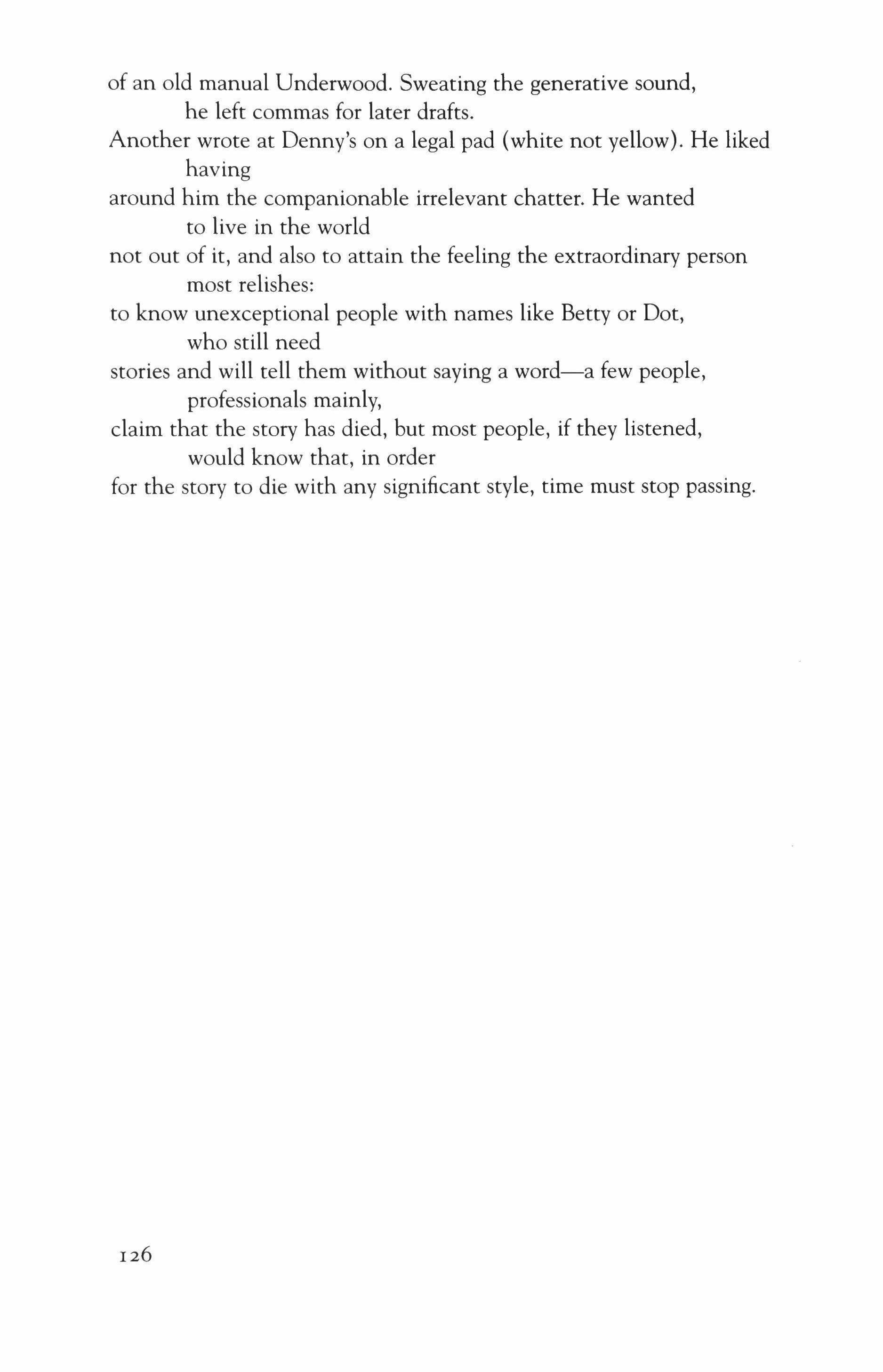
of an old manual Underwood. Sweating the generative sound, he left commas for later drafts. Another wrote at Denny's on a legal pad {white not yellow}. He liked having around him the companionable irrelevant chatter. He wanted to live in the world not out of it, and also to attain the feeling the extraordinary person most relishes: to know unexceptional people with names like Betty or Dot, who still need stories and will tell them without saying a word-a few people, professionals mainly, claim that the story has died, but most people, if they listened, would know that, in order for the story to die with any significant style, time must stop passing.
I26
Soak
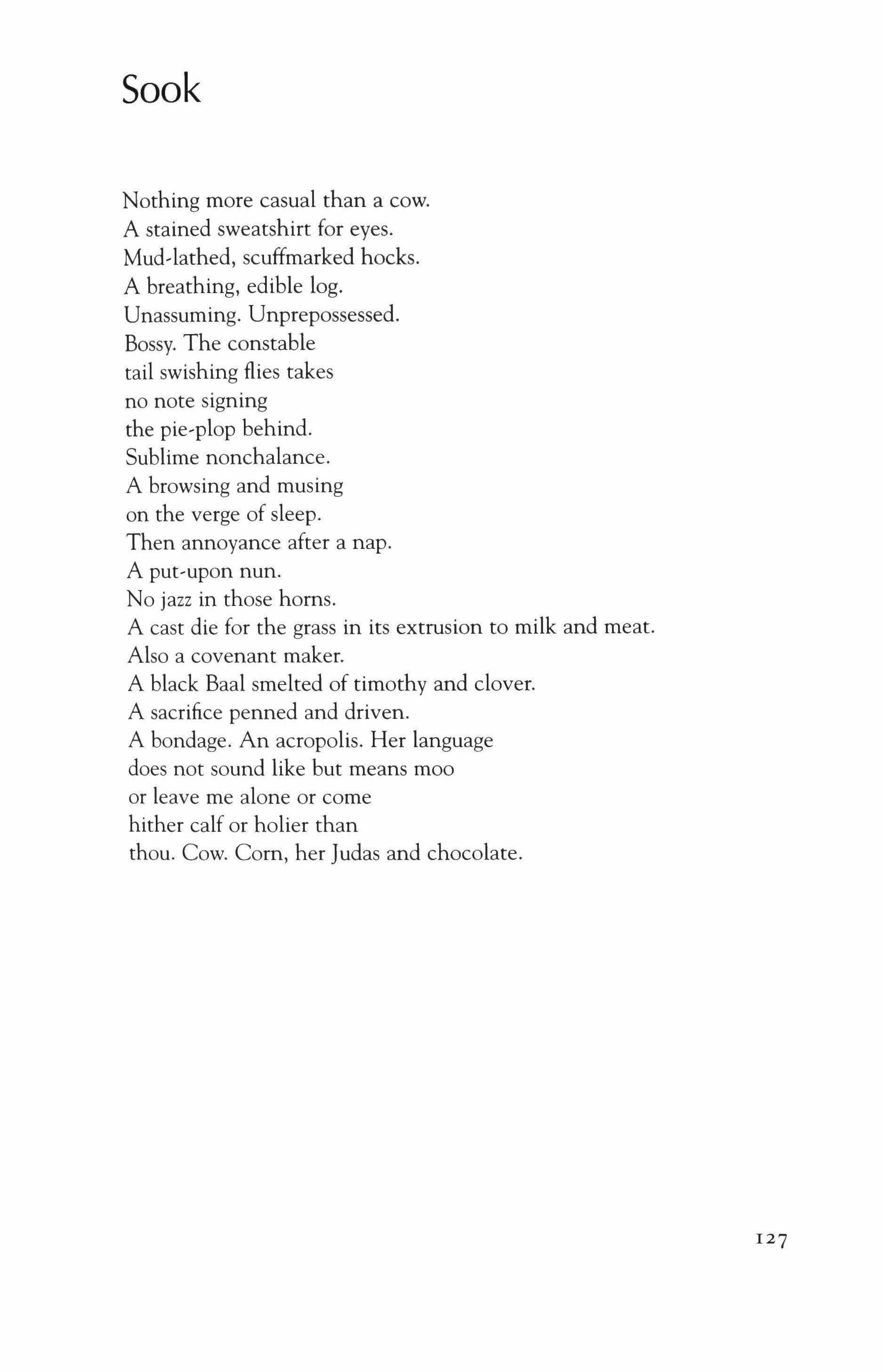
Nothing more casual than a cow.
A stained sweatshirt for eyes. Mud-lathed, scuffmarked hocks.
A breathing, edible log.
Unassuming. Unprepossessed.
Bossy. The constable tail swishing flies takes no note signing the pie-plop behind. Sublime nonchalance.
A browsing and musing on the verge of sleep. Then annoyance after a nap.
A put-upon nun. No jazz in those horns.
A cast die for the grass in its extrusion to milk and meat. Also a covenant maker.
A black Baal smelted of timothy and clover.
A sacrifice penned and driven.
A bondage. An acropolis. Her language does not sound like but means moo or leave me alone or come hither calf or holier than thou. Cow. Com, her Judas and chocolate.
127
Deathly
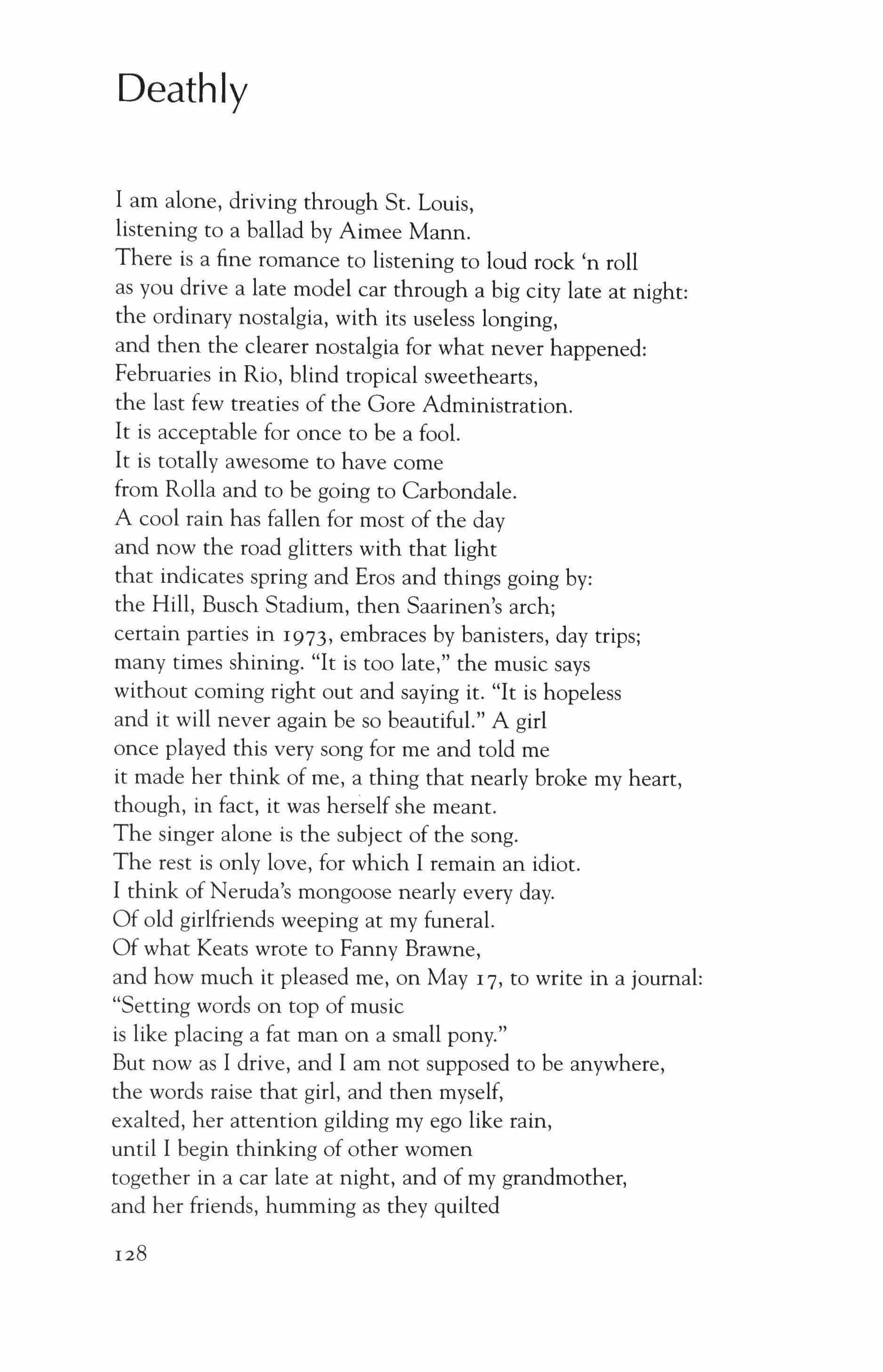
I am alone, driving through St. Louis, listening to a ballad by Aimee Mann.
There is a fine romance to listening to loud rock 'n roll as you drive a late model car through a big city late at night: the ordinary nostalgia, with its useless longing, and then the clearer nostalgia for what never happened: Februaries in Rio, blind tropical sweethearts, the last few treaties of the Gore Administration. It is acceptable for once to be a fool. It is totally awesome to have come from Rolla and to be going to Carbondale.
A cool rain has fallen for most of the day and now the road glitters with that light that indicates spring and Eros and things going by: the Hill, Busch Stadium, then Saarinen's arch; certain parties in 1973, embraces by banisters, day trips; many times shining. "It is too late," the music says without coming right out and saying it. "It is hopeless and it will never again be so beautiful." A girl once played this very song for me and told me it made her think of me, a thing that nearly broke my heart, though, in fact, it was herself she meant. The singer alone is the subject of the song. The rest is only love, for which I remain an idiot.
I think of Neruda's mongoose nearly every day. Of old girlfriends weeping at my funeral. Of what Keats wrote to Fanny Brawne, and how much it pleased me, on May 17, to write in a journal: "Setting words on top of music is like placing a fat man on a small pony."
But now as I drive, and I am not supposed to be anywhere, the words raise that girl, and then myself, exalted, her attention gilding my ego like rain, until I begin thinking of other women together in a car late at night, and of my grandmother, and her friends, humming as they quilted
128
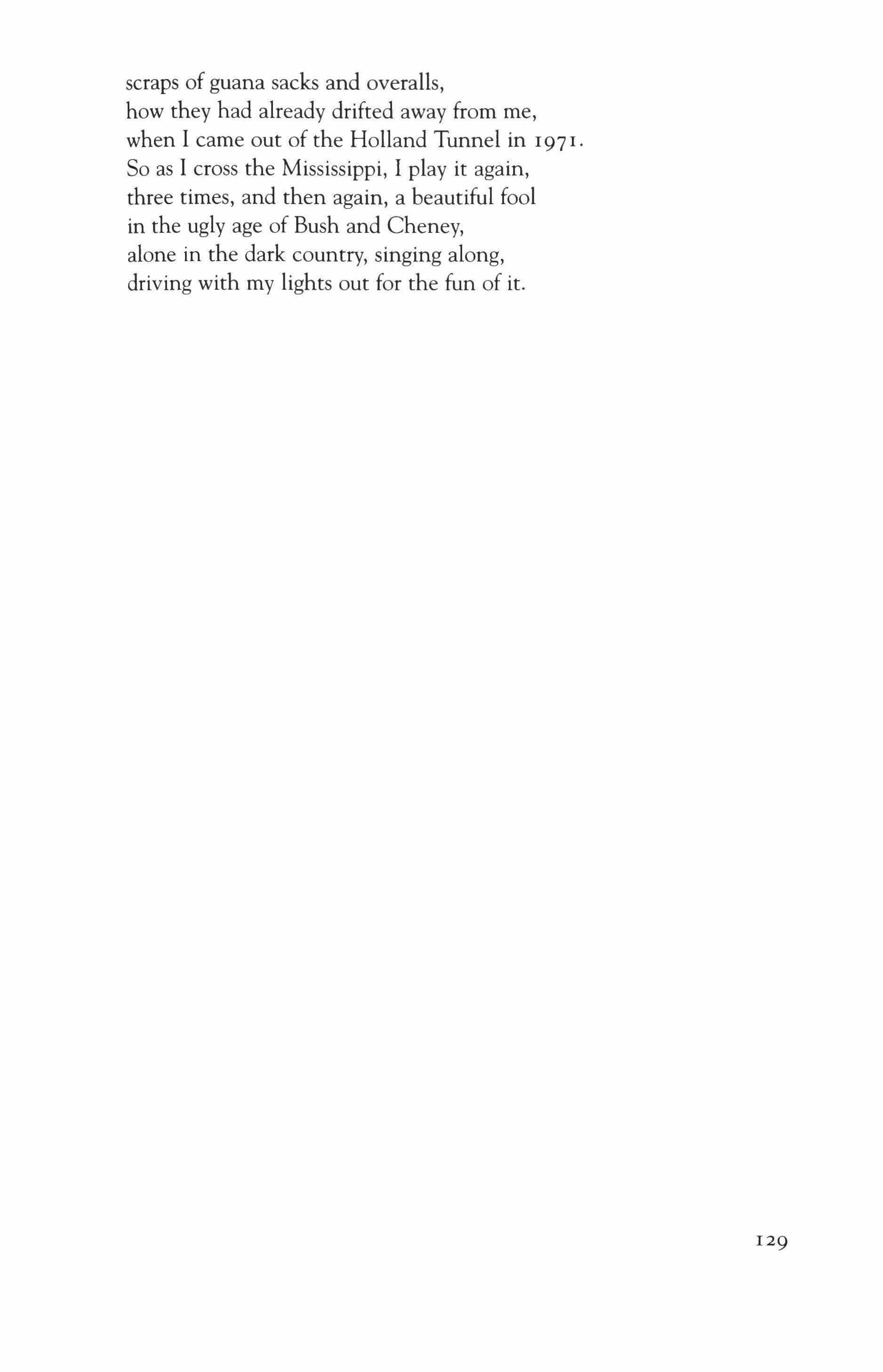
scraps of guana sacks and overalls, how they had already drifted away from me, when I came out of the Holland Tunnel in 1971. So as I cross the Mississippi, I play it again, three times, and then again, a beautiful fool in the ugly age of Bush and Cheney, alone in the dark country, singing along, driving with my lights out for the fun of it.
129
Andrew Hudgins
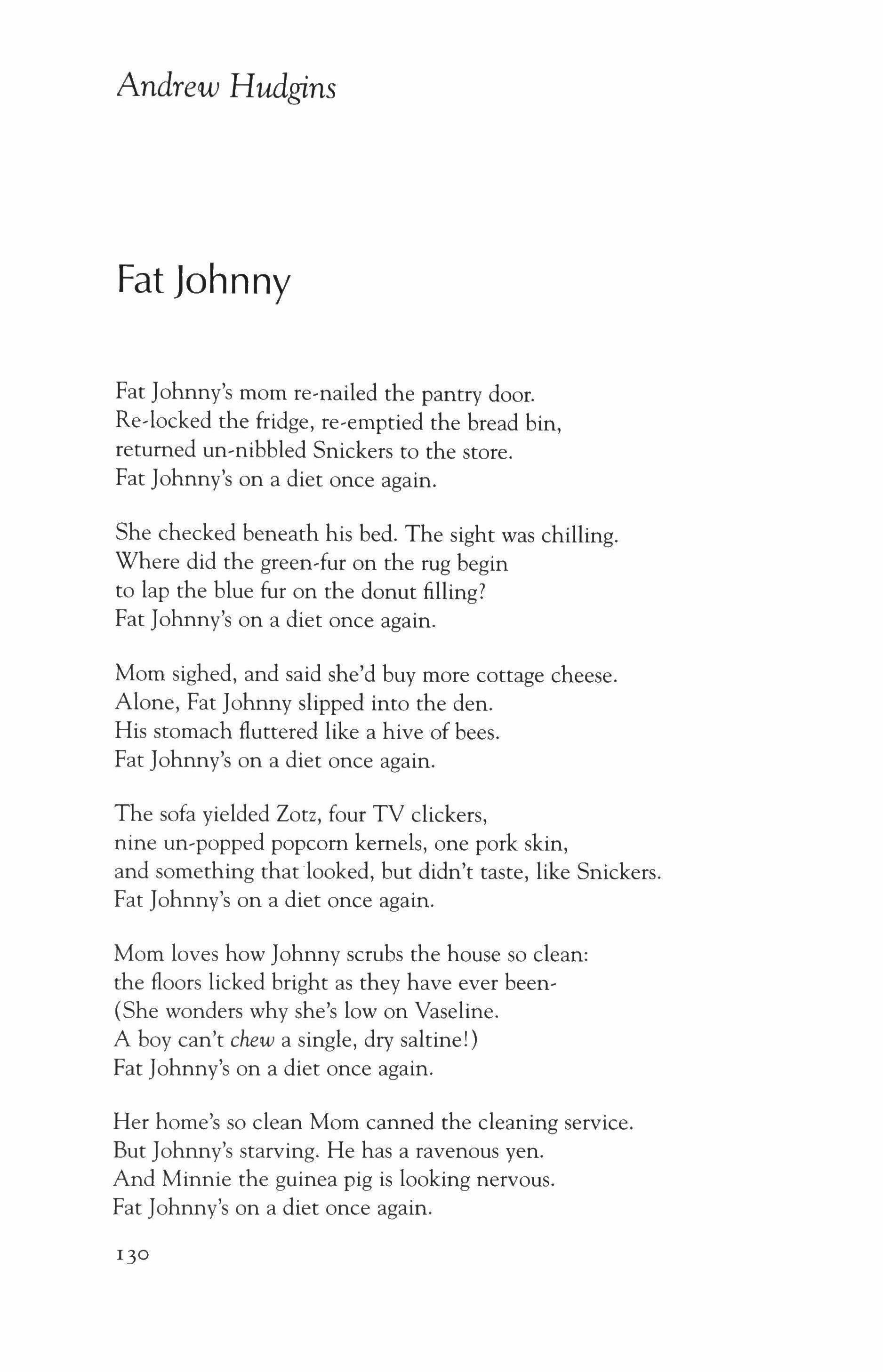
Fat Johnny
Fat Johnny's mom re-nailed the pantry door. Re-locked the fridge, re-ernptied the bread bin, returned un-nibbled Snickers to the store.
Fat Johnny's on a diet once again.
She checked beneath his bed. The sight was chilling. Where did the green-fur on the rug begin to lap the blue fur on the donut filling?
Fat Johnny's on a diet once again.
Mom sighed, and said she'd buy more cottage cheese. Alone, Fat Johnny slipped into the den. His stomach fluttered like a hive of bees.
Fat Johnny's on a diet once again.
The sofa yielded Zotz, four TV clickers, nine un-popped popcorn kernels, one pork skin, and something that looked, but didn't taste, like Snickers. Fat Johnny's on a diet once again.
Mom loves how Johnny scrubs the house so clean: the floors licked bright as they have ever been(She wonders why she's low on Vaseline. A boy can't chew a single, dry saltinel )
Fat Johnny's on a diet once again.
Her home's so clean Mom canned the cleaning service. But Johnny's starving. He has a ravenous yen. And Minnie the guinea pig is looking nervous.
Fat Johnny's on a diet once again.
I30
The Ice-Cream Truck

From blocks away the music floats to my enchanted ears. It builds. It's here! And then it fadesand I explode in tears.
I kick the TV set, and scream, sobbing to extort her, while Mom stares at One Life to Live, and won't give me a quarter.
I pause, change tactics, snatch a coin from the bottom of her purse, then race to catch the ice-cream truck, ignoring Mama's curse.
I stop the truck, I start to choosethen see I won't be eating. I stare down at a goddamn dime, and trudge home to my beating.
131
Grandmother's Bed
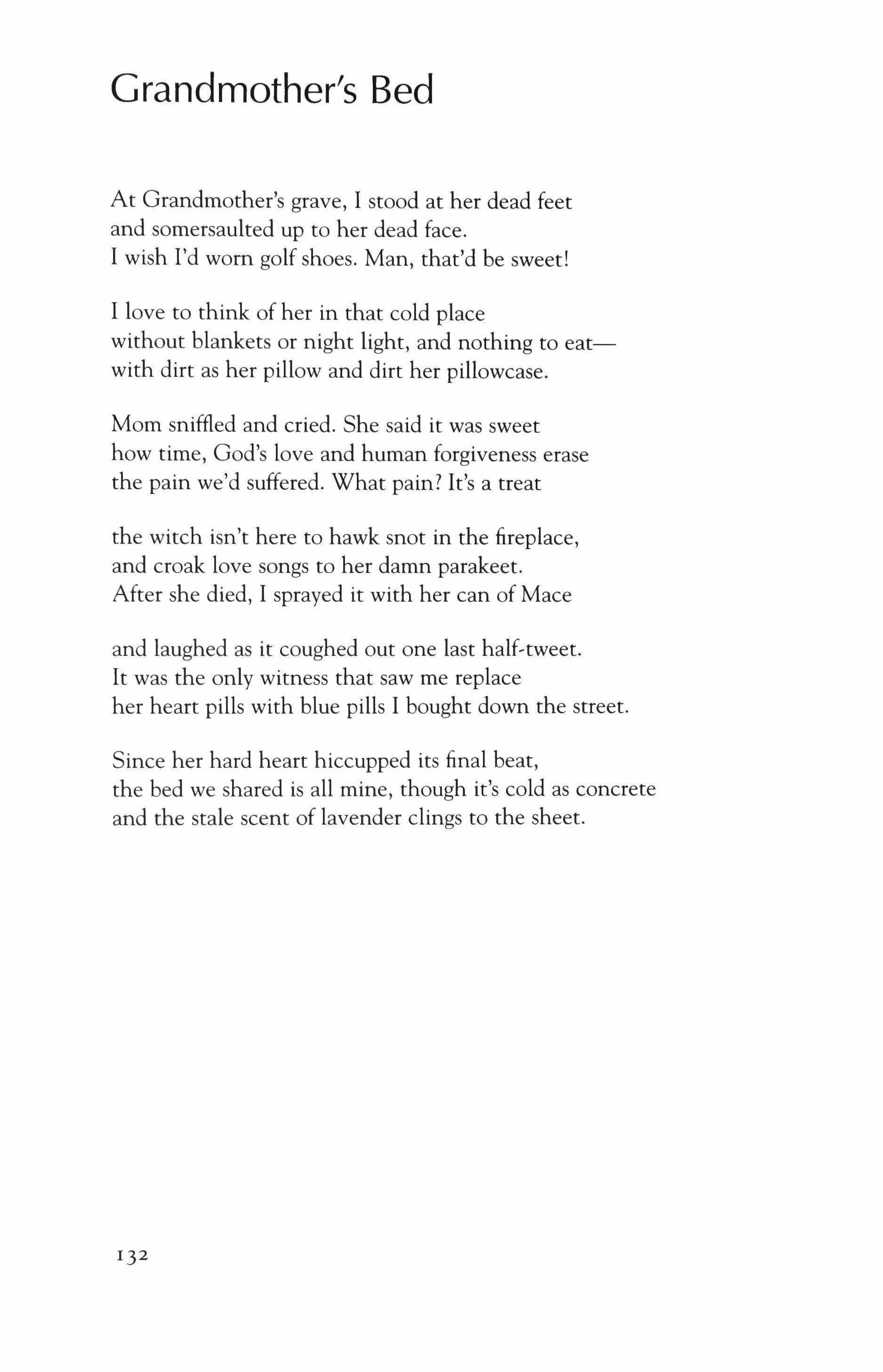
At Grandmother's grave, I stood at her dead feet and somersaulted up to her dead face. I wish I'd worn golf shoes. Man, that'd be sweet!
I love to think of her in that cold place without blankets or night light, and nothing to eatwith dirt as her pillow and dirt her pillowcase. Mom sniffled and cried. She said it was sweet how time, God's love and human forgiveness erase the pain we'd suffered. What pain? It's a treat the witch isn't here to hawk snot in the fireplace, and croak love songs to her damn parakeet. After she died, I sprayed it with her can of Mace and laughed as it coughed out one last half-tweet. It was the only witness that saw me replace her heart pills with blue pills I bought down the street.
Since her hard heart hiccupped its final beat, the bed we shared is all mine, though it's cold as concrete and the stale scent of lavender clings to the sheet.
132
My Hero
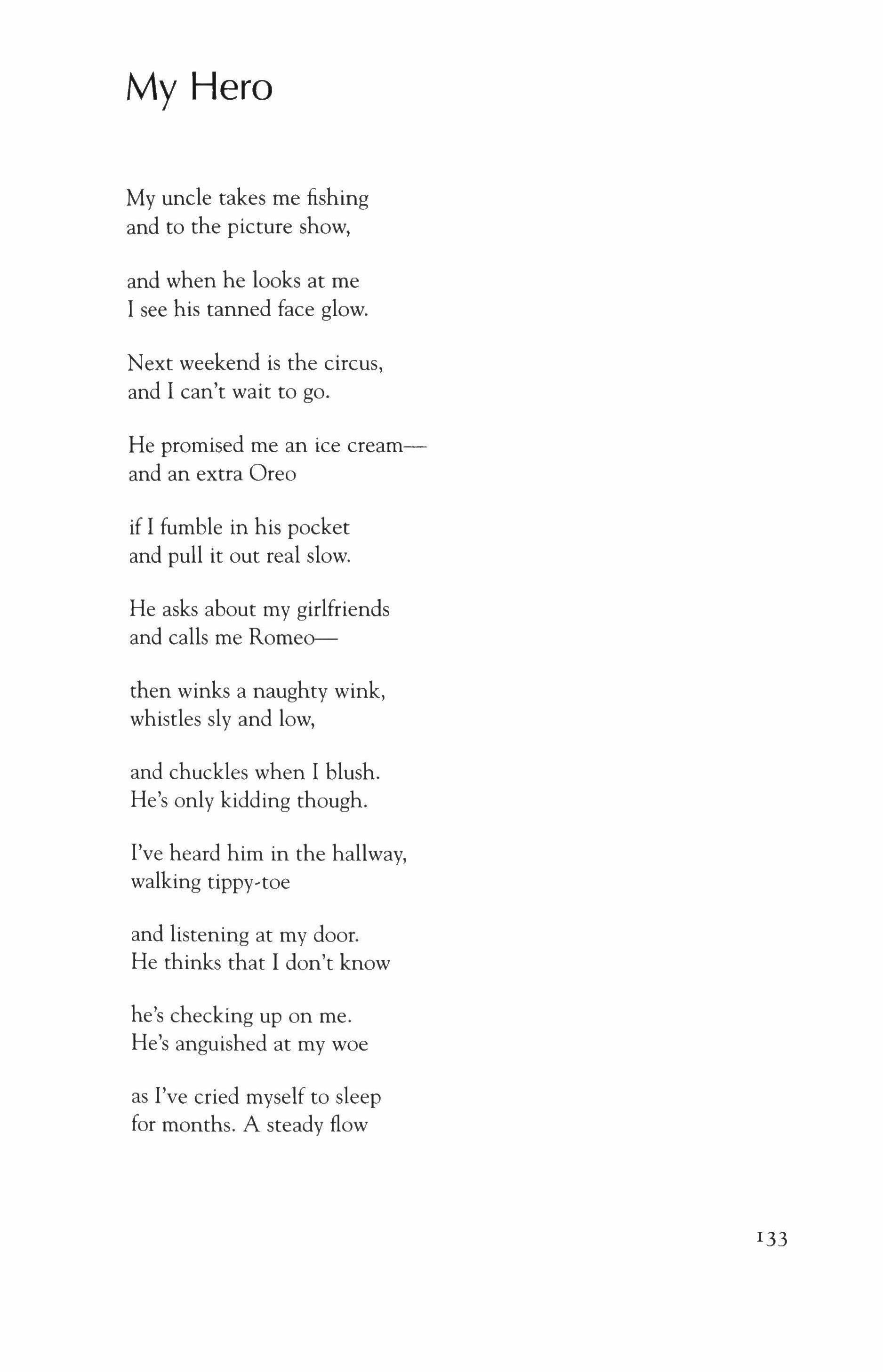
My uncle takes me fishing and to the picture show, and when he looks at me I see his tanned face glow.
Next weekend is the circus, and I can't wait to go.
He promised me an ice creamand an extra Oreo if! fumble in his pocket and pull it out real slow.
He asks about my girlfriends and calls me Romeo-
then winks a naughty wink, whistles sly and low, and chuckles when I blush. He's only kidding though.
I've heard him in the hallway, walking tippy-toe and listening at my door.
He thinks that I don't know
he's checking up on me.
He's anguished at my woe
as I've cried myself to sleep for months. A steady flow
133
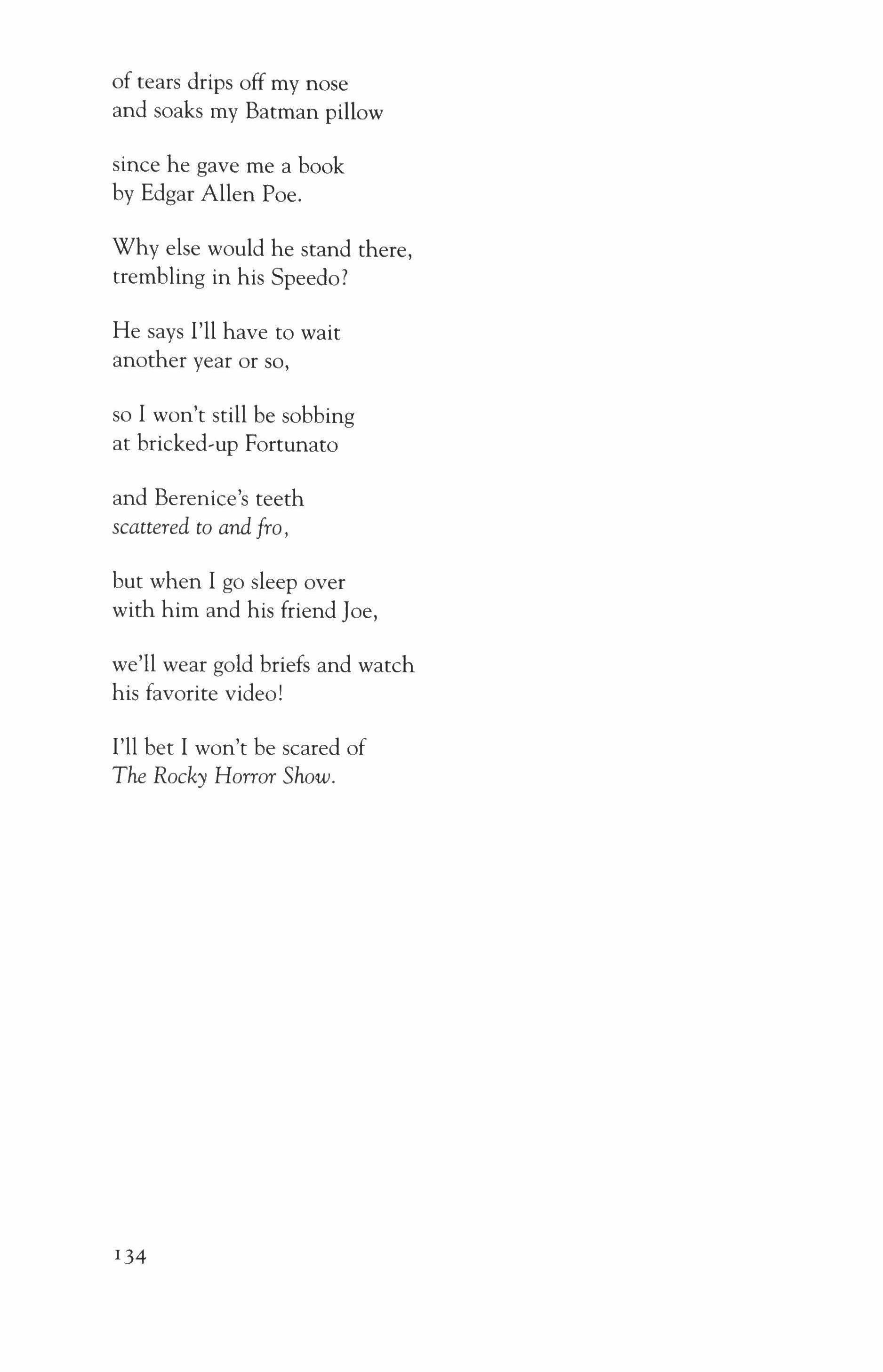
of tears drips off my nose and soaks my Batman pillow
since he gave me a book by Edgar Allen Poe.
Why else would he stand there, trembling in his Speedo?
He says I'll have to wait another year or so,
so I won't still be sobbing at bricked-up Fortunato and Berenice's teeth scattered to and fro,
but when I go sleep over with him and his friend Joe,
we'll wear gold briefs and watch his favorite video!
I'll bet I won't be scared of The Rocky Horror Show.
134
The County Fair
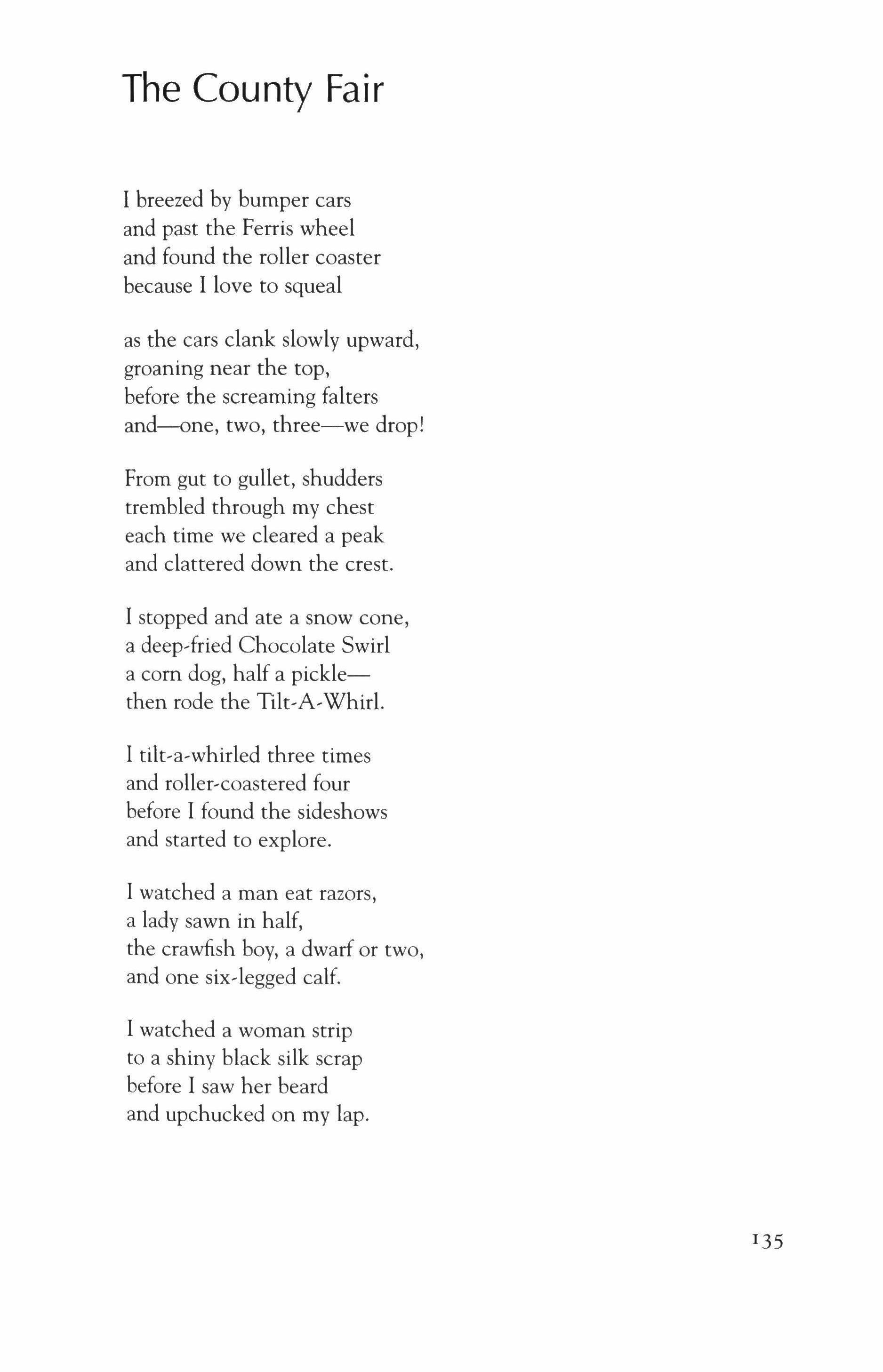
I breezed by bumper cars and past the Ferris wheel and found the roller coaster because I love to squeal
as the cars clank slowly upward, groaning near the top, before the screaming falters and-one, two, three-we drop!
From gut to gullet, shudders trembled through my chest each time we cleared a peak and clattered down the crest.
I stopped and ate a snow cone, a deep-fried Chocolate Swirl a com dog, half a picklethen rode the Tilt�A�Whirl.
I tilt-a-whirled three times and roller-coastered four before I found the sideshows and started to explore.
I watched a man eat razors, a lady sawn in half, the crawfish boy, a dwarf or two, and one six-legged calf.
I watched a woman strip to a shiny black silk scrap before I saw her beard and upchucked on my lap.
135
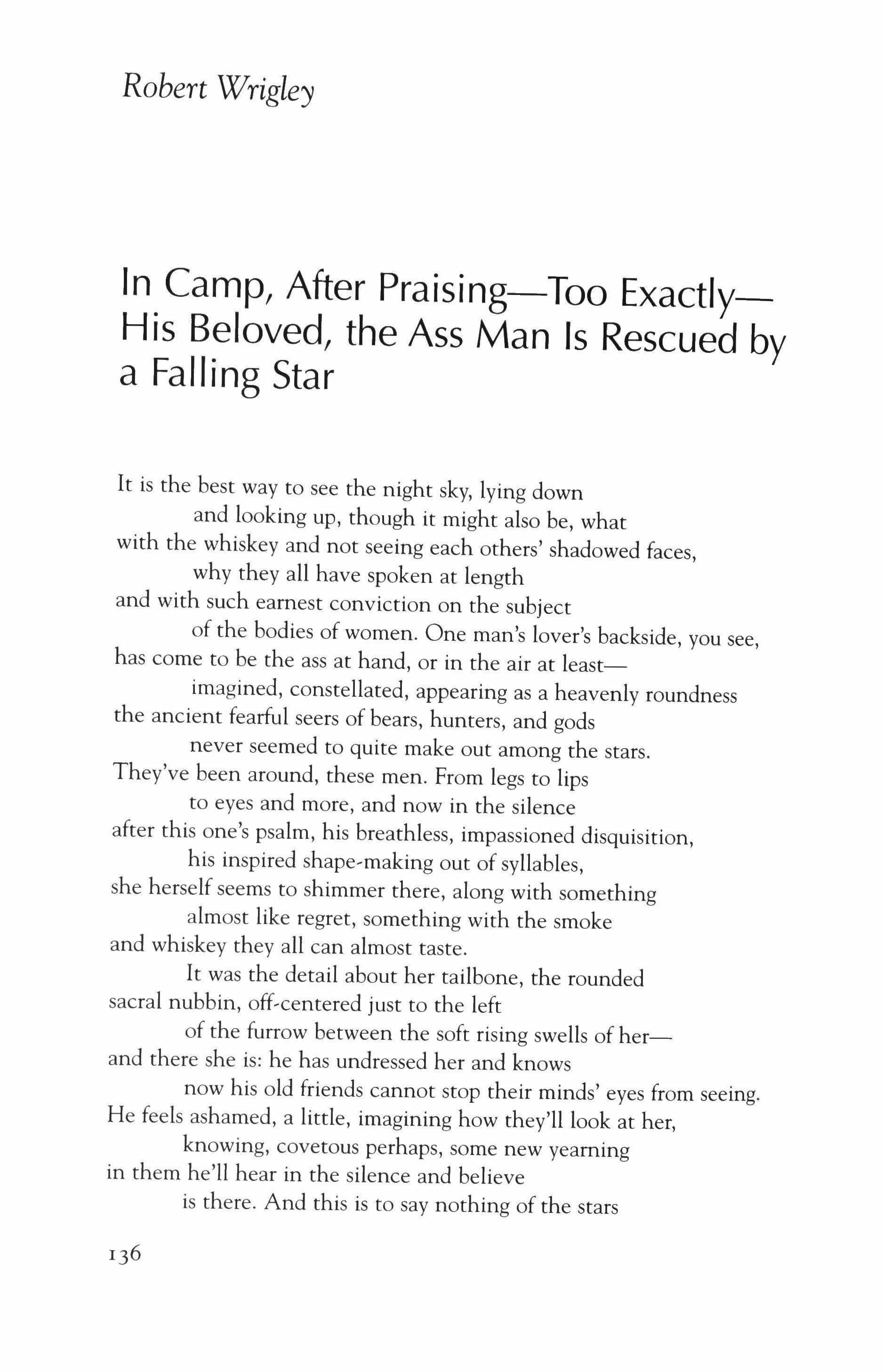
In Camp, After Praising-Too Exactly H is Beloved, the Ass Man Is Rescued by a
Falling Star
It is the best way to see the night sky, lying down and looking up, though it might also be, what with the whiskey and not seeing each others' shadowed faces, why they all have spoken at length and with such earnest conviction on the subject of the bodies of women. One man's lover's backside, you see, has come to be the ass at hand, or in the air at leastimagined, constellated, appearing as a heavenly roundness the ancient fearful seers of bears, hunters, and gods never seemed to quite make out among the stars. They've been around, these men. From legs to lips to eyes and more, and now in the silence after this one's psalm, his breathless, impassioned disquisition, his inspired shape-making out of syllables, she herself seems to shimmer there, along with something almost like regret, something with the smoke and whiskey they all can almost taste.
It was the detail about her tailbone, the rounded sacral nubbin, off,centered just to the left of the furrow between the soft rising swells of herand there she is: he has undressed her and knows now his old friends cannot stop their minds' eyes from seeing. He feels ashamed, a little, imagining how they'll look at her, knowing, covetous perhaps, some new yearning in them he'll hear in the silence and believe is there. And this is to say nothing of the stars
Robert Wrigley
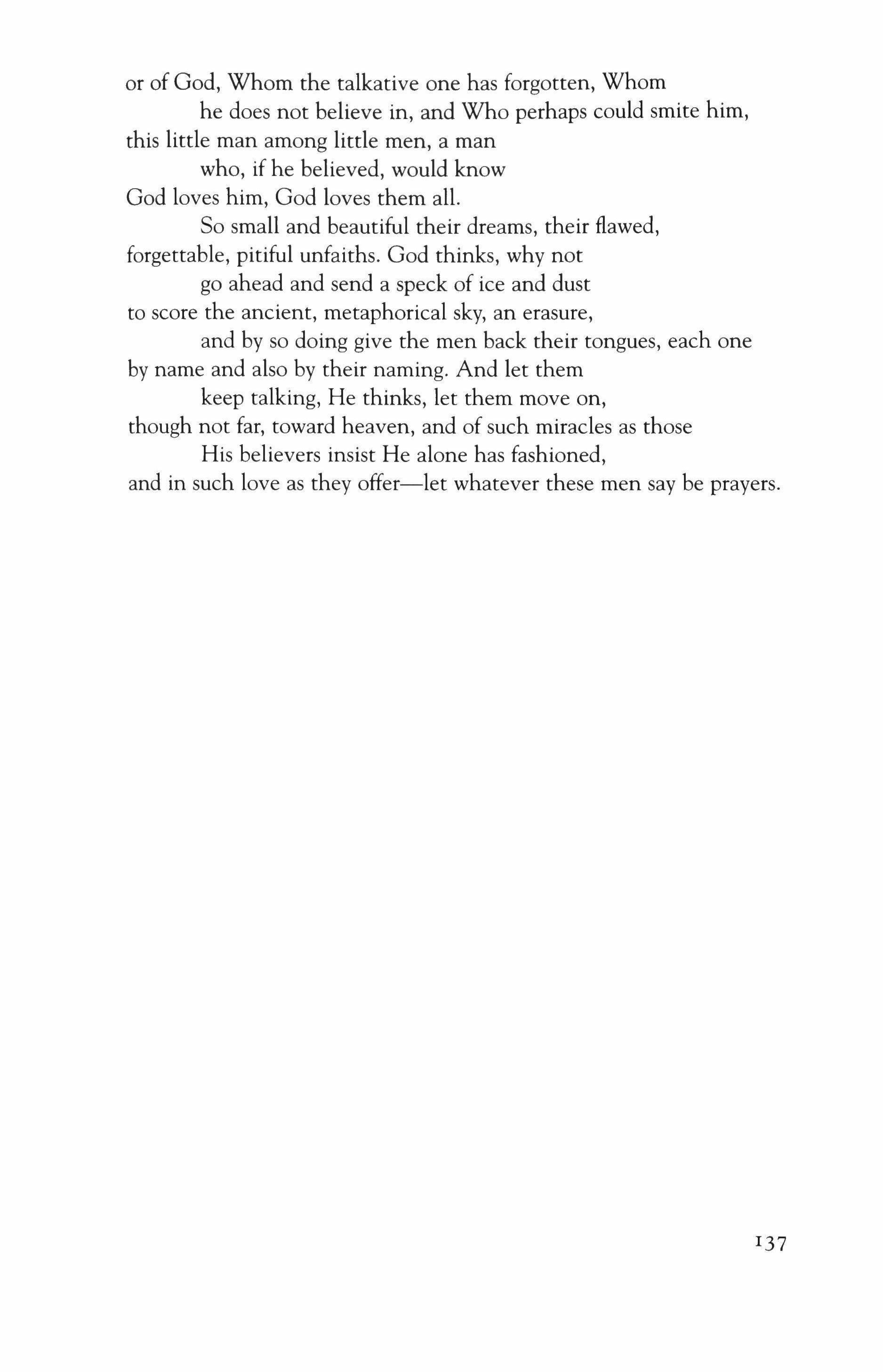
or of God, Whom the talkative one has forgotten, Whom he does not believe in, and Who perhaps could smite him, this little man among little men, a man who, if he believed, would know God loves him, God loves them all.
So small and beautiful their dreams, their flawed, forgettable, pitiful unfaiths. God thinks, why not go ahead and send a speck of ice and dust to score the ancient, metaphorical sky, an erasure, and by so doing give the men back their tongues, each one by name and also by their naming. And let them keep talking, He thinks, let them move on, though not far, toward heaven, and of such miracles as those His believers insist He alone has fashioned, and in such love as they offer-let whatever these men say be prayers.
137
Polina Barskova
Translated from the Russian by Luba Galburt
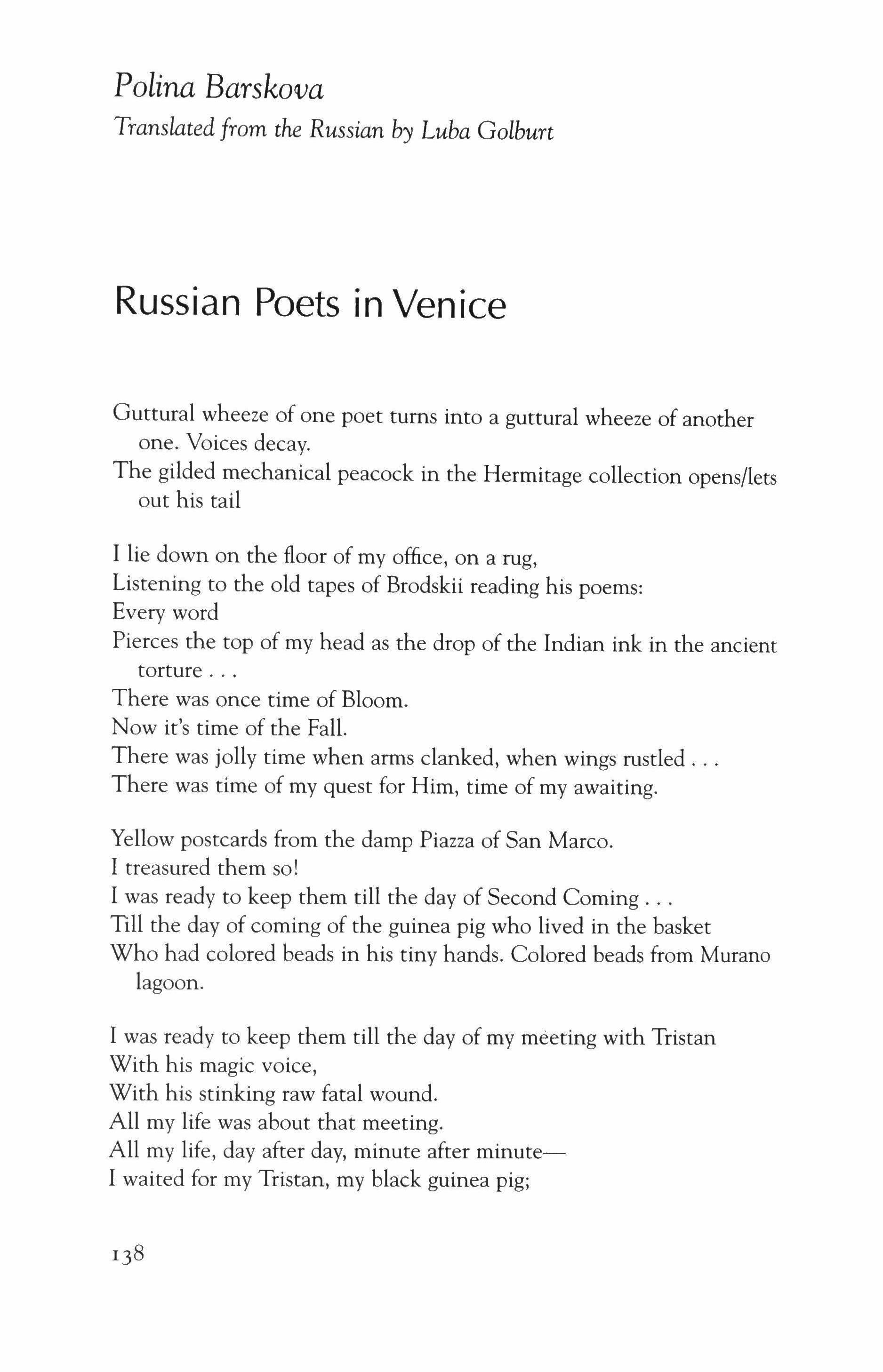
Russian Poets in Venice
Guttural wheeze of one poet turns into a guttural wheeze of another one. Voices decay. The gilded mechanical peacock in the Hermitage collection opens/lets out his tail
I lie down on the floor of my office, on a rug, Listening to the old tapes of Brodskii reading his poems: Every word Pierces the top of my head as the drop of the Indian ink in the ancient torture
There was once time of Bloom. Now it's time of the Fall.
There was jolly time when arms clanked, when wings rustled There was time of my quest for Him, time of my awaiting.
Yellow postcards from the damp Piazza of San Marco. I treasured them so!
I was ready to keep them till the day of Second Coming Till the day of coming of the guinea pig who lived in the basket Who had colored beads in his tiny hands. Colored beads from Murano lagoon.
I was ready to keep them till the day of my meeting with Tristan With his magic voice, With his stinking raw fatal wound. All my life was about that meeting.
All my life, day after day, minute after minuteI waited for my Tristan, my black guinea pig;
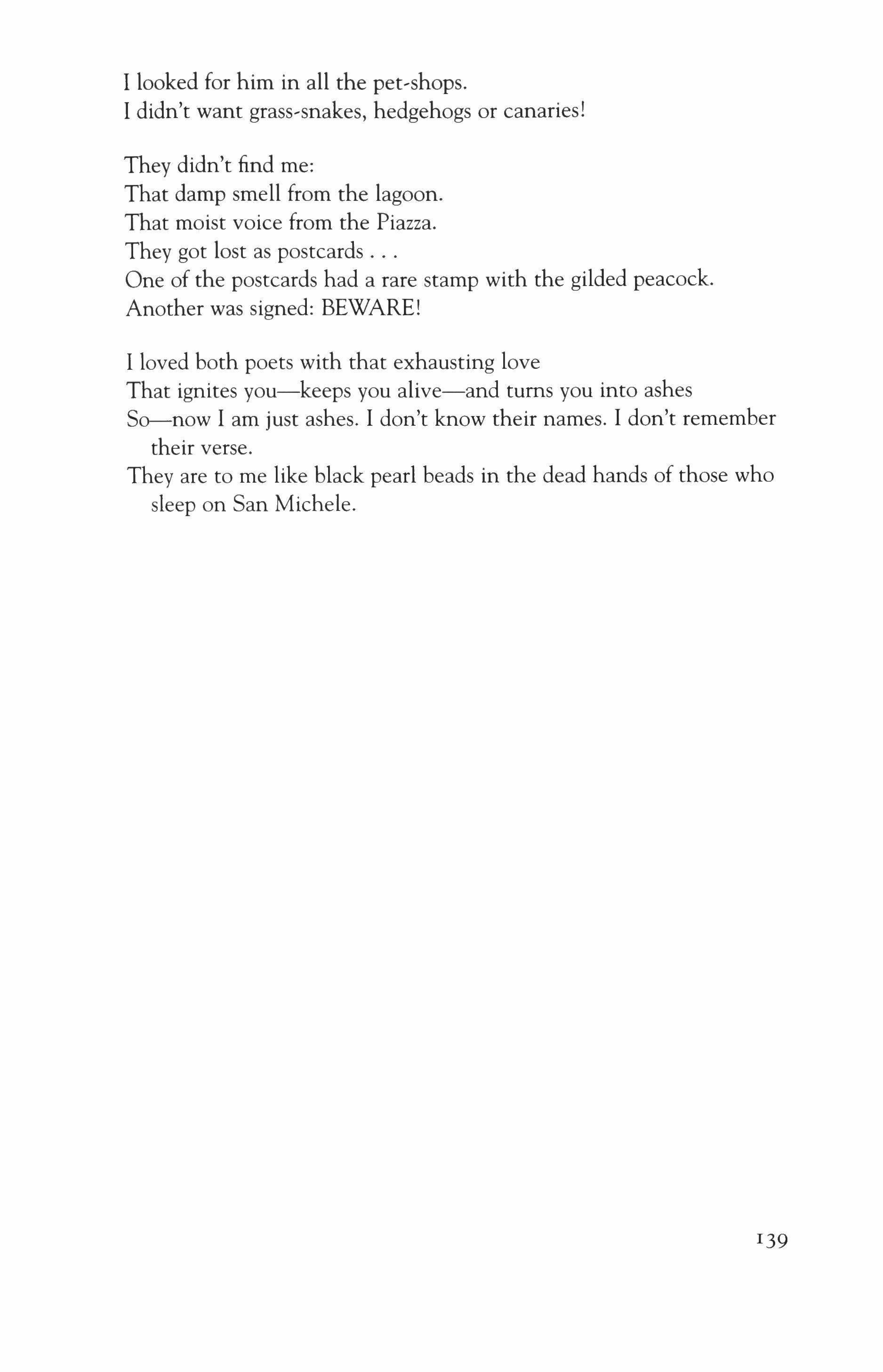
I looked for him in all the pet-shops.
I didn't want grass-snakes, hedgehogs or canaries!
They didn't find me:
That damp smell from the lagoon. That moist voice from the Piazza.
They got lost as postcards
One of the postcards had a rare stamp with the gilded peacock. Another was signed: BEWARE!
I loved both poets with that exhausting love
That ignites you-keeps you alive-and turns you into ashes
So--now I am just ashes. I don't know their names. I don't remember their verse.
They are to me like black pearl beads in the dead hands of those who sleep on San Michele.
139
Flipping through Nabokov's Speak, Memory
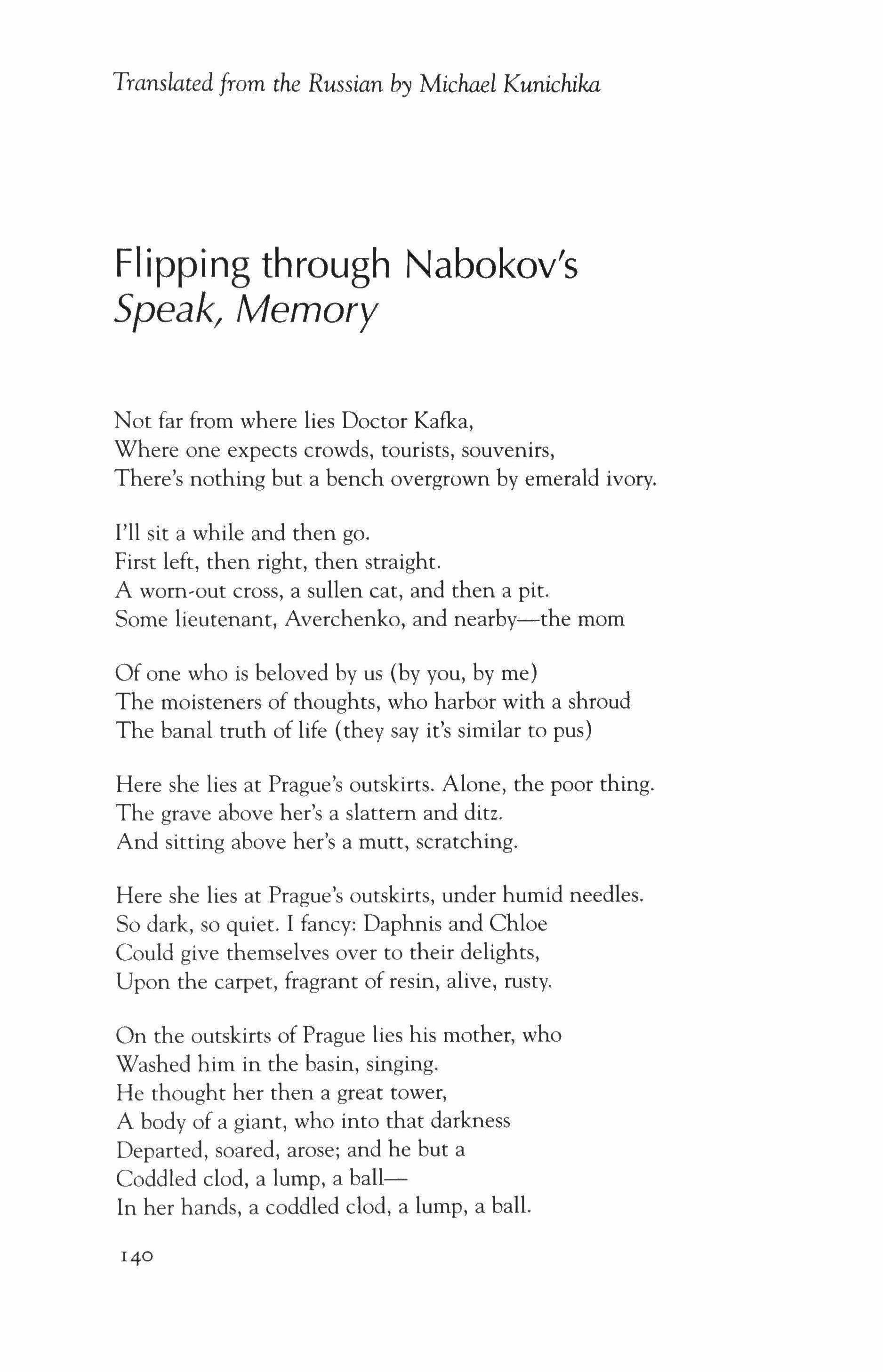
Not far from where lies Doctor Kafka, Where one expects crowds, tourists, souvenirs, There's nothing but a bench overgrown by emerald ivory.
I'll sit a while and then go. First left, then right, then straight. A worn-out cross, a sullen cat, and then a pit. Some lieutenant, Averchenko, and nearby-the mom
Of one who is beloved by us (by you, by me)
The moisteners of thoughts, who harbor with a shroud The banal truth of life (they say it's similar to pus)
Here she lies at Prague's outskirts. Alone, the poor thing. The grave above her's a slattern and ditz. And sitting above her's a mutt, scratching.
Here she lies at Prague's outskirts, under humid needles. So dark, so quiet. I fancy: Daphnis and Chloe Could give themselves over to their delights, Upon the carpet, fragrant of resin, alive, rusty.
On the outskirts of Prague lies his mother, who Washed him in the basin, singing. He thought her then a great tower, A body of a giant, who into that darkness Departed, soared, arose; and he but a Coddled clod, a lump, a ballIn her hands, a coddled clod, a lump, a ball.
Translated from the Russian by Michael Kunichika

From her hand wafted warmth and home, At that time, when nowhere could smell of home
For him. Yet even this warmth and charm, The transparence of her, the hypochondria, French r's, Like any form of love, finally, bore him. Nothing remains.
She was dying alone-he couldn't make it, To go would have been too much, in poor taste.
He remained at his writing table.
The old cat darkly dug around the bits left her. A bird's round lifeless eye watched him, And they told him his mother was dead in Prague.
Grief. Grief. Grief. Naked, he's stretched out upon a sheet
Yet she, like a tower, laughs in the heights.
The body of pearls, the body of stars, the body of snow, Protects him from the words "strangeness" and "terror."
As if it is a window soiled by November rain, As if you see the birds, the snow, the berries, And not my melancholic filthy death.
Kim Addonizio

Book Burning
On top of all the copies of Lolita tossed into a parking lot bonfire somewhere in Texas by Bible lovers-how ironic is that, since "bible" means "book," not that anyone who takes the Bible literally is likely to comprehend ironyalong with Humbert Humbert aka Mesmer Mesmer and Dolores aka Lo aka Lola Haze cruising through the American landscape in ravishing sentences, along with Henry Miller and all his lovely whores, not to mention the delicious meals he cadged off his friends while he was broke in Paris, along with Allen Ginsberg ascending chanting over FIRST BAPTIST GOD IS LOVE BINGO SUPPER SUNDAY in a column of pink smoke to the tinkling of little Tibetan bells, and with a bunch of other excellent books some group of spiritually impaired Visigoths deemed inappropriate and corrupt, there goes the slim paperback my friend Susan and I relegated to her fireplace last night after drinking too much Sancerre and saying things like God I hate this guy's poems and lust a single line of Akhmatova is worth his entire smug and trivial oeuvre and Do you believe this poser got a Guggenheim, until rip she'd tom the cover off and tear there went two pages at once and crumple it all burned pretty quickly until we were standing there gleeful and slightly shocked by what we'd done

and now this morning I'm thinking of how the ashes of this guy's smarmy little imagination are floating around up there in the ether of magnificent expression with Nabokov et. al., and the bastard's probably thinking that he deserves to have been sacrificed on the pyre of our ignorance and ego, and is right now looking down and laughing, pitying us and forgiving us our folly.
Lawrence Raab

Faithless
The tide is full, the moon lies fair Upon the straits
Matthew Arnold
By mid-july I'm tired of the mountains. I want to be near the sea, walk beside it for an hour or two, watch it cleaning the wounds of the shore. Such persistence-though we know there isn't a plan, just this going back over the same places, revising everything out.
"Is there a way to win?"
Jane Greer asks Robert Mitchum in Out of the Past. "Well," he says, "There's a way to lose more slowly." He knows he shouldn't trust her, and he doesn't care. Ah, Matthew Arnold, our lovers are more melancholy than yours, more desperate, more faithless.
"You can't help anything you do," Mitchum tells her at the end. Which is what he might have told himself. But nobody ever sees how far the things we shouldn't feel can take us. I just want to walk along the shore for an hour, watch the waves rearranging whatever they can. I like the way the sea encourages me
144

to think about the past, as if I could leave it where it is: the moon on the water, the stars that gleam and are gone.
145
Nothing There
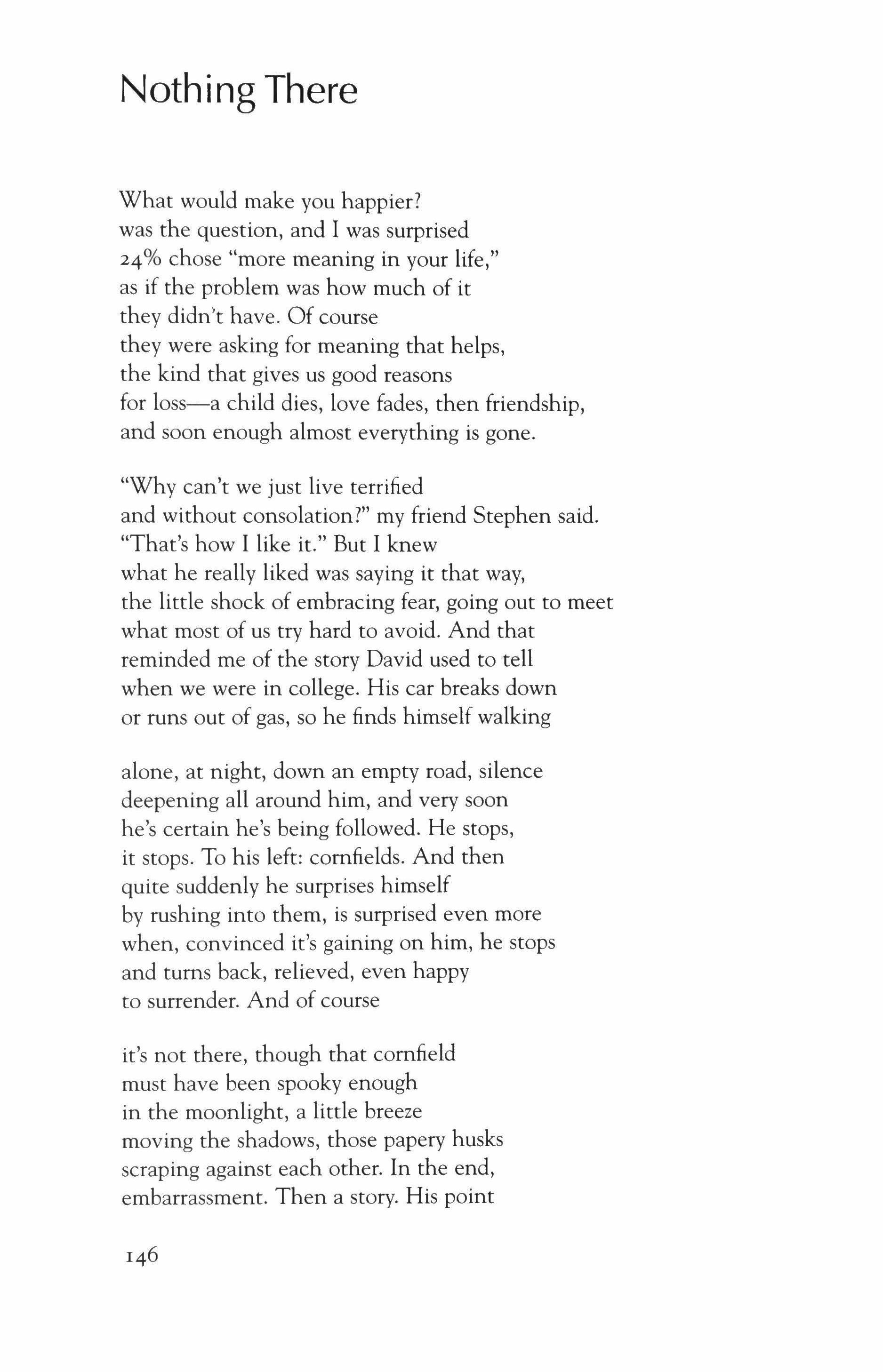
What would make you happier?
was the question, and I was surprised 24% chose "more meaning in your life," as if the problem was how much of it they didn't have. Of course they were asking for meaning that helps, the kind that gives us good reasons for loss-a child dies, love fades, then friendship, and soon enough almost everything is gone.
"Why can't we just live terrified and without consolation?" my friend Stephen said. "That's how I like it." But I knew what he really liked was saying it that way, the little shock of embracing fear, going out to meet what most of us try hard to avoid. And that reminded me of the story David used to tell when we were in college. His car breaks down or runs out of gas, so he finds himself walking
alone, at night, down an empty road, silence deepening all around him, and very soon he's certain he's being followed. He stops, it stops. To his left: cornfields. And then quite suddenly he surprises himself by rushing into them, is surprised even more when, convinced it's gaining on him, he stops and turns back, relieved, even happy to surrender. And of course
it's not there, though that cornfield must have been spooky enough in the moonlight, a little breeze moving the shadows, those papery husks scraping against each other. In the end, embarrassment. Then a story. His point
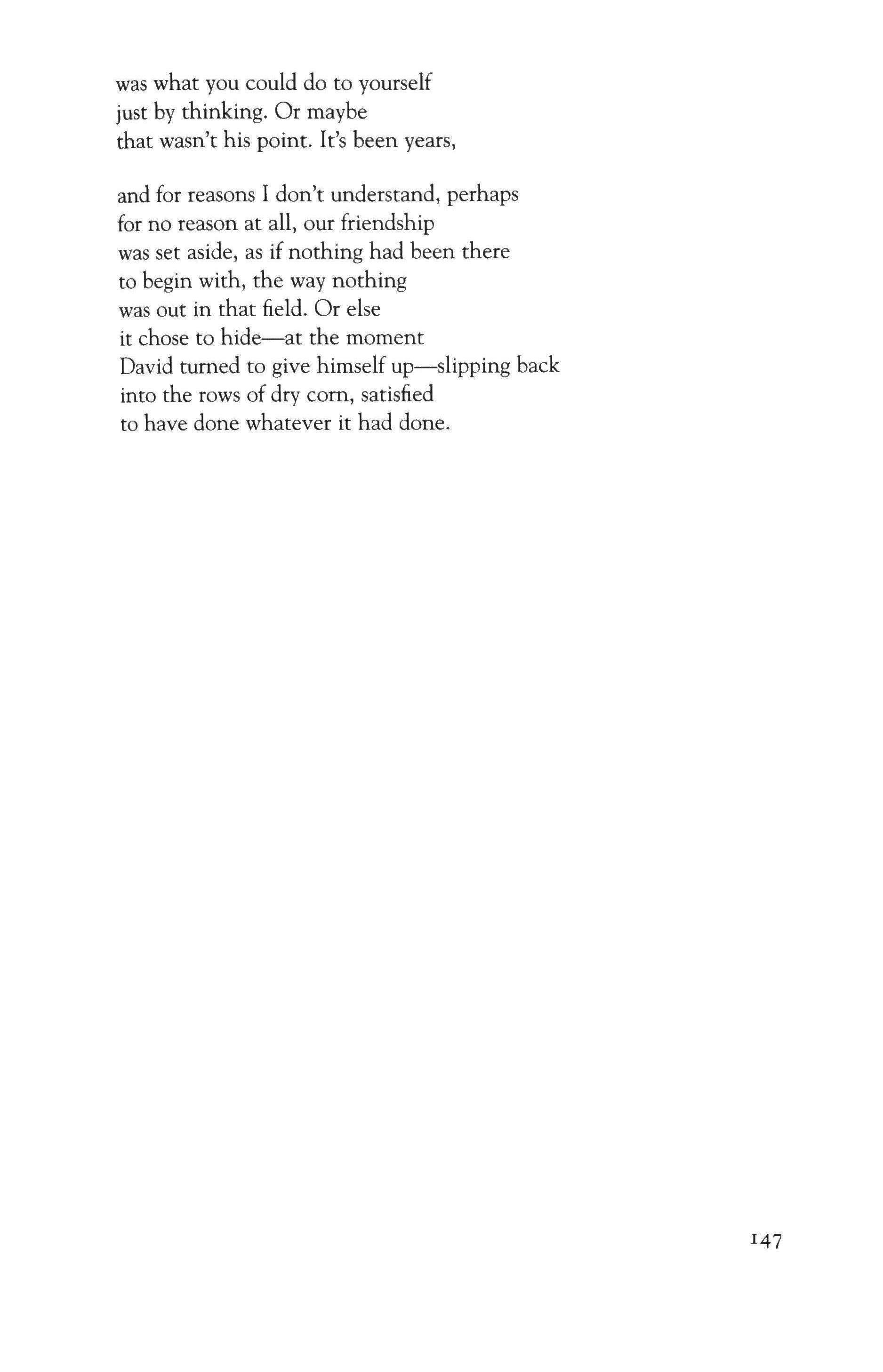
was what you could do to yourself just by thinking. Or maybe that wasn't his point. It's been years, and for reasons I don't understand, perhaps for no reason at all, our friendship was set aside, as if nothing had been there to begin with, the way nothing was out in that field. Or else it chose to hide-at the moment David turned to give himself up-slipping back into the rows of dry com, satisfied to have done whatever it had done.
147
Campbell McGrath

Dim Sum
If language is a circulatory system of symbols what are images but wounds where the blood coagulates as the world's infection rushes in?
If consciousness is the subject of the lyric poem, beads of a golden abacus calculating a path through time, how do you stop the train without derailing it?
If the self is a type of infinite regression are not our attempts to escape it, however ingenious, doomed to fail?
Why prefer the cloth of chance to the garment of identity? Why pay obeisance to the tyranny of the random?
To discover supra-human creativity one need only consider a cloud, a flower, the taste of honey, the sound of constellations turning.
Nature dwarfs our capacities with contemptuous ease, as do the Olympian gods and perhaps the Alpha Centaurians gazing down at us with pity and disgust, but if you were to offer me the fruit of their radiant and perfected art I would say, so what?
Of course it is sublime, of course it is ineffable-of course they're better than us, bathed as they are in rays of harmonic contentment!
Of course we embody oppressive ideologies, of course we are flawedthat such easily-confused, thinly-furred, god-haunted, greed-driven, blood-dazed animals dare to risk the task of creation is itself the justification of the act.
Now, what were those dishes Li-Young ordered-chicken feet, tripe, whole baby octopus in curry sauce. Delicious!
And for dessert, little cubes of gelatin flavored like coconut, dry and woody, and like mango, syrupy and floral, doused in condensed milk.
We drink five or six pots of tea and hover perhaps two feet above the
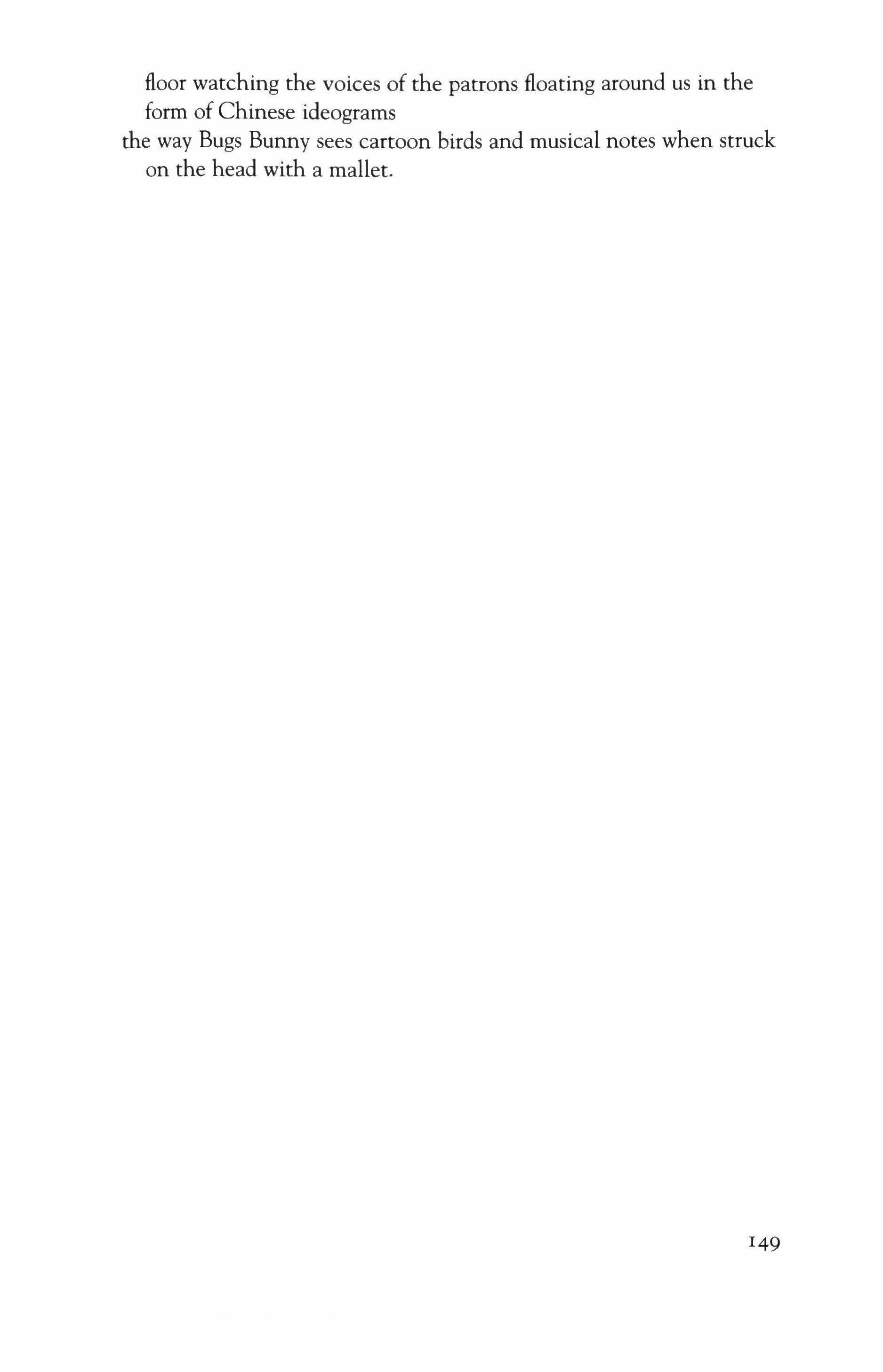
floor watching the voices of the patrons floating around us in the form of Chinese ideograms
the way Bugs Bunny sees cartoon birds and musical notes when struck on the head with a mallet.
149
Justice
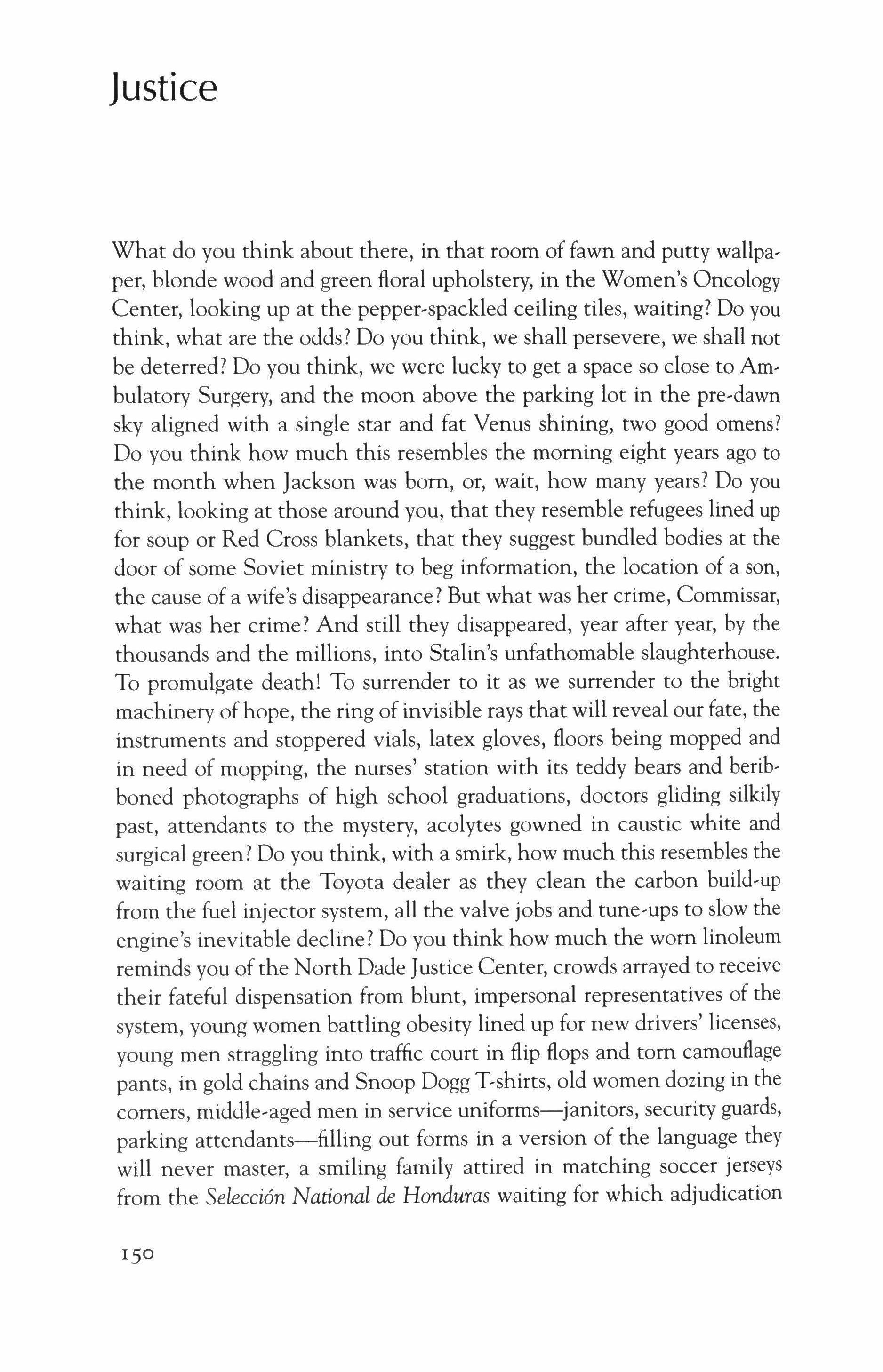
What do you think about there, in that room of fawn and putty wallpaper, blonde wood and green floral upholstery, in the Women's Oncology Center, looking up at the pepper-spackled ceiling tiles, waiting? Do you think, what are the odds? Do you think, we shall persevere, we shall not be deterred? Do you think, we were lucky to get a space so close to Ambulatory Surgery, and the moon above the parking lot in the pre-dawn sky aligned with a single star and fat Venus shining, two good omens? Do you think how much this resembles the morning eight years ago to the month when Jackson was born, or, wait, how many years? Do you think, looking at those around you, that they resemble refugees lined up for soup or Red Cross blankets, that they suggest bundled bodies at the door of some Soviet ministry to beg information, the location of a son, the cause of a wife's disappearance? But what was her crime, Commissar, what was her crime? And still they disappeared, year after year, by the thousands and the millions, into Stalin's unfathomable slaughterhouse. To promulgate death! To surrender to it as we surrender to the bright machinery ofhope, the ring of invisible rays that will reveal our fate, the instruments and stoppered vials, latex gloves, floors being mopped and in need of mopping, the nurses' station with its teddy bears and beribboned photographs of high school graduations, doctors gliding silkily past, attendants to the mystery, acolytes gowned in caustic white and surgical green? Do you think, with a smirk, how much this resembles the waiting room at the Toyota dealer as they clean the carbon build-up from the fuel injector system, all the valve jobs and tune-ups to slow the engine's inevitable decline? Do you think how much the worn linoleum reminds you of the North Dade Justice Center, crowds arrayed to receive their fateful dispensation from blunt, impersonal representatives of the system, young women battling obesity lined up for new drivers' licenses, young men straggling into traffic court in flip flops and tom camouflage pants, in gold chains and Snoop Dogg 'Tshirts, old women dozing in the comers, middle-aged men in service uniforms-janitors, security guards, parking attendants-filling out forms in a version of the language they will never master, a smiling family attired in matching soccer jerseys from the Selecci6n National de Honduras waiting for which adjudication
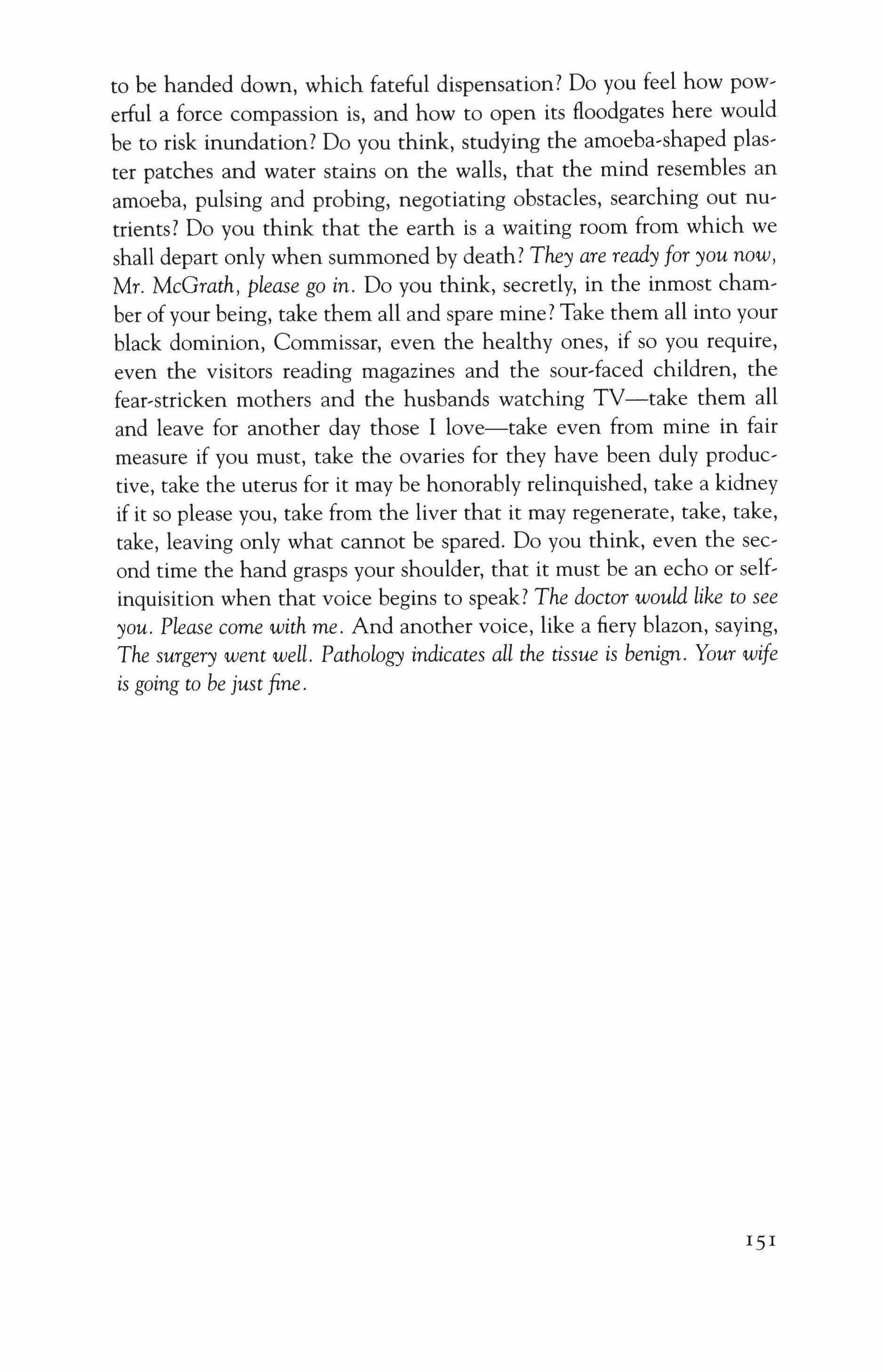
to be handed down, which fateful dispensation? Do you feel how powerful a force compassion is, and how to open its floodgates here would be to risk inundation? Do you think, studying the amoeba-shaped plaster patches and water stains on the walls, that the mind resembles an amoeba, pulsing and probing, negotiating obstacles, searching out nutrients? Do you think that the earth is a waiting room from which we shall depart only when summoned by death? They are ready for you now, Mr. McGrath, please go in. Do you think, secretly, in the inmost chamber of your being, take them all and spare mine? Take them all into your black dominion, Commissar, even the healthy ones, if so you require, even the visitors reading magazines and the sour-faced children, the fear-stricken mothers and the husbands watching TV-take them all and leave for another day those I love-take even from mine in fair measure if you must, take the ovaries for they have been duly productive, take the uterus for it may be honorably relinquished, take a kidney if it so please you, take from the liver that it may regenerate, take, take, take, leaving only what cannot be spared. Do you think, even the secand time the hand grasps your shoulder, that it must be an echo or selfinquisition when that voice begins to speak? The doctor would like to see you. Please come with me. And another voice, like a fiery blazon, saying, The surgery went well. Pathology indicates all the tissue is benign. Your wife is going to be just fine.
Daniel Borzutzky
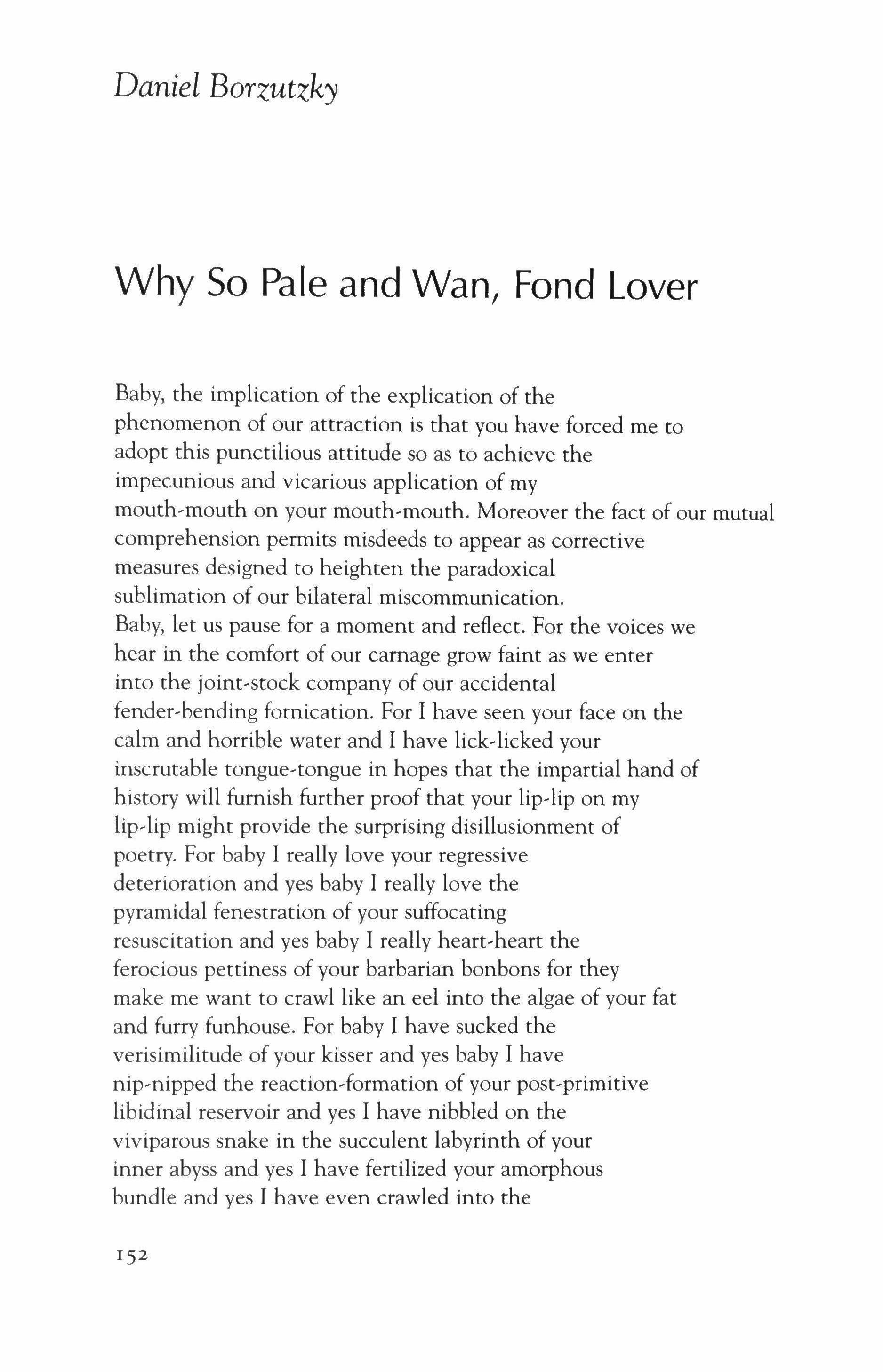
Why So Pale and Wan, Fond Lover
Baby, the implication of the explication of the phenomenon of our attraction is that you have forced me to adopt this punctilious attitude so as to achieve the impecunious and vicarious application of my mouth-mouth on your mouth-mouth. Moreover the fact of our mutual comprehension permits misdeeds to appear as corrective measures designed to heighten the paradoxical sublimation of our bilateral miscommunication. Baby, let us pause for a moment and reflect. For the voices we hear in the comfort of our carnage grow faint as we enter into the joint-stock company of our accidental fender-bending fornication. For I have seen your face on the calm and horrible water and I have lick-licked your inscrutable tongue-tongue in hopes that the impartial hand of history will furnish further proof that your lip-lip on my lip-lip might provide the surprising disillusionment of poetry. For baby I really love your regressive deterioration and yes baby I really love the pyramidal fenestration of your suffocating resuscitation and yes baby I really heart-heart the ferocious pettiness of your barbarian bonbons for they make me want to crawl like an eel into the algae of your fat and furry funhouse. For baby I have sucked the verisimilitude of your kisser and yes baby I have nip-nipped the reaction-formation of your post-primitive libidinal reservoir and yes I have nibbled on the viviparous snake in the succulent labyrinth of your inner abyss and yes I have fertilized your amorphous bundle and yes I have even crawled into the
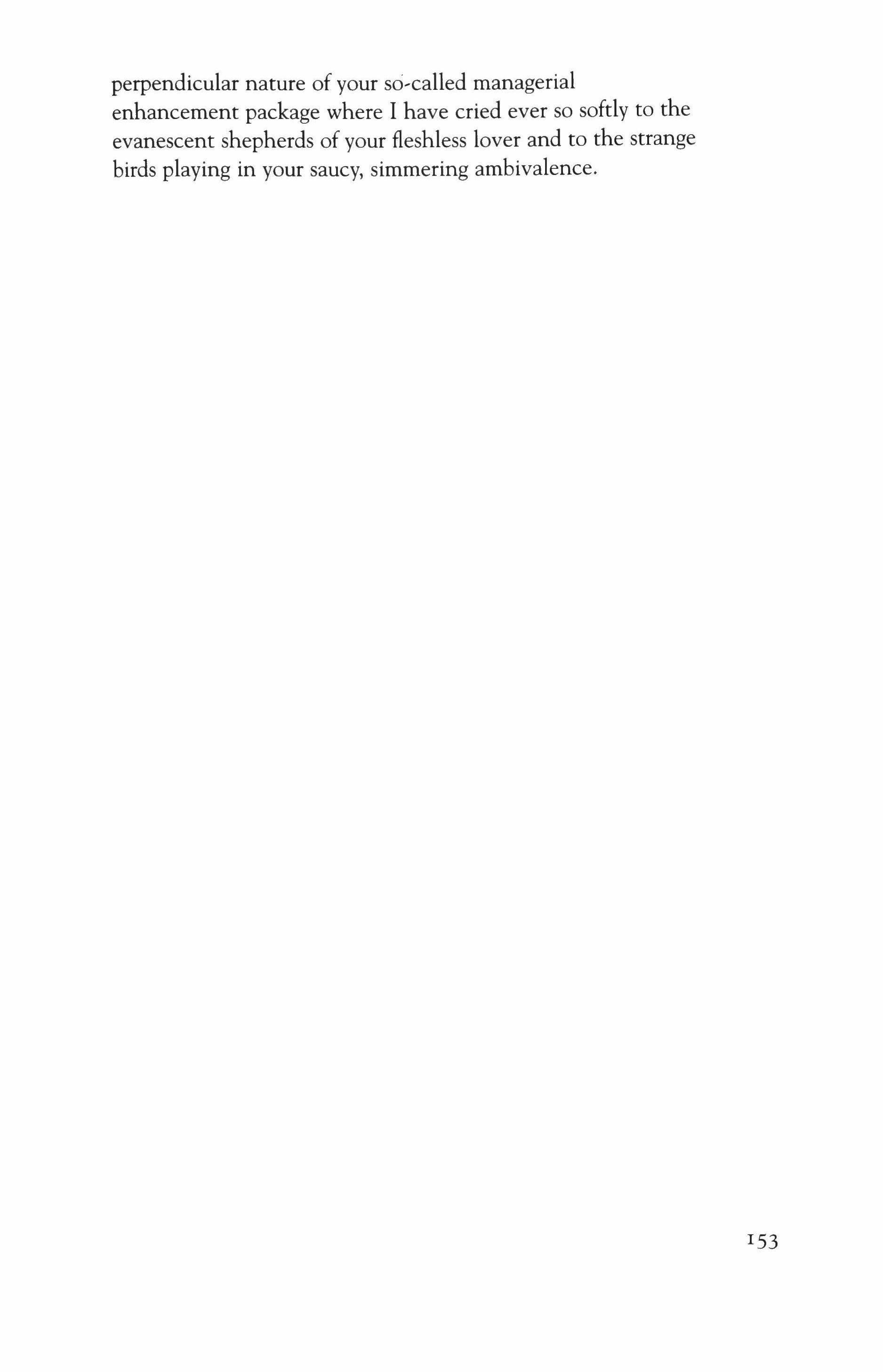
perpendicular nature of your so'called managerial enhancement package where I have cried ever so softly to the evanescent shepherds of your fleshless lover and to the strange birds playing in your saucy, simmering ambivalence.
153

The Heart Is a Lonely Perineum
For Anna and Jimmy
And if it is true that all I can do is float through these tunnels of dust and pain in which capital swims in the arms of mercilessness, then I will put you in the coffin I wear around my waist and bind you with a rose to the small triangular bone at the end of my spinal column where the you that is not you shall meet the you that might be you and together we will form a family who will flourish inside this golden abyss whose entryway is guarded by a gaggle of slithering creditors with pee-pees for guns and Chinese porcelain for eyeballs. For who is to say that the air we breathe is anything more than a secret code both capricious in structure and marketable in the substance of its sad and tender humility. I was teaching the Laotians about the existential implications of the conditional voice when a man came on the loudspeaker and said we were all a bunch of Mexican widows with secret Jewish husbands in our titties. A woman in a velvet dress jumped out of the rosemary bush and showed us how to hide those we have murdered in our bodies. I did not know the blind were invisible to themselves until I chopped up an old harpy, shoved her into my underpants, and chuckled as she struggled to put herself back together. Then we hopped into my Hybrid Honda Civic and sped across the border to the all-you-can-eat rotisserie chicken shack whose drive-thru window clerk is the Virgin Mary on whose lips you must tap three times before telling her there is a 154

handful of dust on her posterior vulva junction, at which point she will become all the women you should have kissed but didn't. This will come true, even if you don't believe it.
155
Carl Dennis

U nsent Letter from the Owner of Fifty-One Summer Street
Now that you've lived for a month
In your new house at 52 Summer, I thought it might do you good to know Why you still haven't met me, Your neighbor across the street, And why, if I can prevent it, you never will.
I'd like to begin with the solemn promise The developer made me that nothing Would ever be built on the spot Your house now fills completely. Nothing was to block my view of the hills That made me feel my life, constricted till then For reasons I'd rather not go into, Was open at last to possibility.
I want you to try to imagine the year I found in the hills my inspiration, And then the following year I wasted in court In a vain effort to stop construction. To listen to all the details so you understand How deeply your presence wounds me, Though of course I don't expect you To put your house on the market and vanish.
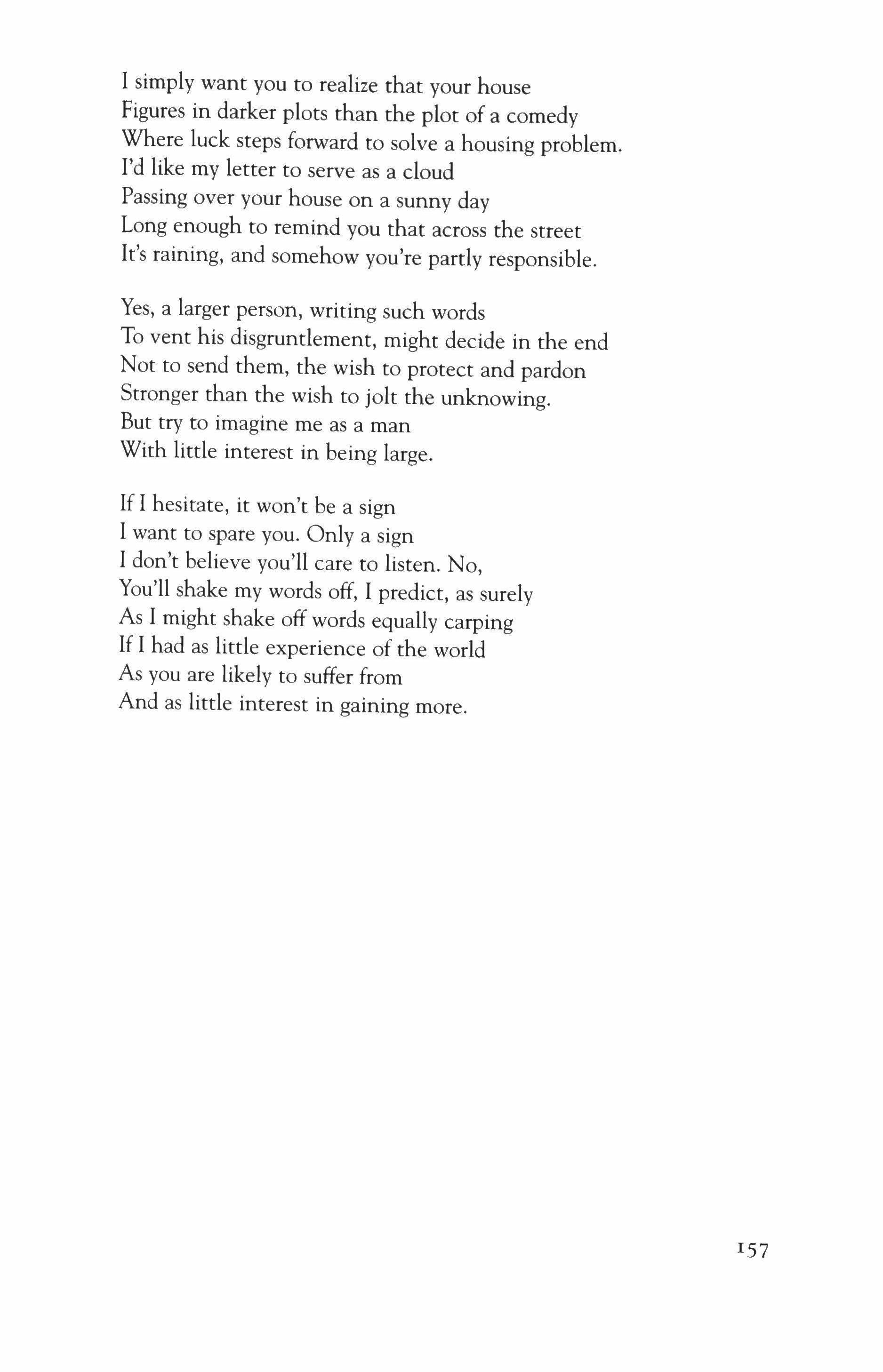
1 simply want you to realize that your house
Figures in darker plots than the plot of a comedy
Where luck steps forward to solve a housing problem. I'd like my letter to serve as a cloud
Passing over your house on a sunny day
Long enough to remind you that across the street It's raining, and somehow you're partly responsible.
Yes, a larger person, writing such words
To vent his disgruntlement, might decide in the end
Not to send them, the wish to protect and pardon
Stronger than the wish to jolt the unknowing.
But try to imagine me as a man
With little interest in being large.
If 1 hesitate, it won't be a sign I want to spare you. Only a sign I don't believe you'll care to listen. No, You'll shake my words off, I predict, as surely As I might shake off words equally carping If I had as little experience of the world
As you are likely to suffer from And as little interest in gaining more.
157
Gregory Djanikian
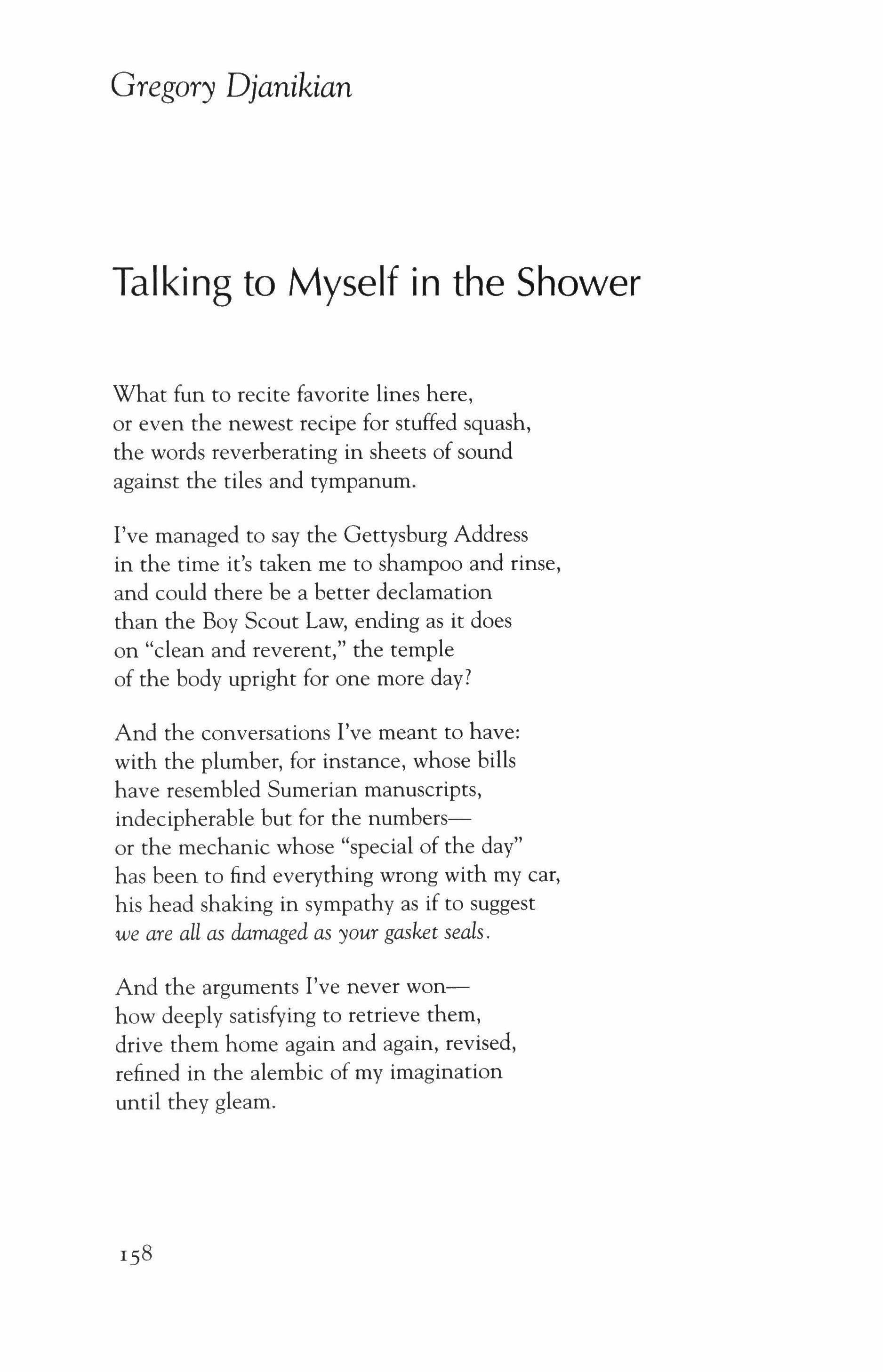
Talking to Myself in the Shower
What fun to recite favorite lines here, or even the newest recipe for stuffed squash, the words reverberating in sheets of sound against the tiles and tympanum.
I've managed to say the Gettysburg Address in the time it's taken me to shampoo and rinse, and could there be a better declamation than the Boy Scout Law, ending as it does on "clean and reverent," the temple of the body upright for one more day?
And the conversations I've meant to have: with the plumber, for instance, whose bills have resembled Sumerian manuscripts, indecipherable but for the numbersor the mechanic whose "special of the day" has been to find everything wrong with my car, his head shaking in sympathy as if to suggest we are all as damaged as your gasket seals.
And the arguments I've never wonhow deeply satisfying to retrieve them, drive them home again and again, revised, refined in the alembic of my imagination until they gleam.
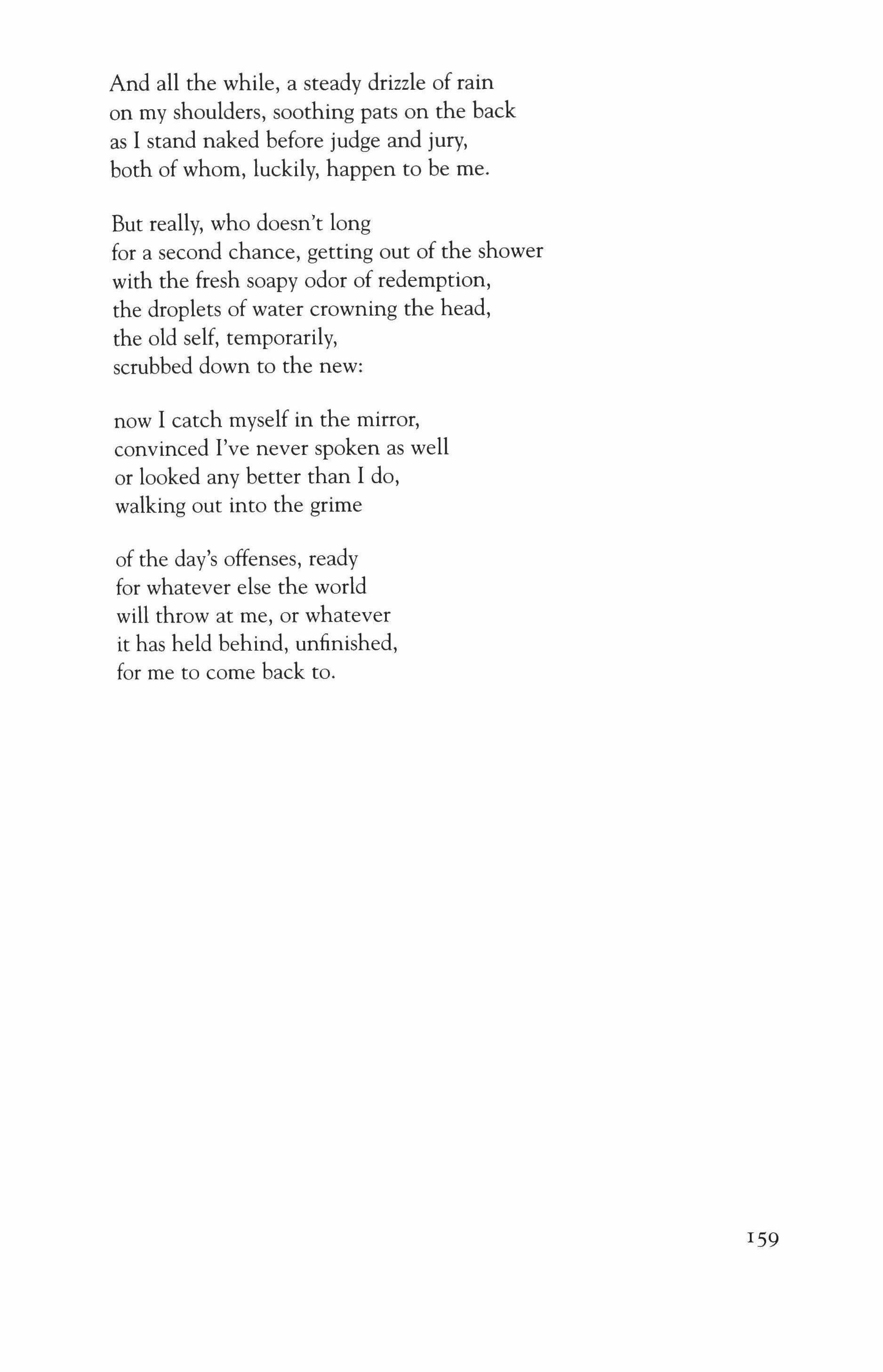
And all the while, a steady drizzle of rain on my shoulders, soothing pats on the back as I stand naked before judge and jury, both of whom, luckily, happen to be me.
But really, who doesn't long for a second chance, getting out of the shower with the fresh soapy odor of redemption, the droplets of water crowning the head, the old self, temporarily, scrubbed down to the new:
now I catch myself in the mirror, convinced I've never spoken as well or looked any better than I do, walking out into the grime
of the day's offenses, ready for whatever else the world will throw at me, or whatever it has held behind, unfinished, for me to come back to.
159
The Republic of Anesthesia
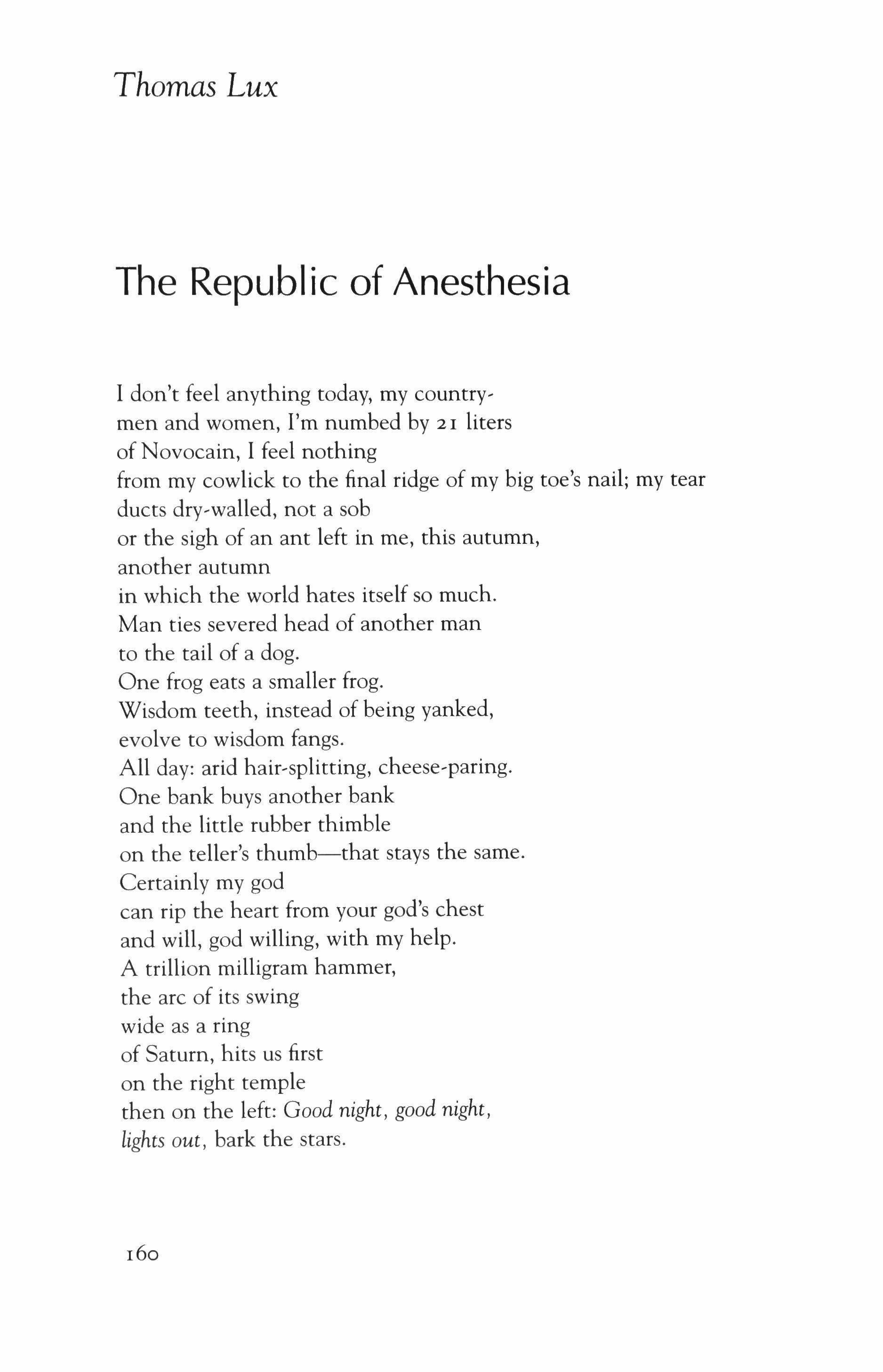
I don't feel anything today, my countrymen and women, I'm numbed by 21 liters of Novocain, I feel nothing from my cowlick to the final ridge of my big toe's nail; my tear ducts dry-walled, not a sob or the sigh of an ant left in me, this autumn, another autumn in which the world hates itself so much. Man ties severed head of another man to the tail of a dog. One frog eats a smaller frog. Wisdom teeth, instead of being yanked, evolve to wisdom fangs.
All day: arid hair-splitting, cheese-paring. One bank buys another bank and the little rubber thimble on the teller's thumb-that stays the same. Certainly my god can rip the heart from your god's chest and will, god willing, with my help. A trillion milligram hammer, the arc of its swing wide as a ring of Saturn, hits us first on the right temple then on the left: Good night, good night, lights out, bark the stars.
Thomas Lux
160
"Russia
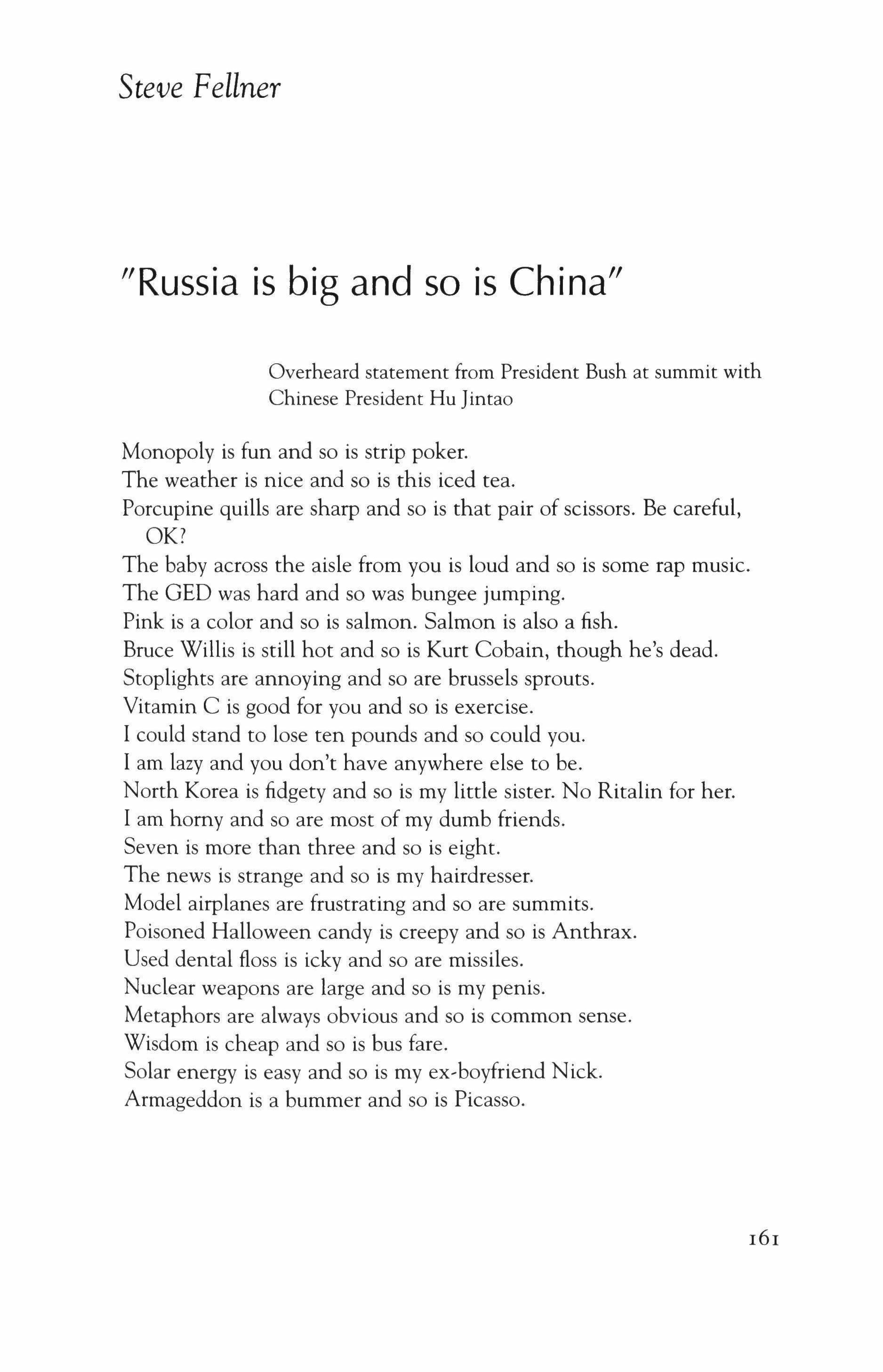
is big and so is China"
Overheard statement from President Bush at summit with Chinese President Hu Jintao
Monopoly is fun and so is strip poker.
The weather is nice and so is this iced tea.
Porcupine quills are sharp and so is that pair of scissors. Be careful, OK?
The baby across the aisle from you is loud and so is some rap music.
The GED was hard and so was bungee jumping.
Pink is a color and so is salmon. Salmon is also a fish.
Bruce Willis is still hot and so is Kurt Cobain, though he's dead.
Stoplights are annoying and so are brussels sprouts.
Vitamin C is good for you and so is exercise.
I could stand to lose ten pounds and so could you.
I am lazy and you don't have anywhere else to be.
North Korea is fidgety and so is my little sister. No Ritalin for her.
I am horny and so are most of my dumb friends.
Seven is more than three and so is eight.
The news is strange and so is my hairdresser.
Model airplanes are frustrating and so are summits.
Poisoned Halloween candy is creepy and so is Anthrax.
Used dental floss is icky and so are missiles.
Nuclear weapons are large and so is my penis.
Metaphors are always obvious and so is common sense.
Wisdom is cheap and so is bus fare.
Solar energy is easy and so is my ex-boyfriend Nick.
Armageddon is a bummer and so is Picasso.
Steve
Fellner
I Am Known As Walt Whitman
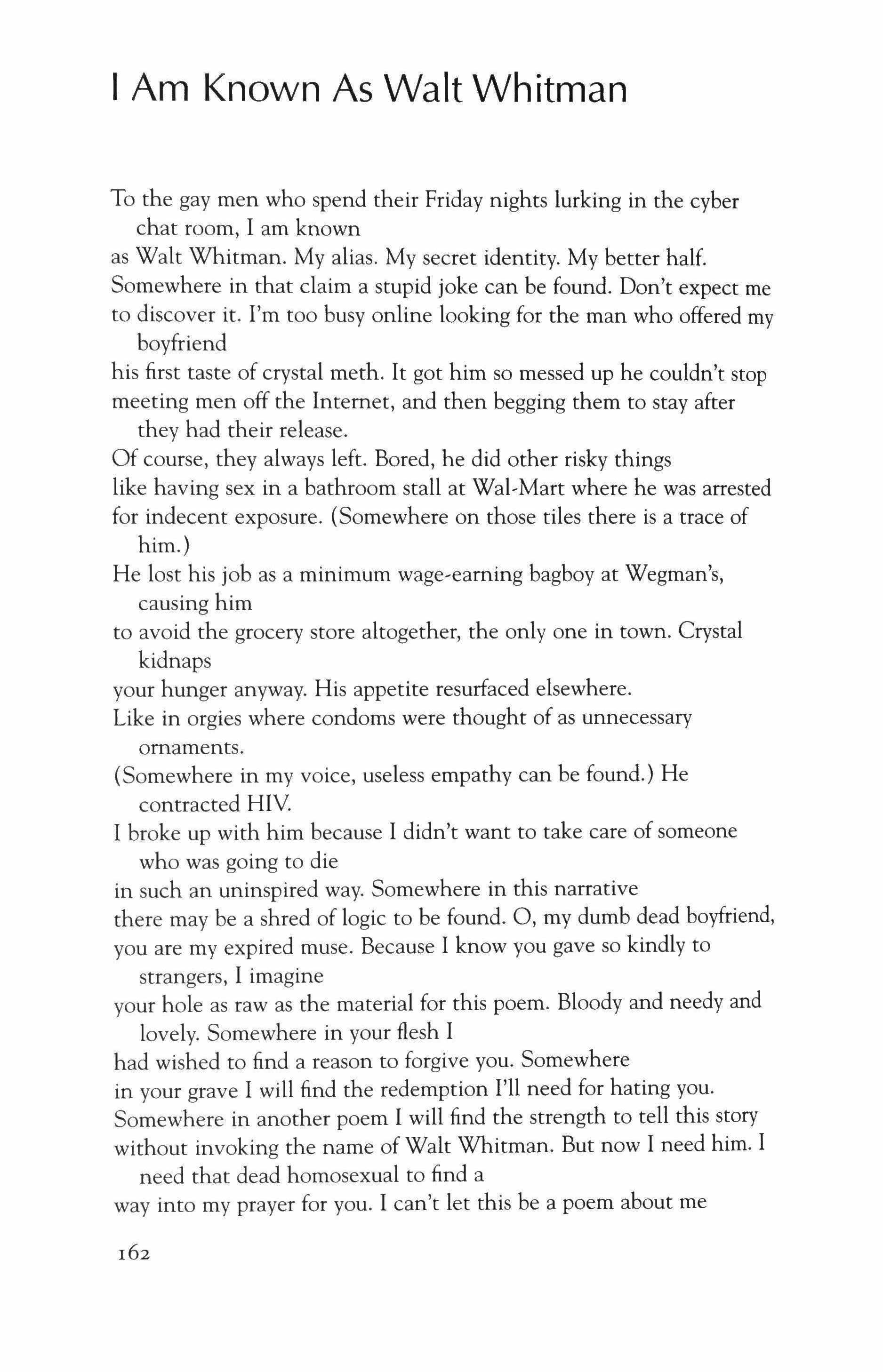
To the gay men who spend their Friday nights lurking in the cyber chat room, I am known as Walt Whitman. My alias. My secret identity. My better half. Somewhere in that claim a stupid joke can be found. Don't expect me to discover it. I'm too busy online looking for the man who offered my boyfriend his first taste of crystal meth. It got him so messed up he couldn't stop meeting men off the Internet, and then begging them to stay after they had their release. Of course, they always left. Bored, he did other risky things like having sex in a bathroom stall at Wal-Mart where he was arrested for indecent exposure. (Somewhere on those tiles there is a trace of him.)
He lost his job as a minimum wage-earning bagboy at Wegman's, causing him to avoid the grocery store altogether, the only one in town. Crystal kidnaps your hunger anyway. His appetite resurfaced elsewhere. Like in orgies where condoms were thought of as unnecessary ornaments.
(Somewhere in my voice, useless empathy can be found.) He contracted HIV.
I broke up with him because I didn't want to take care of someone who was going to die in such an uninspired way. Somewhere in this narrative there may be a shred of logic to be found. 0, my dumb dead boyfriend, you are my expired muse. Because I know you gave so kindly to strangers, I imagine your hole as raw as the material for this poem. Bloody and needy and lovely. Somewhere in your flesh I had wished to find a reason to forgive you. Somewhere in your grave I will find the redemption I'll need for hating you. Somewhere in another poem I will find the strength to tell this story without invoking the name of Walt Whitman. But now I need him. I need that dead homosexual to find a way into my prayer for you. I can't let this be a poem about me
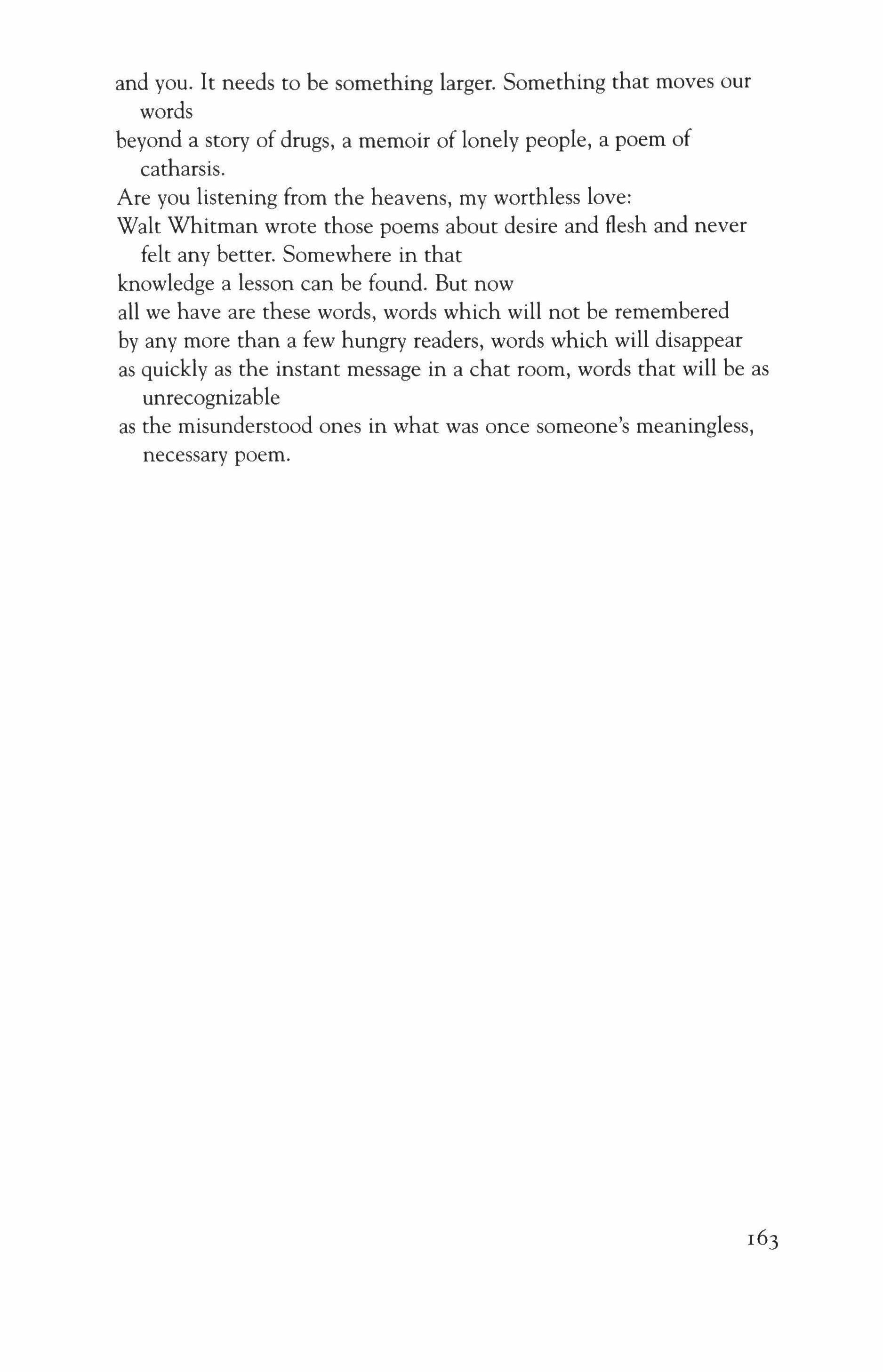
and you. It needs to be something larger. Something that moves our words beyond a story of drugs, a memoir of lonely people, a poem of catharsis.
Are you listening from the heavens, my worthless love: Walt Whitman wrote those poems about desire and flesh and never felt any better. Somewhere in that knowledge a lesson can be found. But now all we have are these words, words which will not be remembered by any more than a few hungry readers, words which will disappear as quickly as the instant message in a chat room, words that will be as unrecognizable as the misunderstood ones in what was once someone's meaningless, necessary poem.
Margaret Benbow
Evil Twin
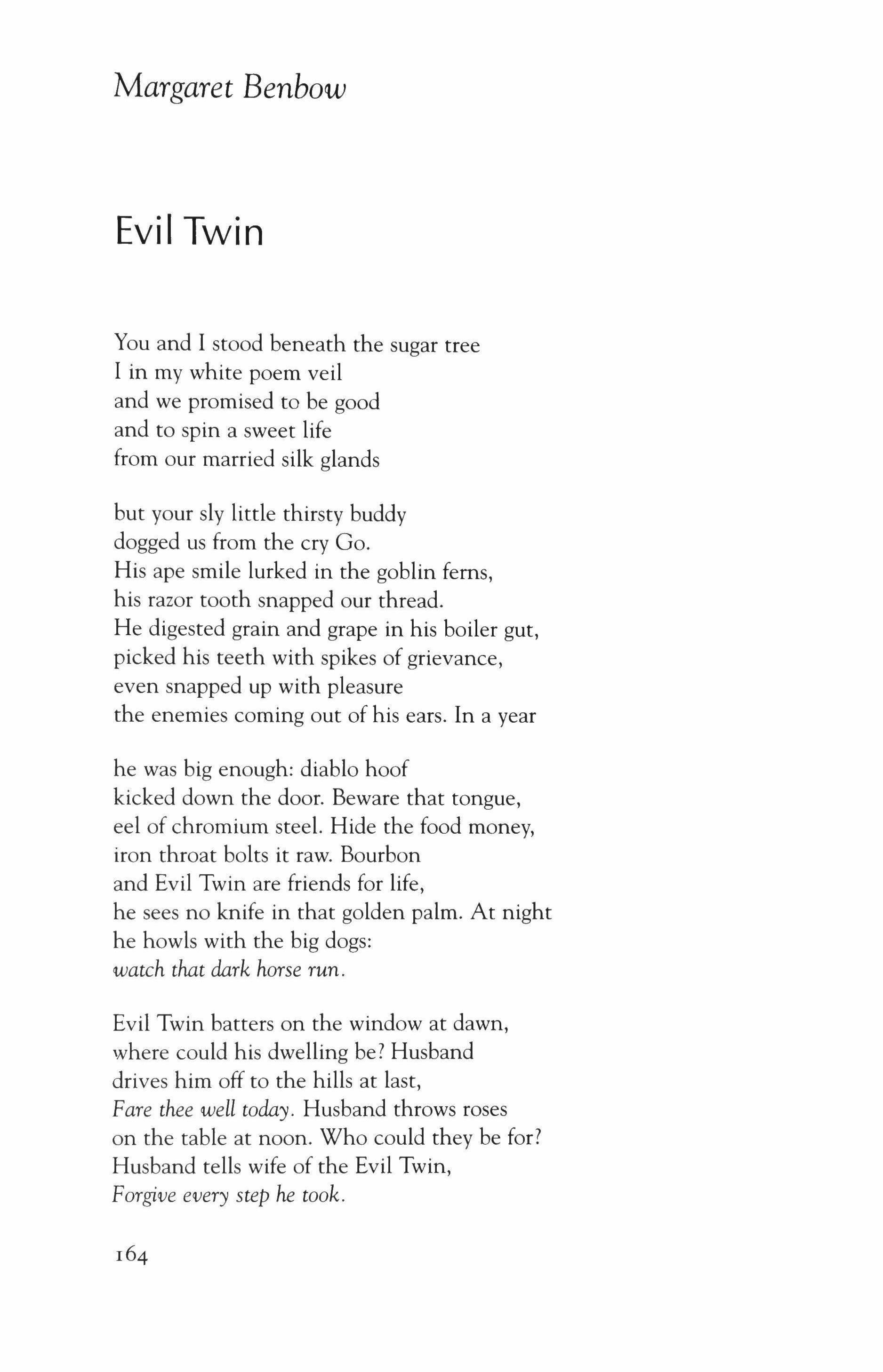
You and I stood beneath the sugar tree I in my white poem veil and we promised to be good and to spin a sweet life from our married silk glands
but your sly little thirsty buddy dogged us from the cry Go. His ape smile lurked in the goblin ferns, his razor tooth snapped our thread. He digested grain and grape in his boiler gut, picked his teeth with spikes of grievance, even snapped up with pleasure the enemies coming out of his ears. In a year
he was big enough: diablo hoof kicked down the door. Beware that tongue, eel of chromium steel. Hide the food money, iron throat bolts it raw. Bourbon and Evil Twin are friends for life, he sees no knife in that golden palm. At night he howls with the big dogs: watch that dark horse run.
Evil Twin batters on the window at dawn, where could his dwelling be? Husband drives him off to the hills at last, Fare thee well today. Husband throws roses on the table at noon. Who could they be for? Husband tells wife of the Evil Twin, Forgive every step he took.
Adrian C. Louis
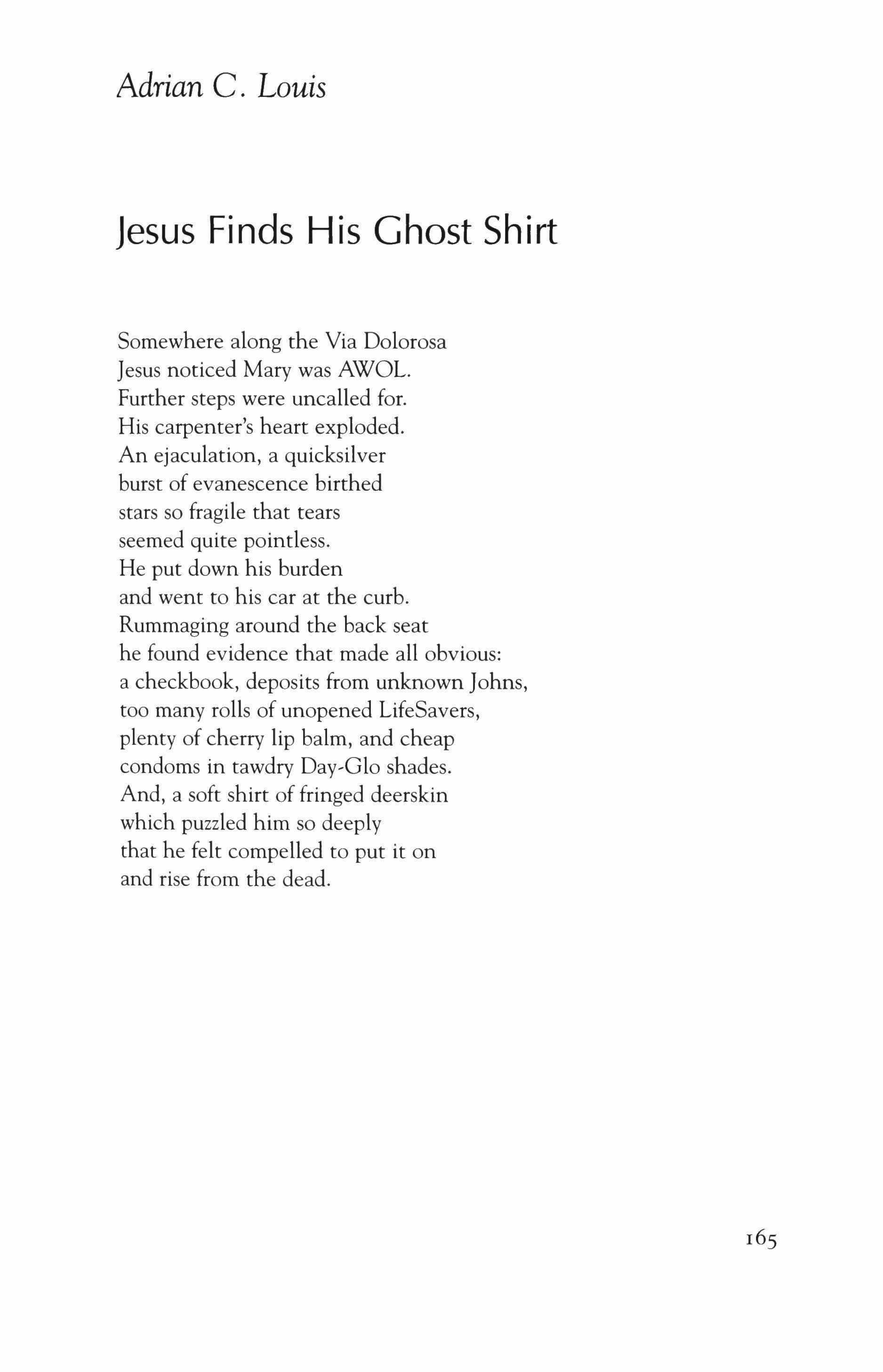
Jesus Finds His Ghost Shirt
Somewhere along the Via Dolorosa
Jesus noticed Mary was AWOL. Further steps were uncalled for. His carpenter's heart exploded. An ejaculation, a quicksilver burst of evanescence birthed stars so fragile that tears seemed quite pointless. He put down his burden and went to his car at the curb.
Rummaging around the back seat he found evidence that made all obvious: a checkbook, deposits from unknown Johns, too many rolls of unopened lifeSavers, plenty of cherry lip balm, and cheap condoms in tawdry Day-Glo shades. And, a soft shirt of fringed deerskin which puzzled him so deeply that he felt compelled to put it on and rise from the dead.
165
Logorrhea
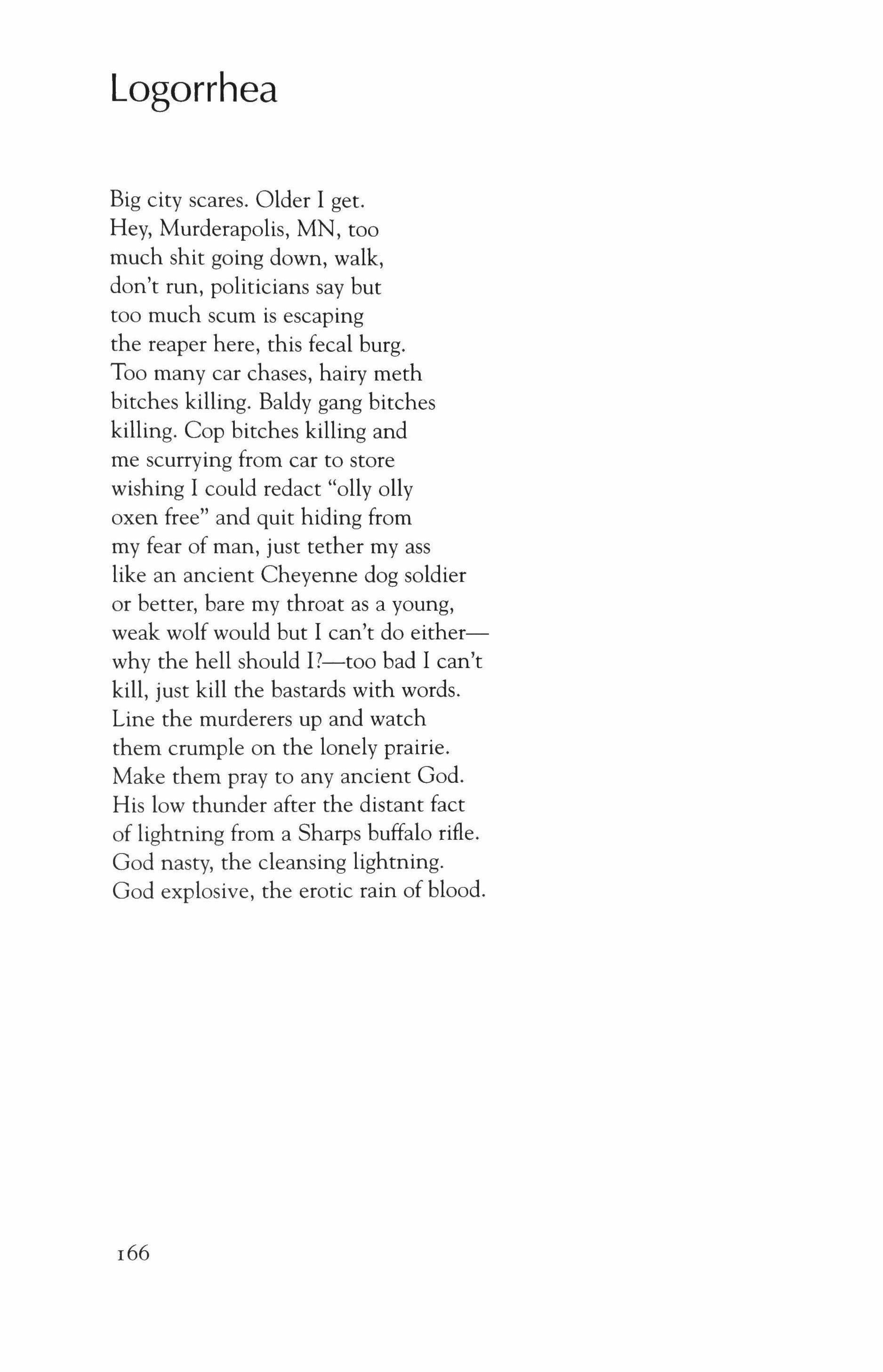
Big city scares. Older I get. Hey, Murderapolis, MN, too much shit going down, walk, don't run, politicians say but too much scum is escaping the reaper here, this fecal burg. Too many car chases, hairy meth bitches killing. Baldy gang bitches killing. Cop bitches killing and me scurrying from car to store wishing I could redact "olly olly oxen free" and quit hiding from my fear of man, just tether my ass like an ancient Cheyenne dog soldier or better, bare my throat as a young, weak wolf would but I can't do eitherwhy the hell should I?-too bad I can't kill, just kill the bastards with words. Line the murderers up and watch them crumple on the lonely prairie. Make them pray to any ancient God. His low thunder after the distant fact of lightning from a Sharps buffalo rifle. God nasty, the cleansing lightning. God explosive, the erotic rain of blood.
166
The Last of the Saiduka

The Paiute Indians and the long-legged redheads did not get along well. The Indians accused these giants of being cannibals, and waged war against them. After a long struggle, a coalition of tribes trapped the remaining Saiduka in what is now called Lovelock Cave and set it aflame and the Saiduka were annihilated.
Steve McNallen
And if you subscribe to legends these Saiduka were all baked dead with the exception of one drooling vata loca, who looked like a blend of Raggedy Ann and the "Bride of Frankenstein" when she banged on my braindoor vast months ago. Sleep staggered, nose bleeding from the high ammonia of morning, I should've answered the bell except those winged monkeys from the Wizard of Oz were swarming over me and one had his simian peeker pressed against my tired ass and I didn't want to get pregnant so I was fighting with all my macho might. When I finally broke free, I saw her car leaving my driveway. She tried to get me the next day and I would've answered but I recognized her number on the caller 10 and all I could think of was the week before when I drove her drunken body
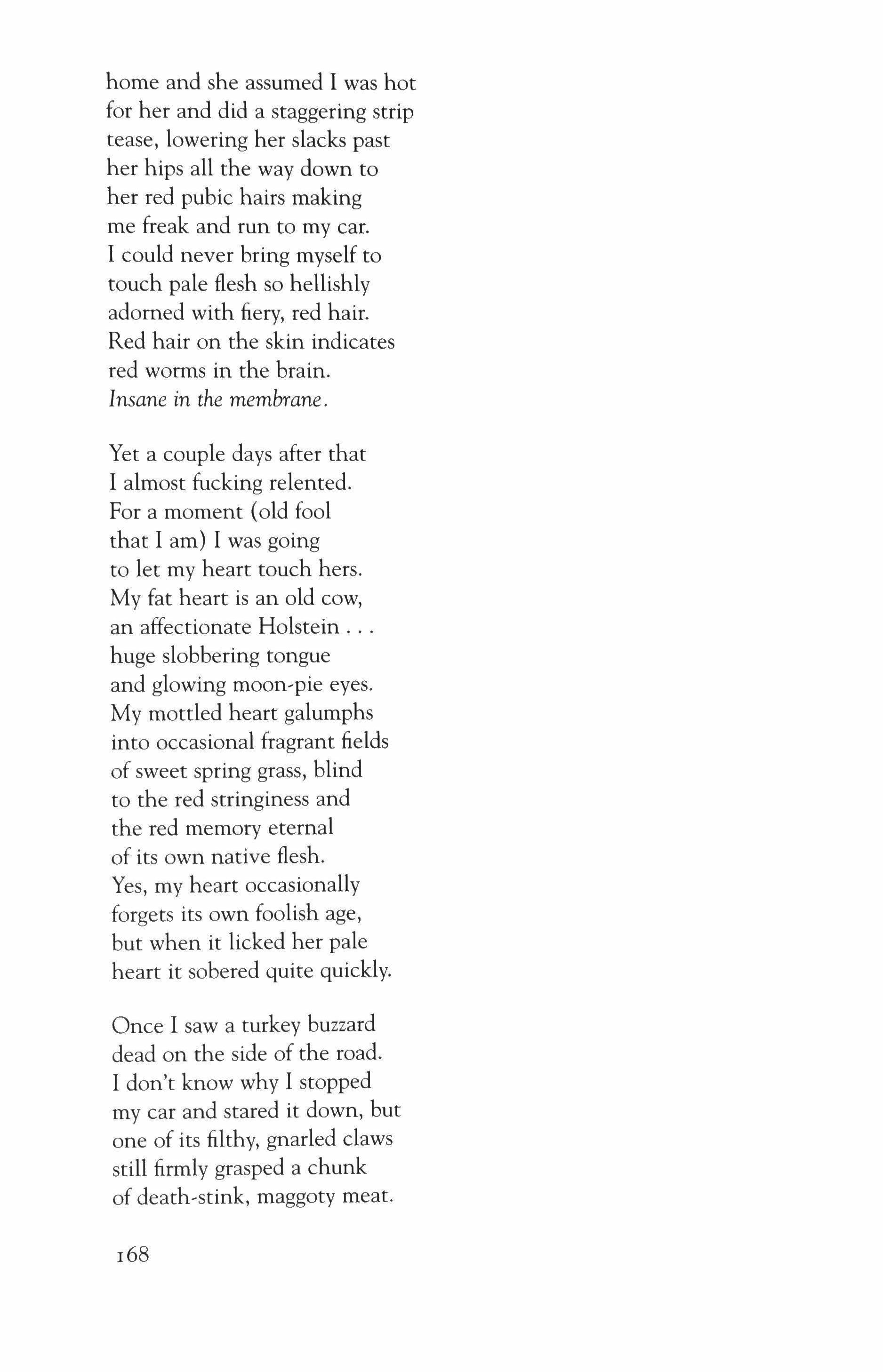
home and she assumed I was hot for her and did a staggering strip tease, lowering her slacks past her hips all the way down to her red pubic hairs making me freak and run to my car. I could never bring myself to touch pale flesh so hellishly adorned with fiery, red hair. Red hair on the skin indicates red worms in the brain. Insane in the membrane.
Yet a couple days after that I almost fucking relented. For a moment (old fool that I am) I was going to let my heart touch hers.
My fat heart is an old cow, an affectionate Holstein huge slobbering tongue and glowing moon-pie eyes. My mottled heart galumphs into occasional fragrant fields of sweet spring grass, blind to the red stringiness and the red memory eternal of its own native flesh. Yes, my heart occasionally forgets its own foolish age, but when it licked her pale heart it sobered quite quickly.
Once I saw a turkey buzzard dead on the side of the road. I don't know why I stopped my car and stared it down, but one of its filthy, gnarled claws still firmly grasped a chunk of death-stink, maggoty meat.
168
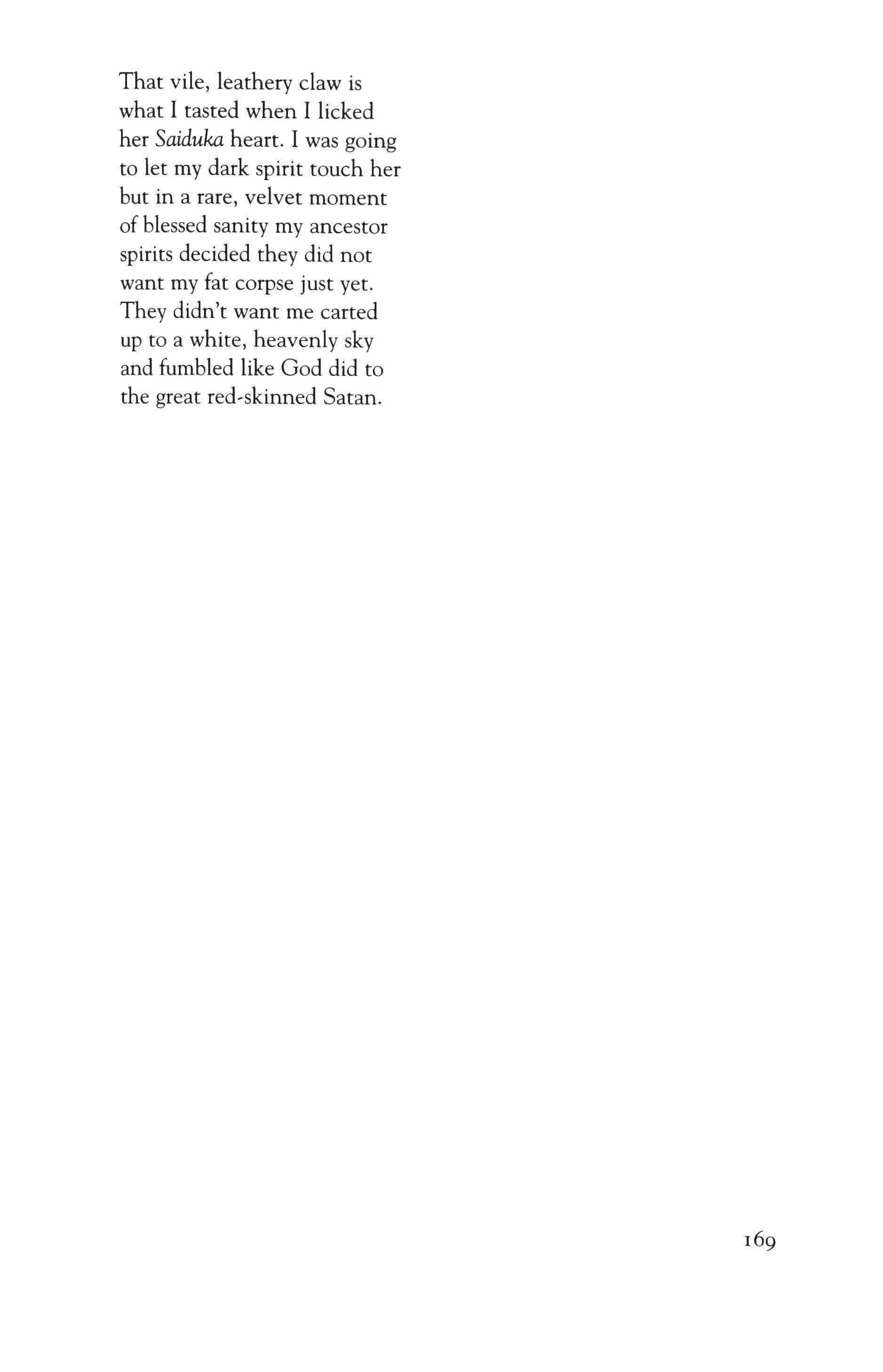
That vile, leathery claw is what I tasted when I licked her Saiduka heart. I was going to let my dark spirit touch her but in a rare, velvet moment of blessed sanity my ancestor spirits decided they did not want my fat corpse just yet. They didn't want me carted up to a white, heavenly sky and fumbled like God did to the great red-skinned Satan.
Aimee Nezhukumatathil
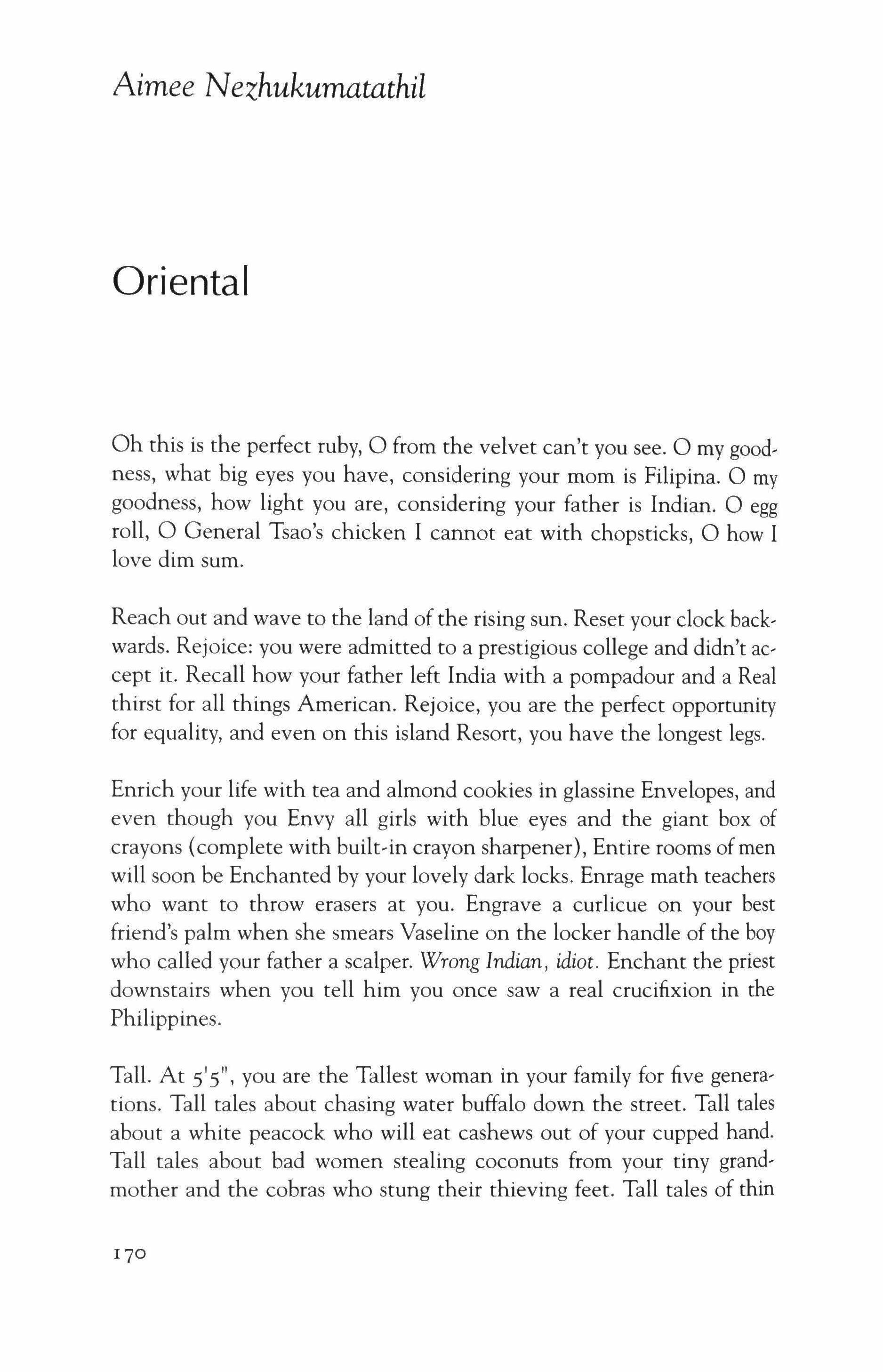
Oriental
Oh this is the perfect ruby, 0 from the velvet can't you see. 0 my goodness, what big eyes you have, considering your mom is Filipina, 0 my goodness, how light you are, considering your father is Indian. 0 egg roll, 0 General Tsao's chicken I cannot eat with chopsticks, 0 how I love dim sum.
Reach out and wave to the land of the rising sun. Reset your clock backwards. Rejoice: you were admitted to a prestigious college and didn't accept it. Recall how your father left India with a pompadour and a Real thirst for all things American. Rejoice, you are the perfect opportunity for equality, and even on this island Resort, you have the longest legs.
Enrich your life with tea and almond cookies in glassine Envelopes, and even though you Envy all girls with blue eyes and the giant box of crayons (complete with built-in crayon sharpener), Entire rooms of men will soon be Enchanted by your lovely dark locks. Enrage math teachers who want to throw erasers at you. Engrave a curlicue on your best friend's palm when she smears Vaseline on the locker handle of the boy who called your father a scalper. Wrong Indian, idiot. Enchant the priest downstairs when you tell him you once saw a real crucifixion in the Philippines.
Tall. At 5'5", you are the Tallest woman in your family for five generations. Tall tales about chasing water buffalo down the street. Tall tales about a white peacock who will eat cashews out of your cupped hand. Tall tales about bad women stealing coconuts from your tiny grandmother and the cobras who stung their thieving feet. Tall tales of thin
170
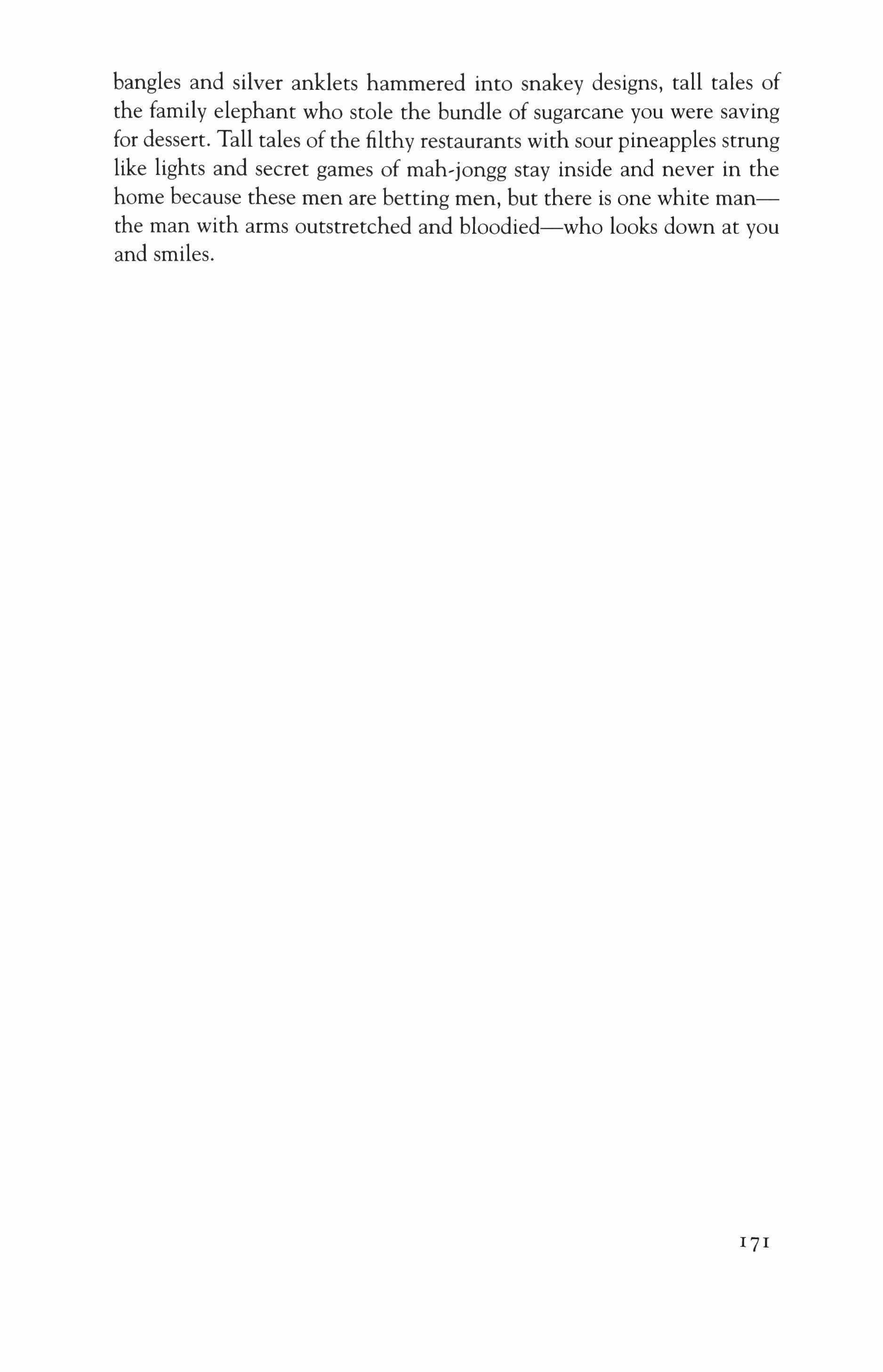
bangles and silver anklets hammered into snakey designs, tall tales of the family elephant who stole the bundle of sugarcane you were saving for dessert. Tall tales of the filthy restaurants with sour pineapples strung like lights and secret games of mah-jongg stay inside and never in the home because these men are betting men, but there is one white manthe man with arms outstretched and bloodied-who looks down at you and smiles.
High School Picture Retake Day

When an octopus becomes stressed, it chomps its arms one by one until it becomes a floaty salad.
The line of students is understandably worried: this is the last chance for redemption. Neil parts and parts his hair with the petite plastic comb the photographer slipped him when he signed in. Susan reties the grosgrain bow in her braid. Everything is quiet but for tiny songs of tiny combs whistling through hair. Everything is black save for the single camera lamp and smudgy backdrop painted to look like the student hovers among beige and blue clouds. And maybe they do-the ones who got it right the first time-soaring above the earth's troposphere, but still a bit below the stratosphere. When the last bell rings, there they are: flying proud, able to exchange wallet-sized pictures with other pretty people right away. No waiting for two more months when no one cares anymore.
No closed eyes, no sticks of hair sprung out like arrows, no bra straps showing, no sleepy eyes-just perfectly pressed shirts and smiles slit to show rows of neat teeth.
Natasha Rocas
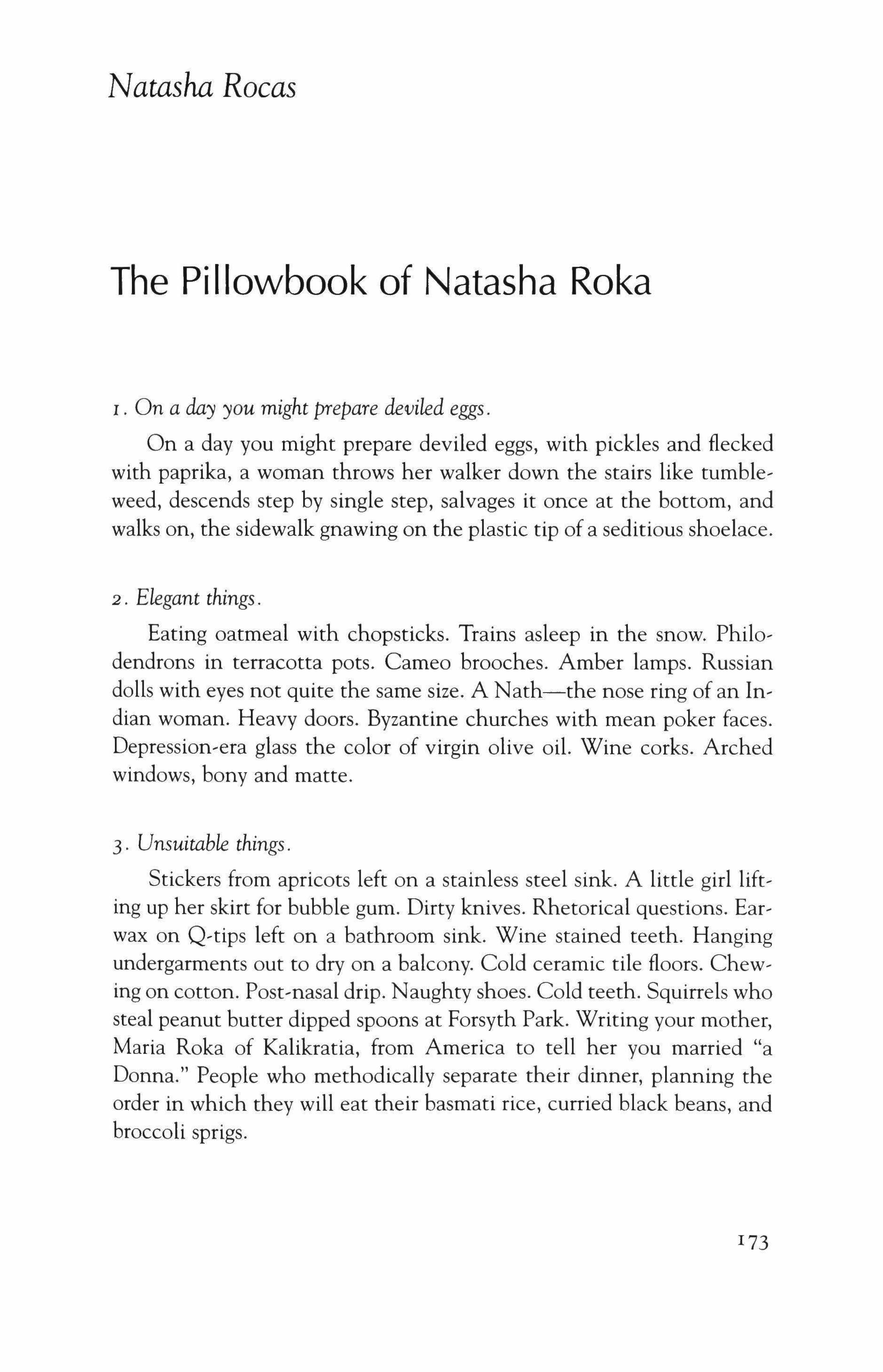
The Pi Ilowbook of Natasha Roka
I On a day you might prepare deviled eggs.
On a day you might prepare deviled eggs, with pickles and flecked with paprika, a woman throws her walker down the stairs like tumbleweed, descends step by single step, salvages it once at the bottom, and walks on, the sidewalk gnawing on the plastic tip of a seditious shoelace.
2. Elegant things.
Eating oatmeal with chopsticks. Trains asleep in the snow. Philodendrons in terracotta pots. Cameo brooches. Amber lamps. Russian dolls with eyes not quite the same size. A Nath-the nose ring of an Indian woman. Heavy doors. Byzantine churches with mean poker faces. Depression-era glass the color of virgin olive oil. Wine corks. Arched windows, bony and matte.
3. Unsuitable things.
Stickers from apricots left on a stainless steel sink. A little girl lifting up her skirt for bubble gum. Dirty knives. Rhetorical questions. Ear� wax on Qvtips left on a bathroom sink. Wine stained teeth. Hanging undergarments out to dry on a balcony. Cold ceramic tile floors. Chewing on cotton. Post-nasal drip. Naughty shoes. Cold teeth. Squirrels who steal peanut butter dipped spoons at Forsyth Park. Writing your mother, Maria Roka of Kalikratia, from America to tell her you married "a Donna." People who methodically separate their dinner, planning the order in which they will eat their basmati rice, curried black beans, and broccoli sprigs.
173
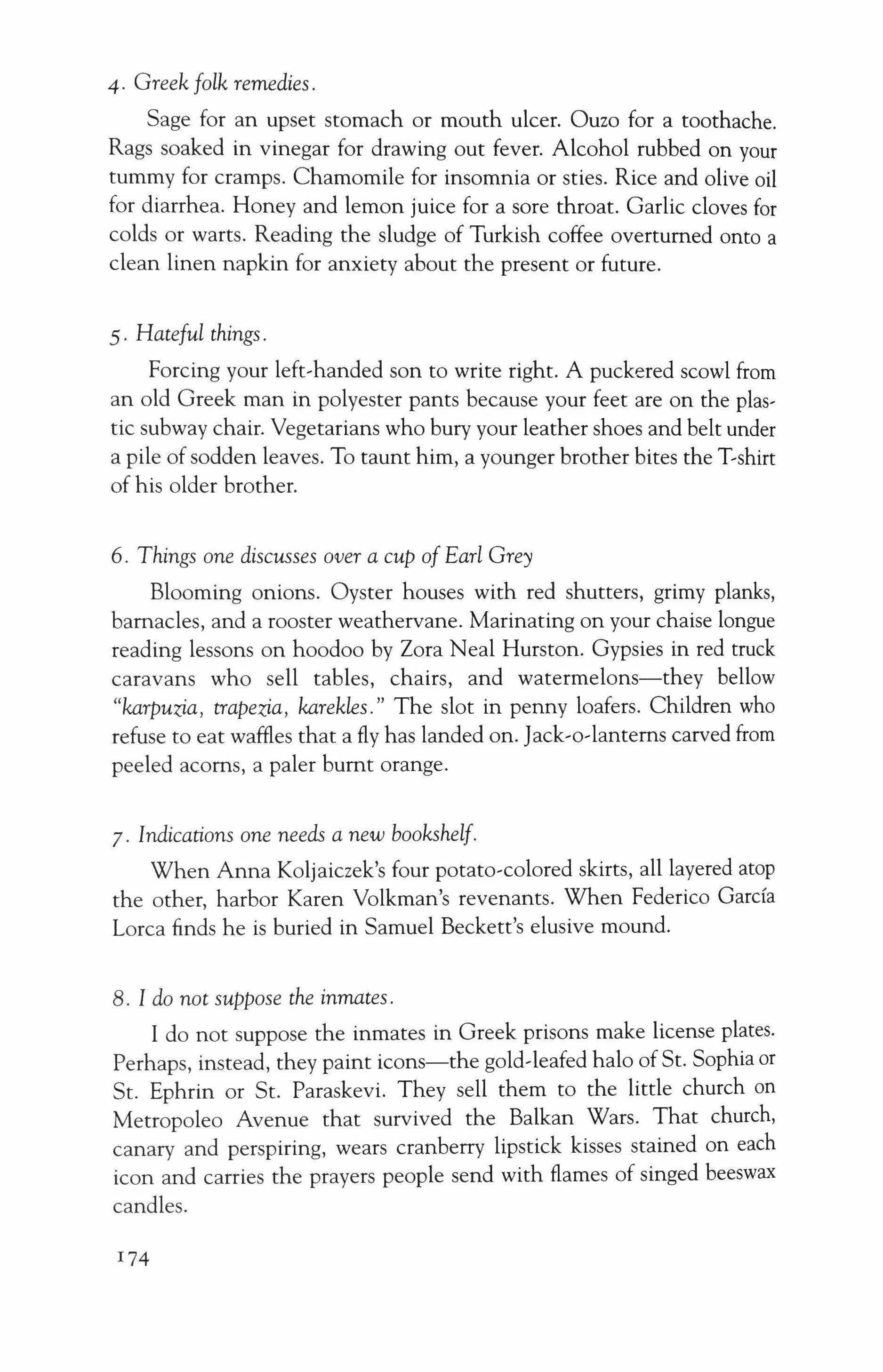
4. Greek folk remedies.
Sage for an upset stomach or mouth ulcer. Ouzo for a toothache. Rags soaked in vinegar for drawing out fever. Alcohol rubbed on your tummy for cramps. Chamomile for insomnia or sties. Rice and olive oil for diarrhea. Honey and lemon juice for a sore throat. Garlic cloves for colds or warts. Reading the sludge of Turkish coffee overturned onto a clean linen napkin for anxiety about the present or future.
5. Hateful things.
Forcing your left-handed son to write right. A puckered scowl from an old Greek man in polyester pants because your feet are on the plastic subway chair. Vegetarians who bury your leather shoes and belt under a pile ofsodden leaves. To taunt him, a younger brother bites the 'Tshirt of his older brother.
6. Things one discusses over a cup of Earl Grey
Blooming onions. Oyster houses with red shutters, grimy planks, barnacles, and a rooster weathervane. Marinating on your chaise longue reading lessons on hoodoo by Zora Neal Hurston. Gypsies in red truck caravans who sell tables, chairs, and watermelons-they bellow "karpuzia, trapezia, karekles." The slot in penny loafers. Children who refuse to eat waffles that a fly has landed on. [ack-o-lanterns carved from peeled acorns, a paler burnt orange.
7. Indications one needs a new bookshelf.
When Anna Koljaiczek's four potato-colored skirts, all layered atop the other, harbor Karen Volkman's revenants. When Federico Garda Lorca finds he is buried in Samuel Beckett's elusive mound.
8. I do not suppose the inmates.
I do not suppose the inmates in Greek prisons make license plates. Perhaps, instead, they paint icons-the gold-leafed halo of St. Sophia or St. Ephrin or St. Paraskevi. They sell them to the little church on Metropoleo Avenue that survived the Balkan Wars. That church, canary and perspiring, wears cranberry lipstick kisses stained on each icon and carries the prayers people send with flames of singed beeswax candles.
174
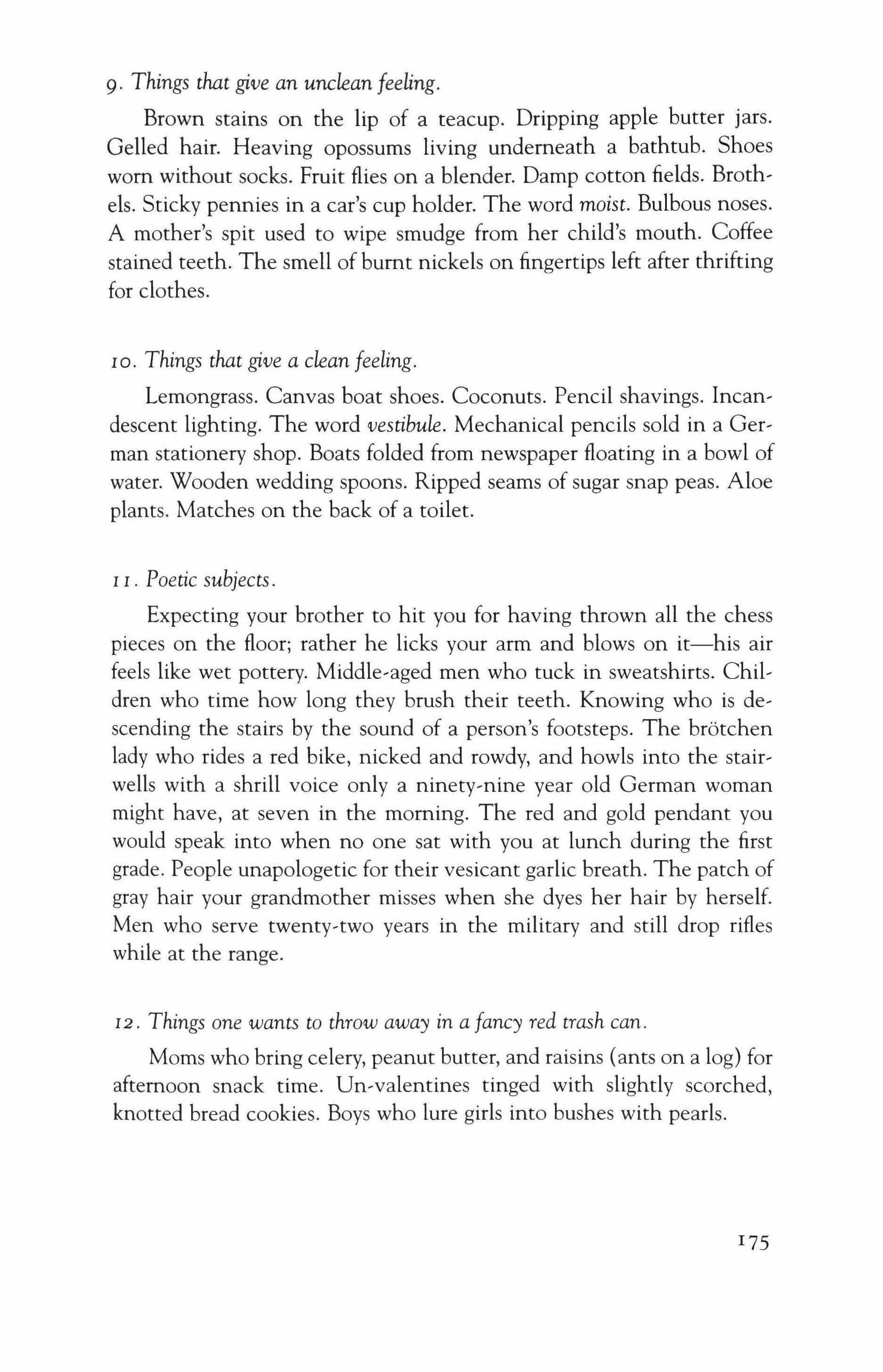
9. Things that give an unclean feeling.
Brown stains on the lip of a teacup. Dripping apple butter jars. Gelled hair. Heaving opossums living underneath a bathtub. Shoes worn without socks. Fruit flies on a blender. Damp cotton fields. Brothels. Sticky pennies in a car's cup holder. The word moist. Bulbous noses. A mother's spit used to wipe smudge from her child's mouth. Coffee stained teeth. The smell of burnt nickels on fingertips left after thrifting for clothes.
10. Things that give a clean feeling.
Lemongrass. Canvas boat shoes. Coconuts. Pencil shavings. Incandescent lighting. The word vestibule. Mechanical pencils sold in a German stationery shop. Boats folded from newspaper floating in a bowl of water. Wooden wedding spoons. Ripped seams of sugar snap peas. Aloe plants. Matches on the back of a toilet.
I I. Poetic subjects.
Expecting your brother to hit you for having thrown all the chess pieces on the floor; rather he licks your arm and blows on it-his air feels like wet pottery. Middle-aged men who tuck in sweatshirts. Children who time how long they brush their teeth. Knowing who is descending the stairs by the sound of a person's footsteps. The brotchen lady who rides a red bike, nicked and rowdy, and howls into the stairwells with a shrill voice only a ninety-nine year old German woman might have, at seven in the morning. The red and gold pendant you would speak into when no one sat with you at lunch during the first grade. People unapologetic for their vesicant garlic breath. The patch of gray hair your grandmother misses when she dyes her hair by herself. Men who serve twenty-two years in the military and still drop rifles while at the range.
12. Things one wants to throwaway in a fancy red trash can.
Moms who bring celery, peanut butter, and raisins {ants on a log} for afternoon snack time. Uri-valentines tinged with slightly scorched, knotted bread cookies. Boys who lure girls into bushes with pearls.
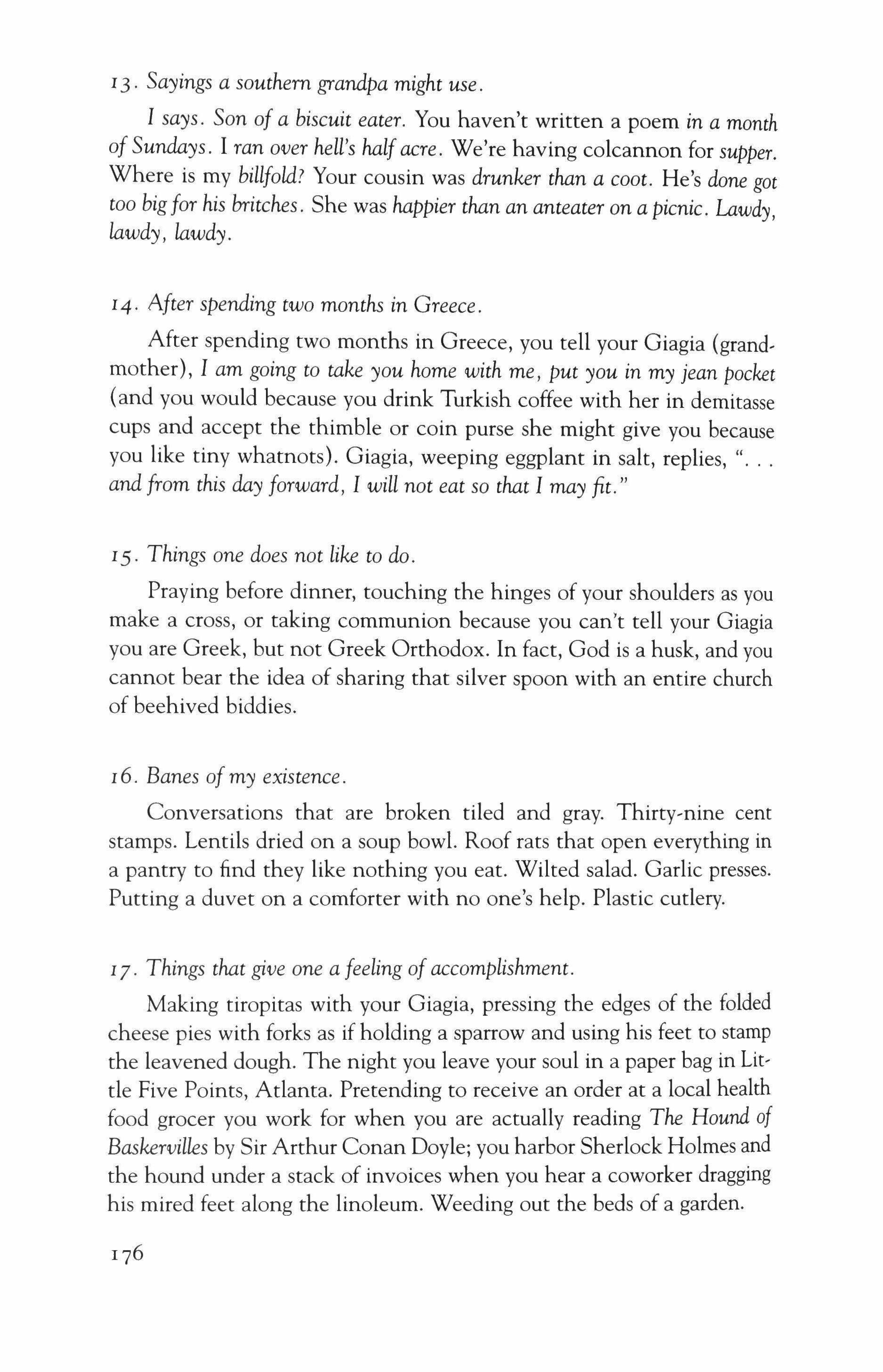
13· Sayings a southern grandpa might use.
I says. Son of a biscuit eater. You haven't written a poem in a month ofSundays. I ran over hell's half acre. We're having colcannon for supper. Where is my billfold? Your cousin was drunker than a coot. He's done got too bigfor his britches. She was happier than an anteater on a picnic. Lawdy, lawdy, lawdy.
14· After spending two months in Greece.
After spending two months in Greece, you tell your Giagia {grandmother}, I am going to take you home with me, put you in my jean pocket {and you would because you drink Turkish coffee with her in demitasse cups and accept the thimble or coin purse she might give you because you like tiny whatnots}. Giagia, weeping eggplant in salt, replies, u and from this day forward, I will not eat so that I may fit.»
15· Things one does not like to do.
Praying before dinner, touching the hinges of your shoulders as you make a cross, or taking communion because you can't tell your Giagia you are Greek, but not Greek Orthodox. In fact, God is a husk, and you cannot bear the idea of sharing that silver spoon with an entire church of beehived biddies.
16. Banes of my existence.
Conversations that are broken tiled and gray. Thirty-nine cent stamps. Lentils dried on a soup bowl. Roof rats that open everything in a pantry to find they like nothing you eat. Wilted salad. Garlic presses. Putting a duvet on a comforter with no one's help. Plastic cutlery.
17. Things that give one a feeling ofaccomplishment.
Making tiropitas with your Giagia, pressing the edges of the folded cheese pies with forks as if holding a sparrow and using his feet to stamp the leavened dough. The night you leave your soul in a paper bag in Little Five Points, Atlanta. Pretending to receive an order at a local health food grocer you work for when you are actually reading The Hound of Baskervilles by Sir Arthur Conan Doyle; you harbor Sherlock Holmes and the hound under a stack of invoices when you hear a coworker dragging his mired feet along the linoleum. Weeding out the beds of a garden.
176
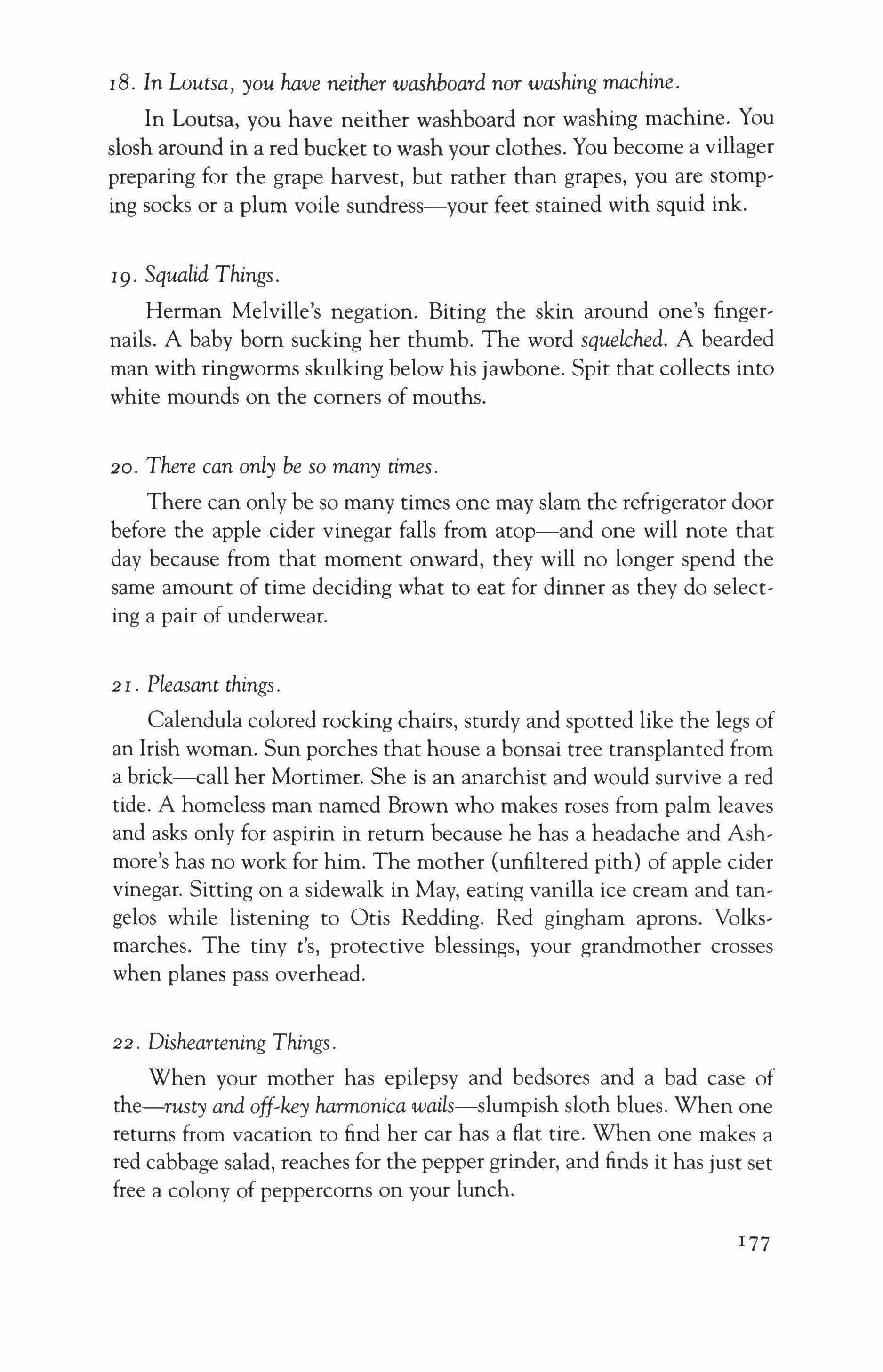
18. In Loutsa, you have neither washboard nor washing machine. In Loutsa, you have neither washboard nor washing machine. You slosh around in a red bucket to wash your clothes. You become a villager preparing for the grape harvest, but rather than grapes, you are stomping socks or a plum voile sundress-your feet stained with squid ink.
19. Squalid Things.
Herman Melville's negation. Biting the skin around one's fingernails. A baby born sucking her thumb. The word squelched. A bearded man with ringworms skulking below his jawbone. Spit that collects into white mounds on the comers of mouths.
20. There can only be so many times.
There can only be so many times one may slam the refrigerator door before the apple cider vinegar falls from atop-and one will note that day because from that moment onward, they will no longer spend the same amount of time deciding what to eat for dinner as they do selecting a pair of underwear.
2 I. Pleasant things.
Calendula colored rocking chairs, sturdy and spotted like the legs of an Irish woman. Sun porches that house a bonsai tree transplanted from a brick-call her Mortimer. She is an anarchist and would survive a red tide. A homeless man named Brown who makes roses from palm leaves and asks only for aspirin in return because he has a headache and Ashmore's has no work for him. The mother (unfiltered pith) of apple cider vinegar. Sitting on a sidewalk in May, eating vanilla ice cream and tangelos while listening to Otis Redding. Red gingham aprons. Volksmarches. The tiny t's, protective blessings, your grandmother crosses when planes pass overhead.
22. Disheartening
Things.
When your mother has epilepsy and bedsores and a bad case of the-rusty and offkey harmonica wails-slumpish sloth blues. When one returns from vacation to find her car has a flat tire. When one makes a red cabbage salad, reaches for the pepper grinder, and finds it has just set free a colony of peppercorns on your lunch.

23. I rode in a Lancia, foul mouthed and shedding. I rode in a Lancia, foul mouthed and shedding, into the mountains of the Peloponnesus with a boy, bearded and knock-kneed, the one who once asked if he could "kiss me properly," to see his family's house that was suffering from emphysema. The villagers ordered her to be tom down soon because she was two-hundred, forlorn, and her cough was awaking the neighbors. He tells me he will rebuild the house one day; he'll mend the cracks and suture the roof's stitches.
24. Things one remembers about childhood (from ginger snaps to Rothenberg)
Ginger snaps and moustokoulouria (grape must cookies). Blues mixtapes your father made for you, muddy watered and unfaithful. Little diamond windows cut into mustard seeded doors. The toothpicks school nurses used for monthly lice checks. At age seven, "giving birth" to a pumpkin baby, auburn haired and partial to tapioca pudding, that you carried on your bony hip. Your older brother reading vampire stories upside down on the living room couch, rubbing his head against the carpet, and your mother telling him he shouldn't because he'll lose his hair. The red plaid skirt you wore with hot pink leggings. (Latch) keys. A father, after his family has arrived in a cobblestoned Rothenberg, taking his children home because they forgot to brush their teeth.
25. Things one remembers about childhood (from smashed sandwiches to underwear)
The way your best friend smashed parts of a ham and cheese sandwich before eating it (a task almost impossible to achieve with a peanut butter and jelly). The girl who asked you how to say "god" when you gave Greek lessons to your second grade class on Tuesday afternoons; rather than telling her you didn't know, you created a word, wrote a libel against him. There's a Hippopotamus Under My Bed, or perhaps Amelia Bedelia. Footie pajamas you received via mail-order after saving Smucker's jelly Ul'C labels. Making a shoebox diorama of Anne Frank's secret annex from the same paisley contact paper your mother cut into hearts to decorate her bathroom walls. Pleated khakis. The ochre and kidney-shaped vomit vessels that lurked in a school nurse's office. Using a shell as a Barbie clothing hamper. The red M&Ms your second grade teacher, Mrs. Miller, did not like. Your parents giving you a package of
178

underwear on your older brother's birthday because you did not understand the concept of birthday gift giving.
26. Things that make one's heart beat faster.
Sledding down grass hills on a cardboard box you wear like an afghan. Listening to pecans fall upon your roof as the trees yawn. Smashing pennies on railroad tracks. Blood oranges.
27. Adorable things.
Your mom belting out "stretch armstrong nickelodeon shoes" on election day '88 after making you red, white, and blue pancakes for breakfast. Homeless men who when asking if they may pick a few of the pecans in your yard, really mean a trash bag full. Platonic crushes. Greek inscriptions your father writes you on a tom paper bag, despite his knowing you cannot read Greek; you do, however, make out the words "have" and "garlic." Montana men who wear argyle socks and cure old trestle tables. Your best friend's pillow case collection. Asking to take your grandmother's picture-she refuses, instead giving you an old passport photo, nmeteen-fiftied and stamped like a branded billy goat, because that's how she wants you to remember her. Improvising Prince's Raspberry Beret while porchin' it on a ledge with boys named Slim, Nor, and Marc.
28. Three weeks after you've told your Giagia you are a vegetarian. Three weeks after you've told your Giagia you are a vegetarian, she wakes you to ask why you no longer eat sardines or chicken or lamb. It's one of those mornings where she might have forced warm milk upon you were you nine again. She tells you "Tous indianos (the Indians) are vegetarian and you are Greek." And because it is Wednesday, you tell her you are in fact Indian and not Greek-and what's more, you run an underground cocaine ring in the flat basement.
29. An apology to the boy.
An apology to the boy whose copy of Archie and Mehitabel I borrowed: I didn't mean to get mandarin juice on pages 17-24, but I didn't have a place to put the peel and your book seemed far less intimidating than my aunt's maudlin table.
179
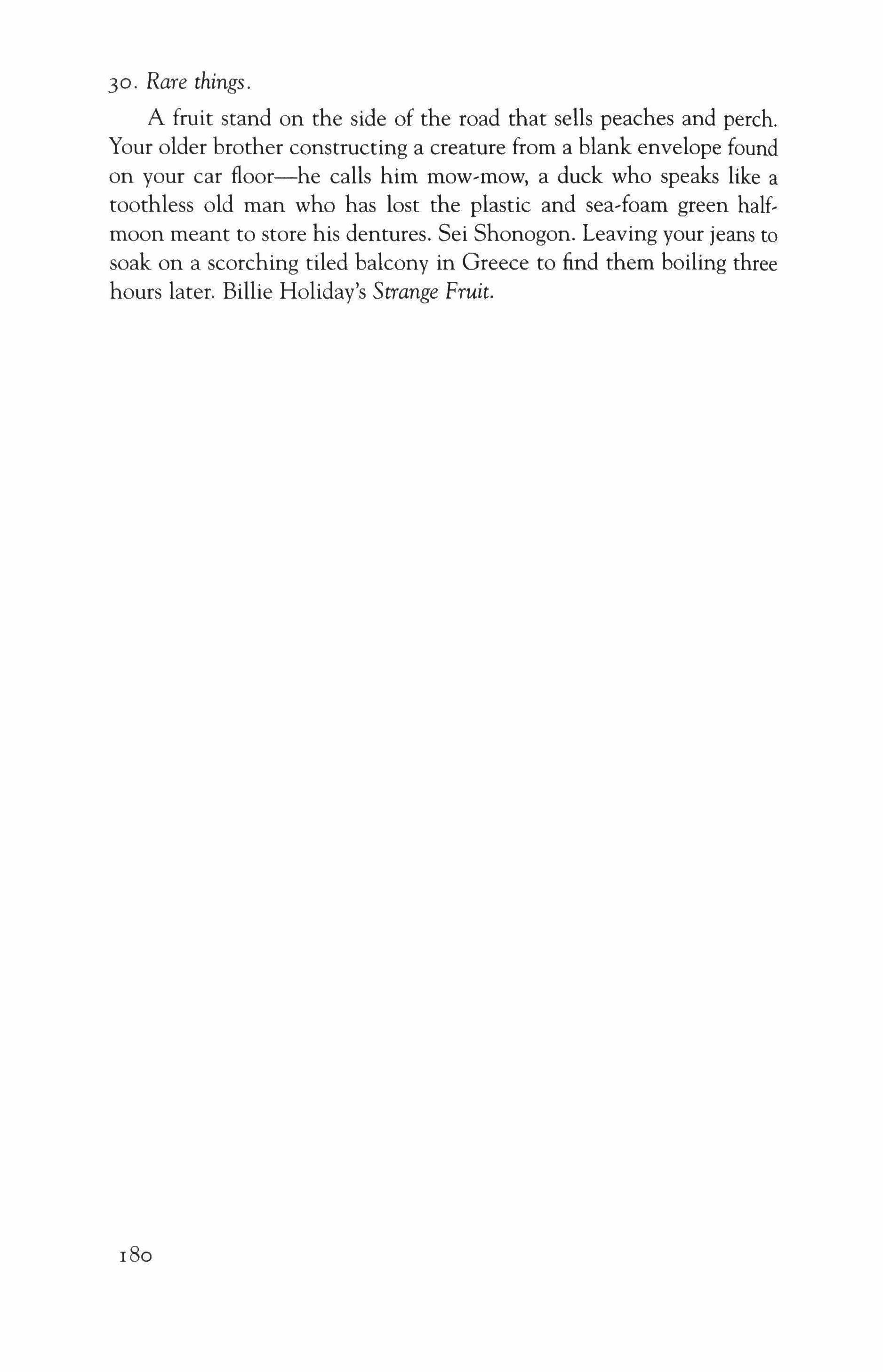
30. Rare things.
A fruit stand on the side of the road that sells peaches and perch. Your older brother constructing a creature from a blank envelope found on your car floor-he calls him mow-mow, a duck who speaks like a toothless old man who has lost the plastic and sea-foam green halfmoon meant to store his dentures. Sei Shonogon. Leaving your jeans to soak on a scorching tiled balcony in Greece to find them boiling three hours later. Billie Holiday's Strange Fruit.
180
Martha Silano
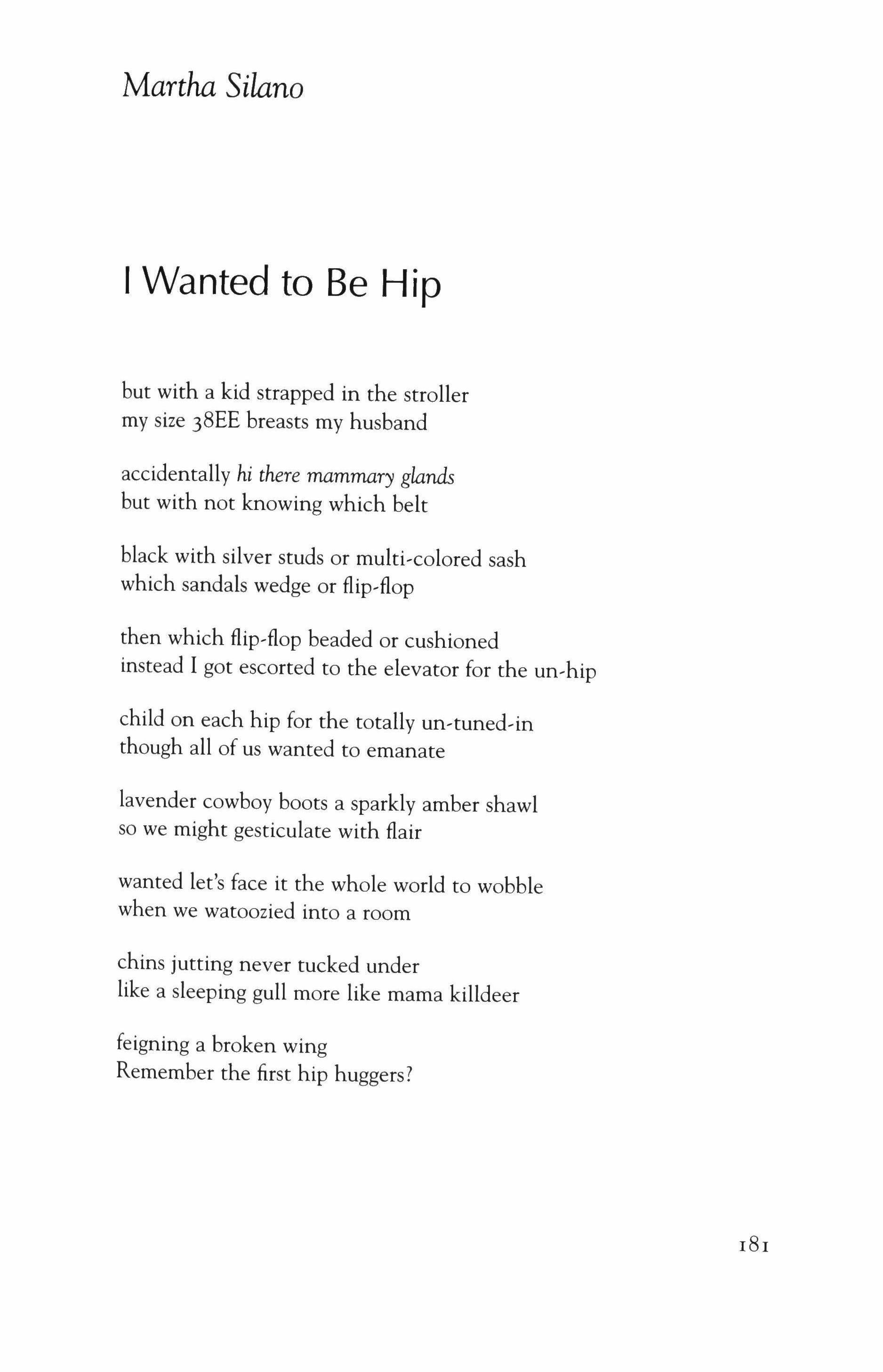
I Wanted to Be Hip
but with a kid strapped in the stroller my size 38EE breasts my husband
accidentally hi there mammary glands but with not knowing which belt
black with silver studs or multi-colored sash which sandals wedge or flip-flop
then which flip-flop beaded or cushioned instead I got escorted to the elevator for the uri-hip
child on each hip for the totally un-tuned-in though all of us wanted to emanate
lavender cowboy boots a sparkly amber shawl so we might gesticulate with flair
wanted let's face it the whole world to wobble when we watoozied into a room
chins jutting never tucked under like a sleeping gull more like mama killdeer
feigning a broken wing
Remember the first hip huggers?
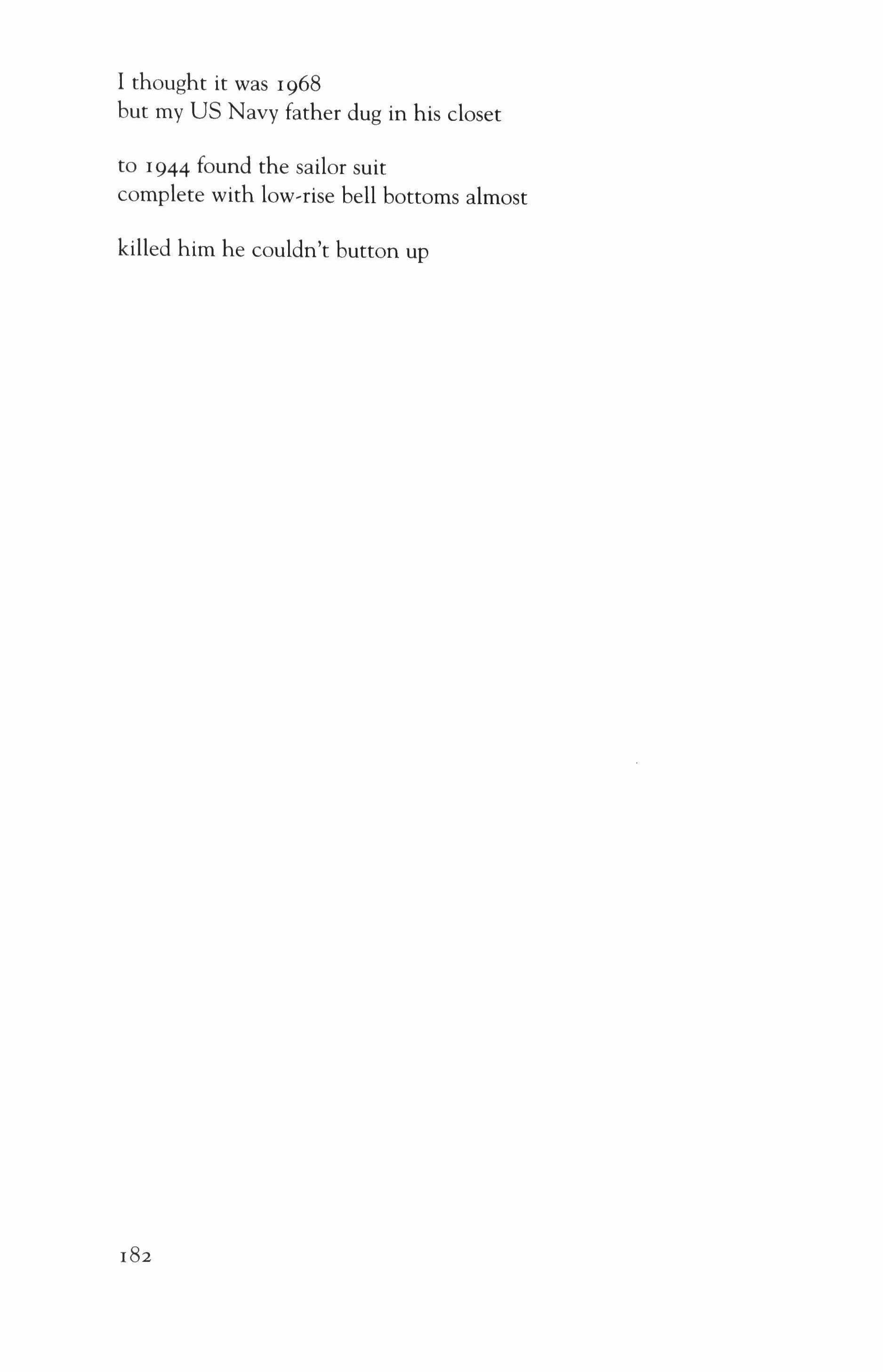
I thought it was 1968 but my US Navy father dug in his closet to 1944 found the sailor suit complete with low-rise bell bottoms almost killed him he couldn't button up
This Parenting Thing
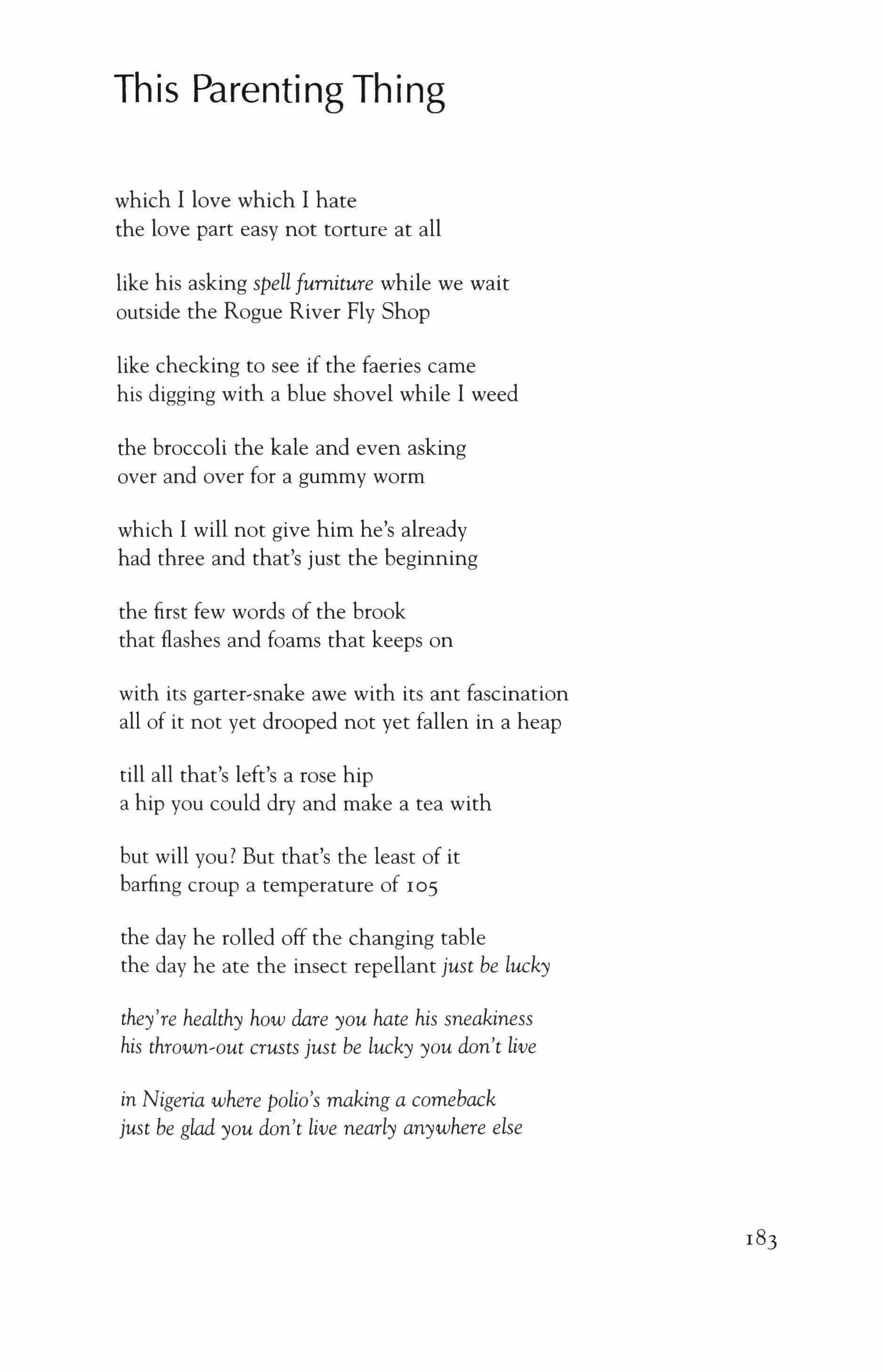
which I love which I hate the love part easy not torture at all
like his asking spell furniture while we wait outside the Rogue River Fly Shop
like checking to see if the faeries came his digging with a blue shovel while I weed the broccoli the kale and even asking over and over for a gummy worm
which I will not give him he's already had three and that's just the beginning
the first few words of the brook that flashes and foams that keeps on
with its garter-snake awe with its ant fascination all of it not yet drooped not yet fallen in a heap
till all that's left's a rose hip a hip you could dry and make a tea with
but will you? But that's the least of it barfing croup a temperature of 105 the day he rolled off the changing table the day he ate the insect repellant just be lucky they're healthy how dare you hate his sneakiness his thrown-out crusts just be lucky you don't live
in Nigeria where polio's making a comeback just be glad you don't live nearly anywhere else
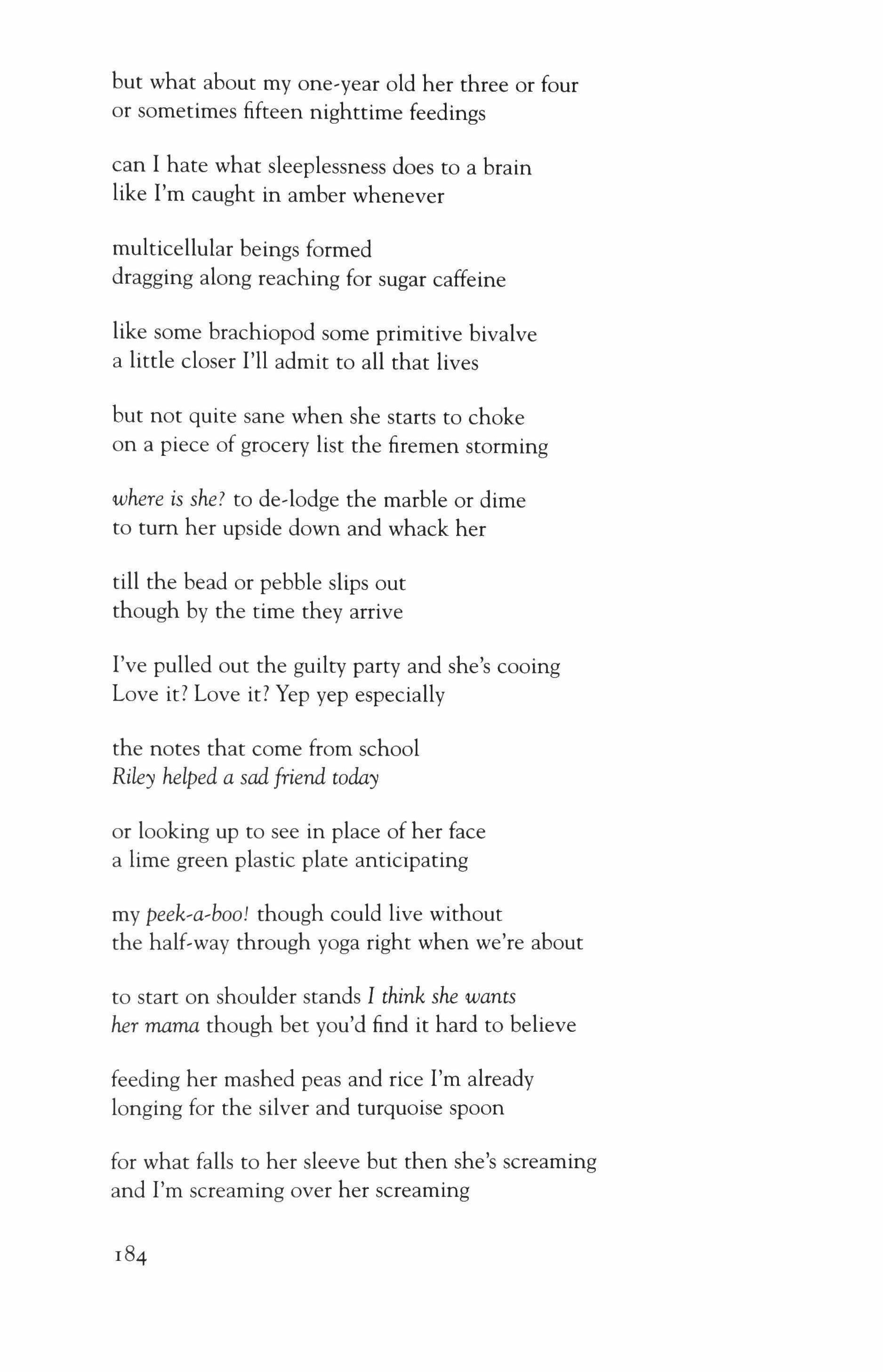
but what about my one-year old her three or four or sometimes fifteen nighttime feedings
can I hate what sleeplessness does to a brain like I'm caught in amber whenever
multicellular beings formed dragging along reaching for sugar caffeine
like some brachiopod some primitive bivalve a little closer I'll admit to all that lives
but not quite sane when she starts to choke on a piece of grocery list the firemen storming
where is she? to de-lodge the marble or dime to tum her upside down and whack her
till the bead or pebble slips out though by the time they arrive
I've pulled out the guilty party and she's cooing Love it? Love it? Yep yep especially
the notes that come from school Riley helped a sad friend today
or looking up to see in place of her face a lime green plastic plate anticipating
my peek-a-boo! though could live without the half-way through yoga right when we're about
to start on shoulder stands I think she wants her mama though bet you'd find it hard to believe
feeding her mashed peas and rice I'm already longing for the silver and turquoise spoon
for what falls to her sleeve but then she's screaming and I'm screaming over her screaming
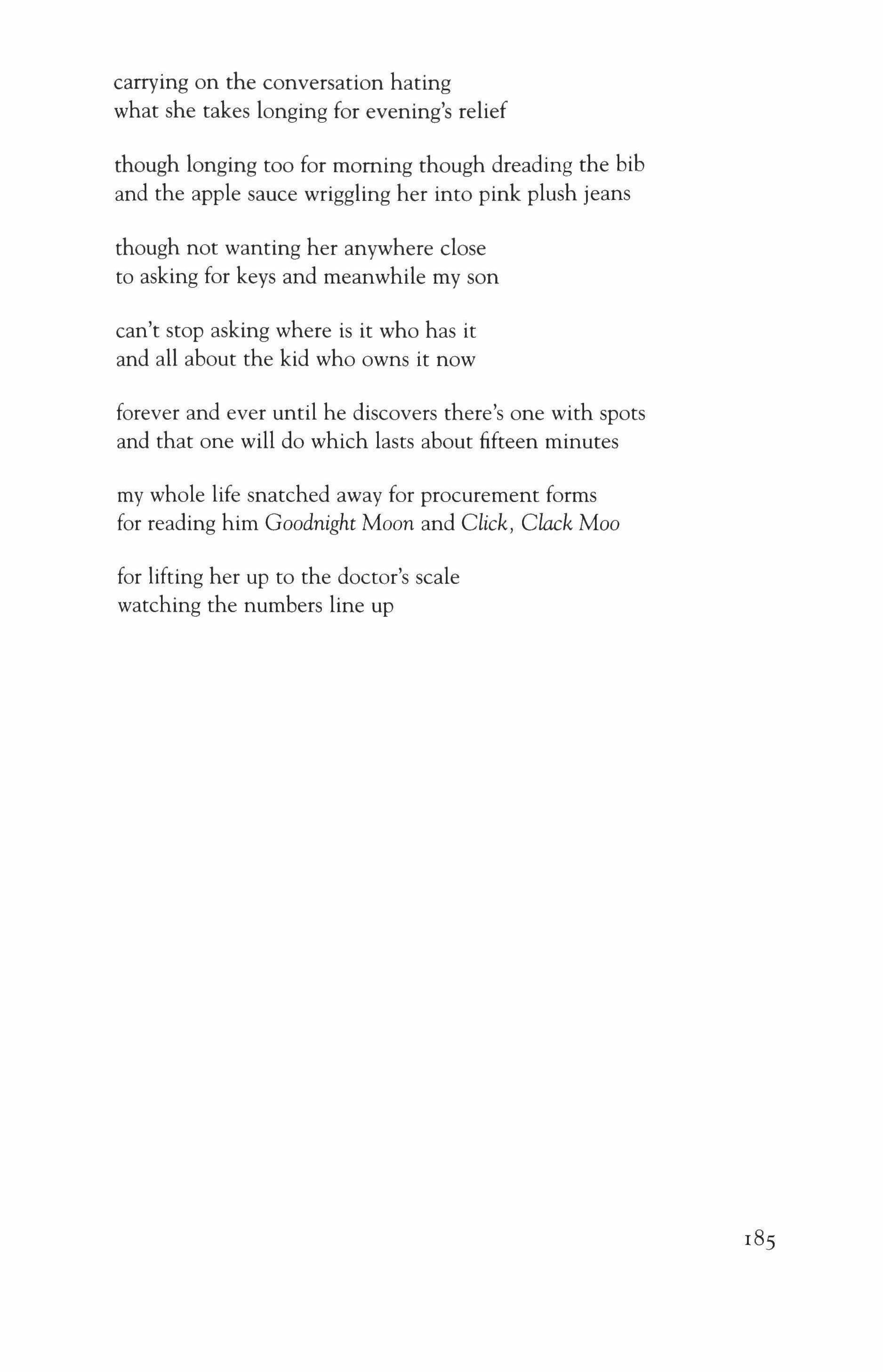
carrying on the conversation hating what she takes longing for evening's relief
though longing too for morning though dreading the bib and the apple sauce wriggling her into pink plush jeans
though not wanting her anywhere close to asking for keys and meanwhile my son
can't stop asking where is it who has it and all about the kid who owns it now
forever and ever until he discovers there's one with spots and that one will do which lasts about fifteen minutes
my whole life snatched away for procurement forms for reading him Goodnight Moon and Click, Clack Moo
for lifting her up to the doctor's scale watching the numbers line up
The Moon, the Moon-She's You

Keep your moonshine in an alfalfa field for me to haul around with one finger in the bottle. Your moonshine in a bottle. Your moonshine at a jobsite to paint the clapboard houses-I'll make one stripe along your nose. The littler brushes we'll dip to paint moon-wet lipstick on the sleepers, extra hearts on the sides of horses. I'll climb your shoulders, then you'll climb mine. Our war paint on the bam we'll smear with lune hearts that bum holes through wood. We're straw. Our tongues tangle into ropes we're so frightened the earth might inhale and tug us apart. Say my tongue slips to paint a kiss along the silky underbelly behind the knee. It would hurt your eyes to look at us: we're kissing bum marks, a scorching border around our land until a wall of shining moon seals us in. I drift to snow when the work is done, drift with a pail tossing moon slop to our skeletons, then tum back and there's that light like comfort falling fleshy from your window. You paint with the ache God gave us, your blood light on the snow from where you lift your nightgown and peel back one rib near the window. Out you pour that which guides me back and I rub a little on my face, cough the nails up that nail down my bones. We're rosy now under the covers, your moon slipping past so swiftly now. You say there's only one day like ours, and I fold your rib down, a little moth of light sparking at the ends of my fingers.
Rybicki
John
186
After a Photo of the Author ina National Magazine
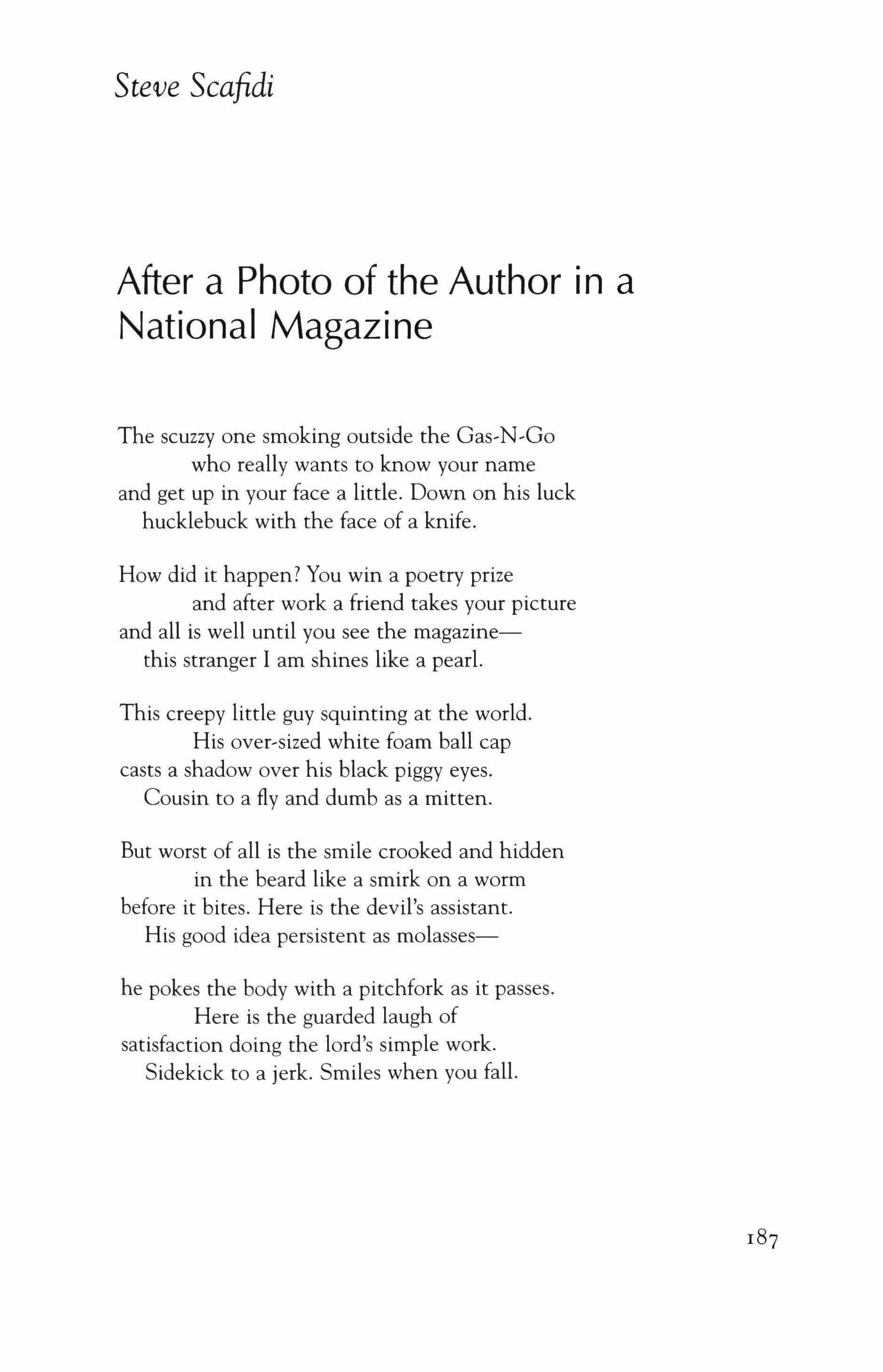
The scuzzy one smoking outside the Gas-N-Go who really wants to know your name and get up in your face a little. Down on his luck hucklebuck with the face of a knife.
How did it happen? You win a poetry prize and after work a friend takes your picture and all is well until you see the magazinethis stranger I am shines like a pearl.
This creepy little guy squinting at the world. His over-sized white foam ball cap casts a shadow over his black piggy eyes. Cousin to a fly and dumb as a mitten.
But worst of all is the smile crooked and hidden in the beard like a smirk on a worm before it bites. Here is the devil's assistant. His good idea persistent as molasseshe pokes the body with a pitchfork as it passes. Here is the guarded laugh of satisfaction doing the lord's simple work. Sidekick to a jerk. Smiles when you fall.
Steve Scafidi
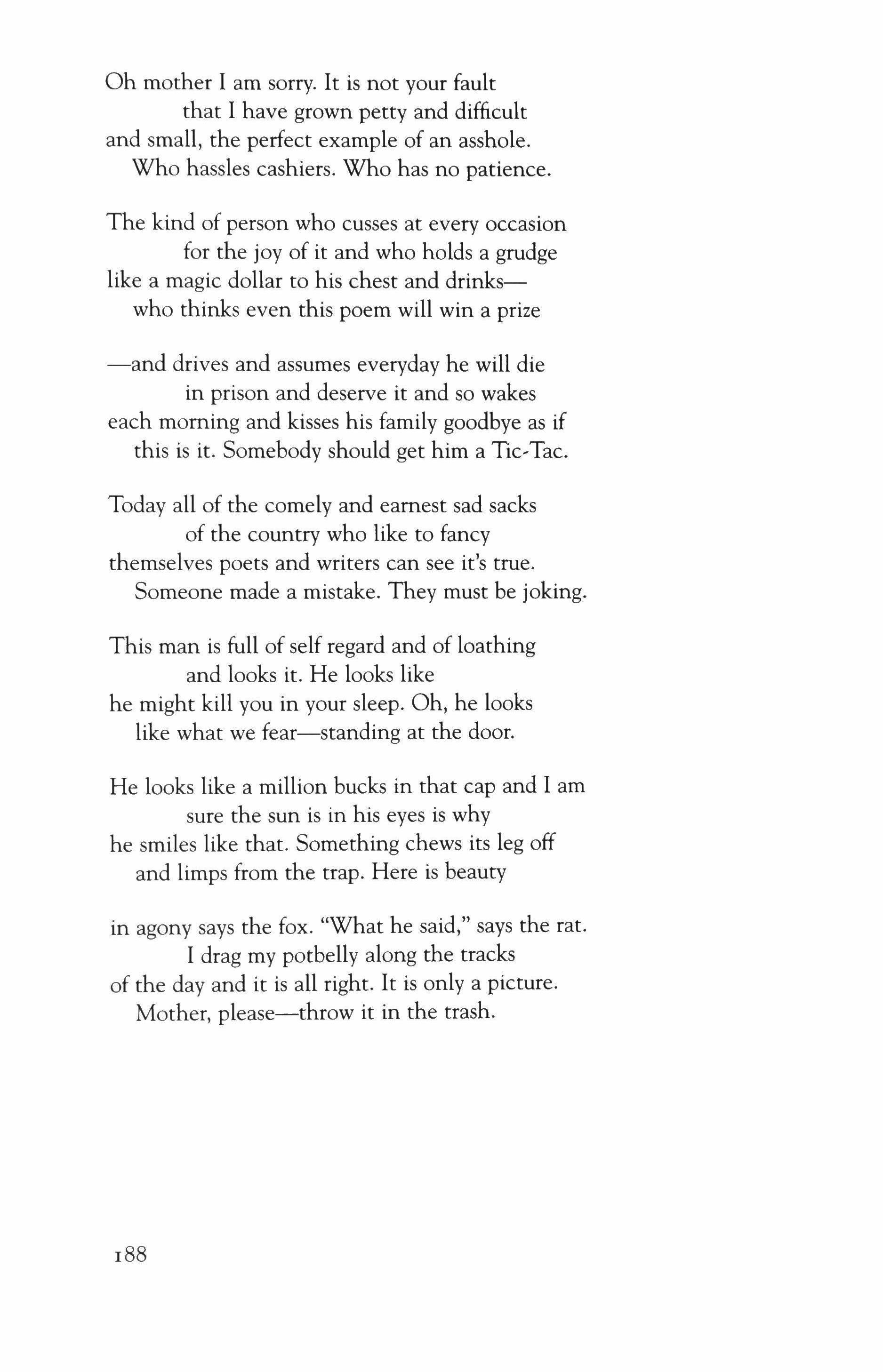
Oh mother I am sorry. It is not your fault that I have grown petty and difficult and small, the perfect example of an asshole. Who hassles cashiers. Who has no patience.
The kind of person who cusses at every occasion for the joy of it and who holds a grudge like a magic dollar to his chest and drinkswho thinks even this poem will win a prize -and drives and assumes everyday he will die in prison and deserve it and so wakes each morning and kisses his family goodbye as if this is it. Somebody should get him a Tic-Tac.
Today all of the comely and earnest sad sacks of the country who like to fancy themselves poets and writers can see it's true. Someone made a mistake. They must be joking.
This man is full of self regard and of loathing and looks it. He looks like he might kill you in your sleep. Oh, he looks like what we fear-standing at the door.
He looks like a million bucks in that cap and I am sure the sun is in his eyes is why he smiles like that. Something chews its leg off and limps from the trap. Here is beauty in agony says the fox. "What he said," says the rat. I drag my potbelly along the tracks of the day and it is all right. It is only a picture. Mother, please-throw it in the trash.
188
David Clewell
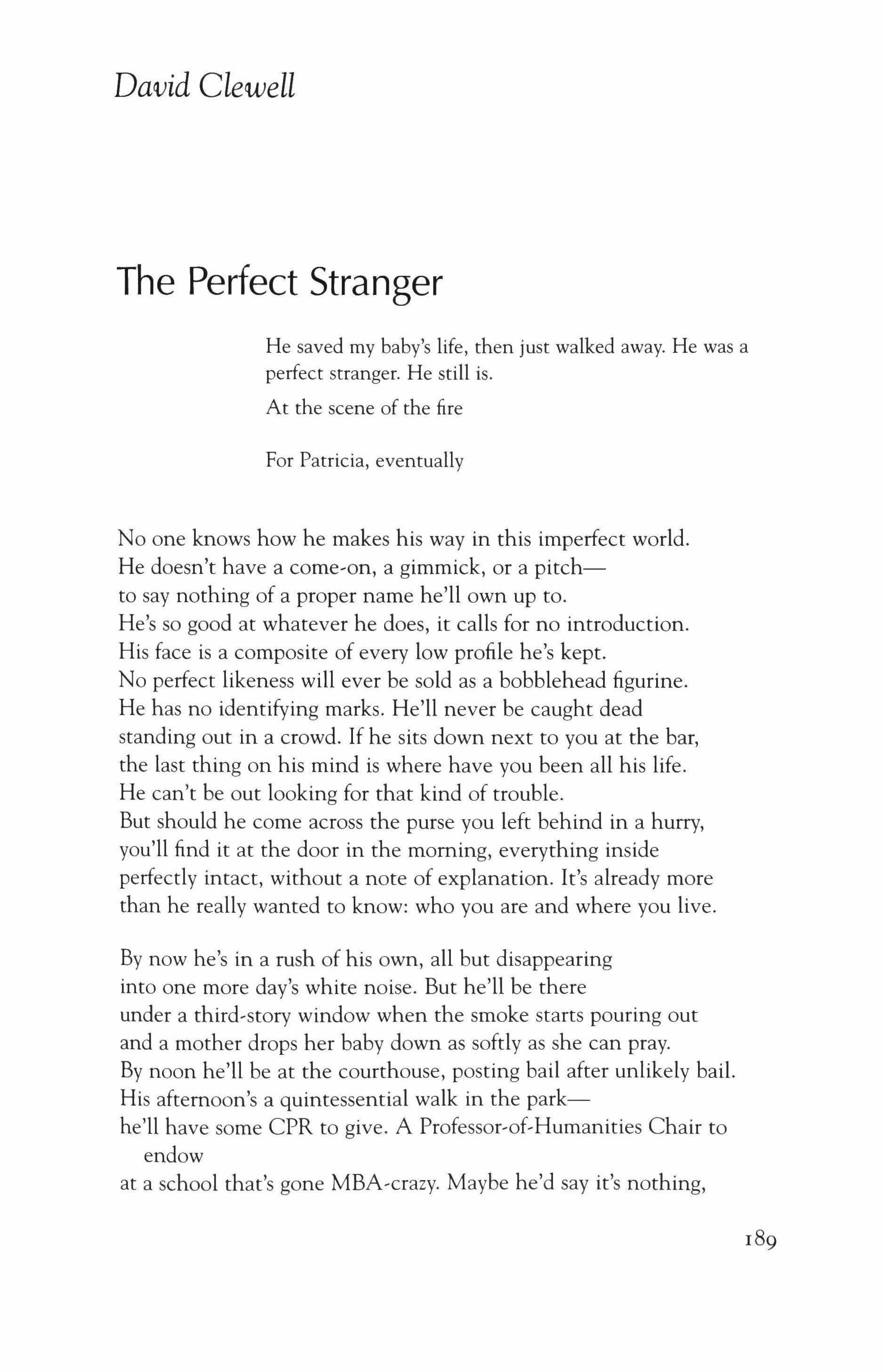
The Perfect Stranger
He saved my baby's life, then just walked away. He was a perfect stranger. He still is.
At the scene of the fire
For Patricia, eventually
No one knows how he makes his way in this imperfect world. He doesn't have a come-on, a gimmick, or a pitchto say nothing of a proper name he'll own up to. He's so good at whatever he does, it calls for no introduction. His face is a composite of every low profile he's kept. No perfect likeness will ever be sold as a bobblehead figurine. He has no identifying marks. He'll never be caught dead standing out in a crowd. If he sits down next to you at the bar, the last thing on his mind is where have you been all his life. He can't be out looking for that kind of trouble. But should he come across the purse you left behind in a hurry, you'll find it at the door in the morning, everything inside perfectly intact, without a note of explanation. It's already more than he really wanted to know: who you are and where you live.
By now he's in a rush of his own, all but disappearing into one more day's white noise. But he'll be there under a third-story window when the smoke starts pouring out and a mother drops her baby down as softly as she can pray. By noon he'll be at the courthouse, posting bail after unlikely bail. His afternoon's a quintessential walk in the parkhe'll have some CPR to give. A Professor-of-Humanities Chair to endow at a school that's gone MBA�crazy. Maybe he'd say it's nothing,

really, if only he felt like talking. What else does he have to do except to show up where he's so completely unexpected? It's never going to be his day to drive the office carpool. He won't be counted on, looked forward to.
Statistically speaking, we're usually strangers ourselves, and I don't know how in the world some days most of us are nothing if not civil to each other. But the perfect stranger would seem to be another matter entirely.
Sometimes in his sleep he dreams up secret imperfections: he's washing whites with colors. Forgets to tum off the lights. Or there's a knife stuck deep in the toaster again, mud on the dress boots or blood in the sink, the wrong-size spoon stirring quietly in the soup. His bid for a perfect game is spoiled by a 3-2 pitch in the dirt. But who's he kidding? When he wakes up, there's not a chance in hell those things will happen.
When I woke up today I thought of him sitting down for breakfast, bending over a plate of eggs cooked, of course, to perfection. And I was strangely relieved to think he might be out there somewhere, carrying the ball for everyone who can't quite measure up. But then again he doesn't have the likes of you to lie down next to, his concentration so utterly blown on a regular basis.
Surely you must know by now how often you're the reason for these imperfect words-even when it doesn't seem that way at first. But notice how, just four lines up, a perfect stranger led me back to you. And he'll be out of here soon enough. This poem actually began so long ago, it's not even funny. Before the perfect stranger came to me, I was working hard on the Moon, sweating out some Space-Race-paranoia epic, or so I supposed. But even on the Moon I couldn't stop myself from saying sometimes it's hard to tell apart the two extremes of lovethe giddy weightlessness, the stubborn sense of gravity. And then I said we're better off not trying.
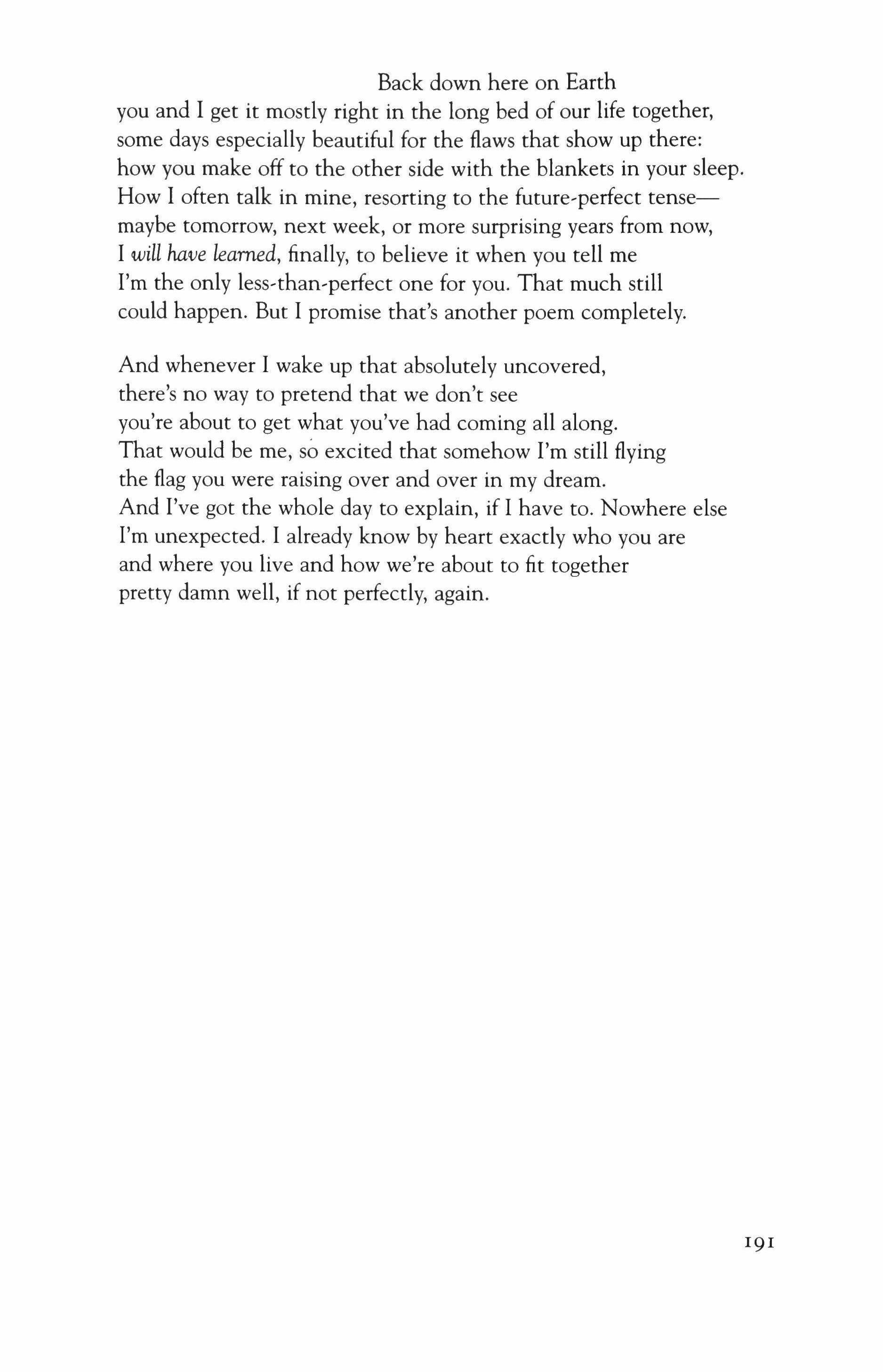
Back down here on Earth you and I get it mostly right in the long bed of our life together, some days especially beautiful for the flaws that show up there: how you make off to the other side with the blankets in your sleep. How I often talk in mine, resorting to the future-perfect tensemaybe tomorrow, next week, or more surprising years from now, I will have learned, finally, to believe it when you tell me I'm the only less-than-perfect one for you. That much still could happen. But I promise that's another poem completely.
And whenever I wake up that absolutely uncovered, there's no way to pretend that we don't see you're about to get what you've had coming all along. That would be me, so excited that somehow I'm still flying the flag you were raising over and over in my dream. And I've got the whole day to explain, if I have to. Nowhere else I'm unexpected. I already know by heart exactly who you are and where you live and how we're about to fit together pretty damn well, if not perfectly, again.
Cathleen Calbert
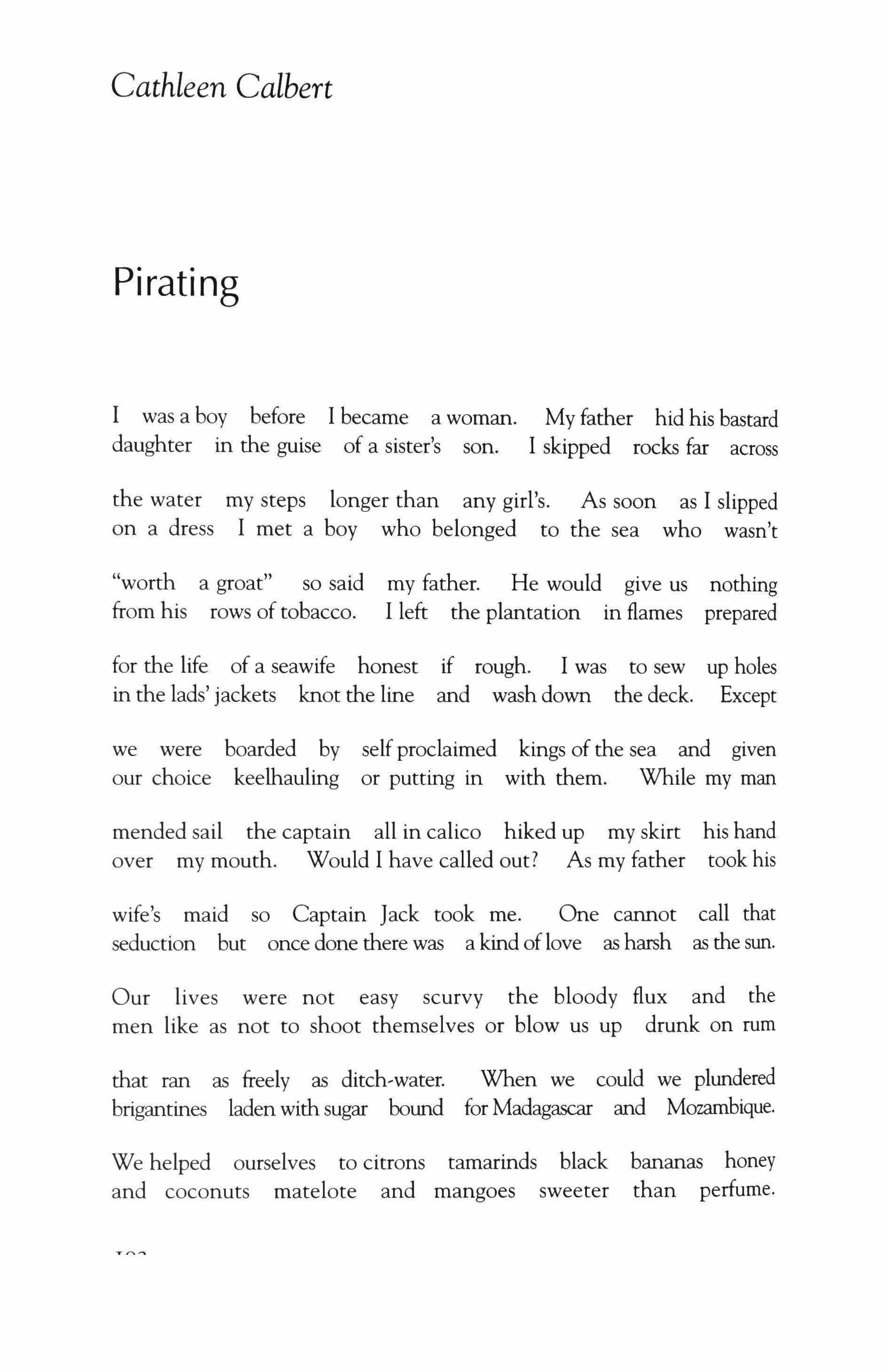
Pirating
I was a boy before I became a woman. daughter in the guise of a sister's son. My father hid his bastard I skipped rocks far across the water my steps longer than any girl's. As soon as I slipped on a dress I met a boy who belonged to the sea who wasn't
"worth a groat" so said from his rows of tobacco. my father. He would give us nothing I left the plantation in flames prepared for the life of a seawife honest if rough. I was to sew up holes in the lads' jackets knot the line and wash down the deck. Except
we were boarded by self proclaimed kings of the sea and given our choice keelhauling or putting in with them. While my man mended sail the captain all in calico hiked up my skirt his hand over my mouth. Would I have called out? As my father took his wife's maid so Captain Jack took me. One cannot call that seduction but once done there was a kind oflove as harsh as the sun.
Our lives were not easy scurvy the bloody flux and the men like as not to shoot themselves or blow us up drunk on rum that ran as freely as ditch,water. When we could we plundered brigantines laden with sugar bound for Madagascar and Mozambique.
We helped ourselves to citrons tamarinds black bananas honey and coconuts matelote and mangoes sweeter than perfume.
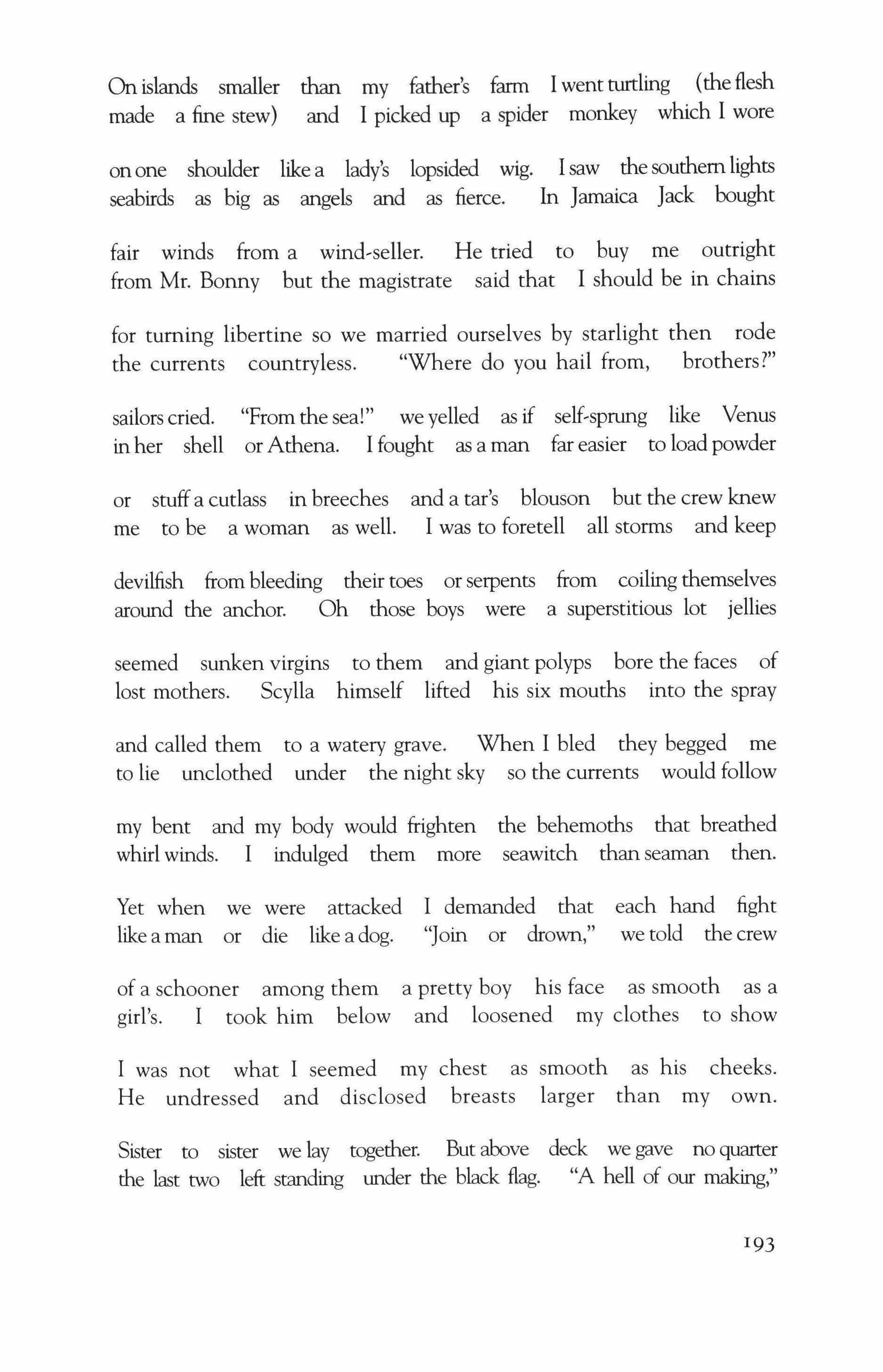
On islands smaller than my father's farm I went turtling (theflesh made a fine stew) and I picked up a spider monkey which I wore
on one shoulder like a lady's lopsided wig. I saw the southern lights seabirds as big as angels and as fierce. In Jamaica Jack bought fair winds from a wind-seller, He tried to buy me outright from Mr. Bonny but the magistrate said that I should be in chains for turning libertine so we married ourselves by starlight then rode the currents countryless. "Where do you hail from, brothers?"
sailors cried. "From the sea!" we yelled as if self-sprung like Venus inher shell or Athena. I fought as a man far easier to load powder
or stuff a cutlass in breeches and a tar's blouson but the crew knew me to be a woman as well. I was to foretell all storms and keep
devilfish from bleeding their toes or serpents from coiling themselves around the anchor. Oh those boys were a superstitious lot jellies seemed sunken virgins to them and giant polyps bore the faces of lost mothers. Scylla himself lifted his six mouths into the spray and called them to a watery grave. When I bled they begged me to lie unclothed under the night sky so the currents would follow
my bent and my body would frighten the behemoths that breathed whirl winds. I indulged them more seawitch than seaman then.
Yet when we were attacked I demanded that each hand fight like a man or die like a dog. "Join or drown," we told the crew
of a schooner among them a pretty boy his face as smooth as a girl's. took him below and loosened my clothes to show
I was not what I seemed my chest as smooth as his cheeks. He undressed and disclosed breasts larger than my own.
Sister to sister we lay together. But above deck we gave no quarter the last two left standing under the black flag. "A hell of our making,"
193

declared the judge. "Hang the dogs. Have mercy on their souls." All swung. Captain Jack they strung up on the bluffs of Kingston.
Mary and I pled our bellies. The seeds of men had taken root. No steps and string for us until we were relieved of our burdens.
I held my girl in the damp gaol cell. I felt her heat rise to the skies rise to heaven. Alone then I obliged the world with an orphan.
But someone my father? intervened enough bullion and I was free to leave with a bastard ofmy own to raise. I tell you the old man
can set a place for me I still walk on water. and mine all the days ofhis life ifhe likes. My daughter makes a fine first mate.
Together we have rounded Cape Horn the Cape of Good Hope and gone on to uncharted waters where live the famed fish tailed maids whose hair is as green as seafire. After sunset their skin looks like the skin ofdead men their eyes unholy emeralds.
Even count them unlucky then but at dawn they bathe on rocks and comb their seaweed tresses as they gaze into mirrors encrusted with starfish and abalone at a past of endless waves living in a way backwards as is their wont since they worship the moon not the sun. They shall summon two sailors neither men nor women to a feast under the sea whenever we tire of roving.
194
Caroline Knox
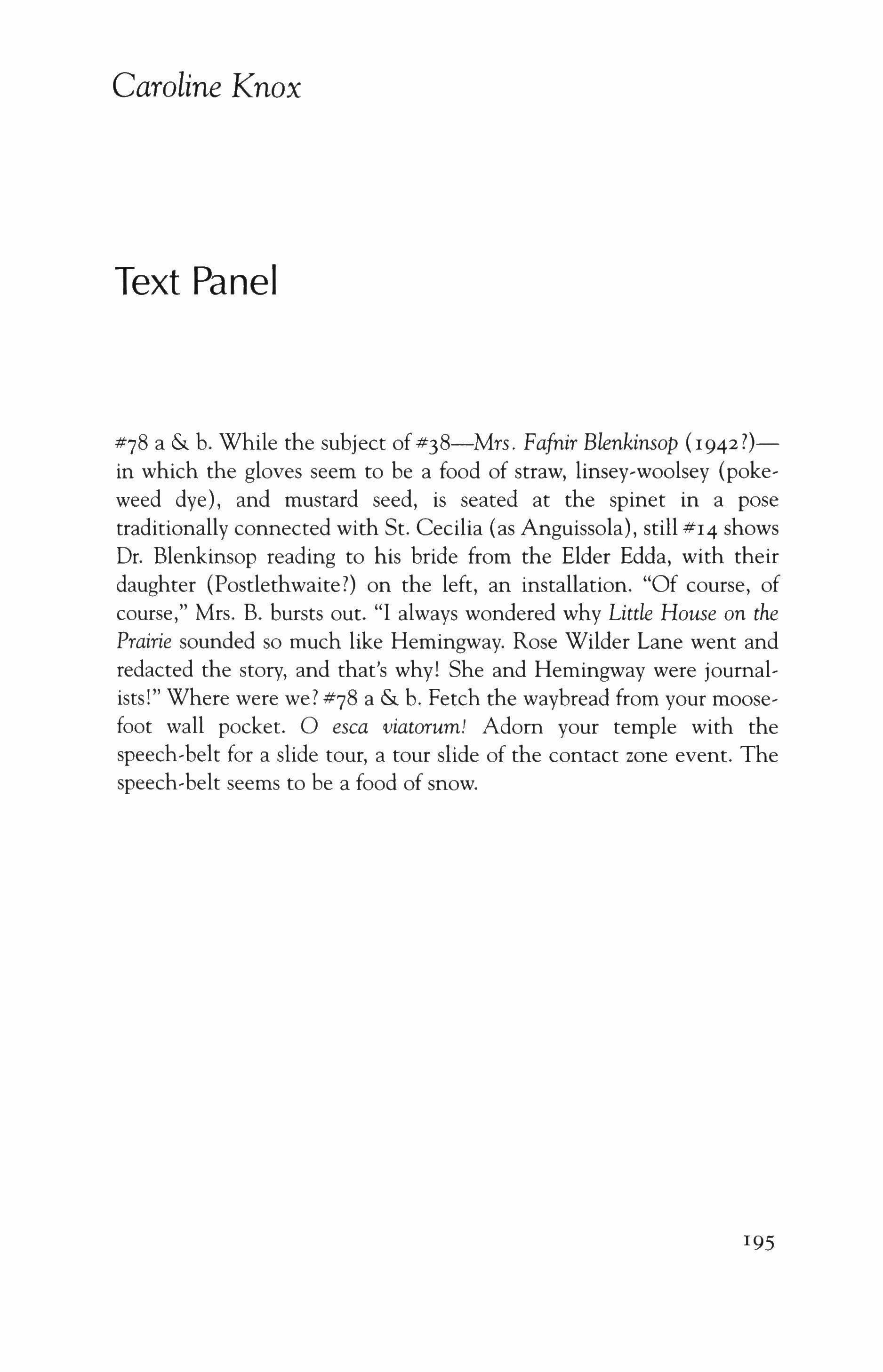
Text Panel
#78 a & b. While the subject of #38-Mrs. Fafnir Blenkinsop (1942?)in which the gloves seem to be a food of straw, linsev-woolsev (poke, weed dye), and mustard seed, is seated at the spinet in a pose traditionally connected with St. Cecilia (as Anguissola), still #14 shows Dr. Blenkinsop reading to his bride from the Elder Edda, with their daughter (Postlethwaite?) on the left, an installation. "Of course, of course," Mrs. B. bursts out. "I always wondered why Little House on the Prairie sounded so much like Hemingway. Rose Wilder Lane went and redacted the story, and that's why! She and Hemingway were journal, ists!" Where were we? #78 a & b. Fetch the waybread from your moose, foot wall pocket. 0 esca viatorum! Adorn your temple with the speech-belt for a slide tour, a tour slide of the contact zone event. The speech-belt seems to be a food of snow.
195
Roy Jacobstein
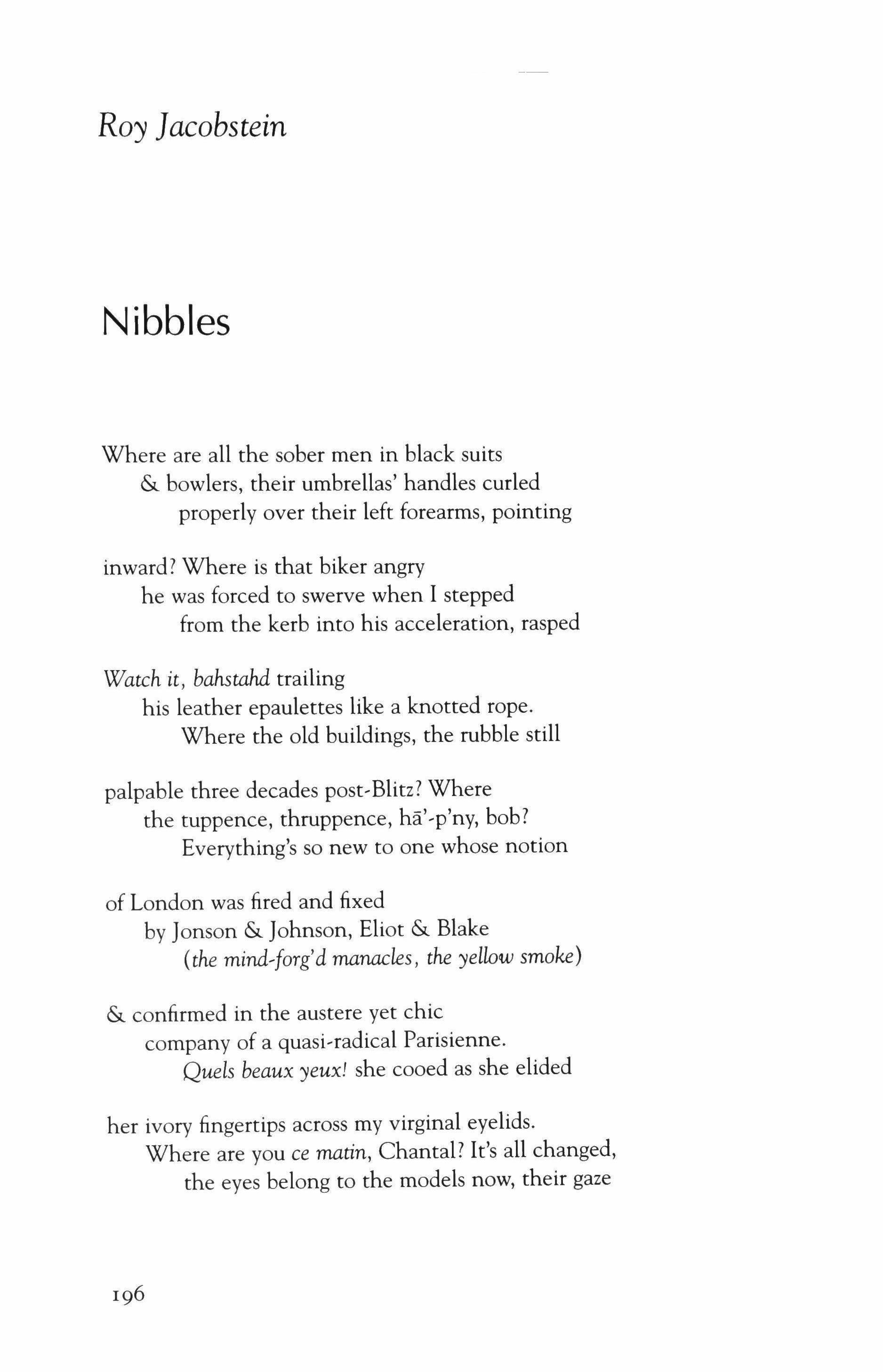
Nibbles
Where are all the sober men in black suits & bowlers, their umbrellas' handles curled properly over their left forearms, pointing inward? Where is that biker angry he was forced to swerve when I stepped from the kerb into his acceleration, rasped
Watch it, bahstahd trailing his leather epaulettes like a knotted rope. Where the old buildings, the rubble still palpable three decades post-Blitz? Where the tuppence, thruppence, ha'-p'ny, bob? Everything's so new to one whose notion of London was fired and fixed by Jonson & Johnson, Eliot & Blake (the mind-forg'd manacles, the yellow smoke) & confirmed in the austere yet chic company of a quasi-radical Parisienne. Quels beaux yeux! she cooed as she elided her ivory fingertips across my virginal eyelids. Where are you ce marin, Chantal? It's all changed, the eyes belong to the models now, their gaze
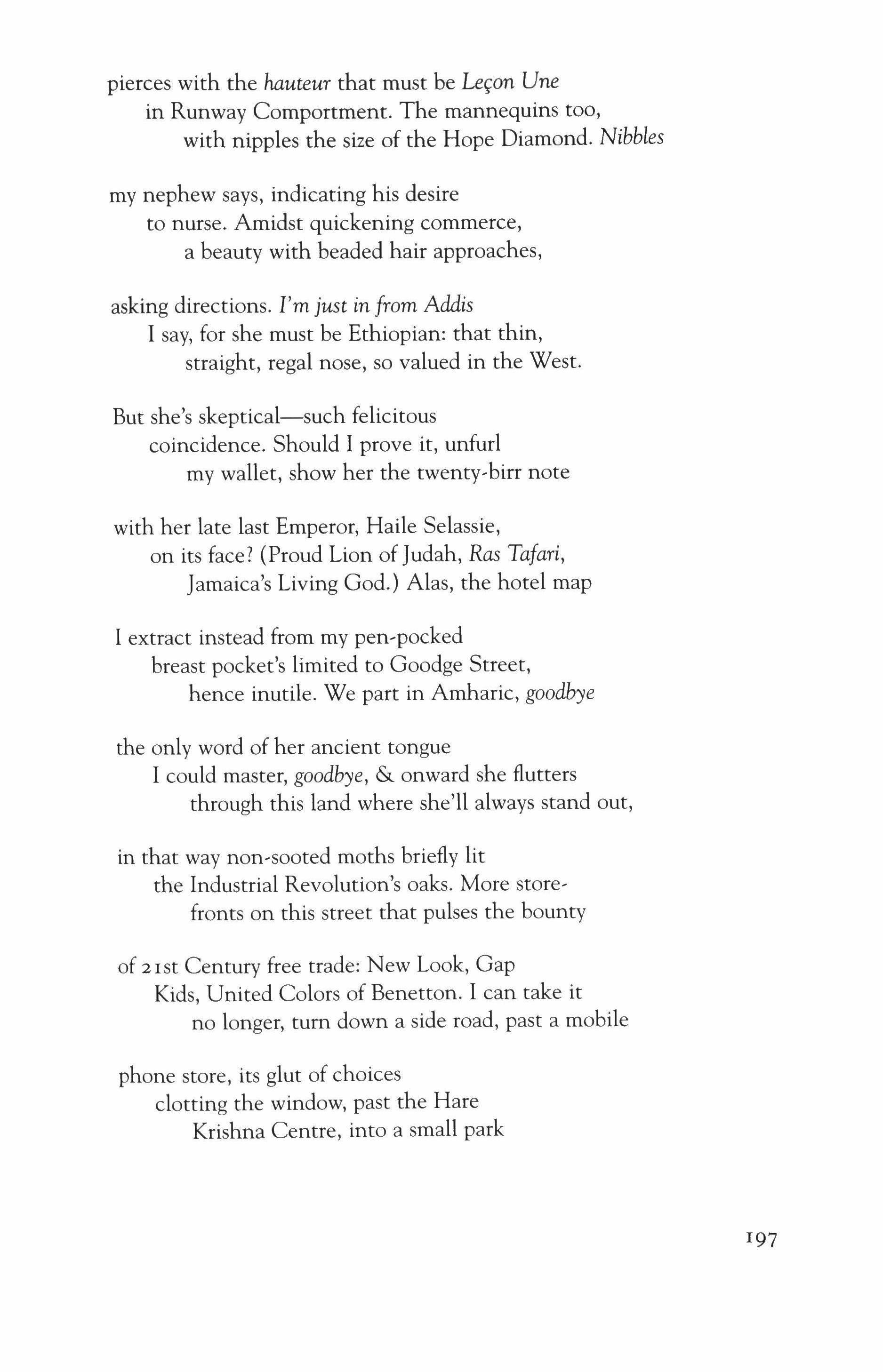
pierces with the hauteur that must be Lecon Une in Runway Comportment. The mannequins too, with nipples the size of the Hope Diamond. Nibbles
my nephew says, indicating his desire to nurse. Amidst quickening commerce, a beauty with beaded hair approaches, asking directions. I'm just in from Addis I say, for she must be Ethiopian: that thin, straight, regal nose, so valued in the West.
But she's skeptical-such felicitous coincidence. Should I prove it, unfurl my wallet, show her the twenty-birr note with her late last Emperor, Haile Selassie, on its face? (Proud Lion of judah, Ras Tafari, Jamaica's Living God.) Alas, the hotel map
I extract instead from my pen-pocked breast pocket's limited to Goodge Street, hence inutile. We part in Amharic, goodbye the only word of her ancient tongue I could master, goodbye, & onward she flutters through this land where she'll always stand out,
in that way non-sooted moths briefly lit the Industrial Revolution's oaks. More storefronts on this street that pulses the bounty
of z r st Century free trade: New Look, Gap Kids, United Colors of Benetton. I can take it no longer, tum down a side road, past a mobile phone store, its glut of choices clotting the window, past the Hare Krishna Centre, into a small park
197

where tranquil in the distance stands the classic red telephone booth from which Clark Kent (ne Jor�EI) would have emerged
transformed, had a Brit not a poor immigrant in New York created Superman (& Kryptonite). Abruptly the spring sun has riven the usual horde of leaden clouds, inducing a squint & an illusion of warmth. The masses you loved yet scorned have gathered at my feet, the same useless purple iridescence flecking their neck feathers, & they still linger, even after it's clear one has no seed to scatter.
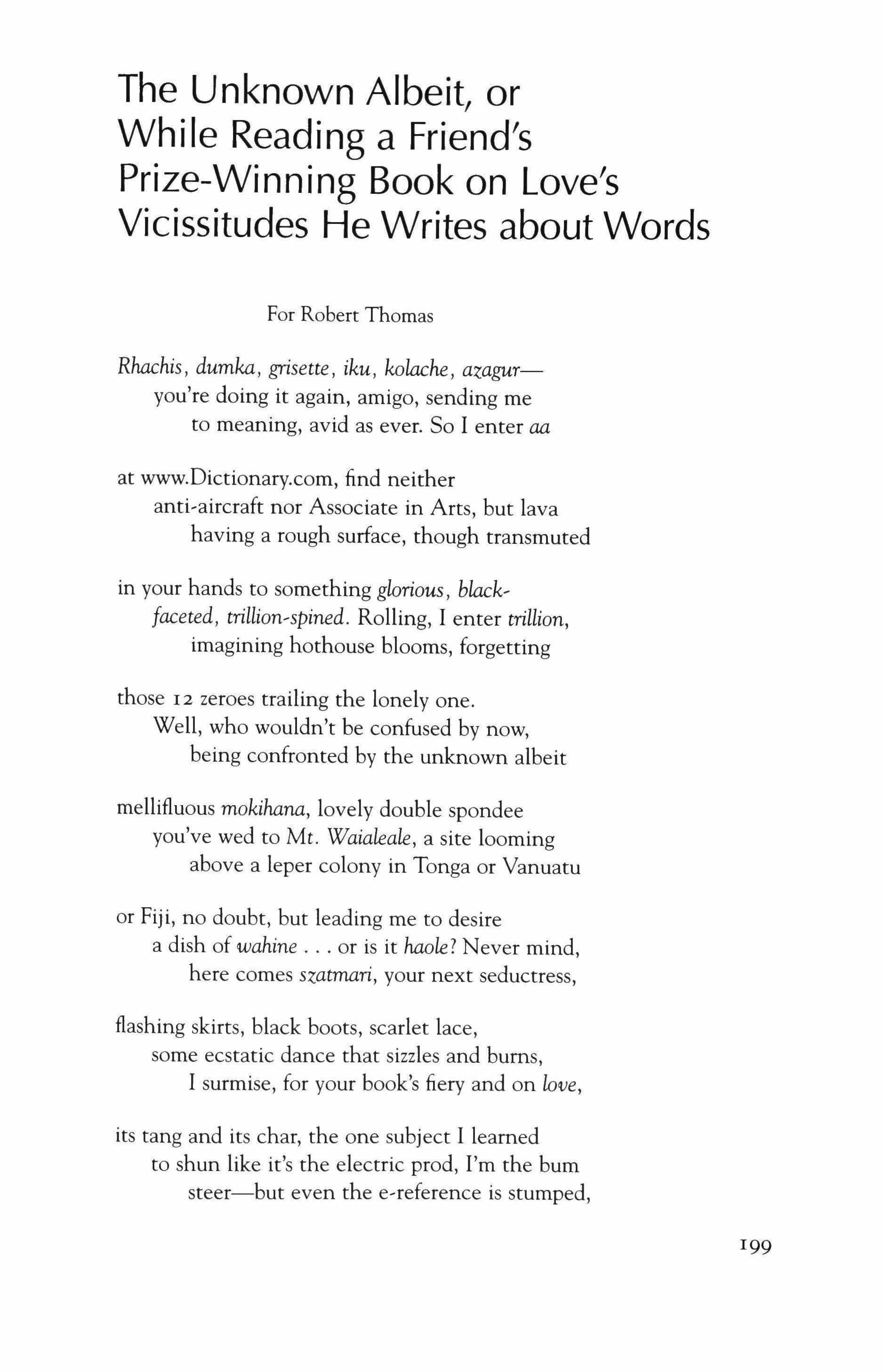
The Unknown Albeit, or While Reading a Friend's Prize-Winning Book on Love's Vicissitudes He Writes about Words
For Robert Thomas
Rhachis, dumka, grisette, iku, kolache, azaguryou're doing it again, amigo, sending me to meaning, avid as ever. So I enter aa at www.Dictionarv.com, find neither anti-aircraft nor Associate in Arts, but lava having a rough surface, though transmuted in your hands to something glorious, blackfaceted, trillion-spined. Rolling, I enter trillion, imagining hothouse blooms, forgetting those 12 zeroes trailing the lonely one. Well, who wouldn't be confused by now, being confronted by the unknown albeit mellifluous mokihana, lovely double spondee you've wed to Mt. Waialeale, a site looming above a leper colony in Tonga or Vanuatu or Fiji, no doubt, but leading me to desire a dish of wahine or is it haole? Never mind, here comes sratmati, your next seductress, flashing skirts, black boots, scarlet lace, some ecstatic dance that sizzles and bums, I surmise, for your book's fiery and on love, its tang and its char, the one subject I learned to shun like it's the electric prod, I'm the bum steer-but even the e-reference is stumped,
199

though clueless it's not, proffering alternatives, crypto-homonymous kin. Thus I'm queried do I intend Satu Mare, and lo!,
only a click away arises a medieval walled city in Transylvania, setting for Stoker's gothic horror novel whose vampire lends his name to a bevy of diminutive tropical plants (genus Draculae) having bizarre, sinister-looking purple flowers with pendulous scapes and hyper-motile lips-
which sounds a hell of a lot like the love I would write about if I wrote about love, which is why I don't, but it's sure good
to know when I reject Satu Mare there's still stammerer and stud mare left for me to consider, and I do.
200
Nin Andrews

Depression
Look, I've Been Cut in Half!
One side has eyes. The other is blind. One has a heart, the other a knife. There is so much distance between my halves, you could drive a car right through me.
Maybe you think it's simple: on one side there's shadows and the other light. On one side there's dreams and the other life.
But yesterday I saw a cab run over a cyclist. When I looked up, a crow was circling. The sun turned black. No one knew my name, not even me. What do you want? God asked. Everything, I said. But it wasn't true. In the distance between what one says and the other means, there's so much ache. Sometimes I can't help it. I talk to myself. Let's go, I always say. Let's get out of this fucking place. Then she wraps herself around me like a wave.
201
Dear Professor
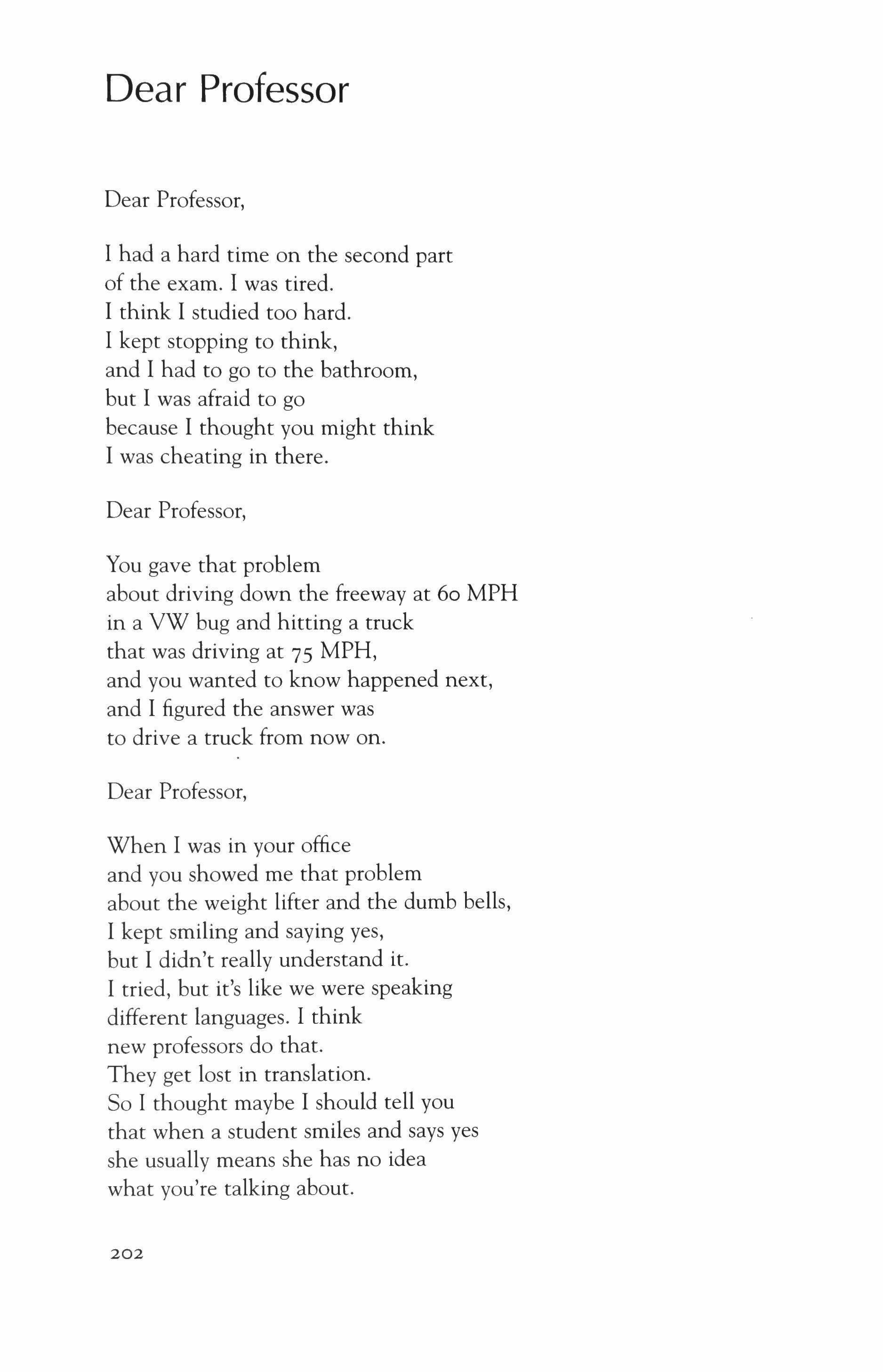
Dear Professor,
I had a hard time on the second part of the exam. I was tired. I think I studied too hard. I kept stopping to think, and I had to go to the bathroom, but I was afraid to go because I thought you might think I was cheating in there.
Dear Professor, You gave that problem about driving down the freeway at 60 MPH in a VW bug and hitting a truck that was driving at 75 MPH, and you wanted to know happened next, and I figured the answer was to drive a truck from now on.
Dear Professor,
When I was in your office and you showed me that problem about the weight lifter and the dumb bells, I kept smiling and saying yes, but I didn't really understand it.
I tried, but it's like we were speaking different languages. I think new professors do that. They get lost in translation. So I thought maybe I should tell you that when a student smiles and says yes she usually means she has no idea what you're talking about.
202
Danielle Pafunda

Who Chose Marie Antoinette
I was a college girl, and I'd been brow down on the quad. Earlier, I'd been stringing along in a third floor room, silhouette vice grip on the stroll below.
I knew, for instance, the gun was loaded. A long rope, the hiss of pipe, the fat valise.
So, you might say I was recruited. I left that world in my cotton duck. I didn't pack his monogrammed fiber or her wheeze of pearls. Don't think we didn't know what we were about.
We raked every road sign with a Molotov.
203
Who Chose Golda Meir
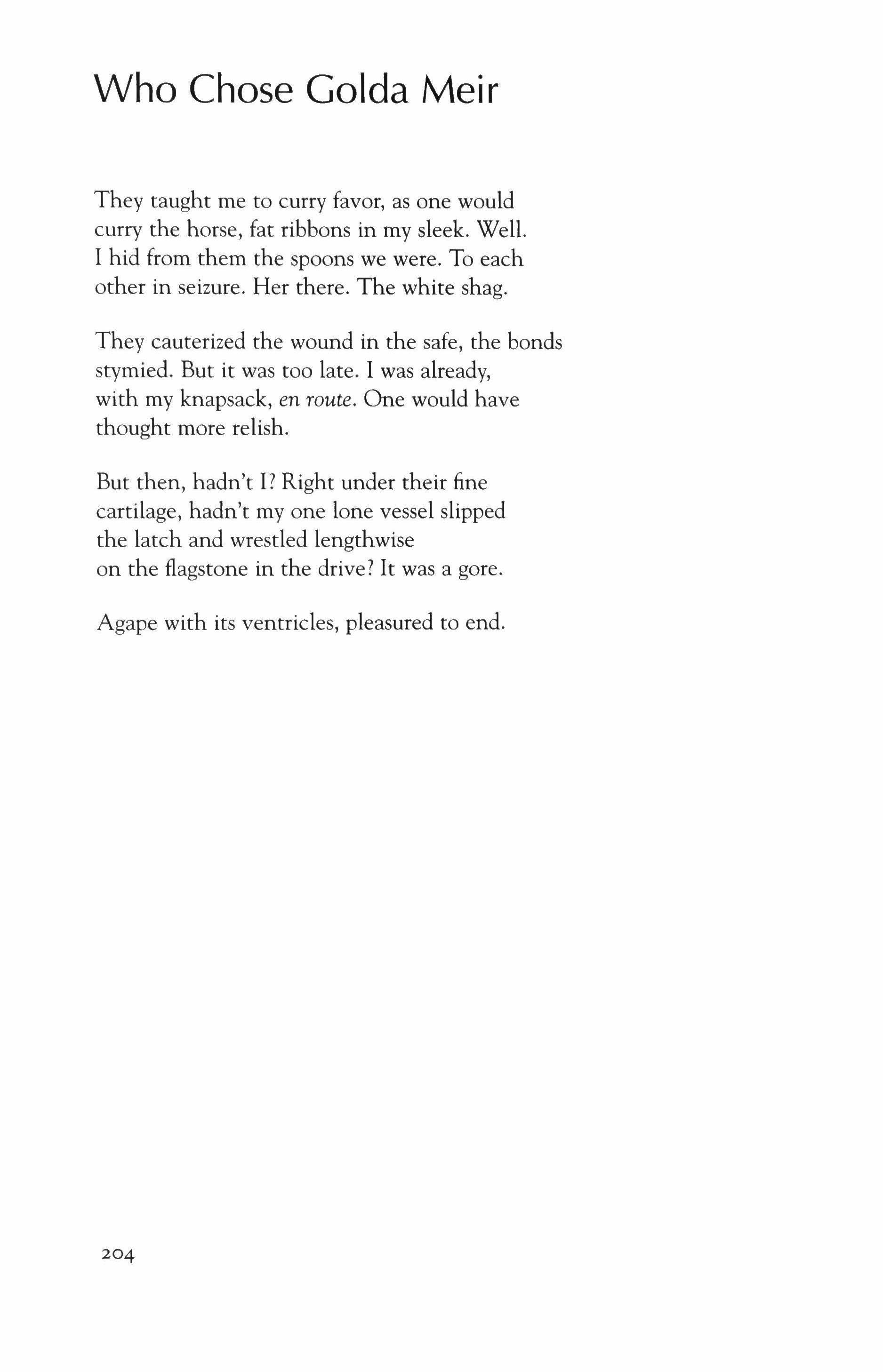
They taught me to curry favor, as one would curry the horse, fat ribbons in my sleek. Well. I hid from them the spoons we were. To each other in seizure. Her there. The white shag.
They cauterized the wound in the safe, the bonds stymied. But it was too late. I was already, with my knapsack, en route. One would have thought more relish.
But then, hadn't I? Right under their fine cartilage, hadn't my one lone vessel slipped the latch and wrestled lengthwise on the flagstone in the drive? It was a gore.
Agape with its ventricles, pleasured to end.
204
Joseph Millar

Harriet Matthias Wickersham
They put me in charge of the big house after the strokes finally took you, left me alone in your sumptuous apartment marking time till the final sale closed, watching re-runs of The Untouchables, smoking Panama Red. The grand furniture skulked in the comers fuming with resin and camphor: the mahogany armoire, the ringed chest of drawers stout relatives I'd met once as a child carried away piece by piece to their split-level in Cherry Hill. My mother's portrait gleamed there, bright ghost presiding over the wine-colored rug where dense ethers rose from the garden, drifted against the windows.
I moved my friends in: their saxophones, their tapes of Bo Diddley and Howlin' Wolf. Mr. Adler practiced Chopin upstairs on a scarred baby grand. I collected the rents. When the hot water thermostat failed to shut off steam rose from the basins and toilets till the supply pipe blew free of the heater filling the basement with sludge. Water surrounded us all that year: the morning I thought I'd seen your face in the lilac tree under the fire escape I emptied your ashes into Westtown Lake where my mother's had floated so long before.
205
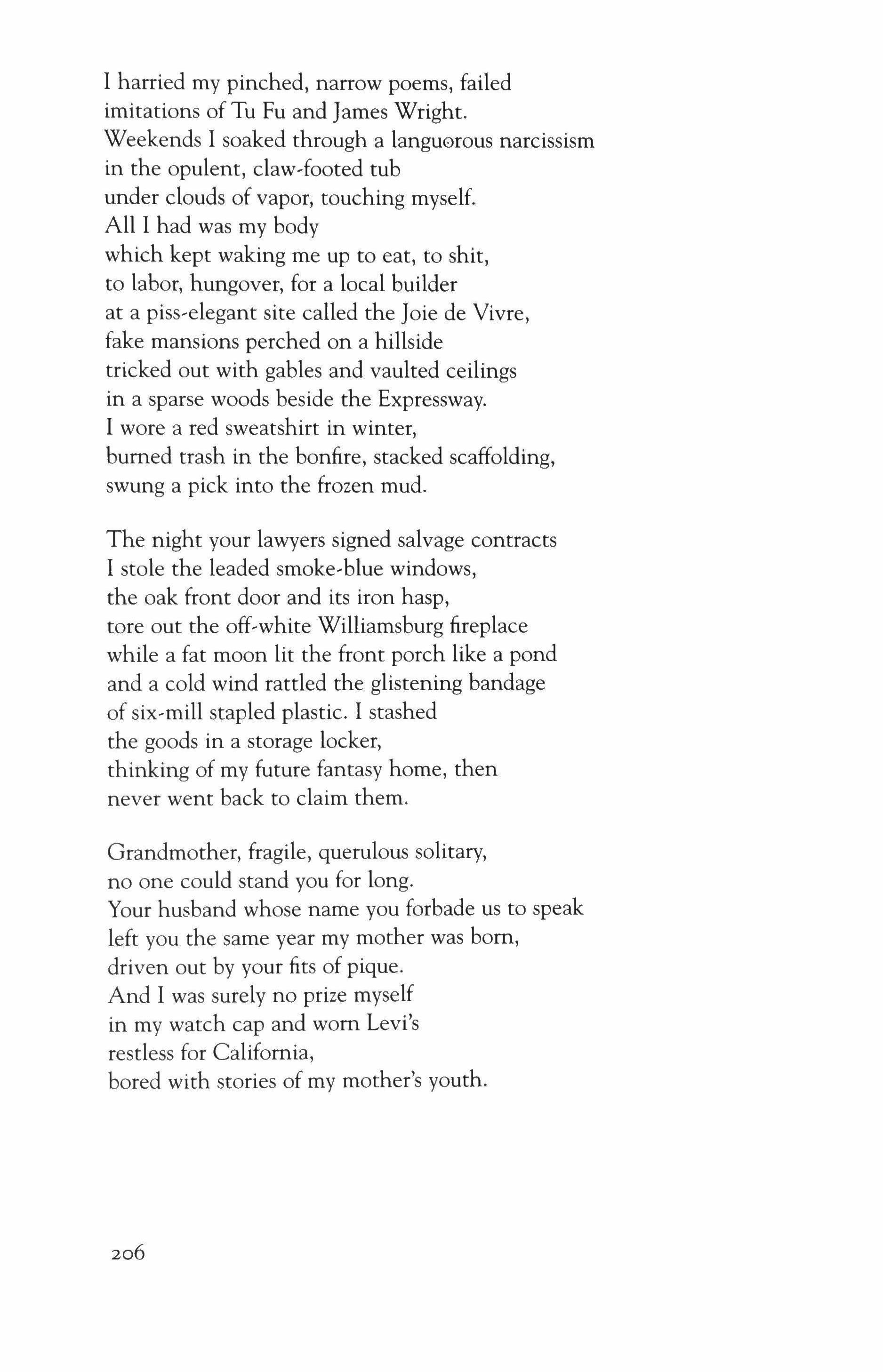
I harried my pinched, narrow poems, failed imitations of Tu Fu and James Wright. Weekends I soaked through a languorous narcissism in the opulent, claw-footed tub under clouds of vapor, touching myself. All I had was my body which kept waking me up to eat, to shit, to labor, hungover, for a local builder at a piss-elegant site called the [oie de Vivre, fake mansions perched on a hillside tricked out with gables and vaulted ceilings in a sparse woods beside the Expressway. I wore a red sweatshirt in winter, burned trash in the bonfire, stacked scaffolding, swung a pick into the frozen mud.
The night your lawyers signed salvage contracts I stole the leaded smoke-blue windows, the oak front door and its iron hasp, tore out the off-white Williamsburg fireplace while a fat moon lit the front porch like a pond and a cold wind rattled the glistening bandage of six-mill stapled plastic. I stashed the goods in a storage locker, thinking of my future fantasy home, then never went back to claim them.
Grandmother, fragile, querulous solitary, no one could stand you for long. Your husband whose name you forbade us to speak left you the same year my mother was born, driven out by your fits of pique. And I was surely no prize myself in my watch cap and worn Levi's restless for California, bored with stories of my mother's youth.
206
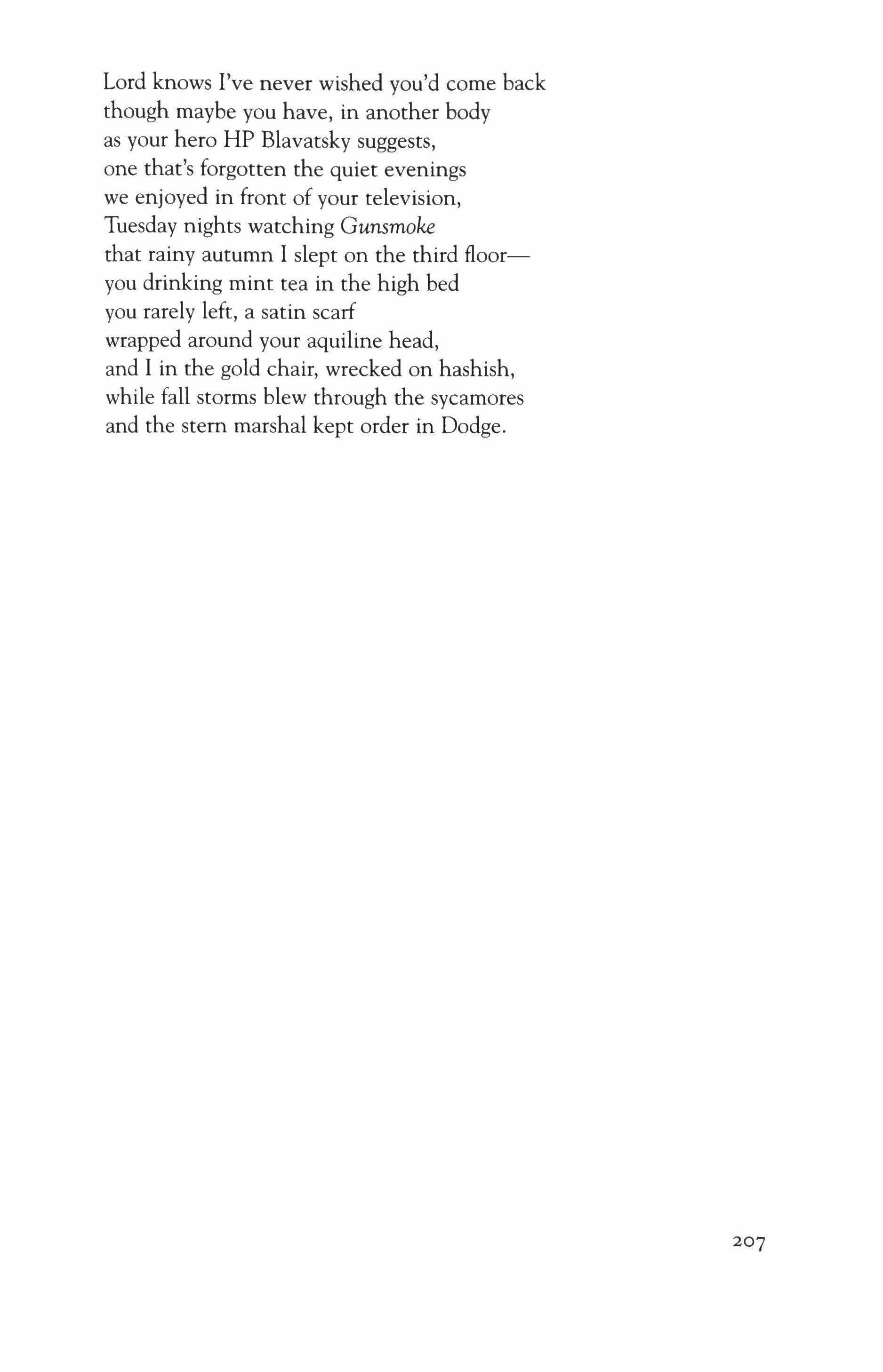
Lord knows I've never wished you'd come back though maybe you have, in another body as your hero HP Blavatsky suggests, one that's forgotten the quiet evenings we enjoyed in front of your television, Tuesday nights watching Gunsmoke that rainy autumn I slept on the third flooryou drinking mint tea in the high bed you rarely left, a satin scarf wrapped around your aquiline head, and I in the gold chair, wrecked on hashish, while fall storms blew through the sycamores and the stem marshal kept order in Dodge.
207
Dick Allen
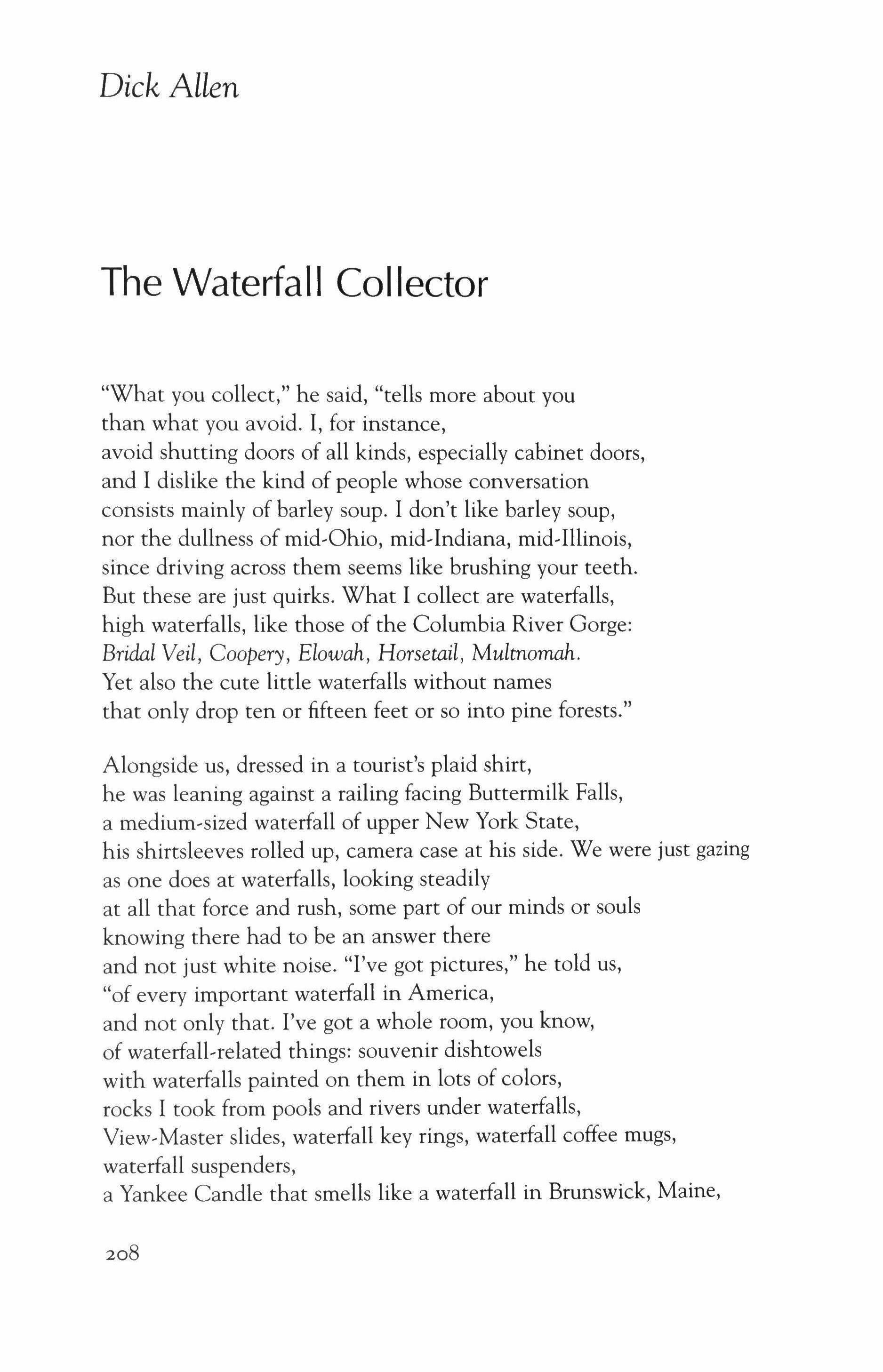
The Waterfall Collector
"What you collect," he said, "tells more about you than what you avoid. I, for instance, avoid shutting doors of all kinds, especially cabinet doors, and I dislike the kind of people whose conversation consists mainly of barley soup. I don't like barley soup, nor the dullness of mid-Ohio, mid-Indiana, mid-Illinois, since driving across them seems like brushing your teeth. But these are just quirks. What I collect are waterfalls, high waterfalls, like those of the Columbia River Gorge: Bridal Veil, Coopery, Elowah, Horsetail, Multnomah. Yet also the cute little waterfalls without names that only drop ten or fifteen feet or so into pine forests."
Alongside us, dressed in a tourist's plaid shirt, he was leaning against a railing facing Buttermilk Falls, a medium-sized waterfall of upper New York State, his shirtsleeves rolled up, camera case at his side. We were just gazing as one does at waterfalls, looking steadily at all that force and rush, some part of our minds or souls knowing there had to be an answer there and not just white noise. "I've got pictures," he told us, "of every important waterfall in America, and not only that. I've got a whole room, you know, of waterfall-related things: souvenir dishtowels with waterfalls painted on them in lots of colors, rocks I took from pools and rivers under waterfalls, View-Master slides, waterfall key rings, waterfall coffee mugs, waterfall suspenders, a Yankee Candle that smells like a waterfall in Brunswick, Maine,
208
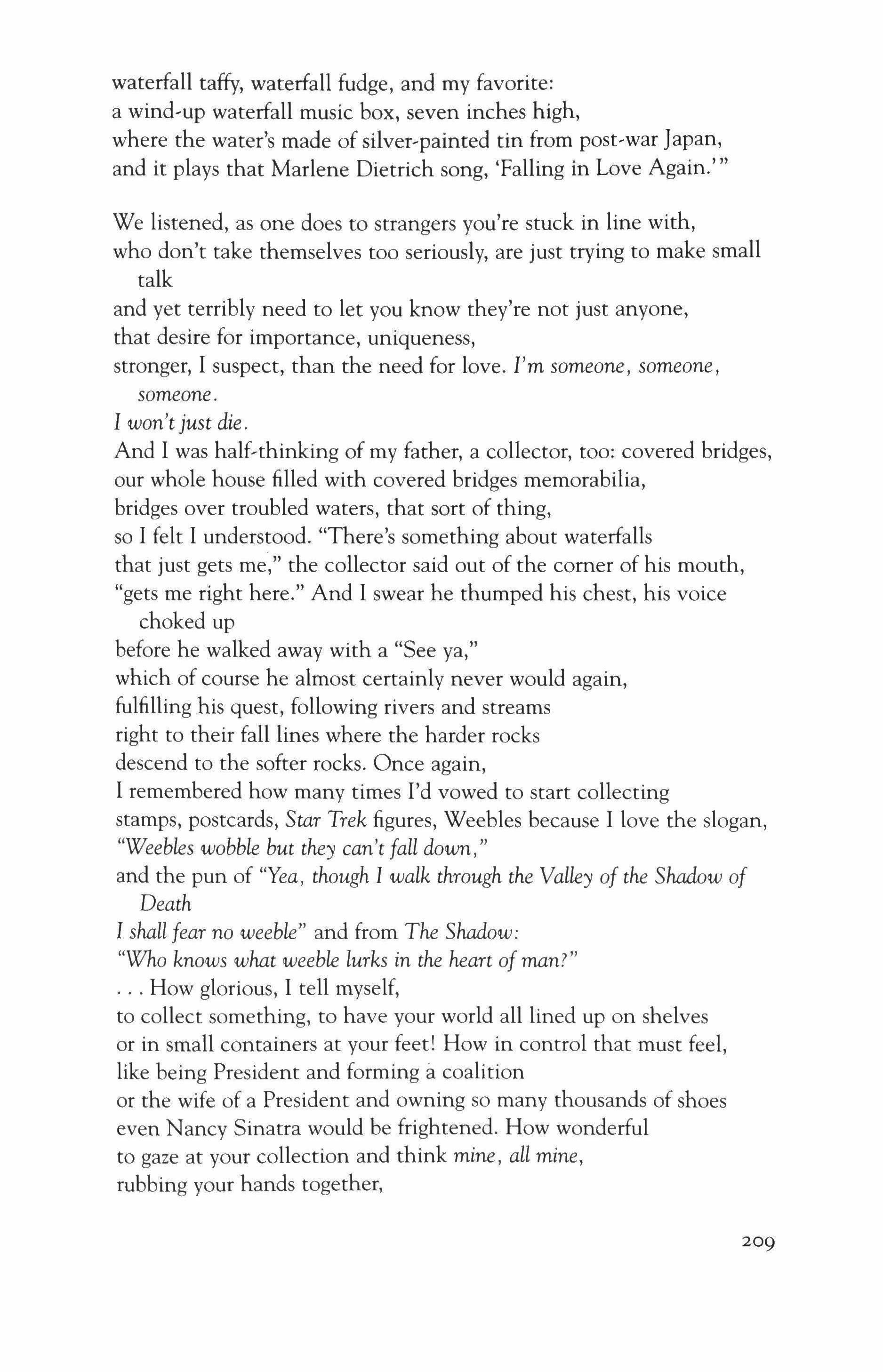
waterfall taffy, waterfall fudge, and my favorite: a wind-up waterfall music box, seven inches high, where the water's made of silver-painted tin from post-war Japan, and it plays that Marlene Dietrich song, 'Falling in Love Again.'''
We listened, as one does to strangers you're stuck in line with, who don't take themselves too seriously, are just trying to make small talk
and yet terribly need to let you know they're not just anyone, that desire for importance, uniqueness, stronger, I suspect, than the need for love. I'm someone, someone, someone.
I won't just die.
And I was half-thinking of my father, a collector, too: covered bridges, our whole house filled with covered bridges memorabilia, bridges over troubled waters, that sort of thing, so I felt I understood. "There's something about waterfalls that just gets me," the collector said out of the corner of his mouth, "gets me right here." And I swear he thumped his chest, his voice choked up before he walked away with a "See ya," which of course he almost certainly never would again, fulfilling his quest, following rivers and streams right to their fall lines where the harder rocks descend to the softer rocks. Once again, I remembered how many times I'd vowed to start collecting stamps, postcards, Star Trek figures, Weebles because I love the slogan, "Weebles wobble but they can't fall down," and the pun of "Yea, though I walk through the Valley of the Shadow of Death
I shall fear no weeble" and from The Shadow: "Who knows what weeble lurks in the heart of man?"
How glorious, I tell myself, to collect something, to have your world all lined up on shelves or in small containers at your feet! How in control that must feel, like being President and forming a coalition or the wife of a President and owning so many thousands of shoes even Nancy Sinatra would be frightened. How wonderful to gaze at your collection and think mine, all mine, rubbing your hands together,
209

or to show it off for hours, or to insure it. That, I thought, must be what's wrong with me-no collections, nothing but odds and ends and here and there's. Randomness. Whim. Chaos. Fragments. Zen. No wonder I think of my life as brushstrokes in the snow, a falling into space. No wonder my life seems so unreal. The waterfall loomed high above us and kept coming down. In the tiny shop next door, the clerks wore earplugs. Each clerk looked involved, entrusted, counting change, taking credit cards, anonymous, unmemorable, just working along, can't help it, making the days go by.
210
Amy Gerstler
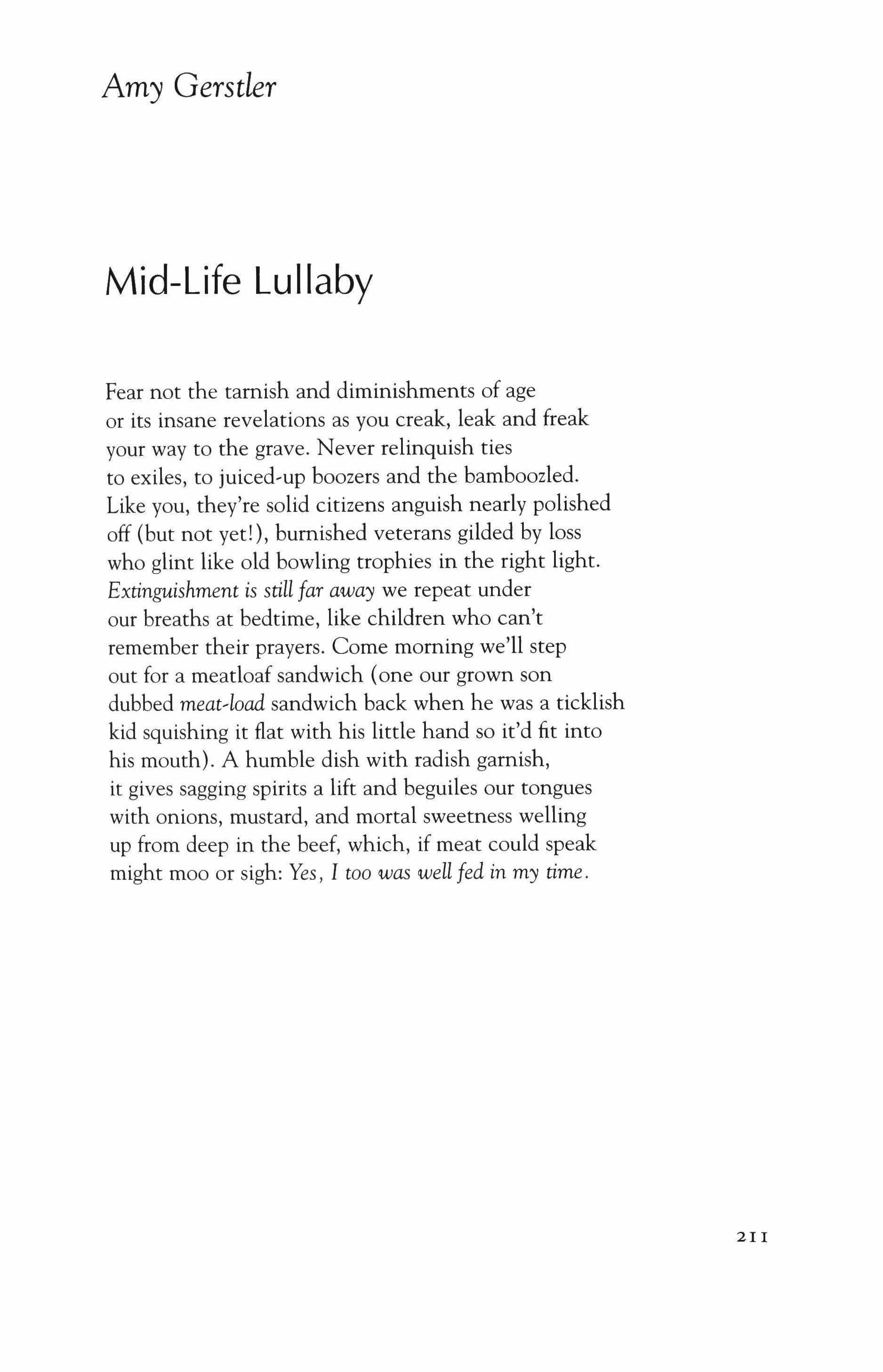
Mid-Life Lullaby
Fear not the tarnish and diminishments of age or its insane revelations as you creak, leak and freak your way to the grave. Never relinquish ties to exiles, to juiced-up boozers and the bamboozled. Like you, they're solid citizens anguish nearly polished off (but not yet!), burnished veterans gilded by loss who glint like old bowling trophies in the right light. Extinguishment is still far away we repeat under our breaths at bedtime, like children who can't remember their prayers. Come morning we'll step out for a meatloaf sandwich (one our grown son dubbed meat-load sandwich back when he was a ticklish kid squishing it flat with his little hand so it'd fit into his mouth). A humble dish with radish garnish, it gives sagging spirits a lift and beguiles our tongues with onions, mustard, and mortal sweetness welling up from deep in the beef, which, if meat could speak might moo or sigh: Yes, I too was well fed in my time.
211

Unspoiled
After S. Teresa Piedra
these wounds return like old lovers
shadow scars deepen to red violet as if merely stored in the flesh beneath. i moan loudly in this sleepwalk, bums, stingings & welts leeched into consciousness
as familiar as mother's beatings with belts, fists, and switches-the epithets and manglings of my name that peculiar song sung by one enraged: would you like a spanking?
erupts in my ears, upsets my stomach rumbles in my bones and bowels
what have i done? i asked you then as ever i ask myself your eyes answered and answer still: you were born you nappy�hea.ded bitch
the child i was adores you and despairs-for all time. but for today's mean loneliness your scion loathes you
looking at my hands, identical to yours, i see me slapping myself-the force of blows knocks me back, across the decades, to my knees
where i cry "Daddy!" but he is seldom home
Wanda Coleman
212
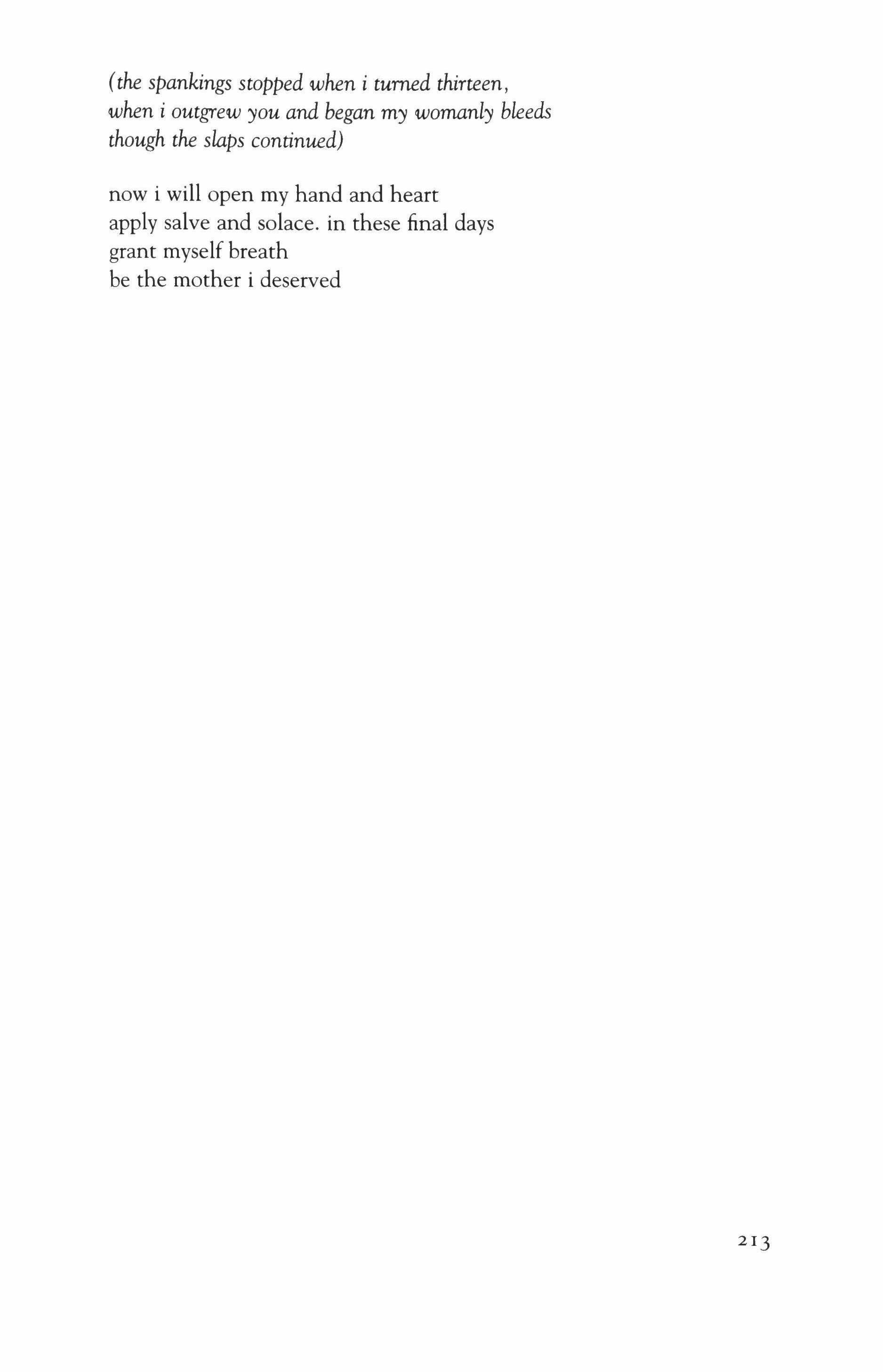
(the spankings stopped when i turned thirteen, when i outgrew you and began my womanly bleeds though the slaps continued)
now i will open my hand and heart apply salve and solace. in these final days grant myself breath be the mother i deserved
213
The Violet Bends to the Stubble Skirting It

and the eat's head follows the arc of a sparrow's flight. When you asked me "Are you sure you want to go?" I said "no," and obeyed what I will never be able to name. When I call out to you now I still have to pause before calling her name, and for endearments I have failed to tell you anything other than what I've whispered to her.
But that's not why I'm not in love.
Once when I was ten I saw a neighbor step out into a cold afternoon, shirtless. He stood in front of his house, raised his arms and yelled a triumphant cry. And as if to terrorize me he let out a loud laugh.
He was the neighborhood "drinker" reputed to sell the "grappa" he made in his garage.
Why am I telling you this when all I want to say is that I'm not in love?
I sensed my terror and cradled it in the coat I wrapped around me. But what am I cradling now as I kiss you, as I caress your soft arms, your hands fragile like sparrows in my palms.
Khaled Mattawa
214

There are satisfactions beyond our reach. We recognize them, envy them, and learn even to recoil from them. Once in a friend's garden I had tea with three men.
The youngest among them spoke about an upcoming nephew's marriage they'd recently arranged. He complimented the choice of bride and the new in-laws as being "like us," meaning modest, virtuous, reputable, but so low-key that a scandal would not do them irreparable harm. How can I describe that man's glee, his eyes two small flames in the afternoon turning dusk, for he has now become an elder, young enough to facilitate the match and respected enough to object and be heard.
A breeze blows and the stubble sends the violet a ruffian salute. The violet is unmoved, but if you'd look closer it'd be easy to imagine a tingling falling from its pistil to its thinnest root. The cat watches like a Mafioso with a developed taste for abstract art.
Sometimes I sit next to my mother in the large living room, and I can tell she is not there, thinking of my father perhaps, or more likely thinking of her own death.
The last time I saw him alive she told me "it's as if he crawled out of a grave."
So many close calls had left us calloused, but upon death a dizziness.
The so-much-still-to-do, the rug of one's life too far undone. She sits there as if I am a distant light in her rear view mirror, and she driving on.
But I have nowhere to go, having come from so far away, and having nothing to do there but to be her son. So I begin to reel her in. I ask her to tell a story and she takes that story as if she'd picked up a hitchhiker, glad for company and the purpose her new companion gives her.
Don't ask me what I'll do when that old woman dies. I can't bear the thought.
215
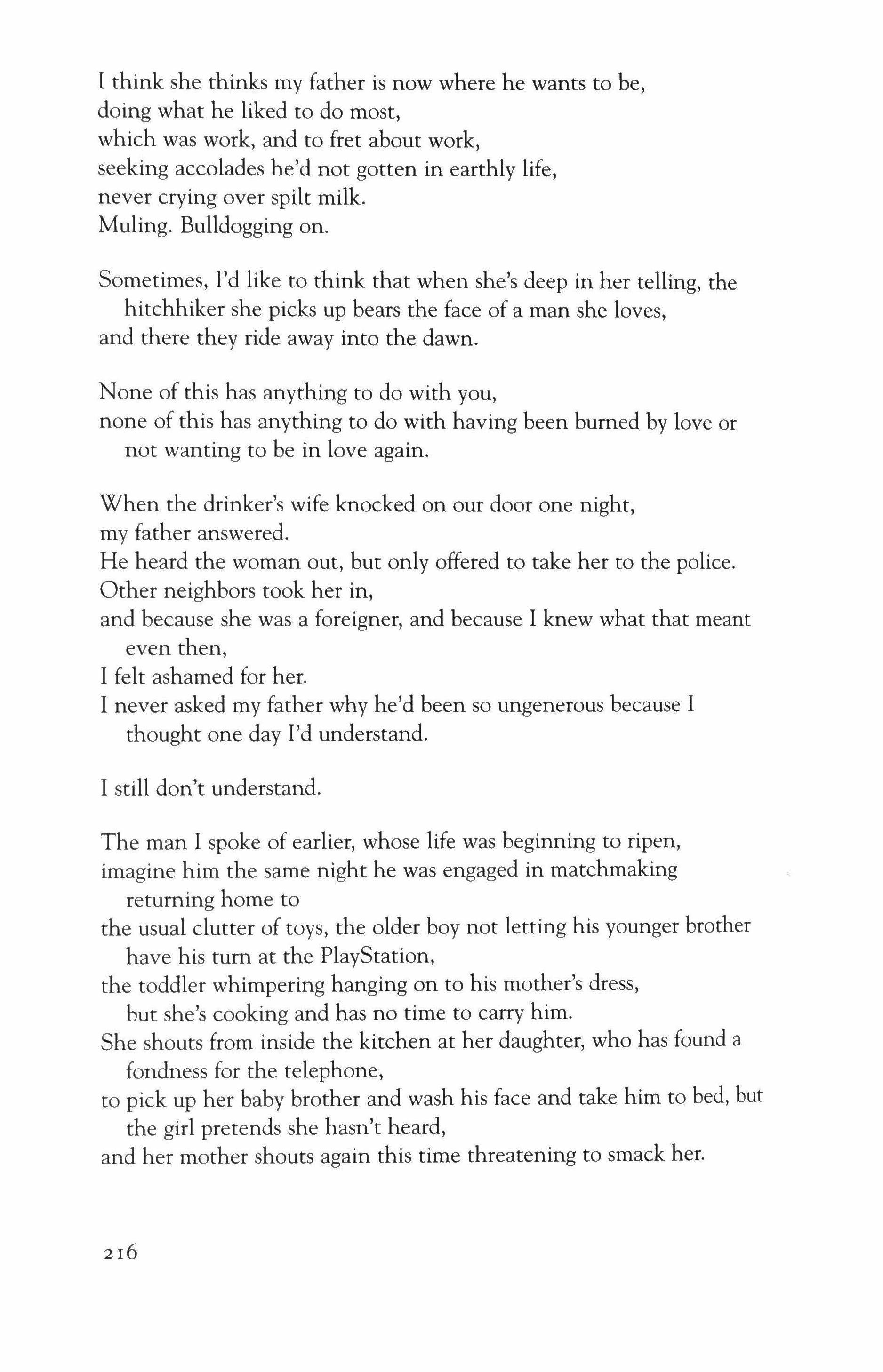
I think she thinks my father is now where he wants to be, doing what he liked to do most, which was work, and to fret about work, seeking accolades he'd not gotten in earthly life, never crying over spilt milk. Muling. Bulldogging on.
Sometimes, I'd like to think that when she's deep in her telling, the hitchhiker she picks up bears the face of a man she loves, and there they ride away into the dawn.
None of this has anything to do with you, none of this has anything to do with having been burned by love or not wanting to be in love again.
When the drinker's wife knocked on our door one night, my father answered. He heard the woman out, but only offered to take her to the police. Other neighbors took her in, and because she was a foreigner, and because I knew what that meant even then, I felt ashamed for her.
I never asked my father why he'd been so ungenerous because I thought one day I'd understand.
I still don't understand.
The man I spoke of earlier, whose life was beginning to ripen, imagine him the same night he was engaged in matchmaking returning home to the usual clutter of toys, the older boy not letting his younger brother have his tum at the PlayStation, the toddler whimpering hanging on to his mother's dress, but she's cooking and has no time to carry him. She shouts from inside the kitchen at her daughter, who has found a fondness for the telephone, to pick up her baby brother and wash his face and take him to bed, but the girl pretends she hasn't heard, and her mother shouts again this time threatening to smack her.
216
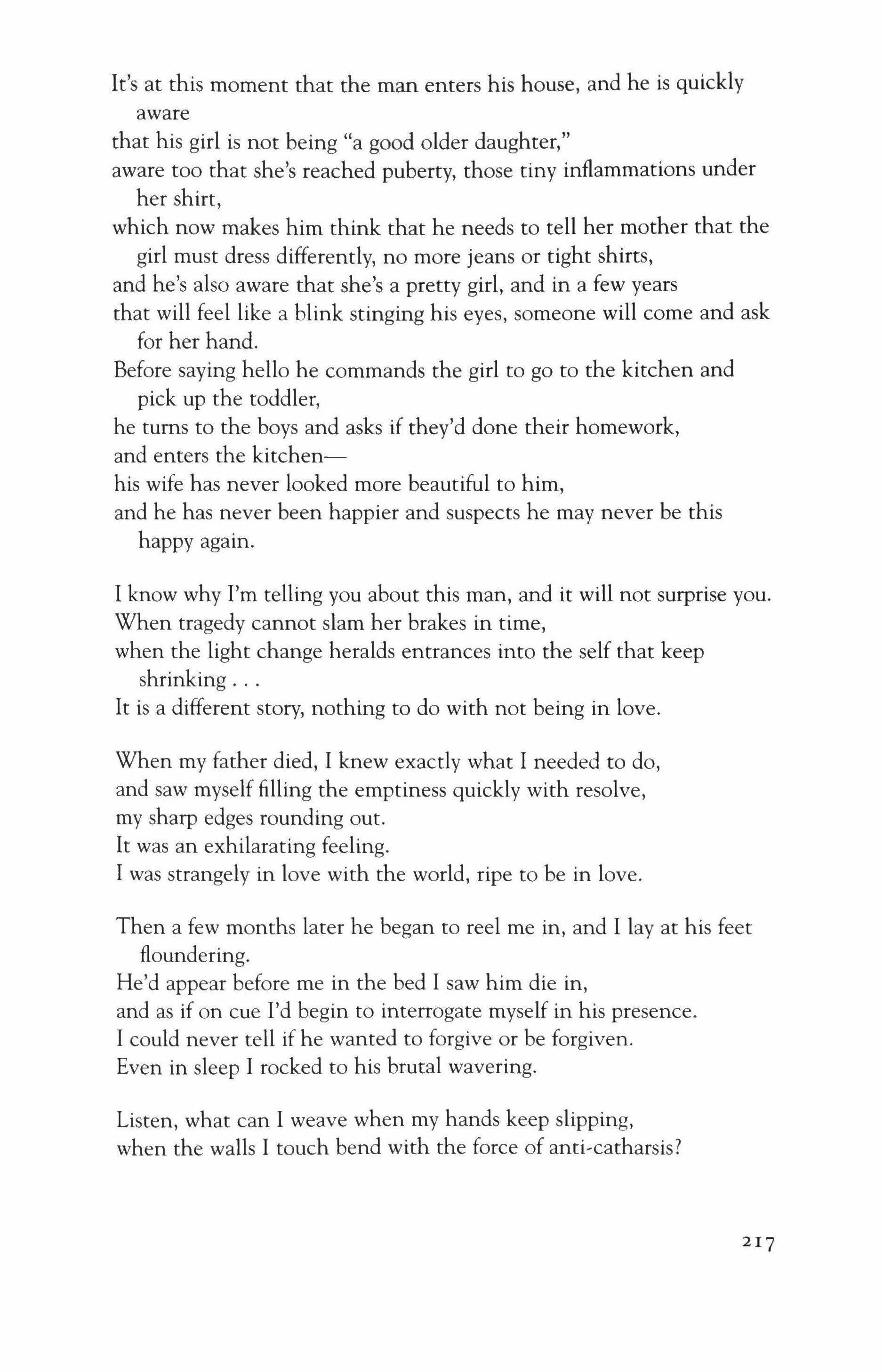
It's at this moment that the man enters his house, and he is quickly aware that his girl is not being "a good older daughter," aware too that she's reached puberty, those tiny inflammations under her shirt, which now makes him think that he needs to tell her mother that the girl must dress differently, no more jeans or tight shirts, and he's also aware that she's a pretty girl, and in a few years that will feel like a blink stinging his eyes, someone will come and ask for her hand.
Before saying hello he commands the girl to go to the kitchen and pick up the toddler, he turns to the boys and asks if they'd done their homework, and enters the kitchenhis wife has never looked more beautiful to him, and he has never been happier and suspects he may never be this happy again.
I know why I'm telling you about this man, and it will not surprise you. When tragedy cannot slam her brakes in time, when the light change heralds entrances into the self that keep shrinking
It is a different story, nothing to do with not being in love.
When my father died, I knew exactly what I needed to do, and saw myself filling the emptiness quickly with resolve, my sharp edges rounding out. It was an exhilarating feeling. I was strangely in love with the world, ripe to be in love.
Then a few months later he began to reel me in, and I lay at his feet floundering. He'd appear before me in the bed I saw him die in, and as if on cue I'd begin to interrogate myself in his presence. I could never tell if he wanted to forgive or be forgiven. Even in sleep I rocked to his brutal wavering.
Listen, what can I weave when my hands keep slipping, when the walls I touch bend with the force of anti-catharsis?
217
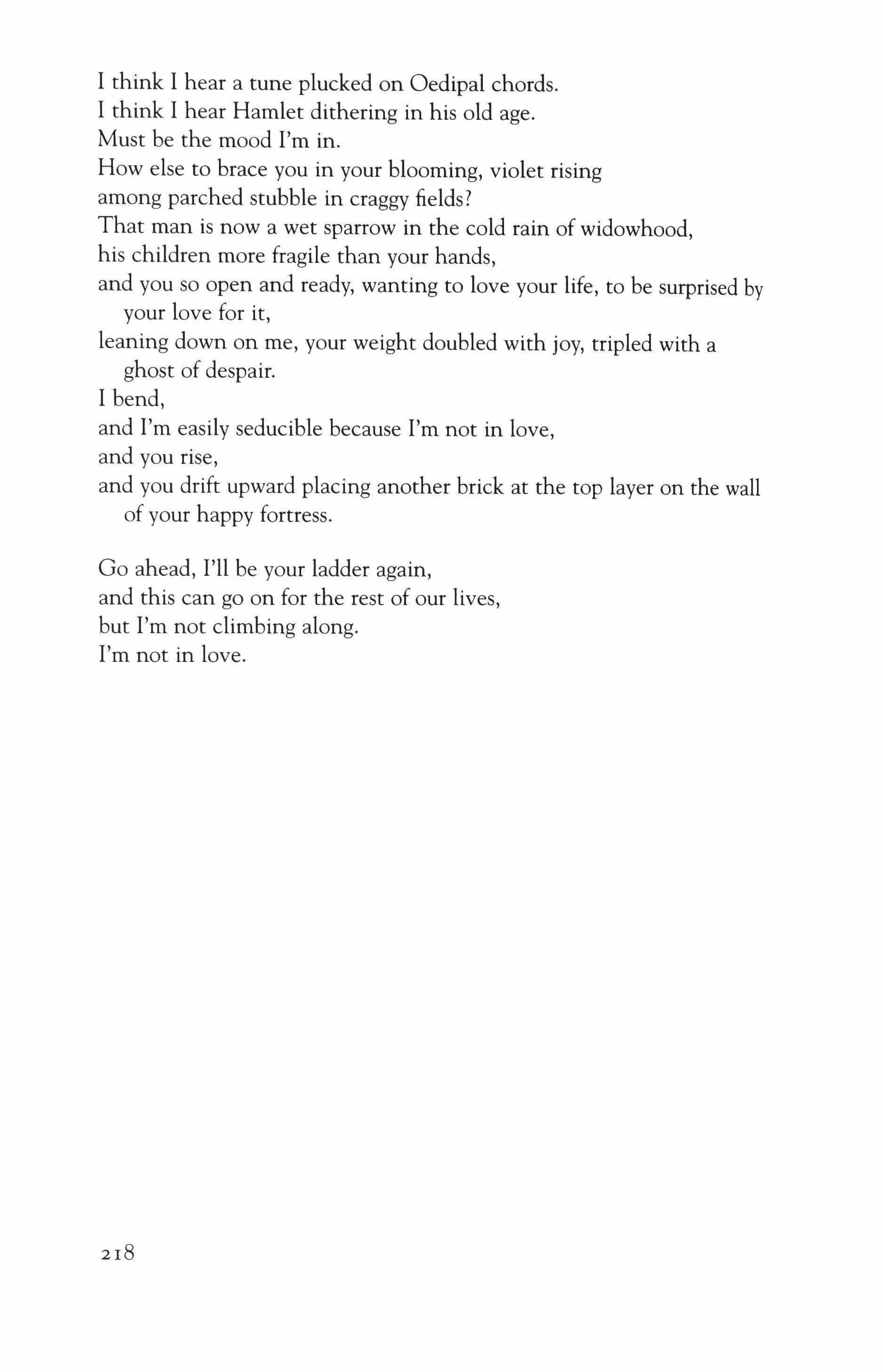
I think I hear a tune plucked on Oedipal chords. I think I hear Hamlet dithering in his old age. Must be the mood I'm in.
How else to brace you in your blooming, violet rising among parched stubble in craggy fields?
That man is now a wet sparrow in the cold rain of widowhood, his children more fragile than your hands, and you so open and ready, wanting to love your life, to be surprised by your love for it, leaning down on me, your weight doubled with joy, tripled with a ghost of despair. I bend, and I'm easily seducible because I'm not in love, and you rise, and you drift upward placing another brick at the top layer on the wall of your happy fortress.
Go ahead, I'll be your ladder again, and this can go on for the rest of our lives, but I'm not climbing along. I'm not in love.
218
My Frigidai re
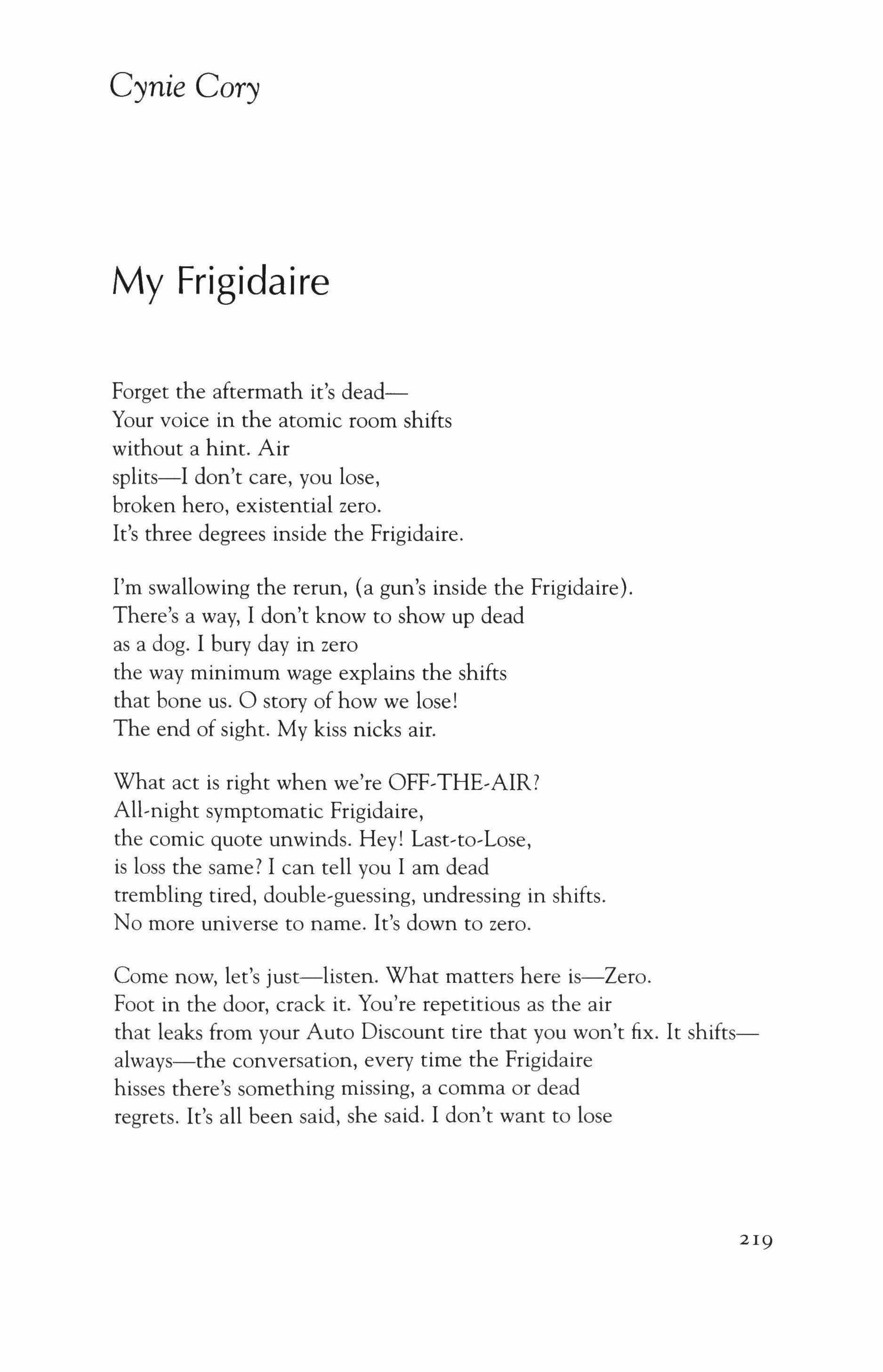
Forget the aftermath it's dead
Your voice in the atomic room shifts without a hint. Air splits-I don't care, you lose, broken hero, existential zero. It's three degrees inside the Frigidaire.
I'm swallowing the rerun, (a gun's inside the Frigidaire). There's a way, I don't know to show up dead as a dog. I bury day in zero the way minimum wage explains the shifts that bone us. 0 story of how we lose! The end of sight. My kiss nicks air.
What act is right when we're OFF-THE-AIR?
All-night symptomatic Frigidaire, the comic quote unwinds. Hey! Last-to-Lose, is loss the same? I can tell you I am dead trembling tired, double-guessing, undressing in shifts. No more universe to name. It's down to zero.
Come now, let's just-listen. What matters here is-Zero. Foot in the door, crack it. You're repetitious as the air that leaks from your Auto Discount tire that you won't fix. It shiftsalways-the conversation, every time the Frigidaire hisses there's something missing, a comma or dead regrets. It's all been said, she said. I don't want to lose
Cynie Cory
219
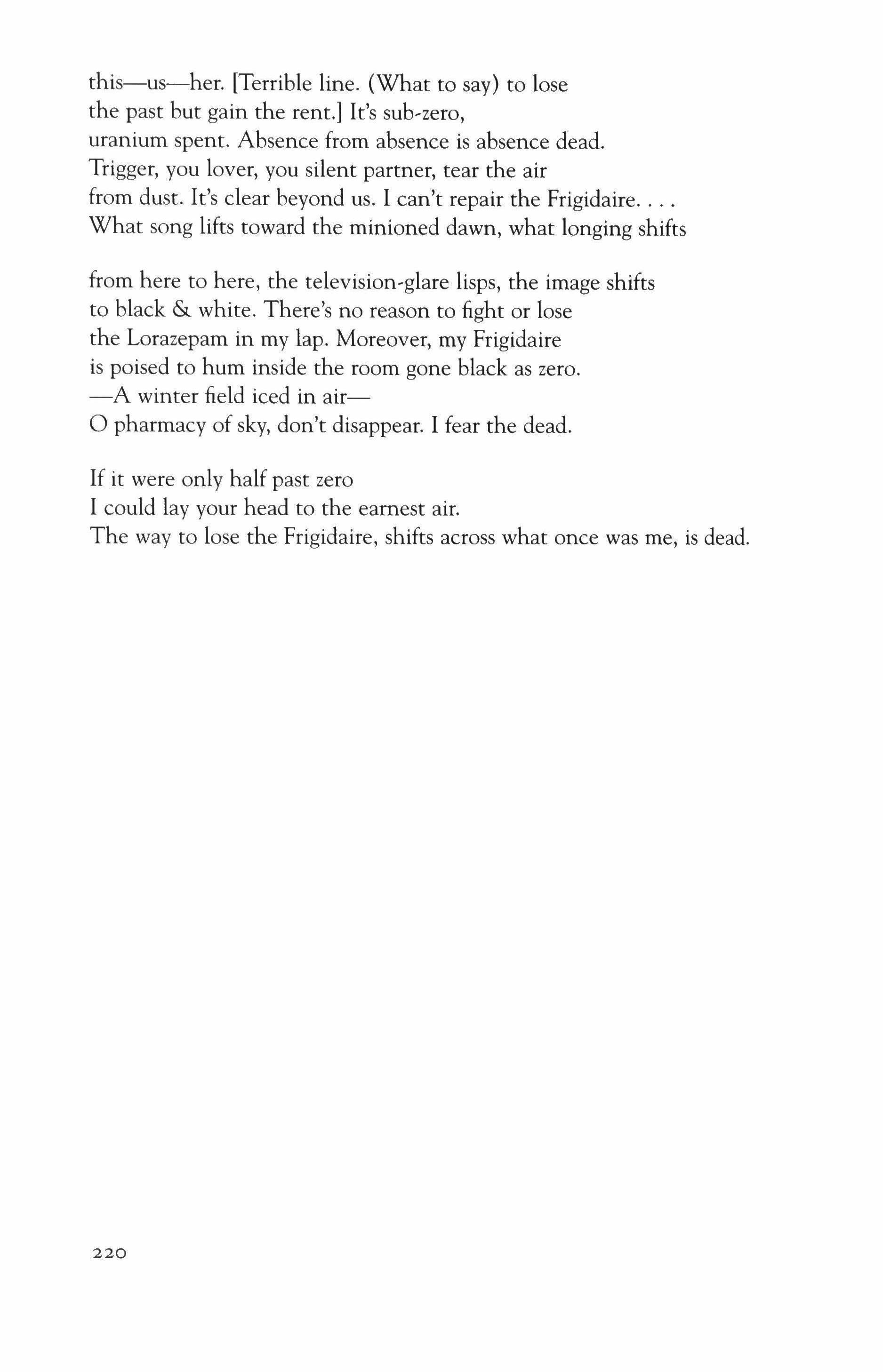
this-us-her. [Terrible line. (What to say) to lose the past but gain the rent.] It's sub-zero, uranium spent. Absence from absence is absence dead. Trigger, you lover, you silent partner, tear the air from dust. It's clear beyond us. I can't repair the Frigidaire What song lifts toward the minioned dawn, what longing shifts
from here to here, the television-glare lisps, the image shifts to black & white. There's no reason to fight or lose the Lorazepam in my lap. Moreover, my Frigidaire is poised to hum inside the room gone black as zero. -A winter field iced in airo pharmacy of sky, don't disappear. I fear the dead.
If it were only half past zero I could lay your head to the earnest air. The way to lose the Frigidaire, shifts across what once was me, is dead.
220
Septina
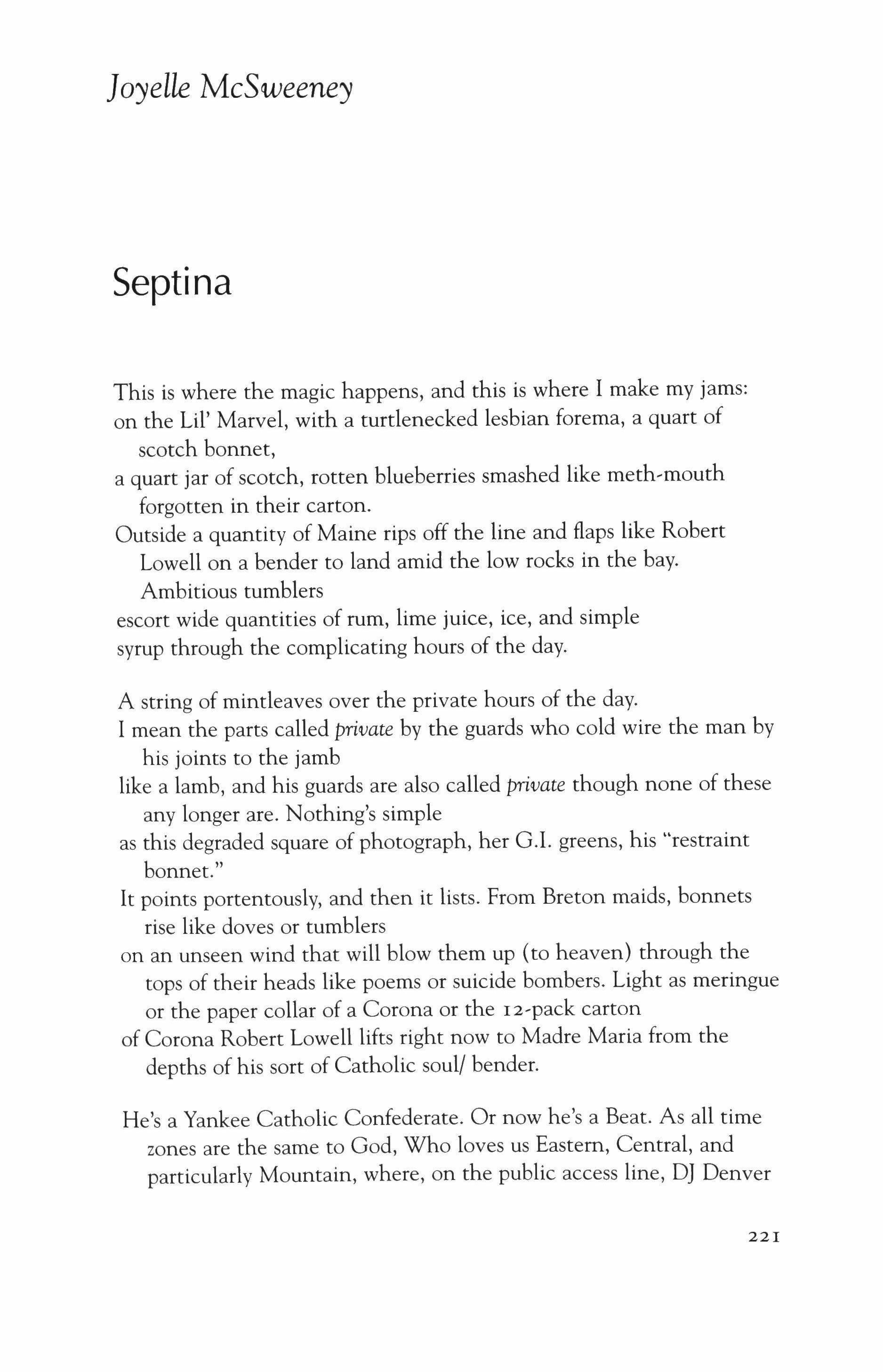
This is where the magic happens, and this is where I make my jams: on the Lil' Marvel, with a turtlenecked lesbian forema, a quart of scotch bonnet, a quart jar of scotch, rotten blueberries smashed like meth-rnouth forgotten in their carton. Outside a quantity of Maine rips off the line and flaps like Robert Lowell on a bender to land amid the low rocks in the bay. Ambitious tumblers escort wide quantities of rum, lime juice, ice, and simple syrup through the complicating hours of the day.
A string of mintleaves over the private hours of the day. I mean the parts called private by the guards who cold wire the man by his joints to the jamb like a lamb, and his guards are also called private though none of these any longer are. Nothing's simple as this degraded square of photograph, her O.l. greens, his "restraint bonnet."
It points portentously, and then it lists. From Breton maids, bonnets rise like doves or tumblers on an unseen wind that will blow them up (to heaven) through the tops of their heads like poems or suicide bombers. Light as meringue or the paper collar of a Corona or the 1 z-pack carton of Corona Robert Lowell lifts right now to Madre Maria from the depths of his sort of Catholic soul! bender.
He's a Yankee Catholic Confederate. Or now he's a Beat. As all time zones are the same to God, Who loves us Eastern, Central, and particularly Mountain, where, on the public access line, OJ Denver
]oyelle McSweeney
221
answers questions from the unborn,again about black platter-shaped universes spinning backwards towards the big bang of the first day, when God said the word and light poured down like smokes from the carton.
In the same breath, He sets his oil well on fire. He oils the jambs and the axels so they all fall open towards catastrophe. The human race like plastic,monkey tumblers shall be packed back into their toxic barrel and destroyed. Nothing could be simpler than undoing this species that wants to hold on to flesh like a pathetic flea, black bonnet
of its carapace popped under a thumbnail's pressure. Life reversible as a metaphor. On the bonnet of the Astin-Martin, a Michangelic fresco of lost insectoidallife. For the night cometh when no man can go on a bender or go back and add two commas to that sentence where the phrase could be hypothetically excised or simply left out altogether. That phrase being your life. As days left out overnight tum pale with moisture, as days roll back like eyes, tumblers shake in the lock of life like paper tigers. The gate rattles open. The enjambed
centuries tip; the oil lamps flare; boxes of manuscripts and booze and conflagrating curtains and couches jam the ether already ashy with smokers' breath, cat-gut, whalebone buttons, bon mots, the hair where venom is stored and soft-tissue where memory is stored, the cartons of Super 8's where memory is stored and typewriters with jammed returns are stored and schooldays bent over nailed-down desks of memory the boy stood in the burning schoolroom with the enemy combatant for whom the ash rises from the world like tumblers from the circus net, as was foretold in the second stanza, if it were not so, I would have told you, rises like the ringing of a bell, to the simple world of day without days,
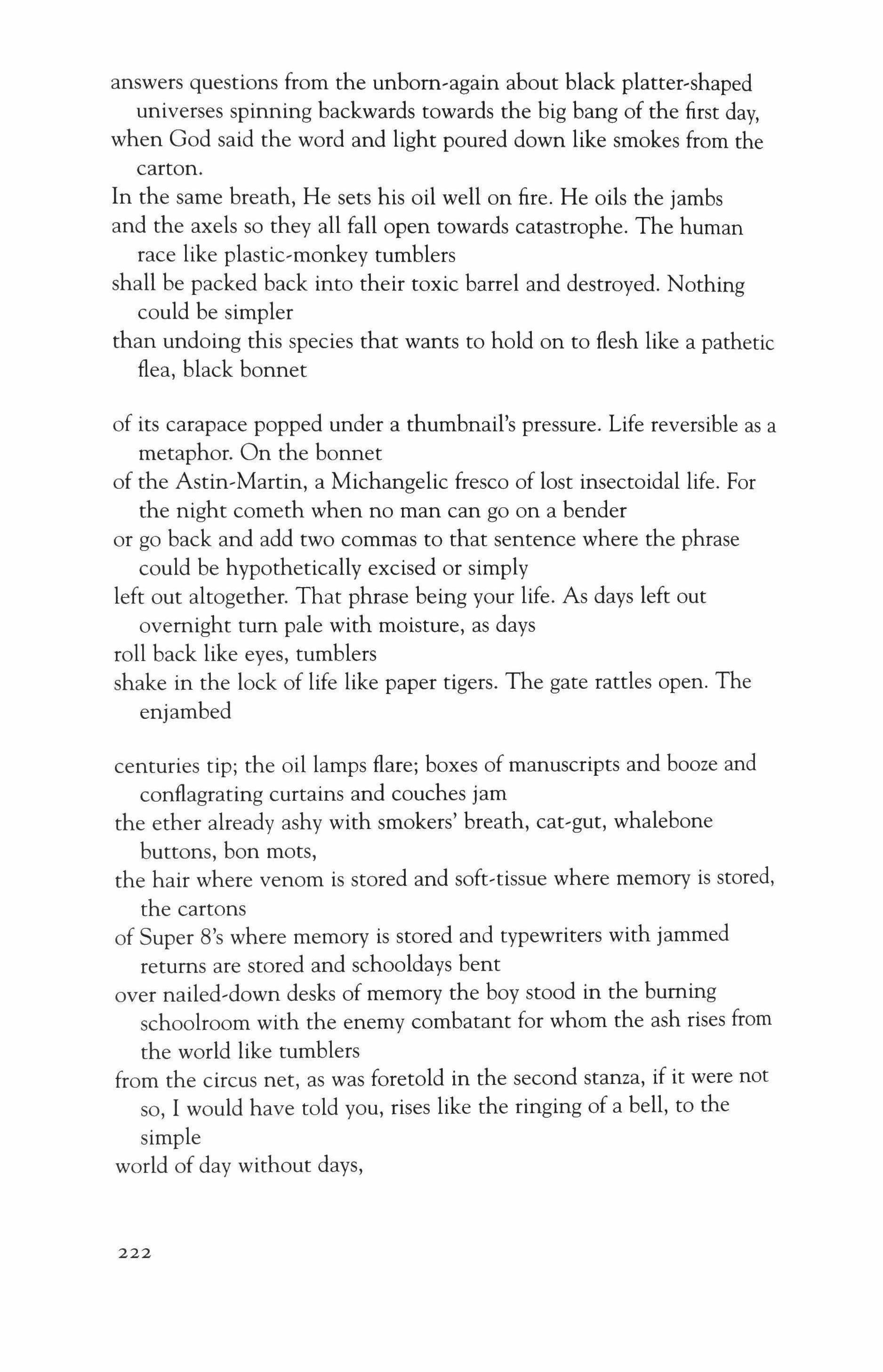
222
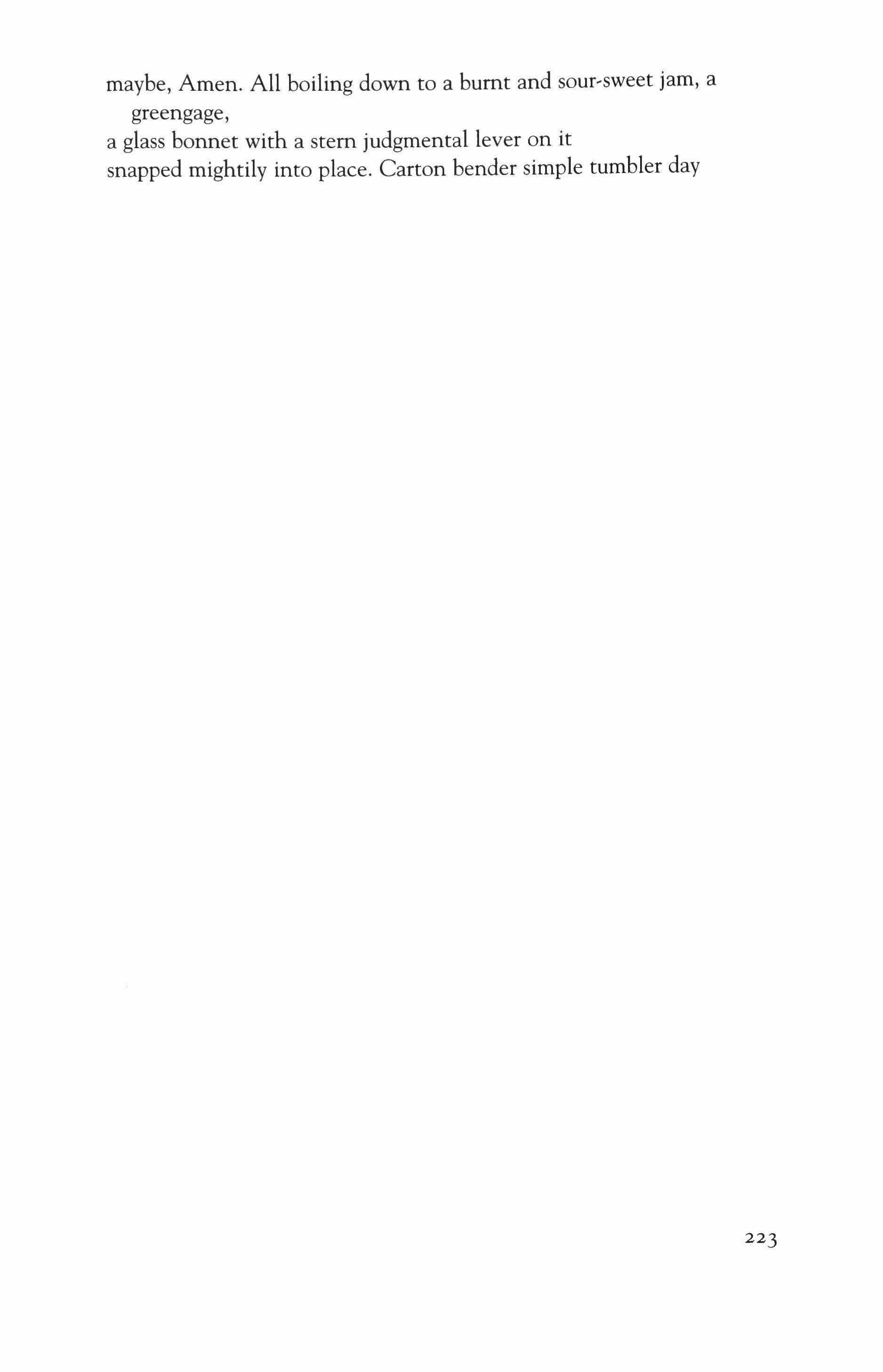
maybe, Amen. All boiling down to a burnt and sour-sweet jam, a greengage, a glass bonnet with a stem judgmental lever on it snapped mightily into place. Carton bender simple tumbler day
223
James Hall
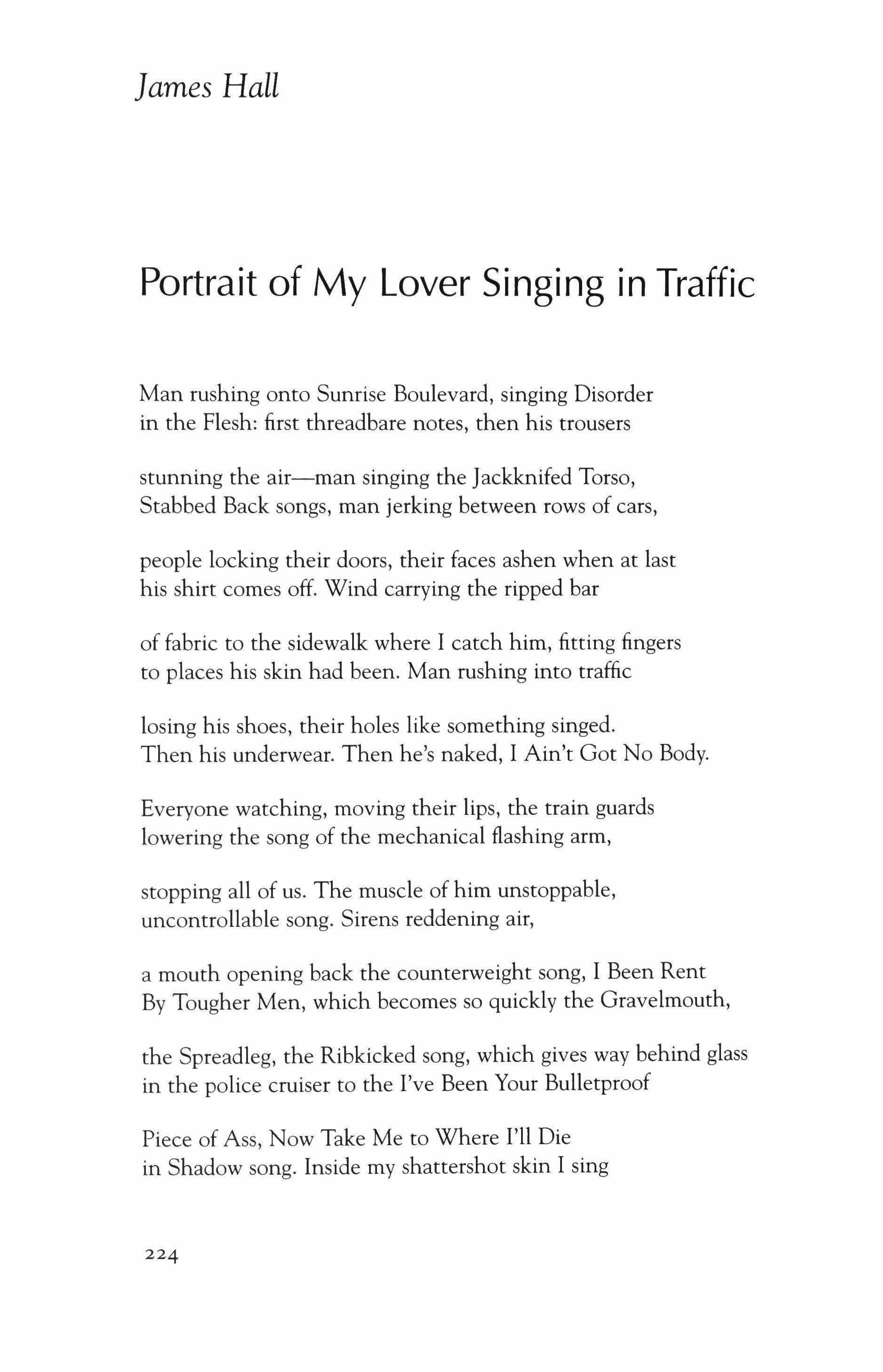
Portrait of My Lover Singing in Traffic
Man rushing onto Sunrise Boulevard, singing Disorder in the Flesh: first threadbare notes, then his trousers
stunning the air-man singing the Jackknifed Torso, Stabbed Back songs, man jerking between rows of cars, people locking their doors, their faces ashen when at last his shirt comes off. Wind carrying the ripped bar of fabric to the sidewalk where I catch him, fitting fingers to places his skin had been. Man rushing into traffic losing his shoes, their holes like something singed. Then his underwear. Then he's naked, I Ain't Got No Body.
Everyone watching, moving their lips, the train guards lowering the song of the mechanical flashing arm, stopping all of us. The muscle of him unstoppable, uncontrollable song. Sirens reddening air,
a mouth opening back the counterweight song, I Been Rent By Tougher Men, which becomes so quickly the Gravelmouth, the Spreadleg, the Ribkicked song, which gives way behind glass in the police cruiser to the I've Been Your Bulletproof
Piece of Ass, Now Take Me to Where I'll Die in Shadow song. Inside my shattershot skin I sing
224
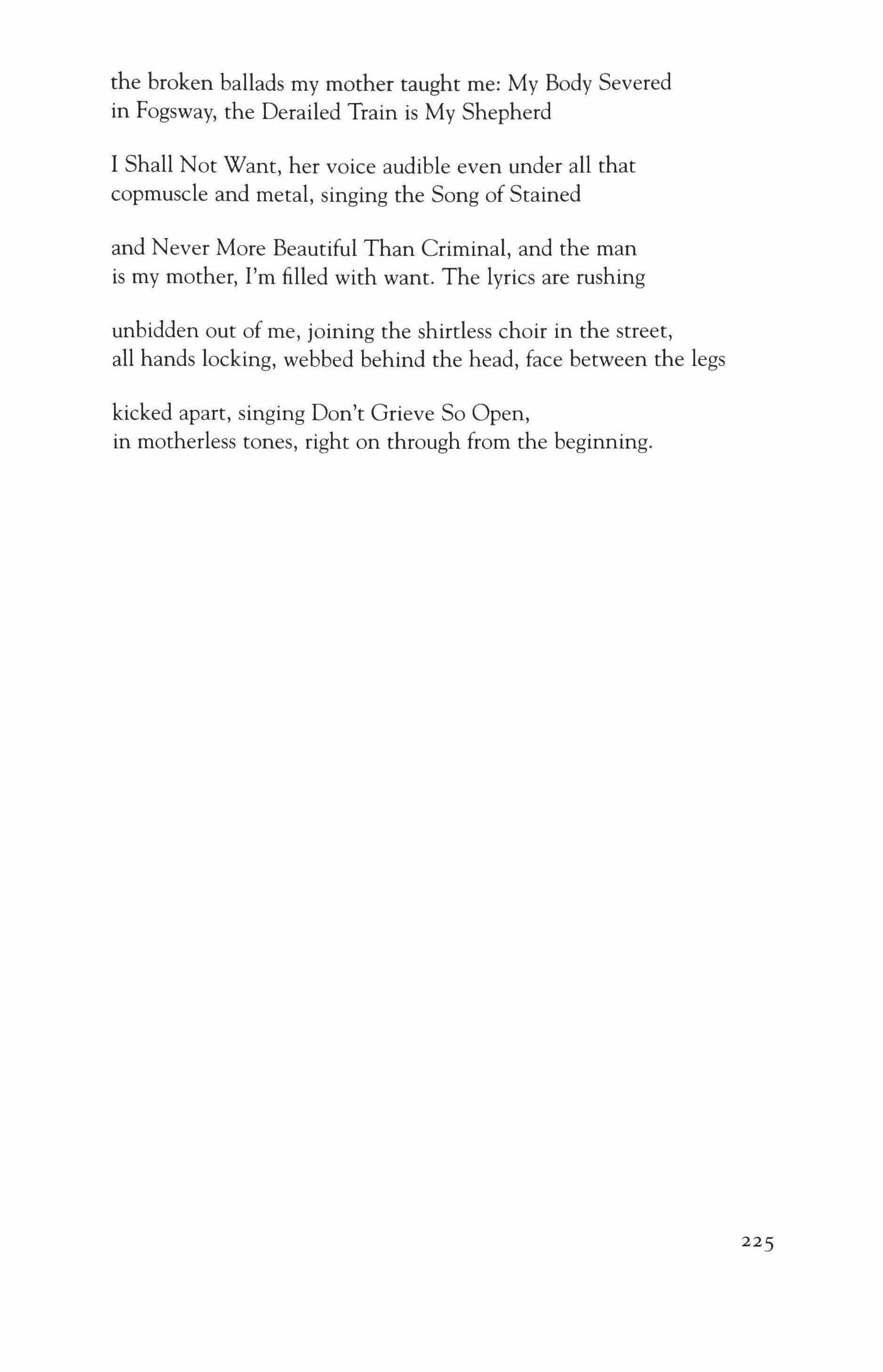
the broken ballads my mother taught me: My Body Severed in Fogsway, the Derailed Train is My Shepherd
I Shall Not Want, her voice audible even under all that copmuscle and metal, singing the Song of Stained and Never More Beautiful Than Criminal, and the man is my mother, I'm filled with want. The lyrics are rushing unbidden out of me, joining the shirtless choir in the street, all hands locking, webbed behind the head, face between the legs
kicked apart, singing Don't Grieve So Open, in motherless tones, right on through from the beginning.
225
A Fact Which Occurred in America

In the fifth grade, when we came finally to the Civil War, the teacher kept saying over and over We lost, we lost, his eyes a shadowy grief under his favorite painting, a laminated Dawe reproduction subtitled A fact which occurred in America: a Black man wrestling a buffalo to the ground. The ground becomes his grave, I am the buffalo.
In the painting of the buffalo rolling his eye to size up the man who will never be strong enough to wrestle his way out of the definition of black,
I am trying to say we are metaphors for each other, please don't kill me. The man is black but so is the buffalo, so is the sky and so is the heart which keeps this fact holy.
In the painting I am the buffalo because I want to be loved by pure physicality, a man with broad hips and broader anger and a yoke around his neck which has not broken him yet.
In the painting about a buffalo's last breath, I am the dust matted on the lips, desire's last yoke. Kiss me, keep me in your mouth, don't let me dissolve into fact.
In the painting about a boy who writes I am sorry we lost the Civil War fifty times on the blackboard after school in his deserted fifth grade class, I am the bone-white chalk,
I have always wanted to be someone's defiled good buffalo. In the painting the man tells the buffalo, play dead, I'll get you out of this. In the defiled fifth-grade teacher's laminated copy of the painting, I am the racing pulse of the boy getting his revenge when the teacher isn't looking. I am the time after we learned about the heroic Civil War,
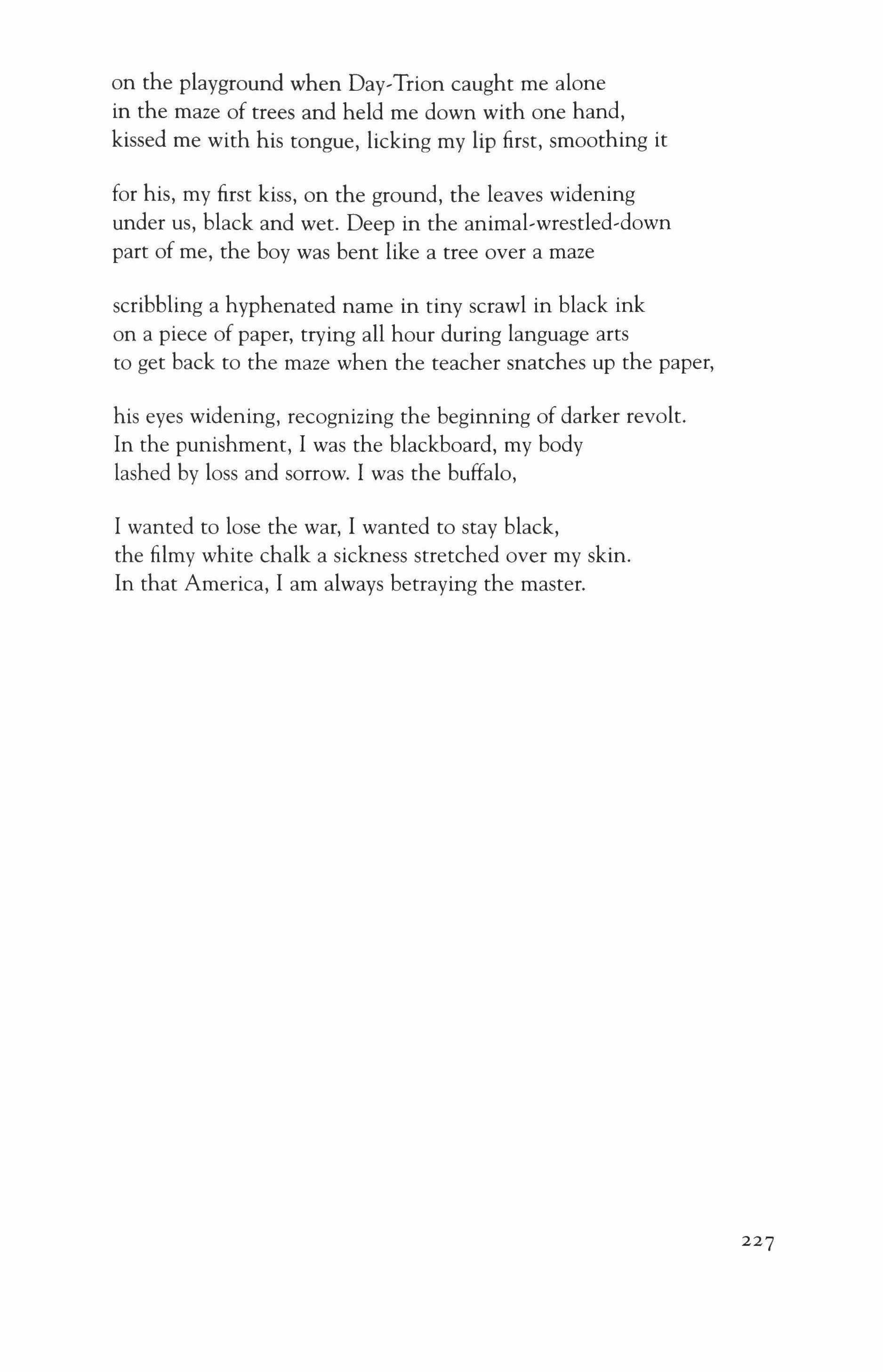
on the playground when Day-Trion caught me alone in the maze of trees and held me down with one hand, kissed me with his tongue, licking my lip first, smoothing it
for his, my first kiss, on the ground, the leaves widening under us, black and wet. Deep in the animal-wresrled-down part of me, the boy was bent like a tree over a maze
scribbling a hyphenated name in tiny scrawl in black ink on a piece of paper, trying all hour during language arts to get back to the maze when the teacher snatches up the paper,
his eyes widening, recognizing the beginning of darker revolt. In the punishment, I was the blackboard, my body lashed by loss and sorrow. I was the buffalo,
I wanted to lose the war, I wanted to stay black, the filmy white chalk a sickness stretched over my skin. In that America, I am always betraying the master.
227
Tom C. Hunley

Musives and a Silent Crump
Musive was a fine word, the name of a moth, gone extinct. Crump: the sound of a heavy shell or bomb. Hurkle: a crouching, cowering motion. Erump: to erupt, burst forth. Were these words phased out, slow, or did they surface and then disappear, shy as whale backs? Maybe they entered and exited the language in a rush, like groovy, rad, and word up, slang terms teens use, then don't use, like hangouts turned "wack" by the sudden arrival of parents. So many words, but none for the smiles that flickered from Jane to me,
and back, when we'd reached a place in our life together where we almost didn't need words. No word for the strange joy I felt, cutting our firstborn son's umbilical cord as he lay screaming on Jane's stomach. So many words, but none tickled our infant son's throat.
Jane and I came to understand, this cry meant I'm hungry, that one meant burp me, another meant change me. Italians have seven words for "the," so why can't we have words that distinguish a baby's different types of tears,
or a special word for the tears on Jane's face as she dug her fingernails into her cheeks after he died in his crib? Have you ever scratched someone, by accident, as your arms grazed? I know the word for that. It's scrasing, but I had no words to comfort Jane. I'm sorry. It'll be okay. I knew these words didn't mean as much as I needed them to. I had no words for the beasts eating my insides, musives in a trunk full of clothes, no words for the hole I felt and tried to fill with my writing, with my music,
228
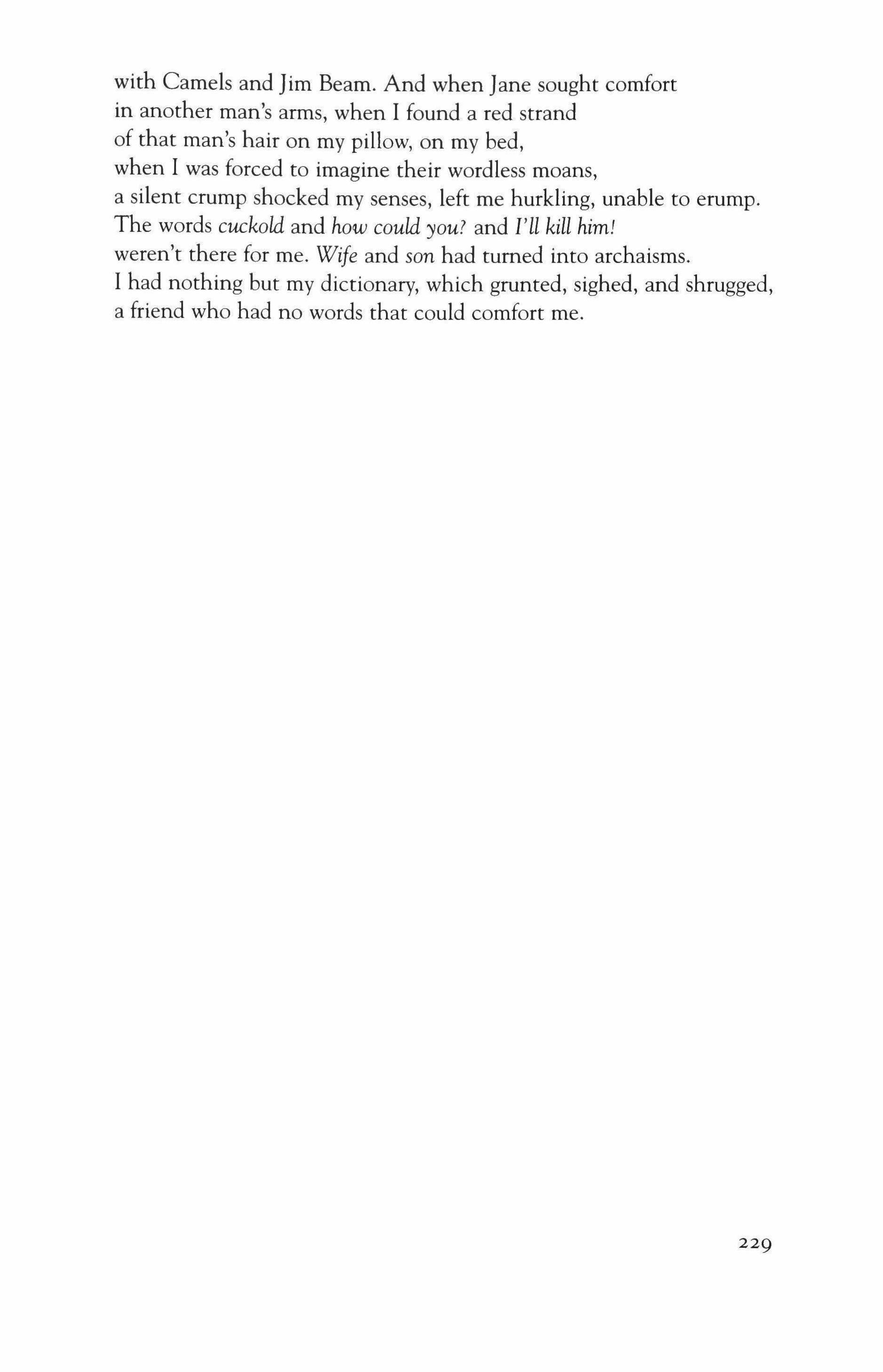
with Camels and Jim Beam. And when Jane sought comfort in another man's arms, when I found a red strand of that man's hair on my pillow, on my bed, when I was forced to imagine their wordless moans, a silent crump shocked my senses, left me hurkling, unable to erump. The words cuckold and how could you? and 1'll kill him! weren't there for me. Wife and son had turned into archaisms. I had nothing but my dictionary, which grunted, sighed, and shrugged, a friend who had no words that could comfort me.
229
Jill Drumm
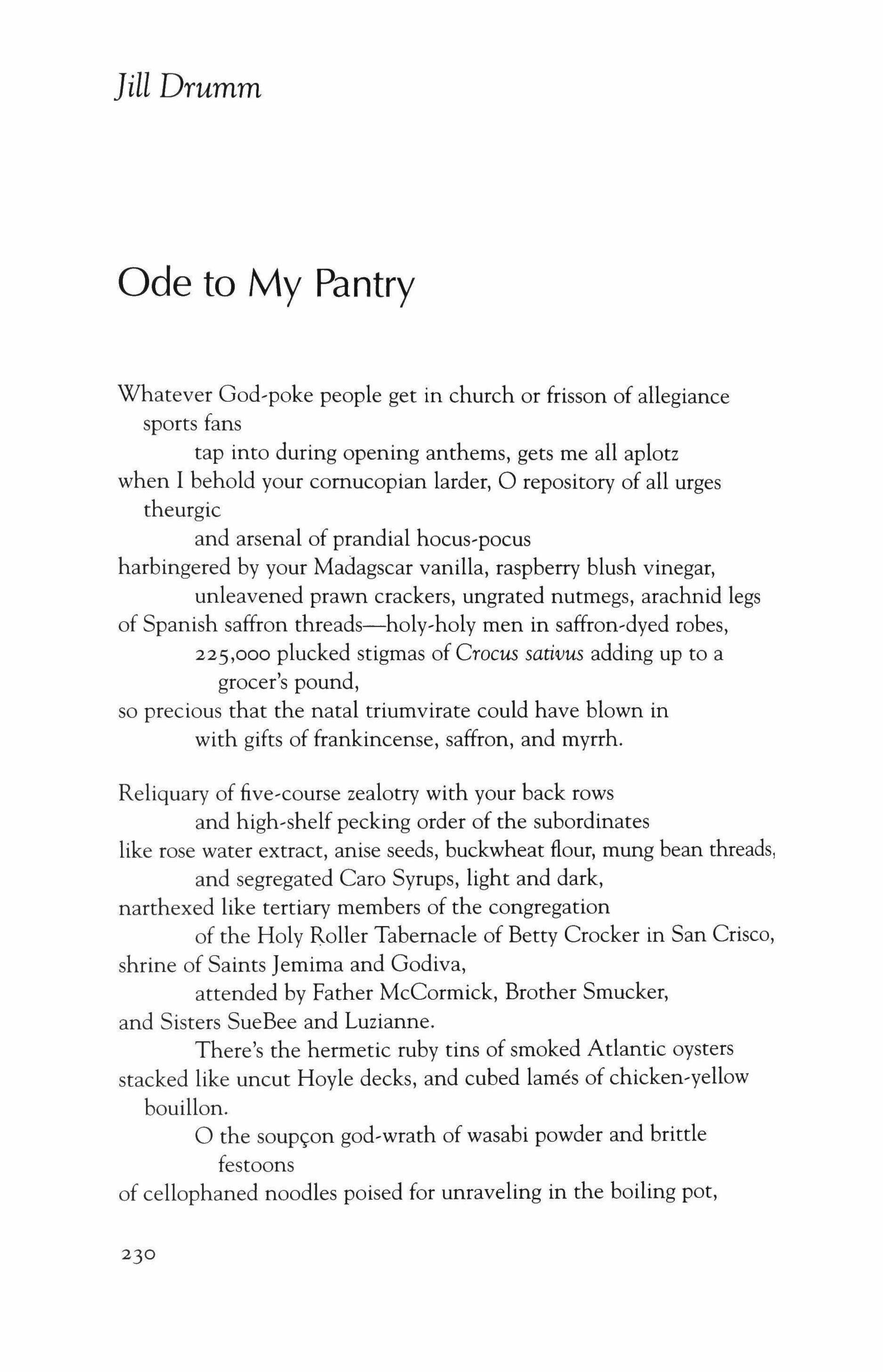
Ode to My Pantry
Whatever God-poke people get in church or frisson of allegiance sports fans tap into during opening anthems, gets me all aplotz when I behold your cornucopian larder, 0 repository of all urges theurgic and arsenal of prandial hocus-pocus harbingered by your Madagscar vanilla, raspberry blush vinegar, unleavened prawn crackers, ungrated nutmegs, arachnid legs of Spanish saffron threads=-holv-holv men in saffron-dyed robes, 225,000 plucked stigmas of Crocus sativus adding up to a grocer's pound, so precious that the natal triumvirate could have blown in with gifts of frankincense, saffron, and myrrh.
Reliquary of five-course zealotry with your back rows and high-shelf pecking order of the subordinates like rose water extract, anise seeds, buckwheat flour, mung bean threads, and segregated Caro Syrups, light and dark, narthexed like tertiary members of the congregation of the Holy Roller Tabernacle of Betty Crocker in San Crisco, shrine of Saints Jemima and Godiva, attended by Father McCormick, Brother Smucker, and Sisters SueBee and Luzianne.
There's the hermetic ruby tins of smoked Atlantic oysters stacked like uncut Hoyle decks, and cubed lames of chicken-yellow bouillon.
o the soupcon god-wrath of wasabi powder and brittle festoons of cellophaned noodles poised for unraveling in the boiling pot,
230
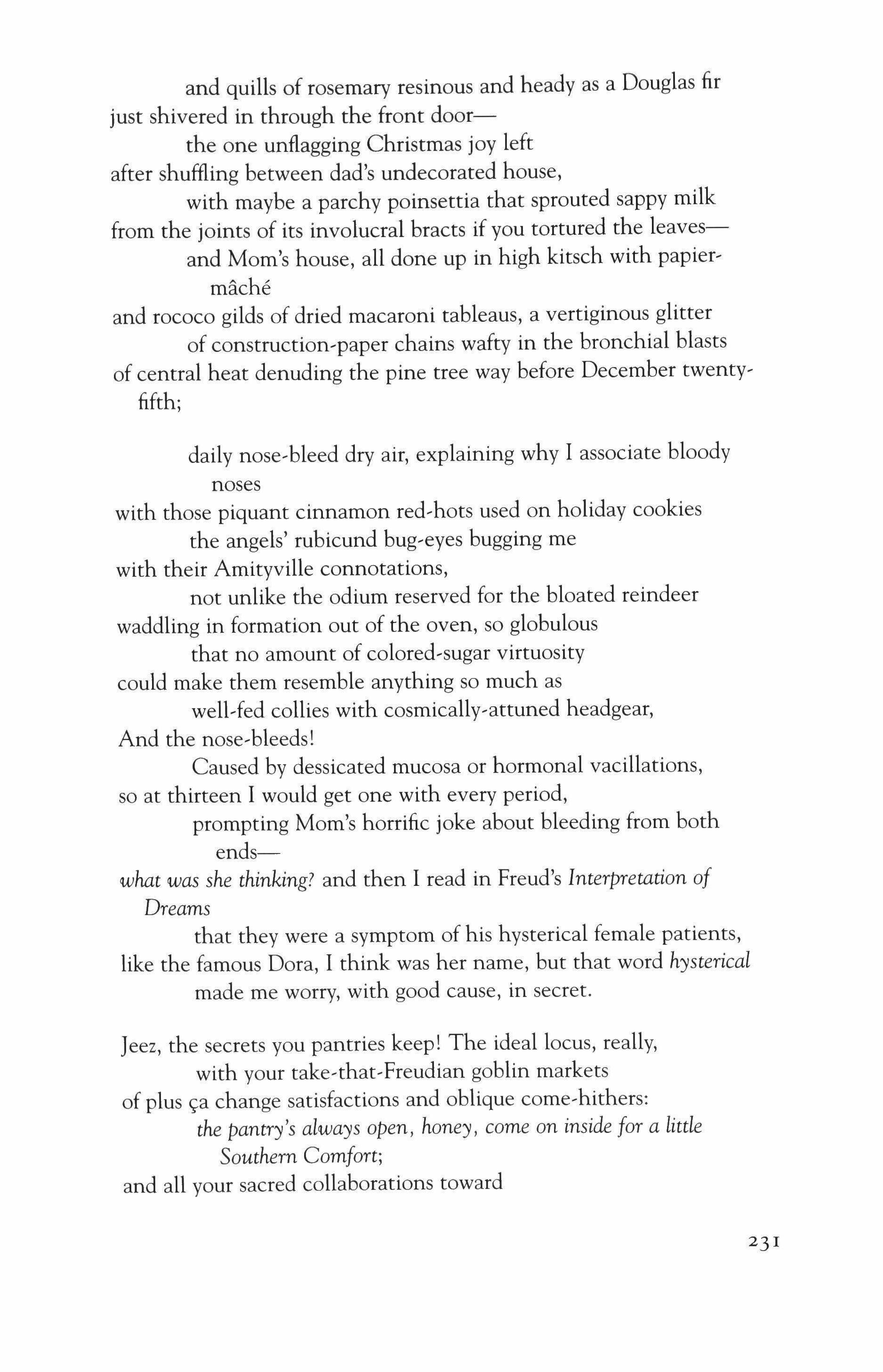
and quills of rosemary resinous and heady as a Douglas fir just shivered in through the front doorthe one unflagging Christmas joy left after shuffling between dad's undecorated house, with maybe a parchy poinsettia that sprouted sappy milk from the joints of its involucral bracts if you tortured the leavesand Mom's house, all done up in high kitsch with papiermache
and rococo gilds of dried macaroni tableaus, a vertiginous glitter of construction-paper chains wafty in the bronchial blasts of central heat denuding the pine tree way before December twentyfifth;
daily nose-bleed dry air, explaining why I associate bloody noses with those piquant cinnamon red-hots used on holiday cookies the angels' rubicund bug-eyes bugging me with their Amityville connotations, not unlike the odium reserved for the bloated reindeer waddling in formation out of the oven, so globulous that no amount of colored-sugar virtuosity could make them resemble anything so much as well-fed collies with cosmically-attuned headgear, And the nose-bleeds!
Caused by dessicated mucosa or hormonal vacillations, so at thirteen I would get one with every period, prompting Mom's horrific joke about bleeding from both endswhat was she thinking? and then I read in Freud's Interpretation of Dreams that they were a symptom of his hysterical female patients, like the famous Dora, I think was her name, but that word hysterical made me worry, with good cause, in secret.
Jeez, the secrets you pantries keep! The ideal locus, really, with your take-that-Freudian goblin markets of plus ca change satisfactions and oblique come-hithers: the pantry's always open, honey, come on inside for a little Southern Comfort; and all your sacred collaborations toward
231
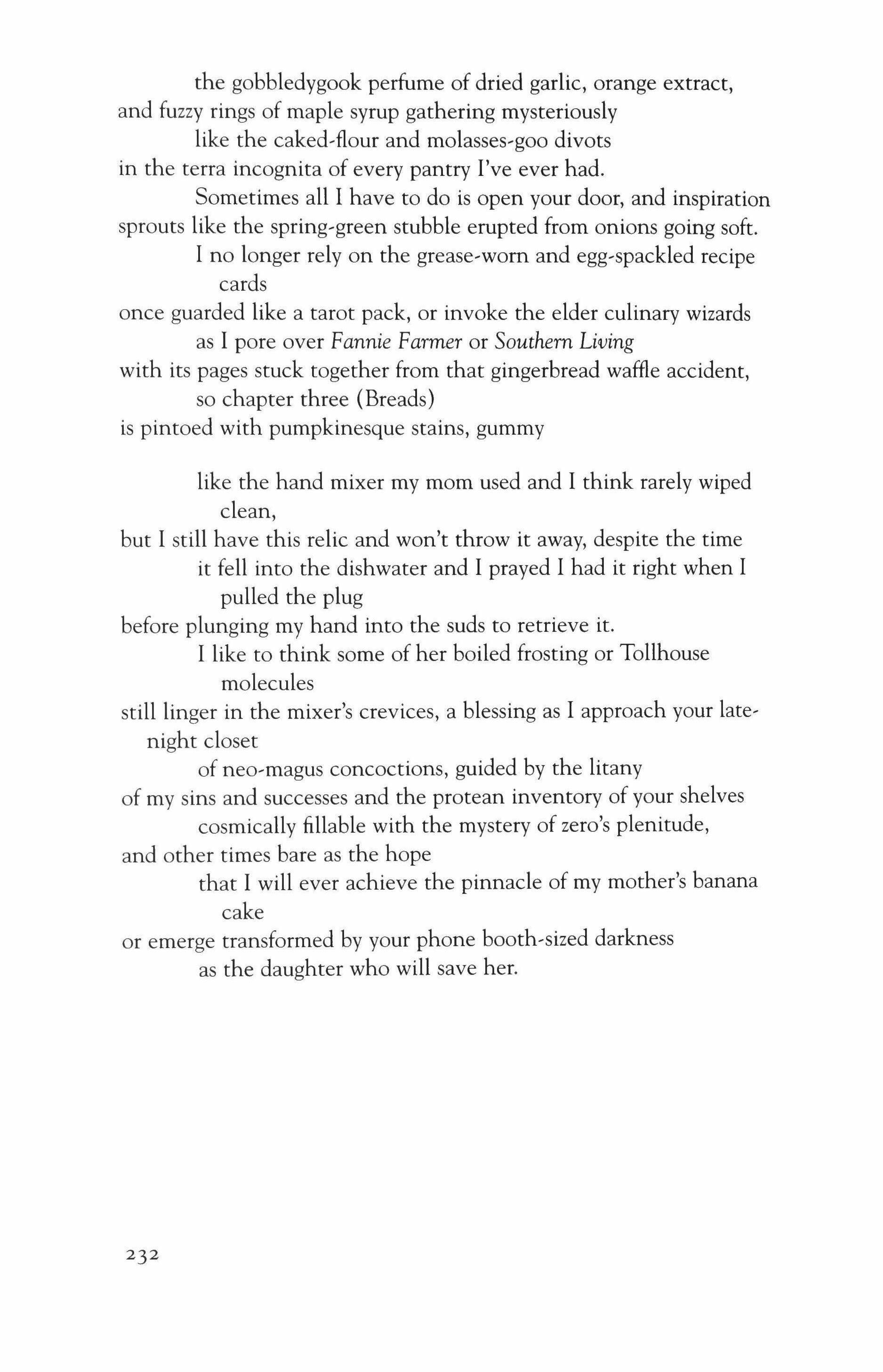
the gobbledygook perfume of dried garlic, orange extract, and fuzzy rings of maple syrup gathering mysteriously like the caked-flour and molasses-goo divots in the terra incognita of every pantry I've ever had. Sometimes all I have to do is open your door, and inspiration sprouts like the spring-green stubble erupted from onions going soft. I no longer rely on the grease-worn and egg-spackled recipe cards
once guarded like a tarot pack, or invoke the elder culinary wizards as I pore over Fannie Farmer or Southern Living with its pages stuck together from that gingerbread waffle accident, so chapter three (Breads) is pintoed with pumpkinesque stains, gummy
like the hand mixer my mom used and I think rarely wiped clean, but I still have this relic and won't throw it away, despite the time it fell into the dishwater and I prayed I had it right when I pulled the plug before plunging my hand into the suds to retrieve it. I like to think some of her boiled frosting or Tollhouse molecules still linger in the mixer's crevices, a blessing as I approach your latenight closet of nee-magus concoctions, guided by the litany of my sins and successes and the protean inventory of your shelves cosmically fillable with the mystery of zero's plenitude, and other times bare as the hope that I will ever achieve the pinnacle of my mother's banana cake or emerge transformed by your phone booth-sized darkness as the daughter who will save her.
232
David Graham Between Classes
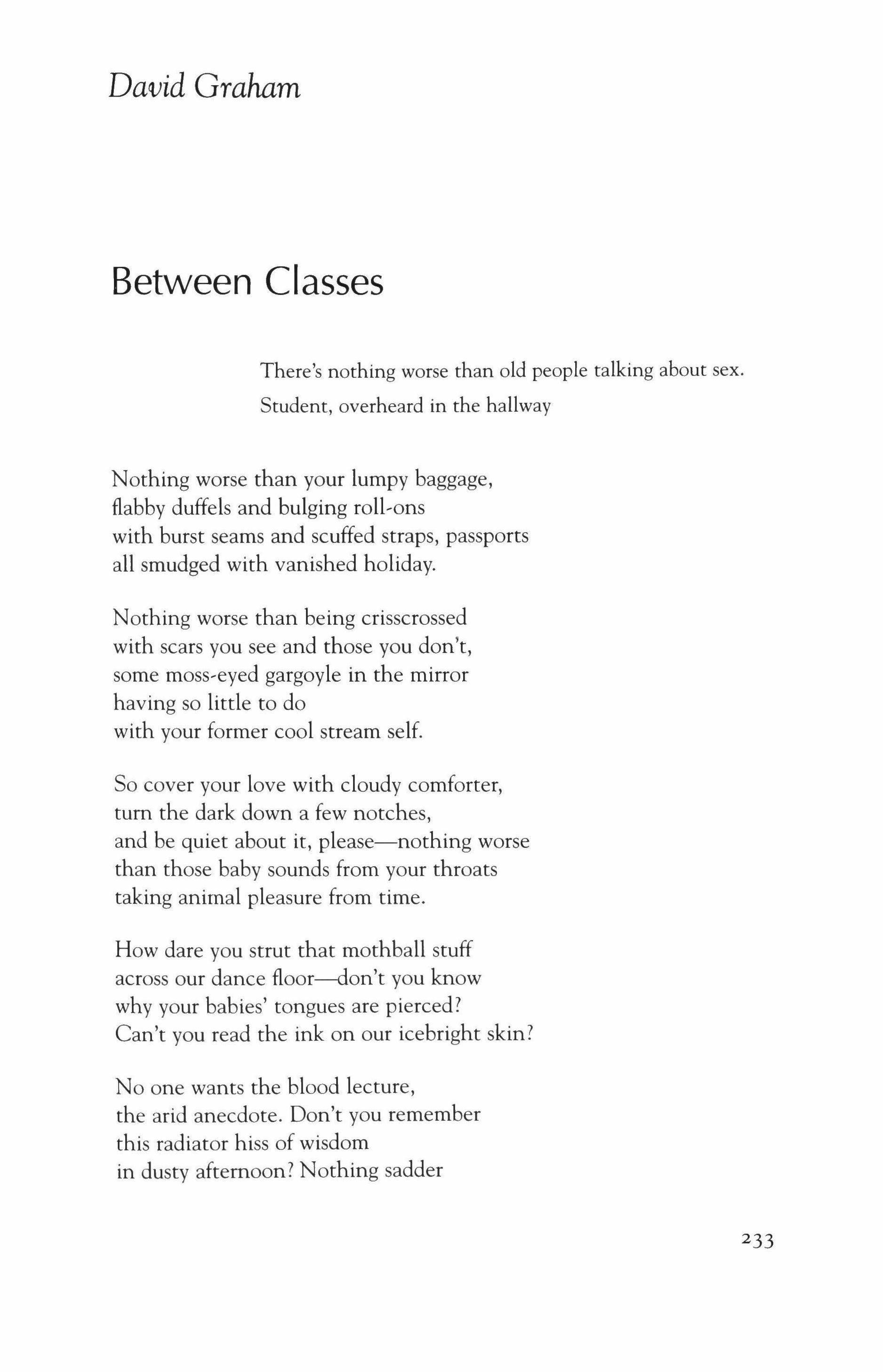
There's nothing worse than old people talking about sex.
Student, overheard in the hallway
Nothing worse than your lumpy baggage, flabby duffels and bulging roll-ons with burst seams and scuffed straps, passports all smudged with vanished holiday.
Nothing worse than being crisscrossed with scars you see and those you don't, some moss-eyed gargoyle in the mirror having so little to do with your former cool stream self.
So cover your love with cloudy comforter, tum the dark down a few notches, and be quiet about it, please-nothing worse than those baby sounds from your throats taking animal pleasure from time.
How dare you strut that mothball stuff across our dance floor-don't you know why your babies' tongues are pierced? Can't you read the ink on our icebright skin?
No one wants the blood lecture, the arid anecdote. Don't you remember this radiator hiss of wisdom in dusty afternoon? Nothing sadder
233

than a wrinkled hipster, still groping the lingo hopefully, fingering the clothes, doing that clunk-kneed cha-cha in full view.
Don't be spilling your mess of coffee grounds and apple peels in our sun You should practice safe sex, Sir, in the dumpster of your mind, all overripe with vocabulary.
234
Opening Credits

Six A.M., seven-it's summer so 1 can slowly watch the day begin, settling back into my pillow as if that new movie I've been hearing so much about is just now running its opening credits, names of excellent quirky under-recognized actors scrolling across blue sky and yard oaks with their skittery fresh leaves, and a subtle form of melody in the May air, something so delicately composed you barely hear it, just feel this overwhelming anticipation, curiosity not just about the day with its Cheerios and quite decent pot of Colombian coffee but really the whole magilla, the dappled fevery agile world flexing its sexy thighs, tossing its hair in the bug-free breeze
-I know this coming day will ripen with possibility, solid real complications, not like Hollywood, not wavebreaking tumult or glamorous goo with wind machines and hysterical John Williams score but an indie flick sort of kitchen clutter all so meaningful and tender in its true handheld essence, with half-eaten eggs congealing on a plate, yes exactly!
and a woman in her bathrobe that looks precisely as her bathrobe would look sits at the table in front of those fried eggs, not making a big deal out of anything, especially not her quite lovely thighs emerging under that poorly lit table -poorly lit for no reason! this isn't set design! It's life!and she is doing the crossword, as it happens, maybe completely ignoring the day's dawning news, or maybe she's read it already, as much of those hopeless headlines as she cares to-the point is, it doesn't matter, it's just achingly germane to see how she stops eating her eggs, she's full now,
235
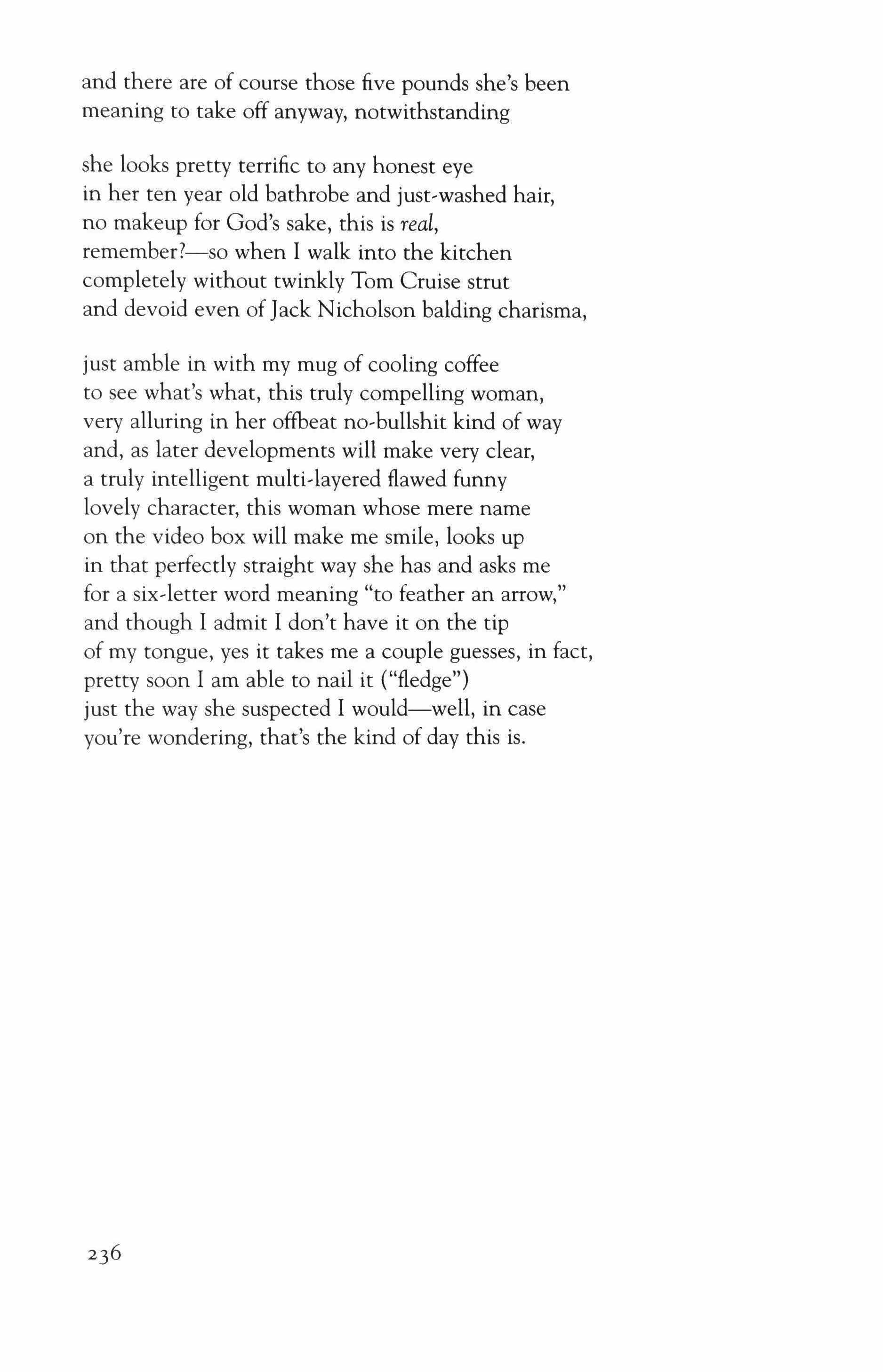
and there are of course those five pounds she's been meaning to take off anyway, notwithstanding she looks pretty terrific to any honest eye in her ten year old bathrobe and just-washed hair, no makeup for God's sake, this is real, remember?-so when I walk into the kitchen completely without twinkly Tom Cruise strut and devoid even of Jack Nicholson balding charisma, just amble in with my mug of cooling coffee to see what's what, this truly compelling woman, very alluring in her offbeat no-bullshit kind of way and, as later developments will make very clear, a truly intelligent multi-layered flawed funny lovely character, this woman whose mere name on the video box will make me smile, looks up in that perfectly straight way she has and asks me for a six-letter word meaning "to feather an arrow," and though I admit I don't have it on the tip of my tongue, yes it takes me a couple guesses, in fact, pretty soon I am able to nail it ("fledge") just the way she suspected I would-well, in case you're wondering, that's the kind of day this is.
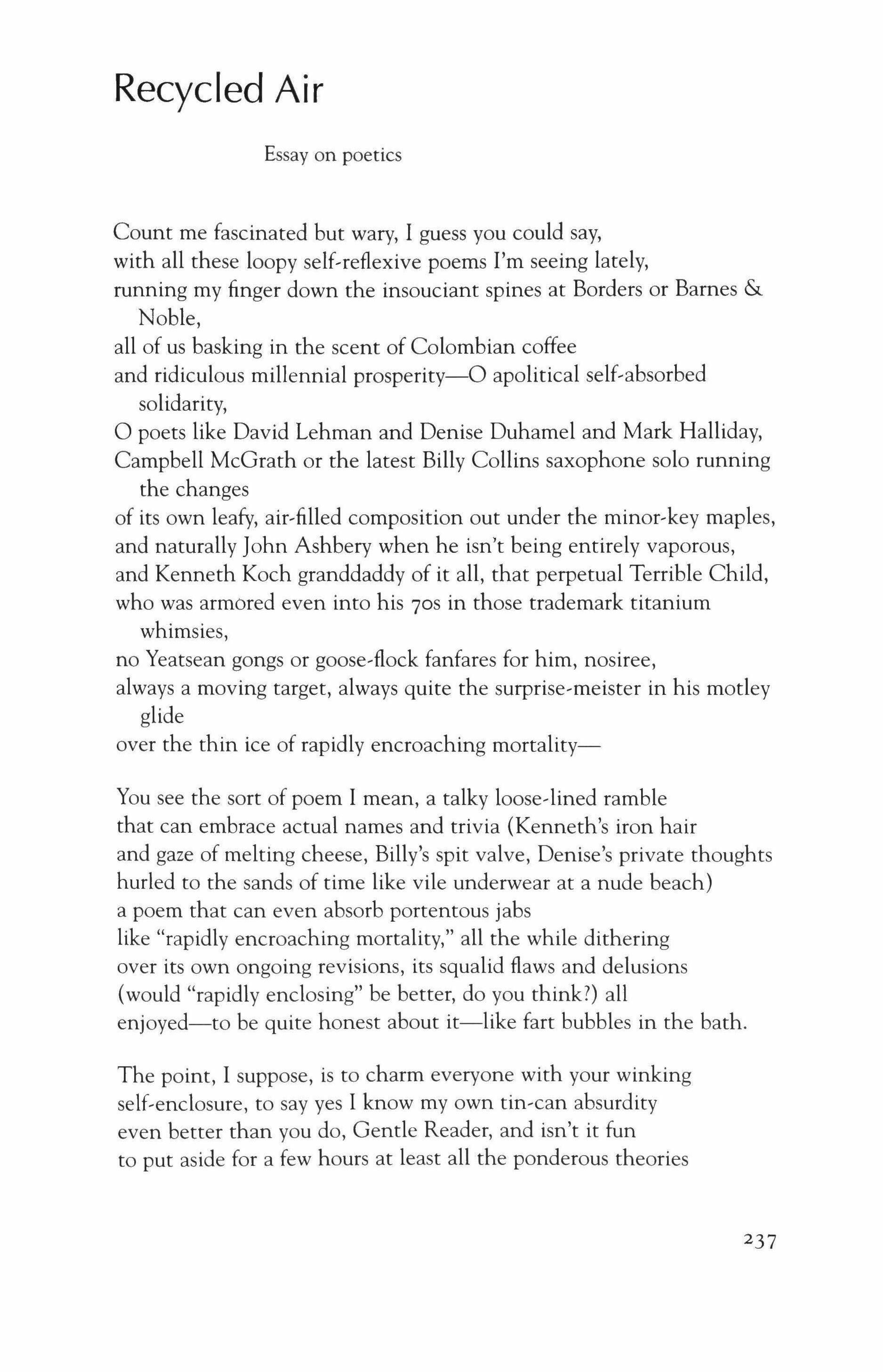
Essay on poetics
Count me fascinated but wary, I guess you could say, with all these loopy self-reflexive poems I'm seeing lately, running my finger down the insouciant spines at Borders or Barnes & Noble, all of us basking in the scent of Colombian coffee and ridiculous millennial prosperity-O apolitical self-absorbed solidarity, o poets like David Lehman and Denise Duhamel and Mark Halliday, Campbell McGrath or the latest Billy Collins saxophone solo running the changes of its own leafy, air-filled composition out under the minor-key maples, and naturally John Ashbery when he isn't being entirely vaporous, and Kenneth Koch granddaddy of it all, that perpetual Terrible Child, who was armored even into his 70S in those trademark titanium whimsies, no Yeatsean gongs or goose-flock fanfares for him, nosiree, always a moving target, always quite the surprise-rneister in his motley glide over the thin ice of rapidly encroaching mortality-
You see the sort of poem I mean, a talky loose-lined ramble that can embrace actual names and trivia (Kenneth's iron hair and gaze of melting cheese, Billy's spit valve, Denise's private thoughts hurled to the sands of time like vile underwear at a nude beach) a poem that can even absorb portentous jabs like "rapidly encroaching mortality," all the while dithering over its own ongoing revisions, its squalid flaws and delusions (would "rapidly enclosing" be better, do you think?) all enjoyed-to be quite honest about it-like fart bubbles in the bath.
The point, I suppose, is to charm everyone with your winking self-enclosure, to say yes I know my own tin-can absurdity even better than you do, Gentle Reader, and isn't it fun to put aside for a few hours at least all the ponderous theories
Recycled Air
237

and monkey-chatter voices that say a poem {or life} should should should?
Not that there isn't ample precedent, said the Professor: remember Whitman's cheery warning that "querilities, / Ungracious glooms, aches, lethargy, constipation, whimpering ennui / May filter in my daily songs"?
Do I test your patience with my po-mo yawp? Very well then, I test your patience with my insufferable po-rno yawp. So sue me
And just when you think the poem's going to spin out utterly into neurotic self-analysis or surreal gloop gloop, why that's precisely when the poet spins a gosh-darn good yarn {examples fail me at the moment, but you can imagine, can't you?} or works in a moving quote from Neruda, or maybe an allusion to Roland Barthes that beyond the drippy sarcasm of its placement signals hey! this poet's no dum-dum, and even when veering deep into the wilds of the Home Shopping Network there seems some ultimate seriousness afoot, however silly or mock-agonized, and just then upon the burning sands of that selfsame nude beach will appear a Venus or Apollo of throat-catching unironized beautyso that turns out to be the poem's final secret, that it's none other than our old friend Mr. Lyric Eye doing lines on the mirror, licking his {or her!} sorry salted wounds again, not at all the glinting postmodern riff we thought.
Or maybe it is. So hard to tell, for now the poem will swerve again, offering a few strident remarks about the classbound assumptions of such poesis in the twilight of the implosion of late capitalism, which will be deliberately difficult to disentangle from the paraphrased plot of an obscure Steve McQueen flick or some apparently good advice on the best way to cook mushrooms
or-well, you get the point, don't you? You you you my oh-so-acute longsuffering and canny reader, in fact secretly one of my biggest admirers, though you're too skittery to send me that fan letter you've often contemplated-afraid that my Kevlar-vest ironies would deflect it like nothing, and there you'd be,
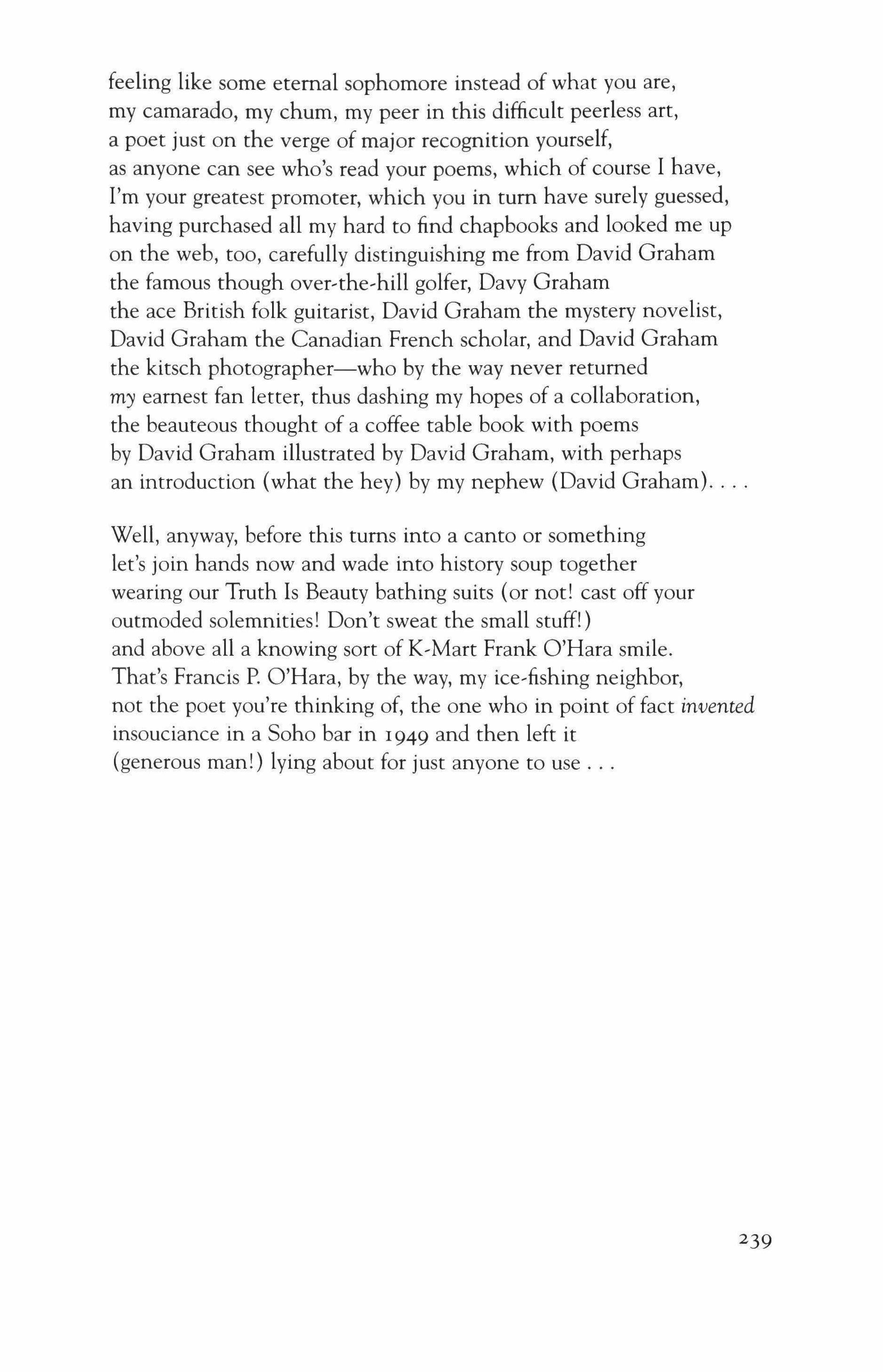
feeling like some eternal sophomore instead of what you are, my camarado, my chum, my peer in this difficult peerless art, a poet just on the verge of major recognition yourself, as anyone can see who's read your poems, which of course I have, I'm your greatest promoter, which you in tum have surely guessed, having purchased all my hard to find chapbooks and looked me up on the web, too, carefully distinguishing me from David Graham the famous though over-the-hill golfer, Davy Graham the ace British folk guitarist, David Graham the mystery novelist, David Graham the Canadian French scholar, and David Graham the kitsch photographer-who by the way never returned my earnest fan letter, thus dashing my hopes of a collaboration, the beauteous thought of a coffee table book with poems by David Graham illustrated by David Graham, with perhaps an introduction {what the hey} by my nephew {David Graham}
Well, anyway, before this turns into a canto or something let's join hands now and wade into history soup together wearing our Truth Is Beauty bathing suits {or not! cast off your outmoded solemnities! Don't sweat the small stuff!} and above all a knowing sort of K�Mart Frank O'Hara smile. That's Francis P. O'Hara, by the way, my ice-fishing neighbor, not the poet you're thinking of, the one who in point of fact invented insouciance in a Soho bar in 1949 and then left it {generous man!} lying about for just anyone to use
239

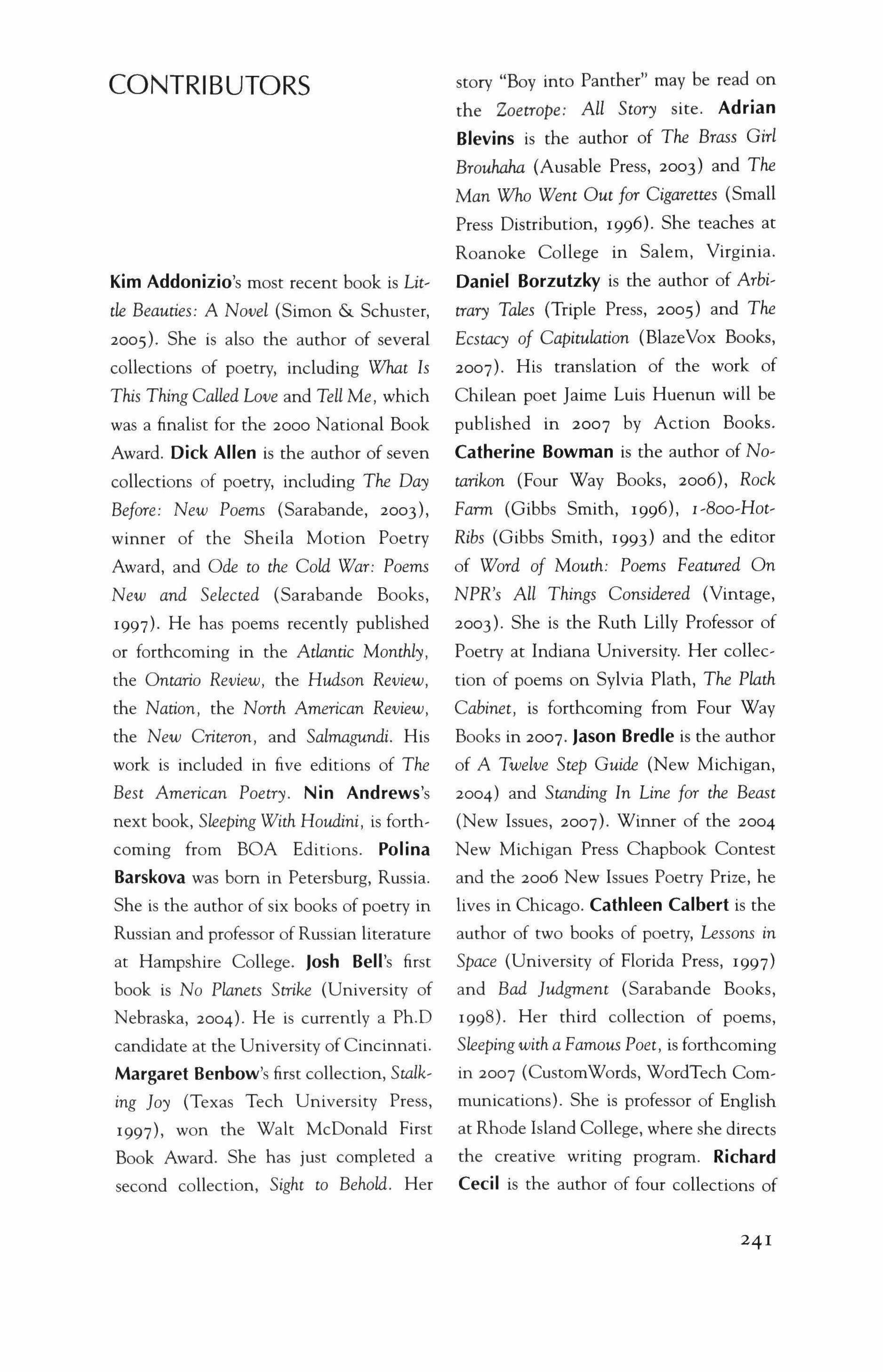
Kim Addonizio's most recent book is Little Beauties: A Novel (Simon & Schuster, 2005). She is also the author of several collections of poetry, including What Is This Thing Called Love and Tell Me, which was a finalist for the 2000 National Book Award. Dick Allen is the author of seven collections of poetry, including The Day Before: New Poems (Sarabande, 2003), winner of the Sheila Motion Poetry Award, and Ode to the Cold War: Poems New and Selected (Sarabande Books, 1997). He has poems recently published or forthcoming in the Atlantic Monthly, the Ontario Review, the Hudson Review, the Nation, the North American Review, the New Criteron, and Salmagundi. His work is included in five editions of The Best American Poetry. Nin Andrews's next book, Sleeping With Houdini, is forthcoming from BOA Editions. Polina Barskova was born in Petersburg, Russia. She is the author of six books of poetry in Russian and professor of Russian literature at Hampshire College. Josh Bell's first book is No Planets Strike (University of Nebraska, 2004). He is currently a Ph.D candidate at the University of Cincinnati.
Margaret Benbow's first collection, Stalking Joy (Texas Tech University Press, 1997), won the Walt McDonald First Book Award. She has just completed a second collection, Sight to Behold. Her
story "Boy into Panther" may be read on the Zoetrope: All Story site. Adrian Blevins is the author of The Brass Girl Brouhaha (Ausable Press, 2003) and The Man Who Went Out for Cigarettes (Small Press Distribution, 1996). She teaches at Roanoke College in Salem, Virginia. Daniel Borzutzky is the author of Arbitrary Tales (Triple Press, 2005) and The Ecstacy of Capitulation (BlazeVox Books, 2007). His translation of the work of Chilean poet Jaime Luis Huenun will be published in 2007 by Action Books.
Catherine Bowman is the author of Notarikon (Four Way Books, 2006), Rock Farm (Gibbs Smith, 1996), r-Soo-HorRibs (Gibbs Smith, 1993) and the editor of Word of Mouth: Poems Featured On NPR's All Things Considered (Vintage, 2003). She is the Ruth Lilly Professor of Poetry at Indiana University. Her collection of poems on Sylvia Plath, The Plath Cabinet, is forthcoming from Four Way Books in 2007. Jason Bredle is the author of A Twelve Step Guide (New Michigan, 2004) and Standing In Line for the Beast (New Issues, 2007). Winner of the 2004 New Michigan Press Chapbook Contest and the 2006 New Issues Poetry Prize, he lives in Chicago. Cathleen Calbert is the author of two books of poetry, Lessons in Space (University of Florida Press, 1997) and Bad Judgment (Sarabande Books, 1998). Her third collection of poems, Sleeping with a Famous Poet, is forthcoming in 2007 (CustomWords, WordTech Communications). She is professor of English at Rhode Island College, where she directs the creative writing program. Richard Cecil is the author of four collections of
CONTRI BUTORS

poetry, most recently Twenty-First Century Blues (Southern Illinois Universiry Press, 2004). He teaches at Indiana Universiry in Bloomington and in the brief residency MFA program at Spalding University. David Clewell has published six collections of poems, most recently The Low End of Higher Things (University of Wisconsin Press, 2003) and two book-length poems, The Conspiracy Quartet and lack Ruby's America (Garlic Press, 1997 and 2000). He teaches at Webster University in St. Louis. Wanda Coleman received the 1999 Lenore Marshall Poetry Prize (Bathwater Wine) and was nominated for the 2001 National Book Award (Mercurochrome). Her new books include Ostinato Vamps, Wanda Coleman: Greatest Hits I966-2003, and The Riot Inside Me: More Trials & Tremors. Billy Collins's latest collection is The Trouble With Poetry and Other Poems (Random House, 2005). Cynie Cory is the author of American Girl (New Issues, 2007). Carl Dennis's latest collection of poetry is Unknown Friends (Penguin, 2007). In 2002, he received a Pulitzer for Practical Gods (Penguin, 2001). Gregory Djanikian is the author offour collections of poetry, most recently, Years Later (Carnegie Mellon University Press, 2000). His new collection, So I Will Till the Ground, also from Carnegie Mellon, is forthcoming in 2007. He directs the creative writing program at the University of Pennsylvania. Stephen Dobyns's most recent book of poems is Mystery, So Long (Penguin, 2005). Jill Drumm received her MFA in Creative Writing from Florida International University, where she was the executive editor of Golf Stream magazine.
In 2006, she received an Academy of American Poets Prize. Denise Duhamel's most recent collections are Two and Two (University of Pittsburgh Press, 2005), Mille er un sentiments (Firewheel Editions, 2005), and Queen for a Day: Selected and New Poems (University of Pittsburgh Press, 2001). Stephen Dunn is the author of thirteen collections of poetry, including the recently published Everything Else in the World (W.W. Norton & Co.). He was awarded the Pulitzer Prize for Different Hours in 2001. B. H. Fairchild is the recipient of Guggenheim, Rockefeller, and NEA fellowships. His most recent book of poems is Local Knowledge (W. W. Norton & Co., 2005). Steve Fellner's first book of poems, Blind Date with Cavafy, will be published by Marsh Hawk Press in 2007. He currently teaches at SUNY Brockport. Amy Gerstler's most recent books of poetry include Ghost Girl (2004), Medicine (2000), and Crown of Weeds (1997), all published by Penguin. She teaches in the Bennington Writing Seminars Program at Bennington College in Vermont and at Art Center College of Design in Pasadena, California. Albert Goldbarth's most recent book is The Kitchen Sink: New and Selected Poems I972-2007 (Graywolf Press, 2007). David Graham's books of poetry include Second Wind (Texas Tech, 1990) and Stutter Monk (Flame Press, 2000). He is the co-editor, with Kate Sontas, of the essay anthology AfterConfession (Graywolf, 2001) and professor of English at Ripon College. Gabriel Gudding is the author of two books, A Defense of Poetry (Pitt Poetry Series, 2002) and rhode island notebook, forthcoming from Dalkey

Archive Press in 2008. He teaches literature and creative writing at Illinois State University. James Hall is assistant professor of English at Bethany College. He holds a Ph.D from the University ofHouston and an MFA from Bennington. Mark Halliday's four books of poems are Little Star (William Morrow, 1987), Tasker Street (University of Massachusetts, 1992), Selfwolf (University of Chicago, 1999), and Jab (University of Chicago, 2002). Barbara Hamby's third book of poems is Babel (University of Pittsburgh Press, 2004). Her poems have recently appeared in Ploughshares, the Yale Review, and the Paris Review. She teaches in the creative writing department at Florida State University. Bob Hicok's fifth book, This Clumsy Living, will be out from Pitt in Spring 2007. Tony Hoagland won the 2005 Mark Twain Award from the Poetry Foundation. A book of craft essays, Real Sofistikashun, will be out in October from Graywolf Press. He teaches at the University of Houston and in the Warren Wilson MFA Program. Richard Howard's latest book is The Silent Treatment (Turtle Point Press 2005). He teaches at Columbia University's School of the Arts (Writing Division). Andrew Hudgins is the author of several books of poetry, including Ecstatic in the Poison (Overlook Press, 2003) and Babylon in a Jar: Poems (Mariner Books, 1998). Tom C. Hunley is assistant professor of English at Western Kentucky University and the director of Steel Toe Books (www.steeltoebooks.com). His books include The Tongue (Wind, 2004), Still, There's a Glimmer (WordTech, 2004), My Life as a Minor Character (Pecan Grove,
2005), and Teaching Poetry Writing: A Five Canon Approach (Multilingual Matters, 2007). Roy [acobstein's A Form of Optimism (University Press of New England, 2006) won the Samuel French Morse Prize, selected by Lucia Perillo. His previous book, Ripe (University of Wisconsin Press, 2002), won the Felix Pollak Prize. His poetry is included in Literature: Reading Fiction, Poetry & Drama (McGrawHill, 2006). He is an international public health physician. Rodney Jones's eighth poetry collection, Salvation Blues: IOO Poems, I985-2oo5, was recently published by Houghton Mifflin. David Kirby is the Robert O. Lawton Distinguished Professor of English at Florida State University and the author most recently of The Ha-Ha. Caroline Knox's collection He Paves the Road with Iron Bars (Verse Press, 2004) won the 2005 Maurice English Award. She has recent work in Boston Review and Yale Review and is completing a sixth collection, Quaker Guns, forthcoming from Wave Books. Dorianne Laux's fourth book of poems, Facts About the Moon, was published by W. W. Norton & Co. in 2005. Cecilia Uompart is currently an undergraduate Creative Writing major at the Florida State University. Her "revision" of the Lord's Prayer has received awards from Florida State's Department of English, as well as the American Academy of Poets. Adrian C. Louis teaches in the Minnesota State University System. His most recent book of poems is Evil Corn (Ellis Press, 2004). Thomas Lux's most recent book is The Cradle Palace (Houghton Mifflin, 2004). Jynne Dilling Martin works at Random House
243
and has her MFA from Warren Wilson. Her poems have recently appeared in the Kenyon Review. She lives in New York City with her husband and cat. Cate Marvin's second book of poems, Fragments of the Head of a Queen, will be published by Sarabande Books in 2007. She is associate professor of creative writing at the College of Staten Island, City University of New York. Khaled Mattawa is the author of Zodiac ofEchoes (Ausable Press, 2003) and Ismailia Eclipse (Sheep Meadow Press, 1995) and has translated several books of contemporary Arabic poetry. Campbell McGrath most recent book of poems is Pax Atomica (Ecco Press, 2005). He teaches at Florida International University in Miami. Joyelle McSweeney is the author of The Commandrine & Other Poems and The Redbird, both from Fence, and the novella, Nylund, the Sarcographer, forthcoming from Tarpulin Sky. She is a co-founder of Action Books and teaches in the MFA program at Notre Dame. Joseph Millar's poems have appeared in New Letters, Ploughshares, DoubleTake, Manoa, and Shenandoah. His first book, Overtime, was a finalist for the Oregon Book Award. A new collection, Fortune, is out from Eastern Washington University Press. He teaches in Pacific University's low residency MFA and at Oregon State University. Phyllis Moore's book of stories, A Compendium of Skirts, was published by Carroll and Graf in 2002. She is the director of Liberal Studies at the Kansas City Art Institute. Aimee Nezhukumatathil is the author ofMiracle Fruit and At the Drive-In Volcano (both from Tupelo Press). New work appears in
Crazyhorse Tin House, and Prairie Schooner. She is associate professor of English at SUNY-Fredonia. Sharon Olds is working on her ninth book of poems, 0 Western Wind. Danielle Pafunda is author of Pretty Young Thing (Soft Skull Press, 2005). Her poetry and reviews appear in such publications as Best American Poetry (2006 and 2004), Conjunctions, The Georgia Review, and Jubilat. She is co-editor of the online journal La Petite Zine, and currently lives in Athens, Georgia. lucia Perillo's new book is Luck Is Luck (Random House, 2005). She lives in Olympia, Washington. lawrence Raab is the author of six collections of poems, including What We Don't Know About Each Other (winner of the National Poetry Series and a finalist for the 1993 National Book Award), The Probable World (2000), and most recently Visible Signs: New and Selected Poems (2003), all published by Penguin. He teaches literature and writing at Williams College. Natasha Rocas lives in Tallahassee, FL, where she is srudying creative writing at Florida State University. John Rybicki's latest collection, We Bed Down into Water: Poems, is forthcoming from Triquarterly Books/Northwestern University Press in 2008. He is also the author of Yellow-Haired Girl with Spider (March Street Press, 2002) and Traveling at High Speeds (New Issues Poetry Press, 1996). Steve Scafidi is a cabinetmaker and lives with his family in West Virginia. He is the author of Sparks from a NinePound Hammer (2001) and For Love of Common Words (2006), both from Louisiana State University Press. Jon Schneider graduated from Florida State

244
University and is currently attending the MFA program at the University of Virginia. Martha Silano has two full-length poetry collections, Blue Positive (Steel Toe, 2006) and What the Truth Tastes Like (Nightshade Press, 1999). Gerald Stern is the author of numerous collections of poetry, including Everything is Burning (2005), American Sonnets (2002), and This Time: New and Selected Poems (1998), which won the National Book Award all from W.W. Norton & Co. Charles Harper Webb's book Amplified Dog (Red Hen Press, 2006) won the Saltman Prize for Poetry. Hot Popsicles was published in 2005 by the University of Wisconsin Press. Recipient of grants from the Whit-
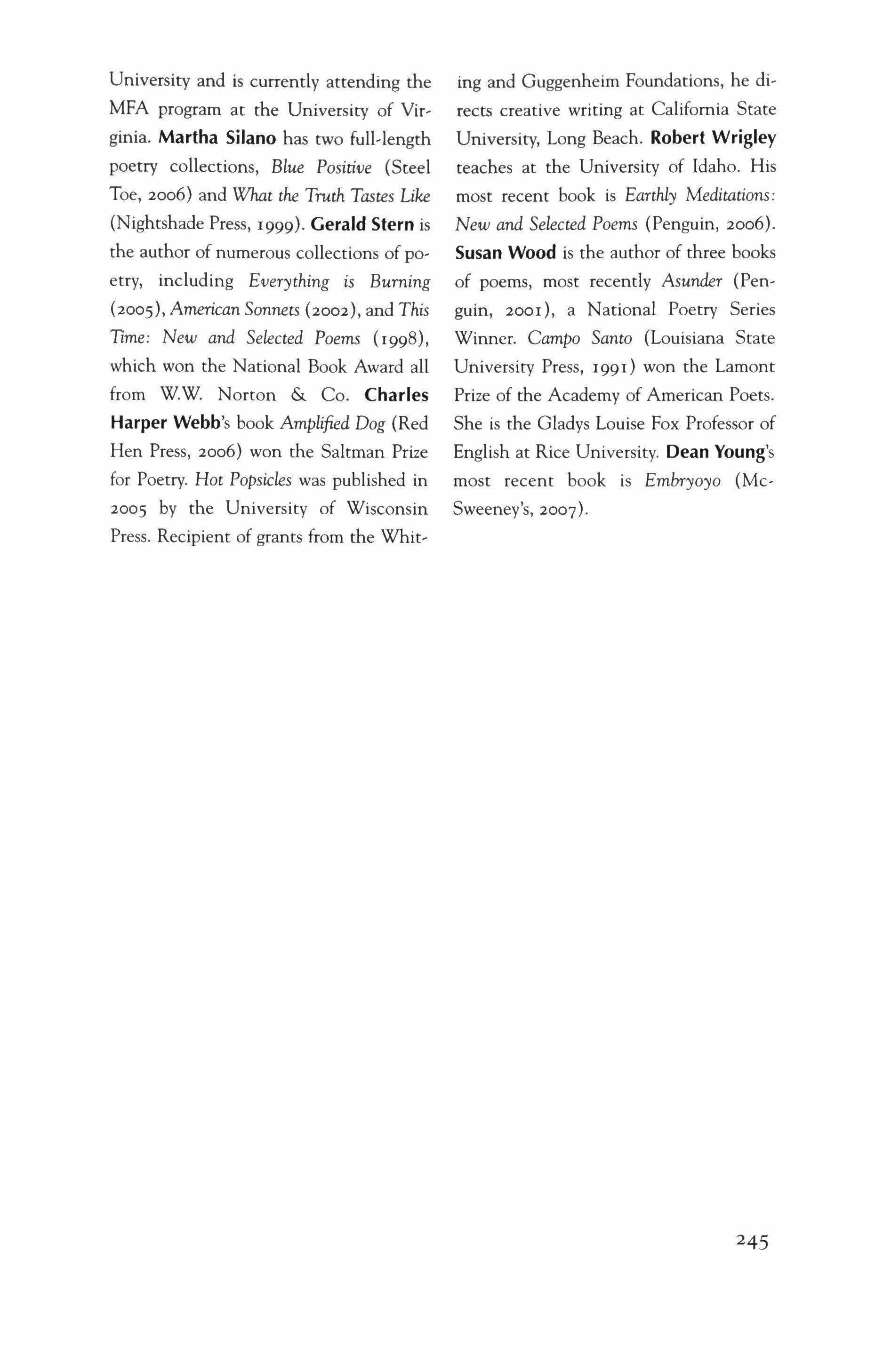
ing and Guggenheim Foundations, he directs creative writing at California State University, Long Beach. Robert Wrigley teaches at the University of Idaho. His most recent book is Earthly Meditations: New and Selected Poems (Penguin, 2006). Susan Wood is the author of three books of poems, most recently Asunder (Penguin, 2001), a National Poetry Series Winner. Campo Santo (Louisiana State University Press, 1991) won the Lamont Prize of the Academy of American Poets. She is the Gladys Louise Fox Professor of English at Rice University. Dean Young's most recent book is Embryoyo (MeSweeney's, 2007).
245
Subscriptions
Three issues per year. Individuals: one year $24; two years $44; life $600. Institutions: one year $36; two years $68. Overseas: $5 per year additional. Price of back issues varies. Sample copies $5. Address correspondence and subscriptions to TriQuarterly, Northwestern Universiry, 629 Noyes St., Evanston,lL 60208-4210. Phone (847) 491-7614.
Submissions
The editors invite submissions of fiction, poetry and literary essays, which must be postmarked between October I and March 3 I; manuscripts postmarked between April I and September 30 will not be read. No manuscripts will be returned unless accompanied by a stamped, self-addressed envelope. All manuscripts accepted for publication become the property of TriQuarterly, unless otherwise indicated.
Reprints
Reprints of issues 1-17 of TriQuarterly are available in full format from Kraus Reprint Company, Route 100, Millwood, NY 10546, and all issues in microfilm from Universiry Microfilms International, 300 North Zeeb Road, Ann Arbor, MI 48106.
Indexing
TriQuarterly is indexed in the Humanities Index (H. W. Wilson Co.), the American Humanities Index (Whitson Publishing Co.), Historical Abstracts, MLA, EBSCO Publishing (Peabody, MA) and Information Access Co. (Foster City, CAl.
Distributors
Our national distributors to retail trade are Ingram Periodicals (La Vergne, TN); B. DeBoer (Nutley, NJ); Ubiquiry (Brooklyn, NY); Armadillo (Los Angeles, CAl.

Copyright © 2007 by TriQuarterly. No part of this volume may be reproduced in any manner without written permission. The views expressed in this magazine are to be attributed to the writers, not the editors or sponsors. Printed in the United States of America by Sheridan Books. Typeset by TriQuarterly. ISSN 0041-3097.
Publication of TriQuarterly is made possible in part by the donors of gifts and grants to the magazine. For their recent and continuing support, we are very pleased to thank the lIIinois Arts Council, the Lannan Foundation, the National Endowment for the Arts, the Sara Lee Foundation, the Wendling Foundation and individual donors.
TRAVEL THE TERRAIN OF ILLINOIS POETRY IN THIS FIRST-EVER, AUDIO CD POETRY ANTHOLOGY.
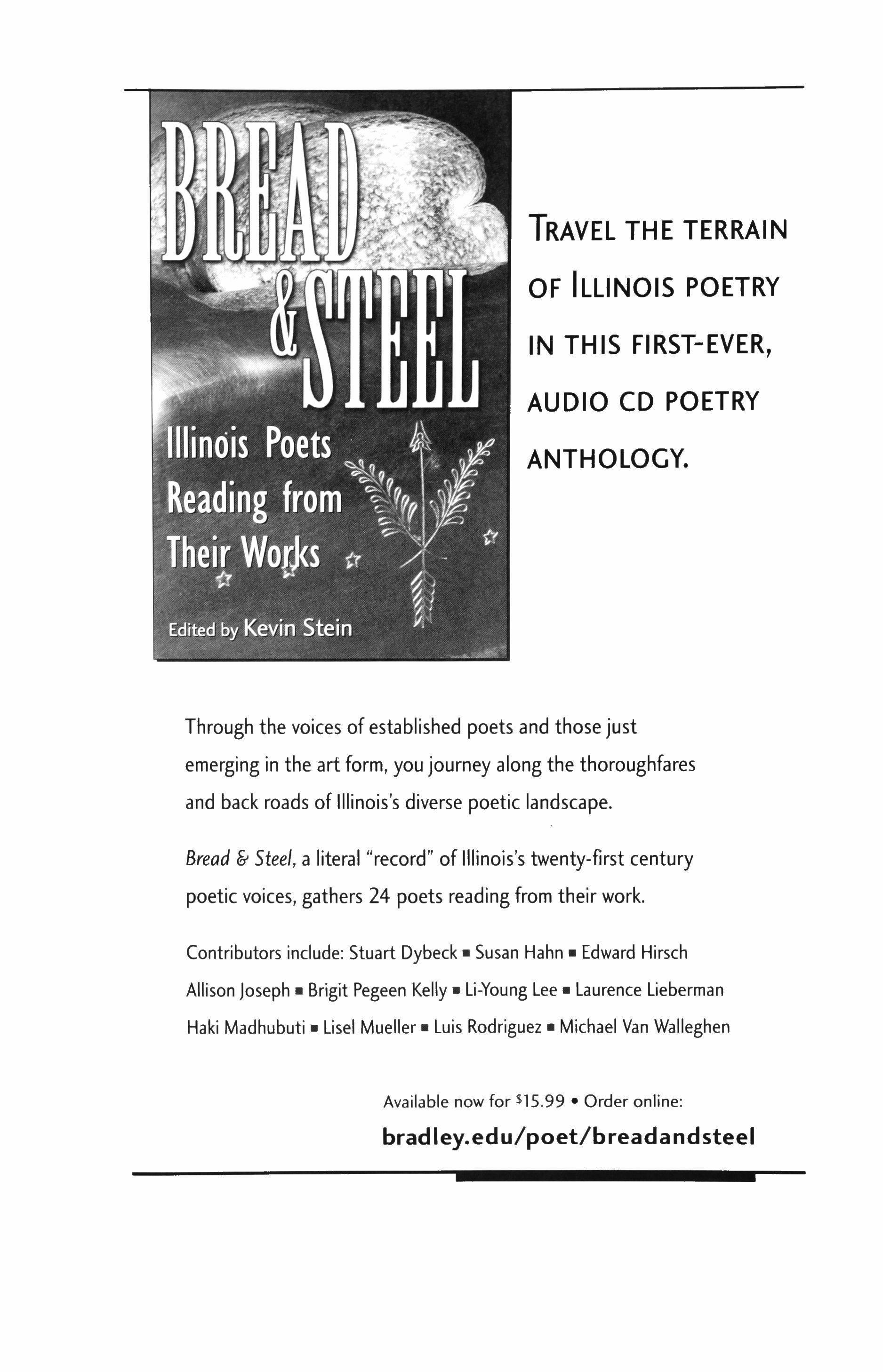
Through the voices of established poets and those just emerging in the art form, you journey along the thoroughfares and back roads of Illinois's diverse poetic landscape.
Bread & Steel, a literal "record" of Illinois's twenty-first century poetic voices, gathers 24 poets reading from their work.
Contributors include: Stuart Dybeck Susan Hahn. Edward Hirsch
Allison Joseph. Brigit Pegeen Kelly. Li-Young Lee. Laurence Lieberman
Haki Madhubuti Lisel Mueller. Luis Rodriguez. Michael Van Walleghen
Available now for $15.99 Order online: bradley.edu/poet/breadandsteel
Idaho Review
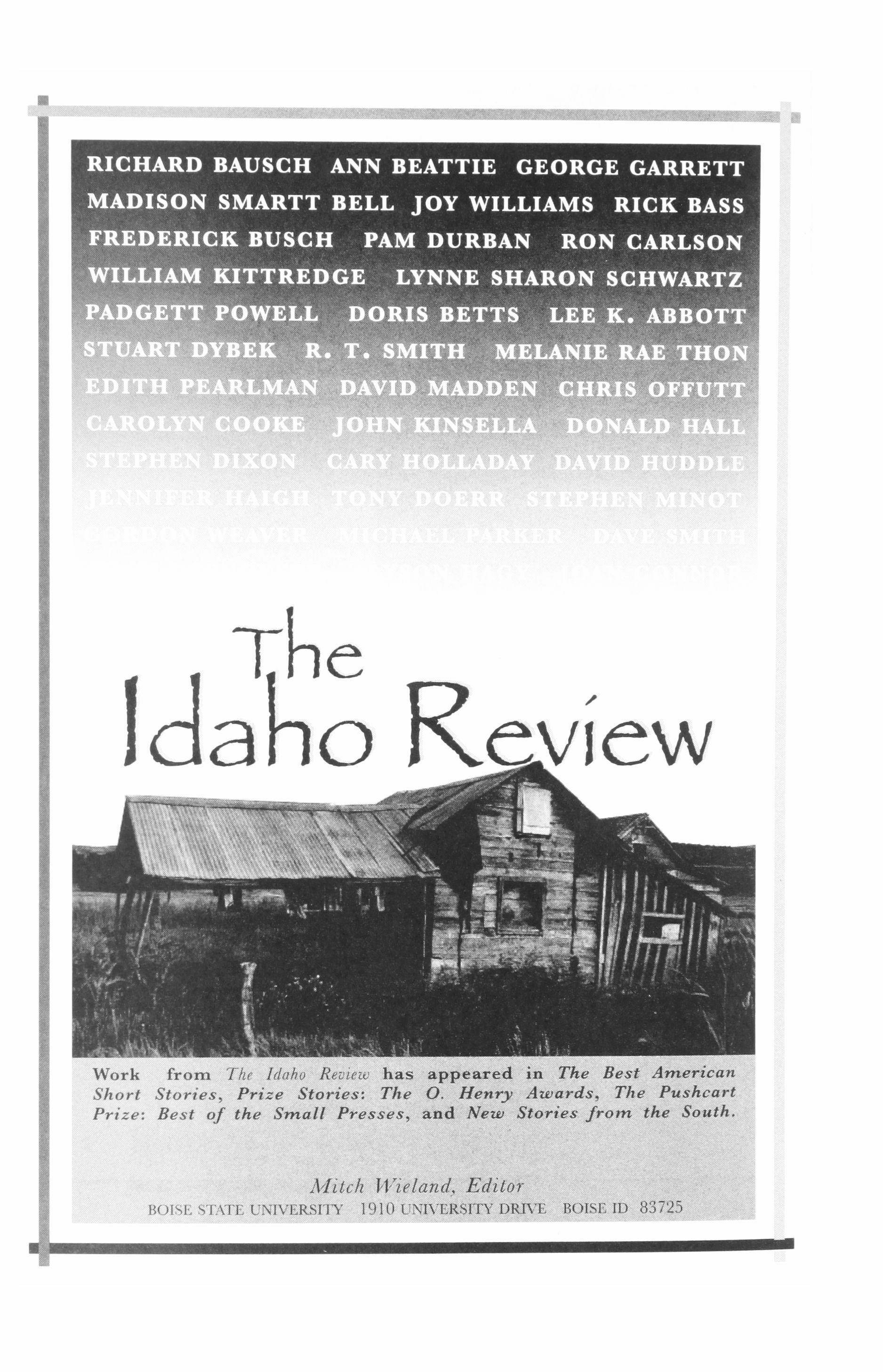
Work from The Idaho Review has appeared in The Best American Short Stories, Prize Stories: The O. Henry Awards, The Pushcart Prize: Best of the Small Presses, and New Stories from the South.
klitch Wieland, Editor
T.he
BOISE STATE UNTVERSITY 1910 UNIVERSITY DR1VE BOISE ID 83725

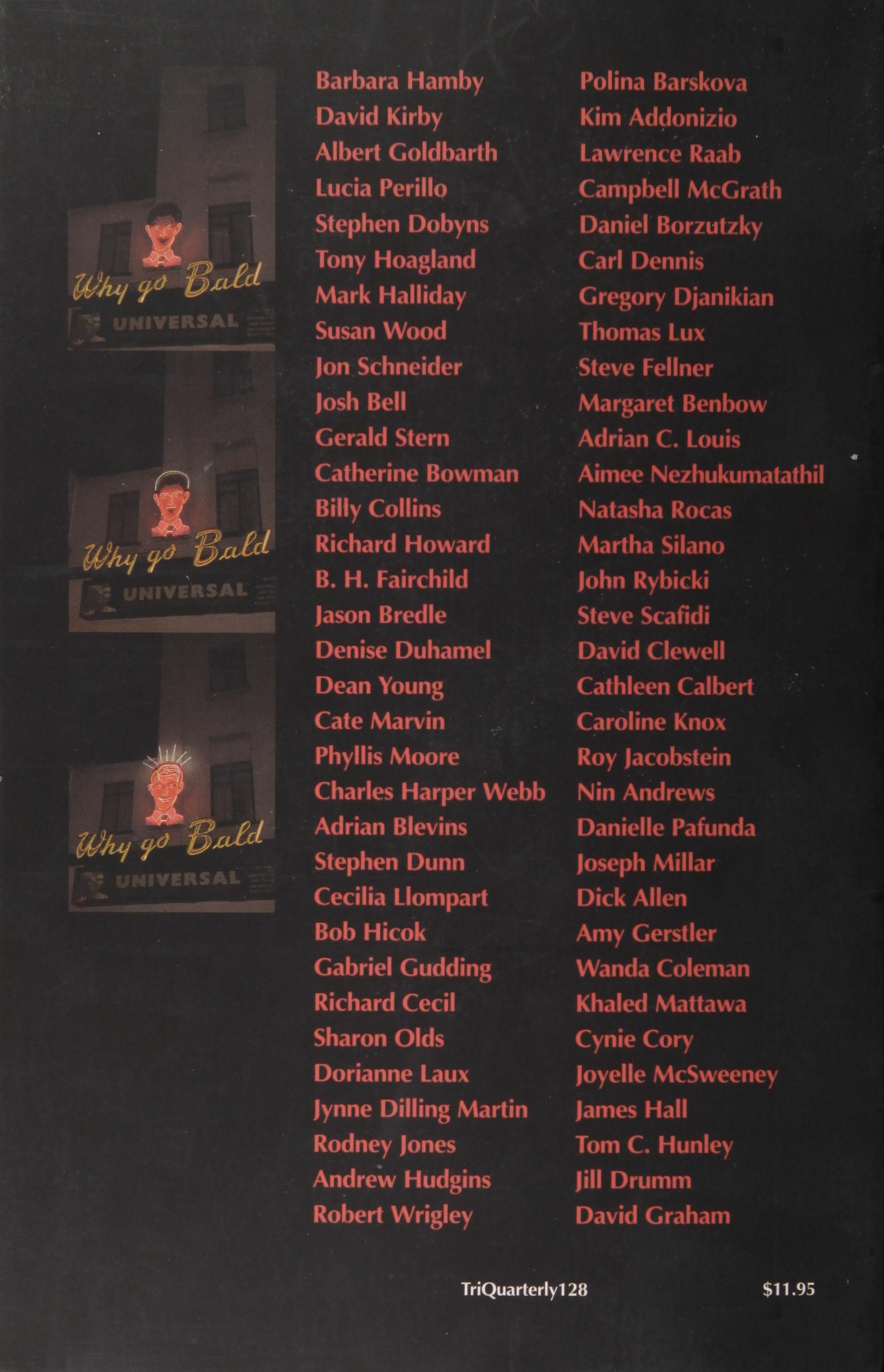






 Barbara Hamby and David Kirby
Barbara Hamby and David Kirby

































 For Barry Rackner
For Barry Rackner

















































































































































































































